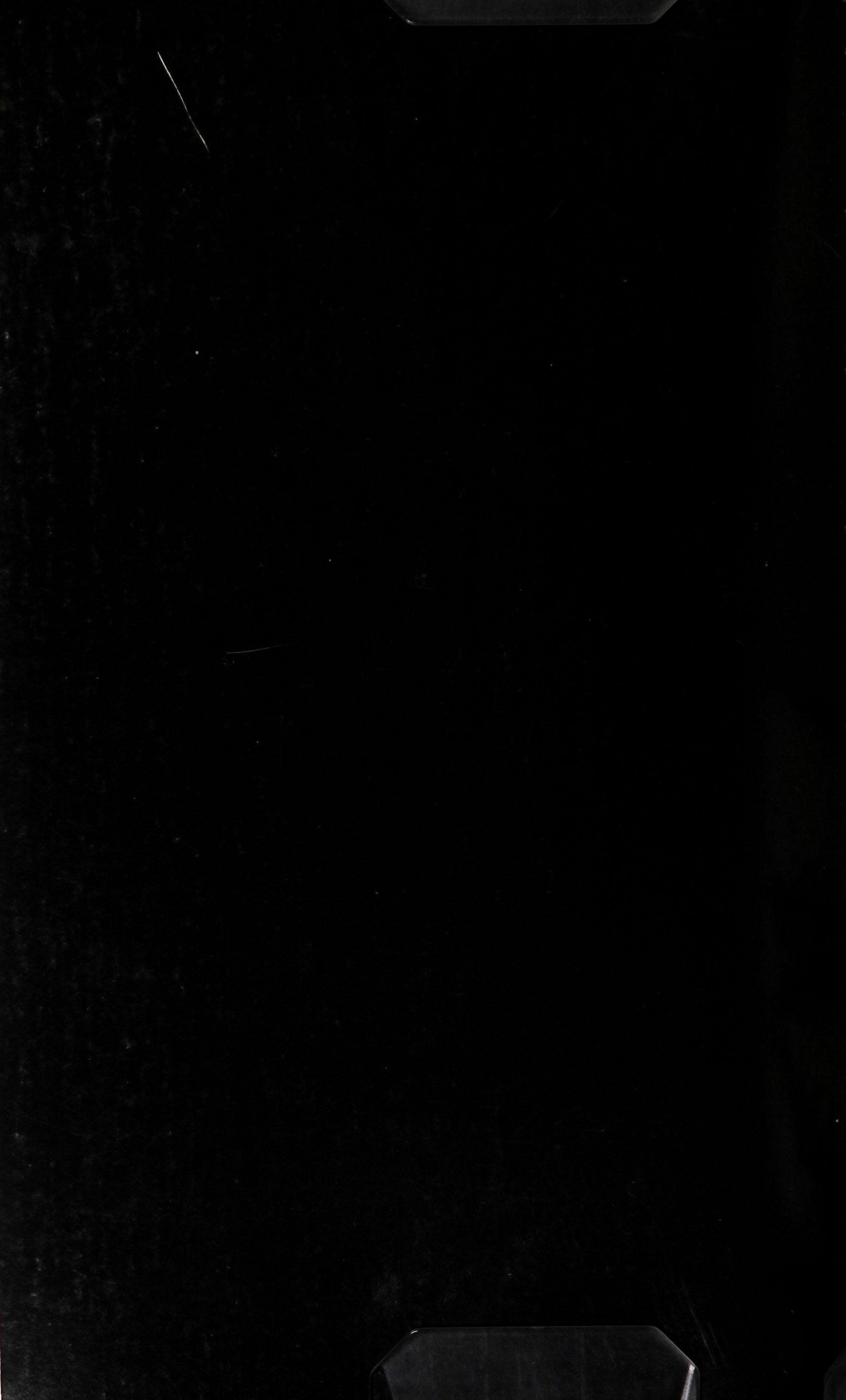






Editor: Elliott Anderson
Executive Editor: Mary Kinzie
Art Director: Cynthia Anderson
Managing Editor: Michael McDonnell
Associate Editors:
Caren Frazier, Tom Parrett, Mary Elinore Smith, Mitchell York
Advisory Editors:
Lawrence Levy, Charles Newman
Fulfillment: Mary M. Zakrasek
Contributing Editors:
Robert Alter, Gerald Graff, John Hawkes, David Hayman, Joseph McElroy, Peter Michelson, Robert Onopa, Tony Tanner, Nathaniel Tarn
TriQuarterly is an international journal of arts, letters, and opinion published in the fall, winter, and spring at Northwestern University, Evanston, Illinois 60201. Subscription rates: One year $12:00; two years $20.00; three years $30.00. Foreign subscriptions $1.00 per year additional. Single copies usually $4.25. Back issue prices on request. Contributions, correspondence, and subscriptions should be addressed to TriQuarterly, 1735 Benson Avenue, Northwestern University, Evanston, Illinois 60201. The editors invite submissions, but queries are strongly suggested. No manuscripts will be returned unless accompanied by a stamped, self-addressed envelope. All manuscripts accepted for publication become the property of TriQuarterly, unless otherwise indicated. Copyright © 1977 by TriQuarterly. All rights reserved. The views expressed in this magazine are to be attributed to the writers, not the editors or sponsors. Printed in the United States of America. Claims for missing numbers will be honored only within the four-month period after month of issue.
NATIONAL DISTRIBUTOR TO RETAIL TRADE: B. DEBOER, 188 HIGH STREET, NUTLEY, NEW JERSEY 07110. DISTRIBUTOR FOR WEST COAST TRADE: BOOK PEOPLE, 2940 7TH STREET, BERKELEY, CALIFORNIA 94710.
REPRINTS OF BACK ISSUES OF TriQuarterly ARE NOW AVAILABLE IN FULL FORMAT FROM KRAUS REPRINT COMPANY, ROUTE 100, MILLWOOD, NEW YORK 10546, AND IN MICROFORM FROM UMI, A XEROX COMPANY, ANN ARBOR, MICHIGAN 48106.
3 Dispatches from a pornographic city Sean Connolly
23 Some soldiers James Ballard
43 The best Randall Reid
46 from Say hello to Hookermeyer 75 Autoclysms Michael Anania John O'Brien 81 Jeffery, believe me Jane Smiley 88 Rent Joseph McElroy
100 Reggie Woo Paul Theroux
105 The translation Joyce Carol Oates
Graveside story George P. Elliott
148 Foolish Pleasure Mary Morris 164 Senile Wells Teague
168 The madness of the day Maurice Blanchot
178 About the late Zimma (Penny) Cate: selections from her loving husband's memory hoard Russell Banks 184 Nantucket diary Ned Rorem
208 from Here. Now. Always. Edwin Brock
213 The collection Octavia Capuzzi
237 The Sewing Harems Cynthia Ozick 245 Victims Jaimee Wriston Colbert 248 The rat's eye Ian MacMillan 260 Queen Constance Virgil Burnett 276 o.ff-off obit Lonnie Carter
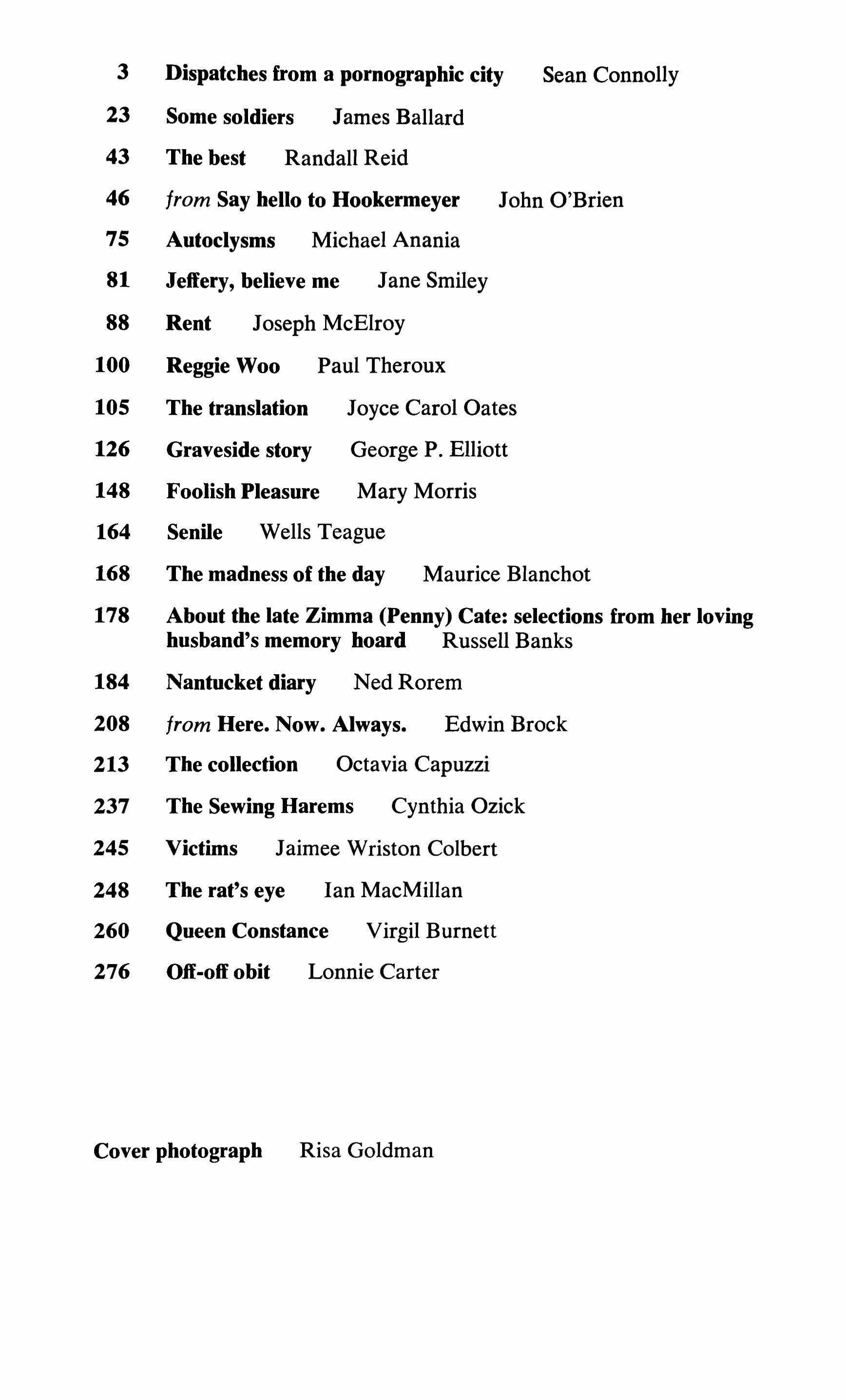
Cover photograph Risa Goldman
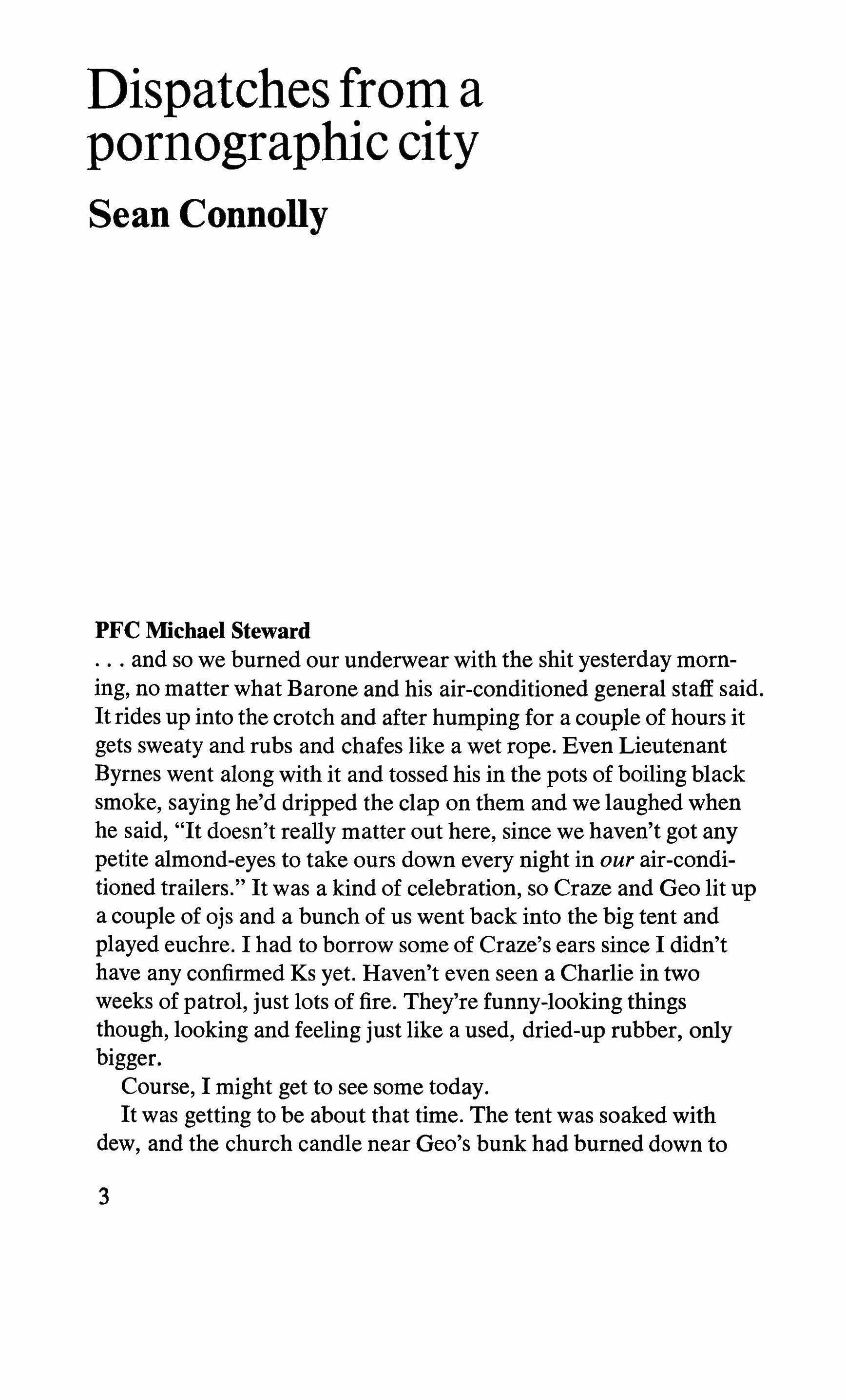 PFC Michael Steward
PFC Michael Steward
and so we burned our underwear with the shit yesterday morning, no matter what Barone and his air-conditioned general staff said. It rides up into the crotch and after humping for a couple of hours it gets sweaty and rubs and chafes like a wet rope. Even Lieutenant Byrnes went along with it and tossed his in the pots of boiling black smoke, saying he'd dripped the clap on them and we laughed when he said, "It doesn't really matter out here, since we haven't got any petite almond-eyes to take ours down every night in our air-conditioned trailers." It was a kind of celebration, so Craze and Geo lit up a couple of ojs and a bunch of us went back into the big tent and played euchre. I had to borrow some of Craze's ears since I didn't have any confirmed Ks yet. Haven't even seen a Charlie in two weeks of patrol, just lots of fire. They're funny-looking things though, looking and feeling just like a used, dried-up rubber, only bigger.
Course, I might get to see some today. It was getting to be about that time. The tent was soaked with dew, and the church candle near Geo's bunk had burned down to
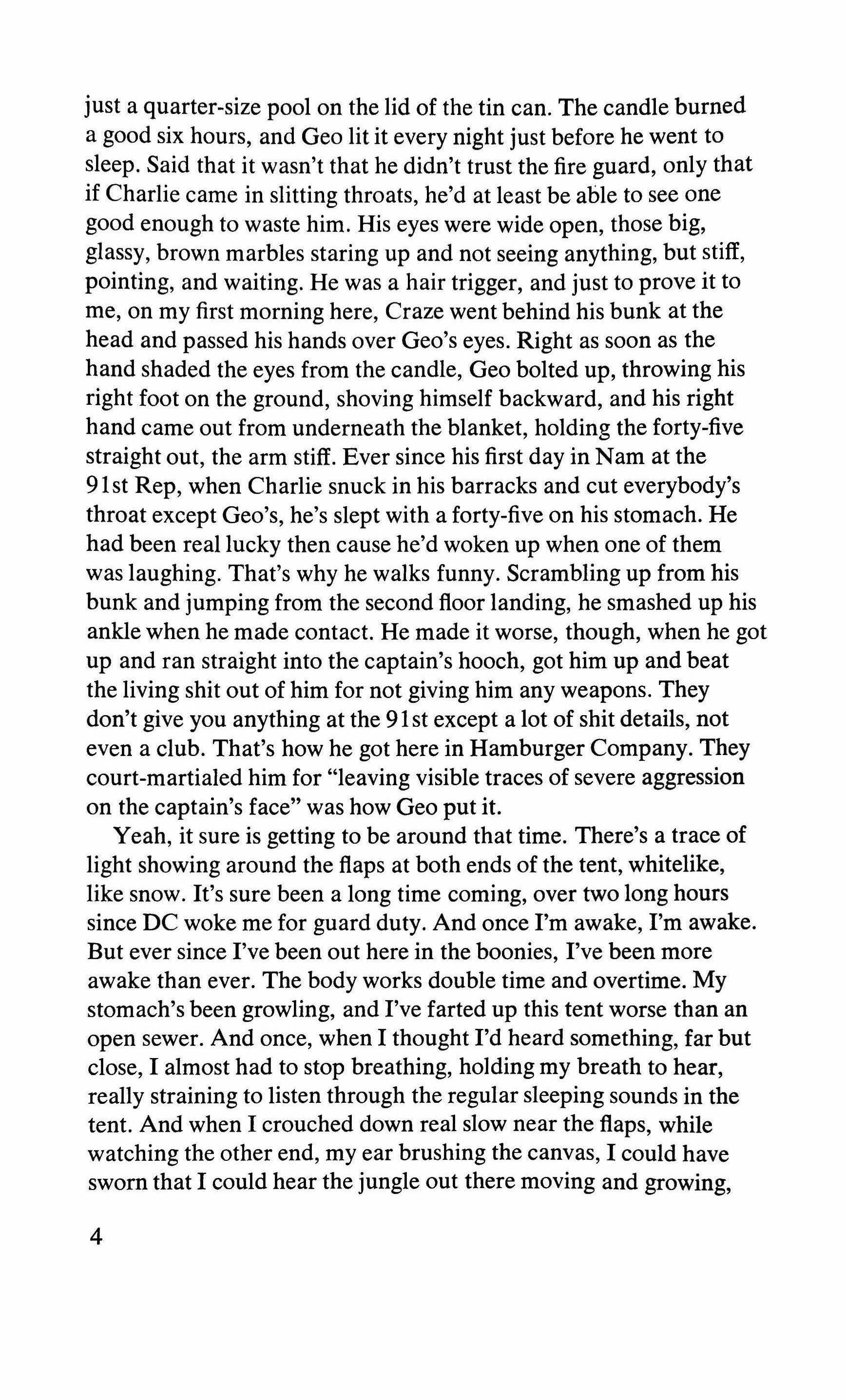
just a quarter-size pool on the lid of the tin can. The candle burned a good six hours, and Geo lit it every night just before he went to sleep. Said that it wasn't that he didn't trust the fire guard, only that if Charlie came in slitting throats, he'd at least be able to see one good enough to waste him. His eyes were wide open, those big, glassy, brown marbles staring up and not seeing anything, but stiff, pointing, and waiting. He was a hair trigger, and just to prove it to me, on my first morning here, Craze went behind his bunk at the head and passed his hands over Gee's eyes. Right as soon as the hand shaded the eyes from the candle, Geo bolted up, throwing his right foot on the ground, shoving himself backward, and his right hand came out from underneath the blanket, holding the forty-five straight out, the arm stiff. Ever since his first day in Nam at the 91st Rep, when Charlie snuck in his barracks and cut everybody's throat except Geo's, he's slept with a forty-five on his stomach. He had been real lucky then cause he'd woken up when one of them was laughing. That's why he walks funny. Scrambling up from his bunk and jumping from the second floor landing, he smashed up his ankle when he made contact. He made it worse, though, when he got up and ran straight into the captain's hooch, got him up and beat the living shit out of him for not giving him any weapons. They don't give you anything at the 91 st except a lot of shit details, not even a club. That's how he got here in Hamburger Company. They court-martialed him for "leaving visible traces of severe aggression on the captain's face" was how Geo put it.
Yeah, it sure is getting to be around that time. There's a trace of light showing around the flaps at both ends of the tent, whitelike, like snow. It's sure been a long time coming, over two long hours since DC woke me for guard duty. And once I'm awake, I'm awake. But ever since I've been out here in the boonies, I've been more awake than ever. The body works double time and overtime. My stomach's been growling, and I've farted up this tent worse than an open sewer. And once, when I thought I'd heard something, far but close, I almost had to stop breathing, holding my breath to hear, really straining to listen through the regular sleeping sounds in the tent. And when I crouched down real slow near the flaps, while watching the other end, my ear brushing the canvas, I could have sworn that I could hear the jungle out there moving and growing,

shifting itself around in the dead quiet. But then my stomach started growling and grumbling and when I stood back up, I felt the balls of my feet coming unstuck from my boot through this hole in my sock. One tiny little hole and I could feel my skin sticking to my boot. Just one tiny little hole.
I went over and knelt down next to Geo's ear and whispered his name. Right then his eyes lost their glaze and shifted to the right, trying to see me, blinking. Now, that was all I had to do. He'd wake up everybody else.
I've been carrying around Kathy's letter in my back pocket ever since last night when Joe Joe handed it to me after stand-down. I wanted to read it, but maybe I shouldn't. Maybe I oughta wait until I get back? I threw my rifle on my bunk and sat down and lit a cigarette. It really didn't taste too good. Maybe I'm too nervous. I was pulling at my mustache and noticed that it was still a little uneven from the fire. It really got singed pretty bad. I sure hope Martin's going to be OK.
I tore open the letter and read the last page first. She signed it: Love ya, Kath
it wasn't snow, course not, but the everyday creeping crud steaming up. Joe Joe was the first to leave, throwing back the huge flaps over the top slant of the tent, strolling out and slowly disappearing in the soupy wet crud. In the summer season, the early mornings were covered with the crud's thick white fog. And since it wasn't lifting that fast today-it was just too dense-it meant that it was gonna be really hot and sticky later on. But that was par for the course out here in the boonies.
I folded up Kathy's letter and slid it in my right back pocket. Mostly everybody was up now, but Craze was still in his bunk leaning up on his elbow. He put two fingers up to his lips when he noticed that I had finished reading Kathy's letter. He swung his feet on the ground, saying, "Make it a straight, Stew," and I tossed him my pack of cigarettes.
"Crud's up," I said. He didn't say much, leaning down on his cigarette, only nodding. There isn't really much to say, only the obvious like Wes said one morning after I mentioned that he needed a shave. "Your perception of the obvious is overwhelming," was what
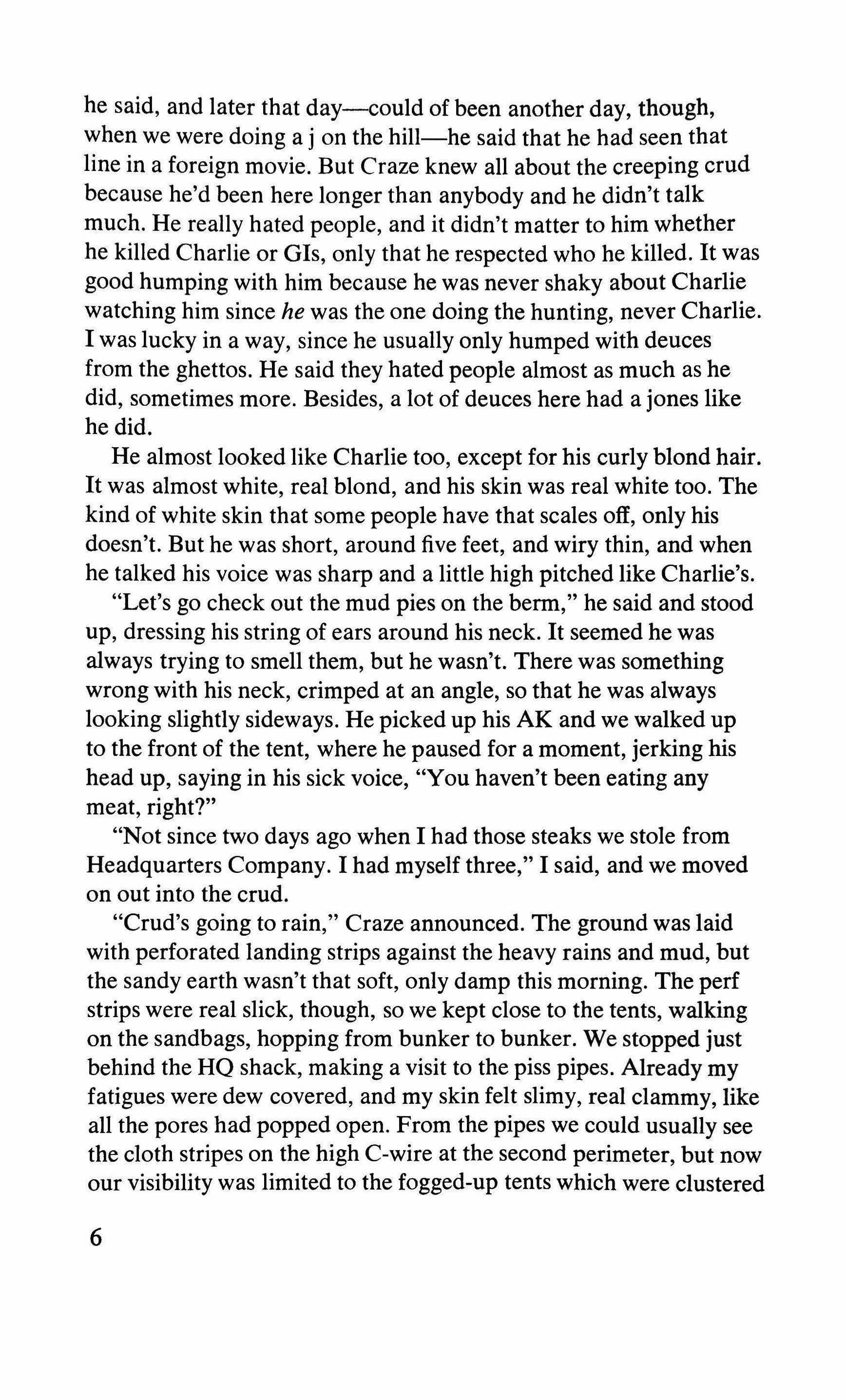
he said, and later that day-could of been another day, though, when we were doing a j on the hill-he said that he had seen that line in a foreign movie. But Craze knew all about the creeping crud because he'd been here longer than anybody and he didn't talk much. He really hated people, and it didn't matter to him whether he killed Charlie or GIs, only that he respected who he killed. It was good humping with him because he was never shaky about Charlie watching him since he was the one doing the hunting, never Charlie. I was lucky in a way, since he usually only humped with deuces from the ghettos. He said they hated people almost as much as he did, sometimes more. Besides, a lot of deuces here had a jones like he did.
He almost looked like Charlie too, except for his curly blond hair. It was almost white, real blond, and his skin was real white too. The kind of white skin that some people have that scales off, only his doesn't. But he was short, around five feet, and wiry thin, and when he talked his voice was sharp and a little high pitched like Charlie's.
"Let's go check out the mud pies on the berm," he said and stood up, dressing his string of ears around his neck. It seemed he was always trying to smell them, but he wasn't. There was something wrong with his neck, crimped at an angle, so that he was always looking slightly sideways. He picked up his AK and we walked up to the front of the tent, where he paused for a moment, jerking his head up, saying in his sick voice, "You haven't been eating any meat, right?"
"Not since two days ago when I had those steaks we stole from Headquarters Company. I had myself three," I said, and we moved on out into the crud.
"Crud's going to rain," Craze announced. The ground was laid with perforated landing strips against the heavy rains and mud, but the sandy earth wasn't that soft, only damp this morning. The perf strips were real slick, though, so we kept close to the tents, walking on the sandbags, hopping from bunker to bunker. We stopped just behind the HQ shack, making a visit to the piss pipes. Already my fatigues were dew covered, and my skin felt slimy, real clammy, like all the pores had popped open. From the pipes we could usually see the cloth stripes on the high C-wire at the second perimeter, but now our visibility was limited to the fogged-up tents which were clustered
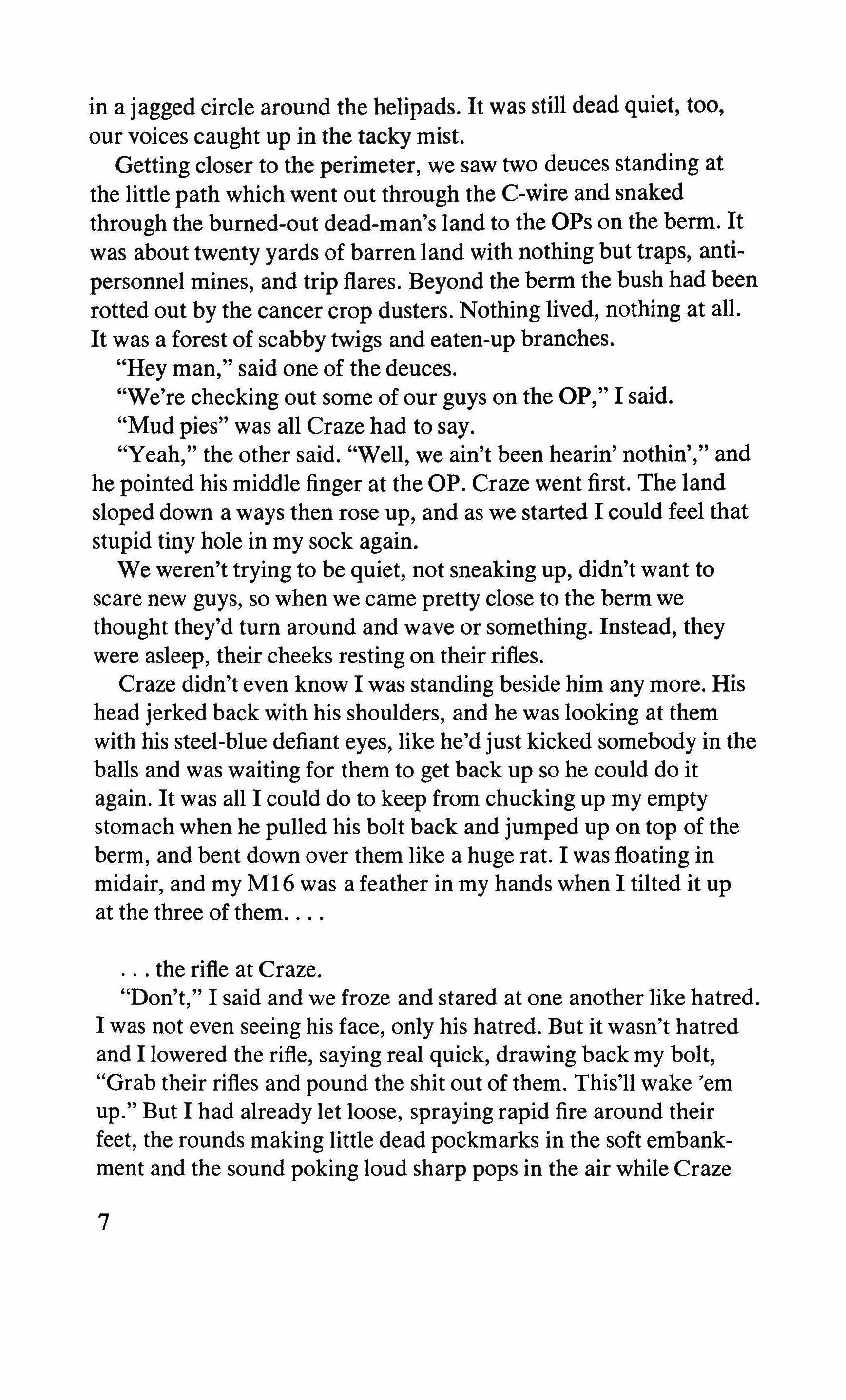
in a jagged circle around the helipads. It was still dead quiet, too, our voices caught up in the tacky mist.
Getting closer to the perimeter, we saw two deuces standing at the little path which went out through the C-wire and snaked through the burned-out dead-man's land to the OPs on the berm. It was about twenty yards of barren land with nothing but traps, antipersonnel mines, and trip flares. Beyond the berm the bush had been rotted out by the cancer crop dusters. Nothing lived, nothing at all. It was a forest of scabby twigs and eaten-up branches.
"Hey man," said one of the deuces.
"We're checking out some of our guys on the OP," I said.
"Mud pies" was all Craze had to say.
"Yeah," the other said. "Well, we ain't been hearin' nothin'," and he pointed his middle finger at the OP. Craze went first. The land sloped down a ways then rose up, and as we started I could feel that stupid tiny hole in my sock again.
We weren't trying to be quiet, not sneaking up, didn't want to scare new guys, so when we came pretty close to the berm we thought they'd turn around and wave or something. Instead, they were asleep, their cheeks resting on their rifles.
Craze didn't even know I was standing beside him any more. His head jerked back with his shoulders, and he was looking at them with his steel-blue defiant eyes, like he'd just kicked somebody in the balls and was waiting for them to get back up so he could do it again. It was all I could do to keep from chucking up my empty stomach when he pulled his bolt back and jumped up on top of the berm, and bent down over them like a huge rat. I was floating in midair, and my M 16 was a feather in my hands when I tilted it up at the three of them
the rifle at Craze.
"Don't," I said and we froze and stared at one another like hatred. I was not even seeing his face, only his hatred. But it wasn't hatred and I lowered the rifle, saying real quick, drawing back my bolt, "Grab their rifles and pound the shit out of them. This'll wake 'em up." But I had already let loose, spraying rapid fire around their feet, the rounds making little dead pockmarks in the soft embankment and the sound poking loud sharp pops in the air while Craze

was already on them like a fly on shit yanking out their M 16s right across their cheeks and swinging them out and up above his head, crisscrossing the butts down on their steel pots. It was a dull clunking hit, the butts ramming down on the lopsided pots, which almost fell off their heads when they started bolting up and squirming around as soon as I had let loose, but by the second and third clubbing the one was burying himself in the soft earth. The other was starting to panic. He was tall and plump and caught the stock at the side of his neck as he jumped up past me, his face stone white and jerking, twitching all over. I grabbed him by the collar and brought him back down on the ground and Craze stomped his foot on his chest, knocking the breath out of him. The other hadn't moved yet.
"What's the matter, mud pie? Were you having a bad dream?" said Craze real soft and slow through his hard breathing, like he was trying to calm him down and himself too. The guy wasn't looking at Craze; instead he was gazing straight up in a daze, catching his breath. Then his face beaded up all of a sudden, and his eyes turned red, wide open, and jerking around wild and fearful. Then he started to beg, and Craze just kept looking at him with his funny, conceited grin, like he was amazed and still enjoying it.
"Kill me! Go ahead. Go ahead. What are you waiting for? Kill me. Nobody has a chance here. Get it over with " I wanted to kick this sick bastard in the face, just kick him till he shut up. Craze was laughing, though, throwing his head back to one side, laughing hard. He flipped the guy's rifle over and pointed the muzzle in his face, still laughing.
"I've been known to oblige, but I hate worms," and on the word "worms" Craze's face went pasty. He said the word harsh and full of disgust, tapping the muzzle on the guy's upper lip and teeth, the blood spreading thin over the teeth and lips, then grabbing him by his jacket, almost picking him up off the ground, "I can be a real mean motherfucker, do you hear me, crud face?" shoving him back on the ground, the guy still begging, bringing his knees up to his chest and wrapping his arms around them tight.
I turned away and nudged the other one in the ass with my rifle.
"You get up and pick him up," I said, and he rolled over. His face was real red, blushing, real embarrassed because he'd pissed his
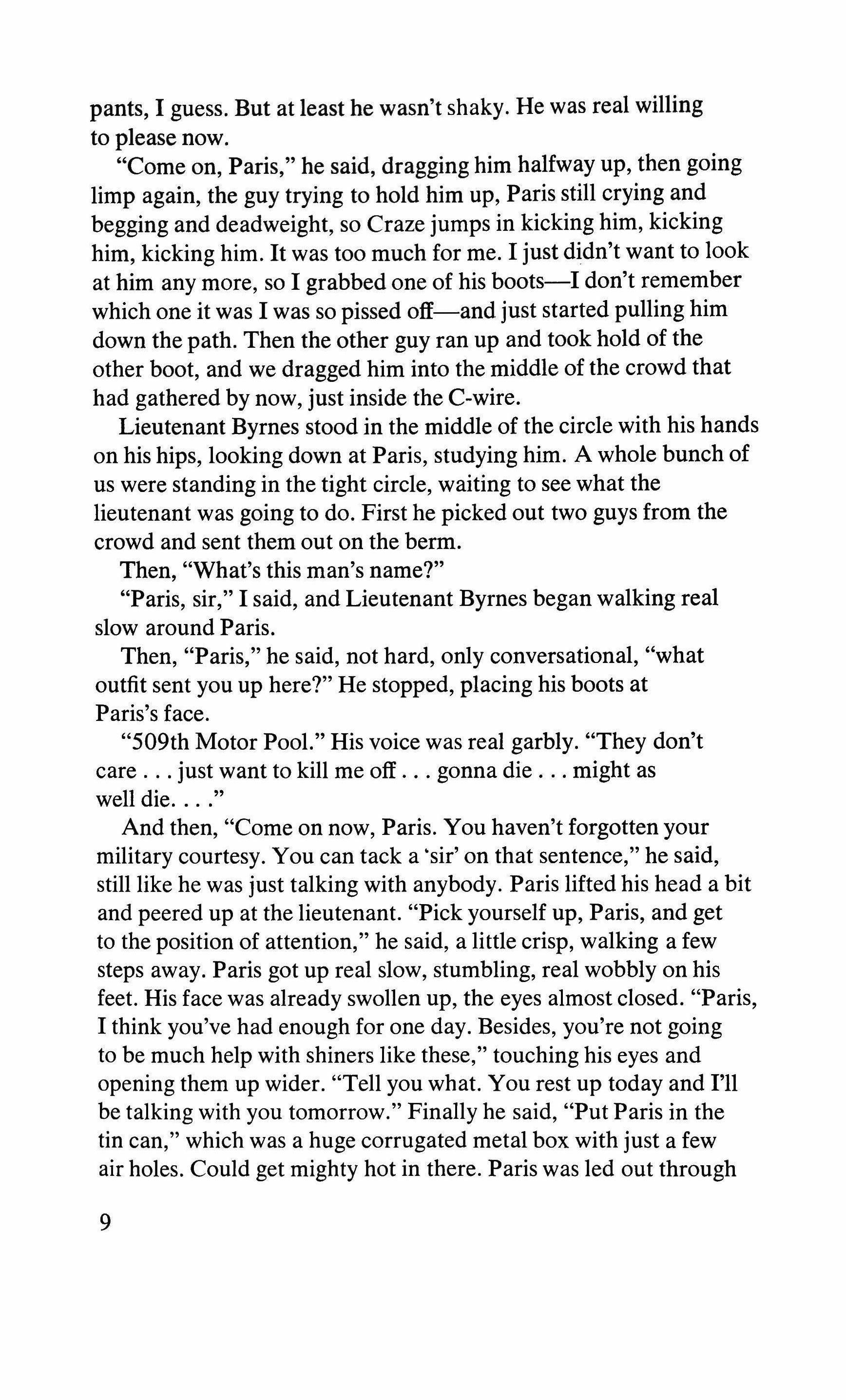
pants, I guess. But at least he wasn't shaky. He was real willing to please now.
"Come on, Paris," he said, dragging him halfway up, then going limp again, the guy trying to hold him up, Paris still crying and begging and deadweight, so Craze jumps in kicking him, kicking him, kicking him. It was too much for me. I just didn't want to look at him any more, so I grabbed one of his boots-I don't remember which one it was I was so pissed off-and just started pulling him down the path. Then the other guy ran up and took hold of the other boot, and we dragged him into the middle of the crowd that had gathered by now, just inside the C-wire.
Lieutenant Byrnes stood in the middle of the circle with his hands on his hips, looking down at Paris, studying him. A whole bunch of us were standing in the tight circle, waiting to see what the lieutenant was going to do. First he picked out two guys from the crowd and sent them out on the berm.
Then, "What's this man's name?"
"Paris, sir," I said, and Lieutenant Byrnes began walking real slow around Paris.
Then, "Paris," he said, not hard, only conversational, "what outfit sent you up here?" He stopped, placing his boots at Paris's face.
"509th Motor Pool." His voice was real garbly. "They don't care just want to kill me off gonna die might as well die
And then, "Come on now, Paris. You haven't forgotten your military courtesy. You can tack a 'sir' on that sentence," he said, still like he was just talking with anybody. Paris lifted his head a bit and peered up at the lieutenant. "Pick yourself up, Paris, and get to the position of attention," he said, a little crisp, walking a few steps away. Paris got up real slow, stumbling, real wobbly on his feet. His face was already swollen up, the eyes almost closed. "Paris, I think you've had enough for one day. Besides, you're not going to be much help with shiners like these," touching his eyes and opening them up wider. "Tell you what. You rest up today and I'll be talking with you tomorrow." Finally he said, "Put Paris in the tin can," which was a huge corrugated metal box with just a few air holes. Could get mighty hot in there. Paris was led out through
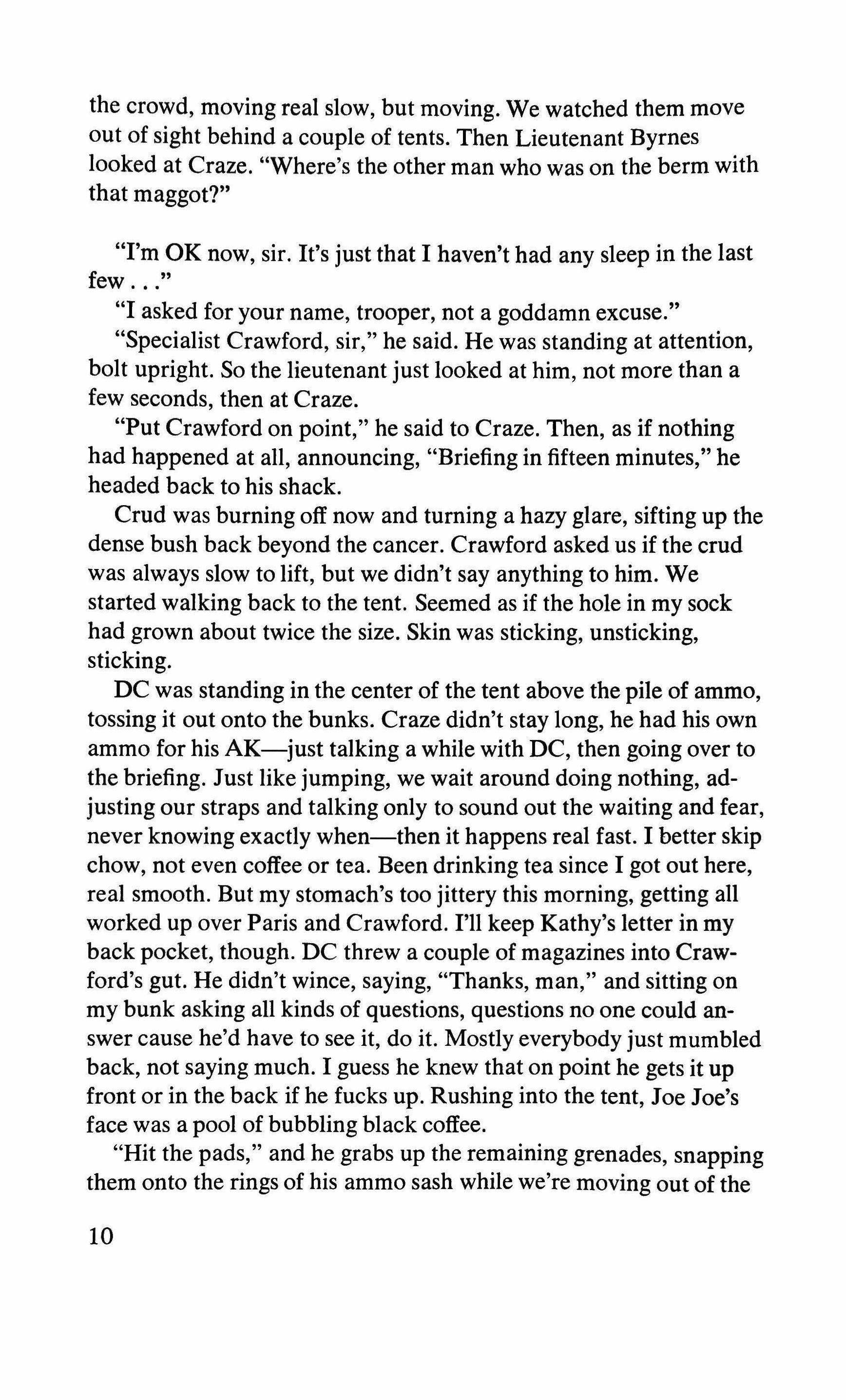
the crowd, moving real slow, but moving. We watched them move out of sight behind a couple of tents. Then Lieutenant Byrnes looked at Craze. "Where's the other man who was on the berm with that maggot?"
"I'm OK now, sir. It's just that I haven't had any sleep in the last f " ew
"I asked for your name, trooper, not a goddamn excuse."
"Specialist Crawford, sir," he said. He was standing at attention, bolt upright. So the lieutenant just looked at him, not more than a few seconds, then at Craze.
"Put Crawford on point," he said to Craze. Then, as if nothing had happened at all, announcing, "Briefing in fifteen minutes," he headed back to his shack.
Crud was burning off now and turning a hazy glare, sifting up the dense bush back beyond the cancer. Crawford asked us if the crud was always slow to lift, but we didn't say anything to him. We started walking back to the tent. Seemed as if the hole in my sock had grown about twice the size. Skin was sticking, unsticking, sticking.
DC was standing in the center of the tent above the pile of ammo, tossing it out onto the bunks. Craze didn't stay long, he had his own ammo for his AK-just talking a while with DC, then going over to the briefing. Just like jumping, we wait around doing nothing, adjusting our straps and talking only to sound out the waiting and fear, never knowing exactly when-then it happens real fast. I better skip chow, not even coffee or tea. Been drinking tea since I got out here, real smooth. But my stomach's too jittery this morning, getting all worked up over Paris and Crawford. I'll keep Kathy's letter in my back pocket, though. DC threw a couple of magazines into Crawford's gut. He didn't wince, saying, "Thanks, man," and sitting on my bunk asking all kinds of questions, questions no one could answer cause he'd have to see it, do it. Mostly everybody just mumbled back, not saying much. I guess he knew that on point he gets it up front or in the back if he fucks up. Rushing into the tent, Joe Joe's face was a pool of bubbling black coffee.
"Hit the pads," and he grabs up the remaining grenades, snapping them onto the rings of his ammo sash while we're moving out of the
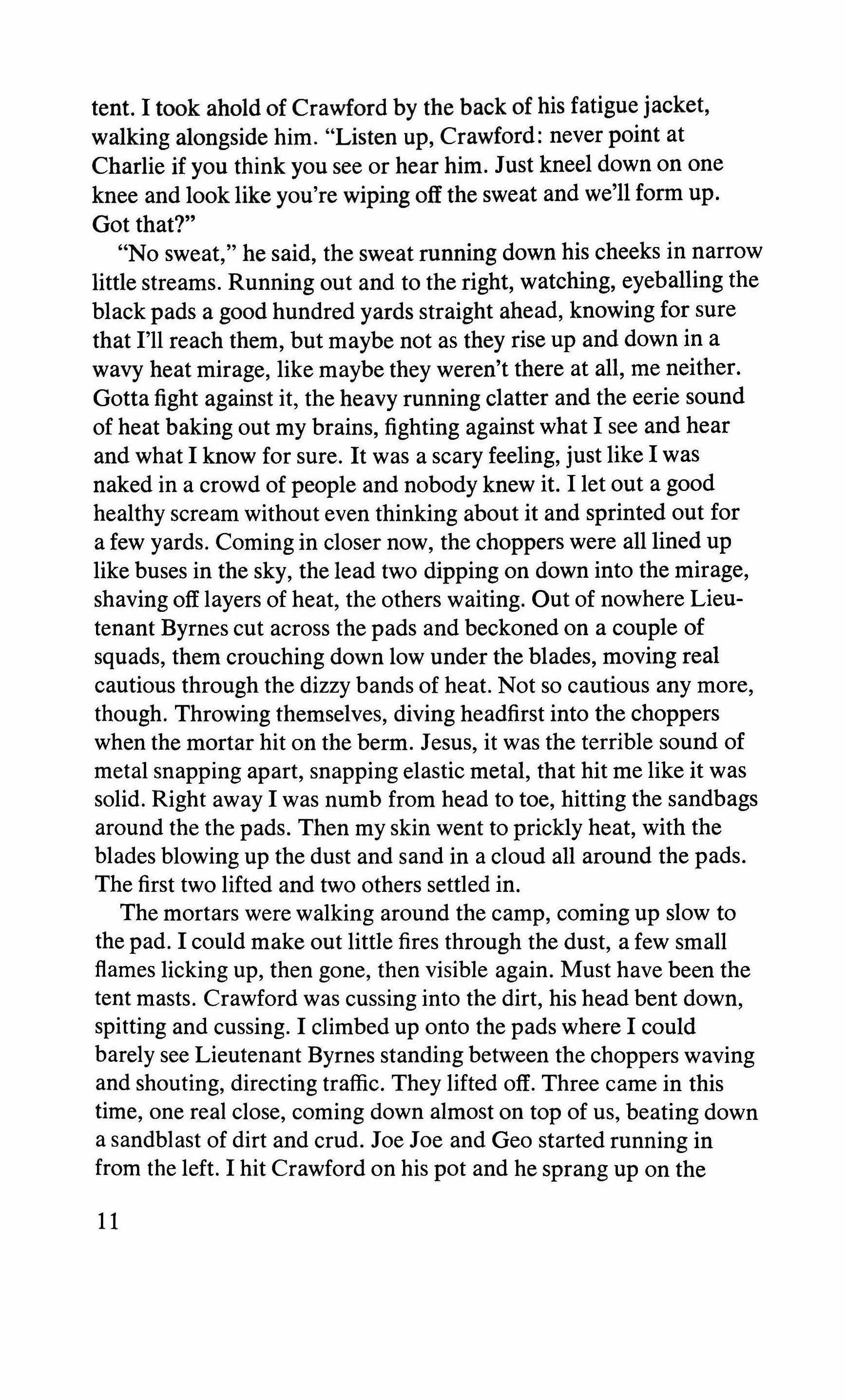
tent. I took ahold of Crawford by the back of his fatigue jacket, walking alongside him. "Listen up, Crawford: never point at Charlie if you think you see or hear him. Just kneel down on one knee and look like you're wiping off the sweat and we'll form up. Got that?"
"No sweat," he said, the sweat running down his cheeks in narrow little streams. Running out and to the right, watching, eyeballing the black pads a good hundred yards straight ahead, knowing for sure that I'll reach them, but maybe not as they rise up and down in a wavy heat mirage, like maybe they weren't there at all, me neither. Gotta fight against it, the heavy running clatter and the eerie sound of heat baking out my brains, fighting against what I see and hear and what I know for sure. It was a scary feeling, just like I was naked in a crowd of people and nobody knew it. I let out a good healthy scream without even thinking about it and sprinted out for a few yards. Coming in closer now, the choppers were all lined up like buses in the sky, the lead two dipping on down into the mirage, shaving off layers of heat, the others waiting. Out of nowhere Lieutenant Byrnes cut across the pads and beckoned on a couple of squads, them crouching down low under the blades, moving real cautious through the dizzy bands of heat. Not so cautious any more, though. Throwing themselves, diving headfirst into the choppers when the mortar hit on the berm. Jesus, it was the terrible sound of metal snapping apart, snapping elastic metal, that hit me like it was solid. Right away I was numb from head to toe, hitting the sandbags around the the pads. Then my skin went to prickly heat, with the blades blowing up the dust and sand in a cloud all around the pads. The first two lifted and two others settled in.
The mortars were walking around the camp, coming up slow to the pad. I could make out little fires through the dust, a few small flames licking up, then gone, then visible again. Must have been the tent masts. Crawford was cussing into the dirt, his head bent down, spitting and cussing. I climbed up onto the pads where I could barely see Lieutenant Byrnes standing between the choppers waving and shouting, directing traffic. They lifted off. Three came in this time, one real close, coming down almost on top of us, beating down a sandblast of dirt and crud. Joe Joe and Geo started running in from the left. I hit Crawford on his pot and he sprang up on the

pads, pulling up DC and Craze hand in hand. The big Huey was hovering about waist high, and it was like he somersaulted into the door when Geo jumped in. Sure felt mighty good as my hands hit the hot deck, lifting myself in and rolling back. Then the rest of us, coming out of the dust storm, filling the open door, then a real white flash after Craze tumbled in, the chopper lifting and receiving a kick in the bottom from a mortar frag. It just thumped and stuck and all of us looked at one another, then cheered. Airborne, swinging out, then swinging back, then arcing around the camp, seeing the other choppers coming in. It lifted real rough; then, as we got some altitude, it smoothed out. We were watching the camp, Geo and I, the fires and the choppers, the mortars hitting back further from the pads now, some of them hitting in the dead-man's land, touching off trip flares and some anti-personnel mines. I guess we thought about it at the same time we saw Paris stumbling around blindlike waving his one arm, the other's upper half wasn't there. He was heading into dead-man's land when I closed my eyes
"Sorry 'bout that," said the door gunner. I heard him say it and I knew he was watching, talking about Paris, but I couldn't look. We were too far up, beyond the reach of his cries or the sound of the explosions and caught up in the wack-whoosh of the rotary blades, but still it was like how he said it, kind of "Oh well, it's just one of those things"; not sad, not angry at Charlie, just an average ordinary fact in a stupid fact book.
The heat and sweat were itching all over my face, a real case of the crud bugs crawling all over and buzzing in the ears. I set my pot between my knees, rubbed my two hands over my face and head, wiping off the sweat and opening my eyes. We were getting on, moving along behind the other choppers in a line, pretty high up above tree level.
I guess the DZ wasn't too far off. DC was handing out the D-rings, and he was saying we were gonna have to slide down. I never did it before, but they say it isn't any harder than jumping. It's supposed to be safer cause it's real quick, making a tough target for Charlie.
"Stew," said DC, handing me a D-ring and crawling over beside me, the crud already seeping into his fatigue jacket around his shoulders, arms, and back, soaking it black, "you ever rope-jump before?"
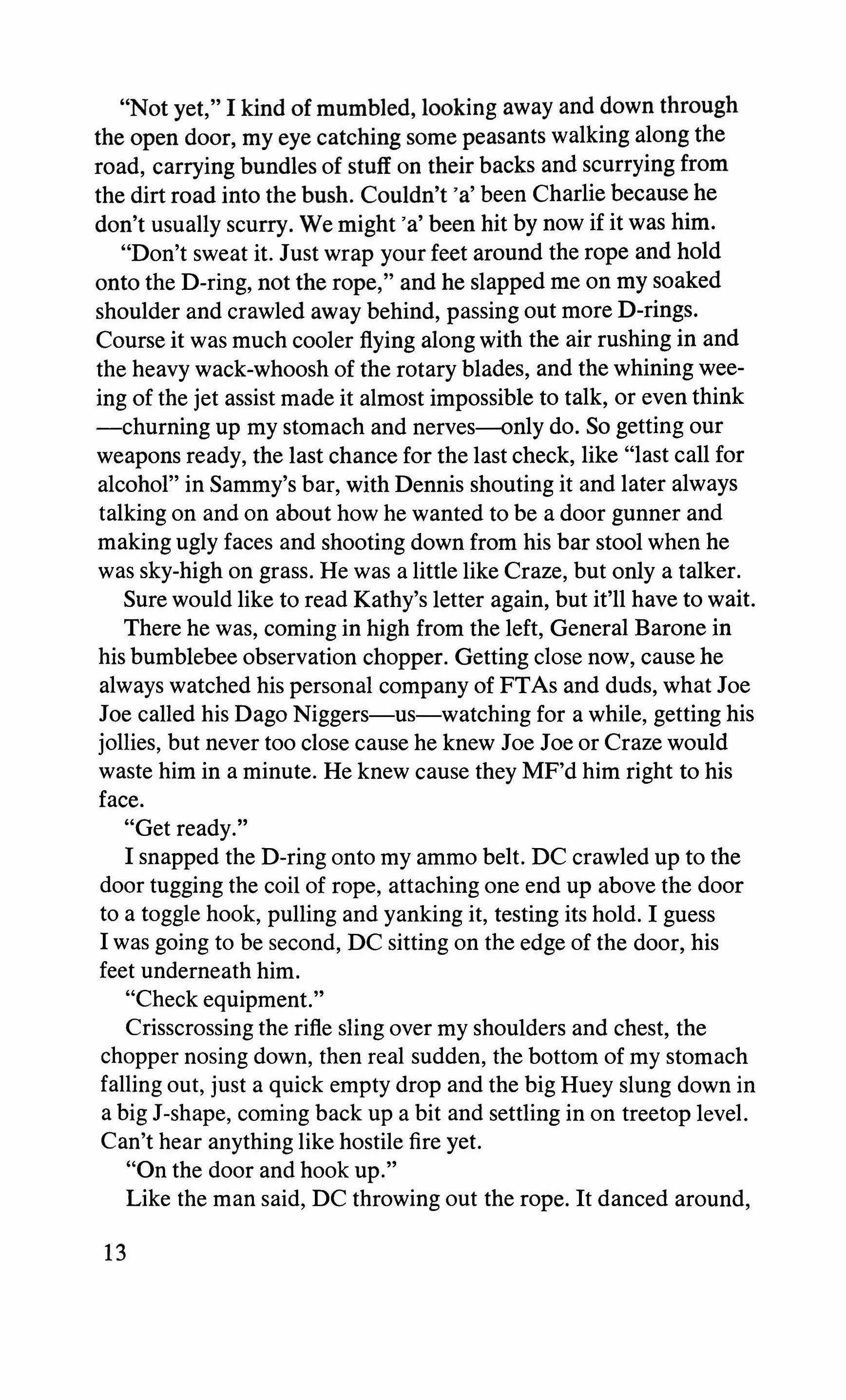
"Not yet," I kind of mumbled, looking away and down through the open door, my eye catching some peasants walking along the road, carrying bundles of stuff on their backs and scurrying from the dirt road into the bush. Couldn't 'a' been Charlie because he don't usually scurry. We might 'a' been hit by now if it was him.
"Don't sweat it. Just wrap your feet around the rope and hold onto the D-ring, not the rope," and he slapped me on my soaked shoulder and crawled away behind, passing out more D-rings. Course it was much cooler flying along with the air rushing in and the heavy wack-whoosh of the rotary blades, and the whining weeing of the jet assist made it almost impossible to talk, or even think -churning up my stomach and nerves-only do. So getting our weapons ready, the last chance for the last check, like "last call for alcohol" in Sammy's bar, with Dennis shouting it and later always talking on and on about how he wanted to be a door gunner and making ugly faces and shooting down from his bar stool when he was sky-high on grass. He was a little like Craze, but only a talker.
Sure would like to read Kathy's letter again, but it'll have to wait. There he was, coming in high from the left, General Barone in his bumblebee observation chopper. Getting close now, cause he always watched his personal company of FTAs and duds, what Joe Joe called his Dago Niggers-us-watching for a while, getting his jollies, but never too close cause he knew Joe Joe or Craze would waste him in a minute. He knew cause they MF'd him right to his face.
"Get ready."
I snapped the D-ring onto my ammo belt. DC crawled up to the door tugging the coil of rope, attaching one end up above the door to a toggle hook, pulling and yanking it, testing its hold. I guess I was going to be second, DC sitting on the edge of the door, his feet underneath him.
"Check equipment."
Crisscrossing the rifle sling over my shoulders and chest, the chopper nosing down, then real sudden, the bottom of my stomach falling out, just a quick empty drop and the big Huey slung down in a big J-shape, coming back up a bit and settling in on treetop level. Can't hear anything like hostile fire yet.
"On the door and hook up."
Like the man said, DC throwing out the rope. It danced around,
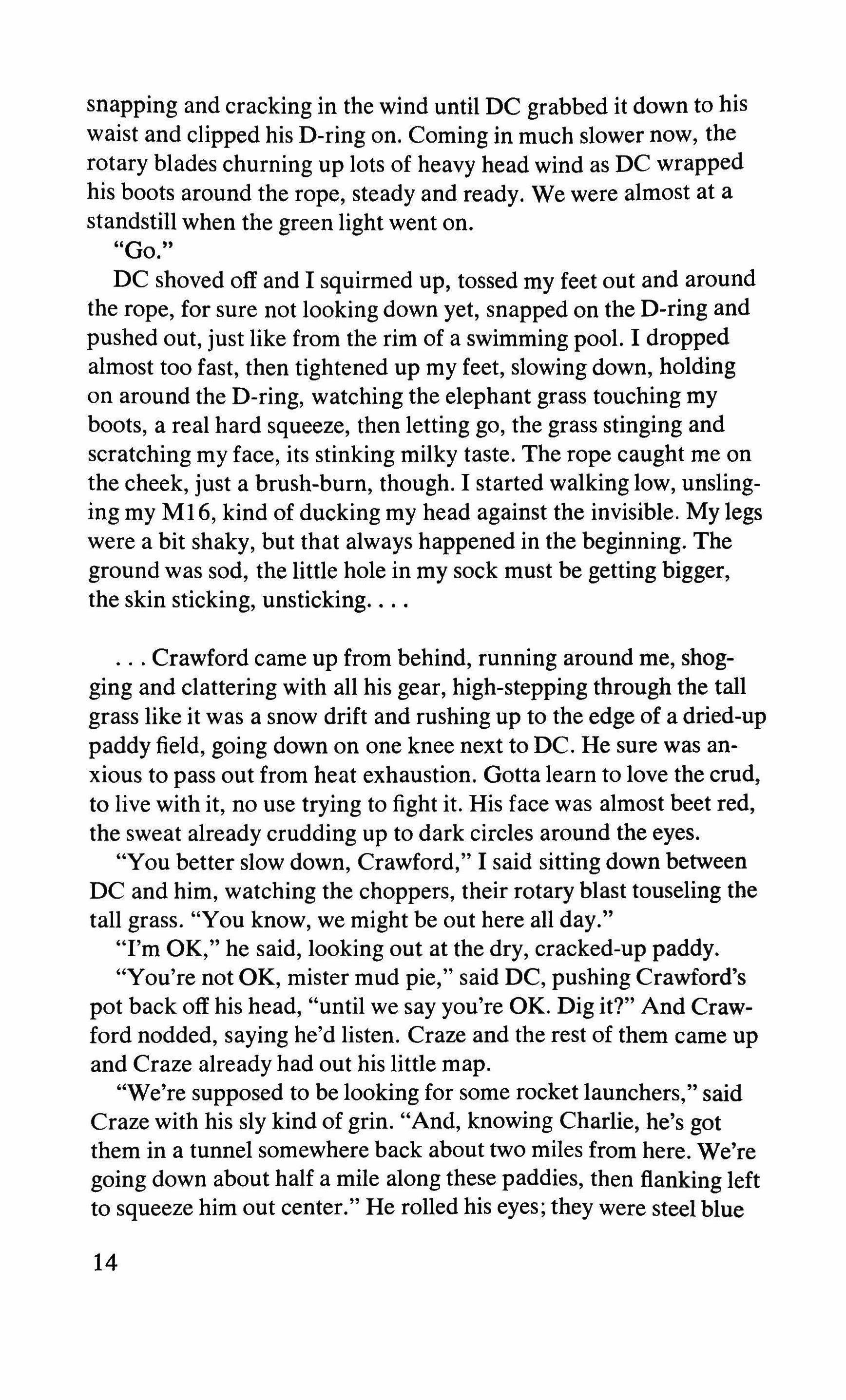
snapping and cracking in the wind until DC grabbed it down to his waist and clipped his D-ring on. Coming in much slower now, the rotary blades churning up lots of heavy head wind as DC wrapped his boots around the rope, steady and ready. We were almost at a standstill when the green light went on.
"Go."
DC shoved off and I squirmed up, tossed my feet out and around the rope, for sure not looking down yet, snapped on the D-ring and pushed out, just like from the rim of a swimming pool. I dropped almost too fast, then tightened up my feet, slowing down, holding on around the D-ring, watching the elephant grass touching my boots, a real hard squeeze, then letting go, the grass stinging and scratching my face, its stinking milky taste. The rope caught me on the cheek, just a brush-burn, though. I started walking low, unslinging my M16, kind of ducking my head against the invisible. My legs were a bit shaky, but that always happened in the beginning. The ground was sad, the little hole in my sock must be getting bigger, the skin sticking, unsticking
Crawford came up from behind, running around me, shogging and clattering with all his gear, high-stepping through the tall grass like it was a snow drift and rushing up to the edge of a dried-up paddy field, going down on one knee next to DC. He sure was anxious to pass out from heat exhaustion. Gotta learn to love the crud, to live with it, no use trying to fight it. His face was almost beet red, the sweat already crudding up to dark circles around the eyes.
"You better slow down, Crawford," I said sitting down between DC and him, watching the choppers, their rotary blast touseling the tall grass. "You know, we might be out here all day."
"I'm OK," he said, looking out at the dry, cracked-up paddy.
"You're not OK, mister mud pie," said DC, pushing Crawford's pot back off his head, "until we say you're OK. Dig it?" And Crawford nodded, saying he'd listen. Craze and the rest of them came up and Craze already had out his little map.
"We're supposed to be looking for some rocket launchers," said Craze with his sly kind of grin. "And, knowing Charlie, he's got them in a tunnel somewhere back about two miles from here. We're going down about half a mile along these paddies, then flanking left to squeeze him out center." He rolled his eyes; they were steel blue
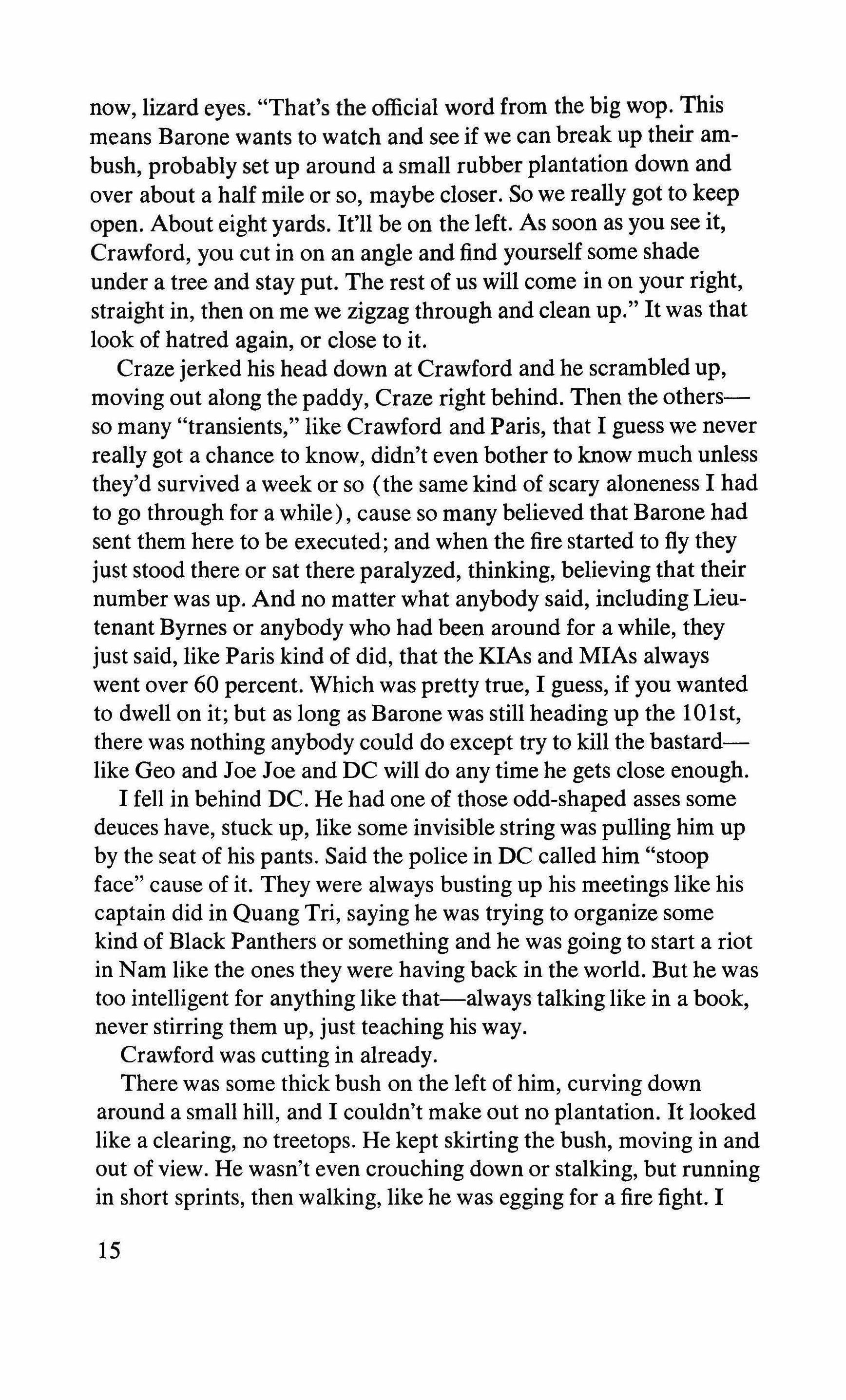
now, lizard eyes. "That's the official word from the big wop. This means Barone wants to watch and see if we can break up their ambush, probably set up around a small rubber plantation down and over about a half mile or so, maybe closer. So we really got to keep open. About eight yards. It'll be on the left. As soon as you see it, Crawford, you cut in on an angle and find yourself some shade under a tree and stay put. The rest of us will come in on your right, straight in, then on me we zigzag through and clean up." It was that look of hatred again, or close to it.
Craze jerked his head down at Crawford and he scrambled up, moving out along the paddy, Craze right behind. Then the othersso many "transients," like Crawford and Paris, that I guess we never really got a chance to know, didn't even bother to know much unless they'd survived a week or so (the same kind of scary aloneness I had to go through for a while), cause so many believed that Barone had sent them here to be executed; and when the fire started to fly they just stood there or sat there paralyzed, thinking, believing that their number was up. And no matter what anybody said, including Lieutenant Byrnes or anybody who had been around for a while, they just said, like Paris kind of did, that the KIAs and MIAs always went over 60 percent. Which was pretty true, I guess, if you wanted to dwell on it; but as long as Barone was still heading up the 101st, there was nothing anybody could do except try to kill the bastardlike Geo and Joe Joe and DC will do any time he gets close enough. I fell in behind DC. He had one of those odd-shaped asses some deuces have, stuck up, like some invisible string was pulling him up by the seat of his pants. Said the police in DC called him "stoop face" cause of it. They were always busting up his meetings like his captain did in Quang Tri, saying he was trying to organize some kind of Black Panthers or something and he was going to start a riot in Nam like the ones they were having back in the world. But he was too intelligent for anything like that-always talking like in a book, never stirring them up, just teaching his way.
Crawford was cutting in already.
There was some thick bush on the left of him, curving down around a small hill, and I couldn't make out no plantation. It looked like a clearing, no treetops. He kept skirting the bush, moving in and out of view. He wasn't even crouching down or stalking, but running in short sprints, then walking, like he was egging for a fire fight. I

wanted to hurry like him myself, get it over with, but I had to force myself to ease up. Then he disappeared into an empty space. I couldn't yet make it out. The small berm around the paddy across from where he disappeared, just up ahead of Craze to his right, had been built up more, like the paddy had been cleared or harvested. Then Craze took off, leaping up on the higher berm, dancing sidestraddle, beckoning the others to hurry. Then I saw it. The trees had been cut-the stumps a good two feet, the trunks cut into four-foot sections. Charlie never cut trees; leave it to the 101st to set up a perfect ambush for itself. Craze danced around, waving his arms; couldn't draw any fire, not yet.
Saw Geo and the others flanking in now. Starting to jog, watching behind, Joe Joe bringing up the rear, everybody moving steady, still feeling my skin sticking, unsticking like adhesive tape. DC ran past Craze, who waved me up to the berm. It was only a couple of feet higher but softer; even the paddy was partially flooded, full of shoots and grassy stuff. Standing next to him, watching the felled plantation, he said, "What do you think?" But I couldn't talk, everything churning around and nervous. I just wanted to scream, to shake it off. I forced myself, saying it too loud, "Ambush."
"Yeah, but from where?" and turning around, looking anywhere, then watching the paddy, tugging on his sleeve, and when he saw it too we both knew it was all over. It was just like somebody had reached up from behind and underneath and pulled everything down and out: tongue, throat, stomach, guts, and it was still flowing as we both jumped into the paddy, waist deep
but he'd already been dead, drowned maybe, the skin crimped and wrinkled, drawn tight against the skull like leather, the eyes staring back into their sockets. It took us a few seconds or so, just gaping at him, floating and moving toward us; impossible, something or someone must be pushing him. No, but pulling, the vine or something breaking the water, swerving behind and just barely seeing through the muddy geyser from the exploding body a couple of Charlie emerging from the berm. Thrown against the muck, a kind of wave smashing me, feeling giddy from my ringing ears, I couldn't even hear the rounds popping off, only the rifle kicking around in a temper tantrum, trying to hold it straight, pointing it to where I had seen Charlie.
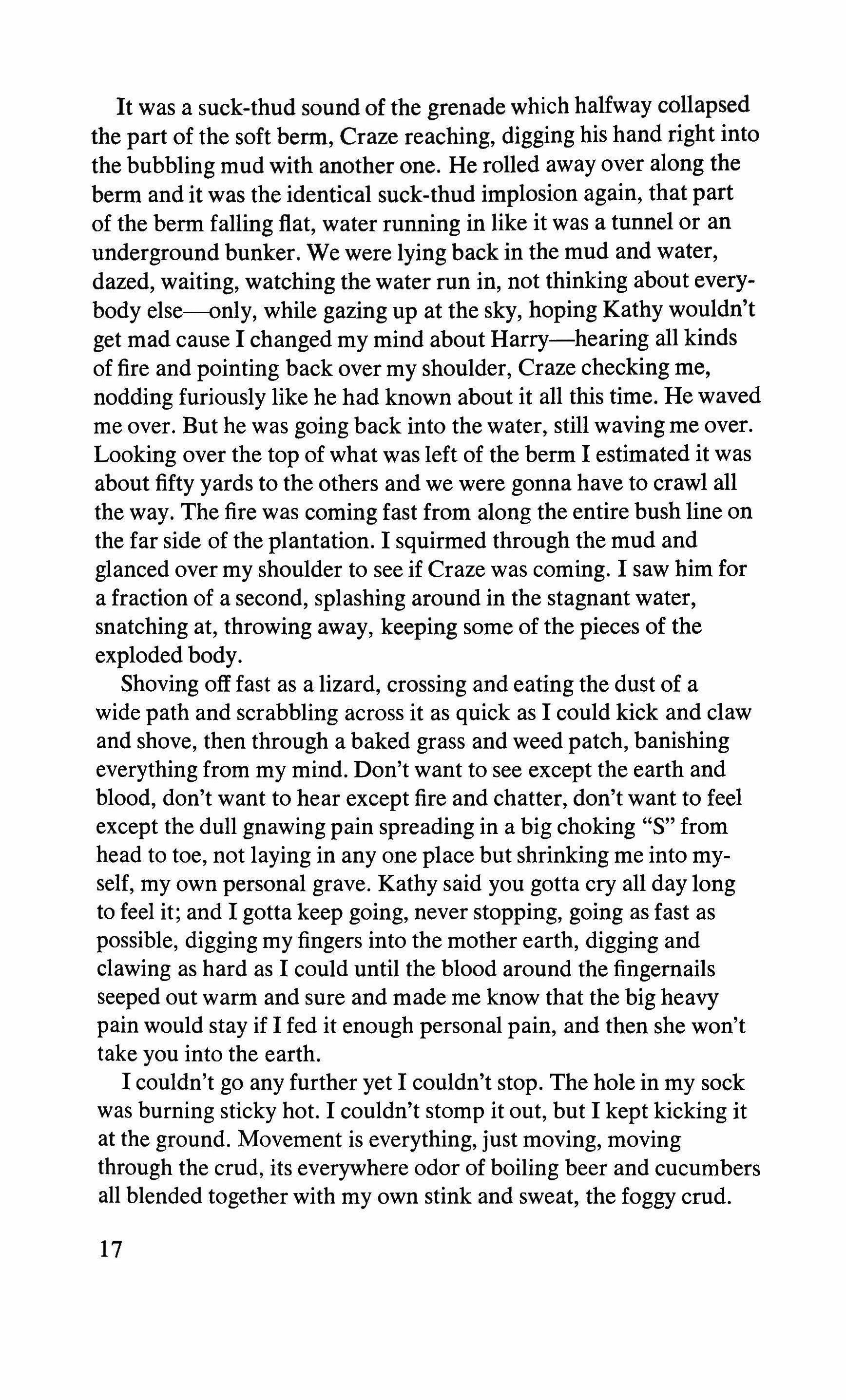
It was a suck-thud sound of the grenade which halfway collapsed the part of the soft berm, Craze reaching, digging his hand right into the bubbling mud with another one. He rolled away over along the berm and it was the identical suck-thud implosion again, that part of the berm falling fiat, water running in like it was a tunnel or an underground bunker. We were lying back in the mud and water, dazed, waiting, watching the water run in, not thinking about everybody else-only, while gazing up at the sky, hoping Kathy wouldn't get mad cause I changed my mind about Harry-hearing all kinds of fire and pointing back over my shoulder, Craze checking me, nodding furiously like he had known about it all this time. He waved me over. But he was going back into the water, still waving me over. Looking over the top of what was left of the berm I estimated it was about fifty yards to the others and we were gonna have to crawl all the way. The fire was coming fast from along the entire bush line on the far side of the plantation. I squirmed through the mud and glanced over my shoulder to see if Craze was coming. I saw him for a fraction of a second, splashing around in the stagnant water, snatching at, throwing away, keeping some of the pieces of the exploded body.
Shoving off fast as a lizard, crossing and eating the dust of a wide path and scrabbling across it as quick as I could kick and claw and shove, then through a baked grass and weed patch, banishing everything from my mind. Don't want to see except the earth and blood, don't want to hear except fire and chatter, don't want to feel except the dull gnawing pain spreading in a big choking "S" from head to toe, not laying in anyone place but shrinking me into myself, my own personal grave. Kathy said you gotta cry all daylong to feel it; and I gotta keep going, never stopping, going as fast as possible, digging my fingers into the mother earth, digging and clawing as hard as I could until the blood around the fingernails seeped out warm and sure and made me know that the big heavy pain would stay if I fed it enough personal pain, and then she won't take you into the earth.
I couldn't go any further yet I couldn't stop. The hole in my sock was burning sticky hot. I couldn't stomp it out, but I kept kicking it at the ground. Movement is everything, just moving, moving through the crud, its everywhere odor of boiling beer and cucumbers all blended together with my own stink and sweat, the foggy crud.
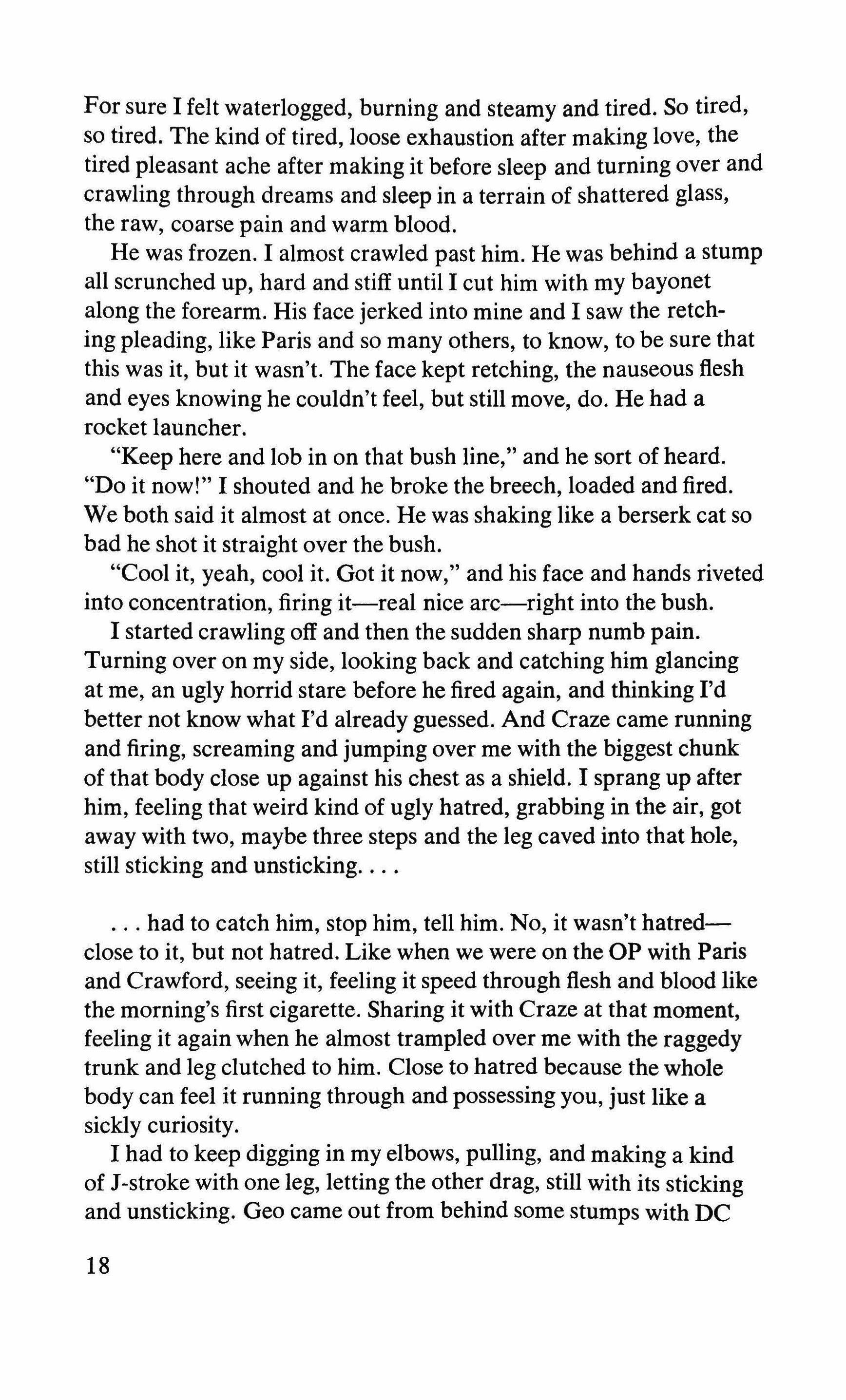
For sure I felt waterlogged, burning and steamy and tired. So tired, so tired. The kind of tired, loose exhaustion after making love, the tired pleasant ache after making it before sleep and turning over and crawling through dreams and sleep in a terrain of shattered glass, the raw, coarse pain and warm blood.
He was frozen. I almost crawled past him. He was behind a stump all scrunched up, hard and stiff until I cut him with my bayonet along the forearm. His face jerked into mine and I saw the retching pleading, like Paris and so many others, to know, to be sure that this was it, but it wasn't. The face kept retching, the nauseous flesh and eyes knowing he couldn't feel, but still move, do. He had a rocket launcher.
"Keep here and lob in on that bush line," and he sort of heard. "Do it now!" I shouted and he broke the breech, loaded and fired. We both said it almost at once. He was shaking like a berserk cat so bad he shot it straight over the bush.
"Cool it, yeah, cool it. Got it now," and his face and hands riveted into concentration, firing it-real nice arc-right into the bush.
I started crawling off and then the sudden sharp numb pain. Turning over on my side, looking back and catching him glancing at me, an ugly horrid stare before he fired again, and thinking I'd better not know what I'd already guessed. And Craze came running and firing, screaming and jumping over me with the biggest chunk of that body close up against his chest as a shield. I sprang up after him, feeling that weird kind of ugly hatred, grabbing in the air, got away with two, maybe three steps and the leg caved into that hole, still sticking and unsticking
had to catch him, stop him, tell him. No, it wasn't hatredclose to it, but not hatred. Like when we were on the OP with Paris and Crawford, seeing it, feeling it speed through flesh and blood like the morning's first cigarette. Sharing it with Craze at that moment, feeling it again when he almost trampled over me with the raggedy trunk and leg clutched to him. Close to hatred because the whole body can feel it running through and possessing you, just like a sickly curiosity.
I had to keep digging in my elbows, pulling, and making a kind of I-stroke with one leg, letting the other drag, still with its sticking and unsticking. Geo came out from behind some stumps with DC
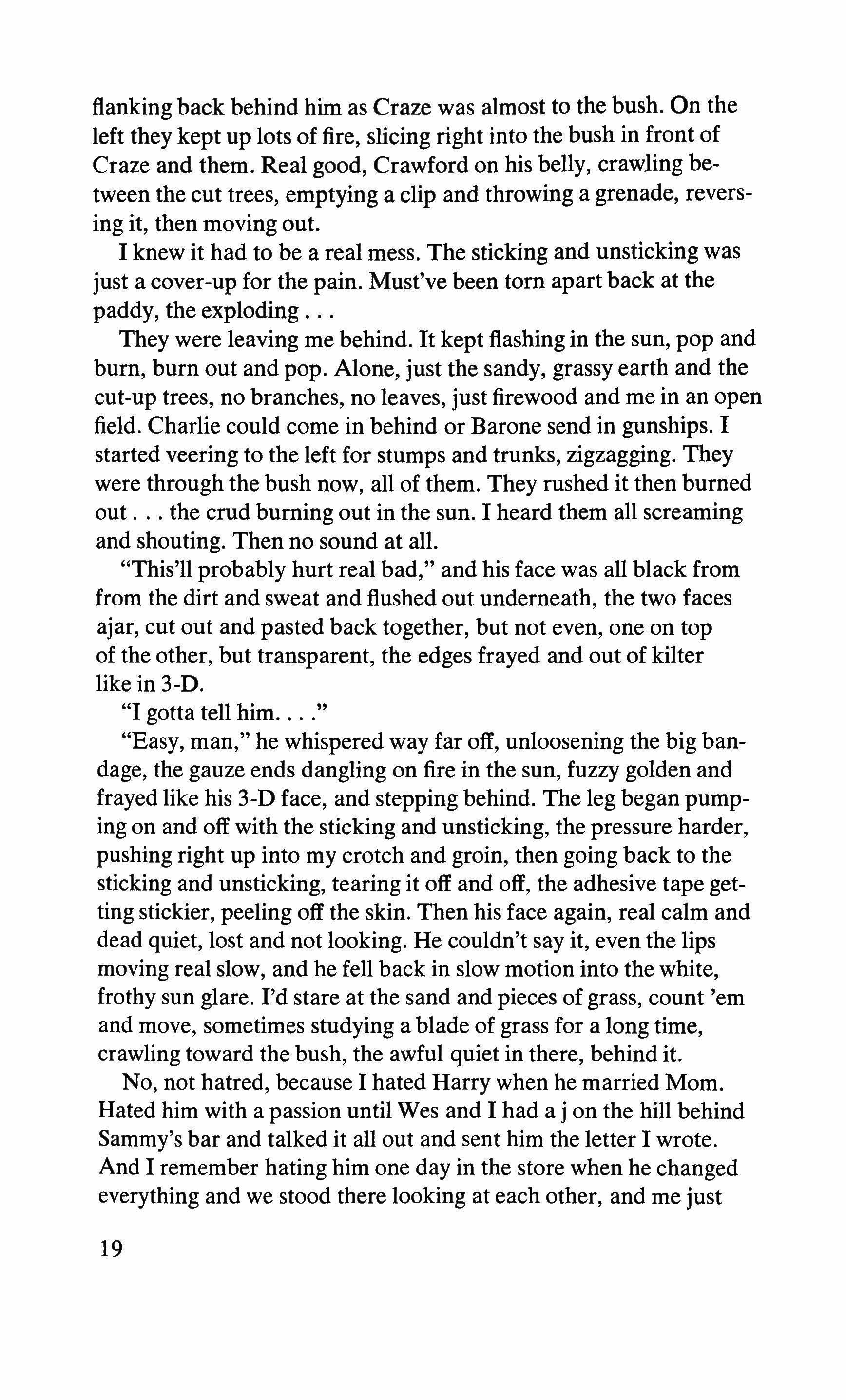
flanking back behind him as Craze was almost to the bush. On the left they kept up lots of fire, slicing right into the bush in front of Craze and them. Real good, Crawford on his belly, crawling between the cut trees, emptying a clip and throwing a grenade, reversing it, then moving out.
I knew it had to be a real mess. The sticking and unsticking was just a cover-up for the pain. Must've been torn apart back at the paddy, the exploding
They were leaving me behind. It kept flashing in the sun, pop and burn, burn out and pop. Alone, just the sandy, grassy earth and the cut-up trees, no branches, no leaves, just firewood and me in an open field. Charlie could come in behind or Barone send in gunships. I started veering to the left for stumps and trunks, zigzagging. They were through the bush now, all of them. They rushed it then burned out the crud burning out in the sun. I heard them all screaming and shouting. Then no sound at all.
"This'll probably hurt real bad," and his face was all black from from the dirt and sweat and flushed out underneath, the two faces ajar, cut out and pasted back together, but not even, one on top of the other, but transparent, the edges frayed and out of kilter like in 3-D.
"I gotta tell him "
"Easy, man," he whispered way far off, unloosening the big bandage, the gauze ends dangling on fire in the sun, fuzzy golden and frayed like his 3-D face, and stepping behind. The leg began pumping on and off with the sticking and unsticking, the pressure harder, pushing right up into my crotch and groin, then going back to the sticking and unsticking, tearing it off and off, the adhesive tape getting stickier, peeling off the skin. Then his face again, real calm and dead quiet, lost and not looking. He couldn't say it, even the lips moving real slow, and he fell back in slow motion into the white, frothy sun glare. I'd stare at the sand and pieces of grass, count 'em and move, sometimes studying a blade of grass for a long time, crawling toward the bush, the awful quiet in there, behind it.
No, not hatred, because I hated Harry when he married Mom. Hated him with a passion until Wes and I had a j on the hill behind Sammy's bar and talked it all out and sent him the letter I wrote. And I remember hating him one day in the store when he changed everything and we stood there looking at each other, and me just
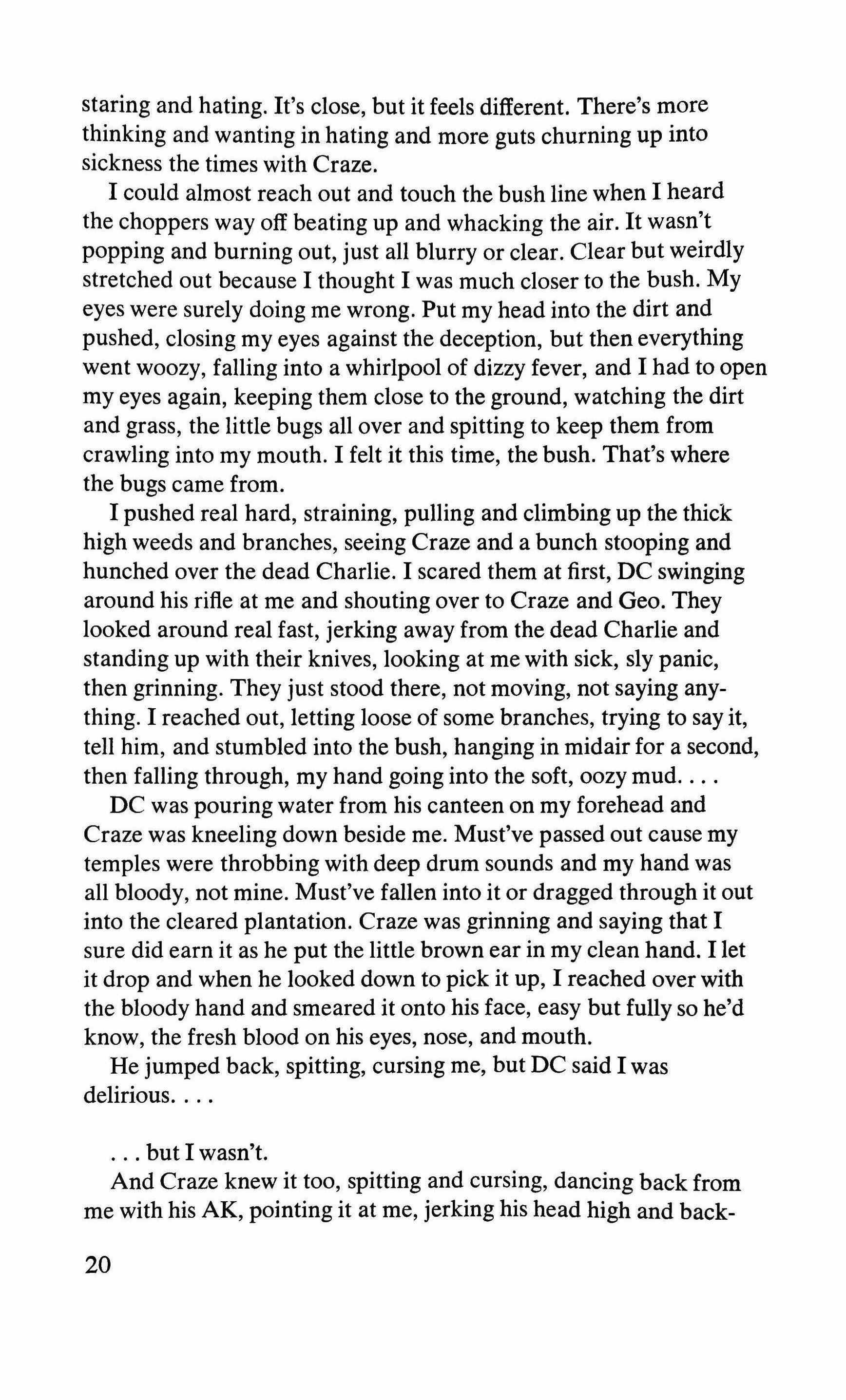
staring and hating. It's close, but it feels different. There's more thinking and wanting in hating and more guts churning up into sickness the times with Craze.
I could almost reach out and touch the bush line when I heard the choppers way off beating up and whacking the air. It wasn't popping and burning out, just all blurry or clear. Clear but weirdly stretched out because I thought I was much closer to the bush. My eyes were surely doing me wrong. Put my head into the dirt and pushed, closing my eyes against the deception, but then everything went woozy, falling into a whirlpool of dizzy fever, and I had to open my eyes again, keeping them close to the ground, watching the dirt and grass, the little bugs all over and spitting to keep them from crawling into my mouth. I felt it this time, the bush. That's where the bugs came from.
I pushed real hard, straining, pulling and climbing up the thick high weeds and branches, seeing Craze and a bunch stooping and hunched over the dead Charlie. I scared them at first, DC swinging around his rifle at me and shouting over to Craze and Geo. They looked around real fast, jerking away from the dead Charlie and standing up with their knives, looking at me with sick, sly panic, then grinning. They just stood there, not moving, not saying anything. I reached out, letting loose of some branches, trying to say it, tell him, and stumbled into the bush, hanging in midair for a second, then falling through, my hand going into the soft, oozy mud
DC was pouring water from his canteen on my forehead and Craze was kneeling down beside me. Must've passed out cause my temples were throbbing with deep drum sounds and my hand was all bloody, not mine. Must've fallen into it or dragged through it out into the cleared plantation. Craze was grinning and saying that I sure did earn it as he put the little brown ear in my clean hand. I let it drop and when he looked down to pick it up, I reached over with the bloody hand and smeared it onto his face, easy but fully so he'd know, the fresh blood on his eyes, nose, and mouth.
He jumped back, spitting, cursing me, but DC said I was delirious
but I wasn't.
And Craze knew it too, spitting and cursing, dancing back from me with his AK, pointing it at me, jerking his head high and back-
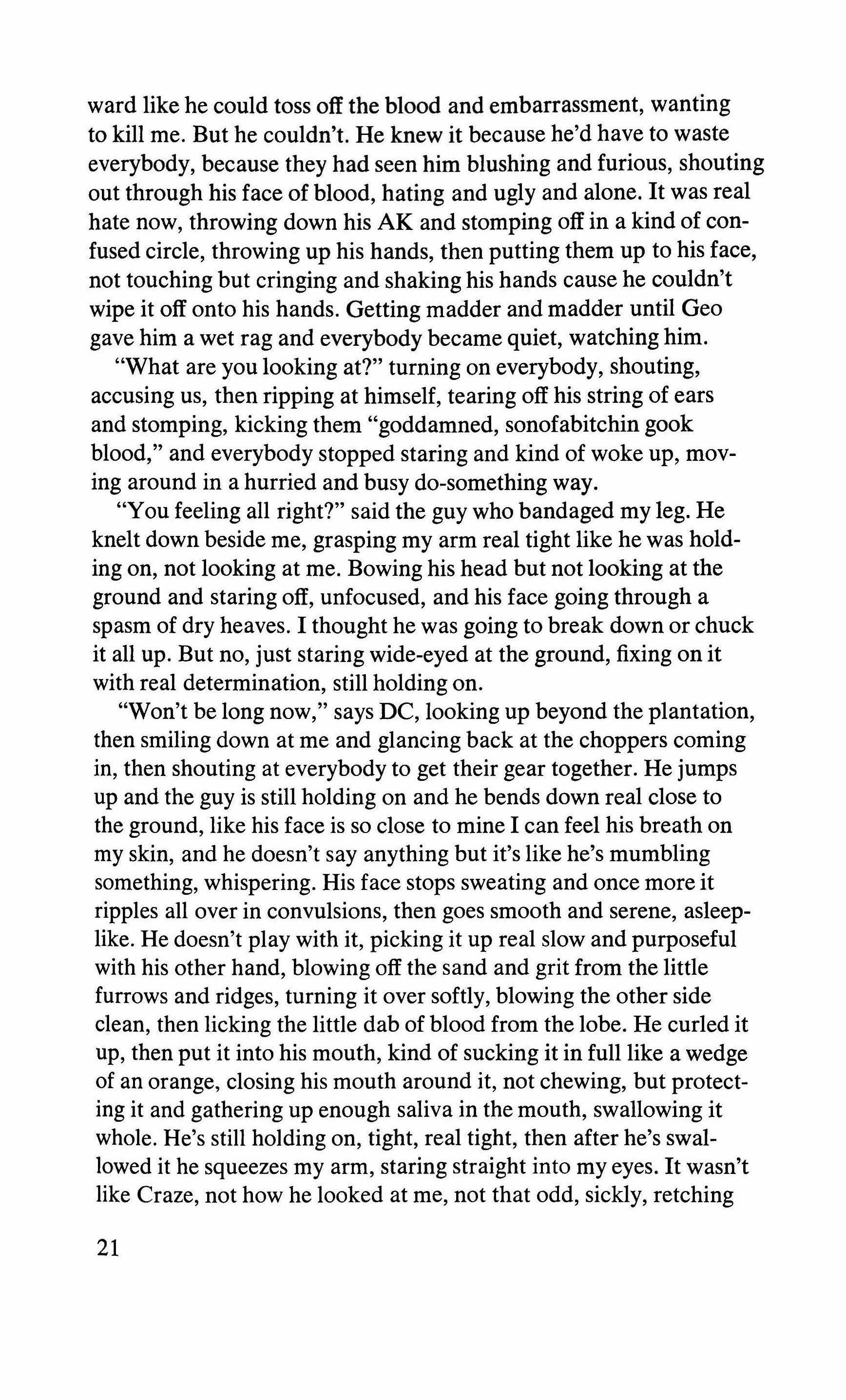
ward like he could toss off the blood and embarrassment, wanting to kill me. But he couldn't. He knew it because he'd have to waste everybody, because they had seen him blushing and furious, shouting out through his face of blood, hating and ugly and alone. It was real hate now, throwing down his AK and stomping off in a kind of confused circle, throwing up his hands, then putting them up to his face, not touching but cringing and shaking his hands cause he couldn't wipe it off onto his hands. Getting madder and madder until Geo gave him a wet rag and everybody became quiet, watching him.
"What are you looking at?" turning on everybody, shouting, accusing us, then ripping at himself, tearing off his string of ears and stomping, kicking them "goddamned, sonofabitchin gook blood," and everybody stopped staring and kind of woke up, moving around in a hurried and busy do-something way.
"You feeling all right?" said the guy who bandaged my leg. He knelt down beside me, grasping my arm real tight like he was holding on, not looking at me. Bowing his head but not looking at the ground and staring off, unfocused, and his face going through a spasm of dry heaves. I thought he was going to break down or chuck it all up. But no, just staring wide-eyed at the ground, fixing on it with real determination, still holding on.
"Won't be long now," says DC, looking up beyond the plantation, then smiling down at me and glancing back at the choppers coming in, then shouting at everybody to get their gear together. He jumps up and the guy is still holding on and he bends down real close to the ground, like his face is so close to mine I can feel his breath on my skin, and he doesn't say anything but it's like he's mumbling something, whispering. His face stops sweating and once more it ripples all over in convulsions, then goes smooth and serene, asleeplike. He doesn't play with it, picking it up real slow and purposeful with his other hand, blowing off the sand and grit from the little furrows and ridges, turning it over softly, blowing the other side clean, then licking the little dab of blood from the lobe. He curled it up, then put it into his mouth, kind of sucking it in full like a wedge of an orange, closing his mouth around it, not chewing, but protecting it and gathering up enough saliva in the mouth, swallowing it whole. He's still holding on, tight, real tight, then after he's swallowed it he squeezes my arm, staring straight into my eyes. It wasn't like Craze, not how he looked at me, not that odd, sickly, retching
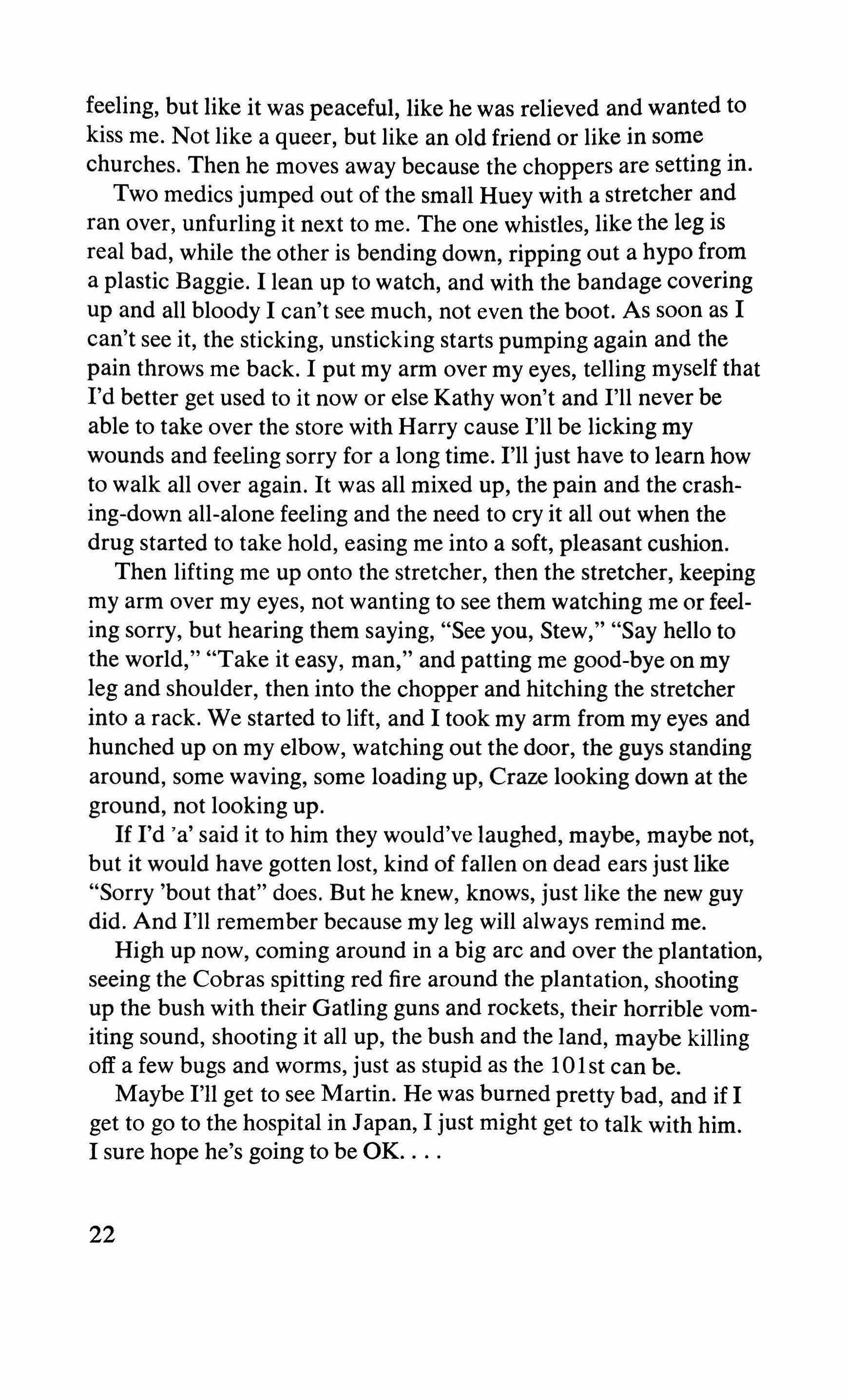
feeling, but like it was peaceful, like he was relieved and wanted to kiss me. Not like a queer, but like an old friend or like in some churches. Then he moves away because the choppers are setting in.
Two medics jumped out of the small Huey with a stretcher and ran over, unfurling it next to me. The one whistles, like the leg is real bad, while the other is bending down, ripping out a hypo from a plastic Baggie. I lean up to watch, and with the bandage covering up and all bloody I can't see much, not even the boot. As soon as I can't see it, the sticking, unsticking starts pumping again and the pain throws me back. I put my arm over my eyes, telling myself that I'd better get used to it now or else Kathy won't and I'll never be able to take over the store with Harry cause I'll be licking my wounds and feeling sorry for a long time. I'll just have to learn how to walk all over again. It was all mixed up, the pain and the crashing-down all-alone feeling and the need to cry it all out when the drug started to take hold, easing me into a soft, pleasant cushion.
Then lifting me up onto the stretcher, then the stretcher, keeping my arm over my eyes, not wanting to see them watching me or feeling sorry, but hearing them saying, "See you, Stew," "Say hello to the world," "Take it easy, man," and patting me good-bye on my leg and shoulder, then into the chopper and hitching the stretcher into a rack. We started to lift, and I took my arm from my eyes and hunched up on my elbow, watching out the door, the guys standing around, some waving, some loading up, Craze looking down at the ground, not looking up.
If I'd 'a' said it to him they would've laughed, maybe, maybe not, but it would have gotten lost, kind of fallen on dead ears just like "Sorry 'bout that" does. But he knew, knows, just like the new guy did. And I'll remember because my leg will always remind me.
High up now, coming around in a big arc and over the plantation, seeing the Cobras spitting red fire around the plantation, shooting up the bush with their Gatling guns and rockets, their horrible vomiting sound, shooting it all up, the bush and the land, maybe killing off a few bugs and worms, just as stupid as the 101 st can be.
Maybe I'll get to see Martin. He was burned pretty bad, and if I get to go to the hospital in Japan, I just might get to talk with him. I sure hope he's going to be OK
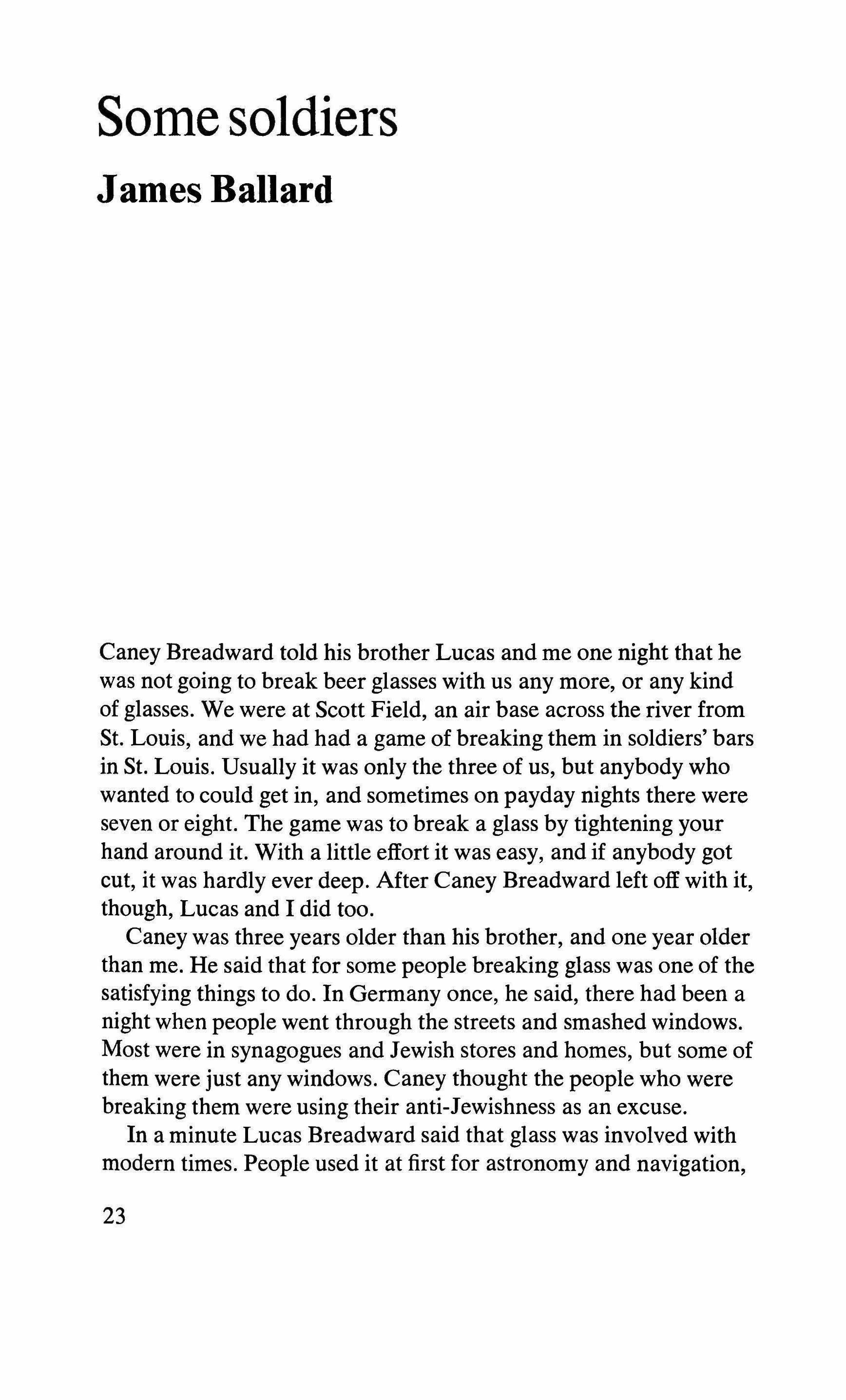
Caney Breadward told his brother Lucas and me one night that he was not going to break beer glasses with us any more, or any kind of glasses. We were at Scott Field, an air base across the river from St. Louis, and we had had a game of breaking them in soldiers' bars in St. Louis. Usually it was only the three of us, but anybody who wanted to could get in, and sometimes on payday nights there were seven or eight. The game was to break a glass by tightening your hand around it. With a little effort it was easy, and if anybody got cut, it was hardly ever deep. After Caney Breadward left off with it, though, Lucas and I did too.
Caney was three years older than his brother, and one year older than me. He said that for some people breaking glass was one of the satisfying things to do. In Germany once, he said, there had been a night when people went through the streets and smashed windows. Most were in synagogues and Jewish stores and homes, but some of them were just any windows. Caney thought the people who were breaking them were using their anti-Jewishness as an excuse.
In a minute Lucas Breadward said that glass was involved with modern times. People used it at first for astronomy and navigation, 23

for discovery, and for medicine, the healing arts, in microscopes. They were using it now for breaking. Caney thought there was something on the order of dreading to be in a room with a cat, or liking to drive too fast, that caused people to enjoy breaking glass. At any rate, he was finished with the beer glass demonstrations. He told me afterward that he had been maneuvering to get Lucas to finish with them. We were in the Scott Field PX, and when Lucas came in-I could see that Lucas had been looking for his brotherand sat down with us, Caney told him what he had been saying to me. Lucas said he already knew that was what Caney had been doing. It had come to him right after Caney had first talked about it. I knew Lucas, both of them, well enough by then to know that if either of them put something as a fact, it was one, but he showed us a sort of diary entry anyway in a shirt-pocket notebook he had. It said that he "agreed with CB re glass brkng even tho CB perhps using diplmcy on me." Caney told him he ought to learn to spell.
The Breadwards lived in a barracks down the street from mine. In the one I lived in, the man who had one of the bunks next to me knew the date of the window-smashing night Caney had referred to, and he knew that it had come to be called Kristallnacht. It was two dates, the ninth and tenth of November of 1938. The man's name was Robert Shulman. He had become respected and admired right away by most of the people who knew him in that barracks. The reason for it, before he had done anything in particular in the barracks or the squadron, was that he had been in the Abraham Lincoln Battalion in Spain.
Shulman was nearly always cheerful, and at times mocking. Most of the rest of us were in our teens and early twenties, and we were homesick at times, or bad tempered, or twiggetty. He was several years out of things of that kind. Aside from his experience, Shulman could have pulled a kind of rank on us by his maturity, but he never did.
Some of the people were earnest, determined. A young man named Platz now and then spoke of "the people's army." He meant the draftees and the wave of volunteers who had come in during the weeks after Pearl Harbor. Platz asked me once why I hadn't gone to

officer candidate school, and could the reason be that I preferred to remain in the people's army? One morning I called him Splat. When two or three of the others did, he got sore, and he said that if we really didn't mind, his name was Platz. P-I-a-t-z. Robert Shulman was amused. "Conjugate the word Platz. Plat, platter, plattest. Very good. Now conjugate the word splat. Splat, splatter, splattest. Why, very good." Platz's dignity was hurt all over again.
The information that Shulman had been in Spain must have come from him, but we were glad he had let us know. People sometimes tried to get him to talk about being in that war, but he only referred in a general way to what had happened there, without saying anything about himself personally. Platz said to him one night, "Perhaps our questions bore you?" Shulman answered him, "Perhaps." Shulman said then, "Just let up about it, all right?" He started out sounding harsh, but by the time he finished he had got his voice to being offhand again.
One of my uncles, my mother's brother, had been in the First World War, a machine gunner. My brother and I, when he was visiting us once, had tried to get him to tell us about it. When we kept asking him, he made a kind of sound. My mother looked in from another room, and she got my brother and me away from him and stayed in there with him for a few minutes. At another time, during the Depression, I heard my father, when he was finally cornered, make sounds like that for several minutes one afternoon. I heard it again in Shulman's voice.
He said to me one day, "Grab this flick?" I did not know what he was talking about. "Let's go see the movie. Don't people grab flicks down in the Blue Ridge Mountains, Benson?" The movie, at the theater there on the base, was a Charlie Chaplin picture, The Gold Rush, that had been reissued. In one scene Chaplin and his mining partner were snowbound in their cabin. This was the starvation scene, when his partner saw Chaplin as a turkey and began chasing him around the room. In some way the cabin had become balanced over the edge of a cliff, and it tilted when both of them were on the empty side and leveled again when they were back on the other side.
Nearly all the scenes were funny, but in that one I began to wish people would stop laughing. Shulman said afterward that that scene
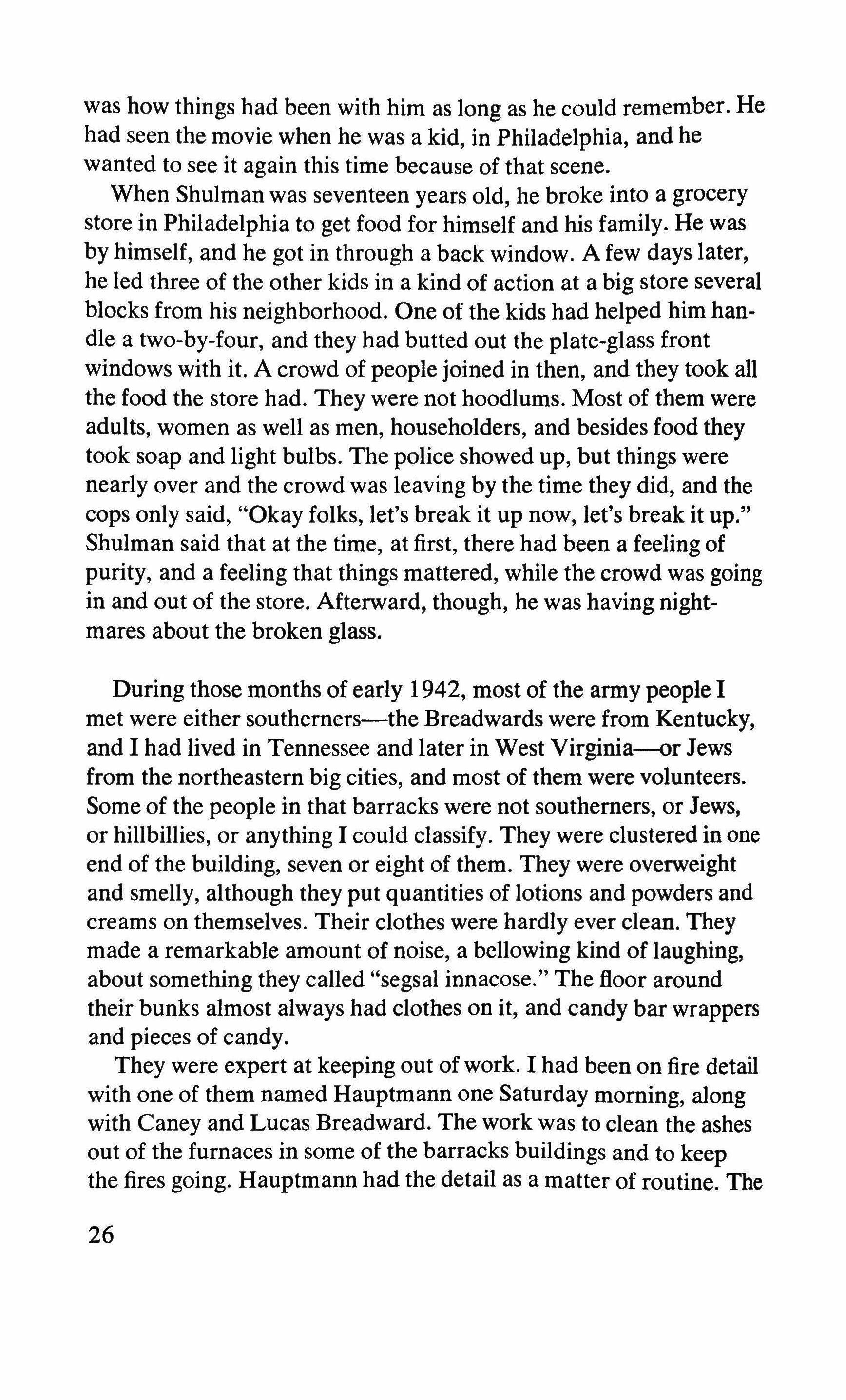
was how things had been with him as long as he could remember. He had seen the movie when he was a kid, in Philadelphia, and he wanted to see it again this time because of that scene.
When Shulman was seventeen years old, he broke into a grocery store in Philadelphia to get food for himself and his family. He was by himself, and he got in through a back window. A few days later, he led three of the other kids in a kind of action at a big store several blocks from his neighborhood. One of the kids had helped him handle a two-by-four, and they had butted out the plate-glass front windows with it. A crowd of people joined in then, and they took all the food the store had. They were not hoodlums. Most of them were adults, women as well as men, householders, and besides food they took soap and light bulbs. The police showed up, but things were nearly over and the crowd was leaving by the time they did, and the cops only said, "Okay folks, let's break it up now, let's break it up." Shulman said that at the time, at first, there had been a feeling of purity, and a feeling that things mattered, while the crowd was going in and out of the store. Afterward, though, he was having nightmares about the broken glass.
During those months of early 1942, most of the army people I met were either southerners-the Breadwards were from Kentucky, and I had lived in Tennessee and later in West Virginia--or Jews from the northeastern big cities, and most of them were volunteers. Some of the people in that barracks were not southerners, or Jews, or hillbillies, or anything I could classify. They were clustered in one end of the building, seven or eight of them. They were overweight and smelly, although they put quantities of lotions and powders and creams on themselves. Their clothes were hardly ever clean. They made a remarkable amount of noise, a bellowing kind of laughing, about something they called "segsal innacose." The floor around their bunks almost always had clothes on it, and candy bar wrappers and pieces of candy. They were expert at keeping out of work. I had been on fire detail with one of them named Hauptmann one Saturday morning, along with Caney and Lucas Breadward. The work was to clean the ashes out of the furnaces in some of the barracks buildings and to keep the fires going. Hauptmann had the detail as a matter of routine. The
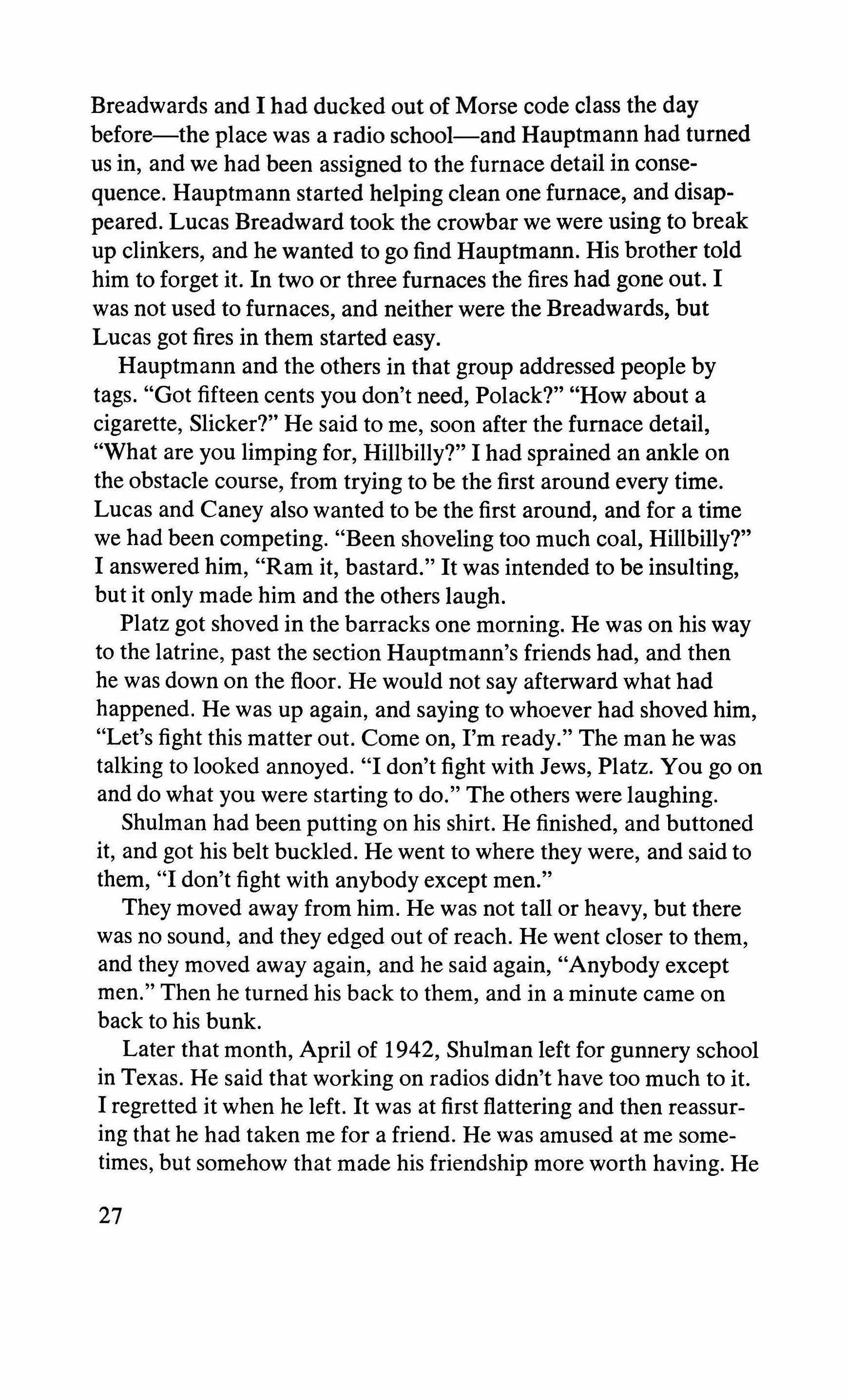
Breadwards and I had ducked out of Morse code class the day before-the place was a radio school-and Hauptmann had turned us in, and we had been assigned to the furnace detail in consequence. Hauptmann started helping clean one furnace, and disappeared. Lucas Breadward took the crowbar we were using to break up clinkers, and he wanted to go find Hauptmann. His brother told him to forget it. In two or three furnaces the fires had gone out. I was not used to furnaces, and neither were the Breadwards, but Lucas got fires in them started easy.
Hauptmann and the others in that group addressed people by tags. "Got fifteen cents you don't need, Polack?" "How about a cigarette, Slicker?" He said to me, soon after the furnace detail, "What are you limping for, Hillbilly?" I had sprained an ankle on the obstacle course, from trying to be the first around every time. Lucas and Caney also wanted to be the first around, and for a time we had been competing. "Been shoveling too much coal, Hillbilly?" I answered him, "Ram it, bastard." It was intended to be insulting, but it only made him and the others laugh.
Platz got shoved in the barracks one morning. He was on his way to the latrine, past the section Hauptmann's friends had, and then he was down on the floor. He would not say afterward what had happened. He was up again, and saying to whoever had shoved him, "Let's fight this matter out. Come on, I'm ready." The man he was talking to looked annoyed. "I don't fight with Jews, Platz. You go on and do what you were starting to do." The others were laughing.
Shulman had been putting on his shirt. He finished, and buttoned it, and got his belt buckled. He went to where they were, and said to them, "I don't fight with anybody except men."
They moved away from him. He was not tall or heavy, but there was no sound, and they edged out of reach. He went closer to them, and they moved away again, and he said again, "Anybody except men." Then he turned his back to them, and in a minute came on back to his bunk.
Later that month, April of 1942, Shulman left for gunnery school in Texas. He said that working on radios didn't have too much to it. I regretted it when he left. It was at first flattering and then reassuring that he had taken me for a friend. He was amused at me sometimes, but somehow that made his friendship more worth having. He
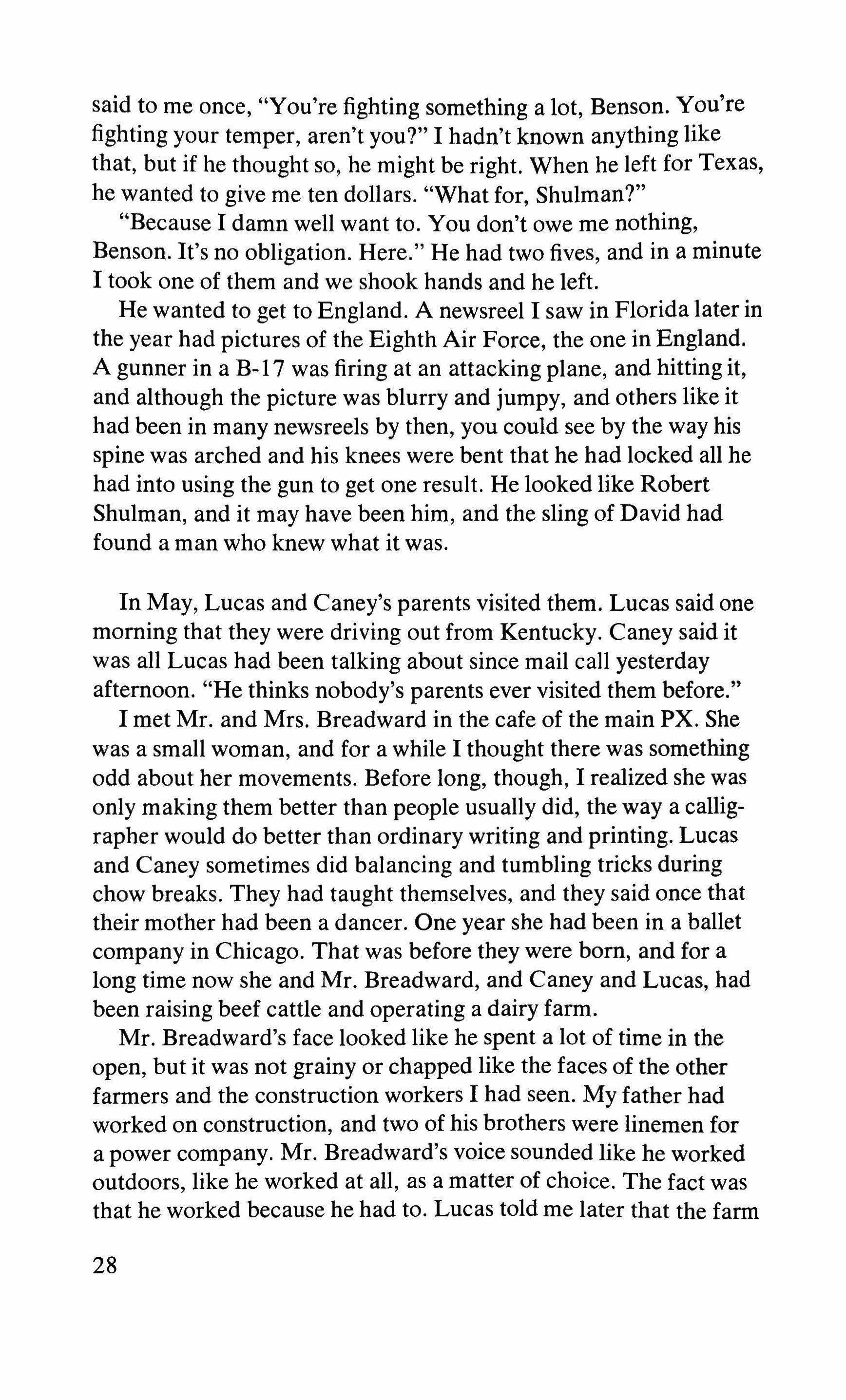
said to me once, "You're fighting something a lot, Benson. You're fighting your temper, aren't you?" I hadn't known anything like that, but if he thought so, he might be right. When he left for Texas, he wanted to give me ten dollars. "What for, Shulman?"
"Because I damn well want to. You don't owe me nothing, Benson. It's no obligation. Here." He had two fives, and in a minute I took one of them and we shook hands and he left.
He wanted to get to England. A newsreel I saw in Florida later in the year had pictures of the Eighth Air Force, the one in England. A gunner in a B-17 was firing at an attacking plane, and hitting it, and although the picture was blurry and jumpy, and others like it had been in many newsreels by then, you could see by the way his spine was arched and his knees were bent that he had locked all he had into using the gun to get one result. He looked like Robert Shulman, and it may have been him, and the sling of David had found a man who knew what it was.
In May, Lucas and Caney's parents visited them. Lucas said one morning that they were driving out from Kentucky. Caney said it was all Lucas had been talking about since mail call yesterday afternoon. "He thinks nobody's parents ever visited them before."
I met Mr. and Mrs. Breadward in the cafe of the main PX. She was a small woman, and for a while I thought there was something odd about her movements. Before long, though, I realized she was only making them better than people usually did, the way a calligrapher would do better than ordinary writing and printing. Lucas and Caney sometimes did balancing and tumbling tricks during chow breaks. They had taught themselves, and they said once that their mother had been a dancer. One year she had been in a ballet company in Chicago. That was before they were born, and for a long time now she and Mr. Breadward, and Caney and Lucas, had been raising beef cattle and operating a dairy farm.
Mr. Breadward's face looked like he spent a lot of time in the open, but it was not grainy or chapped like the faces of the other farmers and the construction workers I had seen. My father had worked on construction, and two of his brothers were linemen for a power company. Mr. Breadward's voice sounded like he worked outdoors, like he worked at all, as a matter of choice. The fact was that he worked because he had to. Lucas told me later that the farm

only had thirty acres when his father decided to get a living from it. It was four hundred acres now, and while there had been considerable profit from it for the past four years, most of the time there had been just barelyenough. They had used electric milking machines since 1940, but for years they had done the milking by hand. Caney said it would suit him fine if he spent the rest of his life without taking hold of another cow's tit. When I told him how his father's voice had sounded, Caney said he knew what I meant. "I reckon I do, anyway. He chose his life, I guess."
When we had finished lunch and we were getting up to leave, Mr. Breadward dropped his coat. This was blackberry winter, cold weather again, and Caney and Lucas and I were wearing field jackets. I picked the coat up for him. It was only a topcoat, not heavy, but he had dropped it anyway. The way it felt was part of what the word "luxury" meant. Wool. The label said "Davitt's Nashville." I knew where that store was because I had lived in Nashville, but the people in my neighborhood had not been in the Davitt's bracket. Caney and Lucas had been to Nashville many times, since it was the closest city to where they lived. I was holding the topcoat out to Mr. Breadward, and he said, "Thank you, Jack," but he didn't take it. His face looked strange. Then Lucas and Caney were helping him get his coat on. I realized then that what was causing the expression on Mr. Breadward's face was pain. In a minute he had a natural look again. Lucas had said once that his father had got a broken shoulder blade from a plane crash during the war, the First World War, and it still gave him trouble sometimes. Now, though, he was all right again.
Mr. Breadward's car was down the street from the PX. It was a big Packard, a 1939 model, dark blue the way some Christmas tree ornaments are. Caney had announced that he was going to drive us back to the school area, and Lucas had said he was going to. Mr. Breadward settled it by offering me the keys. The car was not merely big, it was massive. An MP was on traffic duty at an intersection near the PX. I expected him to stop us and want to know what a buck private like me was doing driving a car like that. Instead he saluted. Mr. Breadward nodded to him, and we proceeded.
We went to the building where Lucas and Caney and I would
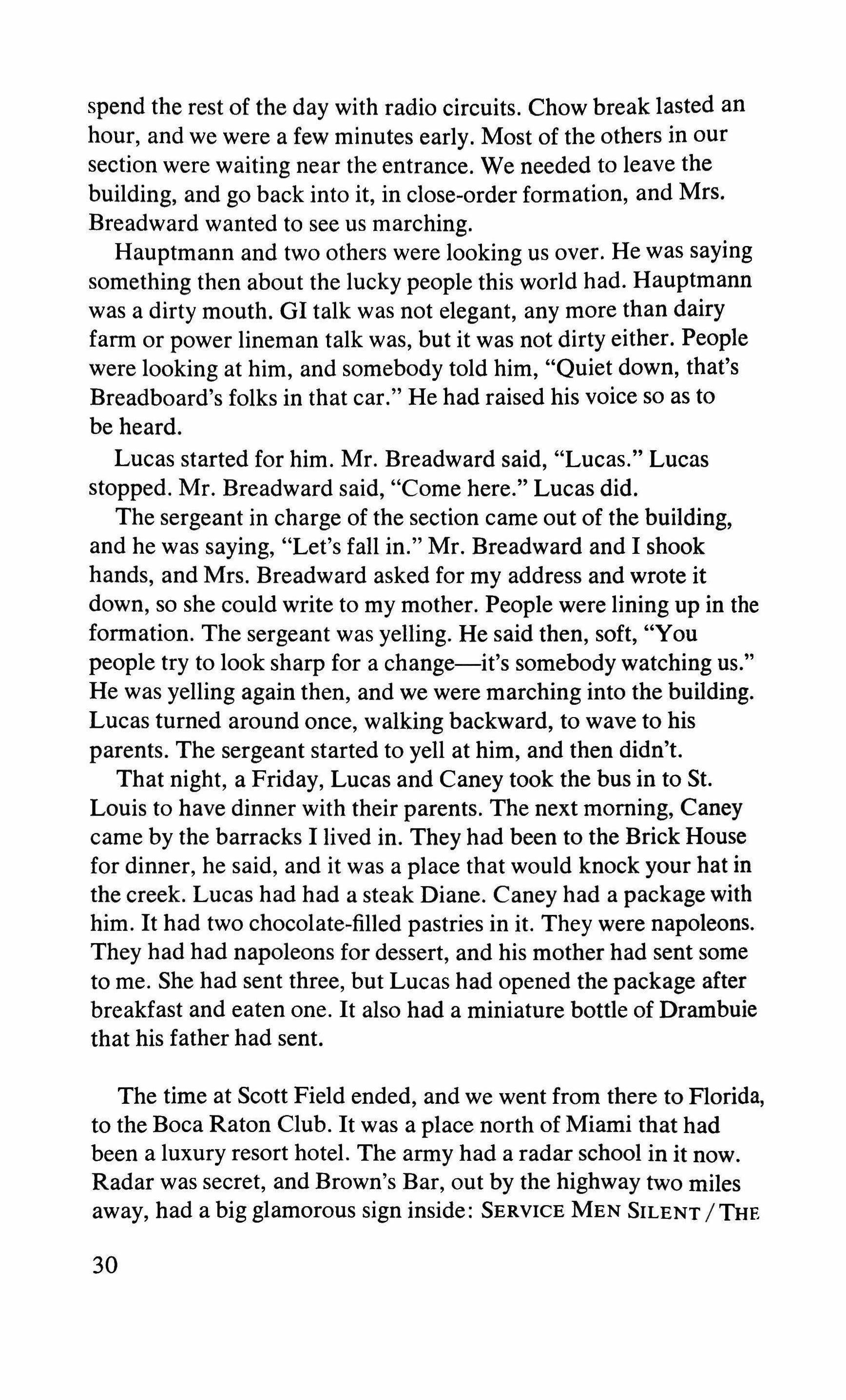
spend the rest of the day with radio circuits. Chow break lasted an hour, and we were a few minutes early. Most of the others in our section were waiting near the entrance. We needed to leave the building, and go back into it, in close-order formation, and Mrs. Breadward wanted to see us marching.
Hauptmann and two others were looking us over. He was saying something then about the lucky people this world had. Hauptmann was a dirty mouth. GI talk was not elegant, any more than dairy farm or power lineman talk was, but it was not dirty either. People were looking at him, and somebody told him, "Quiet down, that's Breadboard's folks in that car." He had raised his voice so as to be heard.
Lucas started for him. Mr. Breadward said, "Lucas." Lucas stopped. Mr. Breadward said, "Come here." Lucas did.
The sergeant in charge of the section came out of the building, and he was saying, "Let's fall in." Mr. Breadward and I shook hands, and Mrs. Breadward asked for my address and wrote it down, so she could write to my mother. People were lining up in the formation. The sergeant was yelling. He said then, soft, "You people try to look sharp for a change-it'S somebody watching us." He was yelling again then, and we were marching into the building. Lucas turned around once, walking backward, to wave to his parents. The sergeant started to yell at him, and then didn't.
That night, a Friday, Lucas and Caney took the bus in to St. Louis to have dinner with their parents. The next morning, Caney came by the barracks I lived in. They had been to the Brick House for dinner, he said, and it was a place that would knock your hat in the creek. Lucas had had a steak Diane. Caney had a package with him. It had two chocolate-filled pastries in it. They were napoleons. They had had napoleons for dessert, and his mother had sent some to me. She had sent three, but Lucas had opened the package after breakfast and eaten one. It also had a miniature bottle of Drambuie that his father had sent.
The time at Scott Field ended, and we went from there to Florida, to the Boca Raton Club. It was a place north of Miami that had been a luxury resort hotel. The army had a radar school in it now. Radar was secret, and Brown's Bar, out by the highway two miles away, had a big glamorous sign inside: SERVICE MEN SILENT /THE
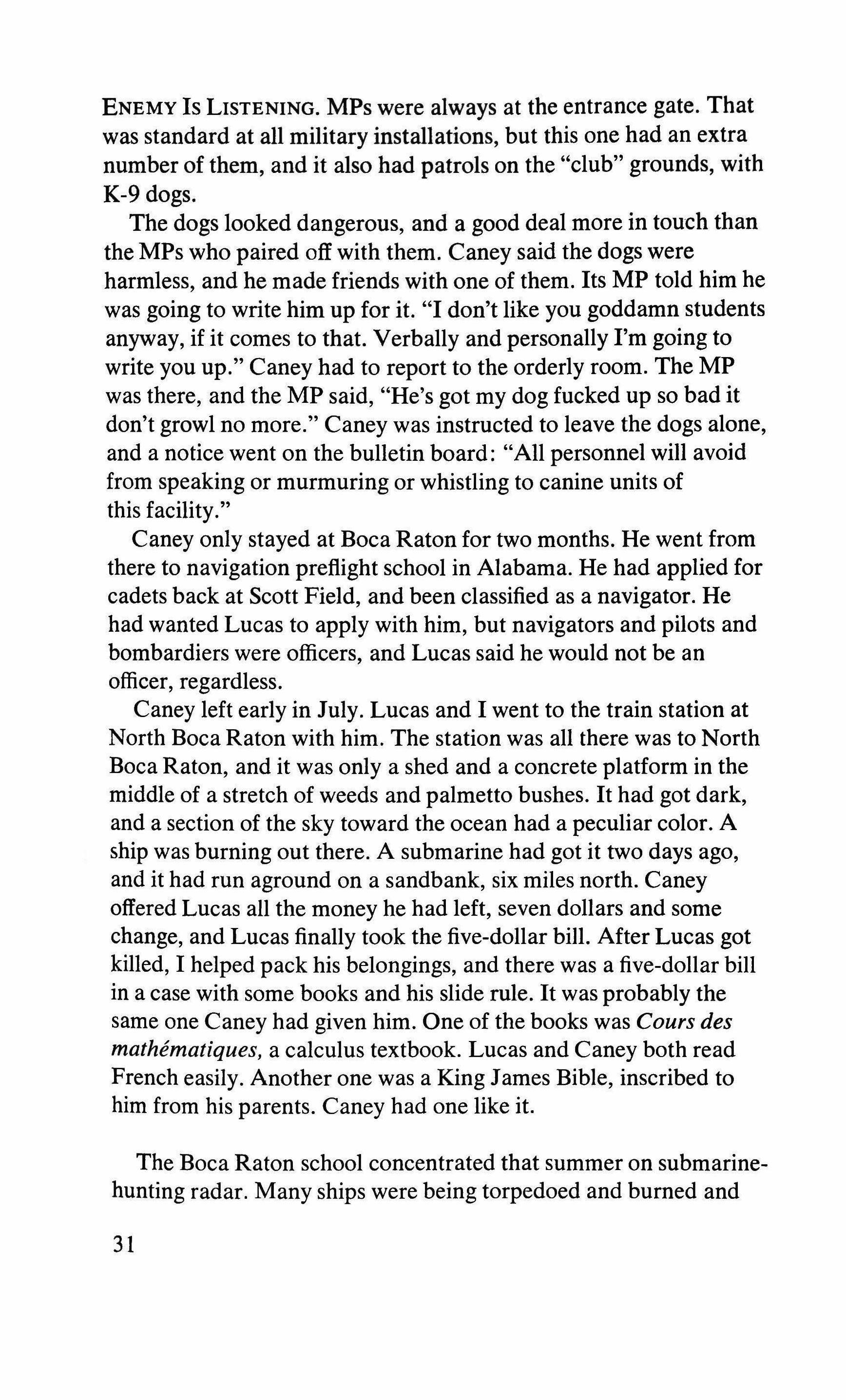
ENEMY Is LISTENING. MPs were always at the entrance gate. That was standard at all military installations, but this one had an extra number of them, and it also had patrols on the "club" grounds, with K-9 dogs.
The dogs looked dangerous, and a good deal more in touch than the MPs who paired off with them. Caney said the dogs were harmless, and he made friends with one of them. Its MP told him he was going to write him up for it. "I don't like you goddamn students anyway, if it comes to that. Verbally and personally I'm going to write you up." Caney had to report to the orderly room. The MP was there, and the MP said, "He's got my dog fucked up so bad it don't growl no more." Caney was instructed to leave the dogs alone, and a notice went on the bulletin board: "All personnel will avoid from speaking or murmuring or whistling to canine units of this facility."
Caney only stayed at Boca Raton for two months. He went from there to navigation preflight school in Alabama. He had applied for cadets back at Scott Field, and been classified as a navigator. He had wanted Lucas to apply with him, but navigators and pilots and bombardiers were officers, and Lucas said he would not be an officer, regardless.
Caney left early in July. Lucas and I went to the train station at North Boca Raton with him. The station was all there was to North Boca Raton, and it was only a shed and a concrete platform in the middle of a stretch of weeds and palmetto bushes. It had got dark, and a section of the sky toward the ocean had a peculiar color. A ship was burning out there. A submarine had got it two days ago, and it had run aground on a sandbank, six miles north. Caney offered Lucas all the money he had left, seven dollars and some change, and Lucas finally took the five-dollar bill. After Lucas got killed, I helped pack his belongings, and there was a five-dollar bill in a case with some books and his slide rule. It was probably the same one Caney had given him. One of the books was Cours des mathematiques, a calculus textbook. Lucas and Caney both read French easily. Another one was a King James Bible, inscribed to him from his parents. Caney had one like it.
The Boca Raton school concentrated that summer on submarinehunting radar. Many ships were being torpedoed and burned and

sunk every week in the Caribbean and along the East Coast, and radar was one of the methods of finding the submarines. Something that especially counted to me, though, about being at that location, was that it was close to the ocean. I had not seen the ocean before, and now that I had, and had been in it and flown over it, I thought it had something to do with writing.
One day I bought a fifty-cent fountain pen and a looseleaf binder and five pads of paper. At home my parents had rented a typewriter for me, when I said that manuscripts had to be in typewriting before they could be sent out. The rent payments for a typewriter were not something they could easily afford, and after the first month I could generally make them myself, with money from apple-picking jobs and other jobs and, one time and a second time and even a third, from magazine checks. I had tried writing detective stories, but the checks were for science fiction stories. In the army, the part of it I was in, typewriters were not available, and I had the idea that longhand writing would take too much time, and for nearly a year now I had not done any. In Florida, however, I saw that, for some time to come, if it was going to be done, it would have to be in longhand: It was not science fiction I was writing any more. I did not know just what it was, and I thought I was not going to know, although I was not much worried about it, except by going ahead with it.
Lucas and Caney and others noticed before long how I was spending a good part of the time, and Caney said once, one payday night when I wanted to keep on writing instead of going drinking with them, "You bet, soldier, you bet." It was something he said now and then to irritate Lucas. One night in St. Louis when Lucas was squeezing a beer glass, it cut his hand when it broke. The bartender said, "You guys stop that stuff." Lucas wanted to argue with him. "What's the matter? It's my blood, isn't it?" The bartender answered him, "You bet, soldier, you bet. And it's my counter, okay?" Somehow that got the best of Lucas, and once in a while Caney reminded him of it.
Swimming in the ocean kept on being a new thing to me. Sometime back, before I went in the army, the notion had come to me that there was only one word. What I had covered so many pages with were only traces, radar blips, if they were that much, of the
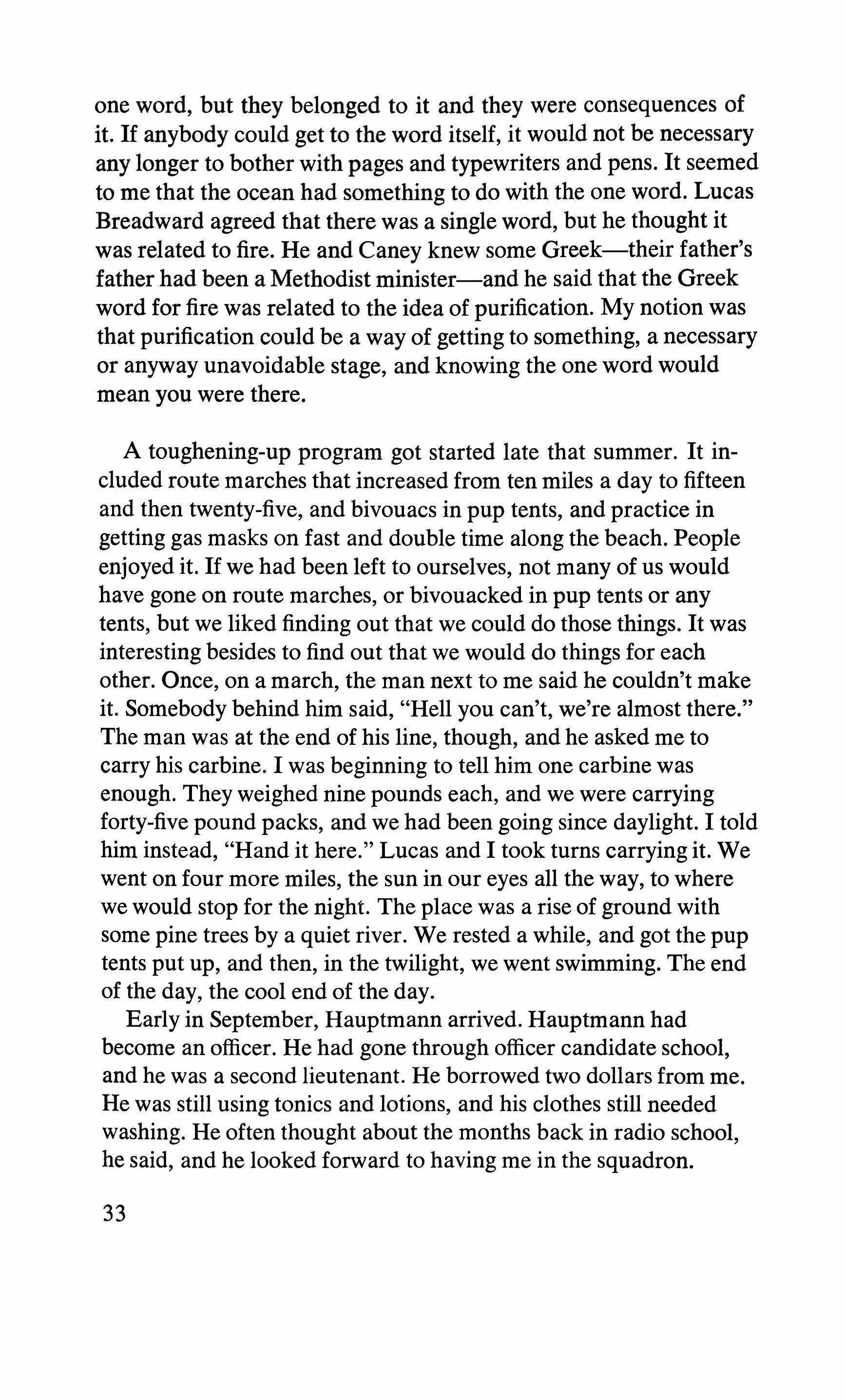
one word, but they belonged to it and they were consequences of it. If anybody could get to the word itself, it would not be necessary any longer to bother with pages and typewriters and pens. It seemed to me that the ocean had something to do with the one word. Lucas Breadward agreed that there was a single word, but he thought it was related to fire. He and Caney knew some Greek-their father's father had been a Methodist minister-and he said that the Greek word for fire was related to the idea of purification. My notion was that purification could be a way of getting to something, a necessary or anyway unavoidable stage, and knowing the one word would mean you were there.
A toughening-up program got started late that summer. It included route marches that increased from ten miles a day to fifteen and then twenty-five, and bivouacs in pup tents, and practice in getting gas masks on fast and double time along the beach. People enjoyed it. If we had been left to ourselves, not many of us would have gone on route marches, or bivouacked in pup tents or any tents, but we liked finding out that we could do those things. It was interesting besides to find out that we would do things for each other. Once, on a march, the man next to me said he couldn't make it. Somebody behind him said, "Hell you can't, we're almost there." The man was at the end of his line, though, and he asked me to carry his carbine. I was beginning to tell him one carbine was enough. They weighed nine pounds each, and we were carrying forty-five pound packs, and we had been going since daylight. I told him instead, "Hand it here." Lucas and I took turns carrying it. We went on four more miles, the sun in our eyes all the way, to where we would stop for the night. The place was a rise of ground with some pine trees by a quiet river. We rested a while, and got the pup tents put up, and then, in the twilight, we went swimming. The end of the day, the cool end of the day.
Early in September, Hauptmann arrived. Hauptmann had become an officer. He had gone through officer candidate school, and he was a second lieutenant. He borrowed two dollars from me. He was still using tonics and lotions, and his clothes still needed washing. He often thought about the months back in radio school, he said, and he looked forward to having me in the squadron.

Hauptmann became officer in charge of the toughening-up program. His name and the letters O. I. C., T. U. P. were on schedules and memos, and he became known as Oictup. One of the first things he did, or had done, was capture Yamato.
Yamato was a settlement of Japanese vegetable farmers three miles inland from Boca Raton. They were going to be relocated, and a squad of MPs went out there in a weapons carrier one afternoon. It was an MP assignment, but Hauptmann got himself included. A formation of people being toughened up followed the weapons carrier. Hauptmann ordered the driver to stay in low gear so it would not get ahead of the formation. After a few minutes he called to the driver to halt, and got into the cab and rode the rest of the way.
We had seen Yamato several times. It was a group of maybe a dozen sheds and little houses. They had been put together out of scrap lumber and odds and ends, but still they were not shacks. They were set up along an arc instead of in a straight line or here and there. They were on a lawn that had gravel pathways and a few shrubs, and the limbs of the shrubs had been trained to grow in particular ways.
We had passed Yamato on some of the route marches. In the mornings nobody had been there, as far as we could tell, but in the afternoons, when we were coming back, they would be in from the fields. We knew right away they were Japanese, and it seemed strange to us that their clothes were only ordinary print dresses and khaki pants and work shirts. There were no children or teenagers. All of them, men and women, looked extremely old. They would be cleaned up, immaculate, and when we went by they would bow, and make sounds that before long we understood as "Very good afternoon, very good afternoon." The ones of us that had to shave every day would be bristly, and all of us would be sweaty and grubby by that time. From their faces and the way they were gathered near the road, it looked as if they had been looking forward to when we would be along. It got to be our custom to take the Yamato road on the way back in. Lucas knew the Japanese words for some of the numbers, and one afternoon when we were going by we fell in step and he counted cadence in Japanese. "Hechee knee son she, hechee knee son she." The accent must have been unsatisfactory, since people were giggling and some of
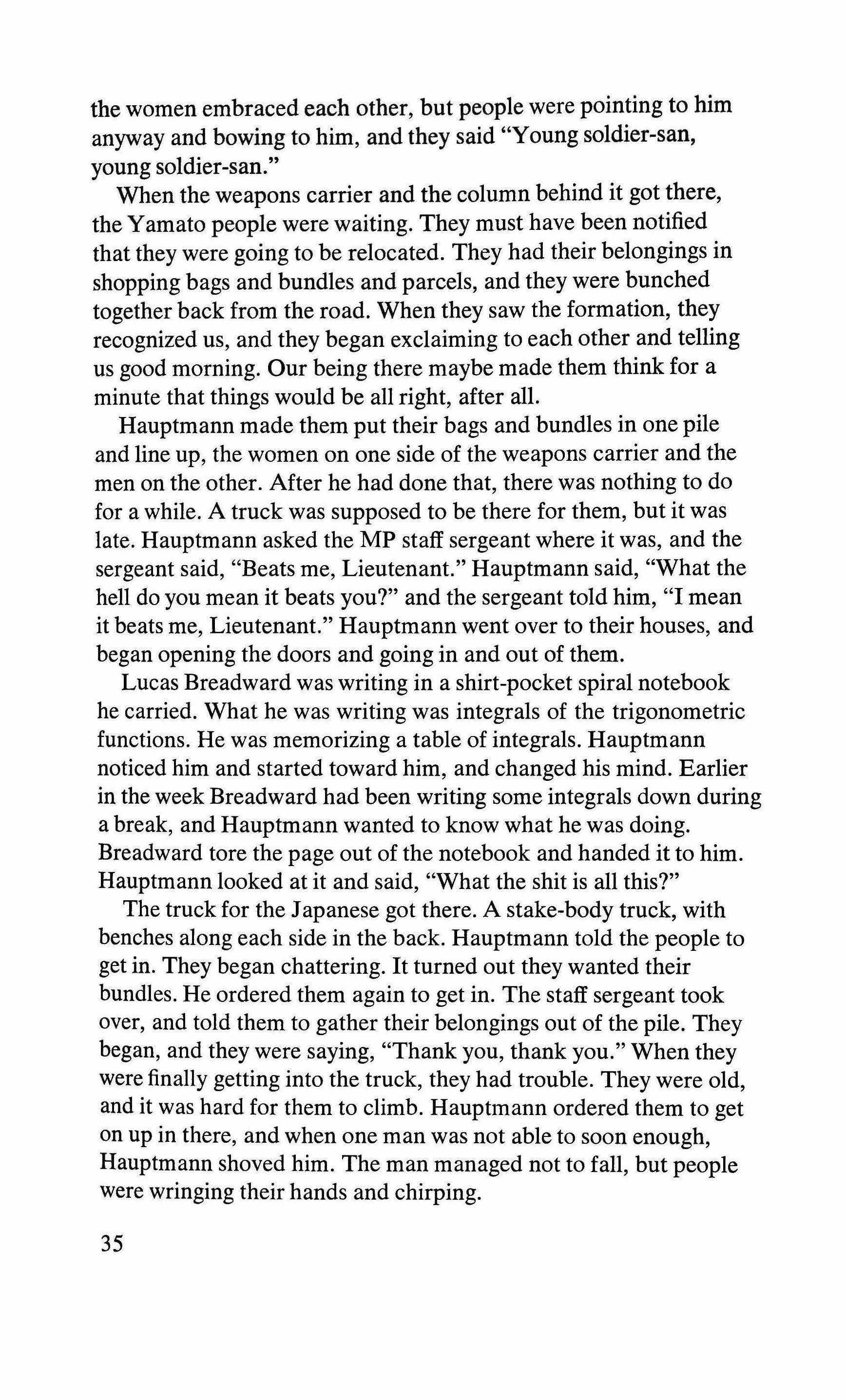
the women embraced each other, but people were pointing to him anyway and bowing to him, and they said "Young soldier-san, young soldier-san."
When the weapons carrier and the column behind it got there, the Yamato people were waiting. They must have been notified that they were going to be relocated. They had their belongings in shopping bags and bundles and parcels, and they were bunched together back from the road. When they saw the formation, they recognized us, and they began exclaiming to each other and telling us good morning. Our being there maybe made them think for a minute that things would be all right, after all.
Hauptmann made them put their bags and bundles in one pile and line up, the women on one side of the weapons carrier and the men on the other. After he had done that, there was nothing to do for a while. A truck was supposed to be there for them, but it was late. Hauptmann asked the MP staff sergeant where it was, and the sergeant said, "Beats me, Lieutenant." Hauptmann said, "What the hell do you mean it beats you?" and the sergeant told him, "I mean it beats me, Lieutenant." Hauptmann went over to their houses, and began opening the doors and going in and out of them.
Lucas Breadward was writing in a shirt-pocket spiral notebook he carried. What he was writing was integrals of the trigonometric functions. He was memorizing a table of integrals. Hauptmann noticed him and started toward him, and changed his mind. Earlier in the week Breadward had been writing some integrals down during a break, and Hauptmann wanted to know what he was doing. Breadward tore the page out of the notebook and handed it to him. Hauptmann looked at it and said, "What the shit is all this?"
The truck for the Japanese got there. A stake-body truck, with benches along each side in the back. Hauptmann told the people to get in. They began chattering. It turned out they wanted their bundles. He ordered them again to get in. The staff sergeant took over, and told them to gather their belongings out of the pile. They began, and they were saying, "Thank you, thank you." When they were finally getting into the truck, they had trouble. They were old, and it was hard for them to climb. Hauptmann ordered them to get on up in there, and when one man was not able to soon enough, Hauptmann shoved him. The man managed not to fall, but people were wringing their hands and chirping.

The staff sergeant spoke to Hauptmann. "I tell you what, Lieutenant. You just kind of let us handle this, all right?" The sergeant told the other MPs to find a ladder or a box that could be used for climbing into the truck. The man who had been shoved, and one of the women, offered to show them where a stepladder was, and the sergeant told them to go along with the MPs. Some of the rest of us began helping the people get up into the truck. The MPs came back with a stepladder, and in a few minutes everybody had climbed in.
Hauptmann did not let the truck leave yet. He had found a sledgehammer in one of the shacks, and he had a tire iron from the weapons carrier. He wanted the shacks torn down. It was the people who had been in the formation, not the MPs, he gave the order to, and maybe half of them joined in. Besides the sledgehammer and the tire iron, they took a palm tree log and used it for a battering ram. Lucas Breadward and several of the rest of us did not join in, and Hauptmann left us alone. One of the others began singing, "Hi ho, hi ho, it's off to work we go." Then all the others were singing with him. Hauptmann and somebody else began knocking out window glass. When they did, the men and women in the truck began making cries and chattering and jerking. Then they got quiet, and got still.
The staff sergeant told the other MPs, "Let's get the hell out of here." He told the driver of the truck to get started, and got in the cab of the weapons carrier. Both the trucks left. The singing and the glass breaking went ahead.
When people left the club grounds for personal reasons and when they came back, they needed to show passes to the gate guards. The passes were kept in the orderly room, and lifting a pass meant it would not be given out. The man could not get off the base. Hauptmann had put an announcement on the bulletin board that, due to lack of cooperation during the morning's exercise at the location known as Yamato, passes of all trainee personnel were lifted until further notice.
Breadward and I had been planning to go to Deerfield the next night. That was a community near Boca Raton, and it happened that a man from there was in cadet school with Caney. The
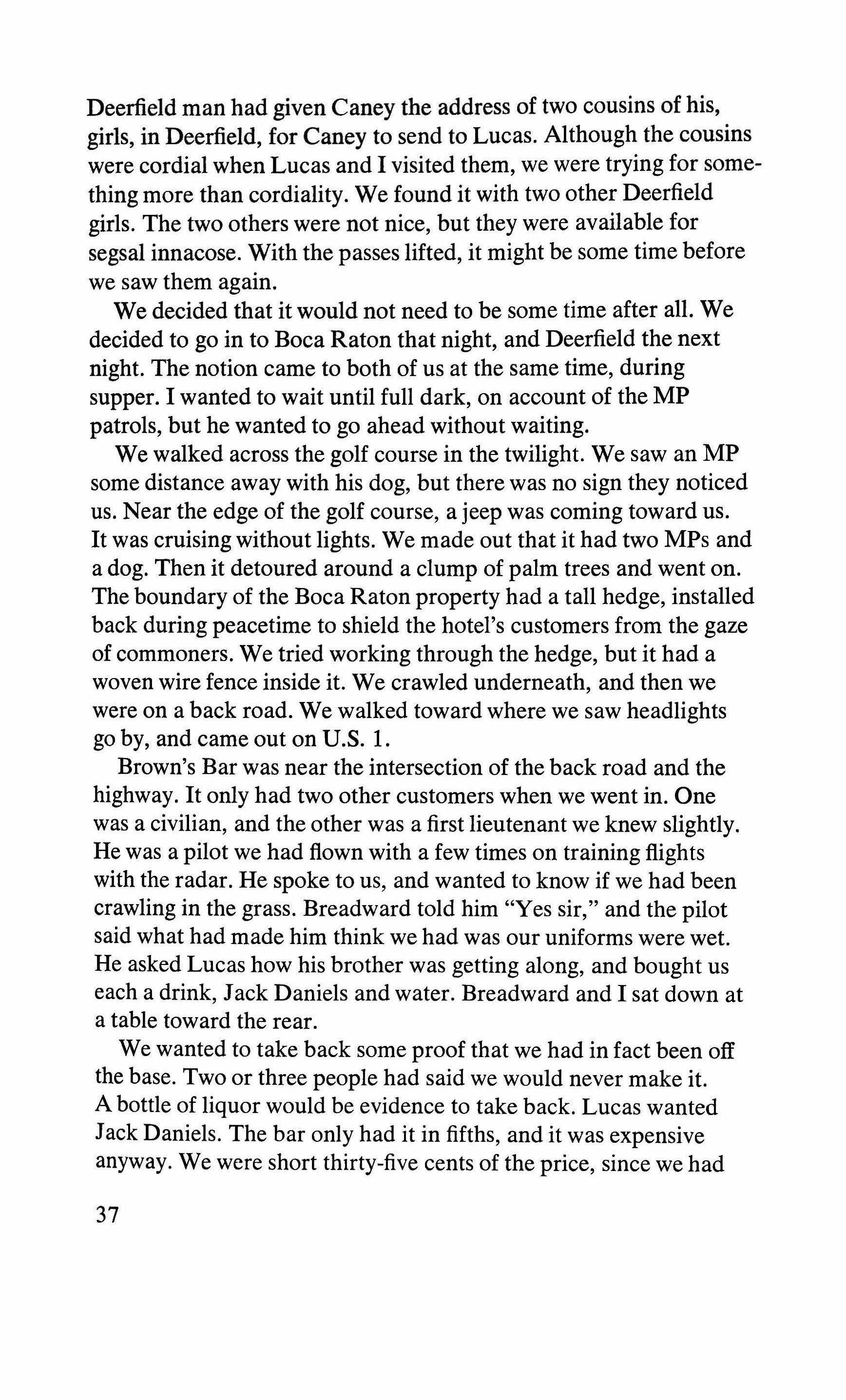
Deerfield man had given Caney the address of two cousins of his, girls, in Deerfield, for Caney to send to Lucas. Although the cousins were cordial when Lucas and I visited them, we were trying for something more than cordiality. We found it with two other Deerfield girls. The two others were not nice, but they were available for segsal innacose. With the passes lifted, it might be some time before we saw them again.
We decided that it would not need to be some time after all. We decided to go in to Boca Raton that night, and Deerfield the next night. The notion came to both of us at the same time, during supper. I wanted to wait until full dark, on account of the MP patrols, but he wanted to go ahead without waiting.
We walked across the golf course in the twilight. We saw an MP some distance away with his dog, but there was no sign they noticed us. Near the edge of the golf course, a jeep was coming toward us. It was cruising without lights. We made out that it had two MPs and a dog. Then it detoured around a clump of palm trees and went on. The boundary of the Boca Raton property had a tall hedge, installed back during peacetime to shield the hotel's customers from the gaze of commoners. We tried working through the hedge, but it had a woven wire fence inside it. We crawled underneath, and then we were on a back road. We walked toward where we saw headlights go by, and came out on U.S. 1.
Brown's Bar was near the intersection of the back road and the highway. It only had two other customers when we went in. One was a civilian, and the other was a first lieutenant we knew slightly. He was a pilot we had flown with a few times on training flights with the radar. He spoke to us, and wanted to know if we had been crawling in the grass. Breadward told him "Yes sir," and the pilot said what had made him think we had was our uniforms were wet. He asked Lucas how his brother was getting along, and bought us each a drink, Jack Daniels and water. Breadward and I sat down at a table toward the rear.
We wanted to take back some proof that we had in fact been off the base. Two or three people had said we would never make it. A bottle of liquor would be evidence to take back. Lucas wanted Jack Daniels. The bar only had it in fifths, and it was expensive anyway. We were short thirty-five cents of the price, since we had
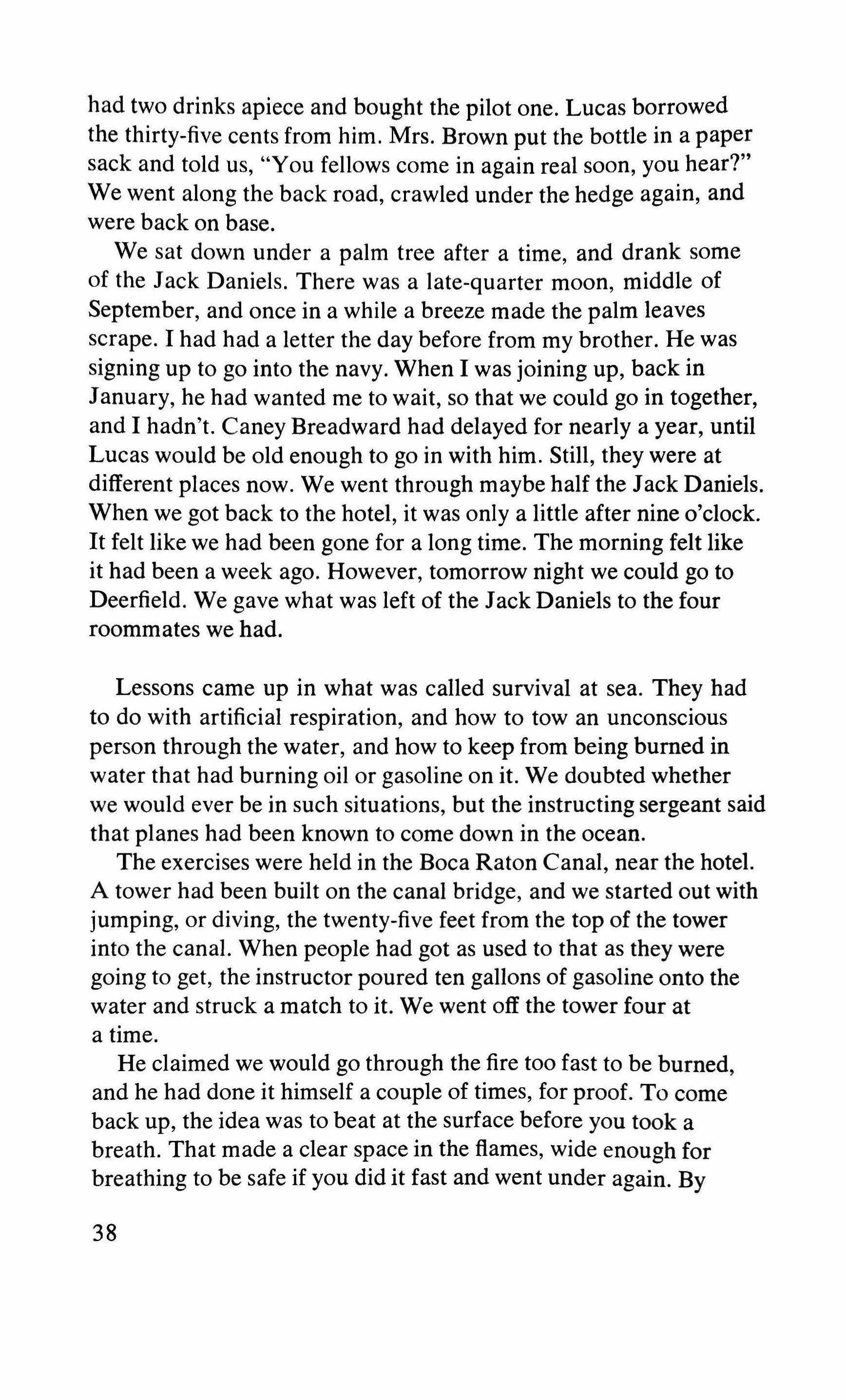
had two drinks apiece and bought the pilot one. Lucas borrowed the thirty-five cents from him. Mrs. Brown put the bottle in a paper sack and told us, "You fellows come in again real soon, you hear?" We went along the back road, crawled under the hedge again, and were back on base.
We sat down under a palm tree after a time, and drank some of the Jack Daniels. There was a late-quarter moon, middle of September, and once in a while a breeze made the palm leaves scrape. I had had a letter the day before from my brother. He was signing up to go into the navy. When I was joining up, back in January, he had wanted me to wait, so that we could go in together, and I hadn't. Caney Breadward had delayed for nearly a year, until Lucas would be old enough to go in with him. Still, they were at different places now. We went through maybe half the Jack Daniels. When we got back to the hotel, it was only a little after nine o'clock. It felt like we had been gone for a long time. The morning felt like it had been a week ago. However, tomorrow night we could go to Deerfield. We gave what was left of the Jack Daniels to the four roommates we had.
Lessons came up in what was called survival at sea. They had to do with artificial respiration, and how to tow an unconscious person through the water, and how to keep from being burned in water that had burning oil or gasoline on it. We doubted whether we would ever be in such situations, but the instructing sergeant said that planes had been known to come down in the ocean.
The exercises were held in the Boca Raton Canal, near the hotel. A tower had been built on the canal bridge, and we started out with jumping, or diving, the twenty-five feet from the top of the tower into the canal. When people had got as used to that as they were going to get, the instructor poured ten gallons of gasoline onto the water and struck a match to it. We went off the tower four at a time.
He claimed we would go through the fire too fast to be burned, and he had done it himself a couple of times, for proof. To come back up, the idea was to beat at the surface before you took a breath. That made a clear space in the flames, wide enough for breathing to be safe if you did it fast and went under again. By
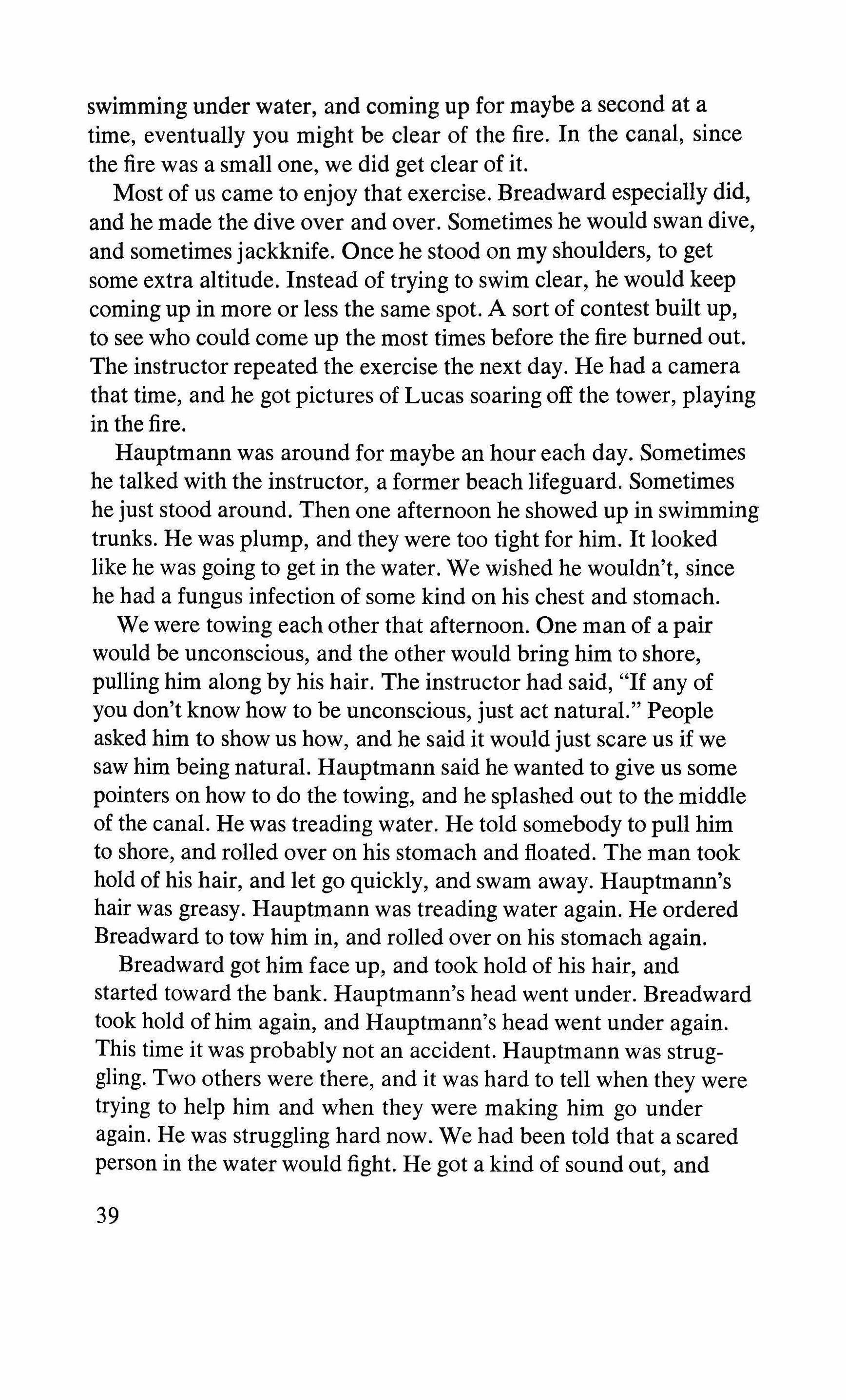
swimming under water, and coming up for maybe a second at a time, eventually you might be clear of the fire. In the canal, since the fire was a small one, we did get clear of it.
Most of us came to enjoy that exercise. Breadward especially did, and he made the dive over and over. Sometimes he would swan dive, and sometimes jackknife. Once he stood on my shoulders, to get some extra altitude. Instead of trying to swim clear, he would keep coming up in more or less the same spot. A sort of contest built up, to see who could come up the most times before the fire burned out. The instructor repeated the exercise the next day. He had a camera that time, and he got pictures of Lucas soaring off the tower, playing in the fire.
Hauptmann was around for maybe an hour each day. Sometimes he talked with the instructor, a former beach lifeguard. Sometimes he just stood around. Then one afternoon he showed up in swimming trunks. He was plump, and they were too tight for him. It looked like he was going to get in the water. We wished he wouldn't, since he had a fungus infection of some kind on his chest and stomach.
We were towing each other that afternoon. One man of a pair would be unconscious, and the other would bring him to shore, pulling him along by his hair. The instructor had said, "If any of you don't know how to be unconscious, just act natural." People asked him to show us how, and he said it would just scare us if we saw him being natural. Hauptmann said he wanted to give us some pointers on how to do the towing, and he splashed out to the middle of the canal. He was treading water. He told somebody to pull him to shore, and rolled over on his stomach and floated. The man took hold of his hair, and let go quickly, and swam away. Hauptmann's hair was greasy. Hauptmann was treading water again. He ordered Breadward to tow him in, and rolled over on his stomach again. Breadward got him face up, and took hold of his hair, and started toward the bank. Hauptmann's head went under. Breadward took hold of him again, and Hauptmann's head went under again. This time it was probably not an accident. Hauptmann was struggling. Two others were there, and it was hard to tell when they were trying to help him and when they were making him go under again. He was struggling hard now. We had been told that a scared person in the water would fight. He got a kind of sound out, and
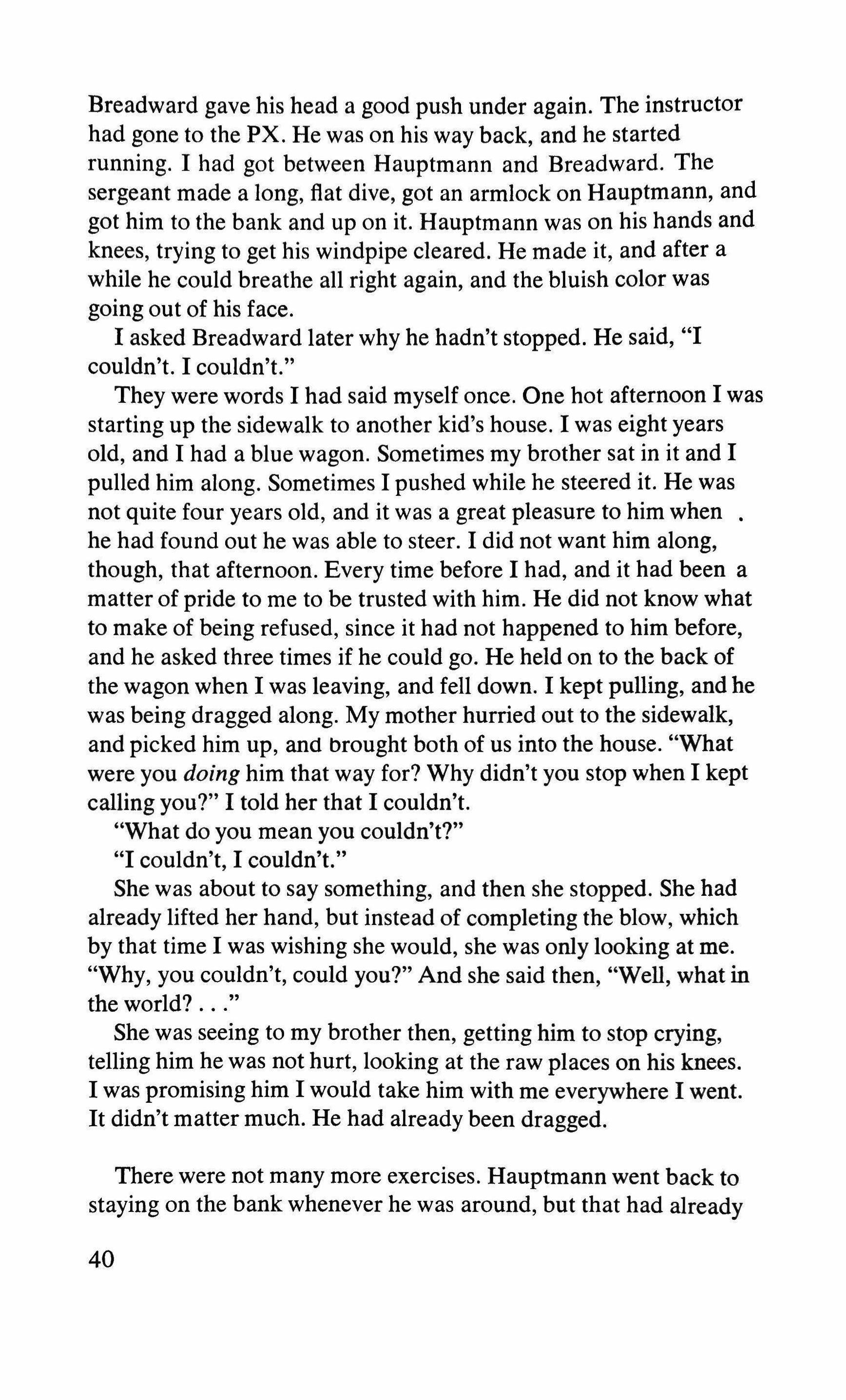
Breadward gave his head a good push under again. The instructor had gone to the PX. He was on his way back, and he started running. 1 had got between Hauptmann and Breadward. The sergeant made a long, flat dive, got an armlock on Hauptmann, and got him to the bank and up on it. Hauptmann was on his hands and knees, trying to get his windpipe cleared. He made it, and after a while he could breathe all right again, and the bluish color was going out of his face.
1 asked Breadward later why he hadn't stopped. He said, "I couldn't. 1 couldn't."
They were words 1 had said myself once. One hot afternoon 1 was starting up the sidewalk to another kid's house. 1 was eight years old, and 1 had a blue wagon. Sometimes my brother sat in it and 1 pulled him along. Sometimes 1 pushed while he steered it. He was not quite four years old, and it was a great pleasure to him when he had found out he was able to steer. 1 did not want him along, though, that afternoon. Every time before 1 had, and it had been a matter of pride to me to be trusted with him. He did not know what to make of being refused, since it had not happened to him before, and he asked three times if he could go. He held on to the back of the wagon when 1 was leaving, and fell down. 1 kept pulling, and he was being dragged along. My mother hurried out to the sidewalk, and picked him up, and brought both of us into the house. "What were you doing him that way for? Why didn't you stop when 1 kept calling you?" 1 told her that 1 couldn't.
"What do you mean you couldn't?"
"I couldn't, 1 couldn't."
She was about to say something, and then she stopped. She had already lifted her hand, but instead of completing the blow, which by that time 1 was wishing she would, she was only looking at me. "Why, you couldn't, could you?" And she said then, "Well, what in the world?
She was seeing to my brother then, getting him to stop crying, telling him he was not hurt, looking at the raw places on his knees. 1 was promising him 1 would take him with me everywhere 1 went. It didn't matter much. He had already been dragged.
There were not many more exercises. Hauptmann went back to staying on the bank whenever he was around, but that had already
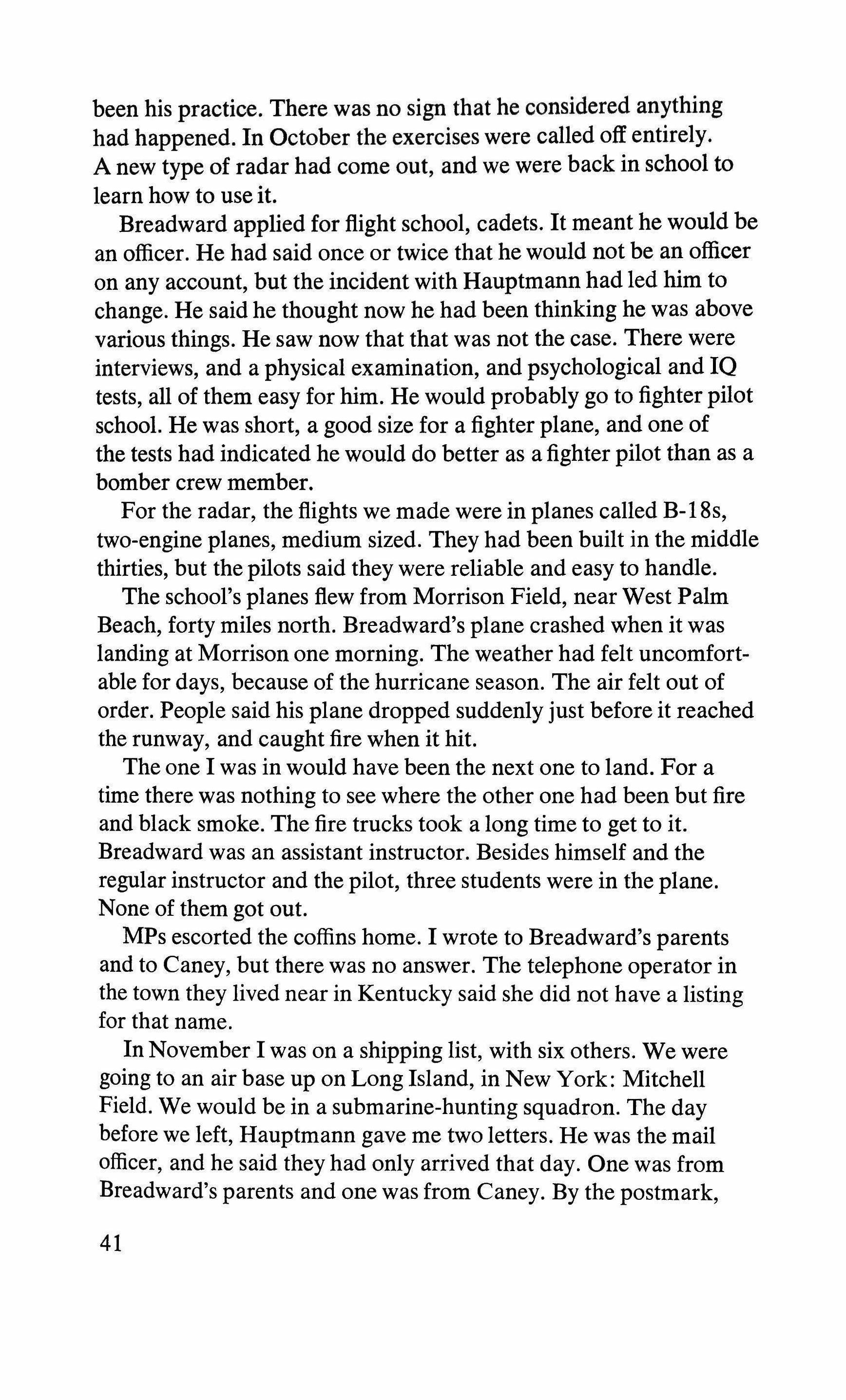
been his practice. There was no sign that he considered anything had happened. In October the exercises were called off entirely. A new type of radar had come out, and we were back in school to learn how to use it.
Breadward applied for flight school, cadets. It meant he would be an officer. He had said once or twice that he would not be an officer on any account, but the incident with Hauptmann had led him to change. He said he thought now he had been thinking he was above various things. He saw now that that was not the case. There were interviews, and a physical examination, and psychological and IQ tests, all of them easy for him. He would probably go to fighterpilot school. He was short, a good size for a fighter plane, and one of the tests had indicated he would do better as a fighter pilot than as a bomber crew member.
For the radar, the flights we made were in planes called B-18s, two-engine planes, medium sized. They had been built in the middle thirties, but the pilots said they were reliable and easy to handle.
The school's planes flew from Morrison Field, near West Palm Beach, forty miles north. Breadward's plane crashed when it was landing at Morrison one morning. The weather had felt uncomfortable for days, because of the hurricane season. The air felt out of order. People said his plane dropped suddenly just before it reached the runway, and caught fire when it hit.
The one I was in would have been the next one to land. For a time there was nothing to see where the other one had been but fire and black smoke. The fire trucks took a long time to get to it. Breadward was an assistant instructor. Besides himself and the regular instructor and the pilot, three students were in the plane. None of them got out.
MPs escorted the coffins home. I wrote to Breadward's parents and to Caney, but there was no answer. The telephone operator in the town they lived near in Kentucky said she did not have a listing for that name.
In November I was on a shipping list, with six others. We were going to an air base up on Long Island, in New York: Mitchell Field. We would be in a submarine-hunting squadron. The day before we left, Hauptmann gave me two letters. He was the mail officer, and he said they had only arrived that day. One was from Breadward's parents and one was from Caney. By the postmark,
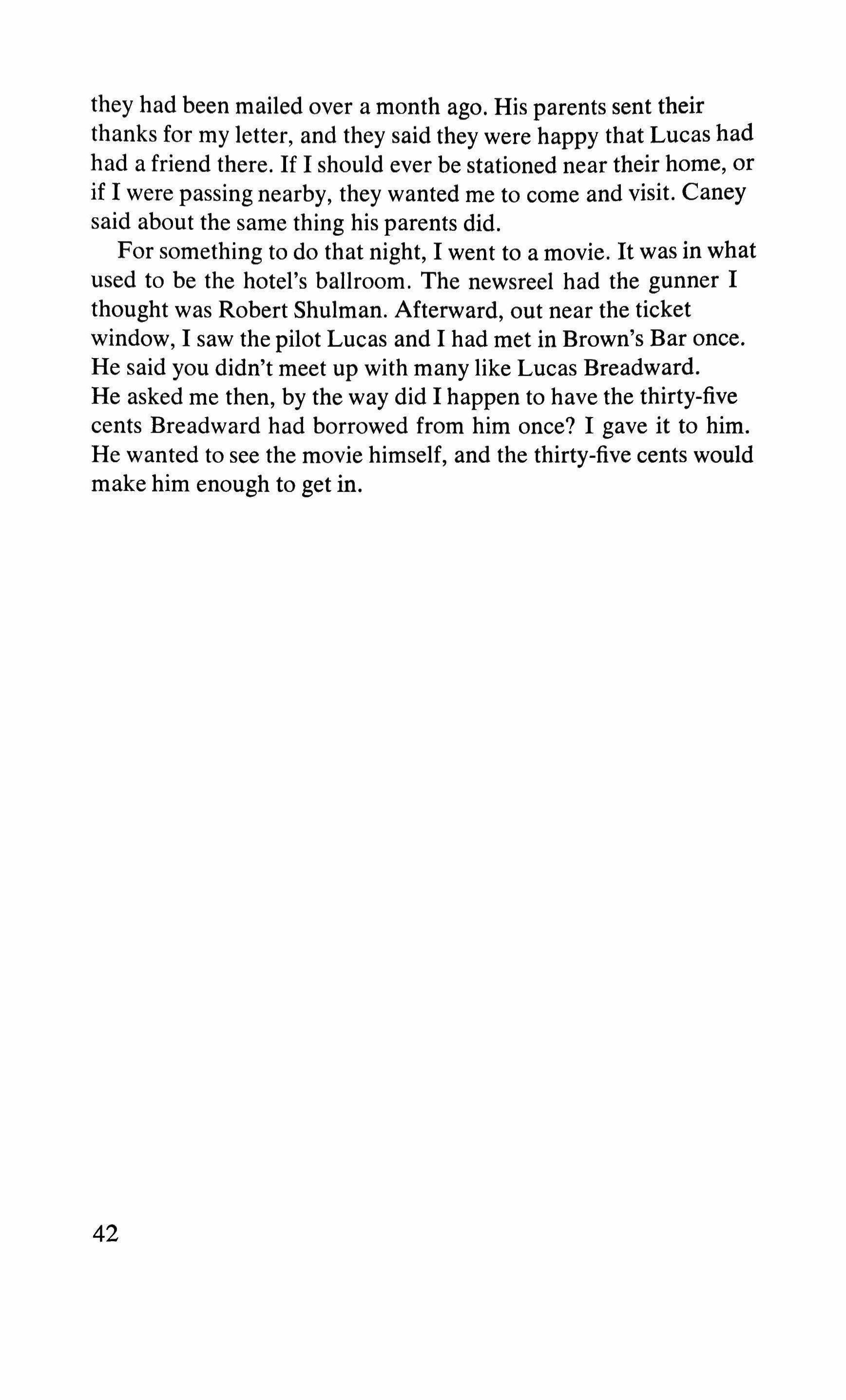
they had been mailed over a month ago. His parents sent their thanks for my letter, and they said they were happy that Lucas had had a friend there. If I should ever be stationed near their home, or if I were passing nearby, they wanted me to come and visit. Caney said about the same thing his parents did. For something to do that night, I went to a movie. It was in what used to be the hotel's ballroom. The newsreel had the gunner I thought was Robert Shulman. Afterward, out near the ticket window, I saw the pilot Lucas and I had met in Brown's Bar once. He said you didn't meet up with many like Lucas Breadward. He asked me then, by the way did I happen to have the thirty-five cents Breadward had borrowed from him once? I gave it to him. He wanted to see the movie himself, and the thirty-five cents would make him enough to get in.
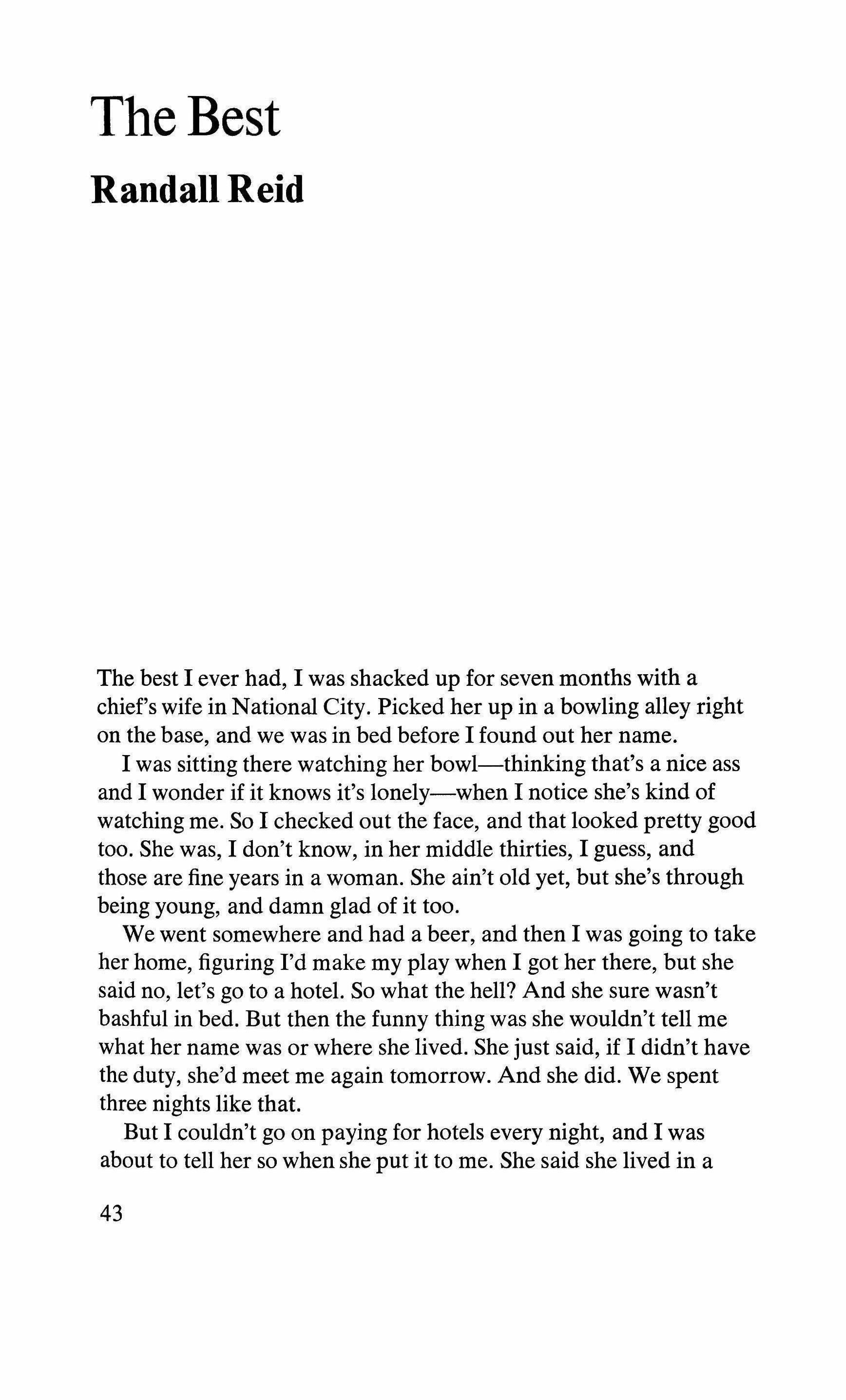
The best I ever had, I was shacked up for seven months with a chief's wife in National City. Picked her up in a bowling alley right on the base, and we was in bed before I found out her name.
I was sitting there watching her bowl-thinking that's a nice ass and I wonder if it knows it's lonely-when I notice she's kind of watching me. So I checked out the face, and that looked pretty good too. She was, I don't know, in her middle thirties, I guess, and those are fine years in a woman. She ain't old yet, but she's through being young, and damn glad of it too.
We went somewhere and had a beer, and then I was going to take her home, figuring I'd make my play when I got her there, but she said no, let's go to a hotel. So what the hell? And she sure wasn't bashful in bed. But then the funny thing was she wouldn't tell me what her name was or where she lived. She just said, if I didn't have the duty, she'd meet me again tomorrow. And she did. We spent three nights like that.
But I couldn't go on paying for hotels every night, and I was about to tell her so when she put it to me. She said she lived in a
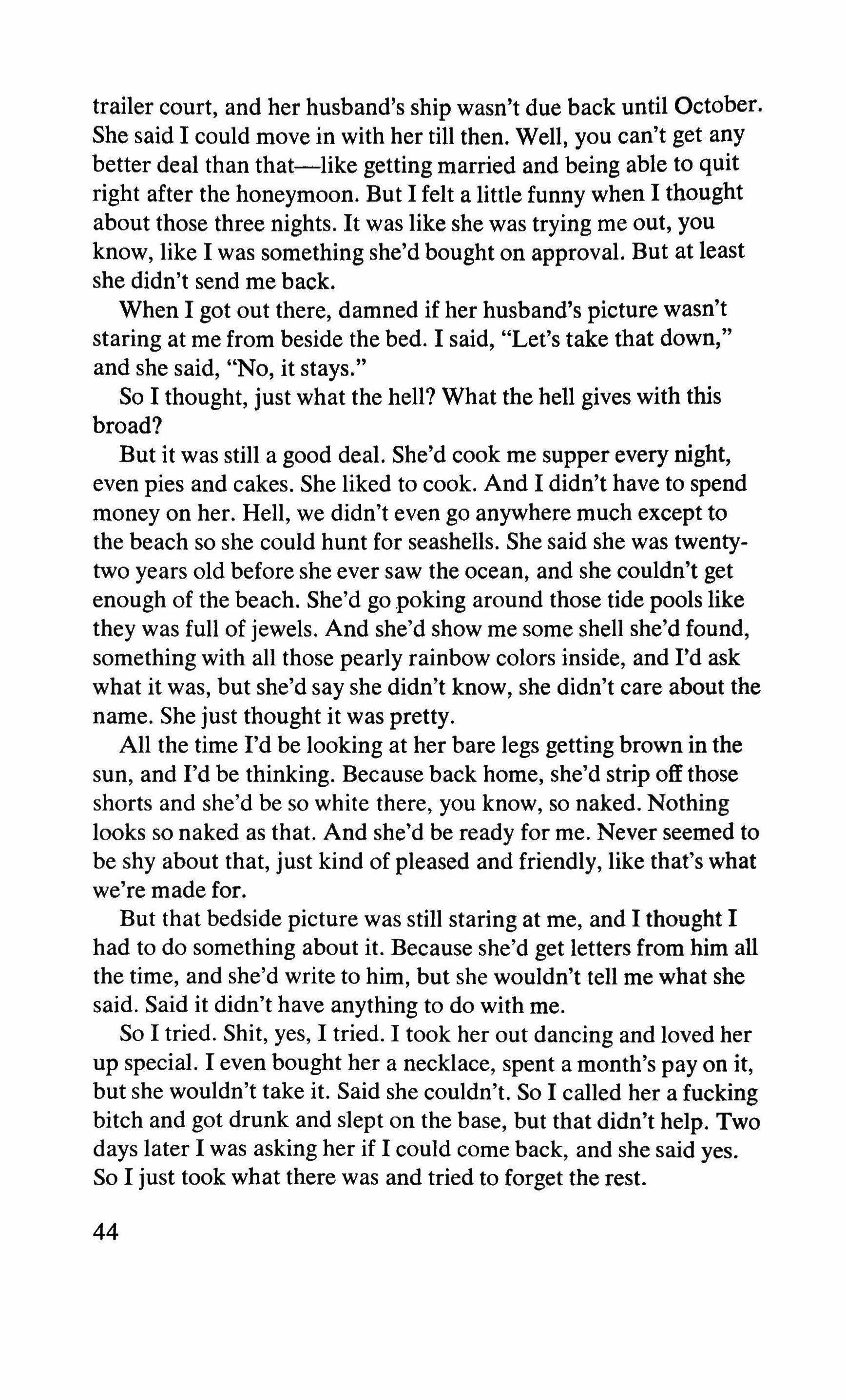
trailer court, and her husband's ship wasn't due back until October. She said I could move in with her till then. Well, you can't get any better deal than that-like getting married and being able to quit right after the honeymoon. But I felt a little funny when I thought about those three nights. It was like she was trying me out, you know, like I was something she'd bought on approval. But at least she didn't send me back.
When I got out there, damned if her husband's picture wasn't staring at me from beside the bed. I said, "Let's take that down," and she said, "No, it stays."
So I thought, just what the hell? What the hell gives with this broad?
But it was still a good deal. She'd cook me supper every night, even pies and cakes. She liked to cook. And I didn't have to spend money on her. Hell, we didn't even go anywhere much except to the beach so she could hunt for seashells. She said she was twentytwo years old before she ever saw the ocean, and she couldn't get enough of the beach. She'd go poking around those tide pools like they was full of jewels. And she'd show me some shell she'd found, something with all those pearly rainbow colors inside, and I'd ask what it was, but she'd say she didn't know, she didn't care about the name. She just thought it was pretty.
All the time I'd be looking at her bare legs getting brown in the sun, and I'd be thinking. Because back home, she'd strip off those shorts and she'd be so white there, you know, so naked. Nothing looks so naked as that. And she'd be ready for me. Never seemed to be shy about that, just kind of pleased and friendly, like that's what we're made for.
But that bedside picture was still staring at me, and I thought I had to do something about it. Because she'd get letters from him all the time, and she'd write to him, but she wouldn't tell me what she said. Said it didn't have anything to do with me.
So I tried. Shit, yes, I tried. I took her out dancing and loved her up special. I even bought her a necklace, spent a month's pay on it, but she wouldn't take it. Said she couldn't. So I called her a fucking bitch and got drunk and slept on the base, but that didn't help. Two days later I was asking her if I could come back, and she said yes. So I just took what there was and tried to forget the rest.

The nights was hot then, so we'd sit there in our skivvies watching TV and having a beer, and maybe now and then you'd hear wheels crunch the gravel and somebody's headlights would hit the trailer and then swing on by, but that was all. It was just so quiet. I never knew things could be so nice and quiet.
And her hair. It wasn't any special color, kind of brownishblonde, but I liked to watch her brush it. Her face would get still and soft, like she was thinking about something nobody knew, and that hair would just float like it was made of light.
At last, of course-well, it just had to end. He was coming back. So she said good-bye and thanked me for being good to her. She even cried a little, but she made me go. And not no last-minute getaway, neither. She made me leave a week before. She said, "I want to be hungry for him when he comes."
I asked her had she done it before, and she said, yes, every time he shipped out. She didn't like bars and she was afraid of picking up some nut, so she'd just come down to the base and bowl. And look around till she found somebody she thought she'd like. Somebody clean. She said she was healthy and needed loving, but it was more than that. She didn't like being alone, said it didn't feel right. She was used to having a man around.
I asked her did he know, and she said she wasn't sure, but she figured he probably did. But he never asked and she never told.
"And don't he care?"
"I guess he might if he thought about it. But when he's gone, I know he probably has other women, and I don't think about that, either. It's better not to think."
So I wasn't pulling any big deal. It was more like you'd take care of a man's kids if he was away. And sure, it's good for them, and maybe they're grateful, but you ain't their daddy still.
No, she knew me, and I did too. I wasn't no threat to him.
But she was still the best. I wasn't her first or her last, but she was the best. And I had her for a while. A man could have lots of things in this world if he'd just get off his pride.
Her name was Marvalee, Marvalee Banks. She was from Kansas or Nebraska or somewhere, and she acted just like somebody you'd meet in church. You know, simple and friendly, but kind of dignified. Nicest woman I ever knew.

It's ten o'clock and there's only three of us on the corner. There's Dumbo over there on the newspaper box and Keith and me standing here and we've been hanging around most of the afternoon and night. It's really hot. It feels like I'm in a closet. No air or anything. Seems like we've just been standing around all day doing nothing, but I keep having this feeling that something's going to happen. I don't know what, but it'll be pretty soon, I think. Still a lot of traffic on the avenue, cars and buses and stuff. There's something up behind the buildings. A siren, real faint like.
"Is that a fire?" Keith says.
We turn our heads and listen as the siren comes down toward us, getting louder. We listen and it comes on and builds. The cars on the avenue begin to pull over and I know it's going to come slamming out a side street in just a second. It'll scream down on us, throwing that crazy red light against the street and buildings and everything, and I think, you know, something is going to happen here. This is it, but real quick it goes off to the left and begins to fade out. We never even see it. The cars on the avenue pull to the center and begin to move again.

"That wasn't a fire," I say. "That was an ambulance."
Keith listens to the end of the siren and turns back. He puts his hands in his pockets again.
"What d' you want to do now?" he says.
"I don't care," I say. "I mean, whatever you want."
"I don't know," Keith says. "I can't figure what I want to do tonight. It's goddamn hot."
He's beensaying it's hot all night. I mean he's right. It always gets sticky like this in August. You go around all day waiting for dark so things will cool down, but it doesn't work like that. The heat's like in the sidewalks and streets and buildings and every goddamn thing and it never does cool down. You can't get away from it either. Like those people down the avenue there sitting on the steps. They come down out of their apartments and sit on the street, but it's no different out here than it is inside. Even out here it's like being locked in a closet. You can't breathe. No air. Those men on the steps in their T-shirts, drinking beer or iced tea or soda. That's no help. And the women have their dresses up over their knees and they're fanning themselves on the neck with the paper. That's no help either. Like I say, when it gets like this, you can't get away from it.
Keith looks over at Dumbo on the newspaper box beating out a rhythm on the tin. Keith stares at him like he does sometimes, trying to figure what's going on in his head. A little while ago we were in the Sugar Bowl playing the pinball and a new song came on Henry's radio. Dumbo really liked it and keptyelling at Henry to turn it up. After Henry threw us out, Dumbo tried to beat out the song on the box, but he couldn't get it straight so he decided to make up his own song. He's really into it now, sitting there with his eyes half-closed, banging away. Keith smiles at him and shakes his head soft like. He walks over to the stairs that lead down into the Sugar Bowl.
"Hey, Teddy," he calls. "Look at this. He's still sitting there."
I walk over and look down the stairwell into the store. The window is real dirty and at the top there's tinsel and red and blue tinfoil bells hanging on a string from some Christmas a long time ago. Henry is sitting just inside on the front counter stool leaning over his paper. All the lights in the store are out except for the one that hangs from the wire over his head. He's wearing that old greasy apron, and there are dark wet circles spreading out from under his

arm. His eyes seem to be fixed on one spot in the middle of the paper, and I wonder if he's really reading or what. I lean over the rail and look down into the bottom of the stairwell. There's nothing down there but the smell of fried onions and hot grease.
"It takes him all day to read that paper," Keith says.
"Yeah, well, I think he reads it over and over."
"Maybe so," Keith says. "I wonder how come he closed up so early?"
"Too hot for him."
"Hey, it's never too hot for Henry to make money."
"Well, maybe Dumbo pissed him off telling him that Jew-writing allover his paper wasn't words."
"Naw, man. Dumbo's always saying that shit. Henry don't pay any attention to him."
"Well, I don't know then."
Keith looks over his shoulder at Dumbo, who is still pounding away, and then he looks back at Henry.
"How do you figure that?" he says.
"What?"
"I mean, a Jew that don't wanna make money. I don't know how to figure that."
"Maybe he's got enough money now," I say.
Keith looks at me.
"You think so?"
I shrug.
"Maybe so," he says. "I wonder how much, though. I seen him a lot of times take the money from the register and put it in that tin box, but I never thought about how much was in there. How much do you think?"
"I dunno," I say.
"A hundred?"
I shrug.
"Fifty? Twenty? How much?"
"I don't have any idea," I say.
"I think a hundred," Keith says. "Yeah, at least a hundred. Maybe more."
He thinks for a minute, then turns to me and smiles, raising his eyebrows like he does sometimes.
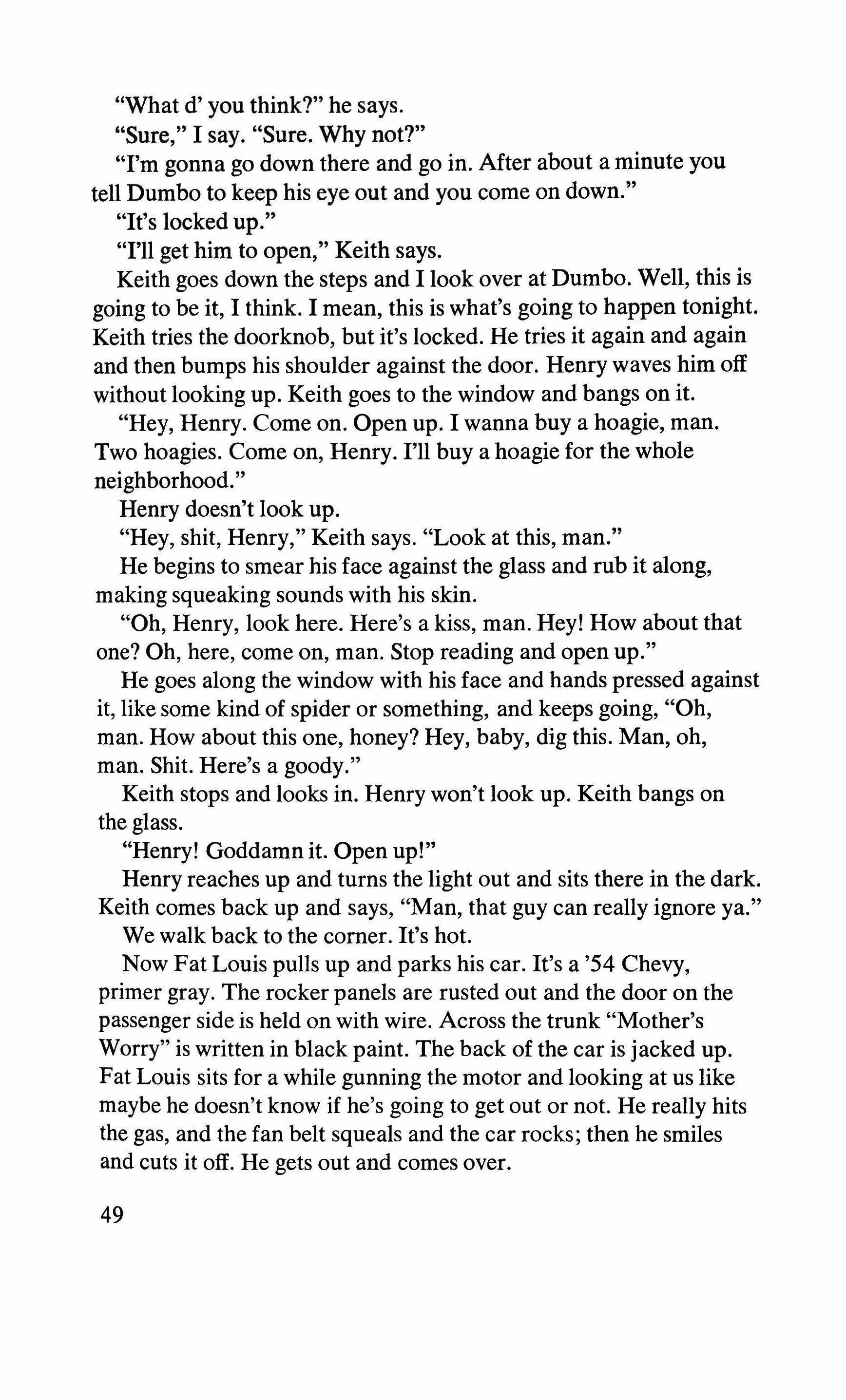
"What d' you think?" he says.
"Sure," I say. "Sure. Why not?"
"I'm gonna go down there and go in. After about a minute you tell Dumbo to keep his eye out and you come on down."
"It's locked up."
"I'll get him to open," Keith says.
Keith goes down the steps and I look over at Dumbo. Well, this is going to be it, I think. I mean, this is what's going to happen tonight. Keith tries the doorknob, but it's locked. He tries it again and again and then bumps his shoulder against the door. Henry waves him off without looking up. Keith goes to the window and bangs on it.
"Hey, Henry. Come on. Open up. I wanna buy a hoagie, man. Two hoagies. Come on, Henry. I'll buy a hoagie for the whole neighborhood. "
Henry doesn't look up.
"Hey, shit, Henry," Keith says. "Look at this, man."
He begins to smear his face against the glass and rub it along, making squeaking sounds with his skin.
"Oh, Henry, look here. Here's a kiss, man. Hey! How about that one? Oh, here, come on, man. Stop reading and open up."
He goes along the window with his face and hands pressed against it, like some kind of spider or something, and keeps going, "Oh, man. How about this one, honey? Hey, baby, dig this. Man, oh, man. Shit. Here's a goody."
Keith stops and looks in. Henry won't look up. Keith bangs on the glass.
"Henry! Goddamn it. Open up!"
Henry reaches up and turns the light out and sits there in the dark. Keith comes back up and says, "Man, that guy can really ignore ya."
We walk back to the corner. It's hot.
Now Fat Louis pulls up and parks his car. It's a '54 Chevy, primer gray. The rocker panels are rusted out and the door on the passenger side is held on with wire. Across the trunk "Mother's Worry" is written in black paint. The back of the car is jacked up. Fat Louis sits for a while gunning the motor and looking at us like maybe he doesn't know if he's going to get out or not. He really hits the gas, and the fan belt squeals and the car rocks; then he smiles and cuts it off. He gets out and comes over.
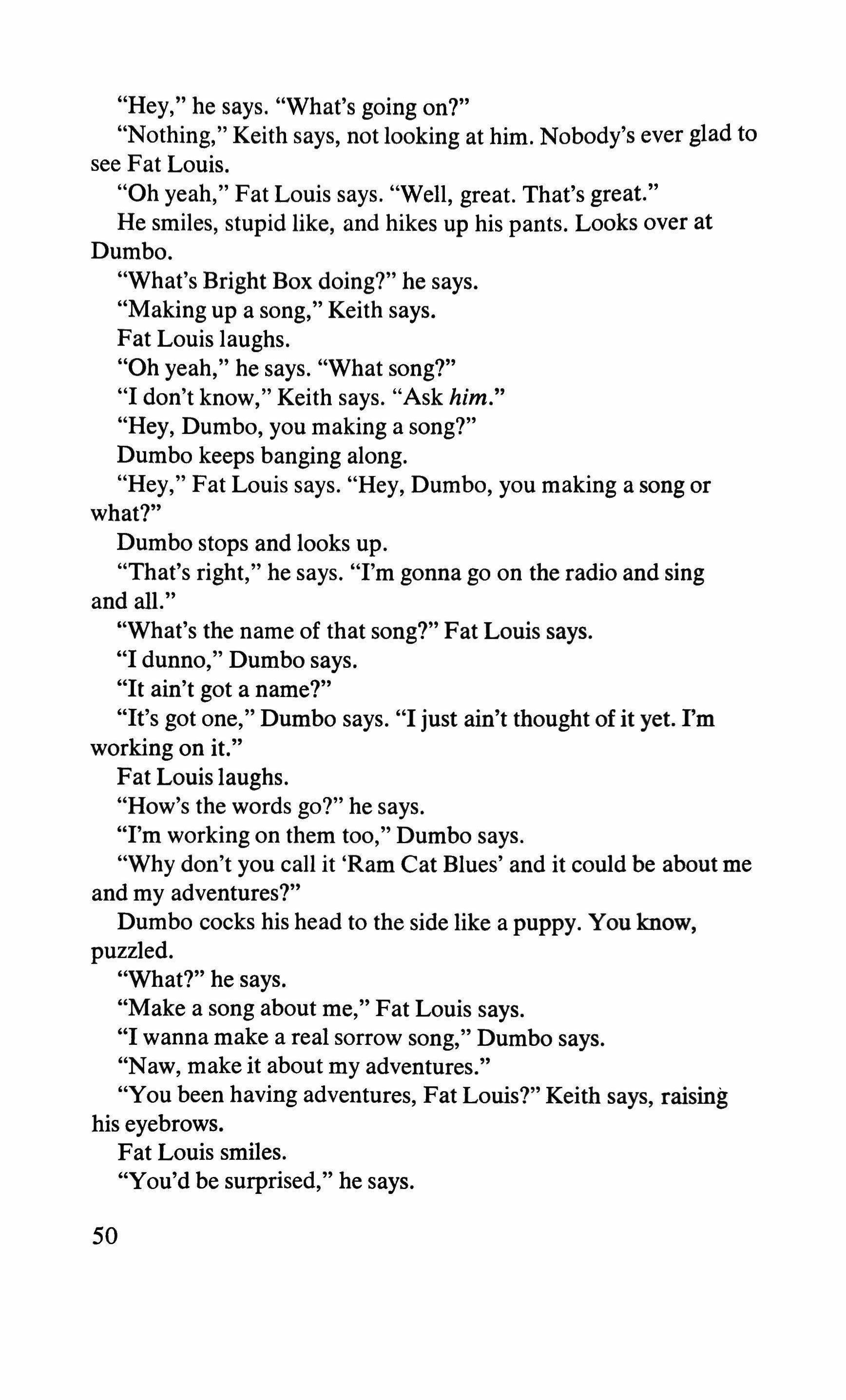
"Hey," he says. "What's going on?"
"Nothing," Keith says, not looking at him. Nobody's ever glad to see Fat Louis.
"Oh yeah," Fat Louis says. "Well, great. That's great."
He smiles, stupid like, and hikes up his pants. Looks over at Dumbo.
"What's Bright Box doing?" he says.
"Making up a song," Keith says.
Fat Louis laughs.
"Oh yeah," he says. "What song?"
"I don't know," Keith says. "Ask him."
"Hey, Dumbo, you making a song?"
Dumbo keeps banging along.
"Hey," Fat Louis says. "Hey, Dumbo, you making a song or what?"
Dumbo stops and looks up.
"That's right," he says. "I'm gonna go on the radio and sing and all."
"What's the name of that song?" Fat Louis says.
"I dunno," Dumbo says.
"It ain't got a name?"
"It's got one," Dumbo says. "I just ain't thought of it yet. I'm working on it."
Fat Louis laughs.
"How's the words go?" he says.
"I'm working on them too," Dumbo says.
"Why don't you call it 'Ram Cat Blues' and it could be about me and my adventures?"
Dumbo cocks his head to the side like a puppy. You know, puzzled.
"What?" he says.
"Make a song about me," Fat Louis says.
"I wanna make a real sorrow song," Dumbo says.
"Naw, make it about my adventures."
"You been having adventures, Fat Louis?" Keith says, raising his eyebrows.
Fat Louis smiles.
"You'd be surprised," he says.

"I really would," Keith says.
"Fat Louis," Dumbo says, "I don't think anybody'd want to listen to a song about you."
Keith smiles.
"You're a pisser," Fat Louis says to Dumbo. He turns away and 1 look over at him. He's standing there with his hands under his armpits and wearing aT-shirt and black pants that are tight and pegged. His stomach hangs down over his belt. He sucks at his teeth and looks back over his shoulder at the car, thinking.
"The Roller Rink's almost out," he says, casual like.
"So what?" Keith says.
"Let's go down there and pick something up."
"At the Roller Rink?"
"Hey, now," Fat Louis says. "I just came from there. 1 was looking in through the door and seen some real nice girls in there. They're wearing those little dresses and everything. Let's go down there and wait outside. Maybe we can take something home."
"Somehow 1 can't see that," Keith says.
"What d' you mean?"
"Well, when 1 think about it, 1 just can't see a girl getting in the car with you. 1 mean, you got that car in June and all you been doing since then is drive around and drive around yelling things at girls. Nobody's got in yet."
"One of them might get in if you say the right thing," Fat Louis says. "See, here's what I'm thinking. We go over to the Roller Rink, and when one comes out I'll let you do all the talking. You always been good at that. 1 won't say a word, see. I'll just be a driver."
"You're dreaming," Keith says. "It'll never work."
"Well, you never know if you don't try," Fat Louis says. "That's the way I'm thinking."
"I don't want to go over there."
"Why not?"
"If we were to go over there and a girl did get in the car, I'd be scared to death," Keith says.
"Of what?" Fat Louis says. "What would you be scared of?"
"Of any girl who'd get in the car with you."
Keith looks away and kind of snickers. Dumbo goes on beating

on the box. We stand around a little while. I keep looking at Fat Louis. His stomach pressing out against his shirt like that keeps making me think of bread dough. He's kind of shaped like one of those big plastic punching toys that you can't knock down because of the sand in the bottom. I'm glad he's here because he seems like he really wants to do something and maybe he'll make it happen. It's goddamn hot.
"Why you looking at me, Teddy?" he says. "I wasn't."
"Well, shit," he says. "You been staring at me since I got here. You always stare at people like that. Quit it, will you? You make me feel funny."
"Sorry," I say. Keith laughs.
Fat Louis shrugs his shoulders and looks over at Dumbo who has begun to sing do-do-dum to go along with his pounding.
Fat Louis is talking under his breath. "Weird fuck. Son of a bitchin' weird fuck. Standin' around lookin' at everything and never talking."
See, Fat Louis is mad now because we won't do what he wants. He won't bother me and I know for sure he won't bother Keith, but he's mad now and he's got to find somebody to work on. He's going to start on Dumbo. He watches Dumbo make his song for a little while.
"Would you cut that out?" he says. Dumbo stops and looks up.
"I ain't bothering nobody," he says. "Let me alone."
"Quit pounding on that fuckin' box," Fat Louis says.
"What'm 1 doing?" Dumbo says "You're being dumb," Fat Louis says.
"Well," Dumbo says. "Let me be."
"You quit that shit," Fat Louis says and takes a step toward him.
"Back off," Keith says.
Fat Louis looks at him and Keith looks away. Fat Louis looks really hard at Keith and Keith begins to whistle through his teeth. This is real interesting. Now I've seen this kind of thing lots of times and nothing ever happens. Keith has never had a fight with anybody and Fat Louis fights all the time. I've seen him really hurt a few
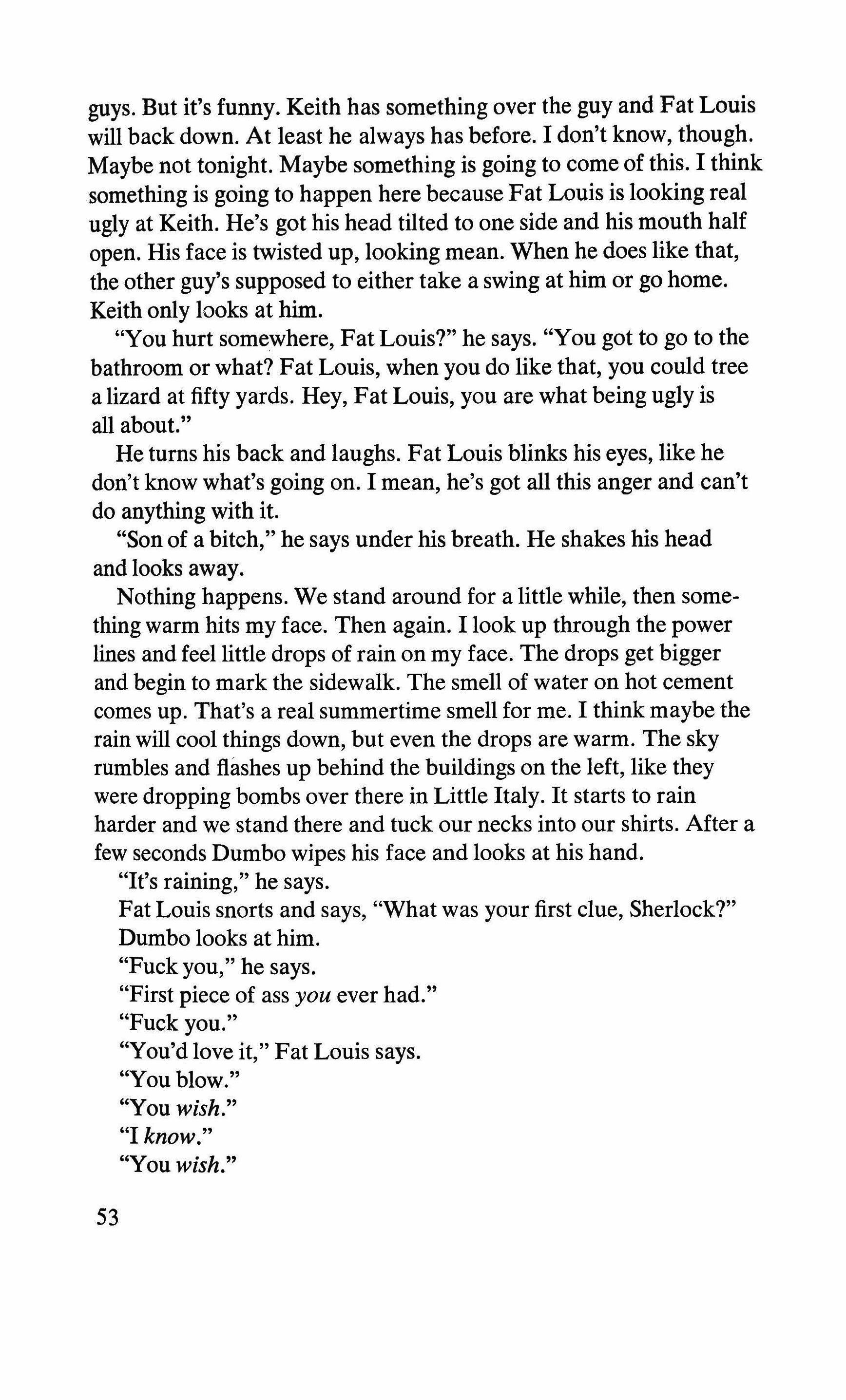
guys. But it's funny. Keith has something over the guy and Fat Louis will back down. At least he always has before. 1 don't know, though. Maybe not tonight. Maybe something is going to come of this. 1 think something is going to happen here because Fat Louis is looking real ugly at Keith. He's got his head tilted to one side and his mouth half open. His face is twisted up, looking mean. When he does like that, the other guy's supposed to either take a swing at him or go home. Keith only looks at him.
"You hurt somewhere, Fat Louis?" he says. "You got to go to the bathroom or what? Fat Louis, when you do like that, you could tree a lizard at fifty yards. Hey, Fat Louis, you are what being ugly is all about."
He turns his back and laughs. Fat Louis blinks his eyes, like he don't know what's going on. 1 mean, he's got all this anger and can't do anything with it.
"Son of a bitch," he says under his breath. He shakes his head and looks away.
Nothing happens. We stand around for a little while, then something warm hits my face. Then again. 1 look up through the power lines and feel little drops of rain on my face. The drops get bigger and begin to mark the sidewalk. The smell of water on hot cement comes up. That's a real summertime smell for me. 1 think maybe the rain will cool things down, but even the drops are warm. The sky rumbles and flashes up behind the buildings on the left, like they were dropping bombs over there in Little Italy. It starts to rain harder and we stand there and tuck our necks into our shirts. After a few seconds Dumbo wipes his face and looks at his hand.
"It's raining," he says.
Fat Louis snorts and says, "What was your first clue, Sherlock?" Dumbo looks at him.
"Fuck you," he says.
"First piece of ass you ever had."
"Fuck you."
"You'd love it," Fat Louis says.
"You blow."
"You wish."
"I know."
"You wish."
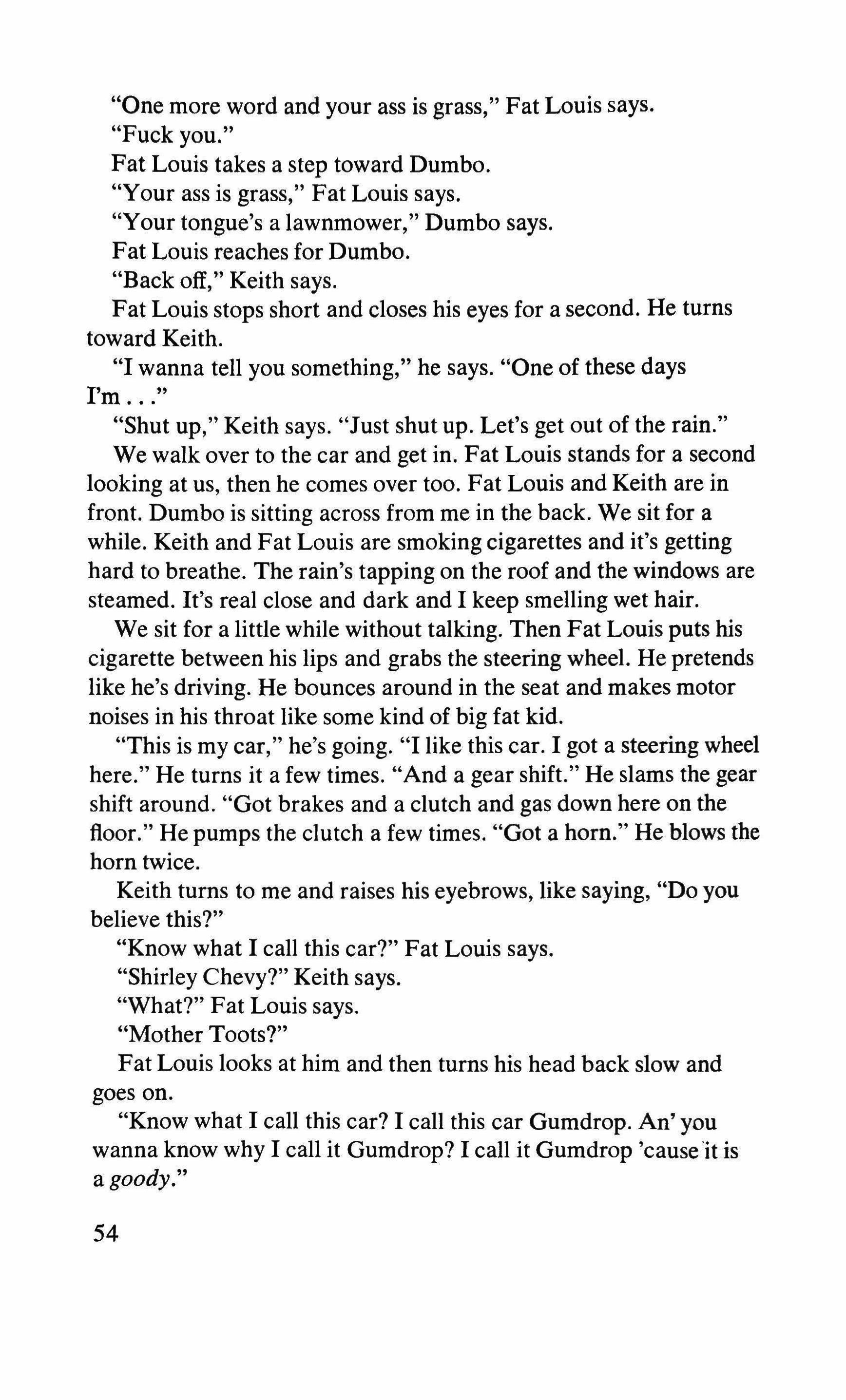
"One more word and your ass is grass," Fat Louis says. "Fuck you."
Fat Louis takes a step toward Dumbo.
"Your ass is grass," Fat Louis says.
"Your tongue's a lawnmower," Dumbo says.
Fat Louis reaches for Dumbo.
"Back off," Keith says.
Fat Louis stops short and closes his eyes for a second. He turns toward Keith.
"I wanna tell you something," he says. "One of these days I'm "
"Shut up," Keith says. "Just shut up. Let's get out of the rain."
We walk over to the car and get in. Fat Louis stands for a second looking at us, then he comes over too. Fat Louis and Keith are in front. Dumbo is sitting across from me in the back. We sit for a while. Keith and Fat Louis are smoking cigarettes and it's getting hard to breathe. The rain's tapping on the roof and the windows are steamed. It's real close and dark and I keep smelling wet hair.
We sit for a little while without talking. Then Fat Louis puts his cigarette between his lips and grabs the steering wheel. He pretends like he's driving. He bounces around in the seat and makes motor noises in his throat like some kind of big fat kid.
"This is my car," he's going. "I like this car. I got a steering wheel here." He turns it a few times. "And a gear shift." He slams the gear shift around. "Got brakes and a clutch and gas down here on the floor." He pumps the clutch a few times. "Got a horn." He blows the horn twice.
Keith turns to me and raises his eyebrows, like saying, "Do you believe this?"
"Know what I call this car?" Fat Louis says.
"Shirley Chevy?" Keith says.
"What?" Fat Louis says.
"Mother Toots?"
Fat Louis looks at him and then turns his head back slow and goes on.
"Know what I call this car? I call this car Gumdrop. An' you wanna know why I call it Gumdrop? I call it Gumdrop 'cause'it is a goody."
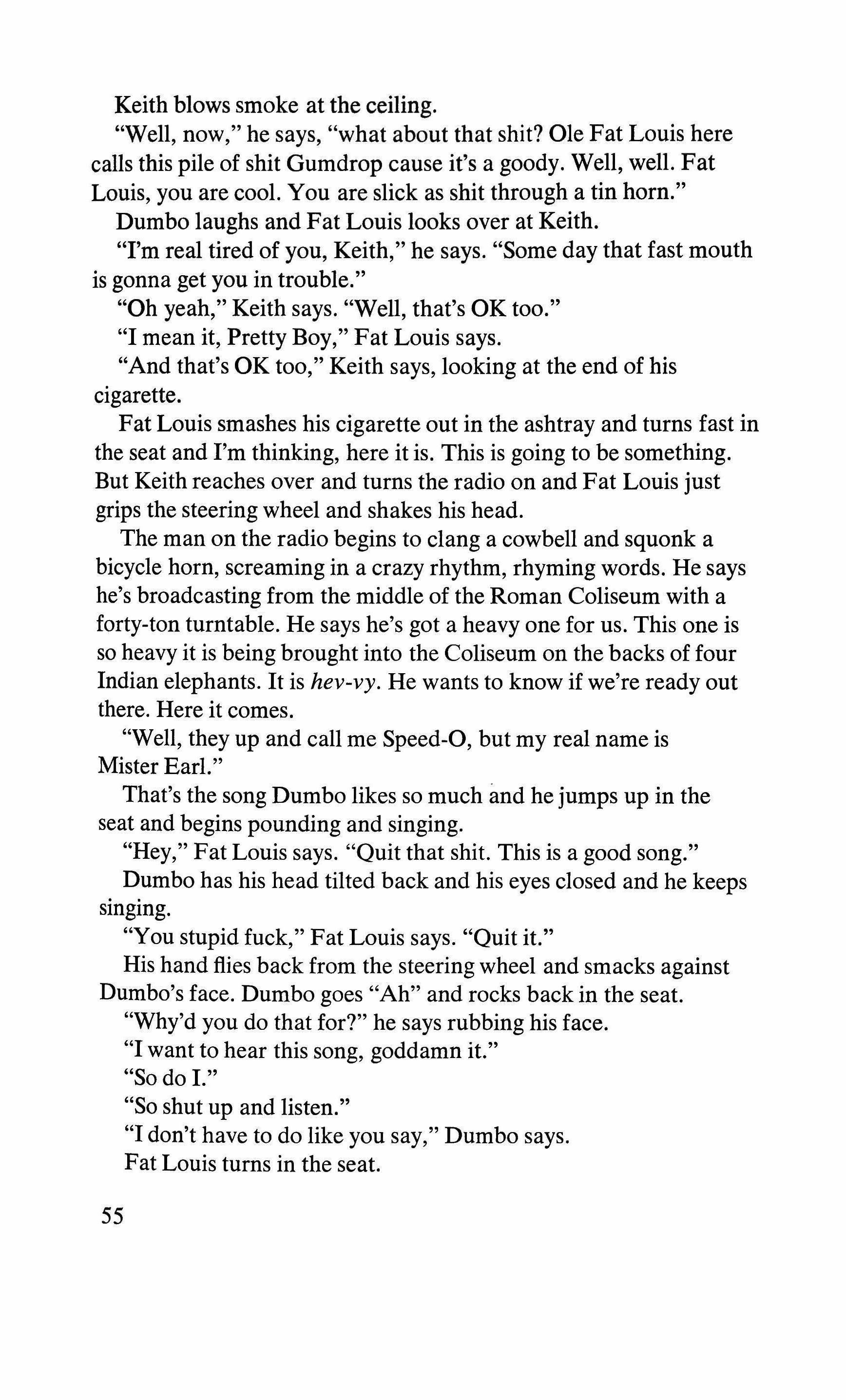
Keith blows smoke at the ceiling.
"Well, now," he says, "what about that shit? Ole Fat Louis here calls this pile of shit Gumdrop cause it's a goody. Well, well. Fat Louis, you are cool. You are slick as shit through a tin horn."
Dumbo laughs and Fat Louis looks over at Keith.
"I'm real tired of you, Keith," he says. "Some day that fast mouth is gonna get you in trouble."
"Oh yeah," Keith says. "Well, that's OK too."
"I mean it, Pretty Boy," Fat Louis says.
"And that's OK too," Keith says, looking at the end of his cigarette.
Fat Louis smashes his cigarette out in the ashtray and turns fast in the seat and I'm thinking, here it is. This is going to be something. But Keith reaches over and turns the radio on and Fat Louis just grips the steering wheel and shakes his head.
The man on the radio begins to clang a cowbell and squonk a bicycle horn, screaming in a crazy rhythm, rhyming words. He says he's broadcasting from the middle of the Roman Coliseum with a forty-ton turntable. He says he's got a heavy one for us. This one is so heavy it is beingbrought into the Coliseum on the backs of four Indian elephants. It is hev-vy. He wants to know if we're ready out there. Here it comes.
"Well, they up and call me Speed-O, but my real name is Mister Earl."
That's the song Dumbo likes so much and he jumps up in the seat and begins pounding and singing.
"Hey," Fat Louis says. "Quit that shit. This is a good song."
Dumbo has his head tilted back and his eyes closed and he keeps singing.
"You stupid fuck," Fat Louis says. "Quit it."
His hand flies back from the steering wheel and smacks against Dumbo's face. Dumbo goes "Ah" and rocks back in the seat.
"Why'd you do that for?" he says rubbing his face.
"I want to hear this song, goddamn it."
"So do 1."
"So shut up and listen."
"I don't have to do like you say," Dumbo says.
Fat Louis turns in the seat.
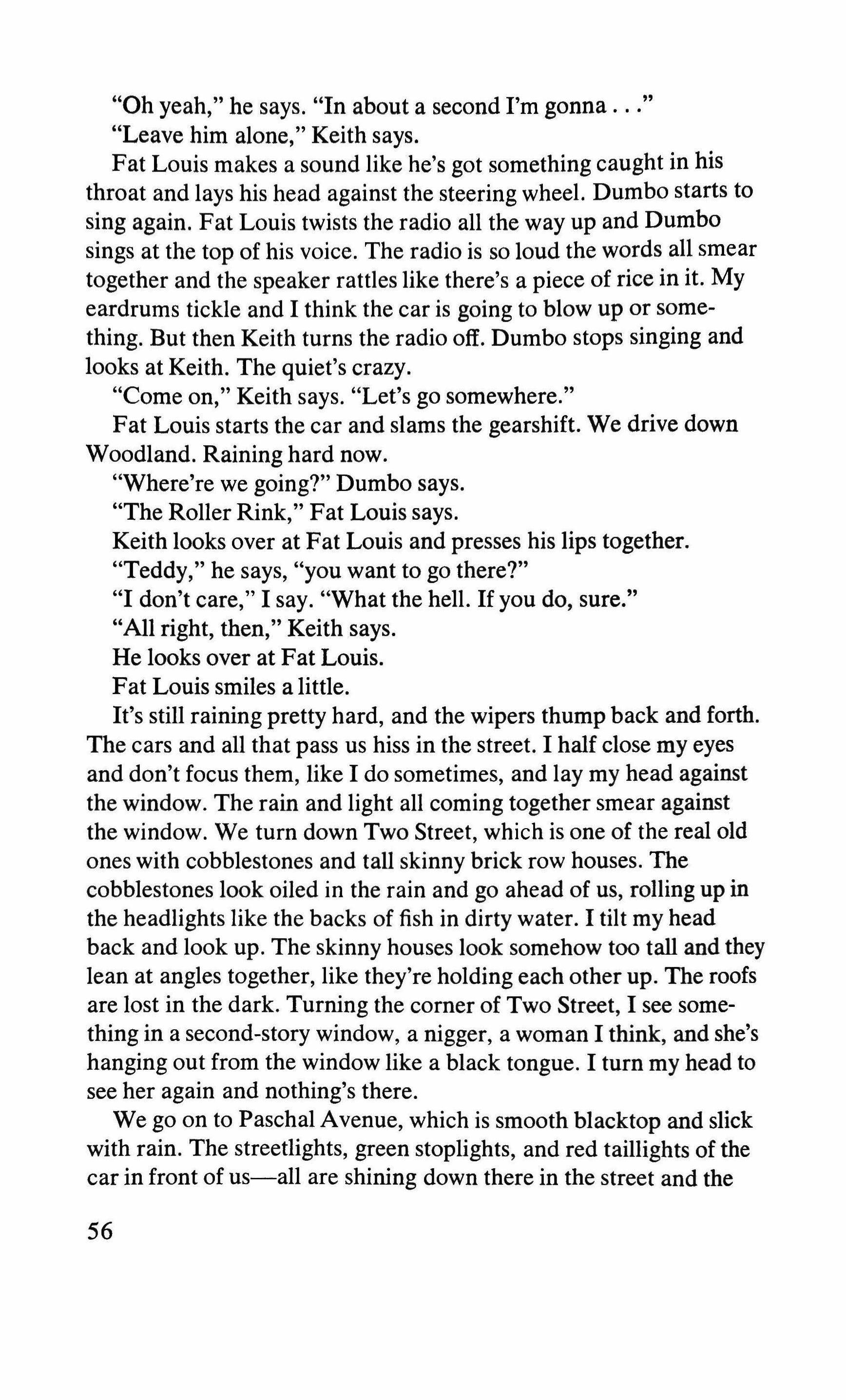
"Oh yeah," he says. "In about a second I'm gonna "
"Leave him alone," Keith says.
Fat Louis makes a sound like he's got something caught in his throat and lays his head against the steering wheel. Dumbo starts to sing again. Fat Louis twists the radio all the way up and Dumbo sings at the top of his voice. The radio is so loud the words all smear together and the speaker rattles like there's a piece of rice in it. My eardrums tickle and I think the car is going to blow up or something. But then Keith turns the radio off. Dumbo stops singing and looks at Keith. The quiet's crazy.
"Come on," Keith says. "Let's go somewhere."
Fat Louis starts the car and slams the gearshift. We drive down Woodland. Raining hard now.
"Where're we going?" Dumbo says.
"The Roller Rink," Fat Louis says.
Keith looks over at Fat Louis and presses his lips together.
"Teddy," he says, "you want to go there?"
"I don't care," I say. "What the hell. If you do, sure."
"All right, then," Keith says.
He looks over at Fat Louis.
Fat Louis smiles a little.
It's still raining pretty hard, and the wipers thump back and forth. The cars and all that pass us hiss in the street. I half close my eyes and don't focus them, like I do sometimes, and lay my head against the window. The rain and light all coming together smear against the window. We turn down Two Street, which is one of the real old ones with cobblestones and tall skinny brick row houses. The cobblestones look oiled in the rain and go ahead of us, rolling up in the headlights like the backs of fish in dirty water. I tilt my head back and look up. The skinny houses look somehow too tall and they lean at angles together, like they're holding each other up. The roofs are lost in the dark. Turning the corner of Two Street, I see something in a second-story window, a nigger, a woman I think, and she's hanging out from the window like a black tongue. I turn my head to see her again and nothing's there.
We go on to Paschal Avenue, which is smooth blacktop and slick with rain. The streetlights, green stoplights, and red taillights of the car in front of us-all are shining down there in the street and the
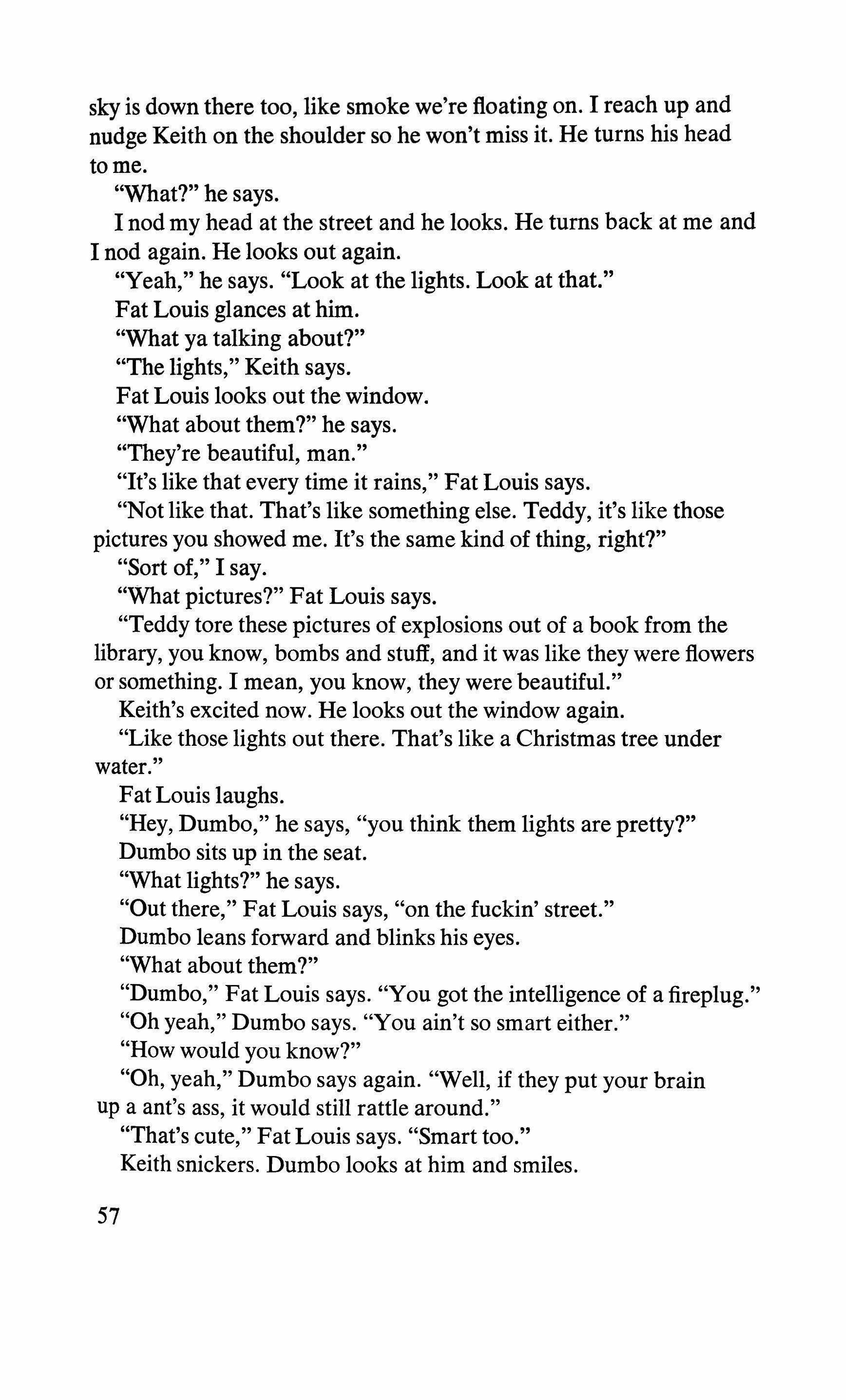
sky is down there too, like smoke we're floating on. I reach up and nudge Keith on the shoulder so he won't miss it. He turns his head tome.
"What?" he says.
I nod my head at the street and he looks. He turns back at me and I nod again. He looks out again.
"Yeah," he says. "Look at the lights. Look at that."
Fat Louis glances at him.
"What ya talking about?"
"The lights," Keith says.
Fat Louis looks out the window.
"What about them?" he says.
"They're beautiful, man."
"It's like that every time it rains," Fat Louis says.
"Not like that. That's like something else. Teddy, it's like those pictures you showed me. It's the same kind of thing, right?"
"Sort of," I say.
"What pictures?" Fat Louis says.
"Teddy tore these pictures of explosions out of a book from the library, you know, bombs and stuff, and it was like they were flowers or something. I mean, you know, they were beautiful."
Keith's excited now. He looks out the window again.
"Like those lights out there. That's like a Christmas tree under water."
Fat Louis laughs.
"Hey, Dumbo," he says, "you think them lights are pretty?" Dumbo sits up in the seat.
"What lights?" he says.
"Out there," Fat Louis says, "on the fuckin' street." Dumbo leans forward and blinks his eyes.
"What about them?"
"Dumbo," Fat Louis says. "You got the intelligence of a fireplug."
"Oh yeah," Dumbo says. "You ain't so smart either."
"How would you know?"
"Oh, yeah," Dumbo says again. "Well, if they put your brain up a ant's ass, it would still rattle around."
"That's cute," Fat Louis says. "Smart too."
Keith snickers. Dumbo looks at him and smiles.
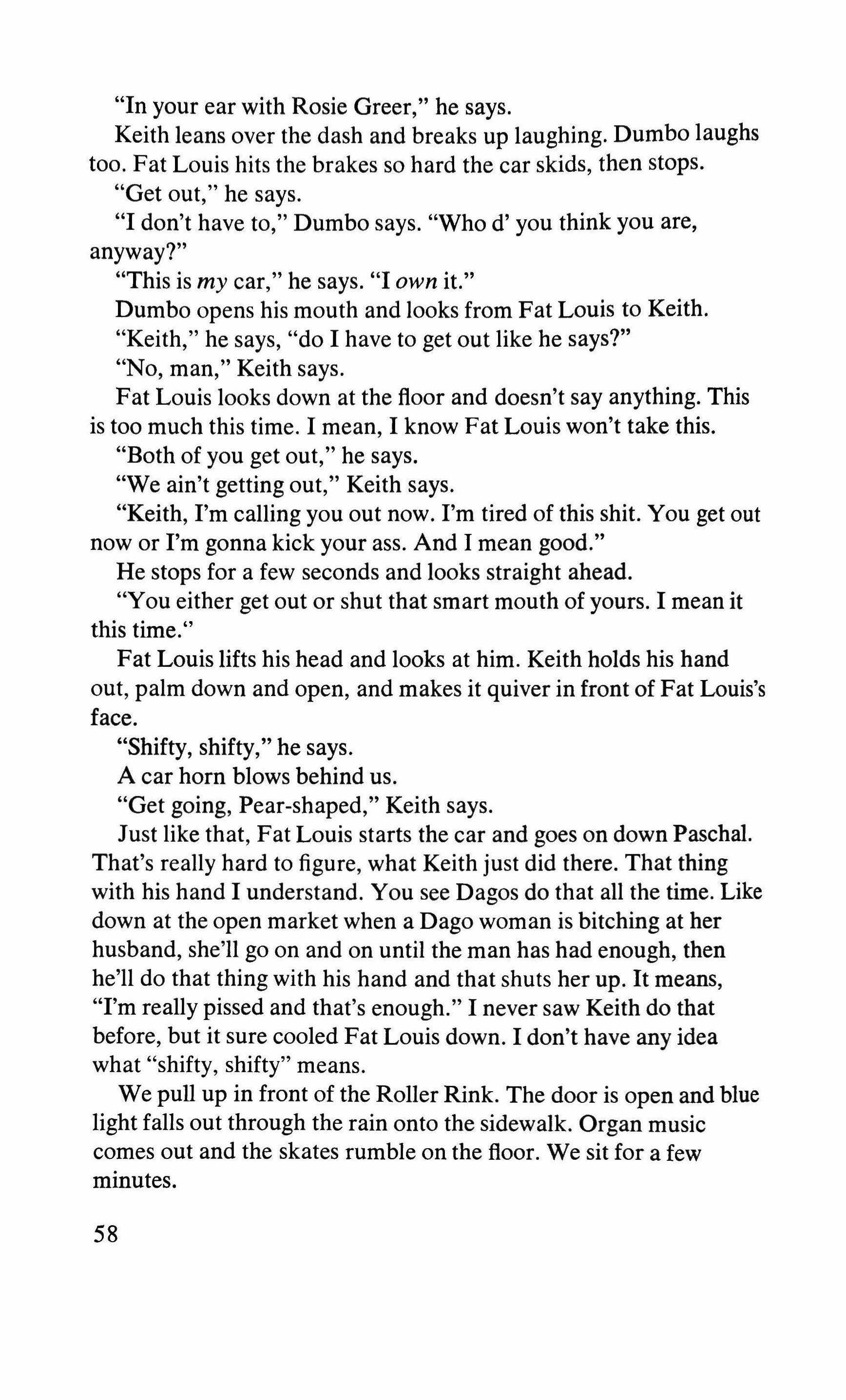
"In your ear with Rosie Greer," he says. Keith leans over the dash and breaks up laughing. Dumbo laughs too. Fat Louis hits the brakes so hard the car skids, then stops.
"Get out," he says.
"I don't have to," Dumbo says. "Who d' you think you are, anyway?"
"This is my car," he says. "I own it."
Dumbo opens his mouth and looks from Fat Louis to Keith.
"Keith," he says, "do I have to get out like he says?"
"No, man," Keith says.
Fat Louis looks down at the floor and doesn't say anything. This is too much this time. I mean, I know Fat Louis won't take this.
"Both of you get out," he says.
"We ain't getting out," Keith says.
"Keith, I'm calling you out now. I'm tired of this shit. You get out now or I'm gonna kick your ass. And I mean good."
He stops for a few seconds and looks straight ahead.
"You either get out or shut that smart mouth of yours. I mean it this time."
Fat Louis lifts his head and looks at him. Keith holds his hand out, palm down and open, and makes it quiver in front of Fat Louis's face.
"Shifty, shifty," he says.
A car horn blows behind us.
"Get going, Pear-shaped," Keith says.
Just like that, Fat Louis starts the car and goes on down Paschal. That's really hard to figure, what Keith just did there. That thing with his hand I understand. You see Dagos do that all the time. Like down at the open market when a Dago woman is bitching at her husband, she'll go on and on until the man has had enough, then he'll do that thing with his hand and that shuts her up. It means, "I'm really pissed and that's enough." I never saw Keith do that before, but it sure cooled Fat Louis down. I don't have any idea what "shifty, shifty" means.
We pull up in front of the Roller Rink. The door is open and blue light falls out through the rain onto the sidewalk. Organ music comes out and the skates rumble on the floor. We sit for a few minutes.
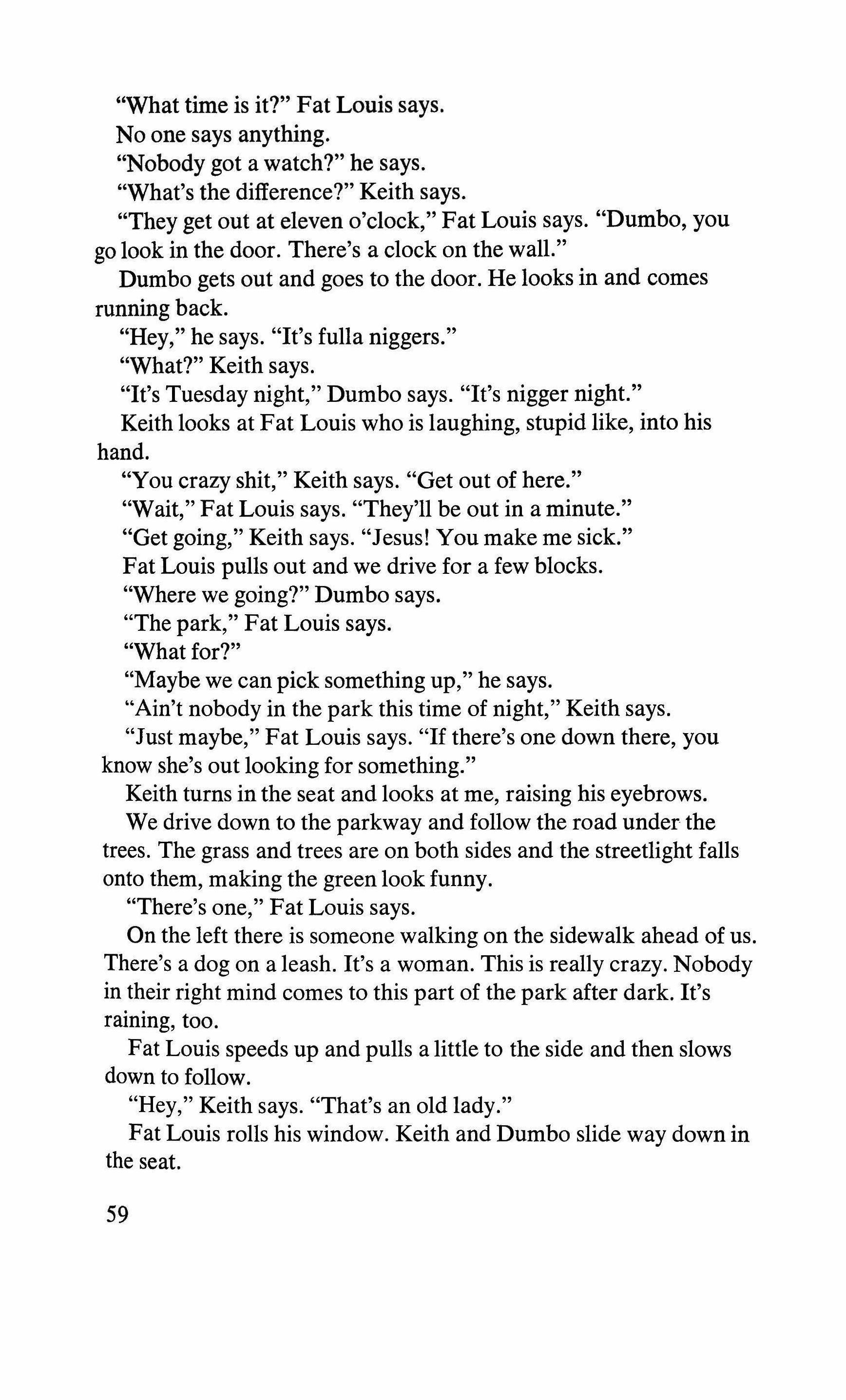
"What time is it?" Fat Louis says. No one says anything.
"Nobody got a watch?" he says.
"What's the difference?" Keith says.
"They get out at eleven o'clock," Fat Louis says. "Dumbo, you go look in the door. There's a clock on the wall."
Dumbo gets out and goes to the door. He looks in and comes running back.
"Hey," he says. "It's fulla niggers."
"What?" Keith says.
"It's Tuesday night," Dumbo says. "It's nigger night."
Keith looks at Fat Louis who is laughing, stupid like, into his hand.
"You crazy shit," Keith says. "Get out of here."
"Wait," Fat Louis says. "They'll be out in a minute."
"Get going," Keith says. "Jesus! You make me sick."
Fat Louis pulls out and we drive for a few blocks.
"Where we going?" Dumbo says.
"The park," Fat Louis says.
"What for?"
"Maybe we can pick something up," he says. "Ain't nobody in the park this time of night," Keith says. "Just maybe," Fat Louis says. "If there's one down there, you know she's out looking for something."
Keith turns in the seat and looks at me, raising his eyebrows. We drive down to the parkway and follow the road under the trees. The grass and trees are on both sides and the streetlight falls onto them, making the green look funny.
"There's one," Fat Louis says.
On the left there is someone walking on the sidewalk ahead of us. There's a dog on a leash. It's a woman. This is really crazy. Nobody in their right mind comes to this part of the park after dark. It's raining, too.
Fat Louis speeds up and pulls a little to the side and then slows down to follow.
"Hey," Keith says. "That's an old lady."
Fat Louis rolls his window. Keith and Dumbo slide way down in the seat.

"Hey, honey!" Fat Louis calls. "Oh, fuck," Keith whispers. "Oh, fuck. Quit it, will ya?"
We're going along behind the woman.
"La-dee," Fat Louis yells.
She begins to walk faster dragging the dog behind her. Fat Louis pulls to the left and jumps the low curb. She stops, picks up the dog, and begins to run. We drive down the sidewalk after her. Fat Louis is laughing like hell.
"You're outta your fuckin' mind!" Keith shouts.
We begin to close in on the woman and I wonder if Fat Louis is going to run over her or what. Dumbo's eyes get real big.
"Hey," he says. "What we doing?"
"Stop, goddamn it," Keith yells.
He reaches up and grabs the wheel and turns us onto the grass. The woman cuts across the street and up a side street and is gone. Fat Louis is laughing like hell and spinning wheels in the grass. He begins to hit the gas and flip the wheel around so we go spinning and slipping around all over. Dumbo and I are thrown on top of one another and are rolling around. Keith is trying to get off the floor but can't. Finally Fat Louis pulls off the grass and back onto the street. He parks by the curb and takes out a cigarette. Keith gets up and sits down. He runs his hand through his hair.
"All right, goddamn it. Take us back," he says.
Fat Louis laughs. "Come on," he says. "Take it easy."
"Back to the corner," Keith says. "Now, goddamn it."
"Wait a minute," Fat Louis says. "I wanna show you something."
"What?" Keith says.
"It's in the trunk."
Fat Louis gets out. Keith turns to look at me and I shrug. We all get out and go to the back of the car. He opens the trunk and we all look in.
"Hey!" Keith says. "Where'd you get it?"
"I bought it from Shakey," he says. "I just got it today. Six bucks." Keith takes the rifle out of the trunk and looks at it in the light. He runs his hand gently along the blue barrel.
"It's a beauty," Fat Louis says.
Keith steps away from us and raises the rifle to his shoulder. He draws a bead on the rain-filled trees beside us, then turns the barrel
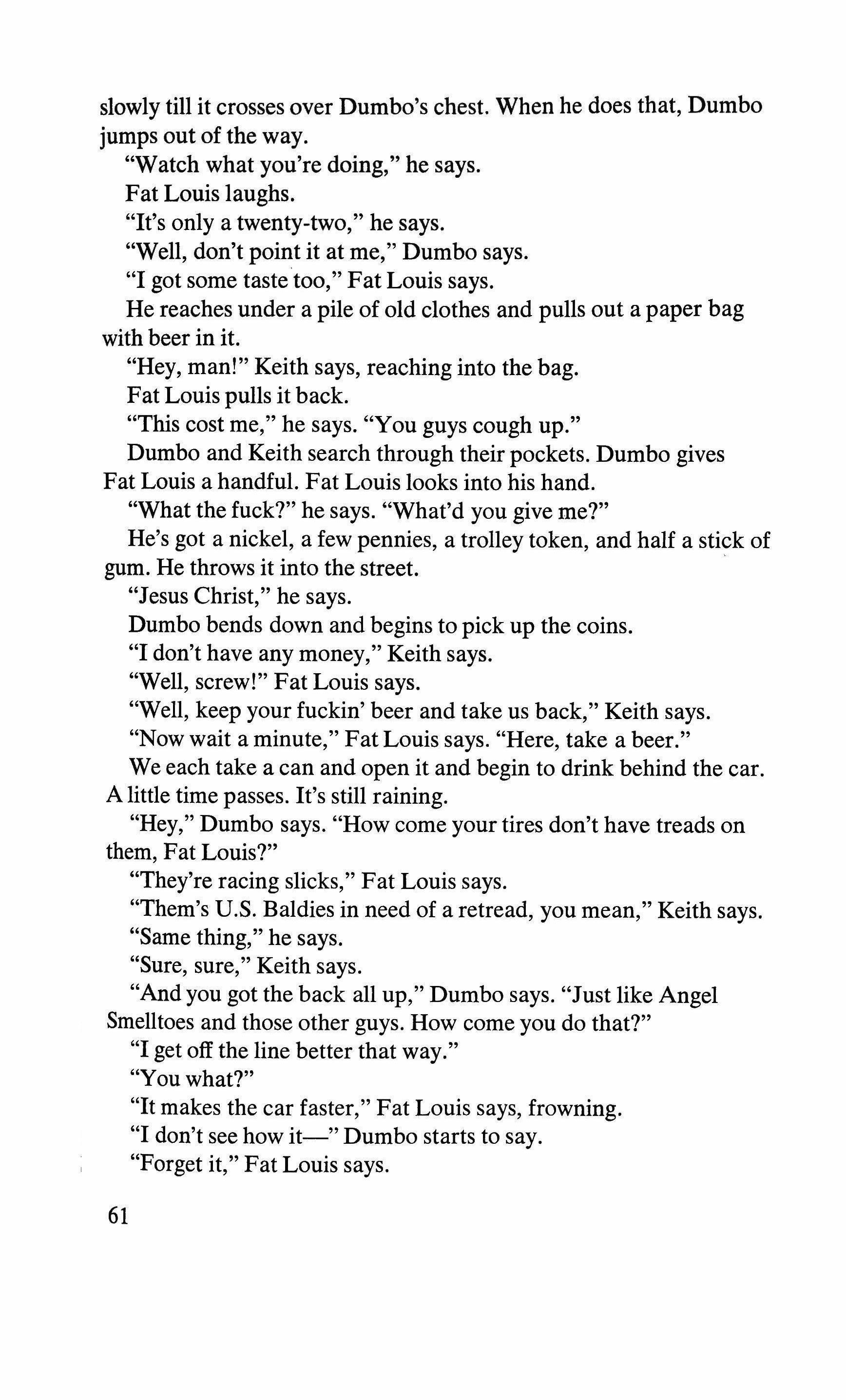
slowly till it crosses over Dumbo's chest. When he does that, Dumbo jumps out of the way.
"Watch what you're doing," he says.
Fat Louis laughs.
"It's only a twenty-two," he says.
"Well, don't point it at me," Dumbo says.
"I got some tastetoo," Fat Louis says.
He reaches under a pile of old clothes and pulls out a paper bag with beer in it.
"Hey, man!" Keith says, reaching into the bag.
Fat Louis pulls it back.
"This cost me," he says. "You guys cough up."
Dumbo and Keith search through their pockets. Dumbo gives Fat Louis a handful. Fat Louis looks into his hand.
"What the fuck?" he says. "What'd you give me?"
He's got a nickel, a few pennies, a trolley token, and half a stick of gum. He throws it into the street.
"Jesus Christ," he says.
Dumbo bends down and begins to pick up the coins.
"I don't have any money," Keith says.
"Well, screw!" Fat Louis says.
"Well, keep your fuckin' beer and take us back," Keith says.
"Now wait a minute," Fat Louis says. "Here, take a beer."
We each take a can and open it and begin to drink behind the car. A little time passes. It's still raining.
"Hey," Dumbo says. "How come your tires don't have treads on them, Fat Louis?"
"They're racing slicks," Fat Louis says.
"Them's U.S. Baldies in need of a retread, you mean," Keith says.
"Same thing," he says.
"Sure, sure," Keith says.
"And you got the back all up," Dumbo says. "Just like Angel Smelltoes and those other guys. How come you do that?"
"I get off the line better that way."
"You what?"
"It makes the car faster," Fat Louis says, frowning.
"I don't see how it-" Dumbo starts to say.
"Forget it," Fat Louis says.
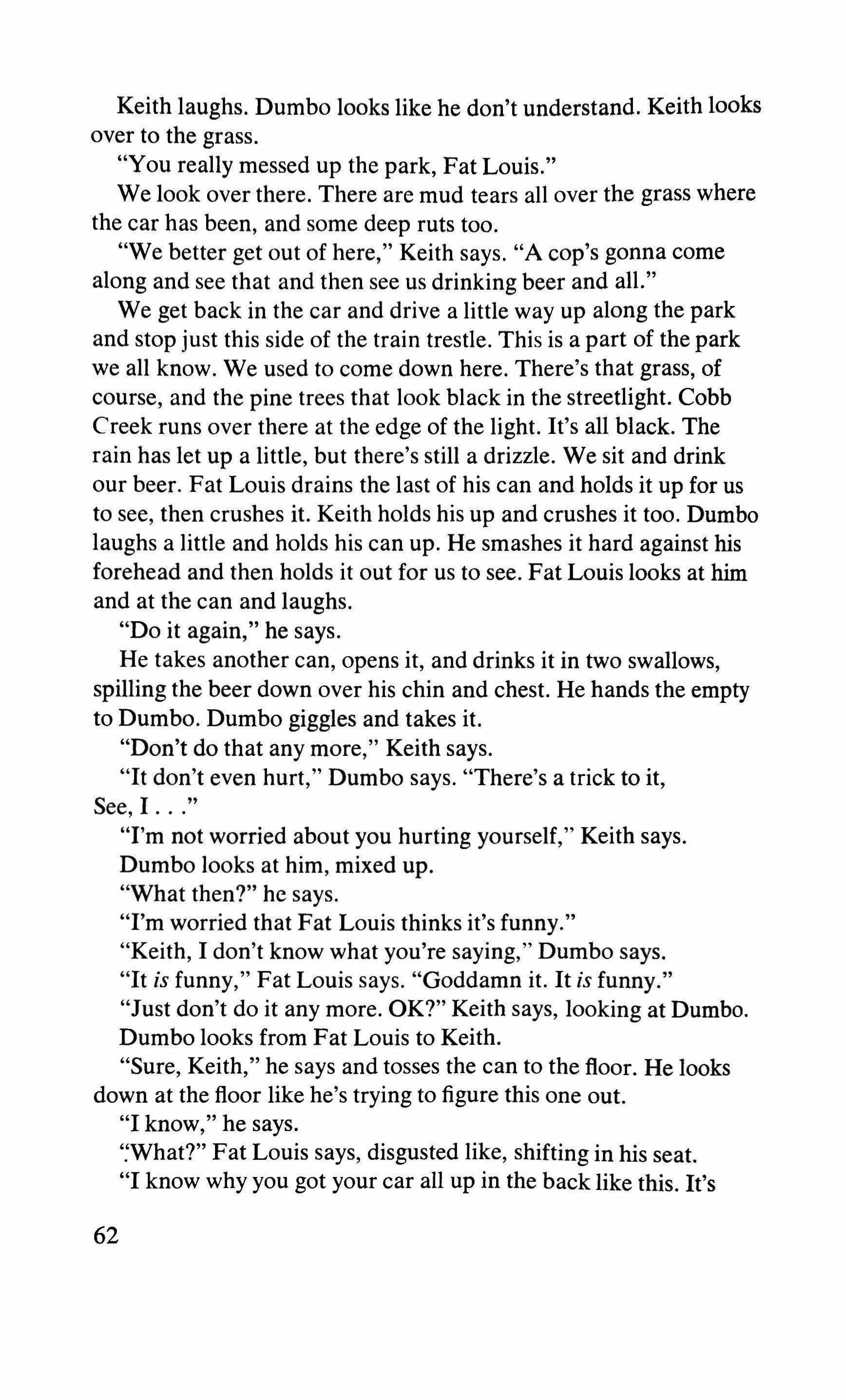
Keith laughs. Dumbo looks like he don't understand. Keith looks over to the grass.
"You really messed up the park, Fat Louis."
We look over there. There are mud tears all over the grass where the car has been, and some deep ruts too.
"We better get out of here," Keith says. "A cop's gonna come along and see that and then see us drinking beer and all."
We get back in the car and drive a little way up along the park and stop just this side of the train trestle. This is a part of the park we all know. We used to come down here. There's that grass, of course, and the pine trees that look black in the streetlight. Cobb Creek runs over there at the edge of the light. It's all black. The rain has let up a little, but there's still a drizzle. We sit and drink our beer. Fat Louis drains the last of his can and holds it up for us to see, then crushes it. Keith holds his up and crushes it too. Dumbo laughs a little and holds his can up. He smashes it hard against his forehead and then holds it out for us to see. Fat Louis looks at him and at the can and laughs.
"Do it again," he says.
He takes another can, opens it, and drinks it in two swallows, spilling the beer down over his chin and chest. He hands the empty to Dumbo. Dumbo giggles and takes it.
"Don't do that any more," Keith says.
"It don't even hurt," Dumbo says. "There's a trick to it, See, I "
"I'm not worried about you hurting yourself," Keith says. Dumbo looks at him, mixed up.
"What then?" he says.
"I'm worried that Fat Louis thinks it's funny."
"Keith, I don't know what you're saying," Dumbo says.
"It is funny," Fat Louis says. "Goddamn it. It is funny."
"Just don't do it any more. OK?" Keith says, looking at Dumbo. Dumbo looks from Fat Louis to Keith.
"Sure, Keith," he says and tosses the can to the floor. He looks down at the floor like he's trying to figure this one out.
"I know," he says.
"What?" Fat Louis says, disgusted like, shifting in his seat.
"I know why you got your car all up in the back like this. It's

'cause it makes you always go downhill and that makes you go faster. That's it, ain't it?"
Keith laughs.
"That's right, Einstein," Fat Louis says. "That's exactly right."
We sit around and drink beer. Fat Louis takes a pocketknife out and begins to clean his nails with it. He digs under his nail with the blade, then brings it up close to his face to look at, then rubs it on his pants. I can hear the knife scraping against his nails.
"Hey, what you doing up there?" Dumbo says.
"What?" Fat Louis says.
"That noise is making my teeth hurt," Dumbo says.
"I'm cleaning my nails," Fat Louis says.
"It makes my blood cold," Dumbo says.
Fat Louis looks down close at his hand and does something, then reaches back over the seat and touches Dumbo on the face. Dumbo jumps back and puts his hand on his face.
"Hey," he says. "Why'd you strike me with that knife for?"
Fat Louis laughs.
"That wasn't any knife," he says.
"It was so," Dumbo says. "I felt it."
Fat Louis holds up his right hand. He has shaved the nail of his fuck finger into a sharp point. We all look at it.
"You're awful," Dumbo says and looks out the window.
Fat Louis laughs.
"You know," Keith says, "Fat Louis, you got personal habits that could make even you sick."
Keith drains the last of his beer.
"Come on," he says. "Let's go."
"It's early," Fat Louis says. "I don't wanna go home yet."
"Come on," Keith says. "There's nothing to do."
"I got some bullets," Fat Louis says.
"What?" Keith says.
"I said I got some bullets. For the gun."
"Where?"
"Come on," Fat Louis says. "I'll show you."
We all get out and go to the back of the car again. Keith takes the gun out of the trunk and Fat Louis reaches under the pile of clothes and pulls out a little box. He slides it open and we all look
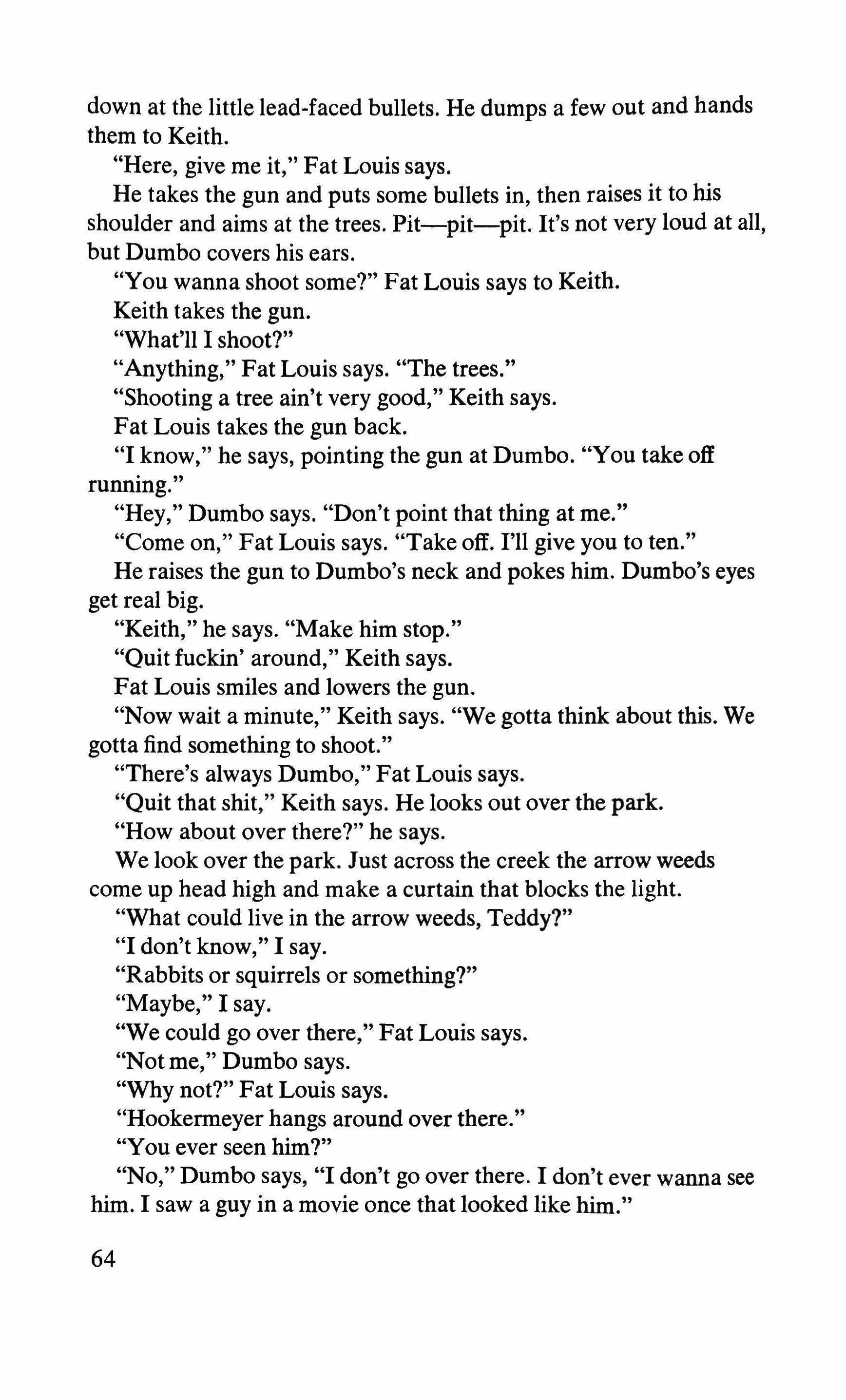
down at the little lead-faced bullets. He dumps a few out and hands them to Keith.
"Here, give me it," Fat Louis says.
He takes the gun and puts some bullets in, then raises it to his shoulder and aims at the trees. Pit-pit-pit. It's not very loud at all, but Dumbo covers his ears.
"You wanna shoot some?" Fat Louis says to Keith.
Keith takes the gun.
"What'll I shoot?"
"Anything," Fat Louis says. "The trees."
"Shooting a tree ain't very good," Keith says.
Fat Louis takes the gun back.
"I know," he says, pointing the gun at Dumbo. "You take off running."
"Hey," Dumbo says. "Don't point that thing at me."
"Come on," Fat Louis says. "Take off. I'll give you to ten."
He raises the gun to Dumbo's neck and pokes him. Dumbo's eyes get real big.
"Keith," he says. "Make him stop."
"Quit fuckin' around," Keith says.
Fat Louis smiles and lowers the gun.
"Now wait a minute," Keith says. "We gotta think about this. We gotta find something to shoot."
"There's always Dumbo," Fat Louis says.
"Quit that shit," Keith says. He looks out over the park.
"How about over there?" he says.
We look over the park. Just across the creek the arrow weeds come up head high and make a curtain that blocks the light.
"What could live in the arrow weeds, Teddy?"
"I don't know," I say.
"Rabbits or squirrels or something?"
"Maybe," I say.
"We could go over there," Fat Louis says.
"Not me," Dumbo says.
"Why not?" Fat Louis says.
"Hookermeyerhangs around over there."
"You ever seen him?"
"No," Dumbo says, "I don't go over there. I don't ever wanna see him. I saw a guy in a movie once that looked like him."
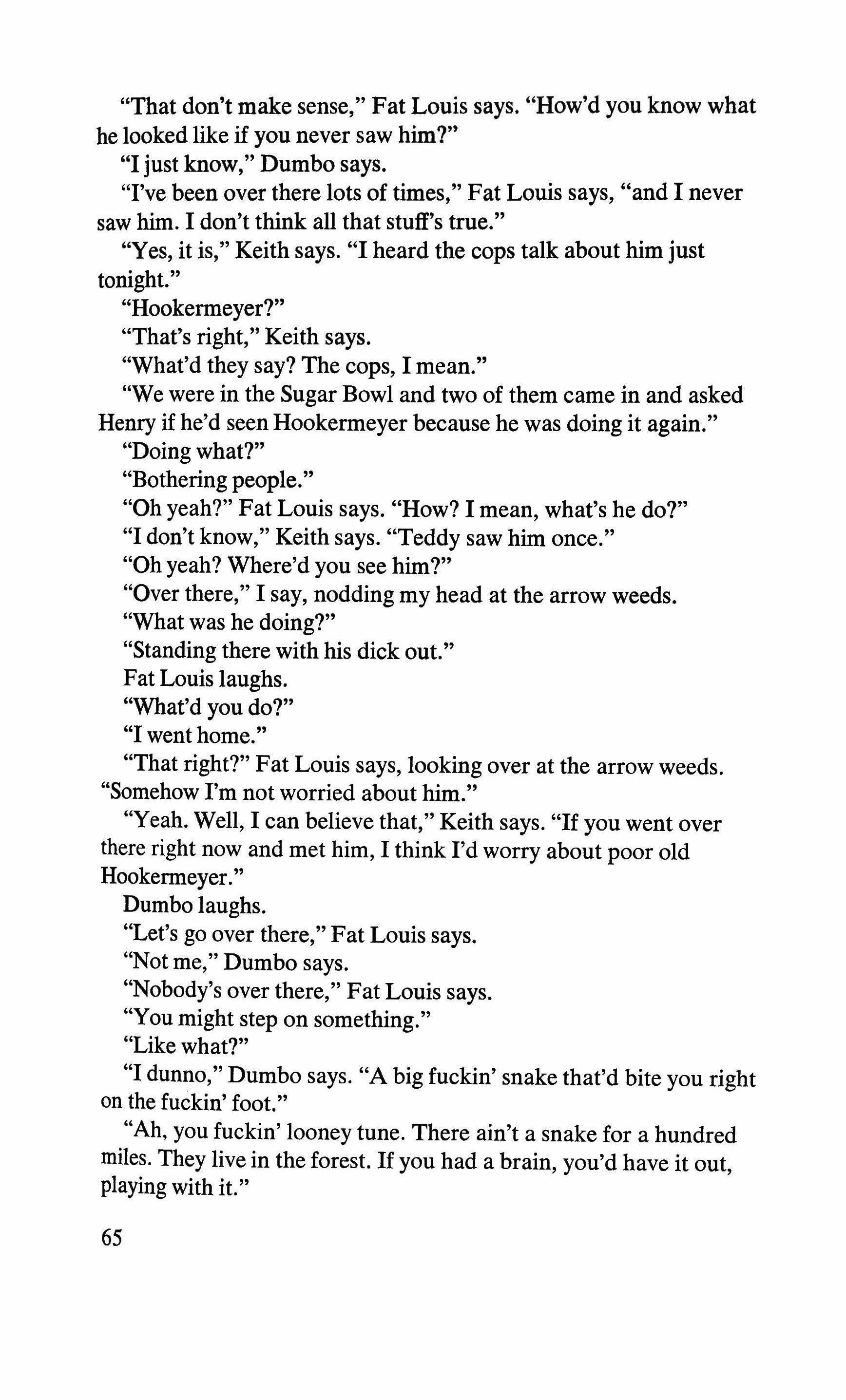
"That don't make sense," Fat Louis says. "How'd you know what he looked like if you never saw him?"
"I just know," Dumbo says.
"I've been over there lots of times," Fat Louis says, "and 1 never saw him. 1 don't think all that stuff's true."
"Yes, it is," Keith says. "I heard the cops talk about him just tonight."
"Hookermeyer?"
"That's right," Keith says.
"What'd they say? The cops, 1 mean."
"We were in the Sugar Bowl and two of them came in and asked Henry if he'd seen Hookermeyer because he was doing it again."
"Doing what?"
"Bothering people."
"Oh yeah?" Fat Louis says. "How? 1 mean, what's he do?"
"I don't know," Keith says. "Teddy saw him once."
"Oh yeah? Where'd you see him?"
"Over there," 1 say, nodding my head at the arrow weeds.
"What was he doing?"
"Standing there with his dick out."
Fat Louis laughs.
"What'd you do?"
"I went home."
"That right?" Fat Louis says, looking over at the arrow weeds. "Somehow I'm not worried about him."
"Yeah. Well, 1 can believe that," Keith says. "If you went over there right now and met him, 1 think I'd worry about poor old Hookermeyer.
Dumbo laughs.
"Let's go over there," Fat Louis says.
"Not me," Dumbo says.
"Nobody's over there," Fat Louis says.
"You might step on something."
"Like what?"
"I dunno," Dumbo says. "A big fuckin' snake that'd bite you right on the fuckin' foot."
"Ah, you fuckin' looney tune. There ain't a snake for a hundred miles. They live in the forest. If you had a brain, you'd have it out, playing with it."
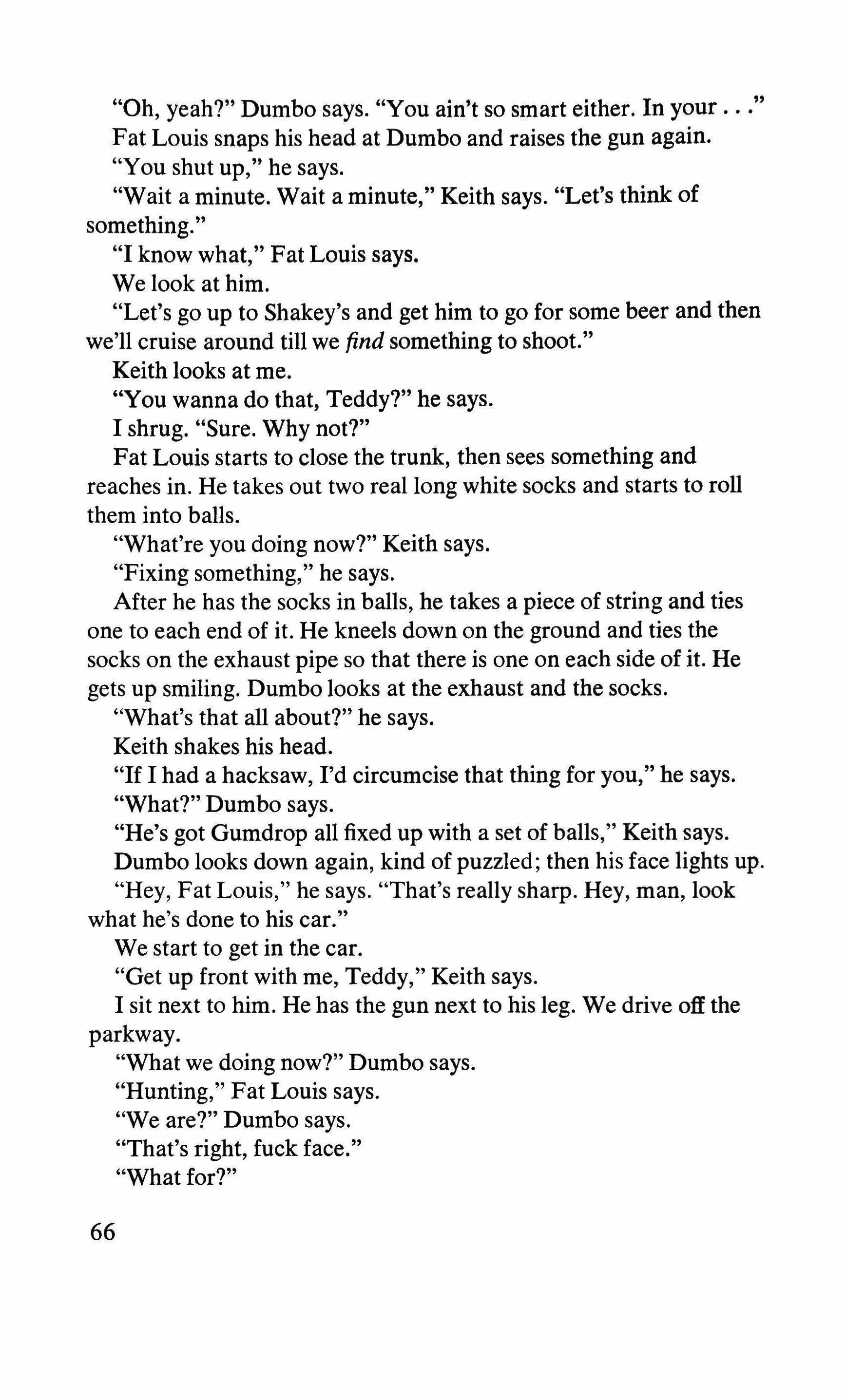
"Oh, yeah?" Dumbo says. "You ain't so smart either. In your Fat Louis snaps his head at Dumbo and raises the gun again.
"You shut up," he says.
"Wait a minute. Wait a minute," Keith says. "Let's think of something.
"I know what," Fat Louis says.
We look at him.
"Let's go up to Shakey's and get him to go for some beer and then we'll cruise around till we find something to shoot."
Keith looks at me.
"You wanna do that, Teddy?" he says. I shrug. "Sure. Why not?"
Fat Louis starts to close the trunk, then sees something and reaches in. He takes out two real long white socks and starts to roll them into balls.
"What're you doing now?" Keith says.
"Fixing something," he says.
After he has the socks in balls, he takes a piece of string and ties one to each end of it. He kneels down on the ground and ties the socks on the exhaust pipe so that there is one on each side of it. He gets up smiling. Dumbo looks at the exhaust and the socks.
"What's that all about?" he says.
Keith shakes his head.
"If I had a hacksaw, I'd circumcise that thing for you," he says. "What?" Dumbo says.
"He's got Gumdrop all fixed up with a set of balls," Keith says. Dumbo looks down again, kind of puzzled; then his face lights up.
"Hey, Fat Louis," he says. "That's really sharp. Hey, man, look what he's done to his car."
We start to get in the car.
"Get up front with me, Teddy," Keith says.
I sit next to him. He has the gun next to his leg. We drive off the parkway.
"What we doing now?" Dumbo says.
"Hunting," Fat Louis says.
"We are?" Dumbo says.
"That's right, fuck face."
"What for?"
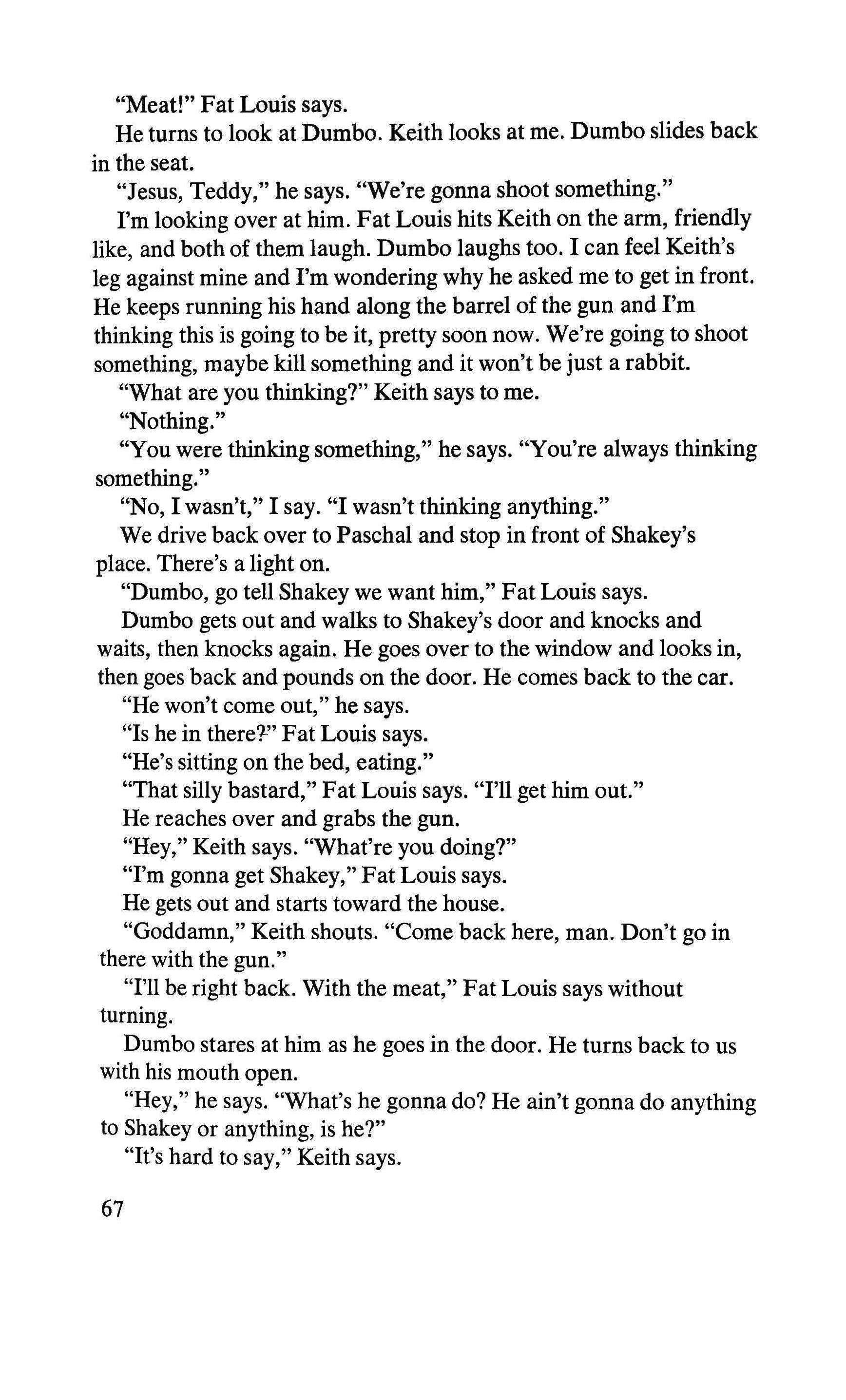
"Meat!" Fat Louis says. He turns to look at Dumbo. Keith looks at me. Dumbo slides back in the seat.
"Jesus, Teddy," he says. "We're gonna shoot something."
I'm looking over at him. Fat Louis hits Keith on the arm, friendly like, and both of them laugh. Dumbo laughs too. I can feel Keith's leg against mine and I'm wondering why he asked me to get in front. He keeps running his hand along the barrel of the gun and I'm thinking this is going to be it, pretty soon now. We're going to shoot something, maybe kill something and it won't be just a rabbit.
"What are you thinking?" Keith says to me.
"Nothing."
"You were thinking something," he says. "You're always thinking something.
"No, I wasn't," I say. "I wasn't thinking anything."
We drive back over to Paschal and stop in front of Shakey's place. There's a light on.
"Dumbo, go tell Shakey we want him," Fat Louis says. Dumbo gets out and walks to Shakey's door and knocks and waits, then knocks again. He goes over to the window and looks in, then goes back and pounds on the door. He comes back to the car.
"He won't come out," he says.
"Is he in there?' Fat Louis says.
"He's sitting on the bed, eating."
"That silly bastard," Fat Louis says. "I'll get him out."
He reaches over and grabs the gun.
"Hey," Keith says. "What're you doing?"
"I'm gonna get Shakey," Fat Louis says. He gets out and starts toward the house.
"Goddamn," Keith shouts. "Come back here, man. Don't go in there with the gun."
"I'll be right back. With the meat," Fat Louis says without turning.
Dumbo stares at him as he goes in the door. He turns back to us with his mouth open.
"Hey," he says. "What's he gonna do? He ain't gonna do anything to Shakey or anything, is he?"
"It's hard to say," Keith says.
67
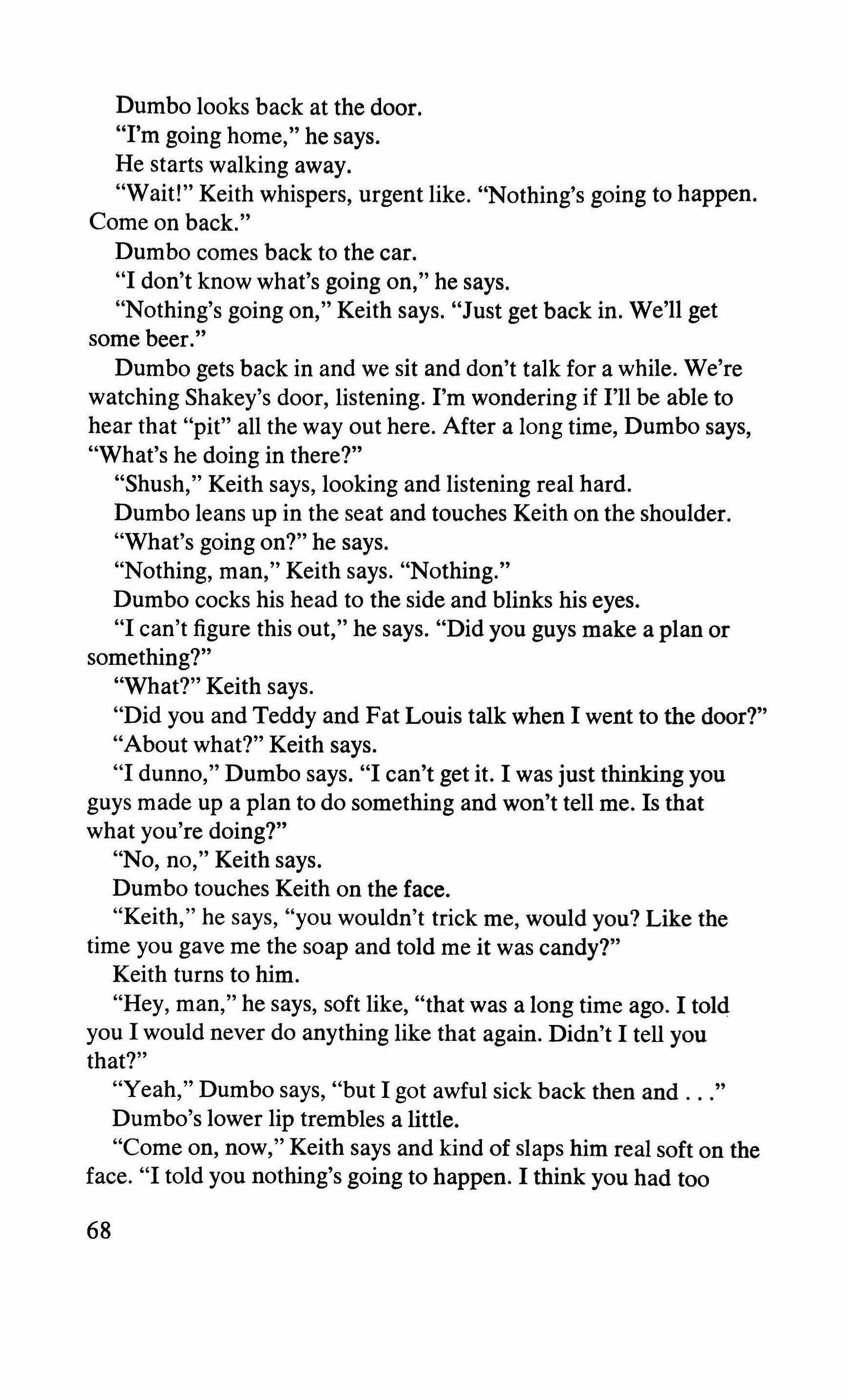
Dumbo looks back at the door.
"I'm going home," he says.
He starts walking away.
"Wait!" Keith whispers, urgent like. "Nothing's going to happen. Come on back."
Dumbo comes back to the car.
"I don't know what's going on," he says.
"Nothing's going on," Keith says. "Just get back in. We'll get some beer."
Dumbo gets back in and we sit and don't talk for a while. We're watching Shakey's door, listening. I'm wondering if I'll be able to hear that "pit" all the way out here. After a long time, Dumbo says, "What's he doing in there?"
"Shush," Keith says, looking and listening real hard.
Dumbo leans up in the seat and touches Keith on the shoulder.
"What's going on?" he says.
"Nothing, man," Keith says. "Nothing."
Dumbo cocks his head to the side and blinks his eyes.
"I can't figure this out," he says. "Did you guys make a plan or something?"
"What?" Keith says.
"Did you and Teddy and Fat Louis talk when I went to the door?"
"About what?" Keith says.
"I dunno," Dumbo says. "I can't get it. I was just thinking you guys made up a plan to do something and won't tell me. Is that what you're doing?"
"No, no," Keith says.
Dumbo touches Keith on the face.
"Keith," he says, "you wouldn't trick me, would you? Like the time you gave me the soap and told me it was candy?"
Keith turns to him.
"Hey, man," he says, soft like, "that was a long time ago. I told you I would never do anything like that again. Didn't I tell you that?"
"Yeah," Dumbo says, "but I got awful sick back then and "
Dumbo's lower lip trembles a little.
"Come on, now," Keith says and kind of slaps him real soft on the face. "I told you nothing's going to happen. I think you had too
many beers and it's making you think too much. Don't think now. Look, here they come."
We look back to the door. Fat Louis is walking behind Shakey with the gun. Shakey is kind of short and skinny anyway, but in front of Fat Louis like that he looks like a piece of string or something. He's wearing a torn T-shirt and old paint-covered pants and no shoes. He's got a sandwich in his hand. Shakey stops and turns his head to look at Fat Louis. Fat Louis jabs the gun barrel between his legs, and Shakeyjumps a little and starts walking again. He stops at the car.
"It's you guys," he says and sighs. "Now what ?"
"Get in," Fat Louis says.
"I don't want to get in," Shakey says. "What do you want with me?"
"Just get in," Fat Louis says again. "Get in! Get in!"
He nods his head sharply at the car.
"Now wait a minute," he says. "I know all you guys. I always treat you right. You're just kids."
"We just want some beer," Keith says.
"Is that it?"
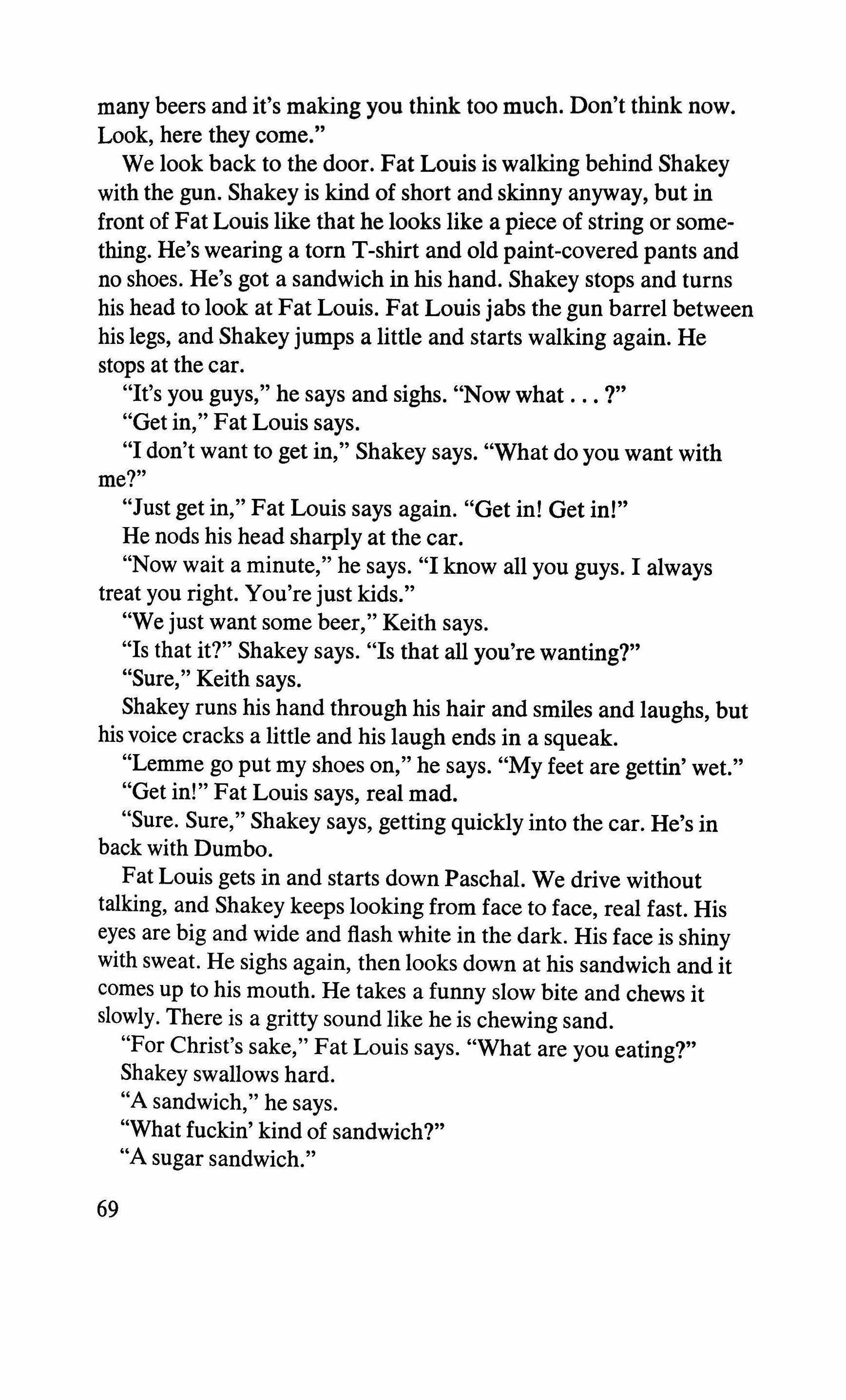
Shakey says. "Is that all you're wanting?"
"Sure," Keith says.
Shakey runs his hand through his hair and smiles and laughs, but his voice cracks a little and his laugh ends in a squeak.
"Lemme go put my shoes on," he says. "My feet are gettin' wet."
"Get in!" Fat Louis says, real mad.
"Sure. Sure," Shakey says, getting quickly into the car. He's in back with Dumbo.
Fat Louis gets in and starts down Paschal. We drive without talking, and Shakey keeps looking from face to face, real fast. His eyes are big and wide and flash white in the dark. His face is shiny with sweat. He sighs again, then looks down at his sandwich and it comes up to his mouth. He takes a funny slow bite and chews it slowly. There is a gritty sound like he is chewing sand.
"For Christ's sake," Fat Louis says. "What are you eating?"
Shakey swallows hard.
"A sandwich," he says.
"What fuckin' kind of sandwich?"
"A sugar sandwich."

"A sugar sandwich!" Fat Louis says. "A sugar sandwich?"
"Well, you put some butter on bread and pour sugar on the butter and "
"Gimme that fuckin' thing," Fat Louis says.
He throws his arm back over the seat. Shakey flinches real bad, then hands him the sandwich. Fat Louis throws it out the window.
"There!" he says.
"Why'd you do that?" Keith says.
"He's just sitting back there eating a sugar-fuckin' sandwich. It makes me sick. Nobody oughta eat shit like that."
Keith looks at me again. I shrug. Shakey starts looking at faces again.
"Hey," he says, his voice cracking a little. "Hey, I don't mind buying you guys beer. When I was a kid, there used to be a man buy it for me, so you know I figger "
"Why'n't you answer the door?" Fat Louis says. "What?"
"Why'n't you answer the fuckin' door when Dumbo knocked?"
"Well, I didn't know, see. If I knew it was Dumbo " He turns to Dumbo. "I didn't mean to call you that. I don't know what to call you. Don't get mad or anything."
"Everybody calls me Dumbo," he says. "It's cause I got ears like that little flying elephant."
Shakey laughs funny, squeaky again.
"Oh yeah," he says.
"Why'n't you answer the door?" Fat Louis says.
"It's like I say. I didn't know. If I knew it was you and you wanted some beer, I woulda answered right away, but I didn't know."
"Who'd you think it was?"
"Well, I didn't know."
"Who'd you think it was?"
Shakey sits back in his seat and wipes his mouth with the back of his hand.
"You know, I didn't think about it. A lot of times somebody'll knock on the door and I just don't answer. Sometimes I don't want to talk to anybody. I don't even wanna know who's knocking.'"
"That don't make sense," Fat Louis says.
"It don't?"
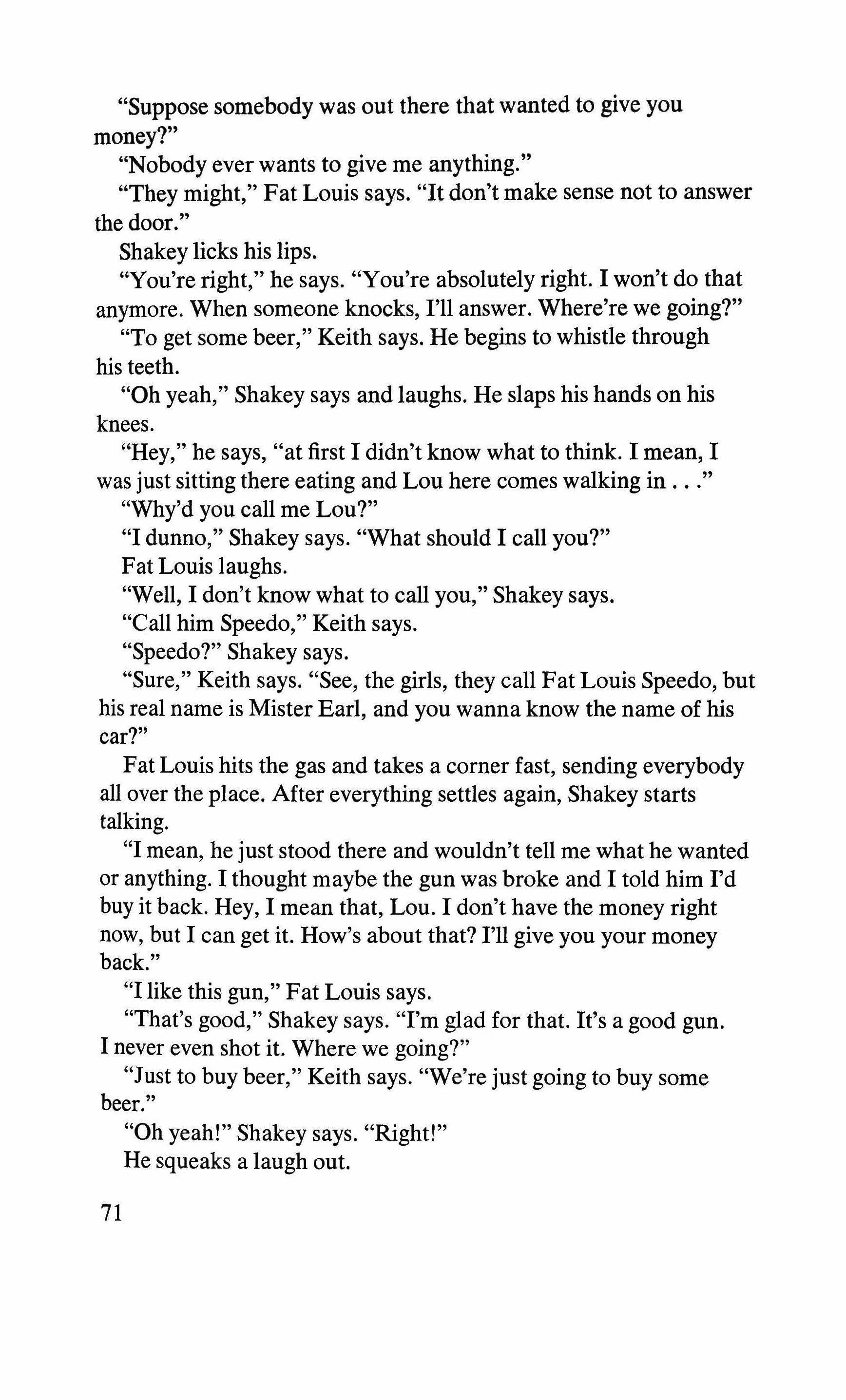
"Suppose somebody was out there that wanted to give you money?"
"Nobody ever wants to give me anything."
"They might," Fat Louis says. "It don't make sense not to answer the door."
Shakey licks his lips.
"You're right," he says. "You're absolutely right. I won't do that anymore. When someone knocks, I'll answer. Where're we going?"
"To get some beer," Keith says. He begins to whistle through his teeth.
"Oh yeah," Shakey says and laughs. He slaps his hands on his knees.
"Hey," he says, "at first I didn't know what to think. I mean, I was just sitting there eating and Lou here comes walking in "
"Why'd you call me Lou?"
"I dunno," Shakey says. "What should I call you?"
Fat Louis laughs.
"Well, I don't know what to call you," Shakey says.
"Call him Speedo," Keith says.
"Speedo?" Shakey says.
"Sure," Keith says. "See, the girls, they call Fat Louis Speedo, but his real name is Mister Earl, and you wanna know the name of his car?"
Fat Louis hits the gas and takes a corner fast, sending everybody all over the place. After everything settles again, Shakey starts talking.
"I mean, he just stood there and wouldn't tell me what he wanted or anything. I thought maybe the gun was broke and I told him I'd buy it back. Hey, I mean that, Lou. I don't have the money right now, but I can get it. How's about that? I'll give you your money back."
"I like this gun," Fat Louis says.
"That's good," Shakey says. "I'm glad for that. It's a good gun. I never even shot it. Where we going?"
"Just to buy beer," Keith says. "We're just going to buy some beer."
"Oh yeah!" Shakey says. "Right!"
He squeaks a laugh out.
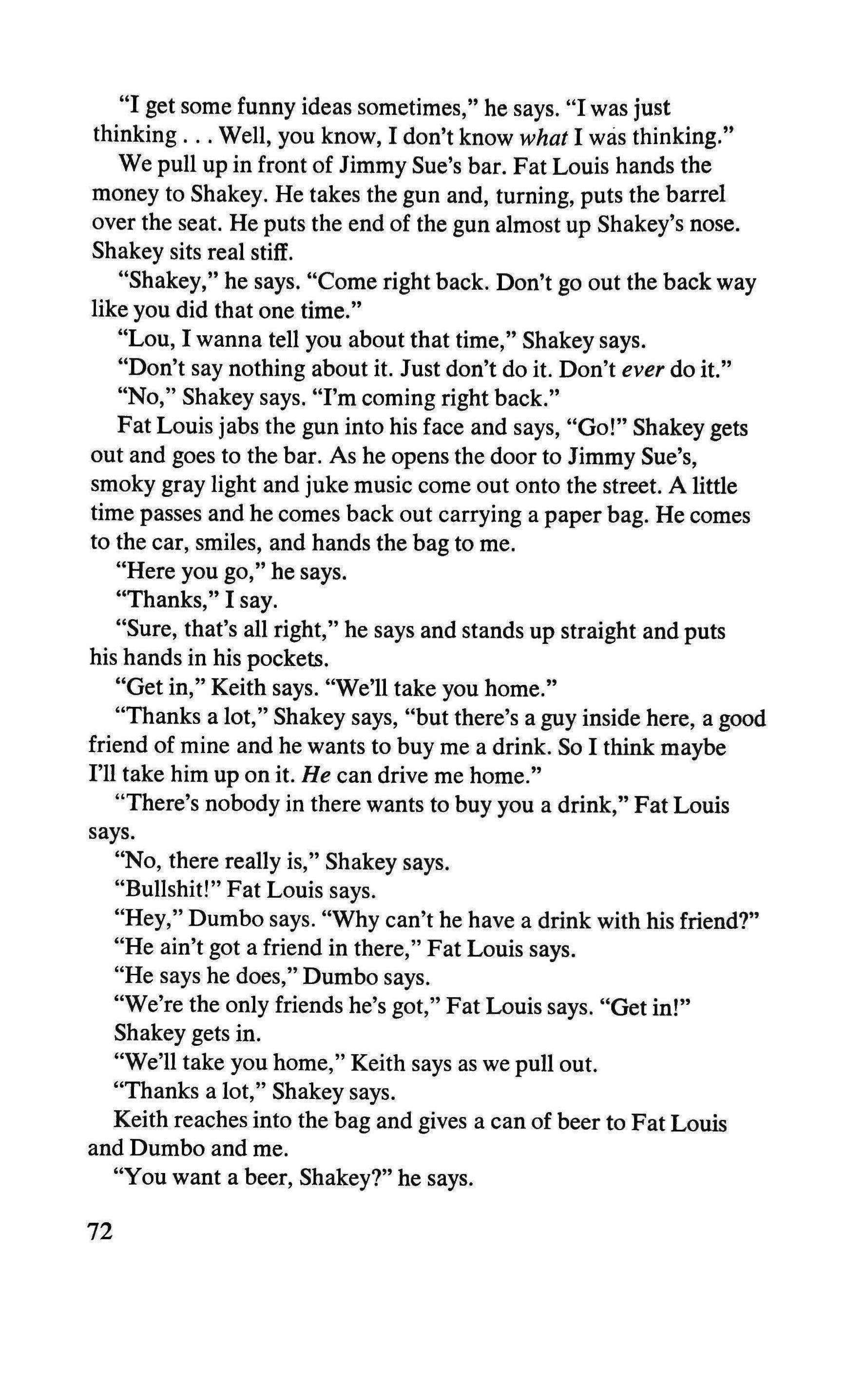
"I get some funny ideas sometimes," he says. "I was just thinking Well, you know, 1 don't know what 1 was thinking."
We pull up in front of Jimmy Sue's bar. Fat Louis hands the money to Shakey. He takes the gun and, turning, puts the barrel over the seat. He puts the end of the gun almost up Shakey's nose. Shakey sits real stiff.
"Shakey," he says. "Come right back. Don't go out the back way like you did that one time."
"Lou, 1 wanna tell you about that time," Shakey says.
"Don't say nothing about it. Just don't do it. Don't ever do it."
"No," Shakey says. "I'm coming right back."
Fat Louis jabs the gun into his face and says, "Go!" Shakey gets out and goes to the bar. As he opens the door to Jimmy Sue's, smoky gray light and juke music come out onto the street. A little time passes and he comes back out carrying a paper bag. He comes to the car, smiles, and hands the bag to me.
"Here you go," he says.
"Thanks," 1 say.
"Sure, that's all right," he says and stands up straight and puts his hands in his pockets.
"Get in," Keith says. "We'll take you home."
"Thanks a lot," Shakey says, "but there's a guy inside here, a good friend of mine and he wants to buy me a drink. So 1 think maybe I'll take him up on it. He can drive me home."
"There's nobody in there wants to buy you a drink," Fat Louis says.
"No, there really is," Shakey says.
"Bullshit!" Fat Louis says.
"Hey," Dumbo says. "Why can't he have a drink with his friend?"
"He ain't got a friend in there," Fat Louis says.
"He says he does," Dumbo says.
"We're the only friends he's got," Fat Louis says. "Get in!"
Shakey gets in.
"We'll take you home," Keith says as we pull out.
"Thanks a lot," Shakey says.
Keith reaches into the bag and gives a can of beer to Fat Louis and Dumbo and me.
"You want a beer, Shakey?" he says.
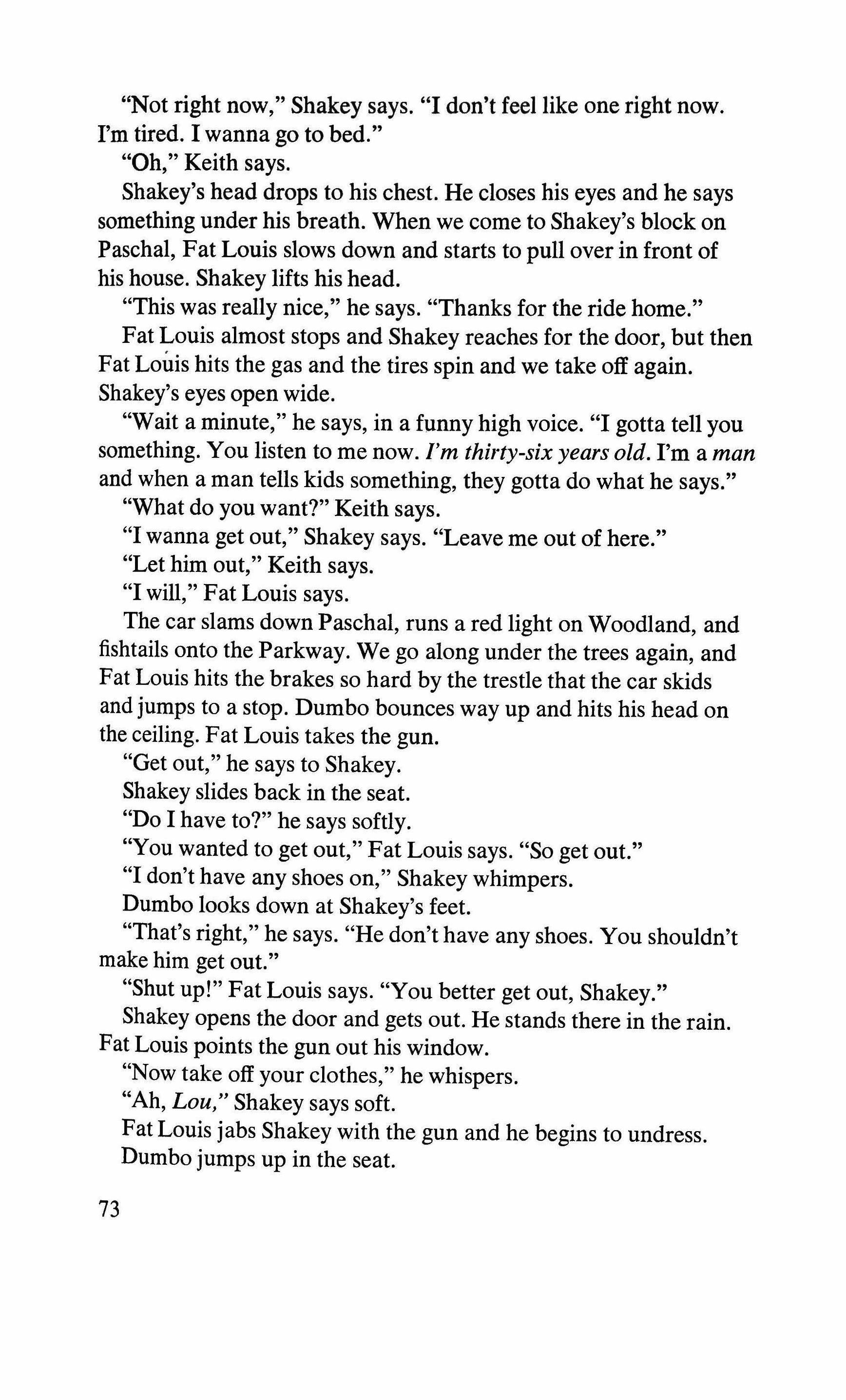
"Not right now," Shakey says. "I don't feel like one right now. I'm tired. 1 wanna go to bed."
"Oh," Keith says.
Shakey's head drops to his chest. He closes his eyes and he says something under his breath. When we come to Shakey's block on Paschal, Fat Louis slows down and starts to pull over in front of his house. Shakey lifts his head.
"This was really nice," he says. "Thanks for the ride home."
Fat Louis almost stops and Shakey reaches for the door, but then Fat Louis hits the gas and the tires spin and we take off again.
Shakey's eyes open wide.
"Wait a minute," he says, in a funny high voice. "I gotta tell you something. You listen to me now. I'm thirty-six years old. I'm a man and when a man tells kids something, they gotta do what he says."
"What do you want?" Keith says.
"I wanna get out," Shakey says. "Leave me out of here."
"Let him out," Keith says.
"I will," Fat Louis says.
The car slams down Paschal, runs a red light on Woodland, and fishtails onto the Parkway. We go along under the trees again, and Fat Louis hits the brakes so hard by the trestle that the car skids and jumps to a stop. Dumbo bounces way up and hits his head on the ceiling. Fat Louis takes the gun.
"Get out," he says to Shakey.
Shakey slides back in the seat.
"Do 1 have to?" he says softly.
"You wanted to get out," Fat Louis says. "So get out."
"I don't have any shoes on," Shakey whimpers.
Dumbo looks down at Shakey's feet.
"That's right," he says. "He don't have any shoes. You shouldn't make him get out."
"Shut up!" Fat Louis says. "You better get out, Shakey."
Shakey opens the door and gets out. He stands there in the rain. Fat Louis points the gun out his window.
"Now take off your clothes," he whispers.
"Ah, Lou," Shakey says soft.
Fat Louis jabs Shakey with the gun and he begins to undress.
Dumbo jumps up in the seat.
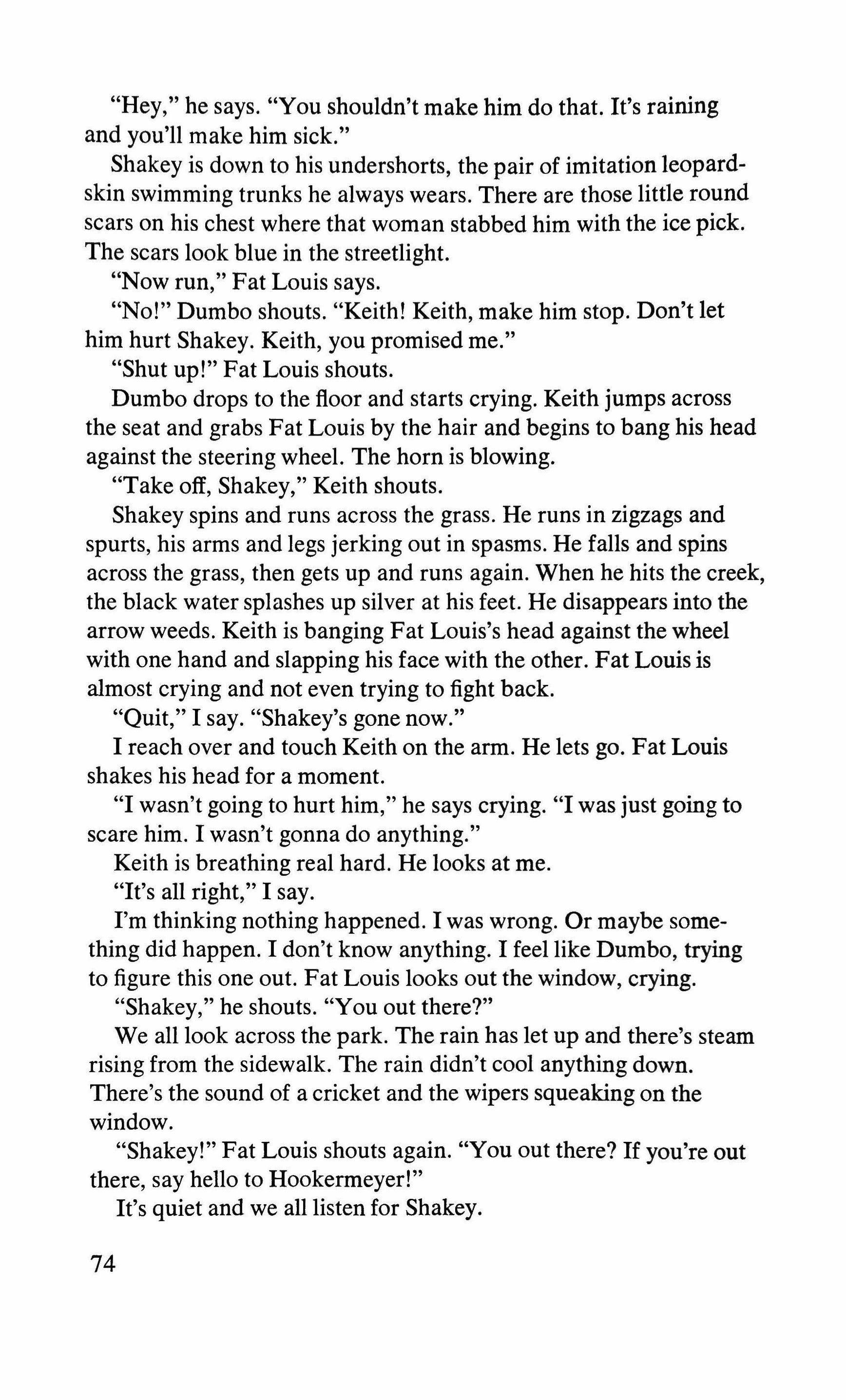
"Hey," he says. "You shouldn't make him do that. It's raining and you'll make him sick."
Shakey is down to his undershorts, the pair of imitation leopardskin swimming trunks he always wears. There are those little round scars on his chest where that woman stabbed him with the ice pick. The scars look blue in the streetlight.
"Now run," Fat Louis says.
"No!" Dumbo shouts. "Keith! Keith, make him stop. Don't let him hurt Shakey. Keith, you promised me."
"Shut up!" Fat Louis shouts.
Dumbo drops to the floor and starts crying. Keith jumps across the seat and grabs Fat Louis by the hair and begins to bang his head against the steering wheel. The horn is blowing.
"Take off, Shakey," Keith shouts.
Shakey spins and runs across the grass. He runs in zigzags and spurts, his arms and legs jerking out in spasms. He falls and spins across the grass, then gets up and runs again. When he hits the creek, the black water splashes up silver at his feet. He disappears into the arrow weeds. Keith is banging Fat Louis's head against the wheel with one hand and slapping his face with the other. Fat Louis is almost crying and not even trying to fight back.
"Quit," I say. "Shakey's gone now."
I reach over and touch Keith on the arm. He lets go. Fat Louis shakes his head for a moment.
"I wasn't going to hurt him," he says crying. "I was just going to scare him. I wasn't gonna do anything."
Keith is breathing real hard. He looks at me.
"It's all right," I say.
I'm thinking nothing happened. I was wrong. Or maybe something did happen. I don't know anything. I feel like Dumbo, trying to figure this one out. Fat Louis looks out the window, crying.
"Shakey," he shouts. "You out there?"
We all look across the park. The rain has let up and there's steam rising from the sidewalk. The rain didn't cool anything down. There's the sound of a cricket and the wipers squeaking on the window.
"Shakey!" Fat Louis shouts again. "You out there? If you're out there, say hello to Hookermeyer!"
It's quiet and we all listen for Shakey.
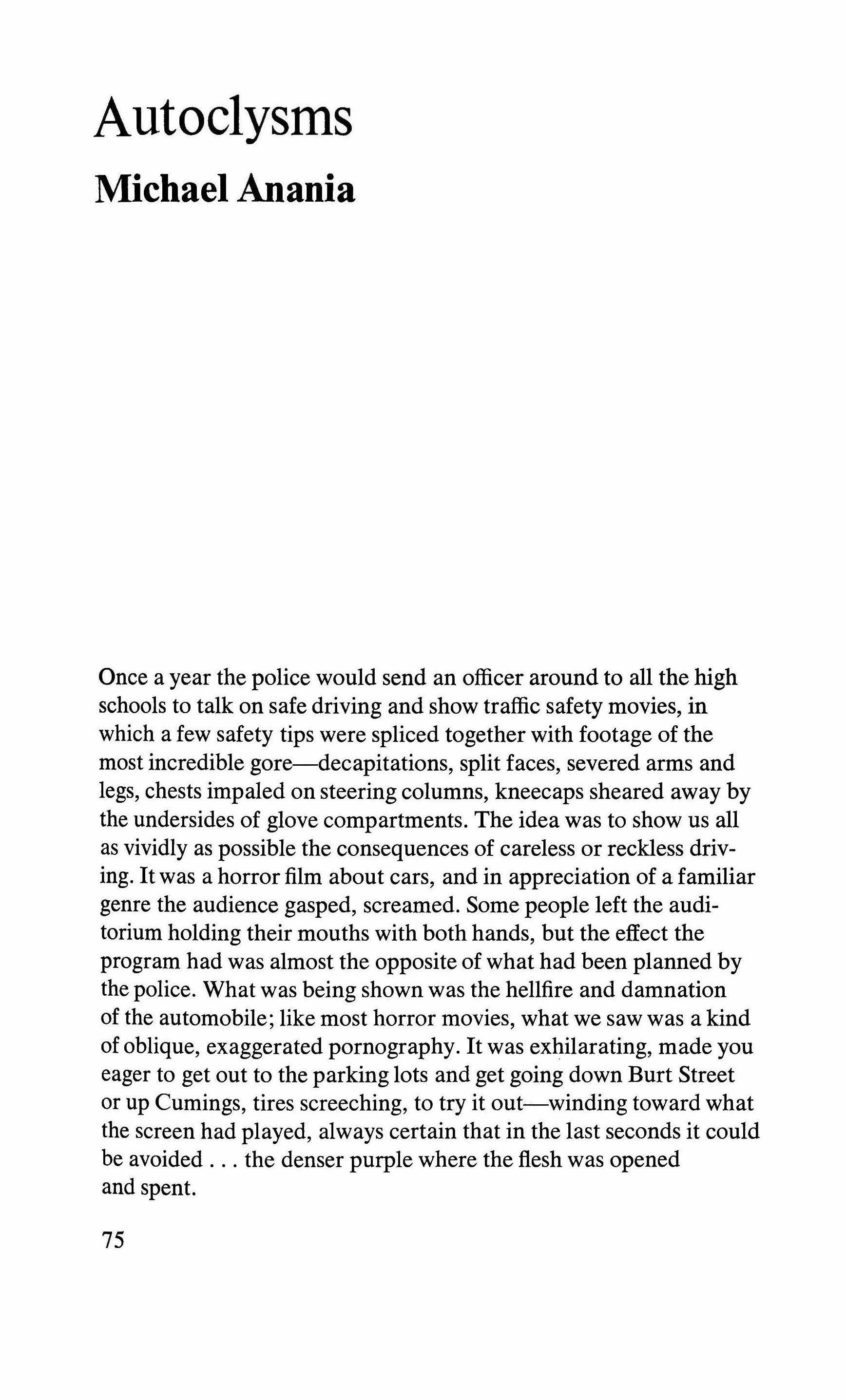
Once a year the police would send an officer around to all the high schools to talk on safe driving and show traffic safety movies, in which a few safety tips were spliced together with footage of the most incredible gore-decapitations, split faces, severed arms and legs, chests impaled on steering columns, kneecaps sheared away by the undersides of glove compartments. The idea was to show us all as vividly as possible the consequences of careless or reckless driving. It was a horror film about cars, and in appreciation of a familiar genre the audience gasped, screamed. Some people left the auditorium holding their mouths with both hands, but the effect the program had was almost the opposite of what had been planned by the police. What was being shown was the hellfire and damnation of the automobile; like most horror movies, what we saw was a kind of oblique, exaggerated pornography. It was exhilarating, made you eager to get out to the parking lots and get going down Burt Street or up Cumings, tires screeching, to try it out-winding toward what the screen had played, always certain that in the last seconds it could be avoided the denser purple where the flesh was opened and spent.
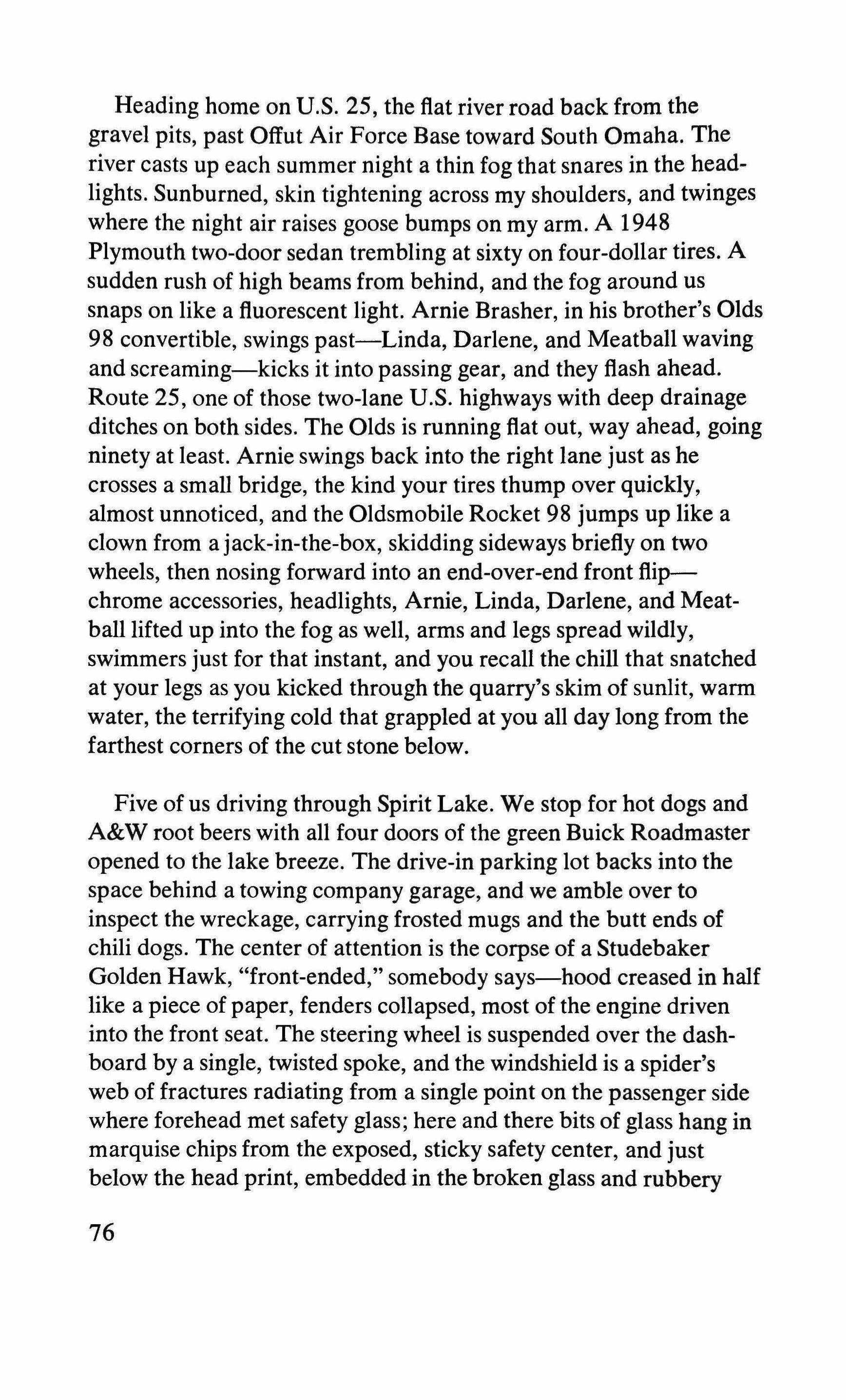
Heading home on U.S. 25, the flat river road back from the gravel pits, past Offut Air Force Base toward South Omaha. The river casts up each summer night a thin fog that snares in the headlights. Sunburned, skin tightening across my shoulders, and twinges where the night air raises goose bumps on my arm. A 1948 Plymouth two-door sedan trembling at sixty on four-dollar tires. A sudden rush of high beams from behind, and the fog around us snaps on like a fluorescent light. Arnie Brasher, in his brother's Olds 98 convertible, swings past-Linda, Darlene, and Meatball waving and screaming-kicks it into passing gear, and they flash ahead. Route 25, one of those two-lane U.S. highways with deep drainage ditches on both sides. The Olds is running flat out, way ahead, going ninety at least. Arnie swings back into the right lane just as he crosses a small bridge, the kind your tires thump over quickly, almost unnoticed, and the Oldsmobile Rocket 98 jumps up like a clown from a jack-in-the-box, skidding sideways briefly on two wheels, then nosing forward into an end-over-end front flipchrome accessories, headlights, Arnie, Linda, Darlene, and Meatball lifted up into the fog as well, arms and legs spread wildly, swimmers just for that instant, and you recall the chill that snatched at your legs as you kicked through the quarry's skim of sunlit, warm water, the terrifying cold that grappled at you all day long from the farthest corners of the cut stone below.
Five of us driving through Spirit Lake. We stop for hot dogs and A&W root beers with all four doors of the green Buick Roadmaster opened to the lake breeze. The drive-in parking lot backs into the space behind a towing company garage, and we amble over to inspect the wreckage, carrying frosted mugs and the butt ends of chili dogs. The center of attention is the corpse of a Studebaker Golden Hawk, "front-ended," somebody says-hood creased in half like a piece of paper, fenders collapsed, most of the engine driven into the front seat. The steering wheel is suspended over the dashboard by a single, twisted spoke, and the windshield is a spider's web of fractures radiating from a single point on the passenger side where forehead met safety glass; here and there bits of glass hang in marquise chips from the exposed, sticky safety center, and just below the head print, embedded in the broken glass and rubbery

film, stubbed out but intact, with the feathery print of lipstick on its white tip, an L&M filter cigarette. A few strands of blonde hair caught there as well, flashing into view just where they cross out of the shadow of the roofline into the sunlight, seem suspended in the air. The mangled front end, impacted bumper and grillwork, fenders closed like concertinas-all of it radiates from that collision in the glass, as though the whole wreckage were a crystal whose center was perfect and which grew amorphous only at its most extreme edgesa geode, then, revealing in its deadly amethyst the impeccable record of the moment of impact, down to the microsecond in which the fissures in the glass opened to receive the tip of the burning cigarette. It verges on the sublime. Verges? It's hard to imagine anything more awesome, more eloquent in its obedience to natural law, and it is impossible, slouched back in the Buick, not to imagine her beauty, the thin veil of soft perfection played out between glass and bone like the mucus you pull from the corner of your eye and press between your finger and your thumb.
In Iowa again, heading south through a flat stretch in the unremitting cornfields in a 1956 Chrysler 300, trailing a small sailboat, a Snipe. Up ahead, an oncomingpickup truck stops and waits to turn left into a farm road; a two-tone Mercury hardtop, unable to stop, starts around into our lane, sees the Ford station wagon just in front of us, and cuts back too sharply, begins to drift, heeling over toward a full roll. The Ford catches the Mercury's left taillight, sends it flying off in one piece, and the impact rights the Mere, angling it off into the ditch. The Ford careening now, but slowing fast. Not a chance of our stopping on the roadway, so we head for the ditch at an easy angle, working fine until we hit bottom and come up short against the side of the farmer's access road, the 300's big grill wedged into the culvert; all of us jostle sharply and fall back. Then, like punctuation, the Snipe lurches off its trailer and breaks through the Chrysler's big rear window, spraying glass like the flakes of foam that fall from the bow when it cuts through a cresting wave. The station wagon has made a try for the farm road and tips slowly over the edge on the far side, gas tank and rear axle exposed. We climb up out of our ditches, everyone, like amphibians, slithering and clumsy, and the farmer sits in his truck, unperturbed, bemused,
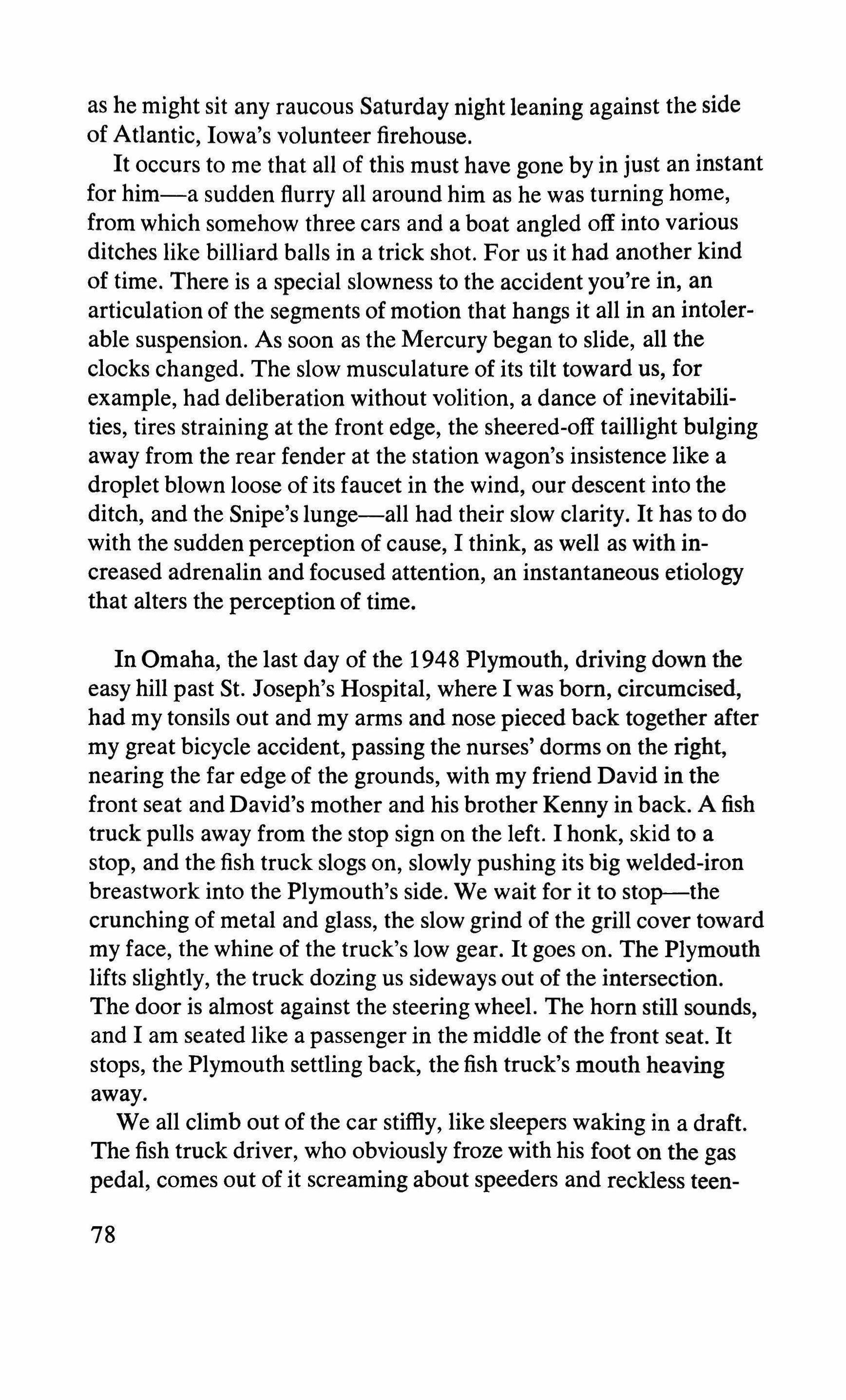
as he might sit any raucous Saturday night leaning against the side of Atlantic, Iowa's volunteer firehouse.
It occurs to me that all of this must have gone by in just an instant for him-a sudden flurry all around him as he was turning home, from which somehow three cars and a boat angled off into various ditches like billiard balls in a trick shot. For us it had another kind of time. There is a special slowness to the accident you're in, an articulation of the segments of motion that hangs it all in an intolerable suspension. As soon as the Mercury began to slide, all the clocks changed. The slow musculature of its tilt toward us, for example, had deliberation without volition, a dance of inevitabilities, tires straining at the front edge, the sheered-off taillight bulging away from the rear fender at the station wagon's insistence like a droplet blown loose of its faucet in the wind, our descent into the ditch, and the Snipe's lunge-all had their slow clarity. It has to do with the sudden perception of cause, I think, as well as with increased adrenalin and focused attention, an instantaneous etiology that alters the perception of time.
In Omaha, the last day of the 1948 Plymouth, driving down the easy hill past St. Joseph's Hospital, where I was born, circumcised, had my tonsils out and my arms and nose pieced back together after my great bicycle accident, passing the nurses' dorms on the right, nearing the far edge of the grounds, with my friend David in the front seat and David's mother and his brother Kenny in back. A fish truck pulls away from the stop sign on the left. I honk, skid to a stop, and the fish truck slogs on, slowly pushing its big welded-iron breastwork into the Plymouth's side. We wait for it to stop--the crunching of metal and glass, the slow grind of the grill cover toward my face, the whine of the truck's low gear. It goes on. The Plymouth lifts slightly, the truck dozing us sideways out of the intersection. The door is almost against the steering wheel. The horn still sounds, and I am seated like a passenger in the middle of the front seat. It stops, the Plymouth settling back, the fish truck's mouth heaving away.
We all climb out of the car stiffly, like sleepers waking in a draft. The fish truck driver, who obviously froze with his foot on the gas pedal, comes out of it screaming about speeders and reckless teen-
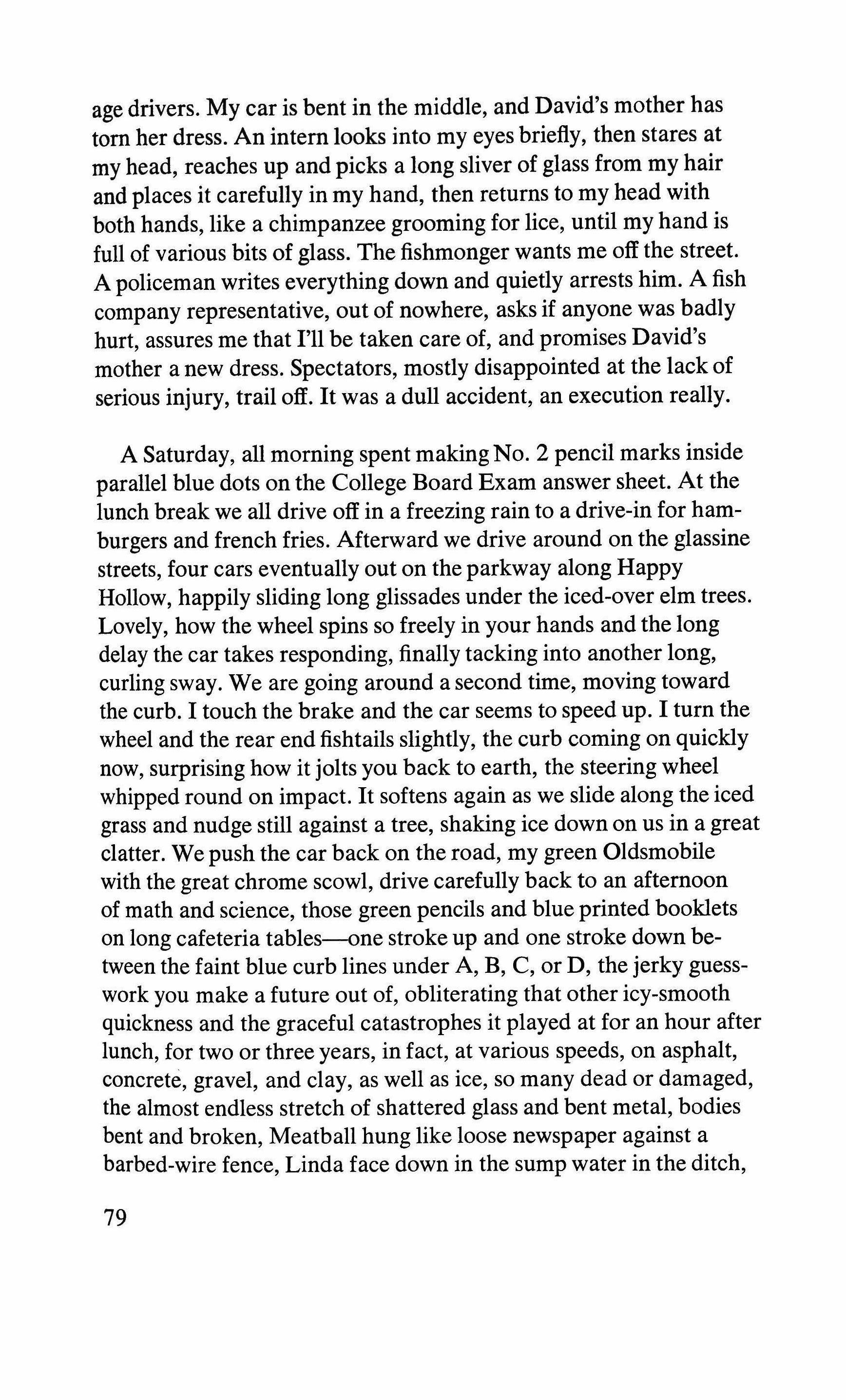
age drivers. My car is bent in the middle, and David's mother has torn her dress. An intern looks into my eyes briefly, then stares at my head, reaches up and picks a long sliver of glass from my hair and places it carefully in my hand, then returns to my head with both hands, like a chimpanzee grooming for lice, until my hand is full of various bits of glass. The fishmonger wants me off the street. A policeman writes everything down and quietly arrests him. A fish company representative, out of nowhere, asks if anyone was badly hurt, assures me that I'll be taken care of, and promises David's mother a new dress. Spectators, mostly disappointed at the lack of serious injury, trail off. It was a dull accident, an execution really.
A Saturday, all morning spent making No.2 pencil marks inside parallel blue dots on the College Board Exam answer sheet. At the lunch break we all drive off in a freezing rain to a drive-in for hamburgers and french fries. Afterward we drive around on the glassine streets, four cars eventually out on the parkway along Happy Hollow, happily sliding long glissades under the iced-over elm trees. Lovely, how the wheel spins so freely in your hands and the long delay the car takes responding, finally tacking into another long, curling sway. We are going around a second time, moving toward the curb. I touch the brake and the car seems to speed up. I turn the wheel and the rear end fishtails slightly, the curb coming on quickly now, surprising how it jolts you back to earth, the steering wheel whipped round on impact. It softens again as we slide along the iced grass and nudge still against a tree, shaking ice down on us in a great clatter. We push the car back on the road, my green Oldsmobile with the great chrome scowl, drive carefully back to an afternoon of math and science, those green pencils and blue printed booklets on long cafeteria tables-one stroke up and one stroke down between the faint blue curb lines under A, B, C, or D, the jerky guesswork you make a future out of, obliterating that other icy-smooth quickness and the graceful catastrophes it played at for an hour after lunch, for two or three years, in fact, at various speeds, on asphalt, concrete, gravel, and clay, as well as ice, so many dead or damaged, the almost endless stretch of shattered glass and bent metal, bodies bent and broken, Meatball hung like loose newspaper against a barbed-wire fence, Linda face down in the sump water in the ditch,
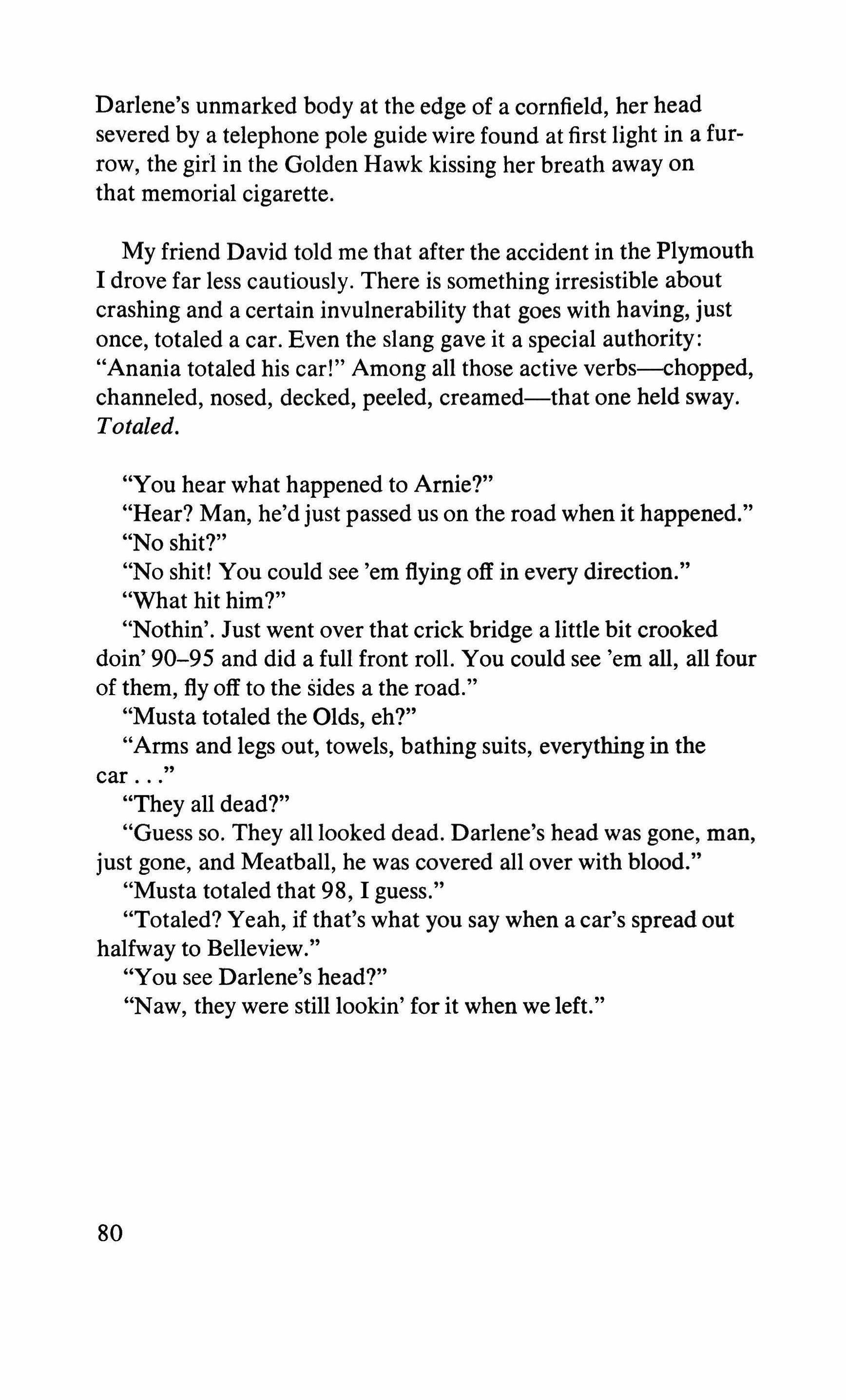
Darlene's unmarked body at the edge of a cornfield, her head severed by a telephone pole guide wire found at first light in a furrow, the girl in the Golden Hawk kissing her breath away on that memorial cigarette.
My friend David told me that after the accident in the Plymouth I drove far less cautiously. There is something irresistible about crashing and a certain invulnerability that goes with having, just once, totaled a car. Even the slang gave it a special authority: "Anania totaled his car!" Among all those active verbs-chopped, channeled, nosed, decked, peeled, creamed-that one held sway. Totaled.
"You hear what happened to Arnie?"
"Hear? Man, he'd just passed us on the road when it happened."
"No shit?"
"No shit! You could see 'em flying off in every direction."
"What hit him?"
"Nothin'. Just went over that crick bridge a little bit crooked doin' 90-95 and did a full front roll. You could see 'em all, all four of them, fly off to the sides a the road."
"Musta totaled the OIds, eh?"
"Arms and legs out, towels, bathing suits, everything in the car
"They all dead?"
"Guess so. They all looked dead. Darlene's head was gone, man, just gone, and Meatball, he was covered allover with blood."
"Musta totaled that 98, I guess."
"Totaled? Yeah, if that's what you say when a car's spread out halfway to Belleview."
"You see Darlene's head?"
"Naw, they were still lookin' for it when we left."
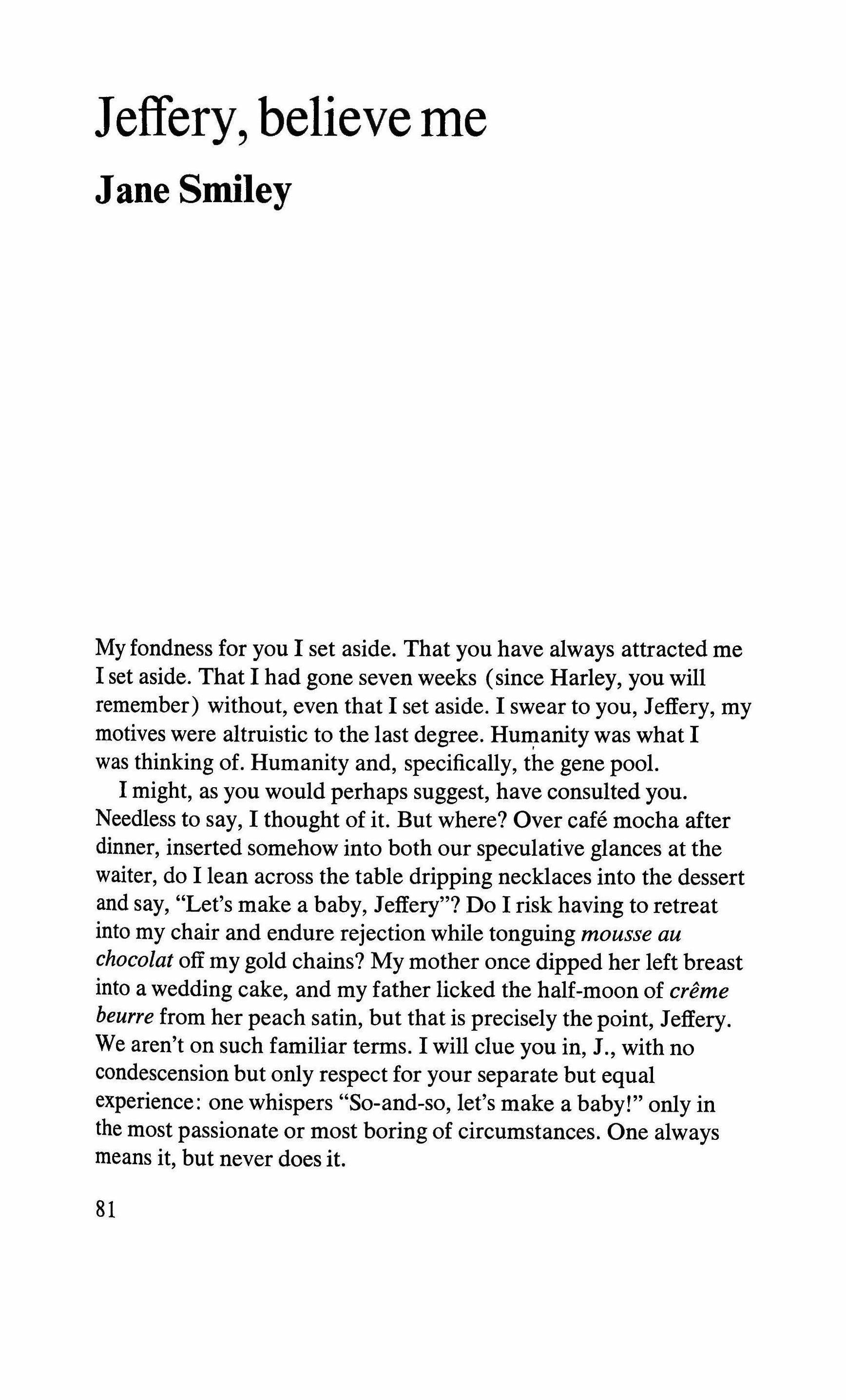
My fondness for you I set aside. That you have always attracted me I set aside. That I had gone seven weeks (since Harley, you will remember) without, even that I set aside. I swear to you, Jeffery, my motives were altruistic to the last degree. Humanity was what I was thinking of. Humanity and, specifically, the gene pool. I might, as you would perhaps suggest, have consulted you. Needless to say, I thought of it. But where? Over cafe mocha after dinner, inserted somehow into both our speculative glances at the waiter, do I lean across the table dripping necklaces into the dessert and say, "Let's make a baby, Jeffery"? Do I risk having to retreat into my chair and endure rejection while tonguing mousse au chocolat off my gold chains? My mother once dipped her left breast into a wedding cake, and my father licked the half-moon of creme beurre from her peach satin, but that is precisely the point, Jeffery. We aren't on such familiar terms. I will clue you in, J., with no condescension but only respect for your separate but equal experience: one whispers "So-and-so, let's make a baby!" only in the most passionate or most boring of circumstances. One always means it, but never does it.
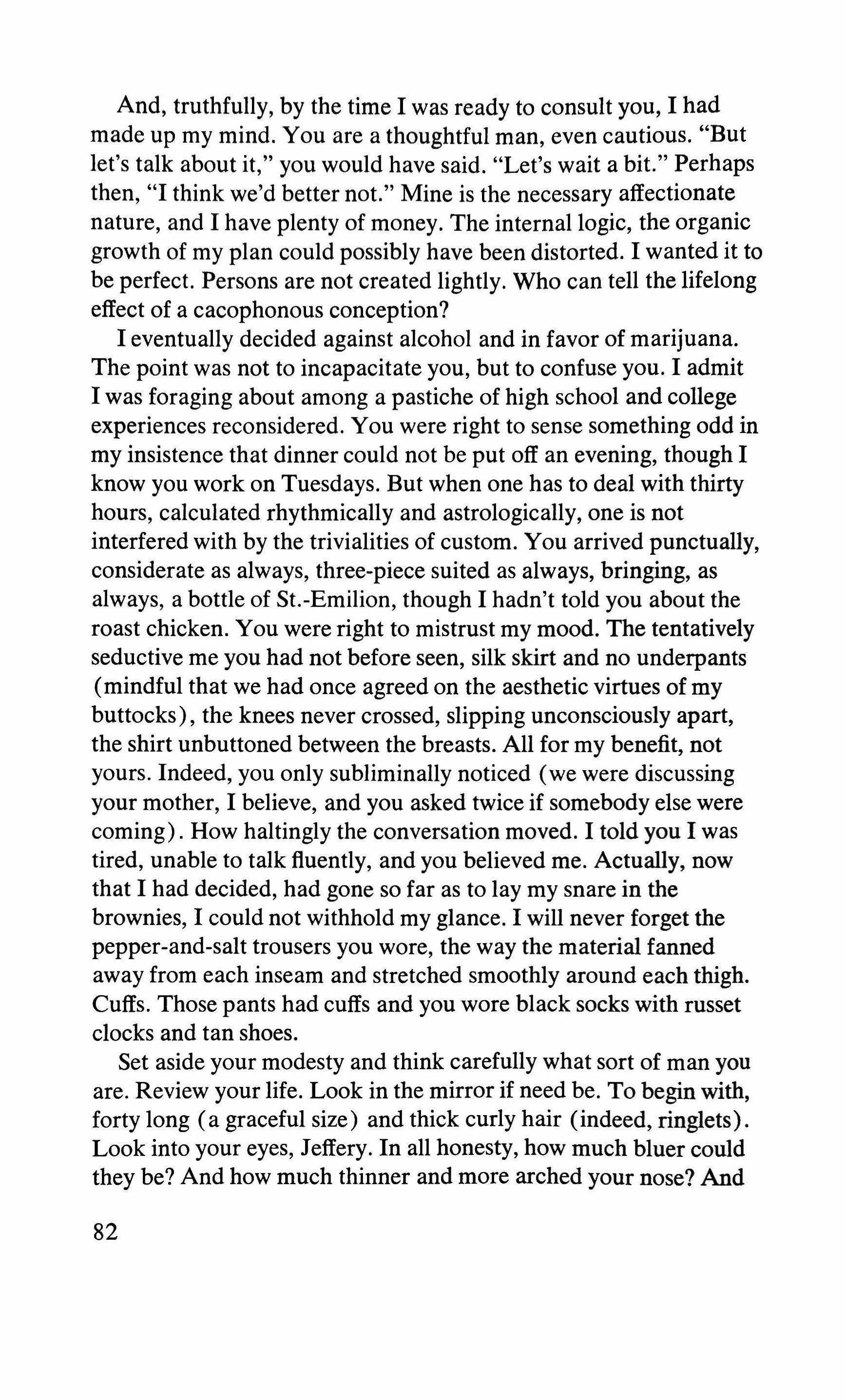
And, truthfully, by the time I was ready to consult you, I had made up my mind. You are a thoughtful man, even cautious. "But let's talk about it," you would have said. "Let's wait a bit." Perhaps then, "I think we'd better not." Mine is the necessary affectionate nature, and I have plenty of money. The internal logic, the organic growth of my plan could possibly have been distorted. I wanted it to be perfect. Persons are not created lightly. Who can tell the lifelong effect of a cacophonous conception?
I eventually decided against alcohol and in favor of marijuana. The point was not to incapacitate you, but to confuse you. I admit I was foraging about among a pastiche of high school and college experiences reconsidered. You were right to sense something odd in my insistence that dinner could not be put off an evening, though I know you work on Tuesdays. But when one has to deal with thirty hours, calculated rhythmically and astrologically, one is not interfered with by the trivialities of custom. You arrived punctually, considerate as always, three-piece suited as always, bringing, as always, a bottle of St.-Emilion, though I hadn't told you about the roast chicken. You were right to mistrust my mood. The tentatively seductive me you had not before seen, silk skirt and no underpants (mindful that we had once agreed on the aesthetic virtues of my buttocks), the knees never crossed, slipping unconsciously apart, the shirt unbuttoned between the breasts. All for my benefit, not yours. Indeed, you only subliminally noticed (we were discussing your mother, I believe, and you asked twice if somebody else were coming). How haltingly the conversation moved. I told you I was tired, unable to talk fluently, and you believed me. Actually, now that I had decided, had gone so far as to lay my snare in the brownies, I could not withhold my glance. I will never forget the pepper-and-salt trousers you wore, the way the material fanned away from each inseam and stretched smoothly around each thigh. Cuffs. Those pants had cuffs and you wore black socks with russet clocks and tan shoes.
Set aside your modesty and think carefully what sort of man you are. Review your life. Look in the mirror if need be. To begin with, forty long (a graceful size) and thick curly hair (indeed, ringlets). Look into your eyes, Jeffery. In all honesty, how much bluer could they be? And how much thinner and more arched your nose? And
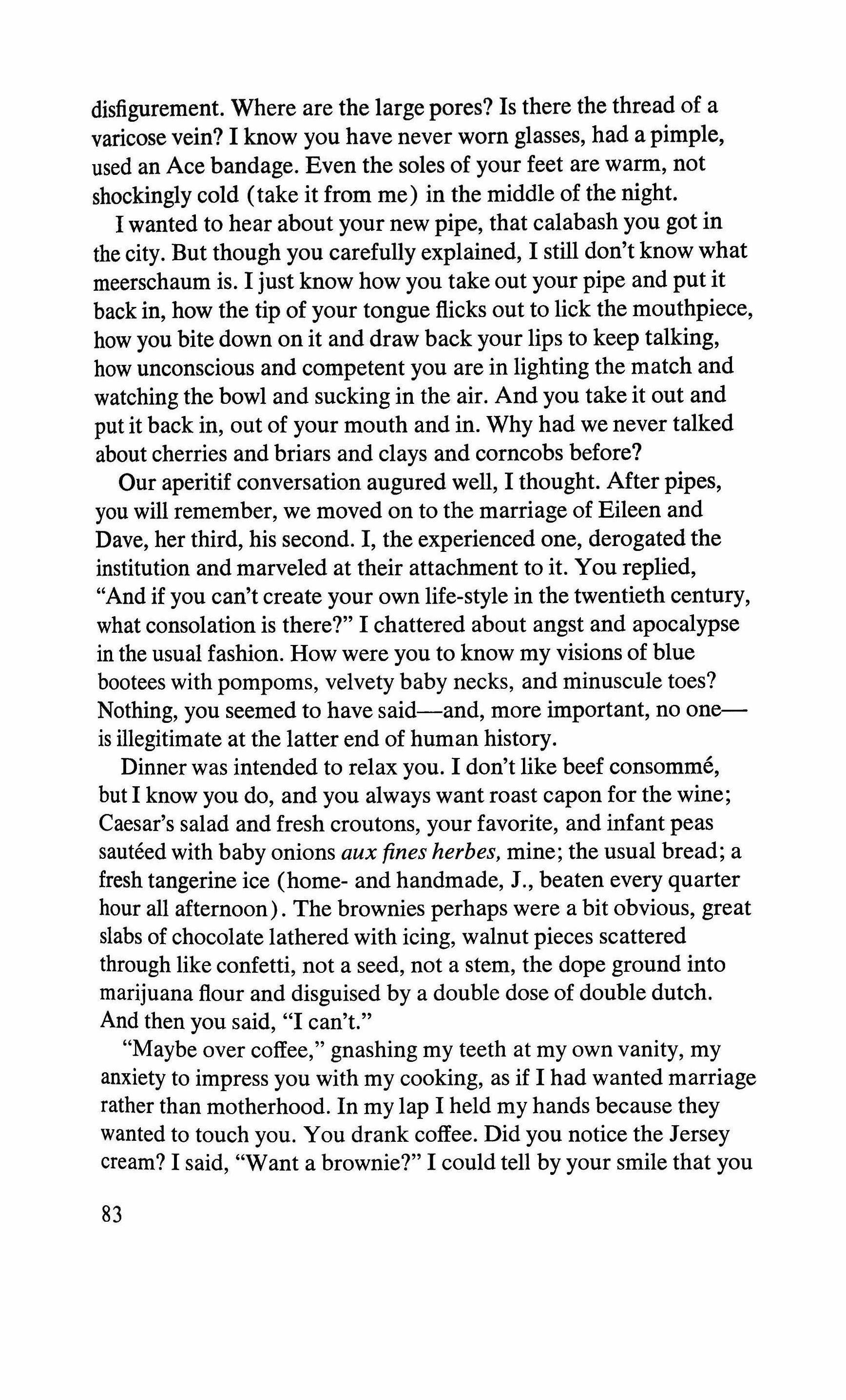
disfigurement. Where are the large pores? Is there the thread of a varicose vein? I know you have never worn glasses, had a pimple, used an Ace bandage. Even the soles of your feet are warm, not shockingly cold (take it from me) in the middle of the night.
I wanted to hear about your new pipe, that calabash you got in the city. But though you carefully explained, I still don't know what meerschaum is. I just know how you take out your pipe and put it back in, how the tip of your tongue flicks out to lick the mouthpiece, how you bite down on it and draw back your lips to keep talking, how unconscious and competent you are in lighting the match and watching the bowl and sucking in the air. And you take it out and put it back in, out of your mouth and in. Why had we never talked about cherries and briars and clays and corncobs before?
Our aperitif conversation augured well, I thought. After pipes, you will remember, we moved on to the marriage of Eileen and Dave, her third, his second. I, the experienced one, derogated the institution and marveled at their attachment to it. You replied, "And if you can't create your own life-style in the twentieth century, what consolation is there?" I chattered about angst and apocalypse in the usual fashion. How were you to know my visions of blue bootees with pompoms, velvety baby necks, and minuscule toes? Nothing, you seemed to have said-and, more important, no oneis illegitimate at the latter end of human history.
Dinner was intended to relax you. I don't like beef consomme, but I know you do, and you always want roast capon for the wine; Caesar's salad and fresh croutons, your favorite, and infant peas sauteed with baby onions aux fines herbes, mine; the usual bread; a fresh tangerine ice (home- and handmade, J., beaten every quarter hour all afternoon). The brownies perhaps were a bit obvious, great slabs of chocolate lathered with icing, walnut pieces scattered through like confetti, not a seed, not a stem, the dope ground into marijuana flour and disguised by a double dose of double dutch. And then you said, "I can't."
"Maybe over coffee," gnashing my teeth at my own vanity, my anxiety to impress you with my cooking, as if I had wanted marriage rather than motherhood. In my lap I held my hands because they wanted to touch you. You drank coffee. Did you notice the Jersey cream? I said, "Want a brownie?" I could tell by your smile that you

wanted to please me. "In a while. Have a cup of coffee with me. I'll get it." And there was your round little butt passing sideways between my chair and the coffee table, nearly brushing my face. You would put a dollop of Kahlua in it, I seemed jumpy. Oh that I had bitten your left bun right then. "Thank you." Do you remember how demurely I said thank you, smoothing the silk in my lap?
But Jeffery, as adults we pretend that handsome is as handsome does. Really, you have done handsomely. Music, for example, is only your hobby, and yet you play three instruments. Everyone agrees you are a masterful raconteur, and yet a temperate man (that last, indeed, was the greatest obstacle to my plot) You have a graceful and generous mind. What was the last spiteful comment you made? There are none within my memory. Your minor virtues are countless: you leave proper tips, you hang up your clothes, you are not too proud to take buses. This is just living, you would say, and yet all those thank-you notes add up. Not wishing to embarrass you, I will drop the subject, adding only that we both know what a remarkable child you were and that you have been steadily successful.
When the coffee cup was heavy in my hands, you sat down on the table and looked at me. "I'm concerned for you," you said. I was flattered. When you leaned forward, you smelled like tobacco, wool, and skin. The bowls of your cobalt irises float well above the lower lids, and there is white in them like skeletons. I had never noticed that before. The pupils dilated. You do like me. It was time to take your face between my palms and gain your favors with one passionate, authoritative, skilled, yet vulnerable kiss. I said, "Harley is threatening to cut his throat again." I hadn't heard from Harley, but it's a threat he offers preferred women every few months.
"When did he call?"
"My mother is dying."
"Of what?"
"The police beat up my grandfather for passing out deaf-anddumb cards."
"Both your grandfathers are dead."
"My sister anticipated a walk light, and a taxi ran over her feet."
"What did you do today?"
"I washed DDT off infant peas and baby onions. What do you think of babies, Jeffery?"
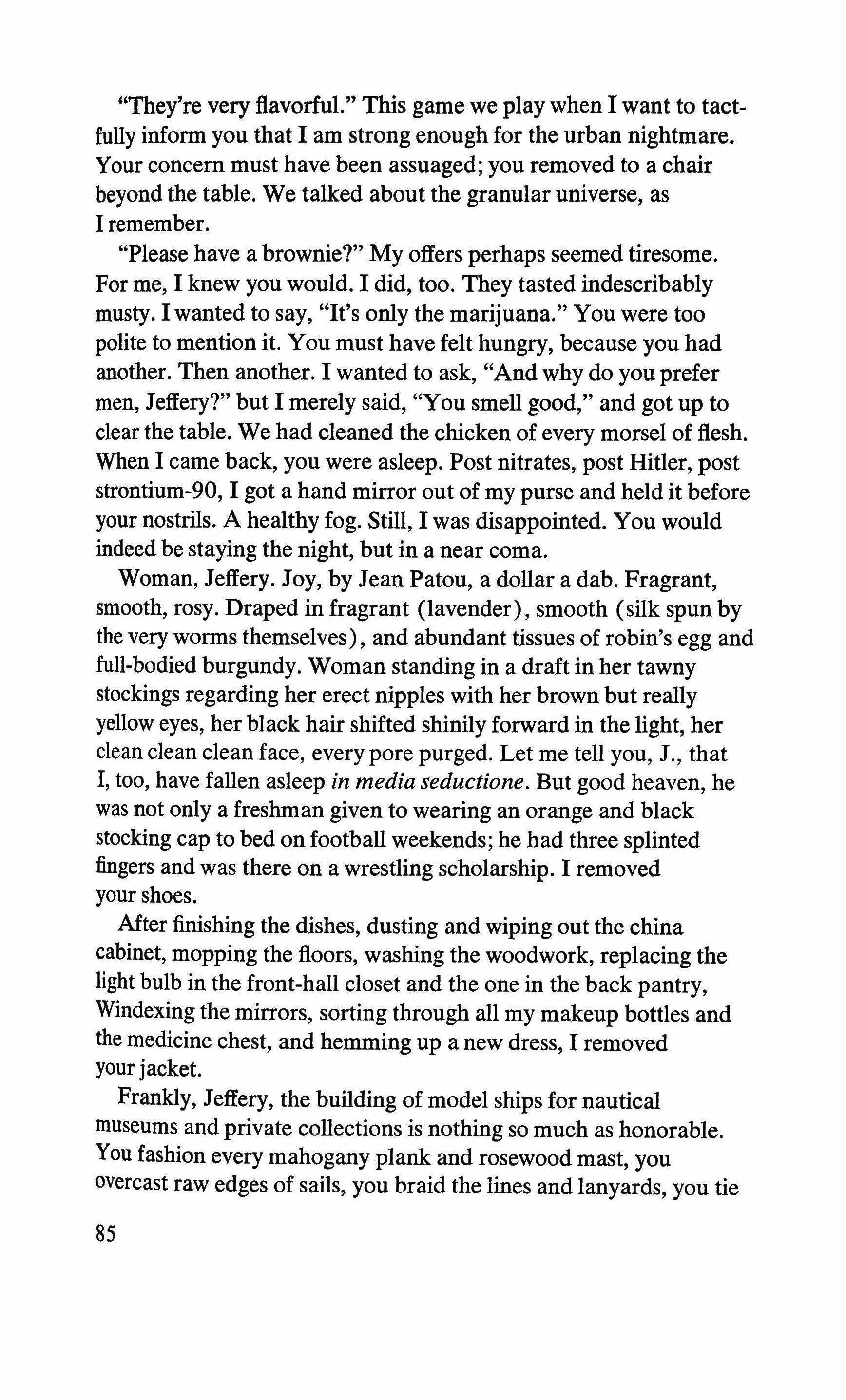
"They're very flavorful." This game we play when I want to tactfully inform you that I am strong enough for the urban nightmare. Your concern must have been assuaged; you removed to a chair beyond the table. We talked about the granular universe, as I remember.
"Please have a brownie?" My offers perhaps seemed tiresome. For me, I knew you would. I did, too. They tasted indescribably musty. I wanted to say, "It's only the marijuana." You were too polite to mention it. You must have felt hungry, because you had another. Then another. I wanted to ask, "And why do you prefer men, Jeffery?" but I merely said, "You smell good," and got up to clear the table. We had cleaned the chicken of every morsel of flesh. When I came back, you were asleep. Post nitrates, post Hitler, post strontium-90, I got a hand mirror out of my purse and held it before your nostrils. A healthy fog. Still, I was disappointed. You would indeed be staying the night, but in a near coma.
Woman, Jeffery. Joy, by Jean Patou, a dollar a dab. Fragrant, smooth, rosy. Draped in fragrant (lavender), smooth (silk spun by the very worms themselves), and abundant tissues of robin's egg and full-bodied burgundy. Woman standing in a draft in her tawny stockings regarding her erect nipples with her brown but really yellow eyes, her black hair shifted shinily forward in the light, her clean clean clean face, every pore purged. Let me tell you, J., that I, too, have fallen asleep in media seductione. But good heaven, he was not only a freshman given to wearing an orange and black stocking cap to bed on football weekends; he had three splinted fingers and was there on a wrestling scholarship. I removed your shoes.
After finishing the dishes, dusting and wiping out the china cabinet, mopping the floors, washing the woodwork, replacing the light bulb in the front-hall closet and the one in the back pantry, Windexing the mirrors, sorting through all my makeup bottles and the medicine chest, and hemming up a new dress, I removed your jacket.
Frankly, Jeffery, the building of model ships for nautical museums and private collections is nothing so much as honorable. You fashion every mahogany plank and rosewood mast, you overcast raw edges of sails, you braid the lines and lanyards, you tie

the microscopic knots. Remember the time I nosed around your mullion-windowed shop?
"Of course I'll tell you."
"Is it with long tweezers, the way they do radium?"
The masts and sails nestled together on the deck like bat wings. You slid the hull gently, tightly, through the neck and positioned it on the floor of the bottle. "Pull this string." I pulled. The masts stood up and the sails spread and the bottle filled with wind. Won't you believe the lifelong importance of this mystery to me?
I disrobed. I brushed my teeth twice and flossed them. I plucked two hairs between my eyebrows. I washed my face with glycerinerosewater soap. I brushed my hair a hundred strokes and poured peroxide into my ears and navel. I applied cups of water to my eyeballs. I gargled. I blew my nose. I emptied my bladder. I cleaned under my fingernails. I buttoned my cotton pajamas crotch to chin, then zipped myself into a turtleneck bathrobe and sat down on the bed. The only, though enormous, bed.
As if I had intended to all along, I walked up to you in the living room, removed every stitch you had on, and threw it all down the air shaft in the hall. I was touched by the frayed waistband of your Munsingwears. When I came back you were shivering every so often, but still comatose. I turned up the heat and, for the time being, covered you with an antique quilt, rose of Sharon pattern, as one such as I, a woman, a cook, a believer in simple plants like yeast, might set the dough on to rise. I pulled on my mukluks, muffled my neck, and sat down with Roland Barthes.
But you (it) were (was) inescapable. Perfectly lubricated in your bendings and unbendings, eyes almost completely closed, with every manifestation of presence and yet gone, gone. I threw down the Barthes, yanked off the quilt and took a good look. My eye, of course, flew at once to your penis for evidence of your inner life. But I dragged my gaze away. There wasn't much of you to see, mostly skin not unlike my own. I fingered some of it. It pinched up elastically, resumed its shape, changed white to red to pink. I laid my cheek, my breast, my shoulder, my knee on various parts of you, to tune you in over unusual receivers. I smelled you. You smell like hollandaise for some reason. Experimentally, I applied lips and tongue to your penis. It grew to a firm, tasteful size, unblemished,
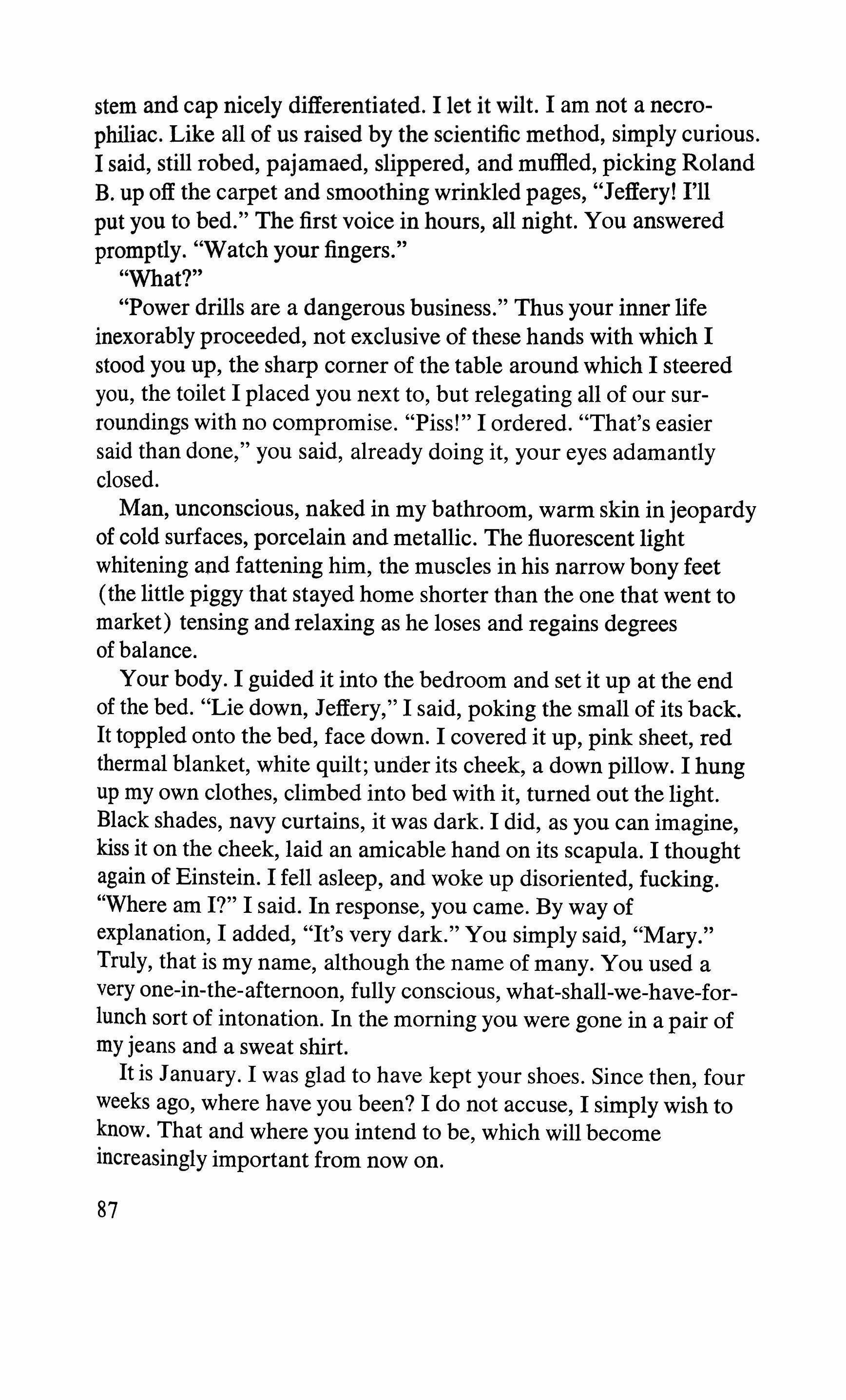
stem and cap nicely differentiated. I let it wilt. I am not a necrophiliac. Like all of us raised by the scientific method, simply curious. I said, still robed, pajamaed, slippered, and muffled, picking Roland B. up off the carpet and smoothing wrinkled pages, "Jeffery! I'll put you to bed." The first voice in hours, all night. You answered promptly. "Watch your fingers."
"Power drills are a dangerous business." Thus your inner life inexorably proceeded, not exclusive of these hands with which I stood you up, the sharp comer of the table around which I steered you, the toilet I placed you next to, but relegating all of our surroundings with no compromise. "Piss!" I ordered. "That's easier said than done," you said, already doing it, your eyes adamantly closed.
Man, unconscious, naked in my bathroom, warm skin in jeopardy of cold surfaces, porcelain and metallic. The fluorescent light whitening and fattening him, the muscles in his narrow bony feet (the little piggy that stayed home shorter than the one that went to market) tensing and relaxing as he loses and regains degrees of balance.
Your body. I guided it into the bedroom and set it up at the end of the bed. "Lie down, Jeffery," I said, poking the small of its back. It toppled onto the bed, face down. I covered it up, pink sheet, red thermal blanket, white quilt; under its cheek, a down pillow. I hung up my own clothes, climbed into bed with it, turned out the light. Black shades, navy curtains, it was dark. I did, as you can imagine, kiss it on the cheek, laid an amicable hand on its scapula. I thought again of Einstein. I fell asleep, and woke up disoriented, fucking. "Where am I?" I said. In response, you came. By way of explanation, I added, "It's very dark." You simply said, "Mary." Truly, that is my name, although the name of many. You used a very one-in-the-afternoon, fully conscious, what-shall-we-have-forlunch sort of intonation. In the morning you were gone in a pair of my jeans and a sweat shirt.
It is January. I was glad to have kept your shoes. Since then, four weeks ago, where have you been? I do not accuse, I simply wish to know. That and where you intend to be, which will become increasingly important from now on.
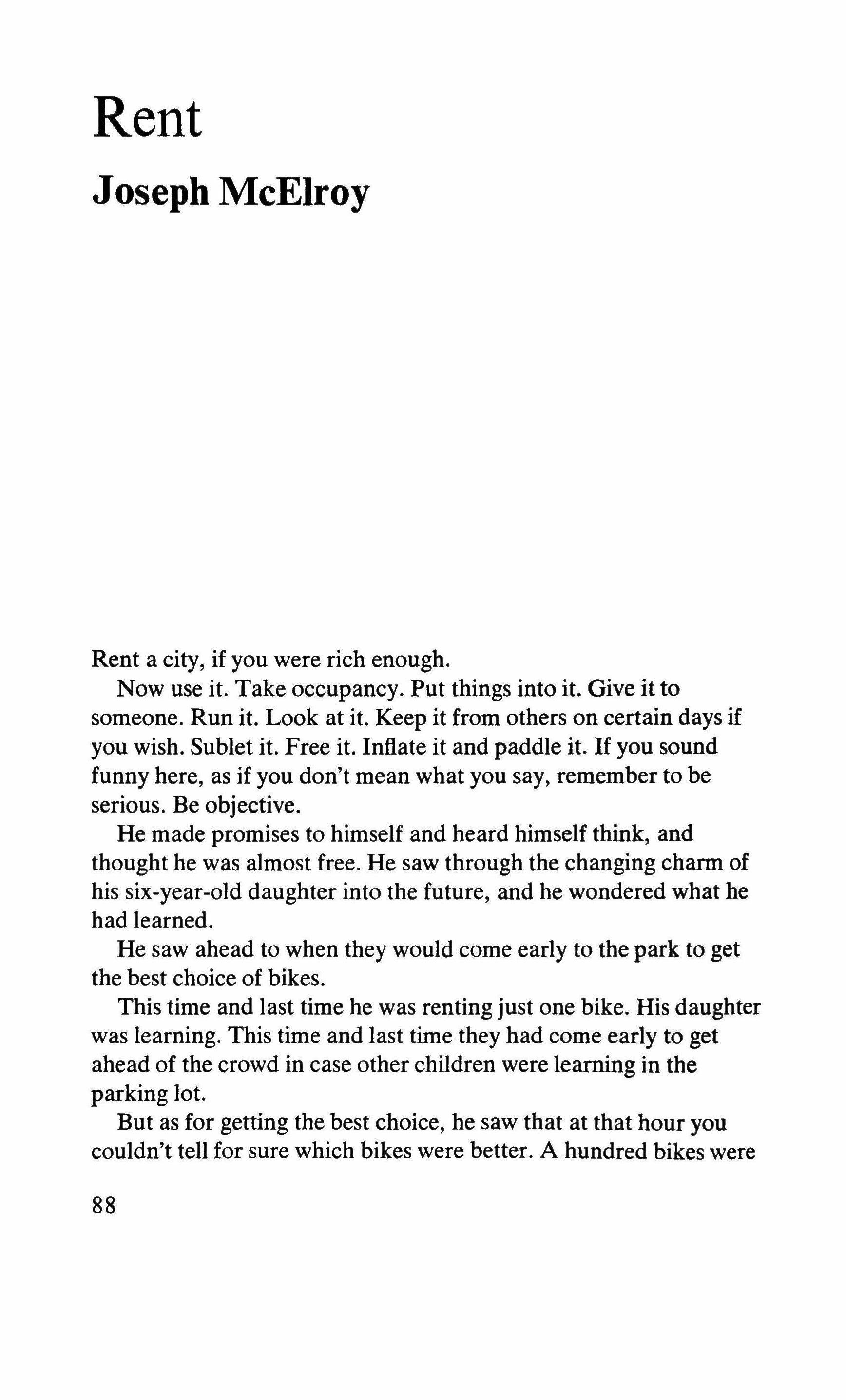
Rent a city, if you were rich enough.
Now use it. Take occupancy. Put things into it. Give it to someone. Run it. Look at it. Keep it from others on certain days if you wish. Sublet it. Free it. Inflate it and paddle it. If you sound funny here, as if you don't mean what you say, remember to be serious. Be objective.
He made promises to himself and heard himself think, and thought he was almost free. He saw through the changing charm of his six-year-old daughter into the future, and he wondered what he had learned.
He saw ahead to when they would come early to the park to get the best choice of bikes.
This time and last time he was rentingjust one bike. His daughter was learning. This time and last time they had come early to get ahead of the crowd in case other children were learning in the parking lot.
But as for getting the best choice, he saw that at that hour you couldn't tell for sure which bikes were better. A hundred bikes were
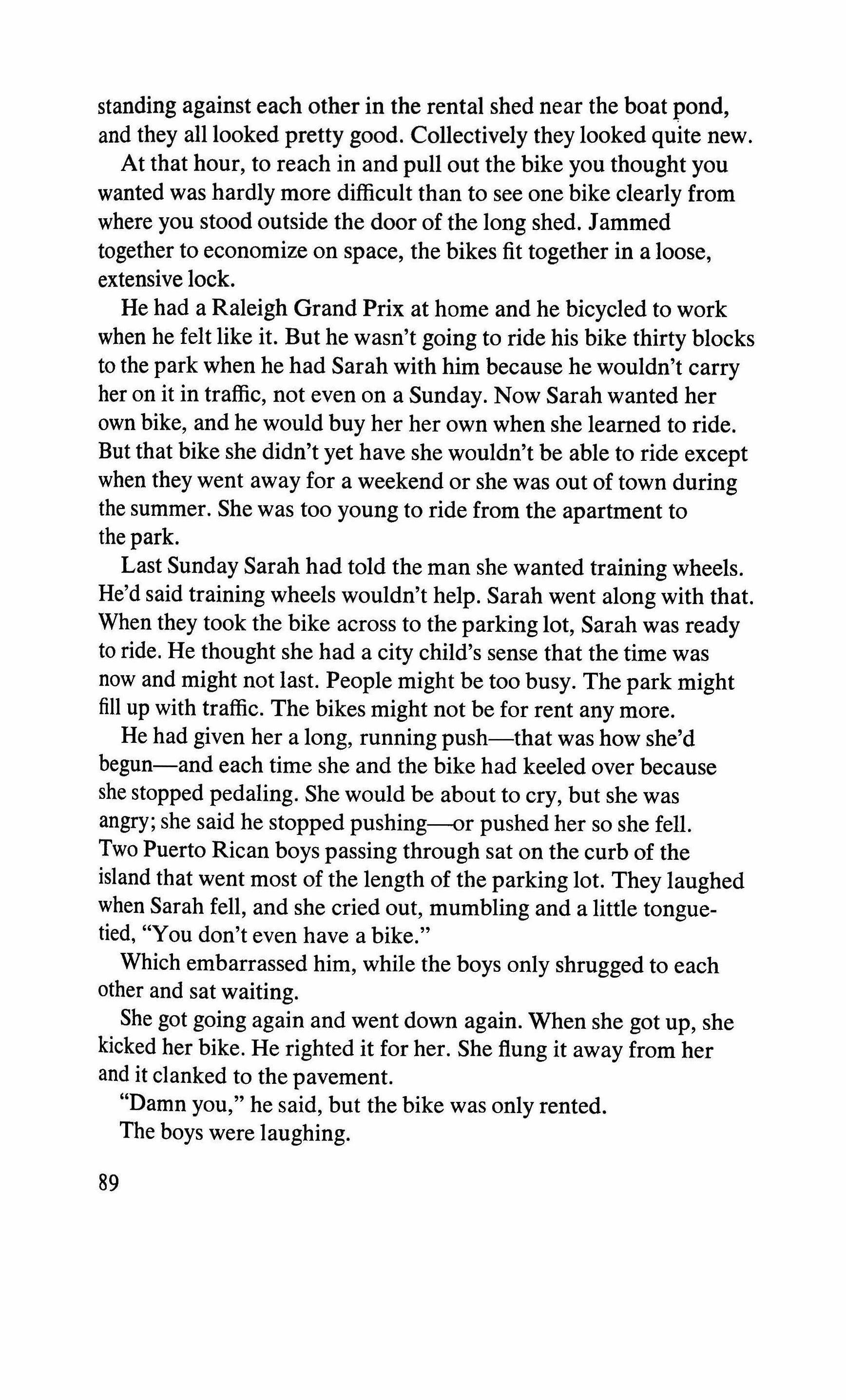
standing against each other in the rental shed near the boat pond, and they all looked pretty good. Collectively they looked quite new.
At that hour, to reach in and pull out the bike you thought you wanted was hardly more difficult than to see one bike clearly from where you stood outside the door of the long shed. Jammed together to economize on space, the bikes fit together in a loose, extensive lock.
He had a Raleigh Grand Prix at home and he bicycled to work when he felt like it. But he wasn't going to ride his bike thirty blocks to the park when he had Sarah with him because he wouldn't carry her on it in traffic, not even on a Sunday. Now Sarah wanted her own bike, and he would buy her her own when she learned to ride. But that bike she didn't yet have she wouldn't be able to ride except when they went away for a weekend or she was out of town during the summer. She was too young to ride from the apartment to the park.
Last Sunday Sarah had told the man she wanted training wheels. He'd said training wheels wouldn't help. Sarah went along with that. When they took the bike across to the parking lot, Sarah was ready to ride. He thought she had a city child's sense that the time was now and might not last. People might be too busy. The park might fill up with traffic. The bikes might not be for rent any more.
He had given her a long, running push-that was how she'd begun-and each time she and the bike had keeled over because she stopped pedaling. She would be about to cry, but she was angry; she said he stopped pushing-or pushed her so she fell. Two Puerto Rican boys passing through sat on the curb of the island that went most of the length of the parking lot. They laughed when Sarah fell, and she cried out, mumbling and a little tonguetied, "You don't even have a bike."
Which embarrassed him, while the boys only shrugged to each other and sat waiting.
She got going again and went down again. When she got up, she kicked her bike. He righted it for her. She flung it away from her and it clanked to the pavement.
"Damn you," he said, but the bike was only rented.
The boys were laughing.
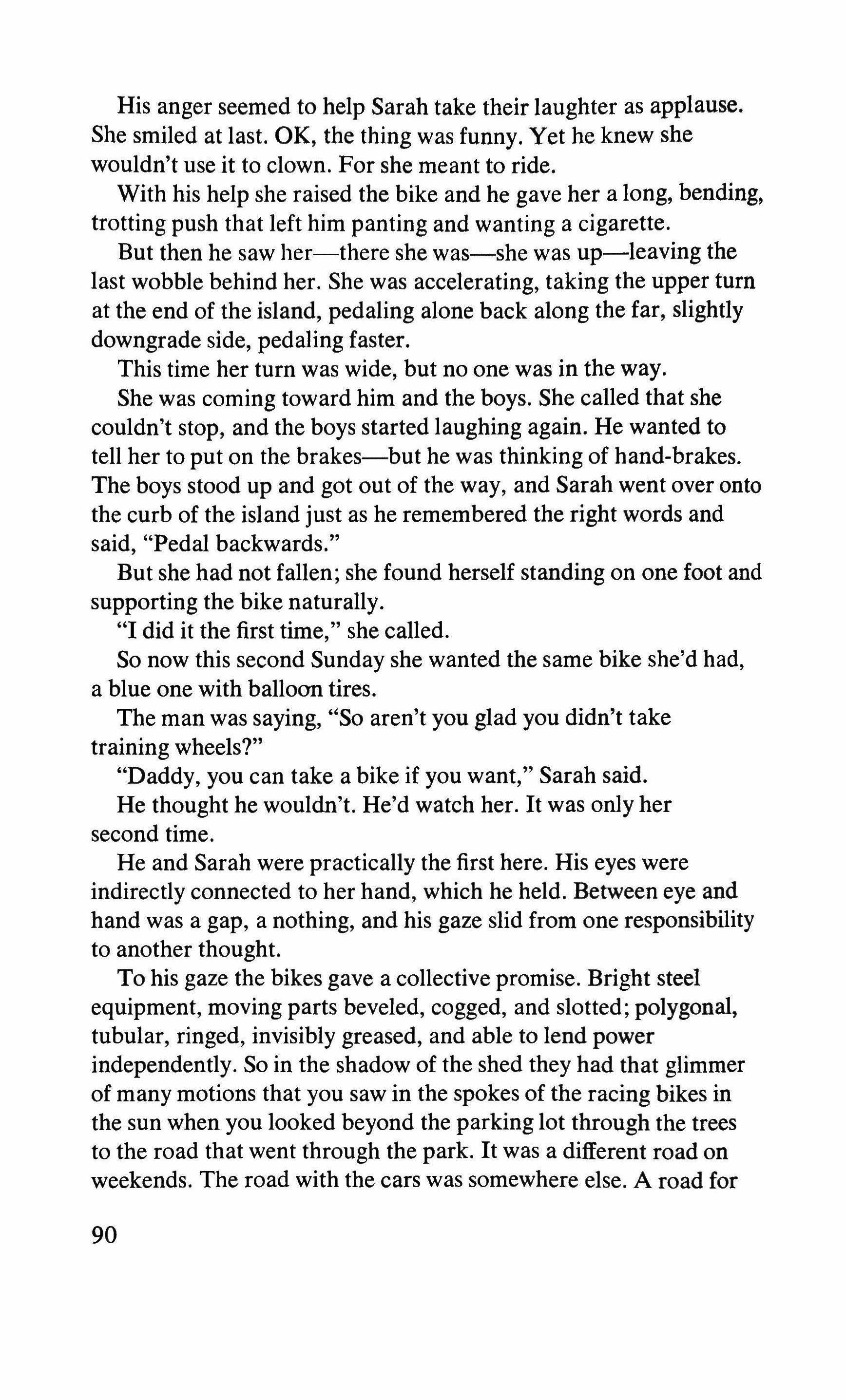
His anger seemed to help Sarah take their laughter as applause. She smiled at last. OK, the thing was funny. Yet he knew she wouldn't use it to clown. For she meant to ride.
With his help she raised the bike and he gave her a long, bending, trotting push that left him panting and wanting a cigarette.
But then he saw her-there she was-she was up-leaving the last wobble behind her. She was accelerating, taking the upper turn at the end of the island, pedaling alone back along the far, slightly downgrade side, pedaling faster.
This time her turn was wide, but no one was in the way.
She was coming toward him and the boys. She called that she couldn't stop, and the boys started laughing again. He wanted to tell her to put on the brakes-but he was thinking of hand-brakes. The boys stood up and got out of the way, and Sarah went over onto the curb of the island just as he remembered the right words and said, "Pedal backwards."
But she had not fallen; she found herself standing on one foot and supporting the bike naturally.
"I did it the first time," she called.
So now this second Sunday she wanted the same bike she'd had, a blue one with balloon tires.
The man was saying, "So aren't you glad you didn't take training wheels?"
"Daddy, you can take a bike if you want," Sarah said. He thought he wouldn't. He'd watch her. It was only her second time.
He and Sarah were practically the first here. His eyes were indirectly connected to her hand, which he held. Between eye and hand was a gap, a nothing, and his gaze slid from one responsibility to another thought.
To his gaze the bikes gave a collective promise. Bright steel equipment, moving parts beveled, cogged, and slotted; polygonal, tubular, ringed, invisibly greased, and able to lend power independently. So in the shadow of the shed they had that glimmer of many motions that you saw in the spokes of the racing bikes in the sun when you looked beyond the parking lot through the trees to the road that went through the park. It was a different road on weekends. The road with the cars was somewhere else. A road for
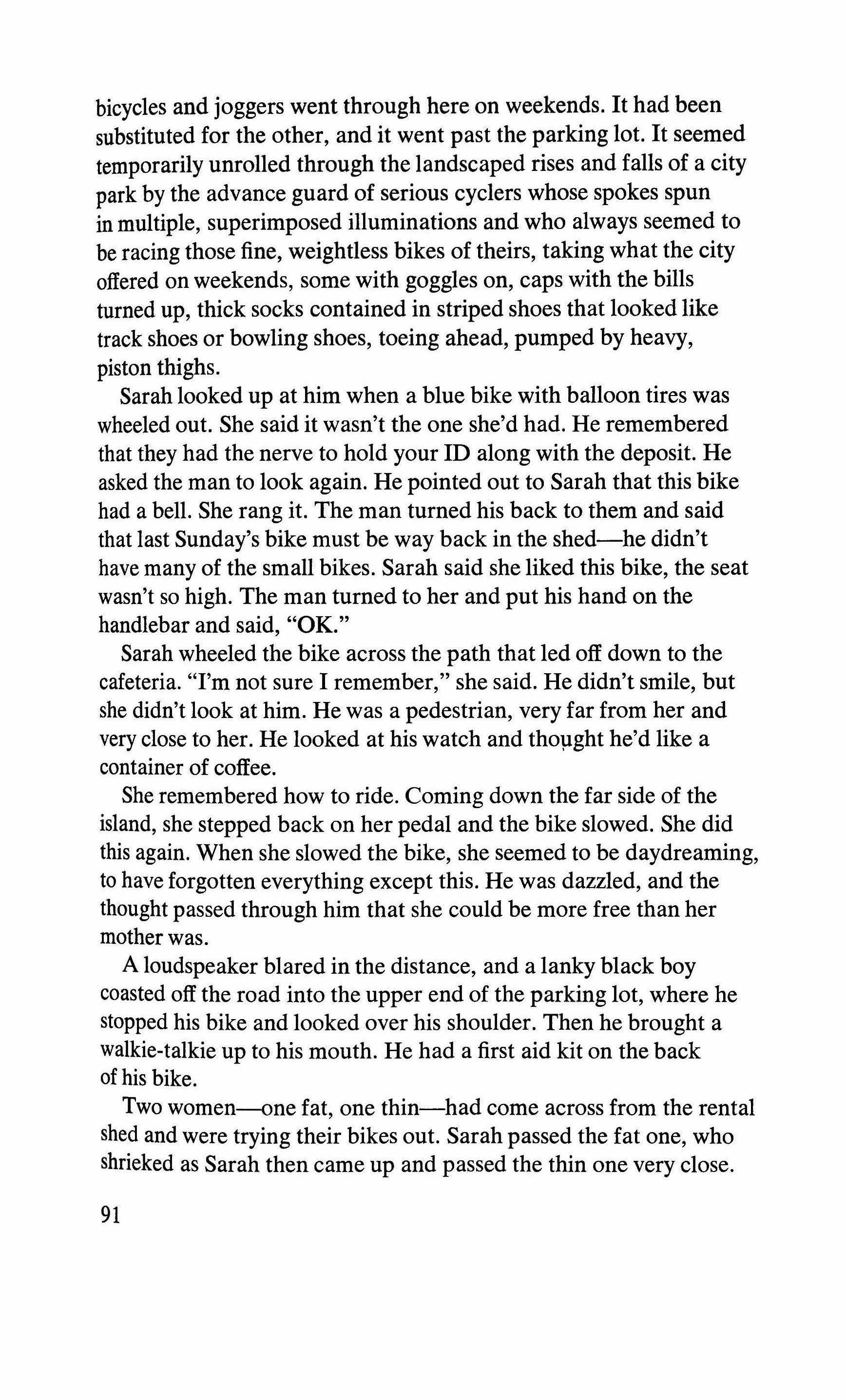
bicycles and joggers went through here on weekends. It had been substituted for the other, and it went past the parking lot. It seemed temporarily unrolled through the landscaped rises and falls of a city park by the advance guard of serious cyclers whose spokes spun in multiple, superimposed illuminations and who always seemed to be racing those fine, weightless bikes of theirs, taking what the city offered on weekends, some with goggles on, caps with the bills turned up, thick socks contained in striped shoes that looked like track shoes or bowling shoes, toeing ahead, pumped by heavy, piston thighs.
Sarah looked up at him when a blue bike with balloon tires was wheeled out. She said it wasn't the one she'd had. He remembered that they had the nerve to hold your ID along with the deposit. He asked the man to look again. He pointed out to Sarah that this bike had a bell. She rang it. The man turned his back to them and said that last Sunday's bike must be way back in the shed-he didn't have many of the small bikes. Sarah said she liked this bike, the seat wasn't so high. The man turned to her and put his hand on the handlebar and said, "OK."
Sarah wheeled the bike across the path that led off down to the cafeteria. "I'm not sure I remember," she said. He didn't smile, but she didn't look at him. He was a pedestrian, very far from her and very close to her. He looked at his watch and thought he'd like a container of coffee.
She remembered how to ride. Coming down the far side of the island, she stepped back on her pedal and the bike slowed. She did this again. When she slowed the bike, she seemed to be daydreaming, to have forgotten everything except this. He was dazzled, and the thought passed through him that she could be more free than her mother was.
A loudspeaker blared in the distance, and a lanky black boy coasted off the road into the upper end of the parking lot, where he stopped his bike and looked over his shoulder. Then he brought a walkie-talkie up to his mouth. He had a first aid kit on the back of his bike.
Two women-one fat, one thin-had come across from the rental shed and were trying their bikes out. Sarah passed the fat one, who shrieked as Sarah then came up and passed the thin one very close.
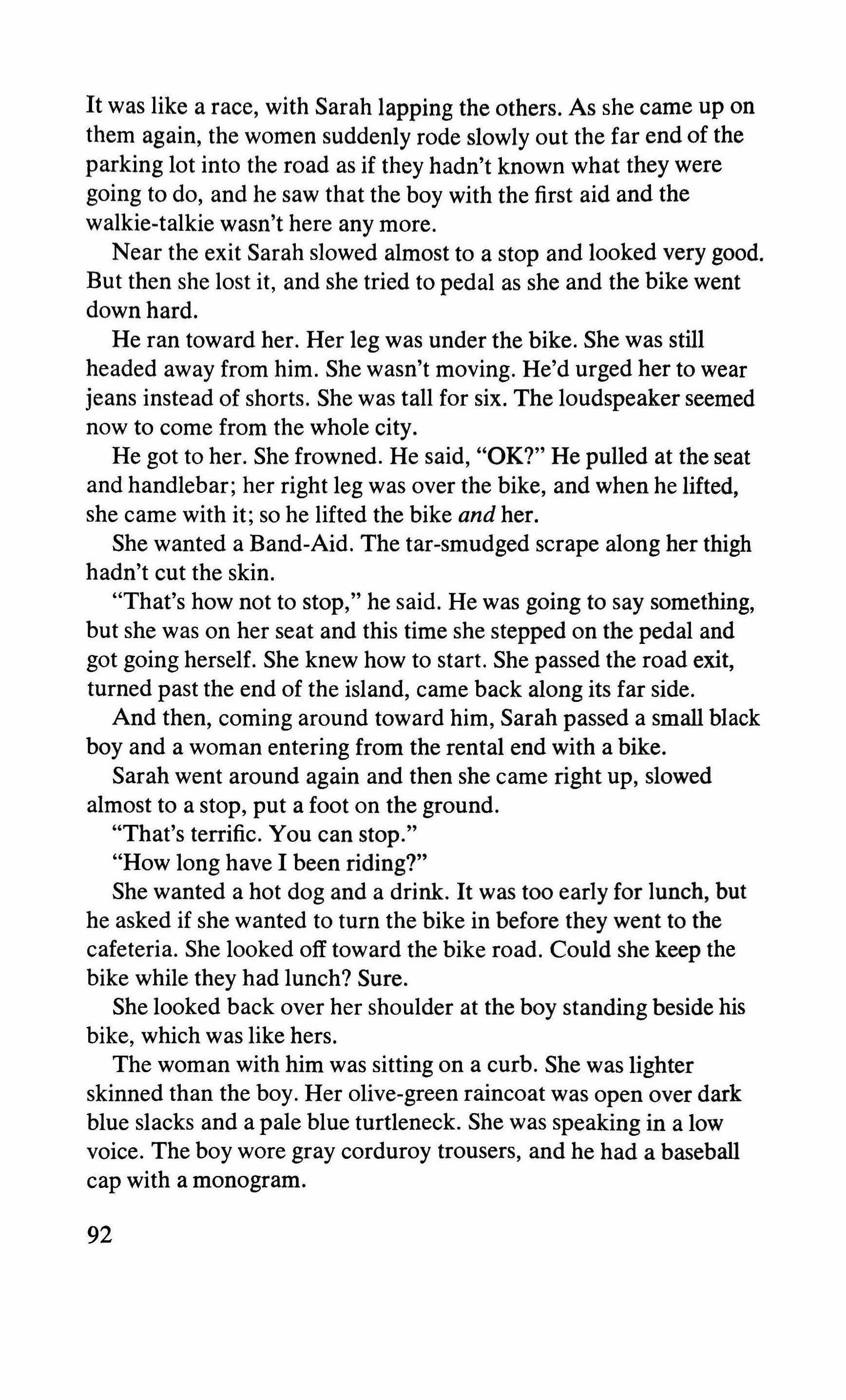
It was like a race, with Sarah lapping the others. As she came up on them again, the women suddenly rode slowly out the far end of the parking lot into the road as if they hadn't known what they were going to do, and he saw that the boy with the first aid and the walkie-talkie wasn't here any more.
Near the exit Sarah slowed almost to a stop and looked very good. But then she lost it, and she tried to pedal as she and the bike went down hard.
He ran toward her. Her leg was under the bike. She was still headed away from him. She wasn't moving. He'd urged her to wear jeans instead of shorts. She was tall for six. The loudspeaker seemed now to come from the whole city.
He got to her. She frowned. He said, "OK?" He pulled at the seat and handlebar; her right leg was over the bike, and when he lifted, she came with it; so he lifted the bike and her.
She wanted a Band-Aid. The tar-smudged scrape along her thigh hadn't cut the skin.
"That's how not to stop," he said. He was going to say something, but she was on her seat and this time she stepped on the pedal and got going herself. She knew how to start. She passed the road exit, turned past the end of the island, came back along its far side.
And then, coming around toward him, Sarah passed a small black boy and a woman entering from the rental end with a bike.
Sarah went around again and then she came right up, slowed almost to a stop, put a foot on the ground.
"That's terrific. You can stop."
"How long have I been riding?"
She wanted a hot dog and a drink. It was too early for lunch, but he asked if she wanted to turn the bike in before they went to the cafeteria. She looked off toward the bike road. Could she keep the bike while they had lunch? Sure.
She looked back over her shoulder at the boy standing beside his bike, which was like hers.
The woman with him was sitting on a curb. She was lighter skinned than the boy. Her olive-green raincoat was open over dark blue slacks and a pale blue turtleneck. She was speaking in a low voice. The boy wore gray corduroy trousers, and he had a baseball cap with a monogram.
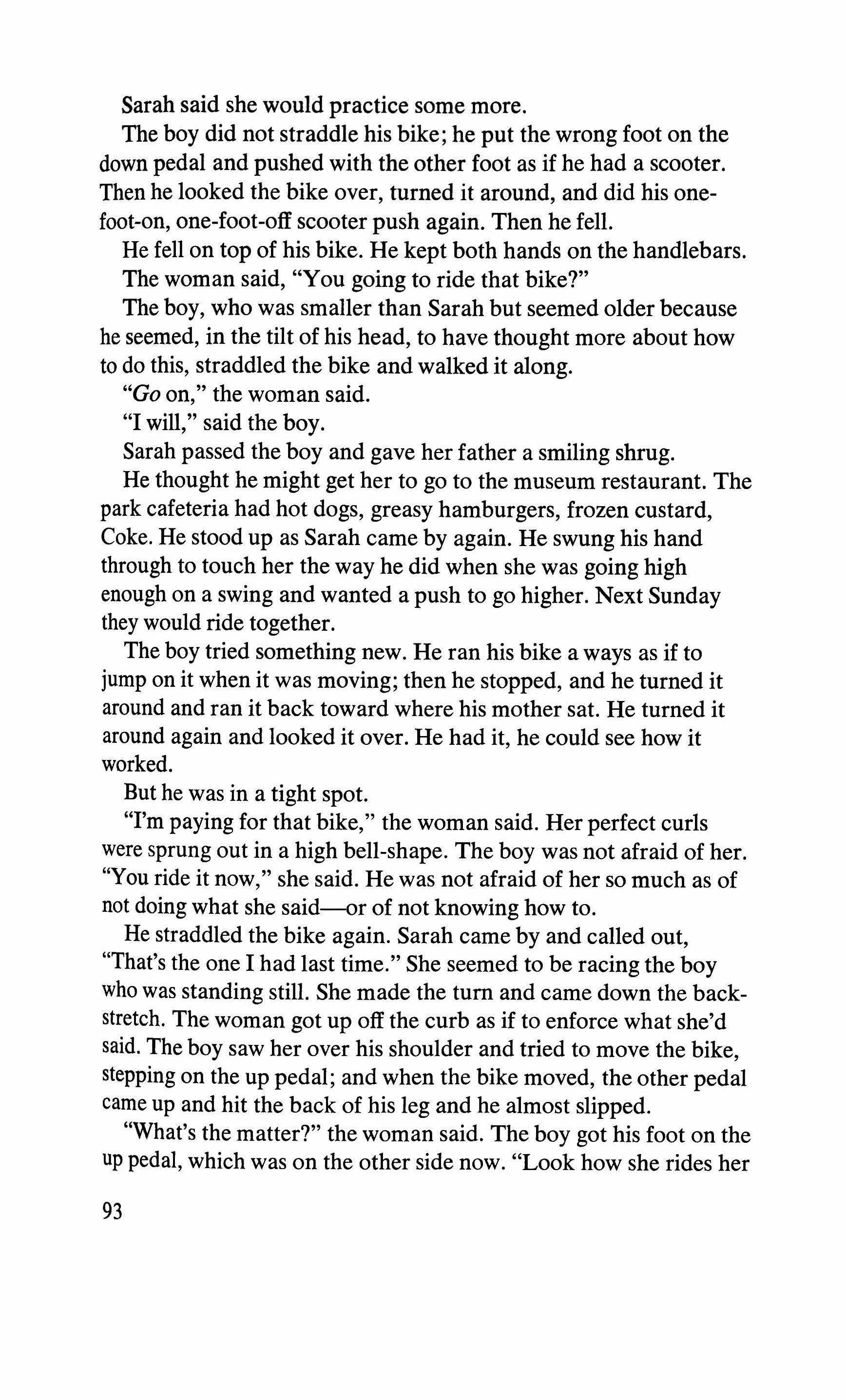
Sarah said she would practice some more.
The boy did not straddle his bike; he put the wrong foot on the down pedal and pushed with the other foot as if he had a scooter. Then he looked the bike over, turned it around, and did his onefoot-on, one-foot-off scooter push again. Then he fell.
He fell on top of his bike. He kept both hands on the handlebars.
The woman said, "You going to ride that bike?"
The boy, who was smaller than Sarah but seemed older because he seemed, in the tilt of his head, to have thought more about how to do this, straddled the bike and walked it along.
"Go on," the woman said.
"I will," said the boy.
Sarah passed the boy and gave her father a smiling shrug.
He thought he might get her to go to the museum restaurant. The park cafeteria had hot dogs, greasy hamburgers, frozen custard, Coke. He stood up as Sarah came by again. He swung his hand through to touch her the way he did when she was going high enough on a swing and wanted a push to go higher. Next Sunday they would ride together.
The boy tried something new. He ran his bike a ways as if to jump on it when it was moving; then he stopped, and he turned it around and ran it back toward where his mother sat. He turned it around again and looked it over. He had it, he could see how it worked.
But he was in a tight spot.
"I'm paying for that bike," the woman said. Her perfect curls were sprung out in a high bell-shape. The boy was not afraid of her. "You ride it now," she said. He was not afraid of her so much as of not doing what she said-or of not knowing how to.
He straddled the bike again. Sarah came by and called out, "That's the one 1 had last time." She seemed to be racing the boy who was standing still. She made the turn and came down the backstretch. The woman got up off the curb as if to enforce what she'd said. The boy saw her over his shoulder and tried to move the bike, stepping on the up pedal; and when the bike moved, the other pedal came up and hit the back of his leg and he almost slipped.
"What's the matter?" the woman said. The boy got his foot on the up pedal, which was on the other side now. "Look how she rides her
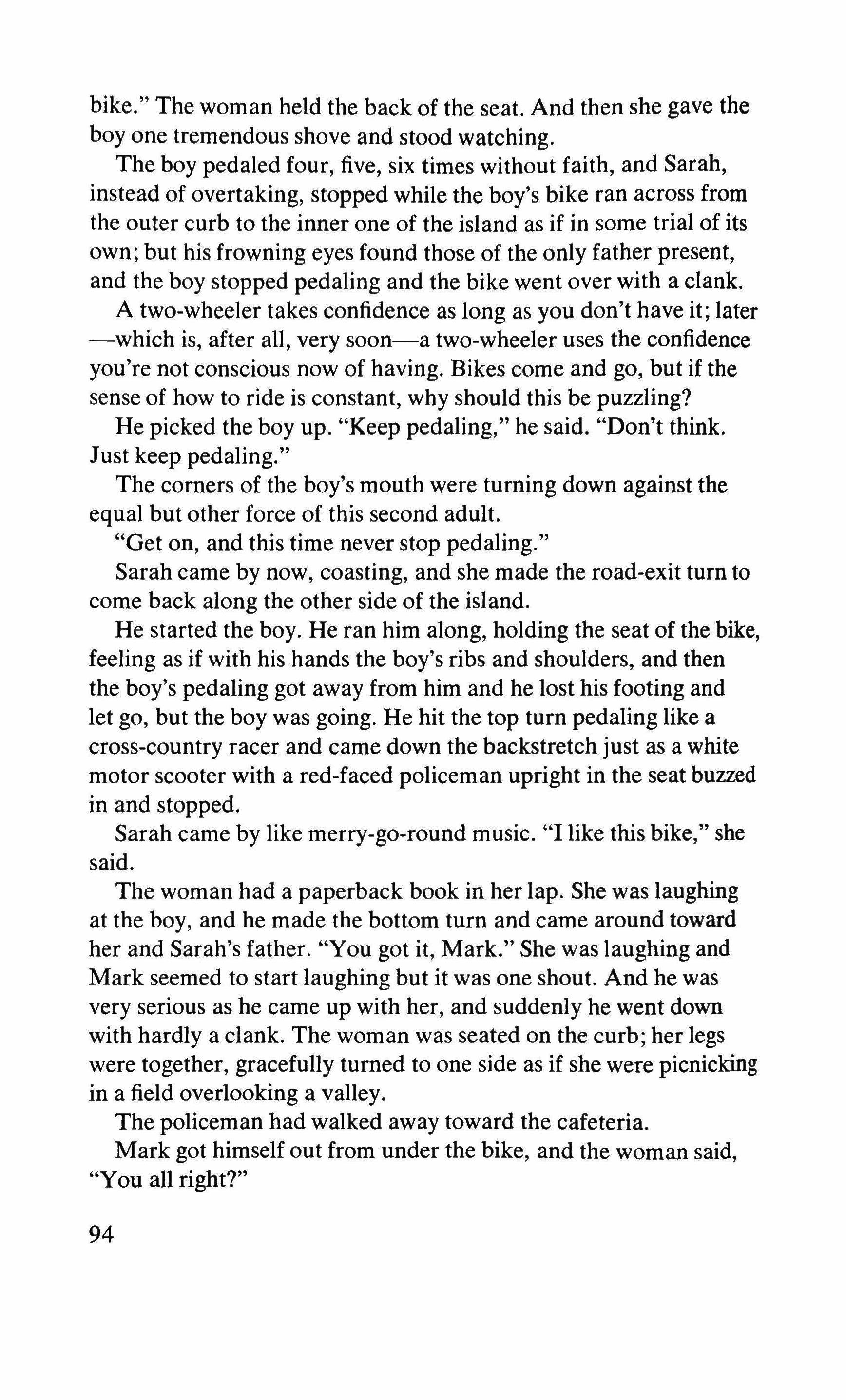
bike." The woman held the back of the seat. And then she gave the boy one tremendous shove and stood watching.
The boy pedaled four, five, six times without faith, and Sarah, instead of overtaking, stopped while the boy's bike ran across from the outer curb to the inner one of the island as if in some trial of its own; but his frowning eyes found those of the only father present, and the boy stopped pedaling and the bike went over with a clank.
A two-wheeler takes confidence as long as you don't have it; later -which is, after all, very soon-a two-wheeler uses the confidence you're not conscious now of having. Bikes come and go, but if the sense of how to ride is constant, why should this be puzzling?
He picked the boy up. "Keep pedaling," he said. "Don't think. Just keep pedaling."
The corners of the boy's mouth were turning down against the equal but other force of this second adult.
"Get on, and this time never stop pedaling."
Sarah came by now, coasting, and she made the road-exit turn to come back along the other side of the island.
He started the boy. He ran him along, holding the seat of the bike, feeling as if with his hands the boy's ribs and shoulders, and then the boy's pedaling got away from him and he lost his footing and let go, but the boy was going. He hit the top turn pedaling like a cross-country racer and came down the backstretch just as a white motor scooter with a red-faced policeman upright in the seat buzzed in and stopped.
Sarah came by like merry-go-round music. "I like this bike," she said.
The woman had a paperback book in her lap. She was laughing at the boy, and he made the bottom turn and came around toward her and Sarah's father. "You got it, Mark." She was laughing and Mark seemed to start laughing but it was one shout. And he was very serious as he came up with her, and suddenly he went down with hardly a clank. The woman was seated on the curb; her legs were together, gracefully turned to one side as if she were picnicking in a field overlooking a valley.
The policeman had walked away toward the cafeteria. Mark got himself out from under the bike, and the woman said, "You all right?"

He sniveled. There was nothing to say.
Seeing one adult coming and the other staying where she was, he watched to see what would happen next.
The woman put her book on the curb. "Don't pull that crybaby number. I'll slap your face." She got up and walked toward Mark. "You ain't going to get your real bike till you know how to ride this one. Now you get on that bike and ride it."
The other adult had stopped halfway, but he spoke to the woman: "Those rental bikes take a beating."
She had looked up as the words were said, and she had to answer. She shook her head. "At least they don't get ripped off."
"Theyprobably do."
She told Mark to get on his bike-did he expect to learn?
Then Mark said, just loud enough to be heard, "My Daddy's going to buy me my real bike," and the woman slapped him on the cheek as he was getting his leg over the saddle. She put her hands on her hips. Mark's trousers were torn. She got her palm on the back of the bike seat, and this time she gave Mark a running push and held on for a few steps, but she didn't want to play in front of Sarah's father, or so he thought, and she let go and stood leaning on one hip.
Mark veered over into Sarah's bike and fell.
"See what you did," said the woman.
"That's OK, let me give him a push."
This time Mark got going. She went back to where her book was and seemed to look only when Mark came around the bottom turn and pedaled past her to the top tum. Sarah rode after him.
"Stop pedaling and coast," she heard her father call to the boy.
The woman looked up at the words-not toward him but toward Mark, who was pedaling faster to keep up with the bike.
"Stop pedaling and coast."
"Like this," called Sarah.
The boy was staying in front of her and on the turn nearly went over into the pedestrian path where some people were passing with a transistor.
What book was the mother reading? She would be just as well dressed on the subway in the morning. She wasn't comfortable with the book, but it wasn't the book; it was how time that she was spend-
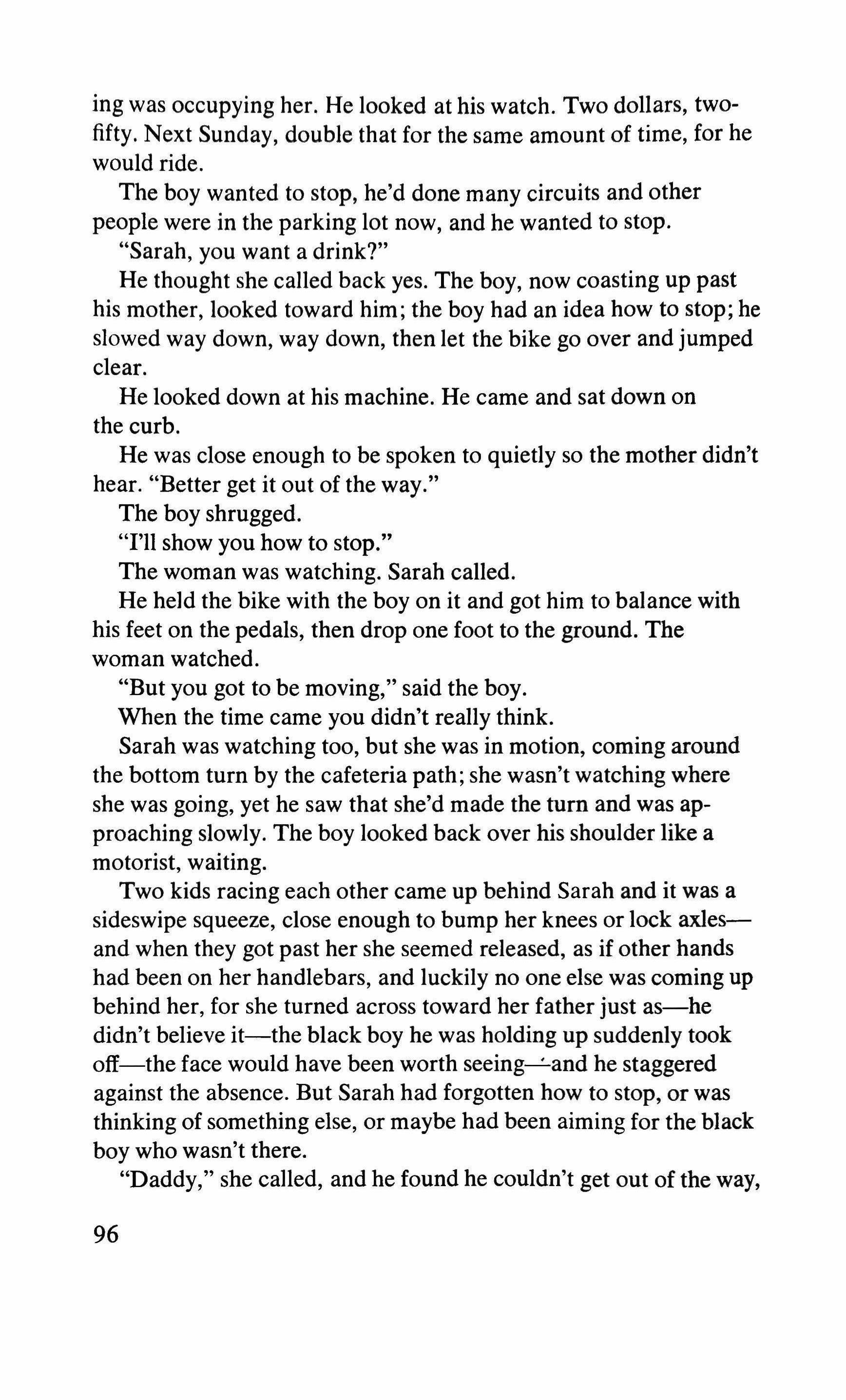
ing was occupying her. He looked at his watch. Two dollars, twofifty. Next Sunday, double that for the same amount of time, for he would ride.
The boy wanted to stop, he'd done many circuits and other people were in the parking lot now, and he wanted to stop.
"Sarah, you want a drink?"
He thought she called back yes. The boy, now coasting up past his mother, looked toward him; the boy had an idea how to stop; he slowed way down, way down, then let the bike go over and jumped clear.
He looked down at his machine. He came and sat down on the curb.
He was close enough to be spoken to quietly so the mother didn't hear. "Better get it out of the way."
The boy shrugged.
"I'll show you how to stop."
The woman was watching. Sarah called.
He held the bike with the boy on it and got him to balance with his feet on the pedals, then drop one foot to the ground. The woman watched.
"But you got to be moving," said the boy.
When the time came you didn't really think.
Sarah was watching too, but she was in motion, coming around the bottom turn by the cafeteria path; she wasn't watching where she was going, yet he saw that she'd made the turn and was approaching slowly. The boy looked back over his shoulder like a motorist, waiting.
Two kids racing each other came up behind Sarah and it was a sideswipe squeeze, close enough to bump her knees or lock axlesand when they got past her she seemed released, as if other hands had been on her handlebars, and luckily no one else was coming up behind her, for she turned across toward her father just as-he didn't believe it-the black boy he was holding up suddenly took off-the face would have been worth seeing-'and he staggered against the absence. But Sarah had forgotten how to stop, or was thinking of something else, or maybe had been aiming for the black boy who wasn't there.
"Daddy," she caned, and he found he couldn't get out of the way,

and they would both have fallen if he hadn't braced himself and caught her head-on by the handlebars.
She got off the bike. He was holding it.
She showed him where the wheel rubbed against the fender. She wanted something to drink.
She asked if they could go on the road next time. He said sure, if she thought she was ready. She asked when she could ride one of the bikes with thin tires. He said those bikes were too big; she said no; he said they had hand brakes.
Maybe, she said (making a joke), they would just go on renting a different bike every week.
The thought consumed him. All those bikes. A chain of bikes. The round-trip to the park. The city's endless claim. But Sarah's childhood was not endless.
But which was the thought that consumed him?
Sarah's mother, whose apartment was ten blocks closer to the park, would say-he knew what she would say-Be a hero, if you want to shell out the money; but why buy her a bike now?
Well, he wanted the kid to have her own bike. But she would soon outgrow it, wherever it was at this moment. Well, what was money? It had a claim on him to be used and not to go unused. It took time to use, but not much time to spend. He loved this little girl so much that some of the tedium was interest on his fears for her. These rental bikes had no reflectors, apparently. His Raleigh had three red, two orange. He saw himself lifting the wheels out of the frame, holding the chain off the rear wheel's gears, flagging cabs until he got one to stop, disembarking uptown, fixing his wheels back in, and renting a bike for Sarah.
Money was time-or had used to be, when there was money, before money had disappeared into an expanding cloud whose only bearable promise was that money might vanish not just into weekends but into barter. Children with their shirts off were up on a high rock yelling and whooping. Well, if time was money, time spent thinking without success about how to avoid wasting money was money wasted. The thought was worth something. A medium of exchange. But hold on-the black woman had stood up to stretchher head went one way, her hips the other-if wealth was a claim on someone else's labor, what was he able to claim here but some-
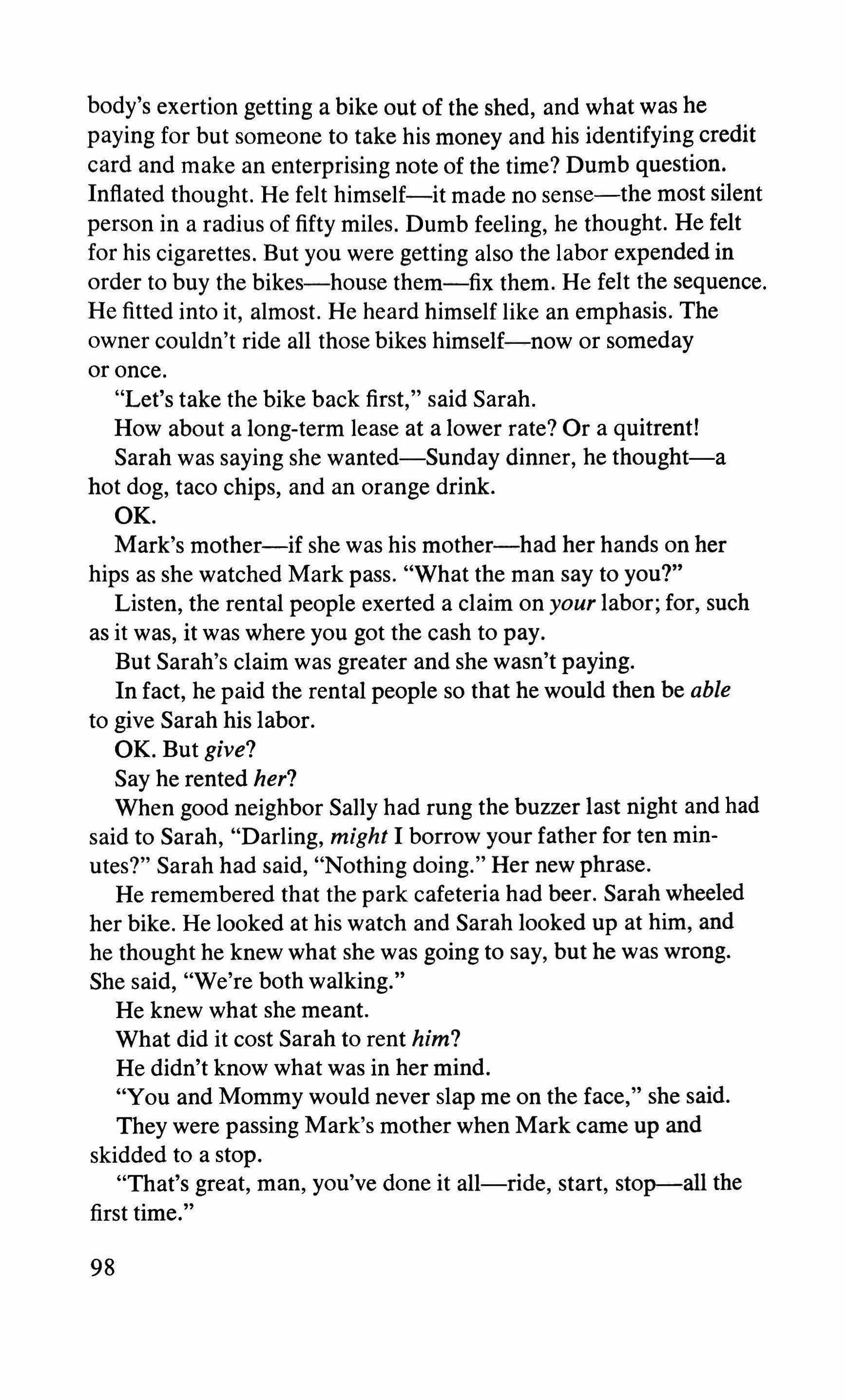
body's exertion getting a bike out of the shed, and what was he paying for but someone to take his money and his identifying credit card and make an enterprising note of the time? Dumb question. Inflated thought. He felt himself-it made no sense-the most silent person in a radius of fifty miles. Dumb feeling, he thought. He felt for his cigarettes. But you were getting also the labor expended in order to buy the bikes-house them-fix them. He felt the sequence. He fitted into it, almost. He heard himself like an emphasis. The owner couldn't ride all those bikes himself-now or someday or once.
"Let's take the bike back first," said Sarah.
How about a long-term lease at a lower rate? Or a quitrent!
Sarah was saying she wanted-Sunday dinner, he thought-a hot dog, taco chips, and an orange drink.
OK.
Mark's mother-if she was his mother-had her hands on her hips as she watched Mark pass. "What the man say to you?"
Listen, the rental people exerted a claim on your labor; for, such as it was, it was where you got the cash to pay.
But Sarah's claim was greater and she wasn't paying.
In fact, he paid the rental people so that he would then be able to give Sarah his labor.
OK. But give?
Say he rented her?
When good neighbor Sally had rung the buzzer last night and had said to Sarah, "Darling, might I borrow your father for ten minutes?" Sarah had said, "Nothing doing." Her new phrase.
He remembered that the park cafeteria had beer. Sarah wheeled her bike. He looked at his watch and Sarah looked up at him, and he thought he knew what she was going to say, but he was wrong. She said, "We're both walking."
He knew what she meant.
What did it cost Sarah to rent him?
He didn't know what was in her mind.
"You and Mommy would never slap me on the face," she said. They were passing Mark's mother when Mark came up and skidded to a stop.
"That's great, man, you've done it all-ride, start, stop-all the first time."
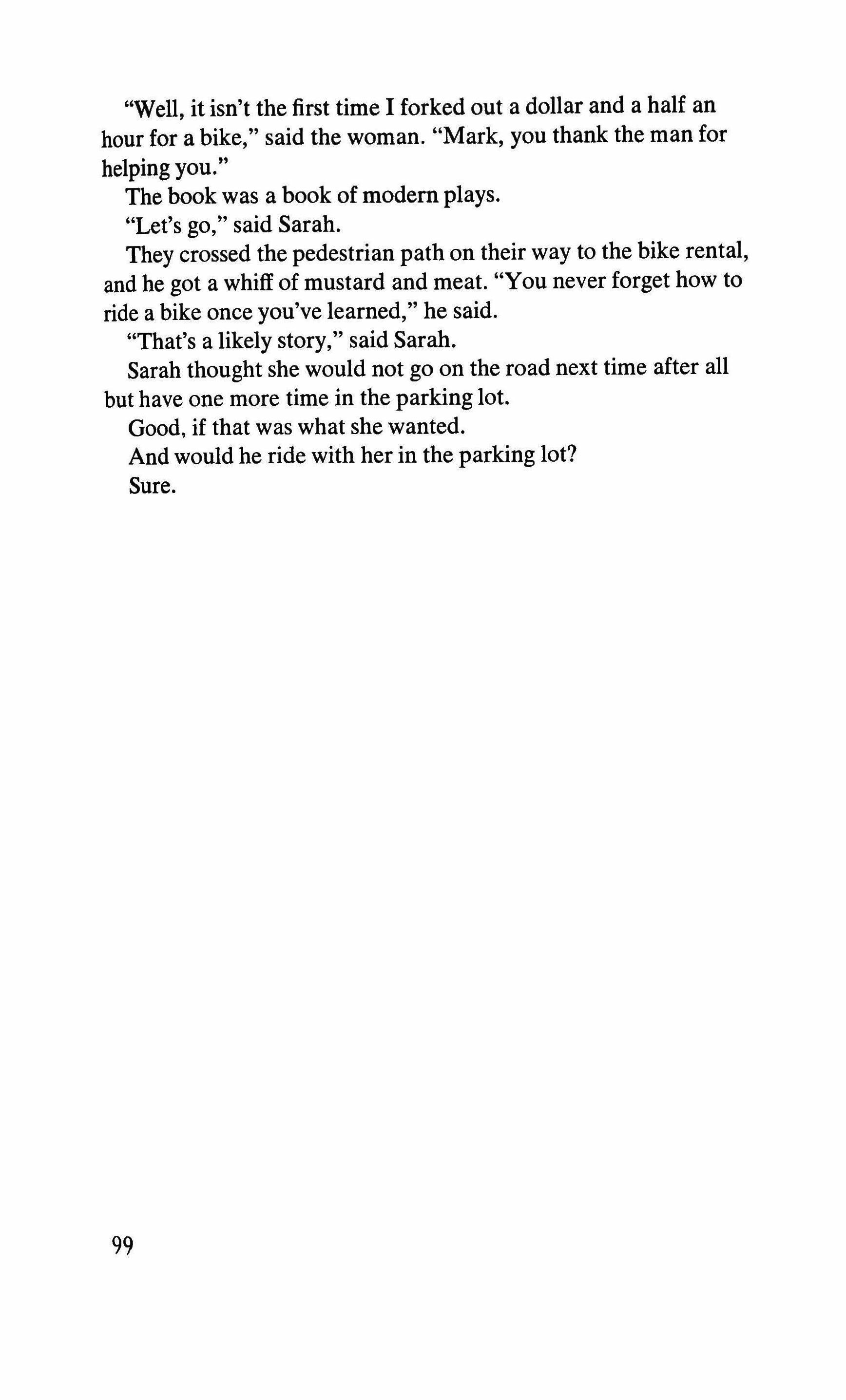
"Well, it isn't the first time I forked out a dollar and a half an hour for a bike," said the woman. "Mark, you thank the man for helpingyou."
The book was a book of modem plays.
"Let's go," said Sarah.
They crossed the pedestrian path on their way to the bike rental, and he got a whiff of mustard and meat. "You never forget how to ride a bike once you've learned," he said.
"That's a likely story," said Sarah.
Sarah thought she would not go on the road next time after all but have one more time in the parking lot.
Good, if that was what she wanted.
And would he ride with her in the parking lot?
Sure.
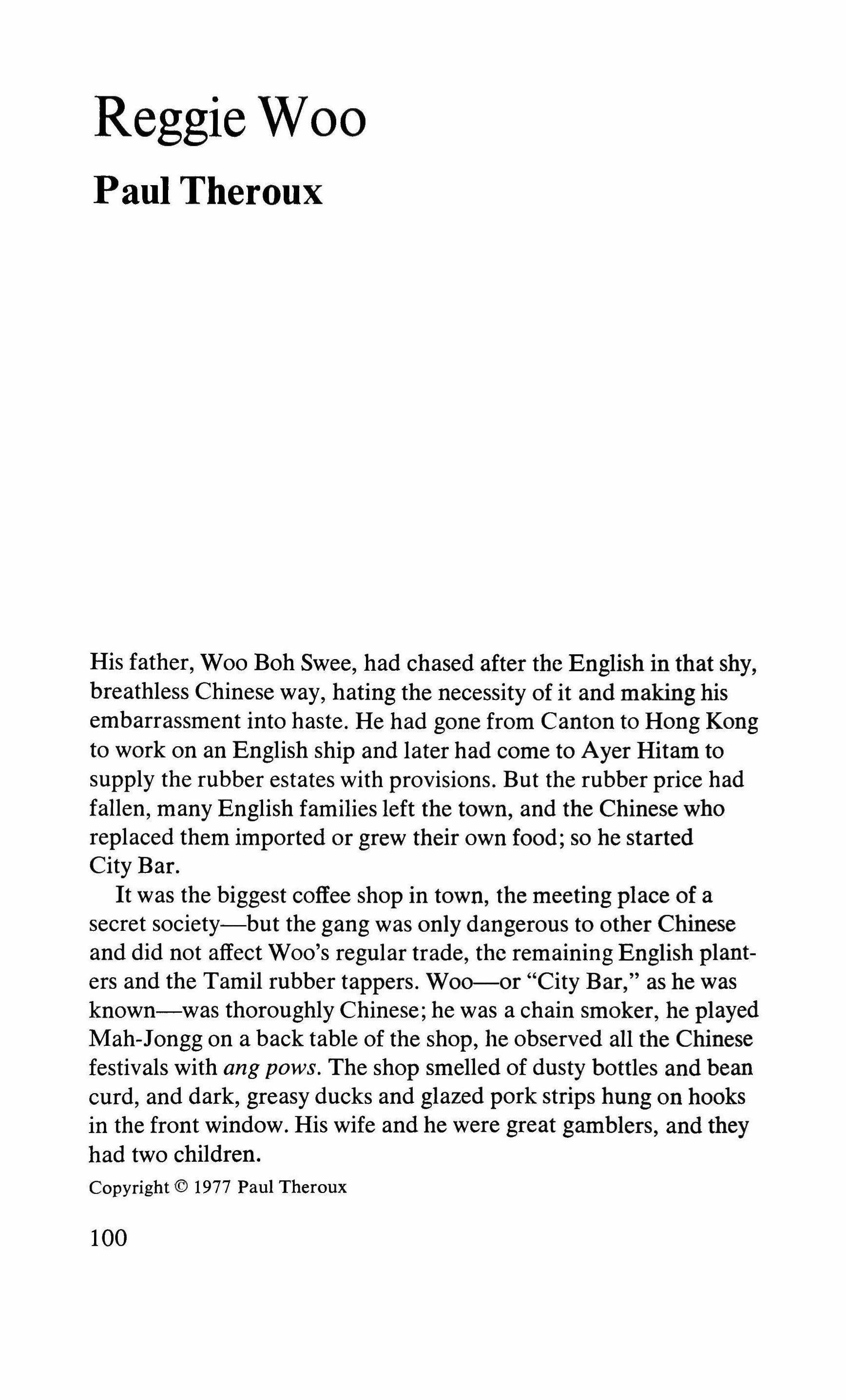
His father, Woo Boh Swee, had chased after the English in that shy, breathless Chinese way, hating the necessity of it and making his embarrassment into haste. He had gone from Canton to Hong Kong to work on an English ship and later had come to Ayer Hitam to supply the rubber estates with provisions. But the rubber price had fallen, many English families left the town, and the Chinese who replaced them imported or grew their own food; so he started City Bar.
It was the biggest coffee shop in town, the meeting place of a secret society-but the gang was only dangerous to other Chinese and did not affect Woo's regular trade, the remaining English planters and the Tamil rubber tappers. Woo-or "City Bar," as he was known-was thoroughly Chinese; he was a chain smoker, he played Mah-Jongg on a back table of the shop, he observed all the Chinese festivals with ang paws. The shop smelled of dusty bottles and bean curd, and dark, greasy ducks and glazed pork strips hung on hooks in the front window. His wife and he were great gamblers, and they had two children.
Copyright © 1977 Paul Theroux
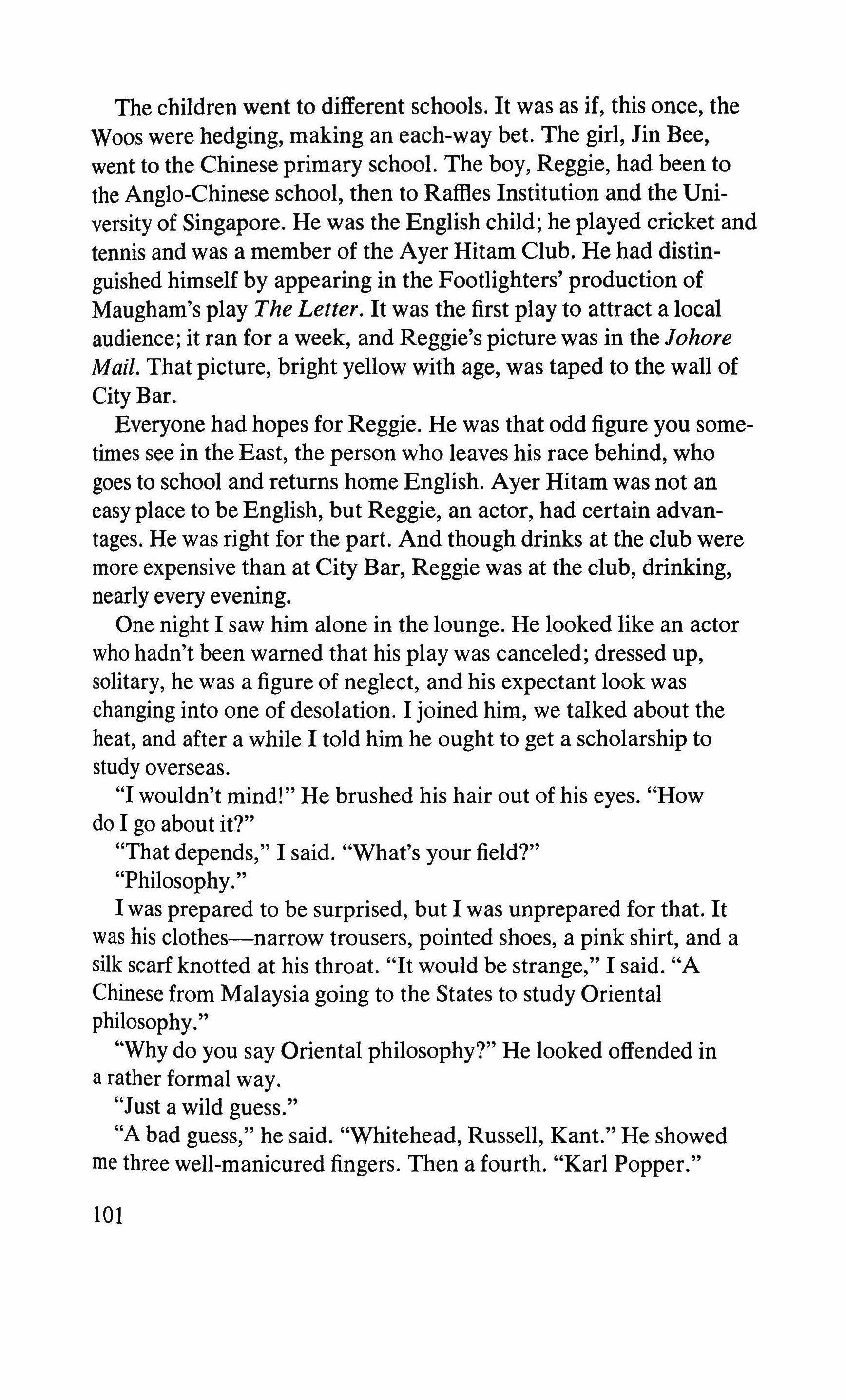
The children went to different schools. It was as if, this once, the Woos were hedging, making an each-way bet. The girl, Jin Bee, went to the Chinese primary school. The boy, Reggie, had been to the Anglo-Chinese school, then to Raffles Institution and the University of Singapore. He was the English child; he played cricket and tennis and was a member of the Ayer Hitam Club. He had distinguished himself by appearing in the Footlighters' production of Maugham's play The Letter. It was the first play to attract a local audience; it ran for a week, and Reggie's picture was in the lohore Mail. That picture, bright yellow with age, was taped to the wall of City Bar.
Everyone had hopes for Reggie. He was that odd figure you sometimes see in the East, the person who leaves his race behind, who goes to school and returns home English. Ayer Hitam was not an easy place to be English, but Reggie, an actor, had certain advantages. He was right for the part. And though drinks at the club were more expensive than at City Bar, Reggie was at the club, drinking, nearly every evening.
One night I saw him alone in the lounge. He looked like an actor who hadn't been warned that his play was canceled; dressed up, solitary, he was a figure of neglect, and his expectant look was changing into one of desolation. I joined him, we talked about the heat, and after a while I told him he ought to get a scholarship to study overseas.
"I wouldn't mind!" He brushed his hair out of his eyes. "How do I go about it?"
"That depends," I said. "What's your field?"
"Philosophy.
I was prepared to be surprised, but I was unprepared for that. It was his clothes-narrow trousers, pointed shoes, a pink shirt, and a silk scarf knotted at his throat. "It would be strange," I said. "A Chinese from Malaysia going to the States to study Oriental philosophy."
"Why do you say Oriental philosophy?" He looked offended in a rather formal way.
"Just a wild guess."
"A bad guess," he said. "Whitehead, Russell, Kant." He showed me three well-manicured fingers. Then a fourth. "Karl Popper."

"You're interested in them, are you?"
"I studied them," he said. "I wrote on the mind-body problem."
"I'll see what I can do."
The Fulbright forms had to come from Kuala Lumpur, so it was a week before I looked for him again, and when I looked he wasn't there-not at the club and not at City Bar. "In Singapore," his father said. "Got business."
There were eight or ten people at the club the night Reggie came back. I noticed they were all Footlighters. I waited until they left him-they had been gathered around him, talking loudly-and then I told him I had the forms.
"Something's come up," he said. He grinned. "I'm going to be in a film. That's why I was in Singapore. Auditioning. And I got the part-lah."
"Congratulations," I said. "What film is it?"
"Man's Fate," he said. "I'm playing Ch'en. I've always adored Malraux and I love acting. Now I can draw on my philosophy background as well. So you see, it's perfect."
"What does your father think about it?"
"It's a job-he's keen," said Reggie. "It's my big chance, and it could lead to bigger parts."
"Hollywood," I said.
He smiled. "I would never go to Hollywood. False life, no sense of values. I plan to make London my base, but if the money was good I might go to the States for a few weeks at a time."
"When are they going to make Man's Fate?"
"Shooting starts in Singapore in a month's time."
And the way he said "shooting" convinced me that the Fulbright forms would never be used.
After that I heard a lot about Reggie at the club. Ladysmith, the English teacher, said, "City Bar's son's done all right for himself," and Reggie was always in sight, in new clothes, declining drinks. Squibb said, "These things never come off," and some people referred to Reggie as "that fruit." But most were pleased. The Footlighters said, "I can say I knew you when," and cautioned him about the small print in contracts, and when they filed in at dusk for the first drink they greeted him with, "How's our film star?"
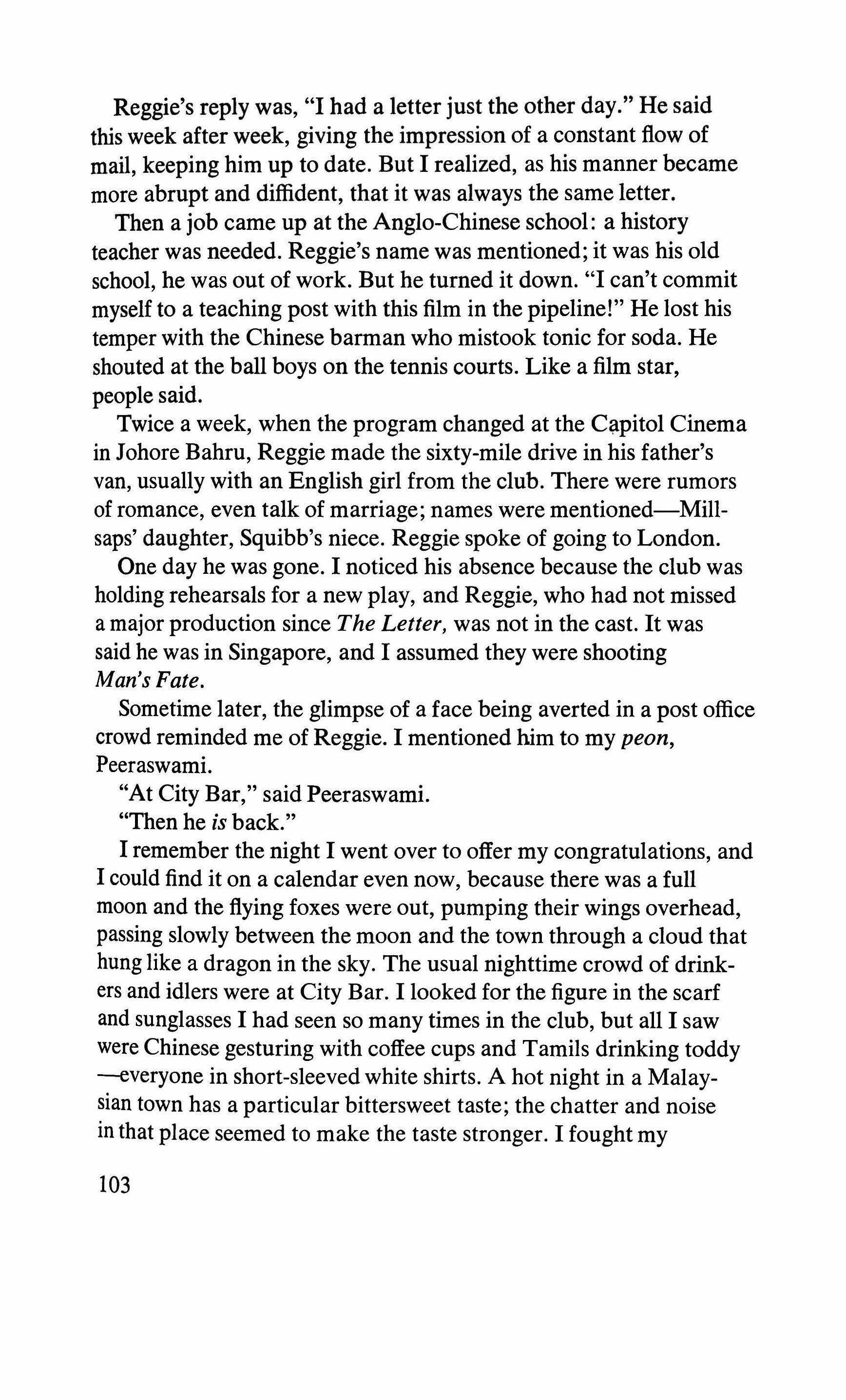
Reggie's reply was, "I had a letter just the other day." He said this week after week, giving the impression of a constant flow of mail, keeping him up to date. But I realized, as his manner became more abrupt and diffident, that it was always the same letter.
Then a job came up at the Anglo-Chinese school: a history teacher was needed. Reggie's name was mentioned; it was his old school, he was out of work. But he turned it down. "I can't commit myself to a teaching post with this film in the pipeline!" He lost his temper with the Chinese barman who mistook tonic for soda. He shouted at the ball boys on the tennis courts. Like a film star, people said.
Twice a week, when the program changed at the Capitol Cinema in Johore Bahru, Reggie made the sixty-mile drive in his father's van, usually with an English girl from the club. There were rumors of romance, even talk of marriage; names were mentioned-Millsaps' daughter, Squibb's niece. Reggie spoke of going to London.
One day he was gone. I noticed his absence because the club was holding rehearsals for a new play, and Reggie, who had not missed a major production since The Letter, was not in the cast. It was said he was in Singapore, and I assumed they were shooting Man's Fate.
Sometime later, the glimpse of a face being averted in a post office crowd reminded me of Reggie. I mentioned him to my peon, Peeraswami.
"At City Bar," said Peeraswami.
"Then he is back."
I remember the night I went over to offer my congratulations, and I could find it on a calendar even now, because there was a full moon and the flying foxes were out, pumping their wings overhead, passing slowly between the moon and the town through a cloud that hung like a dragon in the sky. The usual nighttime crowd of drinkers and idlers were at City Bar. I looked for the figure in the scarf and sunglasses I had seen so many times in the club, but all I saw were Chinese gesturing with coffee cups and Tamils drinking toddy -everyone in short-sleeved white shirts. A hot night in a Malaysian town has a particular bittersweet taste; the chatter and noise in that place seemed to make the taste stronger. I fought my
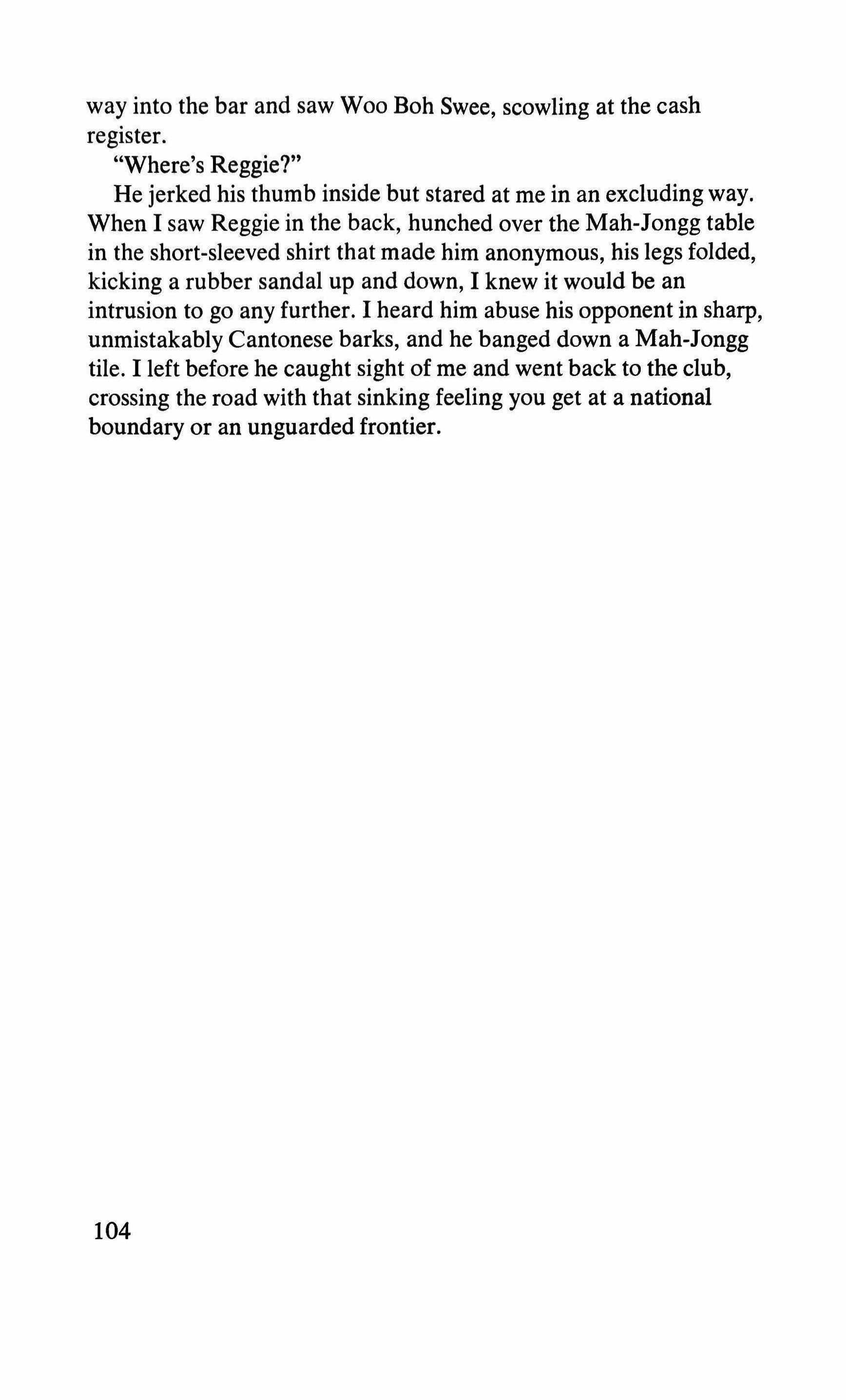
way into the bar and saw Woo Boh Swee, scowling at the cash register.
He jerked his thumb inside but stared at me in an excluding way. When I saw Reggie in the back, hunched over the Mah-Jongg table in the short-sleeved shirt that made him anonymous, his legs folded, kicking a rubber sandal up and down, I knew it would be an intrusion to go any further. I heard him abuse his opponent in sharp, unmistakably Cantonese barks, and he banged down a Mah-Jongg tile. I left before he caught sight of me and went back to the club, crossing the road with that sinking feeling you get at a national boundary or an unguarded frontier.
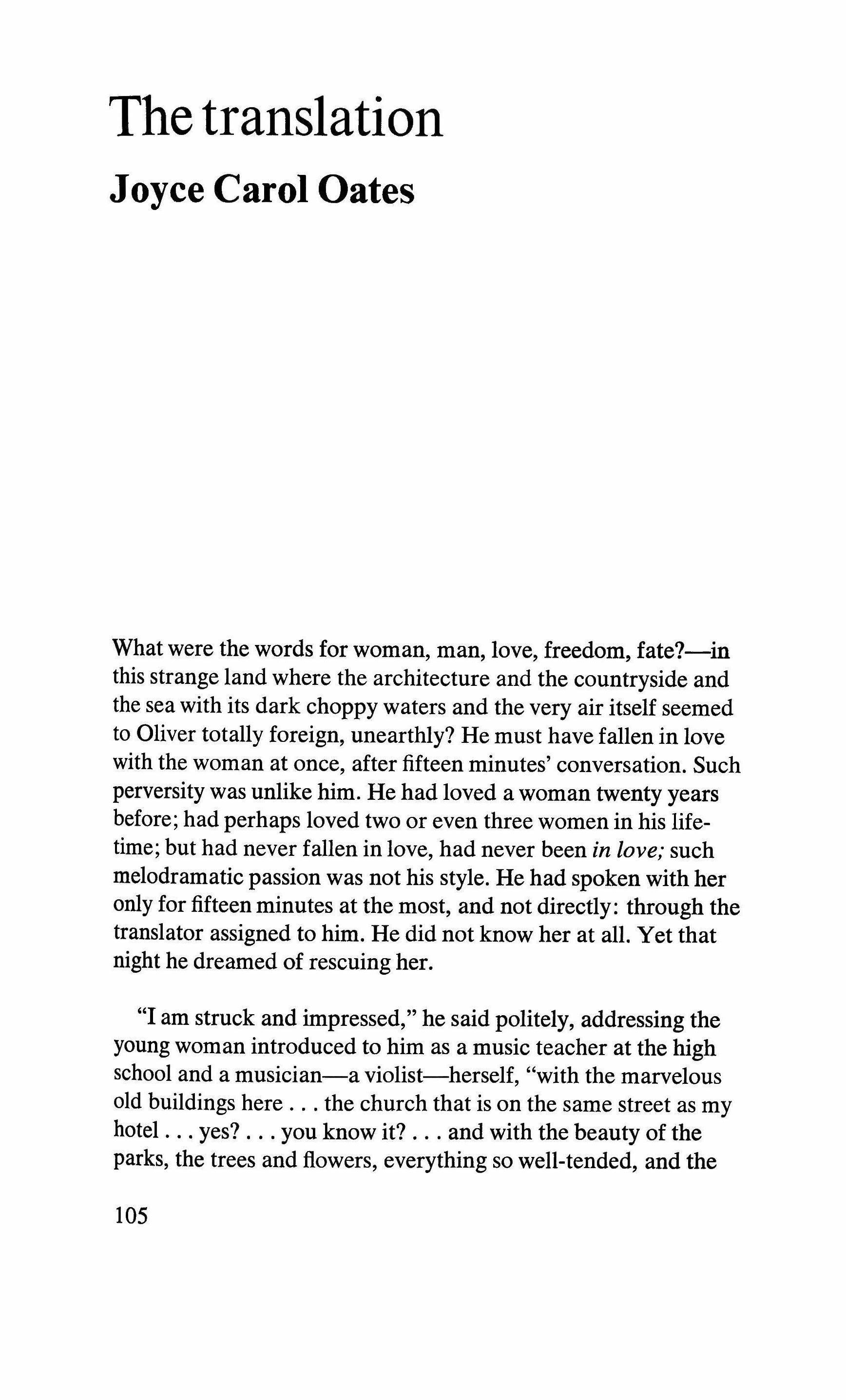
What were the words for woman, man, love, freedom, fate?-in this strange land where the architecture and the countryside and the sea with its dark choppy waters and the very air itself seemed to Oliver totally foreign, unearthly? He must have fallen in love with the woman at once, after fifteen minutes' conversation. Such perversity was unlike him. He had loved a woman twenty years before; had perhaps loved two or even three women in his lifetime; but had never fallen in love, had never been in love; such melodramatic passion was not his style. He had spoken with her only for fifteen minutes at the most, and not directly: through the translator assigned to him. He did not know her at all. Yet that night he dreamed of rescuing her.
"1 am struck and impressed," he said politely, addressing the young woman introduced to him as a music teacher at the high school and a musician-a violist-herself, "with the marvelous old buildings here the church that is on the same street as my hotel yes? you know it? and with the beauty of the parks, the trees and flowers, everything so well-tended, and the
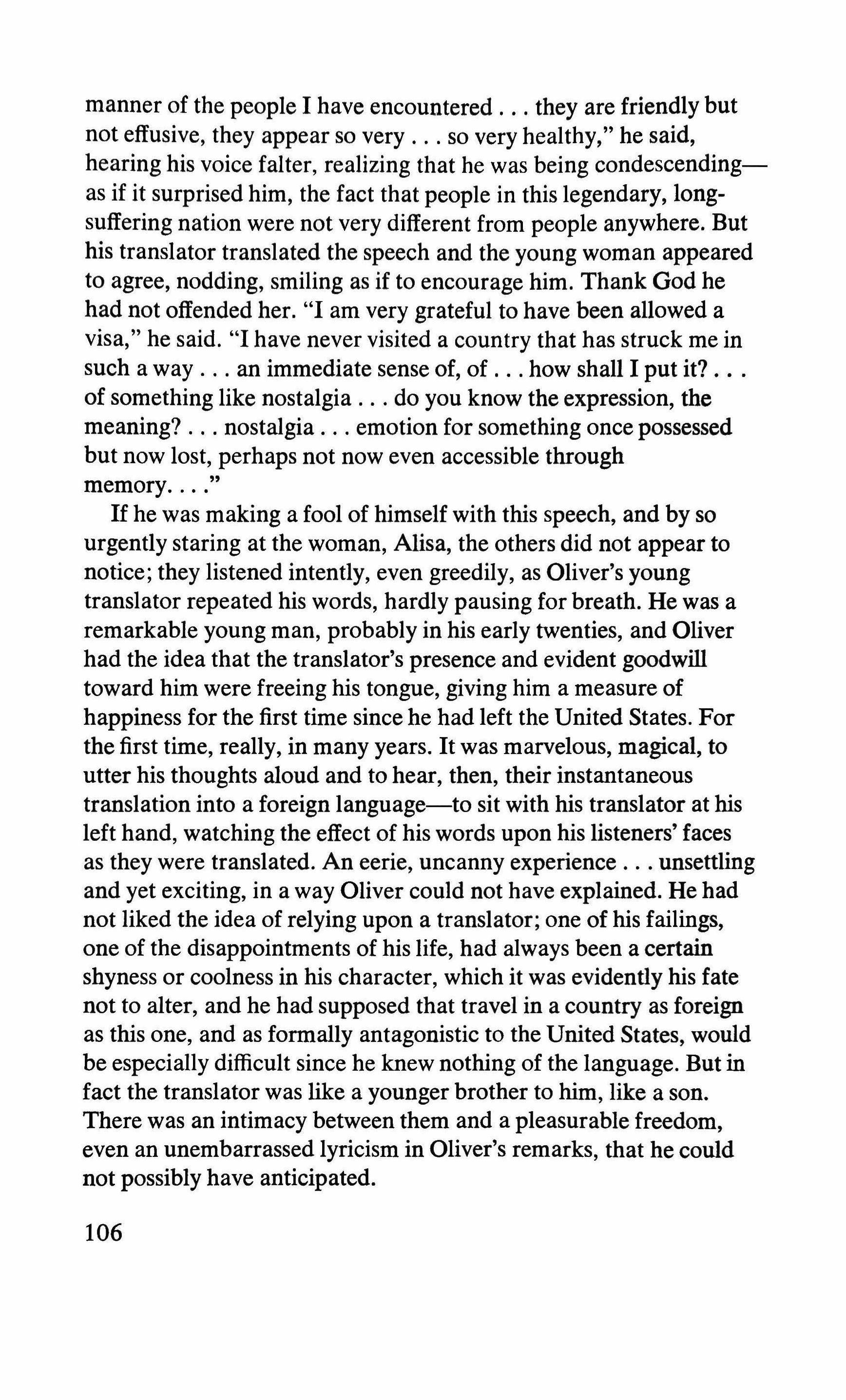
manner of the people I have encountered they are friendly but not effusive, they appear so very so very healthy," he said, hearing his voice falter, realizing that he was being condescendingas if it surprised him, the fact that people in this legendary, longsuffering nation were not very different from people anywhere. But his translator translated the speech and the young woman appeared to agree, nodding, smiling as if to encourage him. Thank God he had not offended her. "I am very grateful to have been allowed a visa," he said. "I have never visited a country that has struck me in such a way an immediate sense of, of how shall I put it? of something like nostalgia do you know the expression, the meaning? nostalgia emotion for something once possessed but now lost, perhaps not now even accessible through memory "
If he was making a fool of himself with this speech, and by so urgently staring at the woman, Alisa, the others did not appear to notice; they listened intently, even greedily, as Oliver's young translator repeated his words, hardly pausing for breath. He was a remarkable young man, probably in his early twenties, and Oliver had the idea that the translator's presence and evident goodwill toward him were freeing his tongue, giving him a measure of happiness for the first time since he had left the United States. For the first time, really, in many years. It was marvelous, magical, to utter his thoughts aloud and to hear, then, their instantaneous translation into a foreign language-to sit with his translator at his left hand, watching the effect of his words upon his listeners' faces as they were translated. An eerie, uncanny experience unsettling and yet exciting, in a way Oliver could not have explained. He had not liked the idea of relying upon a translator; one of his failings, one of the disappointments of his life, had always been a certain shyness or coolness in his character, which it was evidently his fate not to alter, and he had supposed that travel in a country as foreign as this one, and as formally antagonistic to the United States, would be especially difficult since he knew nothing of the language. But in fact the translator was like a younger brother to him, like a son. There was an intimacy between them and a pleasurable freedom, even an unembarrassed lyricism in Oliver's remarks, that he could not possibly have anticipated.

Of course his mood was partly attributable to the cognac, and to the close, crowded, overheated room in which the reception was being held, and to his immediate attraction for the dusky-haired, solemn young woman with the name he could not pronounce-sAlisa was as close as he could come to it; he would have to ask the translator to write it out for him when they returned to the hotel. It would not last, his mood of gaiety. But for the present moment he was very happy merely to hear these people speak their language, a melodic play of explosive consonants and throaty vowels; it hardly mattered that his translator could manage to translate only a fraction of what was being said. He was happy, almost euphoric. He was intoxicated. He had to restrain himself from taking one of Alisa's delicate hands in his own and squeezing it, to show how taken he was by her. I know you are suffering in this prison state of yours, he wanted to whisper to her, and I want, I want to do something for you want to rescue you, save you, change your life
The director of the Lexicographic Institute was asking him a courteous, convoluted question about the current state of culture in his own nation, and everyone listened, frowning, as if with anxiety, while, with one part of his mind, Oliver made several statements. His translator took them up at once, transformed them into those eerie, exquisite sounds; the director nodded gravely, emphatically; the others nodded; it seemed to be about what they had anticipated. One of the men, white-haired, diminutive.tasked something in a quavering voice, and Oliver's translator hesitated before repeating it. "Dr. Crlejevec is curious to know-is it true that your visual artists have become artists merely of the void-that is, of deaththat they are exclusively morbid, that they have turned their backs on life?" The translator blushed, not quite meeting Oliver's gaze, as if he were embarrassed by the question. But the question did not annoy Oliver. Not in the least. He disliked much of contemporary art anyway and welcomed the opportunity to express his feelings, warmly, knowing that what he said would endear him to these people. It pleased him most of all that Alisa listened so closely. Her long, nervous fingers toyed with a cameo brooch she wore at her throat; her gray eyes were fixed upon his face. "Art moves in a certain tendril-like manner in many directions, though at a single point in history one direction is usually stressed and ac-
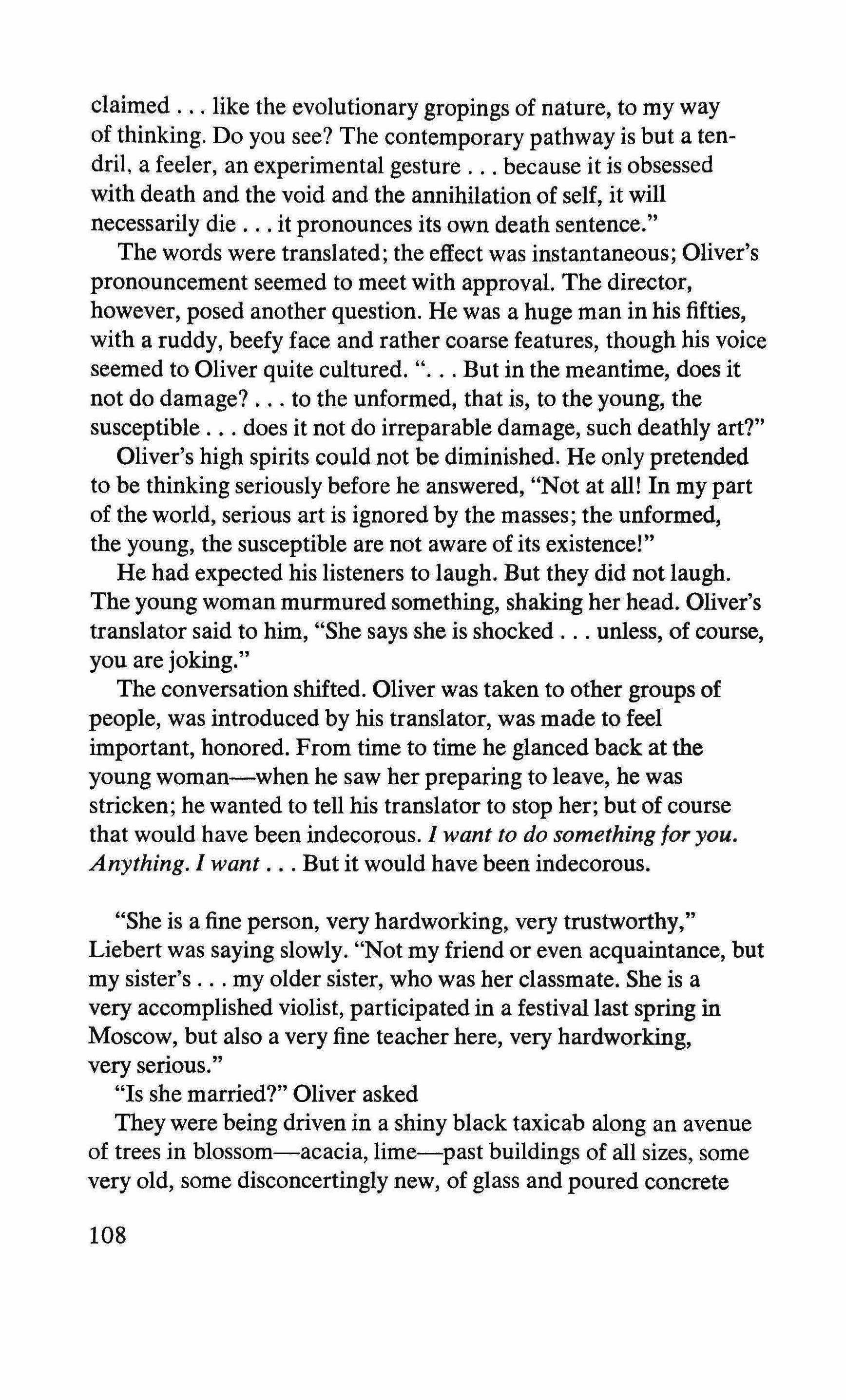
claimed like the evolutionary gropings of nature, to my way of thinking. Do you see? The contemporary pathway is but a tendril, a feeler, an experimental gesture because it is obsessed with death and the void and the annihilation of self, it will necessarily die it pronounces its own death sentence."
The words were translated; the effect was instantaneous; Oliver's pronouncement seemed to meet with approval. The director, however, posed another question. He was a huge man in his fifties, with a ruddy, beefy face and rather coarse features, though his voice seemed to Oliver quite cultured. But in the meantime, does it not do damage? to the unformed, that is, to the young, the susceptible does it not do irreparable damage, such deathly art?"
Oliver's high spirits could not be diminished. He only pretended to be thinking seriously before he answered, "Not at all! In my part of the world, serious art is ignored by the masses; the unformed, the young, the susceptible are not aware of its existence!"
He had expected his listeners to laugh. But they did not laugh. The young woman murmured something, shaking her head. Oliver's translator said to him, "She says she is shocked unless, of course, you are joking."
The conversation shifted. Oliver was taken to other groups of people, was introduced by his translator, was made to feel important, honored. From time to time he glanced back at the young woman-when he saw her preparing to leave, he was stricken; he wanted to tell his translator to stop her; but of course that would have been indecorous. I want to do something for you. Anything. I want But it would have been indecorous.
"She is a fine person, very hardworking, very trustworthy," Liebert was saying slowly. "Not my friend or even acquaintance, but my sister's my older sister, who was her classmate. She is a very accomplished violist, participated in a festival last spring in Moscow, but also a very fine teacher here, very hardworking, very serious."
"Is she married?" Oliver asked
They were being driven in a shiny black taxicab along an avenue of trees in blossom-acacia, lime-past buildings of all sizes, some very old, some disconcertingly new, of glass and poured concrete
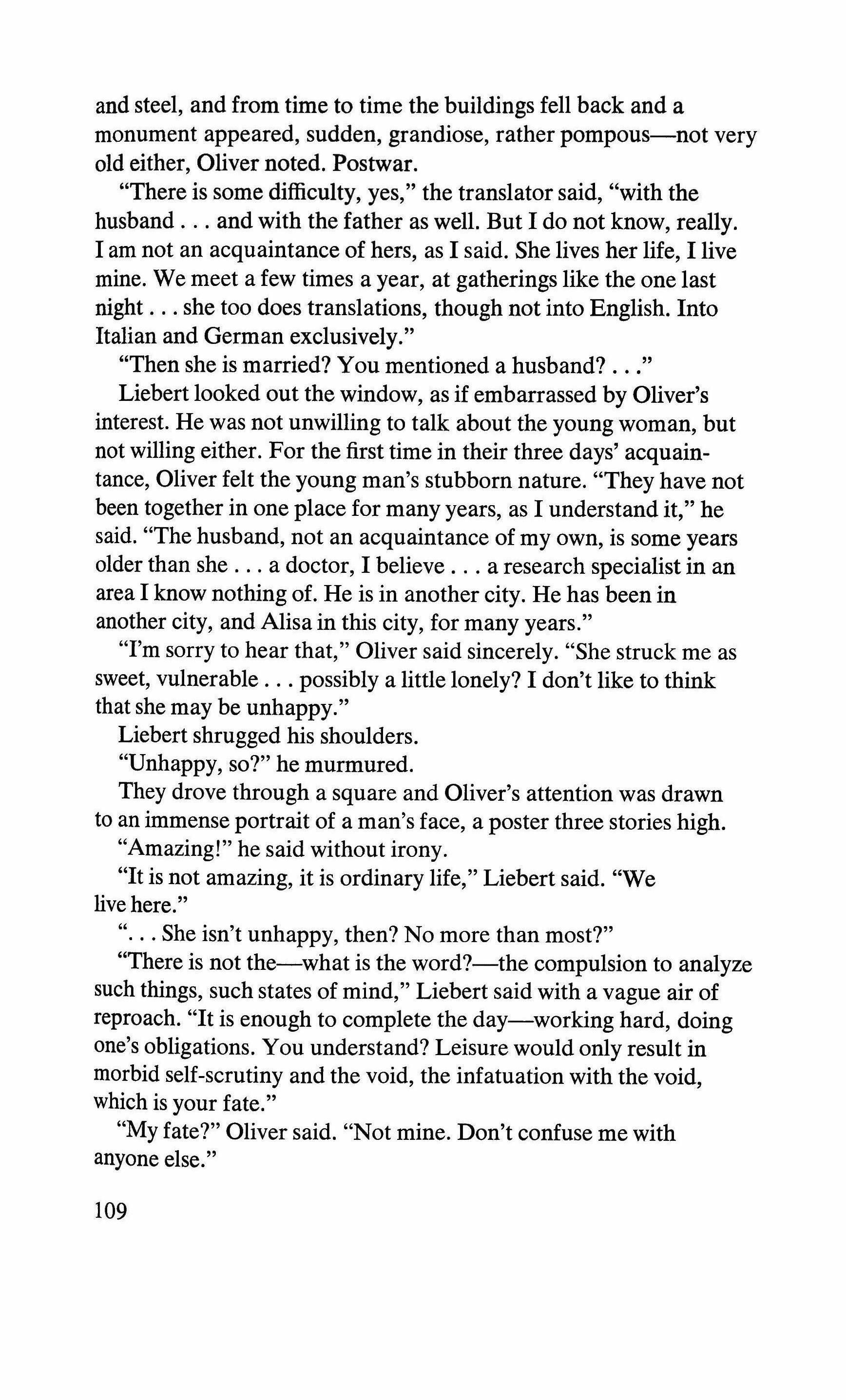
and steel, and from time to time the buildings fell back and a monument appeared, sudden, grandiose, rather pompous-not very old either, Oliver noted. Postwar.
"There is some difficulty, yes," the translator said, "with the husband and with the father as well. But I do not know, really. I am not an acquaintance of hers, as I said. She lives her life, I live mine. We meet a few times a year, at gatherings like the one last night she too does translations, though not into English. Into Italian and German exclusively."
"Then she is married? You mentioned a husband?
Liebert looked out the window, as if embarrassed by Oliver's interest. He was not unwilling to talk about the young woman, but not willing either. For the first time in their three days' acquaintance, Oliver felt the young man's stubborn nature. "They have not been together in one place for many years, as I understand it," he said. "The husband, not an acquaintance of my own, is some years older than she a doctor, I believe a research specialist in an area I know nothing of. He is in another city. He has been in another city, and Alisa in this city, for many years."
"I'm sorry to hear that," Oliver said sincerely. "She struck me as sweet, vulnerable possibly a little lonely? I don't like to think that she may be unhappy."
Liebert shrugged his shoulders.
"Unhappy, so?" he murmured. They drove through a square and Oliver's attention was drawn to an immense portrait of a man's face, a poster three stories high. "Amazing!" he said without irony.
"It is not amazing, it is ordinary life," Liebert said. "We live here."
She isn't unhappy, then? No more than most?"
"There is not the-what is the word?-the compulsion to analyze such things, such states of mind," Liebert said with a vague air of reproach. "It is enough to complete the day-working hard, doing one's obligations. You understand? Leisure would only result in morbid self-scrutiny and the void, the infatuation with the void, which is your fate."
"My fate?" Oliver said. "Not mine. Don't confuse me with anyone else."
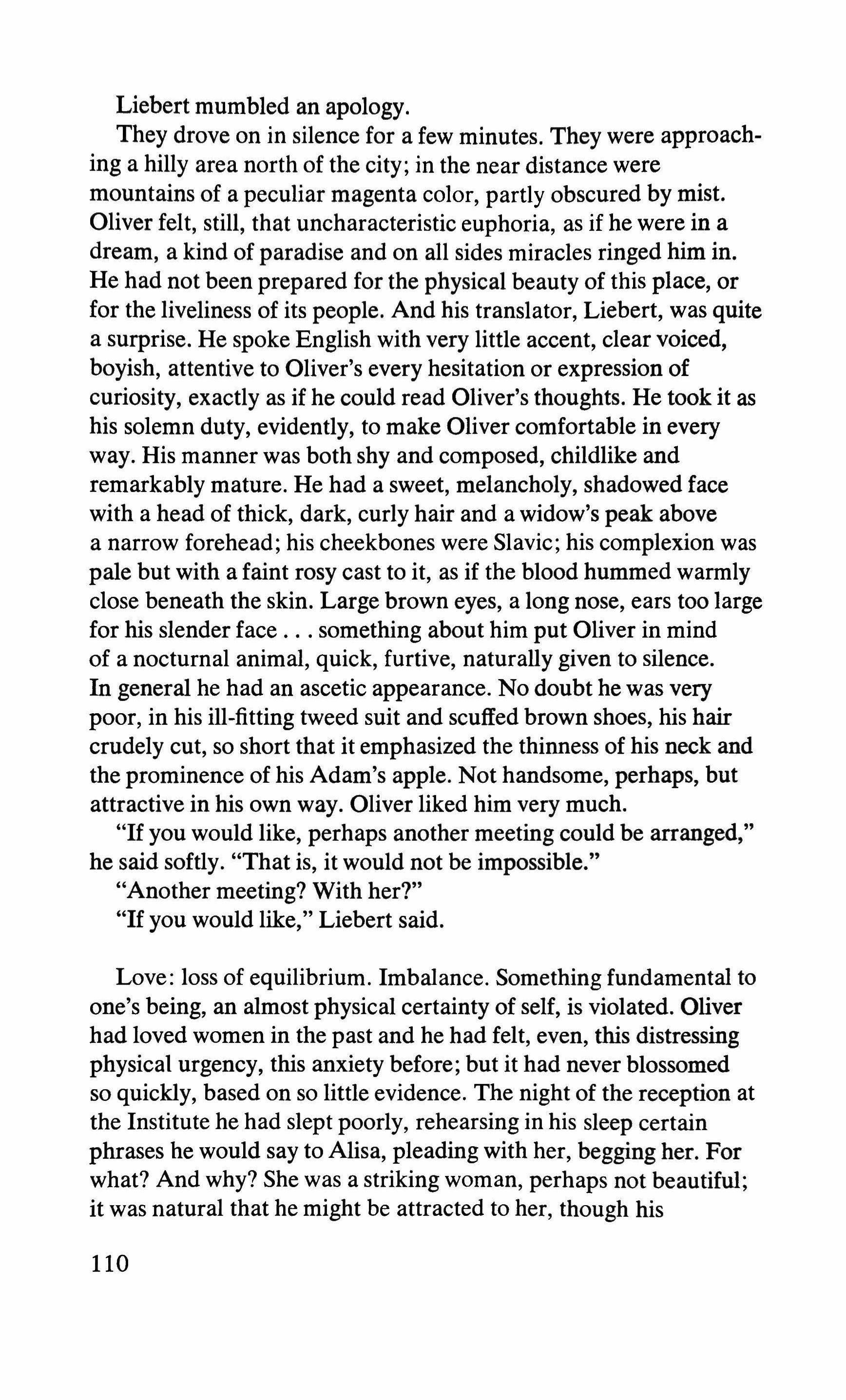
Liebert mumbled an apology. They drove on in silence for a few minutes. They were approaching a hilly area north of the city; in the near distance were mountains of a peculiar magenta color, partly obscured by mist. Oliver felt, still, that uncharacteristic euphoria, as if he were in a dream, a kind of paradise and on all sides miracles ringed him in. He had not been prepared for the physical beauty of this place, or for the liveliness of its people. And his translator, Liebert, was quite a surprise. He spoke English with very little accent, clear voiced, boyish, attentive to Oliver's every hesitation or expression of curiosity, exactly as if he could read Oliver's thoughts. He took it as his solemn duty, evidently, to make Oliver comfortable in every way. His manner was both shy and composed, childlike and remarkably mature. He had a sweet, melancholy, shadowed face with a head of thick, dark, curly hair and a widow's peak above a narrow forehead; his cheekbones were Slavic; his complexion was pale but with a faint rosy cast to it, as if the blood hummed warmly close beneath the skin. Large brown eyes, a long nose, ears too large for his slender face something about him put Oliver in mind of a nocturnal animal, quick, furtive, naturally given to silence. In general he had an ascetic appearance. No doubt he was very poor, in his ill-fitting tweed suit and scuffed brown shoes, his hair crudely cut, so short that it emphasized the thinness of his neck and the prominence of his Adam's apple. Not handsome, perhaps, but attractive in his own way. Oliver liked him very much.
"If you would like, perhaps another meeting could be arranged," he said softly. "That is, it would not be impossible."
"Another meeting? With her?"
"If you would like," Liebert said.
Love: loss of equilibrium. Imbalance. Something fundamental to one's being, an almost physical certainty of self, is violated. Oliver had loved women in the past and he had felt, even, this distressing physical urgency, this anxiety before; but it had never blossomed so quickly, based on so little evidence. The night of the reception at the Institute he had slept poorly, rehearsing in his sleep certain phrases he would say to Alisa, pleading with her, begging her. For what? And why? She was a striking woman, perhaps not beautiful; it was natural that he might be attracted to her, though his

experiences with women in recent years had been disappointing. But the intensity of his feeling worried him. It was exactly as if something foreign to his nature had infiltrated his system, had found him vulnerable, had shot his temperature up by several degrees. And he rejoiced in it, despite his worry and an obscure sense of shame. He really rejoiced in it. He woke, poured himself some of the sweet-tasting brandy he had left on his night table, lay back upon the goose-feather pillows, and thought of her. Was it possible he could see her again? Under what pretext? He was leaving in four days. Possibly he could extend his visit. Possibly not.
He recalled her bony, broad cheekbones, the severity of her gaze, her rather startled smile. A stranger. One of many strangers. In this phase of his life, Oliver thought, he met only strangers; he had no wish to see people he knew.
I love you. I want, what do I want? I want to know more about you.
A mistake, but he could not resist pouring more brandy into the glass. It tasted like sweet, heavy syrup at first and then, after a few seconds, like pure alcohol, blistering, acidic. One wished to obliterate the strong taste with the sweet-the impulse was to sip a little more.
According to his clock in its small leather traveling case, it was three-fifteen.
I want what do I want? he murmured aloud.
Liebert translated for Oliver: "She says that the 'extravagance'. you speak of in Androv's chronicles and in our literature generally is understood here as exaggeration metaphors? metaphors, yes, for interior states. But we ourselves, we are not extravagant in our living."
"Of course I only know Androv's work in translation," Oliver said quickly. "It reads awkwardly, rather like Dreiser do you know the name, the novelist? one of our distinguished American novelists, no longer so popular as he once was I was enormously impressed with the stubbornness, the resiliency, the audacity of Androv's characters, and despite his technique of exaggeration they seemed to me very lifelike." He paused, in order to give Liebert the opportunity to translate. He was breathing quickly, watching Alisa's face. They were having a drink in the hotel lounge, a dim, quiet
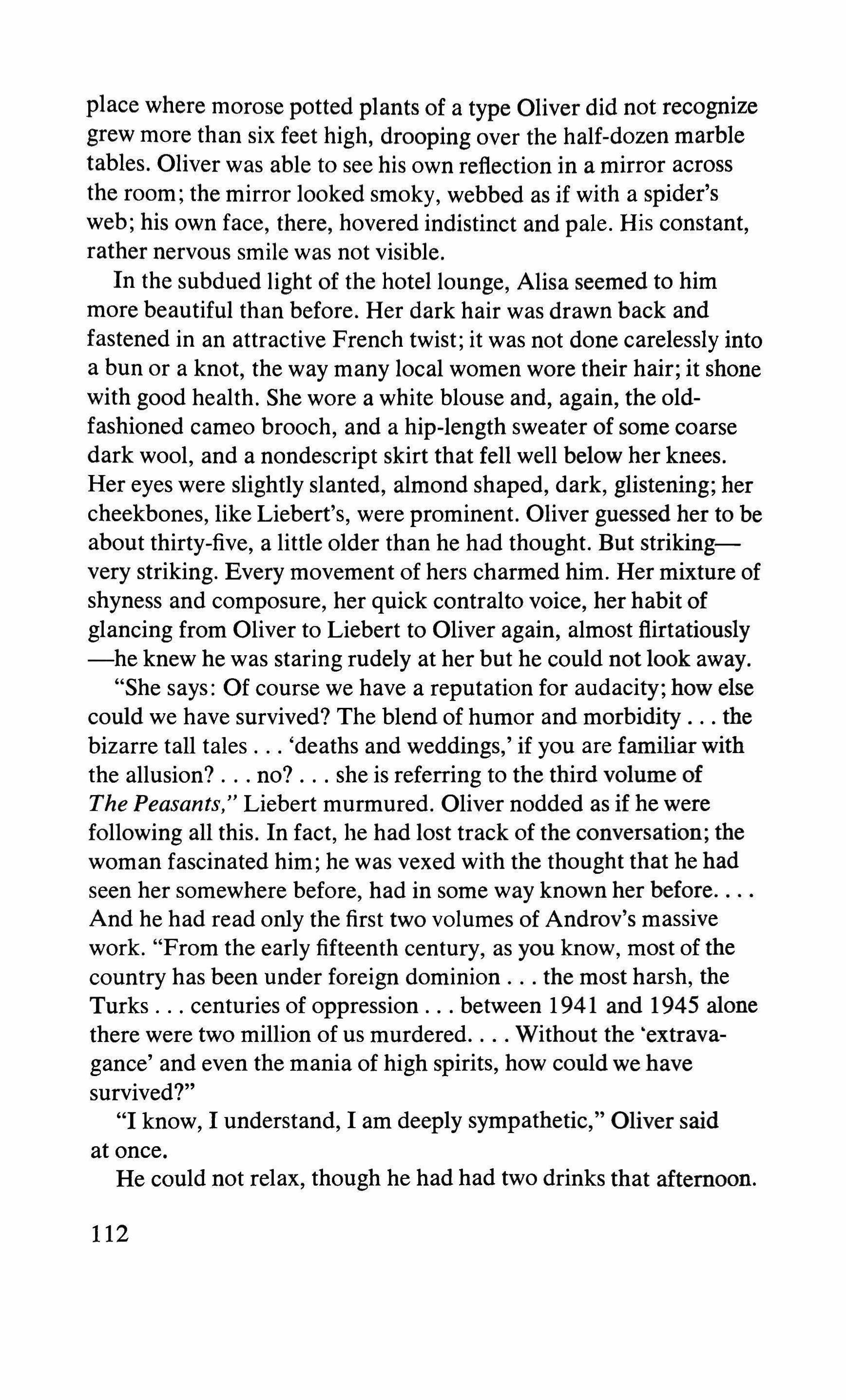
place where morose potted plants of a type Oliver did not recognize grew more than six feet high, drooping over the half-dozen marble tables. Oliver was able to see his own reflection in a mirror across the room; the mirror looked smoky, webbed as if with a spider's web; his own face, there, hovered indistinct and pale. His constant, rather nervous smile was not visible.
In the subdued light of the hotel lounge, Alisa seemed to him more beautiful than before. Her dark hair was drawn back and fastened in an attractive French twist; it was not done carelessly into a bun or a knot, the way many local women wore their hair; it shone with good health. She wore a white blouse and, again, the oldfashioned cameo brooch, and a hip-length sweater of some coarse dark wool, and a nondescript skirt that fell well below her knees. Her eyes were slightly slanted, almond shaped, dark, glistening; her cheekbones, like Liebert's, were prominent. Oliver guessed her to be about thirty-five, a little older than he had thought. But strikingvery striking. Every movement of hers charmed him. Her mixture of shyness and composure, her quick contralto voice, her habit of glancing from Oliver to Liebert to Oliver again, almost flirtatiously -he knew he was staring rudely at her but he could not look away.
"She says: Of course we have a reputation for audacity; how else could we have survived? The blend of humor and morbidity the bizarre tall tales 'deaths and weddings,' if you are familiar with the allusion? no? she is referring to the third volume of The Peasants," Liebert murmured. Oliver nodded as if he were following all this. In fact, he had lost track of the conversation; the woman fascinated him; he was vexed with the thought that he had seen her somewhere before, had in some way known her before And he had read only the first two volumes of Androv's massive work. "From the early fifteenth century, as you know, most of the country has been under foreign dominion the most harsh, the Turks centuries of oppression between 1941 and 1945 alone there were two million of us murdered Without the 'extravagance' and even the mania of high spirits, how could we have survived?"
"I know, I understand, I am deeply sympathetic," Oliver said at once.
He could not relax, though he had had two drinks that afternoon.
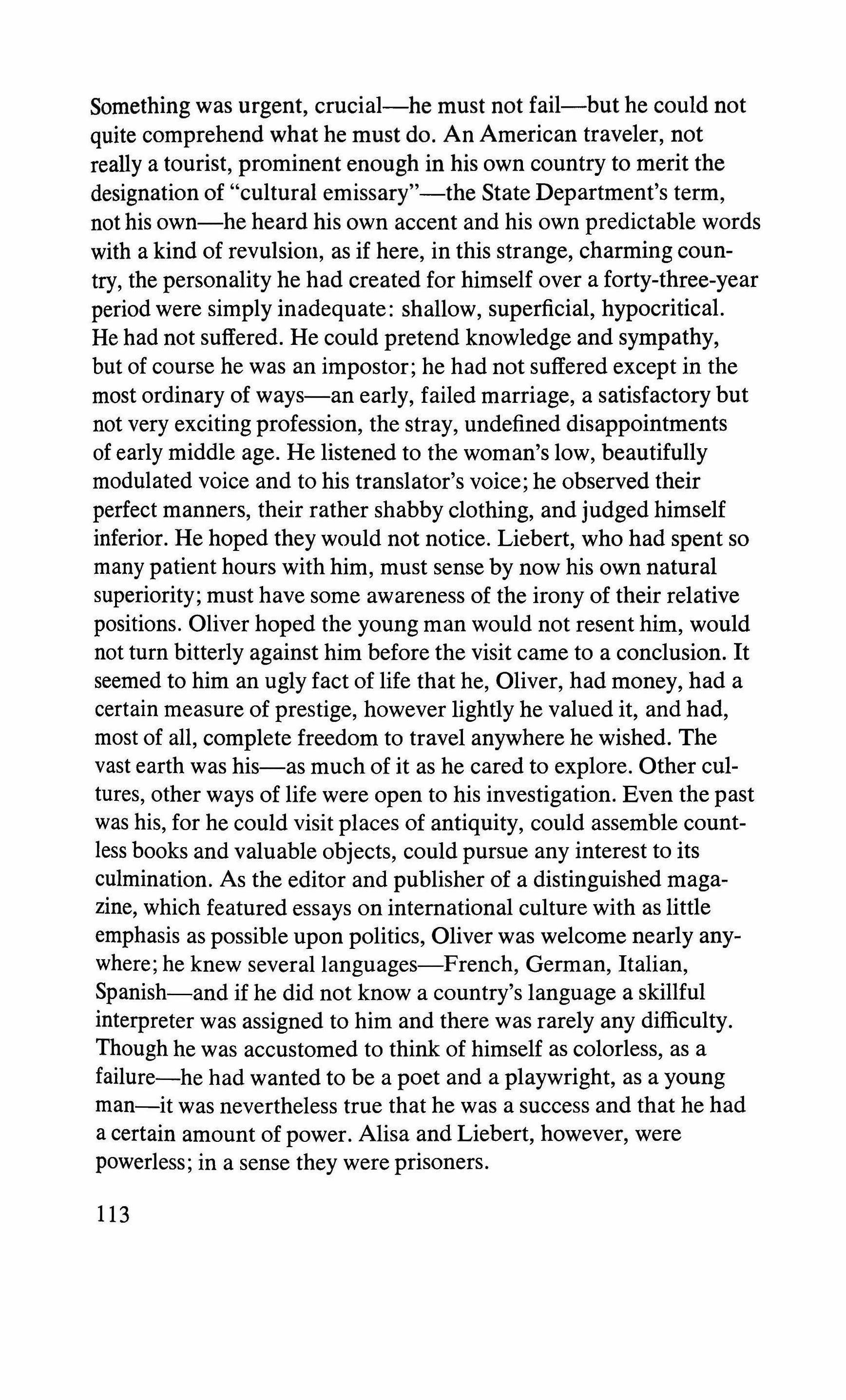
Something was urgent, crucial-he must not fail-but he could not quite comprehend what he must do. An American traveler, not really a tourist, prominent enough in his own country to merit the designation of "cultural emissary"-the State Department's term, not his own-he heard his own accent and his own predictable words with a kind of revulsion, as if here, in this strange, charming country, the personality he had created for himself over a forty-three-year period were simply inadequate: shallow, superficial, hypocritical. He had not suffered. He could pretend knowledge and sympathy, but of course he was an impostor; he had not suffered except in the most ordinary of ways-an early, failed marriage, a satisfactory but not very exciting profession, the stray, undefined disappointments of early middle age. He listened to the woman's low, beautifully modulated voice and to his translator's voice; he observed their perfect manners, their rather shabby clothing, and judged himself inferior. He hoped they would not notice. Liebert, who had spent so many patient hours with him, must sense by now his own natural superiority; must have some awareness of the irony of their relative positions. Oliver hoped the young man would not resent him, would not turn bitterly against him before the visit came to a conclusion. It seemed to him an ugly fact of life that he, Oliver, had money, had a certain measure of prestige, however lightly he valued it, and had, most of all, complete freedom to travel anywhere he wished. The vast earth was his-as much of it as he cared to explore. Other cultures, other ways of life were open to his investigation. Even the past was his, for he could visit places of antiquity, could assemble countless books and valuable objects, could pursue any interest to its culmination. As the editor and publisher of a distinguished magazine, which featured essays on international culture with as little emphasis as possible upon politics, Oliver was welcome nearly anywhere; he knew several languages-French, German, Italian, Spanish-and if he did not know a country's language a skillful interpreter was assigned to him and there was rarely any difficulty. Though he was accustomed to think of himself as colorless, as a failure-he had wanted to be a poet and a playwright, as a young man-it was nevertheless true that he was a success and that he had a certain amount of power. Alisa and Liebert, however, were powerless; in a sense they were prisoners.
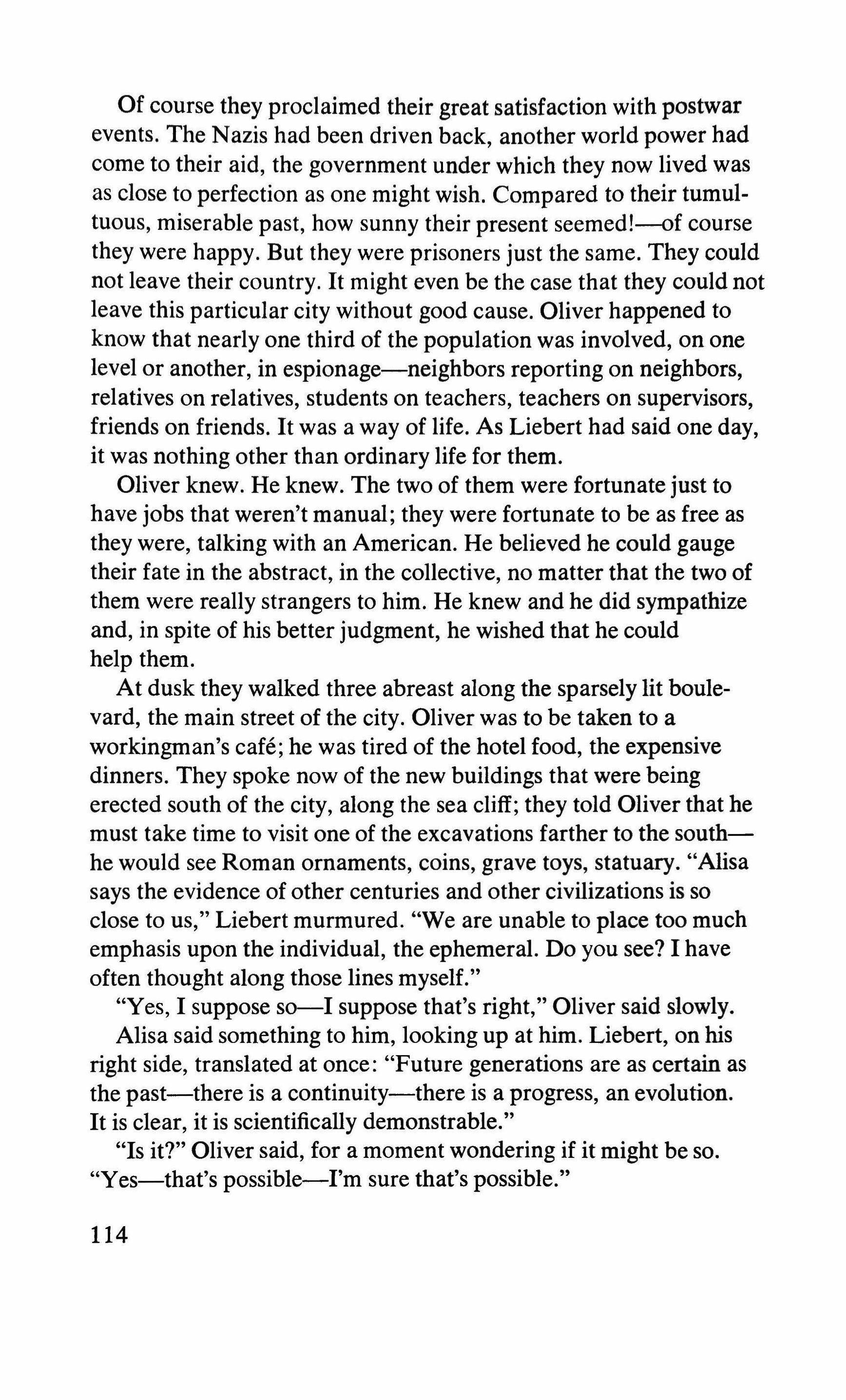
Of course they proclaimed their great satisfaction with postwar events. The Nazis had been driven back, another world power had come to their aid, the government under which they now lived was as close to perfection as one might wish. Compared to their tumultuous, miserable past, how sunny their present seemed!---of course they were happy. But they were prisoners just the same. They could not leave their country. It might even be the case that they could not leave this particular city without good cause. Oliver happened to know that nearly one third of the population was involved, on one level or another, in espionage-neighbors reporting on neighbors, relatives on relatives, students on teachers, teachers on supervisors, friends on friends. It was a way of life. As Liebert had said one day, it was nothing other than ordinary life for them.
Oliver knew. He knew. The two of them were fortunate just to have jobs that weren't manual; they were fortunate to be as free as they were, talking with an American. He believed he could gauge their fate in the abstract, in the collective, no matter that the two of them were really strangers to him. He knew and he did sympathize and, in spite of his better judgment, he wished that he could help them.
At dusk they walked three abreast along the sparsely lit boulevard, the main street of the city. Oliver was to be taken to a workingman's cafe; he was tired of the hotel food, the expensive dinners. They spoke now of the new buildings that were being erected south of the city, along the sea cliff; they told Oliver that he must take time to visit one of the excavations farther to the southhe would see Roman ornaments, coins, grave toys, statuary. "Alisa says the evidence of other centuries and other civilizations is so close to us," Liebert murmured. "We are unable to place too much emphasis upon the individual, the ephemeral. Do you see? I have often thought along those lines myself."
"Yes, I suppose so-I suppose that's right," Oliver said slowly. Alisa said something to him, looking up at him. Liebert, on his right side, translated at once: "Future generations are as certain as the past-there is a continuity-there is a progress, an evolution. It is clear, it is scientifically demonstrable."
"Is it?" Oliver said, for a moment wondering if it might be so. "Yes-that's possible-I'm sure that's possible."

Liebert translated his words and Alisa laughed.
"Why is she laughing? What did you say?" Oliver asked, smiling.
"I said--only what you said. I translated your words faithfully," Liebert said rather primly.
"She has such a ready, sweet laugh," Oliver said. "She's so charming, so unconscious of herself Ask her, Liebert, where she's from where she went to school where she lives what her life is like."
"All that?" Liebert asked. "So much!"
"But we have all evening, don't we?" Oliver said plaintively. All night?"
That day he had been a guest at the district commissioner's home for a two-hour luncheon. He had been driven to the village where the poet Hisjak had been born. Along with another guest of honor, an Italian novelist, he had been shown precious documents-the totally illegible manuscripts of an unknown writer, unknown at least to Oliver-kept in a safe in a museum. The first two evenings of his visit had been spent at endless dinners. He had witnessed a troupe of youthful dancers in rehearsal; he had admired the many statues of heroes placed about the city; he had marveled over the Byzantine domes, the towers and vaulting roofs and fountains. But his hours with Alisa and Liebert were by far the most enjoyable; he knew he would never forget them.
They ate a thick, greasy stew of coarse beef and vegetables, and many slices of whole-grain bread and butter, and drank two bottles of wine, of a dry, tart nature, quite unfamiliar to Oliver. The three of them sat at a corner tab1e in an utterly unimpressive restaurant; like a diner, it was, crude and brightly lit and noisy as an American diner. At first the other patrons took notice of them, but as time passed and the restaurant grew noiser, they were able to speak without being overheard. Oliver was very happy. He felt strangely free, like a child. The food was delicious; he kept complimenting them and asking Liebert to tell the waitress, and even to tell the cook; the bread, especially, seemed extraordinary-he insisted that he had never tasted bread so good. "How can I leave? Where can I go from here?" he said jokingly. They were served small, flaky tarts for dessert, and Oliver ate his in two or three bites, though he was no
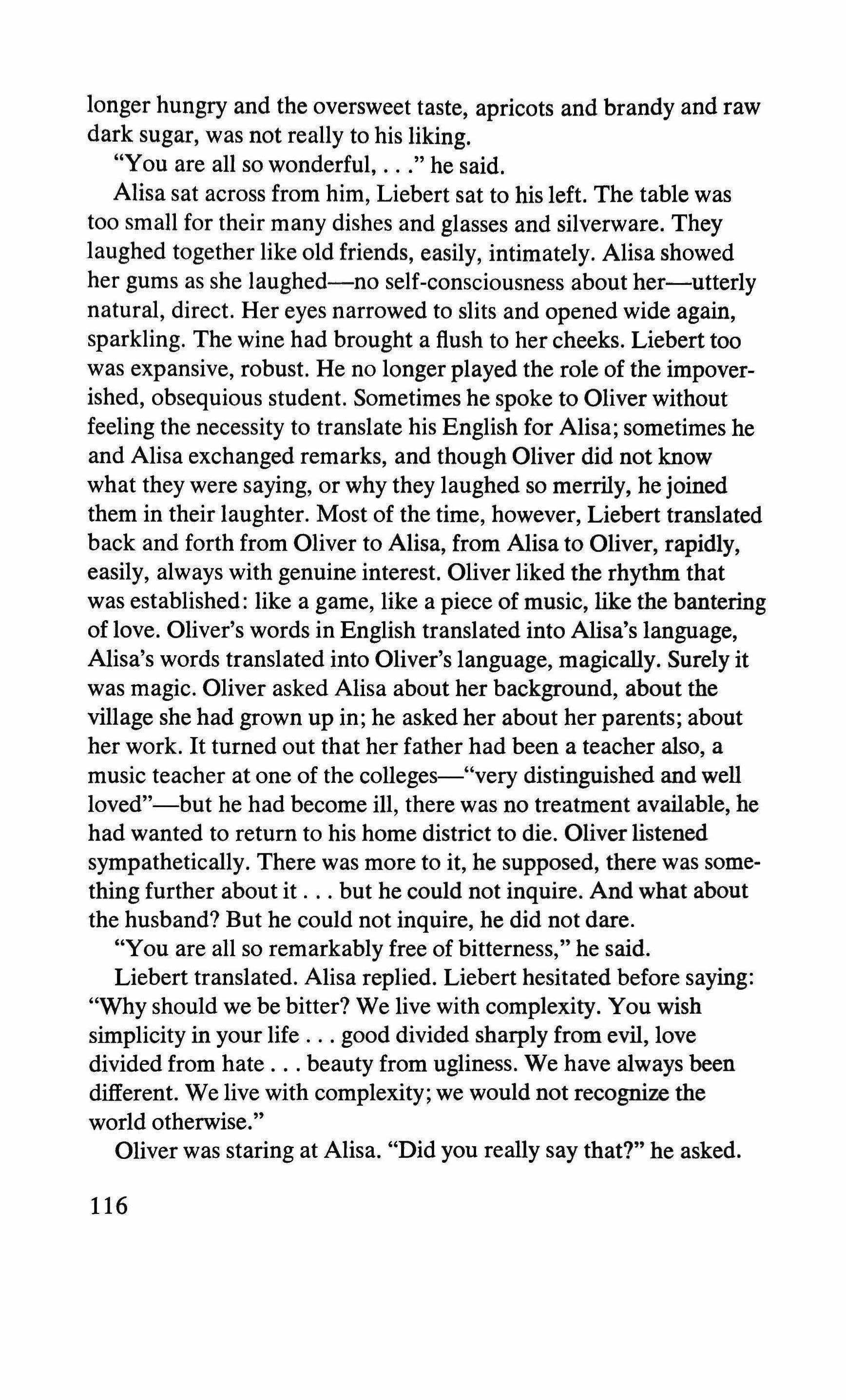
longer hungry and the oversweet taste, apricots and brandy and raw dark sugar, was not really to his liking.
"You are all so wonderful, he said.
Alisa sat across from him, Liebert sat to his left. The table was too small for their many dishes and glasses and silverware. They laughed together like old friends, easily, intimately. Alisa showed her gums as she laughed-no self-consciousness about her-utterly natural, direct. Her eyes narrowed to slits and opened wide again, sparkling. The wine had brought a flush to her cheeks. Liebert too was expansive, robust. He no longer played the role of the impoverished, obsequious student. Sometimes he spoke to Oliver without feeling the necessity to translate his English for Alisa; sometimes he and Alisa exchanged remarks, and though Oliver did not know what they were saying, or why they laughed so merrily, he joined them in their laughter. Most of the time, however, Liebert translated back and forth from Oliver to Alisa, from Alisa to Oliver, rapidly, easily, always with genuine interest. Oliver liked the rhythm that was established: like a game, like a piece of music, like the bantering of love. Oliver's words in English translated into Alisa's language, Alisa's words translated into Oliver's language, magically. Surely it was magic. Oliver asked Alisa about her background, about the village she had grown up in; he asked her about her parents; about her work. It turned out that her father had been a teacher also, a music teacher at one of the colleges-"very distinguished and well loved"-but he had become ill, there was no treatment available, he had wanted to return to his home district to die. Oliver listened sympathetically. There was more to it, he supposed, there was something further about it but he could not inquire. And what about the husband? But he could not inquire, he did not dare.
"You are all so remarkably free of bitterness," he said.
Liebert translated. Alisa replied. Liebert hesitated before saying: "Why should we be bitter? We live with complexity. You wish simplicity in your life good divided sharply from evil, love divided from hate beauty from ugliness. We have always been different. We live with complexity; we would not recognize the world otherwise."
Oliver was staring at Alisa. "Did you really say that?" he asked.
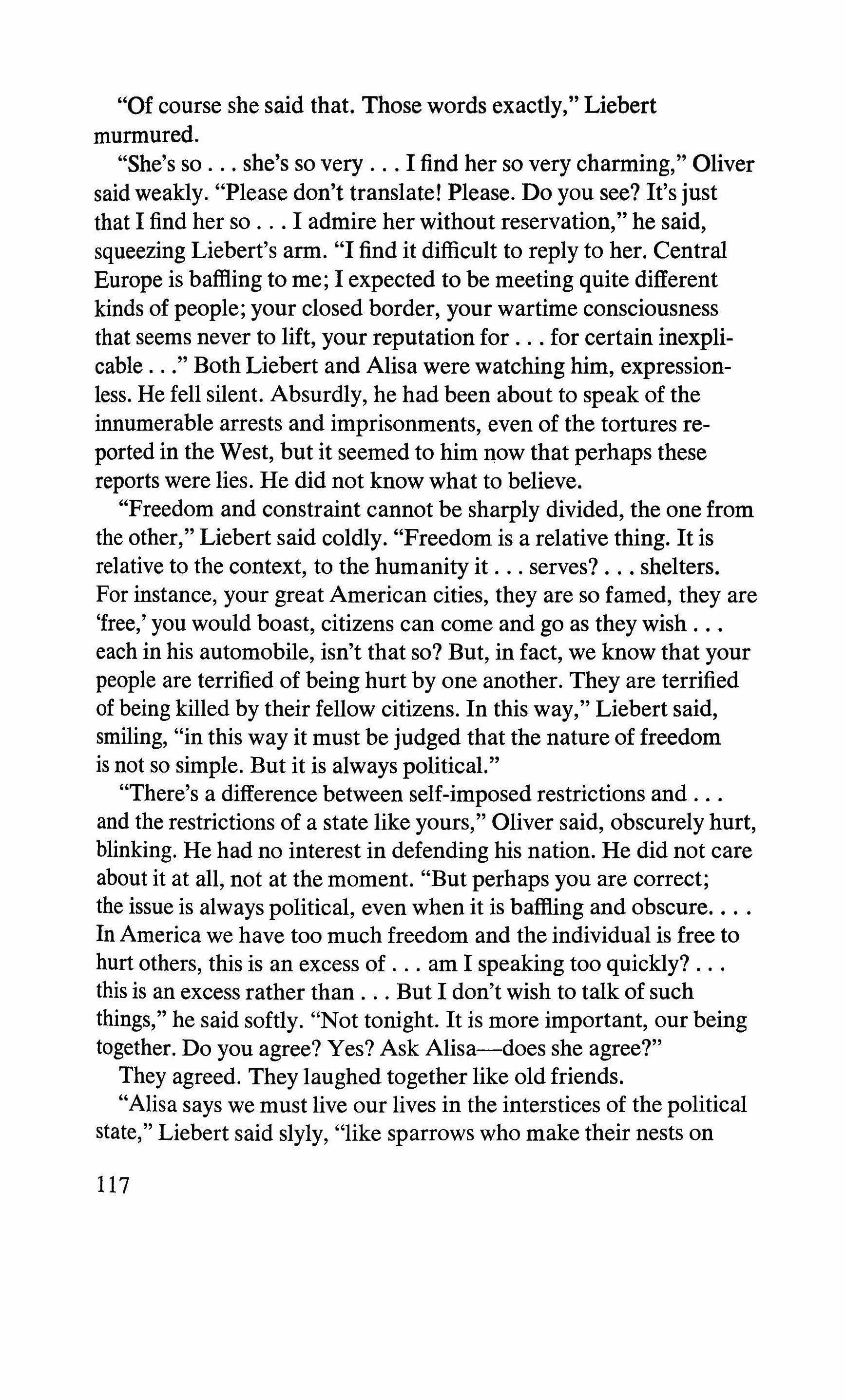
"Of course she said that. Those words exactly," Liebert murmured.
"She's so she's so very I find her so very charming," Oliver said weakly. "Please don't translate! Please. Do you see? It's just that I find her so I admire her without reservation," he said, squeezing Liebert's arm. "I find it difficult to reply to her. Central Europe is baffling to me; I expected to be meeting quite different kinds of people; your closed border, your wartime consciousness that seems never to lift, your reputation for for certain inexplicable Both Liebert and Alisa were watching him, expressionless. He fell silent. Absurdly, he had been about to speak of the innumerable arrests and imprisonments, even of the tortures reported in the West, but it seemed to him now that perhaps these reports were lies. He did not know what to believe.
"Freedom and constraint cannot be sharply divided, the one from the other," Liebert said coldly. "Freedom is a relative thing. It is relative to the context, to the humanity it serves? shelters. For instance, your great American cities, they are so famed, they are 'free,' you would boast, citizens can come and go as they wish each in his automobile, isn't that so? But, in fact, we know that your people are terrified of being hurt by one another. They are terrified of being killed by their fellow citizens. In this way," Liebert said, smiling, "in this way it must be judged that the nature of freedom is not so simple. But it is always political."
"There's a difference between self-imposed restrictions and and the restrictions of a state like yours," Oliver said, obscurely hurt, blinking. He had no interest in defending his nation. He did not care about it at all, not at the moment. "But perhaps you are correct; the issue is always political, even when it is baffling and obscure In America we have too much freedom and the individual is free to hurt others, this is an excess of am I speaking too quickly? this is an excess rather than But I don't wish to talk of such things," he said softly. "Not tonight. It is more important, our being together. Do you agree? Yes? Ask Alisa-does she agree?"
They agreed. They laughed together like old friends.
"Alisa says we must live our lives in the interstices of the political state," Liebert said slyly, "like sparrows who make their nests on
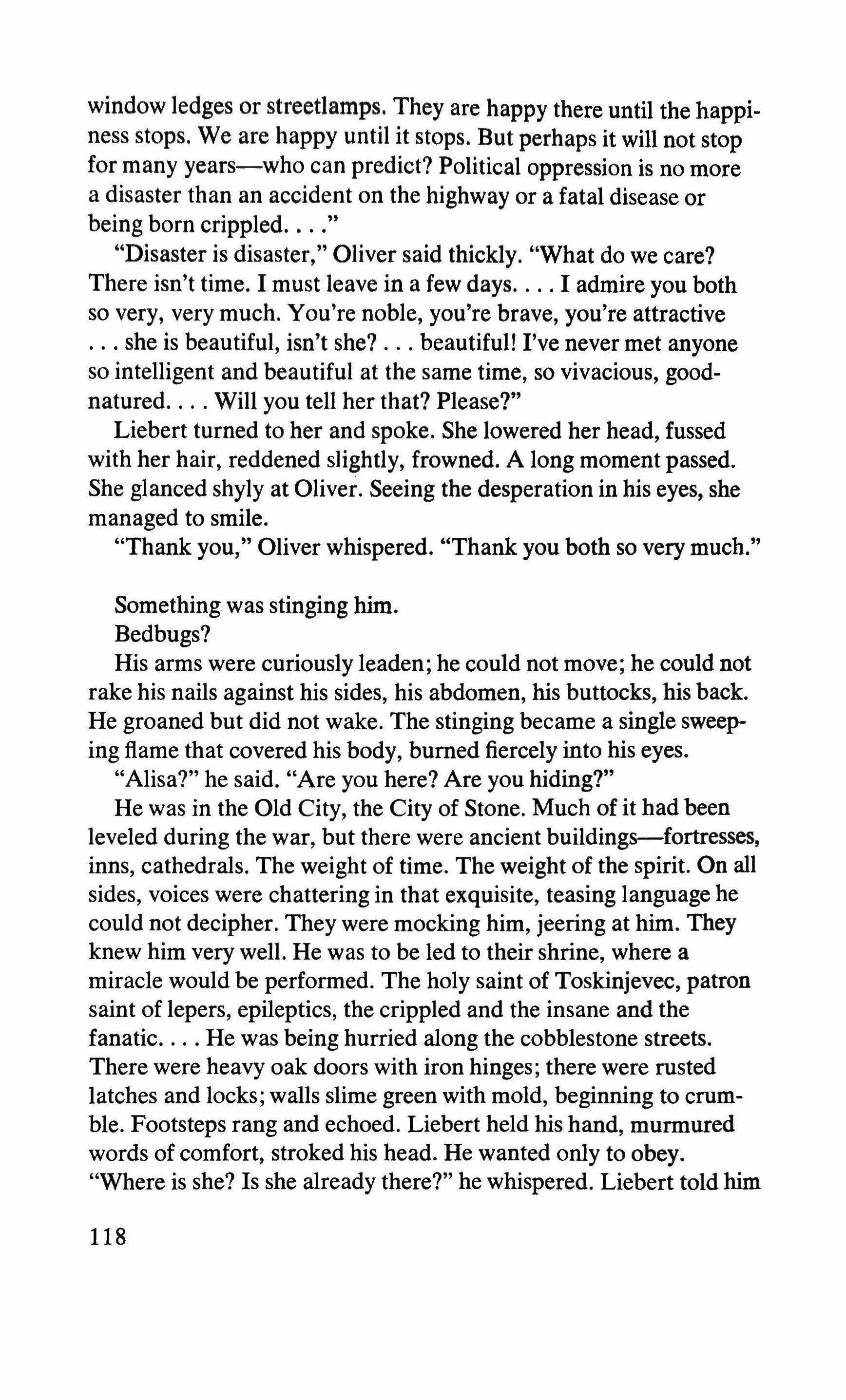
window ledges or streetlamps. They are happy there until the happiness stops. We are happy until it stops. But perhaps it will not stop for many years-who can predict? Political oppression is no more a disaster than an accident on the highway or a fatal disease or being born crippled "
"Disaster is disaster," Oliver said thickly. "What do we care? There isn't time. I must leave in a few days I admire you both so very, very much. You're noble, you're brave, you're attractive she is beautiful, isn't she? beautiful! I've never met anyone so intelligent and beautiful at the same time, so vivacious, goodnatured Will you tell her that? Please?"
Liebert turned to her and spoke. She lowered her head, fussed with her hair, reddened slightly, frowned. A long moment passed. She glanced shyly at Oliver. Seeing the desperation in his eyes, she managed to smile.
"Thank you," Oliver whispered. "Thank you both so very much."
him.
His arms were curiously leaden; he could not move; he could not rake his nails against his sides, his abdomen, his buttocks, his back. He groaned but did not wake. The stinging became a single sweeping flame that covered his body, burned fiercely into his eyes.
"Alisa?" he said. "Are you here? Are you hiding?"
He was in the Old City, the City of Stone. Much of it had been leveled during the war, but there were ancient buildings-fortresses, inns, cathedrals. The weight of time. The weight of the spirit. On all sides, voices were chattering in that exquisite, teasing language he could not decipher. They were mocking him, jeering at him. They knew him very well. He was to be led to their shrine, where a miracle would be performed. The holy saint of Toskinjevec, patron saint of lepers, epileptics, the crippled and the insane and the fanatic He was being hurried along the cobblestone streets. There were heavy oak doors with iron hinges; there were rusted latches and locks; walls slime green with mold, beginning to crumble. Footsteps rang and echoed. Liebert held his hand, murmured words of comfort, stroked his head. He wanted only to obey. "Where is she? Is she already there?" he whispered. Liebert told him

to be still-he must not speak! Someone was following them. Someone wished to hurt them. Oliver saw, in a panic, the greenish copper steeple of an old church; he could take refuge in its ruins; no one would find them there. The main part of the building had been reduced to rubble. A wall remained, and on this wall were posters of the great president-charmingly candid shots that showed the man with one of his children, and in a peasant's costume, with a rifle raised to his shoulder and one eye squinted shut, and on the ledge above a waterfall, his arm raised in a salute to the crowd gathered below. Oliver hurried. Someone would stand guard for them--one of the men he had seen in the restaurant, had seen without really considering; a young black-haired man who had been playing chess with a friend, and who had not glanced up a single time at Oliver and his friends. But now he would stand guard. Now he was to be trusted.
They descended into a cellar. Everywhere there were slabs of stone, broken plasterboard, broken glass. Weeds grew abundantly in the cracks. "Hurry," Liebert urged, dragging him forward. Then Oliver was with her, clutching at her. By a miracle they were together. He kissed her desperately, recklessly. She pretended to resist. "No, there isn't time, there isn't enough time," he begged. "No, don't stop me She went limp; she put her arms around his neck; they struggled together, panting, while the young translator urged them on, anxious, a little annoyed. Oliver's entire body stung. Waves of heat swept over him and broke into tiny bits so that he groaned aloud. He wanted her so violently, he was so hungry for her, for her or for something "How can I bring you with me?" he said. "I love you, I won't surrender you." She spoke in short, melodic phrases. He could not understand. Now she too was anxious, clutching at him, pressing herself against him. Oliver could not bear it. He was going mad. Then, out of the corner of his eye, he happened to see someone watching them. The police! But no, it was a poorly dressed old man, a cripple, peering at them from behind a broken wall. He was deformed; his legs were mere stumps. Oliver stared in a panic. He could not believe what he saw. Behind the old man were two or three others, half crawling, pushing themselves along through the debris by the exertions of their arms, their legs cut off at the thigh. They were bearded, wide-eyed, gaping, 119
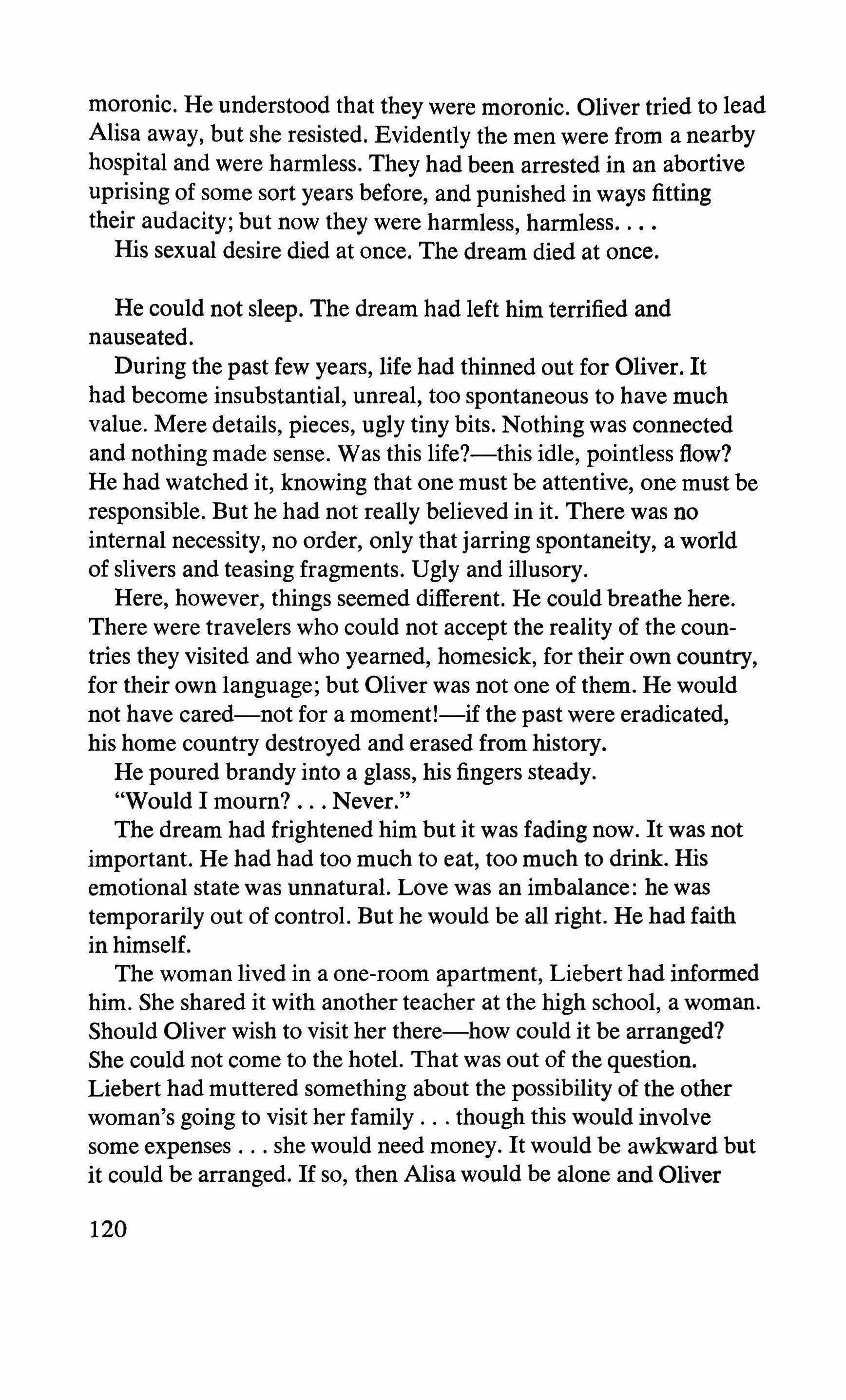
moronic. He understood that they were moronic. Oliver tried to lead Alisa away, but she resisted. Evidently the men were from a nearby hospital and were harmless. They had been arrested in an abortive uprising of some sort years before, and punished in ways fitting their audacity; but now they were harmless, harmless His sexual desire died at once. The dream died at once.
He could not sleep. The dream had left him terrified and nauseated.
During the past few years, life had thinned out for Oliver. It had become insubstantial, unreal, too spontaneous to have much value. Mere details, pieces, ugly tiny bits. Nothing was connected and nothing made sense. Was this life?-this idle, pointless flow? He had watched it, knowing that one must be attentive, one must be responsible. But he had not really believed in it. There was no internal necessity, no order, only that jarring spontaneity, a world of slivers and teasing fragments. Ugly and illusory. Here, however, things seemed different. He could breathe here. There were travelers who could not accept the reality of the countries they visited and who yearned, homesick, for their own country, for their own language; but Oliver was not one of them. He would not have cared-not for a moment!-if the past were eradicated, his home country destroyed and erased from history. He poured brandy into a glass, his fingers steady. "Would I mourn? Never."
The dream had frightened him but it was fading now. It was not important. He had had too much to eat, too much to drink. His emotional state was unnatural. Love was an imbalance: he was temporarily out of control. But he would be all right. He had faith in himself.
The woman lived in a one-room apartment, Liebert had informed him. She shared it with another teacher at the high school, a woman. Should Oliver wish to visit her there-how could it be arranged? She could not come to the hotel. That was out of the question. Liebert had muttered something about the possibility of the other woman's going to visit her family though this would involve some expenses she would need money. It would be awkward but it could be arranged. If so, then Alisa would be alone and Oliver
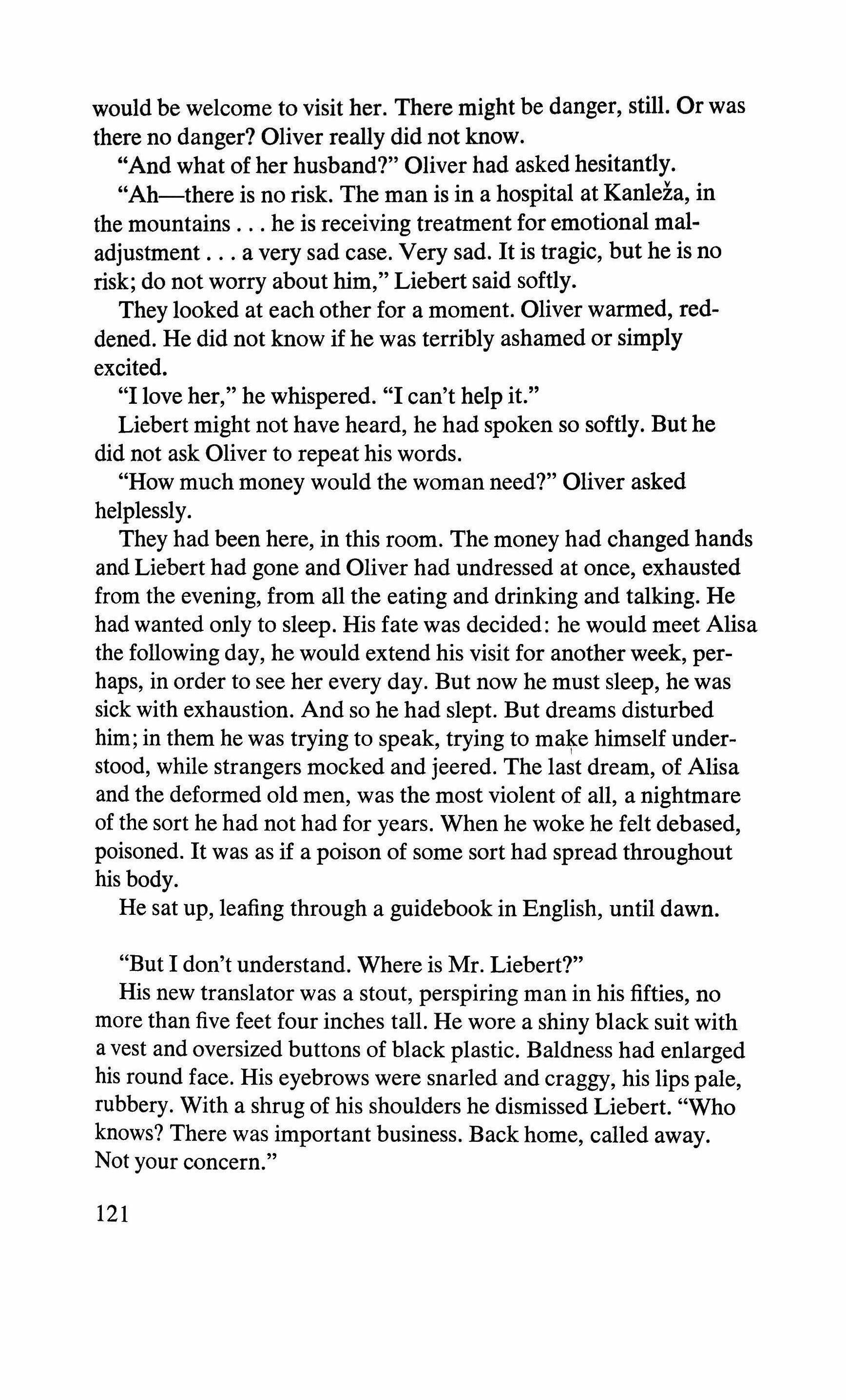
would be welcome to visit her. There might be danger, still. Or was there no danger? Oliver really did not know.
"And what of her husband?" Oliver had asked hesitantly.
"Ah-there is no risk. The man is in a hospital at Kanleza, in the mountains he is receiving treatment for emotional maladjustment a very sad case. Very sad. It is tragic, but he is no risk; do not worry about him," Liebert said softly.
They looked at each other for a moment. Oliver warmed, reddened. He did not know if he was terribly ashamed or simply excited.
"I love her," he whispered. "I can't help it."
Liebert might not have heard, he had spoken so softly. But he did not ask Oliver to repeat his words.
"How much money would the woman need?" Oliver asked helplessly.
They had been here, in this room. The money had changed hands and Liebert had gone and Oliver had undressed at once, exhausted from the evening, from all the eating and drinking and talking. He had wanted only to sleep. His fate was decided: he would meet Alisa the following day, he would extend his visit for another week, perhaps, in order to see her every day. But now he must sleep, he was sick with exhaustion. And so he had slept. But dreams disturbed him; in them he was trying to speak, trying to make himself understood, while strangers mocked and jeered. The last dream, of Alisa and the deformed old men, was the most violent of all, a nightmare of the sort he had not had for years. When he woke he felt debased, poisoned. It was as if a poison of some sort had spread throughout his body.
He sat up, leafing through a guidebook in English, until dawn.
"But I don't understand. Where is Mr. Liebert?"
His new translator was a stout, perspiring man in his fifties, no more than five feet four inches tall. He wore a shiny black suit with a vest and oversized buttons of black plastic. Baldness had enlarged his round face. His eyebrows were snarled and craggy, his lips pale, rubbery. With a shrug of his shoulders he dismissed Liebert. "Who knows? There was important business. Back home, called away. Not your concern."
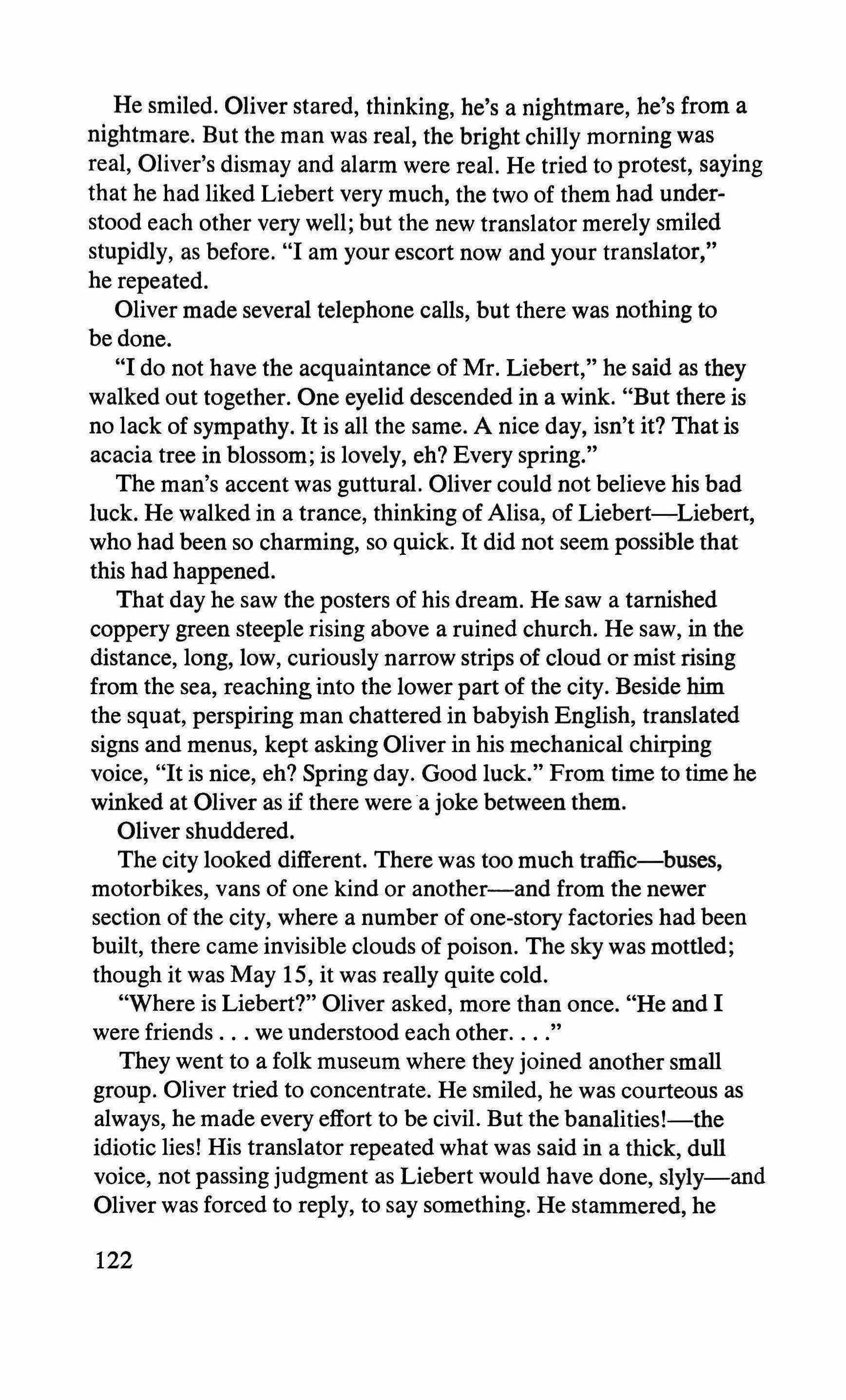
He smiled. Oliver stared, thinking, he's a nightmare, he's from a nightmare. But the man was real, the bright chilly morning was real, Oliver's dismay and alarm were real. He tried to protest, saying that he had liked Liebert very much, the two of them had understood each other very well; but the new translator merely smiled stupidly, as before. "I am your escort now and your translator," he repeated.
Oliver made several telephone calls, but there was nothing to be done.
"I do not have the acquaintance of Mr. Liebert," he said as they walked out together. One eyelid descended in a wink. "But there is no lack of sympathy. It is all the same. A nice day, isn't it? That is acacia tree in blossom; is lovely, eh? Every spring."
The man's accent was guttural. Oliver could not believe his bad luck. He walked in a trance, thinking of Alisa, of Liebert-Liebert, who had been so charming, so quick. It did not seem possible that this had happened.
That day he saw the posters of his dream. He saw a tarnished coppery green steeple rising above a ruined church. He saw, in the distance, long, low, curiously narrow strips of cloud or mist rising from the sea, reaching into the lower part of the city. Beside him the squat, perspiring man chattered in babyish English, translated signs and menus, kept asking Oliver in his mechanical chirping voice, "It is nice, eh? Spring day. Good luck." From time to time he winked at Oliver as if there were a joke between them.
Oliver shuddered.
The city looked different. There was too much traffic-buses, motorbikes, vans of one kind or another-and from the newer section of the city, where a number of one-story factories had been built, there came invisible clouds of poison. The sky was mottled; though it was May 15, it was really quite cold.
"Where is Liebert?" Oliver asked, more than once. "He and I were friends we understood each other
They went to a folk museum where they joined another small group. Oliver tried to concentrate. He smiled, he was courteous as always, he made every effort to be civil. But the banalities!-the idiotic lies! His translator repeated what was said in a thick, dull voice, not passing judgment as Liebert would have done, slyly-and Oliver was forced to reply, to say something. He stammered, he
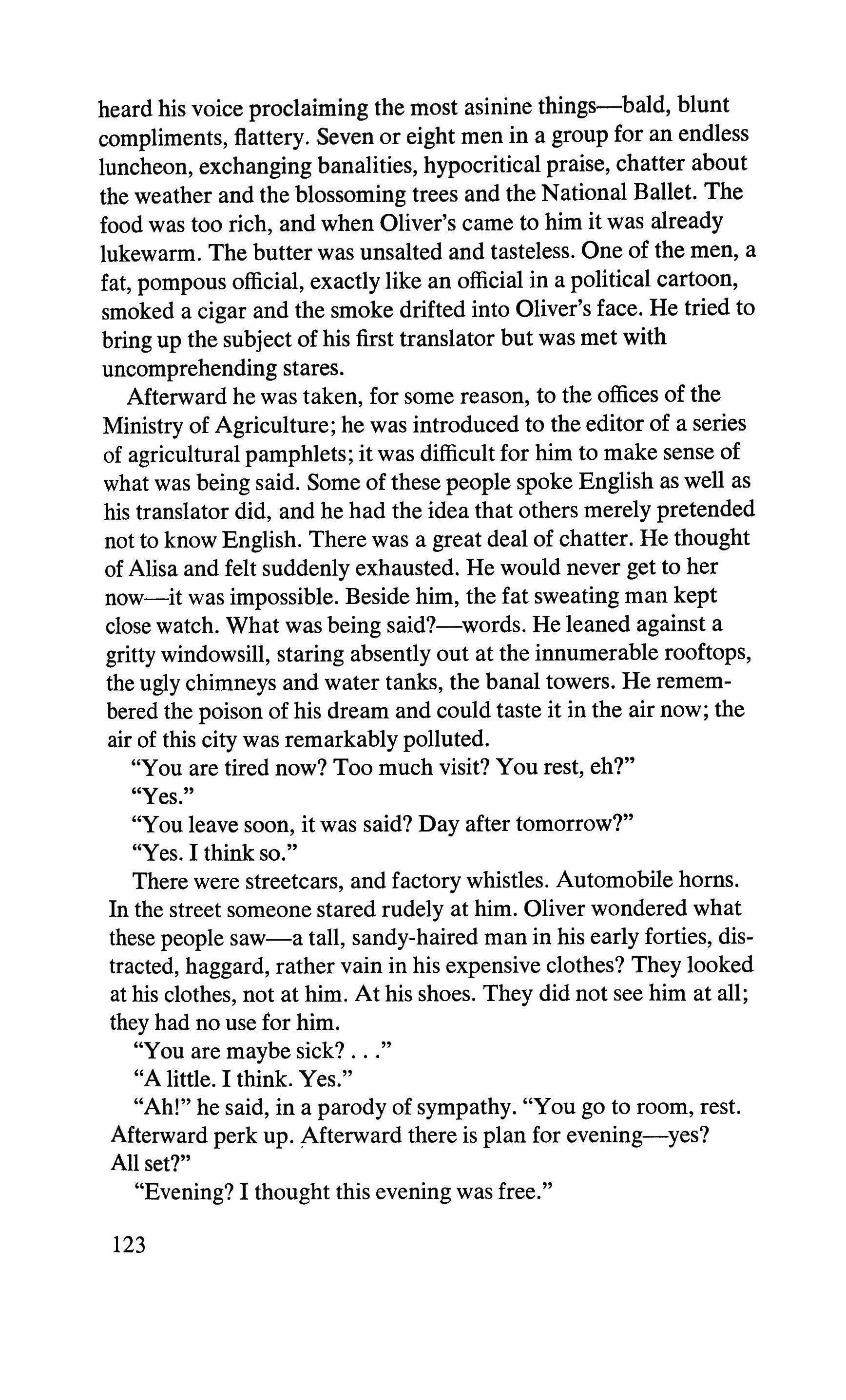
heard his voice proclaiming the most asinine things-bald, blunt compliments, flattery. Seven or eight men in a group for an endless luncheon, exchanging banalities, hypocritical praise, chatter about the weather and the blossoming trees and the National Ballet. The food was too rich, and when Oliver's came to him it was already lukewarm. The butter was unsalted and tasteless. One of the men, a fat, pompous official, exactly like an official in a political cartoon, smoked a cigar and the smoke drifted into Oliver's face. He tried to bring up the subject of his first translator but was met with uncomprehending stares.
Afterward he was taken, for some reason, to the offices of the Ministry of Agriculture; he was introduced to the editor of a series of agricultural pamphlets; it was difficult for him to make sense of what was being said. Some of these people spoke English as well as his translator did, and he had the idea that others merely pretended not to know English. There was a great deal of chatter. He thought of Alisa and felt suddenly exhausted. He would never get to her now-it was impossible. Beside him, the fat sweating man kept close watch. What was being said?-words. He leaned against a gritty windowsill, staring absently out at the innumerable rooftops, the ugly chimneys and water tanks, the banal towers. He remembered the poison of his dream and could taste it in the air now; the air of this city was remarkably polluted.
"You are tired now? Too much visit? You rest, eh?"
"Yes."
"You leave soon, it was said? Day after tomorrow?"
"Yes. I think so."
There were streetcars, and factory whistles. Automobile horns. In the street someone stared rudely at him. Oliver wondered what these people saw-a tall, sandy-haired man in his early forties, distracted, haggard, rather vain in his expensive clothes? They looked at his clothes, not at him. At his shoes. They did not see him at all; they had no use for him.
"Y b k? ou are may e SIC .•
"A little. I think. Yes."
"Ah!" he said, in a parody of sympathy. "You go to room, rest. Afterward perk up. Afterward there is plan for evening-yes? All set?"
"Evening? I thought this evening was free."
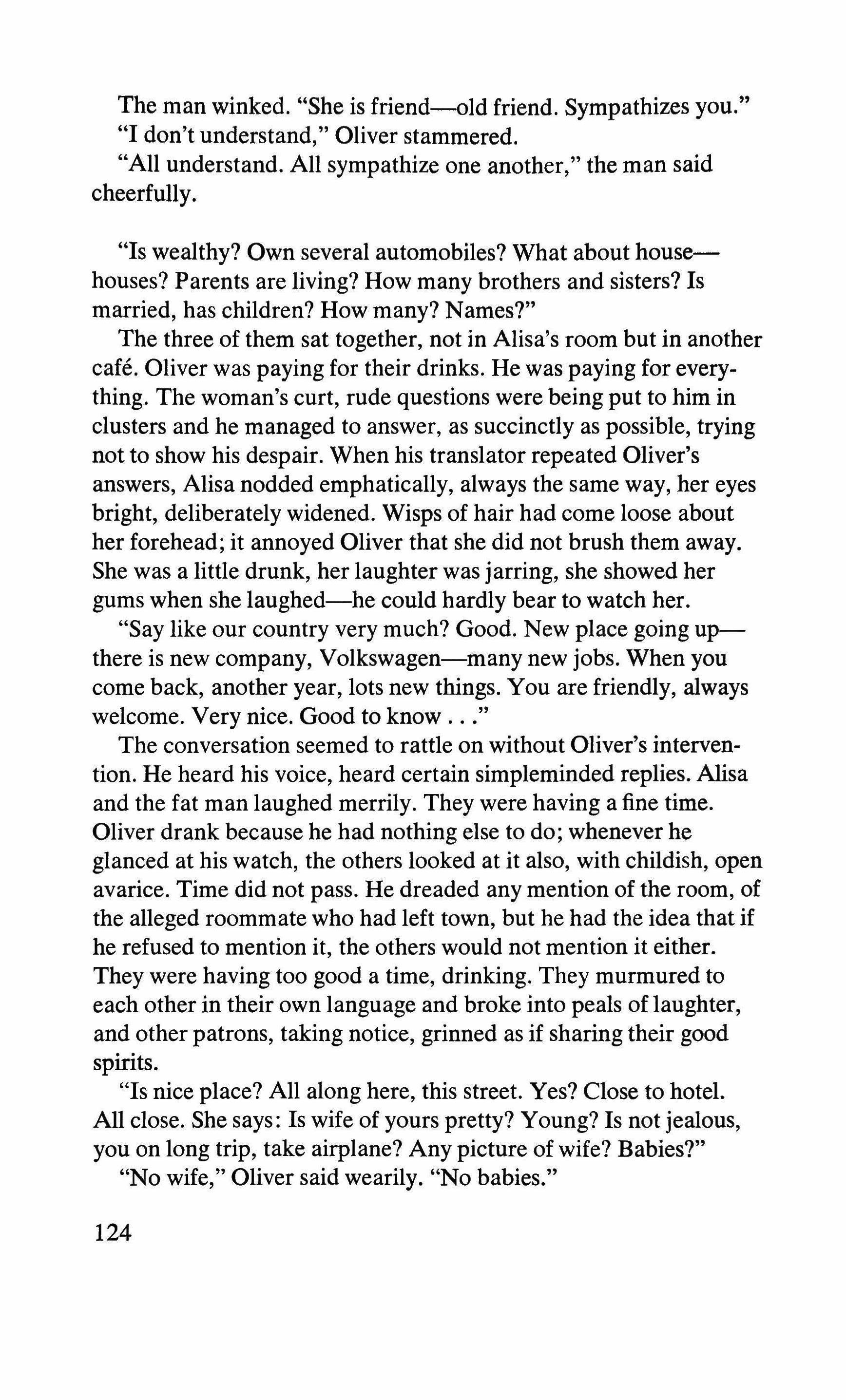
The man winked. "She is friend-old friend. Sympathizes you."
"I don't understand," Oliver stammered.
"All understand. All sympathize one another," the man said cheerfully.
"Is wealthy? Own several automobiles? What about househouses? Parents are living? How many brothers and sisters? Is married, has children? How many? Names?"
The three of them sat together, not in Alisa's room but in another cafe. Oliver was paying for their drinks. He was paying for everything. The woman's curt, rude questions were being put to him in clusters and he managed to answer, as succinctly as possible, trying not to show his despair. When his translator repeated Oliver's answers, Alisa nodded emphatically, always the same way, her eyes bright, deliberately widened. Wisps of hair had come loose about her forehead; it annoyed Oliver that she did not brush them away. She was a little drunk, her laughter was jarring, she showed her gums when she laughed-he could hardly bear to watch her.
"Say like our country very much? Good. New place going upthere is new company, Volkswagen-many new jobs. When you come back, another year, lots new things. You are friendly, always welcome. Very nice. Good to know "
The conversation seemed to rattle on without Oliver's intervention. He heard his voice, heard certain simpleminded replies. Alisa and the fat man laughed merrily. They were having a fine time. Oliver drank because he had nothing else to do; whenever he glanced at his watch, the others looked at it also, with childish, open avarice. Time did not pass. He dreaded any mention of the room, of the alleged roommate who had left town, but he had the idea that if he refused to mention it, the others would not mention it either. They were having too good a time, drinking. They murmured to each other in their own language and broke into peals of laughter, and other patrons, taking notice, grinned as if sharing their good spirits.
"Is nice place? All along here, this street. Yes? Close to hotel. All close. She says: Is wife of yours pretty? Young? Is not jealous, you on long trip, take airplane? Any picture of wife? Babies?"
"No wife," Oliver said wearily. "No babies."
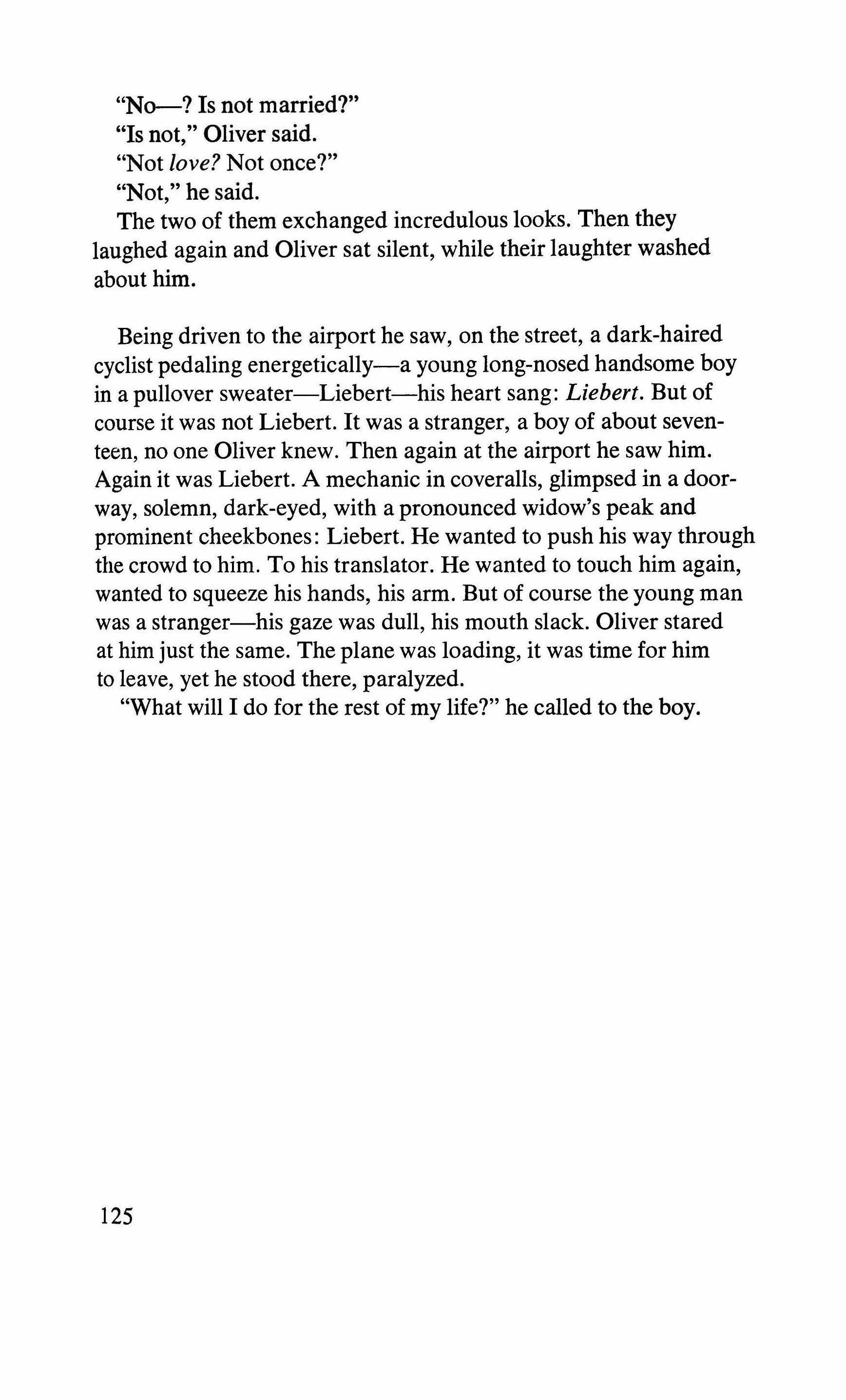
"No-? Is not married?"
"Is not," Oliver said.
"Not love? Not once?"
"Not," he said.
The two of them exchanged incredulous looks. Then they laughed again and Oliver sat silent, while their laughter washed about him.
Being driven to the airport he saw, on the street, a dark-haired cyclist pedaling energetically-a young long-nosed handsome boy in a pullover sweater-Liebert-his heart sang: Liebert. But of course it was not Liebert. It was a stranger, a boy of about seventeen, no one Oliver knew. Then again at the airport he saw him. Again it was Liebert. A mechanic in coveralls, glimpsed in a doorway, solemn, dark-eyed, with a pronounced widow's peak and prominent cheekbones: Liebert. He wanted to push his way through the crowd to him. To his translator. He wanted to touch him again, wanted to squeeze his hands, his arm. But of course the young man was a stranger-his gaze was dull, his mouth slack. Oliver stared at him just the same. The plane was loading, it was time for him to leave, yet he stood there, paralyzed.
"What will I do for the rest of my life?" he called to the boy.
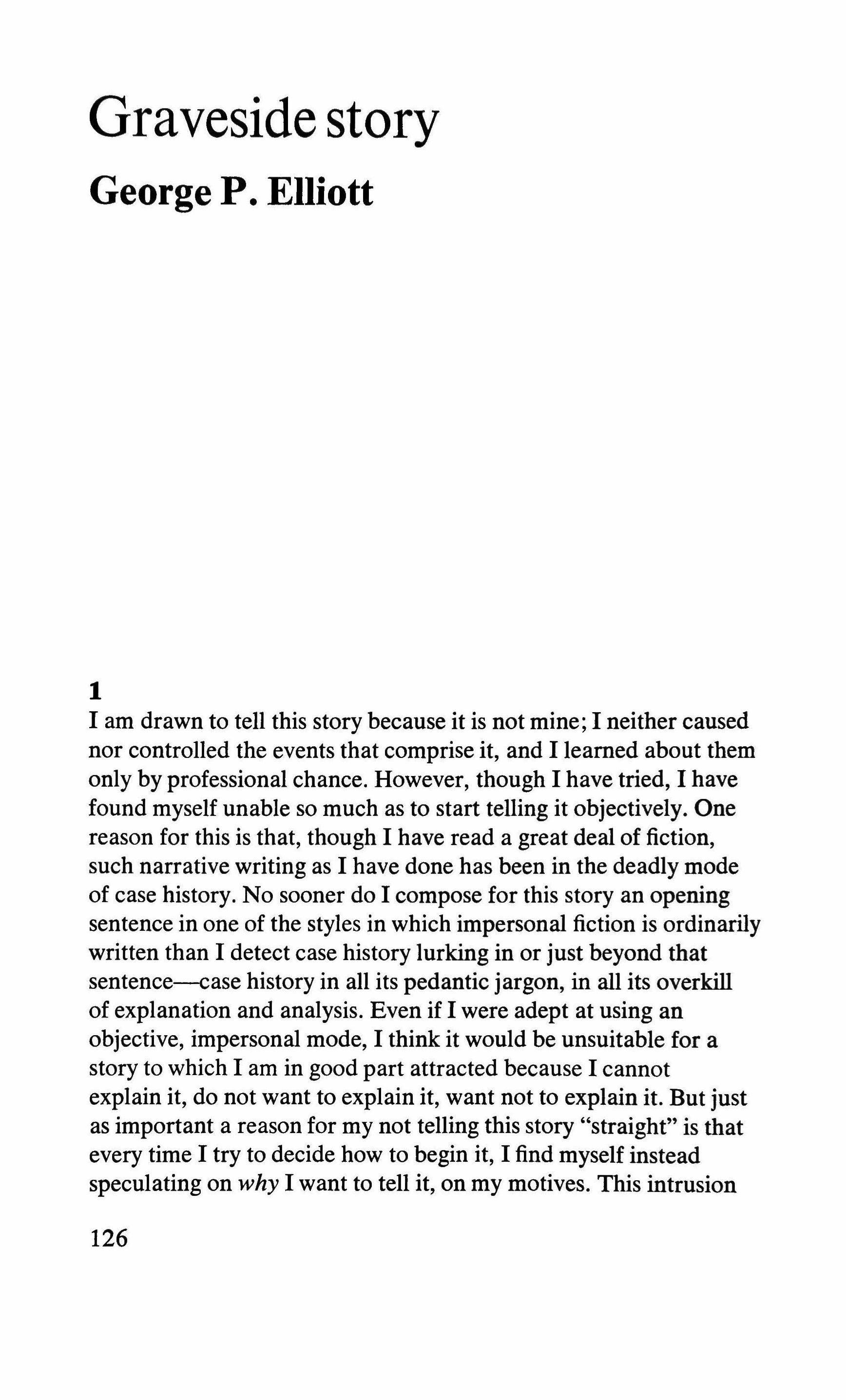
I am drawn to tell this story because it is not mine; I neither caused nor controlled the events that comprise it, and I learned about them only byprofessional chance. However, though I have tried, I have found myself unable so much as to start telling it objectively. One reason for this is that, though I have read a great deal of fiction, such narrative writing as I have done has been in the deadly mode of case history. No sooner do I compose for this story an opening sentence in one of the styles in which impersonal fiction is ordinarily written than I detect case history lurking in or just beyond that sentence--case history in all its pedantic jargon, in all its overkill of explanation and analysis. Even if I were adept at using an objective, impersonal mode, I think it would be unsuitable for a story to which I am in good part attracted because I cannot explain it, do not want to explain it, want not to explain it. But just as important a reason for my not telling this story "straight" is that every time I try to decide how to begin it, I find myself instead speculating on why I want to tell it, on my motives. This intrusion
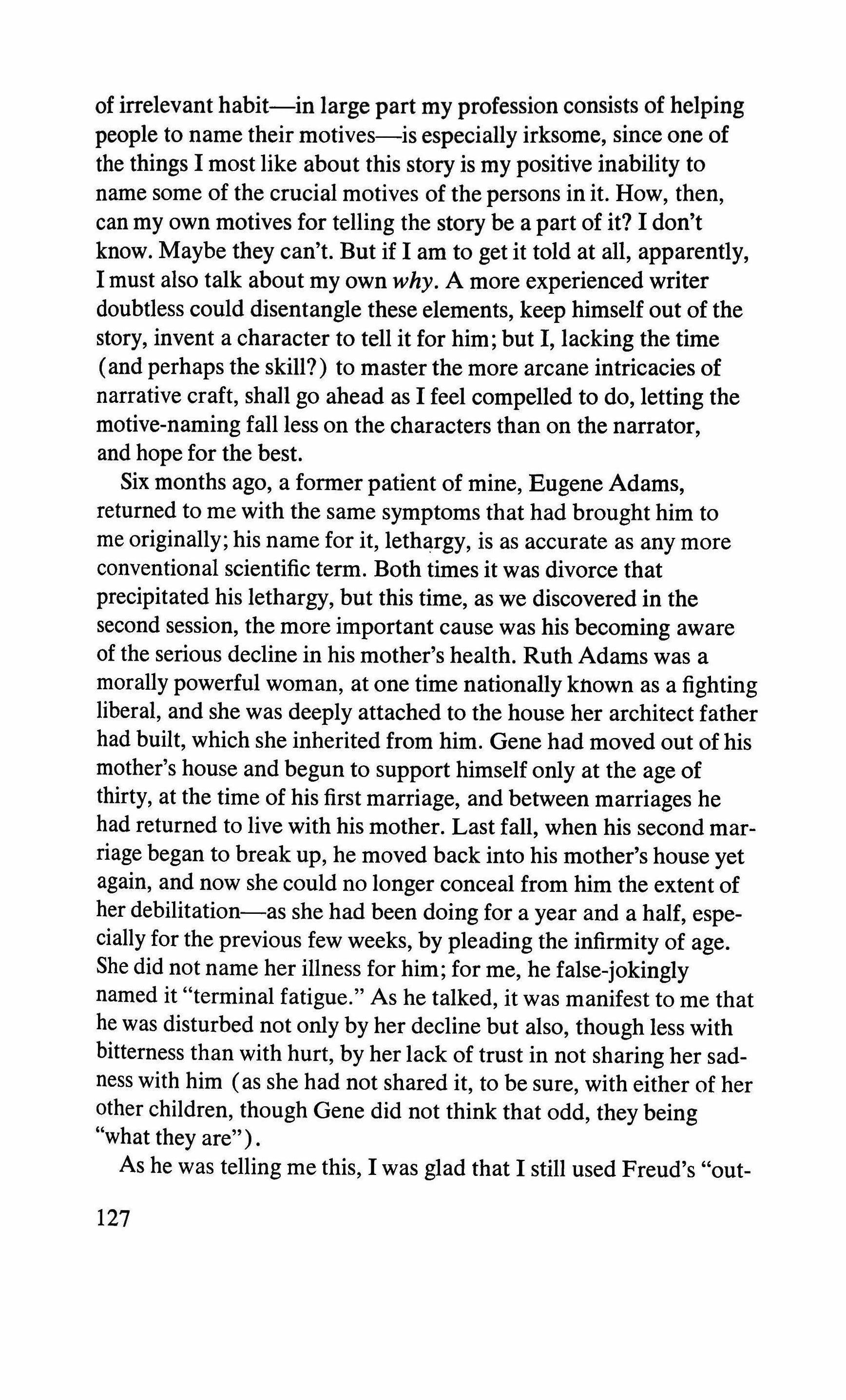
of irrelevant habit-in large part my profession consists of helping people to name their motives-is especially irksome, since one of the things I most like about this story is my positive inability to name some of the crucial motives of the persons in it. How, then, can my own motives for telling the story be a part of it? I don't know. Maybe they can't. But if I am to get it told at all, apparently, I must also talk about my own why. A more experienced writer doubtless could disentangle these elements, keep himself out of the story, invent a character to tell it for him; but I, lacking the time (and perhaps the skill?) to master the more arcane intricacies of narrative craft, shall go ahead as I feel compelled to do, letting the motive-naming fall less on the characters than on the narrator, and hope for the best.
Six months ago, a former patient of mine, Eugene Adams, returned to me with the same symptoms that had brought him to me originally; his name for it, lethargy, is as accurate as any more conventional scientific term. Both times it was divorce that precipitated his lethargy, but this time, as we discovered in the second session, the more important cause was his becoming aware of the serious decline in his mother's health. Ruth Adams was a morally powerful woman, at one time nationally known as a fighting liberal, and she was deeply attached to the house her architect father had built, which she inherited from him. Gene had moved out of his mother's house and begun to support himself only at the age of thirty, at the time of his first marriage, and between marriages he had returned to live with his mother. Last fall, when his second marriage began to break up, he moved back into his mother's house yet again, and now she could no longer conceal from him the extent of her debilitation-as she had been doing for a year and a half, especially for the previous few weeks, by pleading the infirmity of age. She did not name her illness for him; for me, he false-jokingly named it "terminal fatigue." As he talked, it was manifest to me that he was disturbed not only by her decline but also, though less with bitterness than with hurt, by her lack of trust in not sharing her sadness with him (as she had not shared it, to be sure, with either of her other children, though Gene did not think that odd, they being "what they are")
As he was telling me this, I was glad that I still used Freud's "out-

dated" practice of sitting behind the patient, who is lying on a couch. Gene's information was putting me into as awkward a dilemma as I have been in professionally, and I was glad he could not read my face. Just as he needed to vent his distress, so I needed to consider what course to take. Therefore, satisfying both these needs at once, I guided him with a couple of questions-he is very quickto make the connection between his present situation and the childhood rejection trauma that analysis had earlier discovered to be the root of much of his emotional difficulty. The connection made, he broke into sobs, hiding his face in his hands. I knew I had enough time to make my decision and compose my face; for his shame at crying in front of anyone else, even me, would keep him from turning to look at me for another ten or fifteen minutes at the soonest.
As it happened, I had just learned that his mother had a form of leukemia for which there is no cure and from which she would not have another remission of any considerable duration. The disease takes a couple of years to run its course, and chemotherapy makes it possible for the patient to live a fairly active life for most of that time. This leukemia produces no specific pain; you go to the doctor because you "feel just terrible"; you get weaker; finally you die. I knew this because, shortly before Gene had returned to me, I had gone to a colleague of mine at the Medical Center, Alan Kaplan, one of the foremost cancer specialists in the Bay Area, to complain that I was "feeling just terrible." The day before Gene's second session, Alan had told me I had a form of leukemia so hard to detect and so rare that some specialists never run up against a case of it in their entire practice. I said I was amazed at the speed with which he had diagnosed it. He disclaimed any credit; he had been, as it were, alerted, my case being his second in eighteen months. I asked, since there was nothing much else to talk about once he had sketched the treatment and defined my fate, who the first victim was. He told me, in strict professional confidence, that it was Ruth Adams. (He was aware that I knew a good deal about her because of Gene; Alan's wife was Gene's sister.) Now, with Gene sobbing on the couch, my problem was how much, if any, of this to tell him immediately, before the end of that session.
My obvious course was to follow normal procedure, phone Alan and get his permission to inform Gene about Ruth's condition.
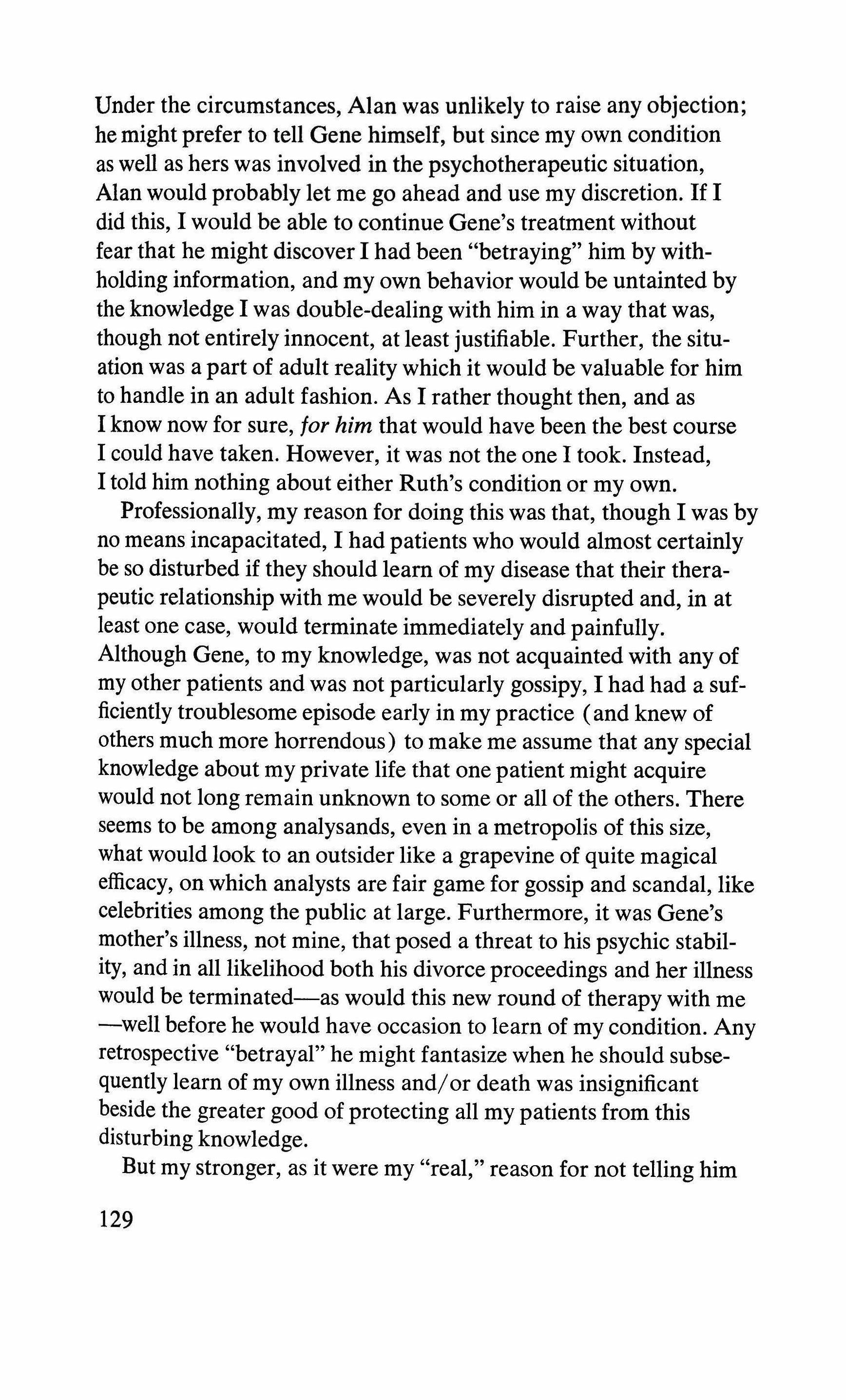
Under the circumstances, Alan was unlikely to raise any objection; he might prefer to tell Gene himself, but since my own condition as well as hers was involved in the psychotherapeutic situation, Alan would probably let me go ahead and use my discretion. If I did this, I would be able to continue Gene's treatment without fear that he might discover I had been "betraying" him by withholding information, and my own behavior would be untainted by the knowledge I was double-dealing with him in a way that was, though not entirely innocent, at least justifiable. Further, the situation was a part of adult reality which it would be valuable for him to handle in an adult fashion. As I rather thought then, and as I know now for sure, for him that would have been the best course I could have taken. However, it was not the one I took. Instead, I told him nothing about either Ruth's condition or my own.
Professionally, my reason for doing this was that, though I was by no means incapacitated, I had patients who would almost certainly be so disturbed if they should learn of my disease that their therapeutic relationship with me would be severely disrupted and, in at least one case, would terminate immediately and painfully. Although Gene, to my knowledge, was not acquainted with any of my other patients and was not particularly gossipy, I had had a sufficiently troublesome episode early in my practice (and knew of others much more horrendous) to make me assume that any special knowledge about my private life that one patient might acquire would not long remain unknown to some or all of the others. There seems to be among analysands, even in a metropolis of this size, what would look to an outsider like a grapevine of quite magical efficacy, on which analysts are fair game for gossip and scandal, like celebrities among the public at large. Furthermore, it was Gene's mother's illness, not mine, that posed a threat to his psychic stability, and in all likelihood both his divorce proceedings and her illness would be terminated-as would this new round of therapy with me -well before he would have occasion to learn of my condition. Any retrospective "betrayal" he might fantasize when he should subsequently learn of my own illness and/or death was insignificant beside the greater good of protecting all my patients from this disturbing knowledge.
But my stronger, as it were my "real," reason for not telling him

-or any other patient, or any colleague either, for that matter-was personal. I simply did not want to. My terminal illness was nobody else's business, so long as it did not impair my functioning in the analytic situation. The chemotherapy is keeping my metabolism stabilized at a quite satisfactory level-Alan is unequivocal about that-and my neural system shows no signs of malfunctioning. Having shared my life with Susannah for thirty-two years, I wanted to share my death with her too, and only with her. Above all, I did not want to listen to patients expropriate my death by talking endlessly, to me, about its effect on them; I wanted, intensely, not to hear it talked to mush. Like every person-is it not part of being a person?-I owed myself a death of my own, and if Eugene Gracchus Adams, that skinny chessplayer, didn't like it he could lump it.
(What an aggressive paragraph! What unprofessionally open hostility! What pleasure!)
Because of Susannah, it did not take me as long as I would have expected to accept my doom. My first impulse on leaving Alan's office was to phone her and tell her I didn't feel up to going out to dinner that evening as we had planned to do, but I was not sure I could keep every signal of distress out of my voice. Had she been working in a noisy, impersonal office, I would have risked the call, on the assumption that, because of background noise, she would not have been able to pick up small voice signals over the phone. But she has an office to herself-she is a senior officer in the Justice Department and for the past year has been putting together an antitrust case. So, not wanting to risk disturbing her, I drove out to the beach, spent the rest of the afternoon in the most soothing of occupations, watching the breakers, and went as scheduled to the cocktail lounge adjoining the restaurant. She was waiting for me. As soon as I had a drink in my hand-and though I had only casually mentioned to her that I was going to "have a checkup"-she asked me what Alan had said. I told her the truth. "How long does he give you?" "Two years." "Let's go home." From her silence beside me as I drove, I was afraid she was going to be numb and "brave" and later explode with impotent, objectless rage. Instead, once home, she grieved, she cherished, she embraced. Most of all, she began the process, which she has persevered in, of taking upon herself a great part of the burden of fear and dread, freeing me to live and function as nor-
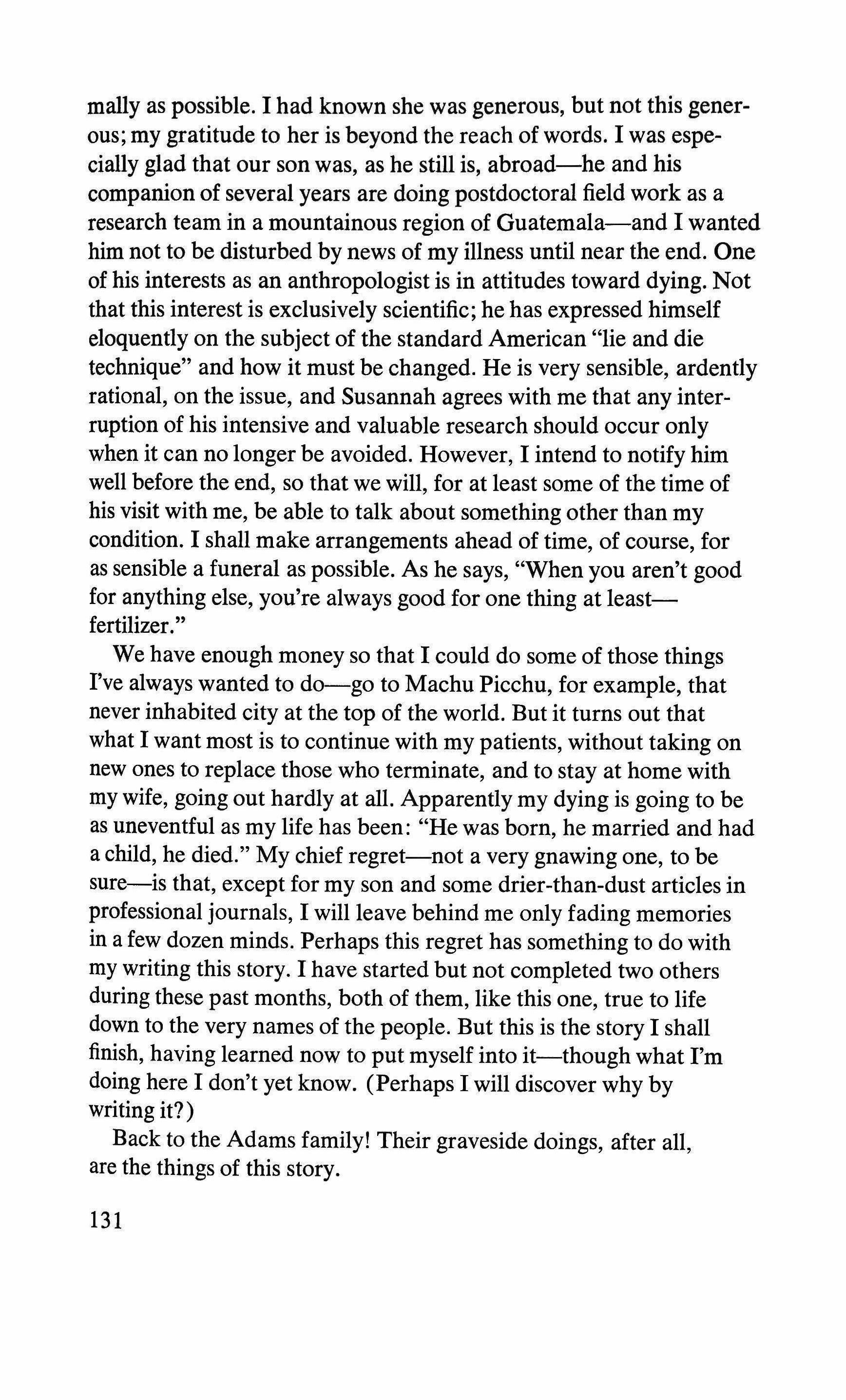
mally as possible. I had known she was generous, but not this generous; my gratitude to her is beyond the reach of words. I was especially glad that our son was, as he still is, abroad-he and his companion of several years are doing postdoctoral field work as a research team in a mountainous region of Guatemala-and I wanted him not to be disturbed by news of my illness until near the end. One of his interests as an anthropologist is in attitudes toward dying. Not that this interest is exclusively scientific; he has expressed himself eloquently on the subject of the standard American "lie and die technique" and how it must be changed. He is very sensible, ardently rational, on the issue, and Susannah agrees with me that any interruption of his intensive and valuable research should occur only when it can no longer be avoided. However, I intend to notify him well before the end, so that we will, for at least some of the time of his visit with me, be able to talk about something other than my condition. I shall make arrangements ahead of time, of course, for as sensible a funeral as possible. As he says, "When you aren't good for anything else, you're always good for one thing at leastfertilizer. "
We have enough money so that I could do some of those things I've always wanted to do-go to Machu Picchu, for example, that never inhabited city at the top of the world. But it turns out that what I want most is to continue with my patients, without taking on new ones to replace those who terminate, and to stay at home with my wife, going out hardly at all. Apparently my dying is going to be as uneventful as my life has been: "He was born, he married and had a child, he died." My chief regret-not a very gnawing one, to be sure-is that, except for my son and some drier-than-dust articles in professional journals, I will leave behind me only fading memories in a few dozen minds. Perhaps this regret has something to do with my writing this story. I have started but not completed two others during these past months, both of them, like this one, true to life down to the very names of the people. But this is the story I shall finish, having learned now to put myself into it-though what I'm doing here I don't yet know. (Perhaps I will discover why by writing it?)
Back to the Adams family! Their graveside doings, after all, are the things of this story.
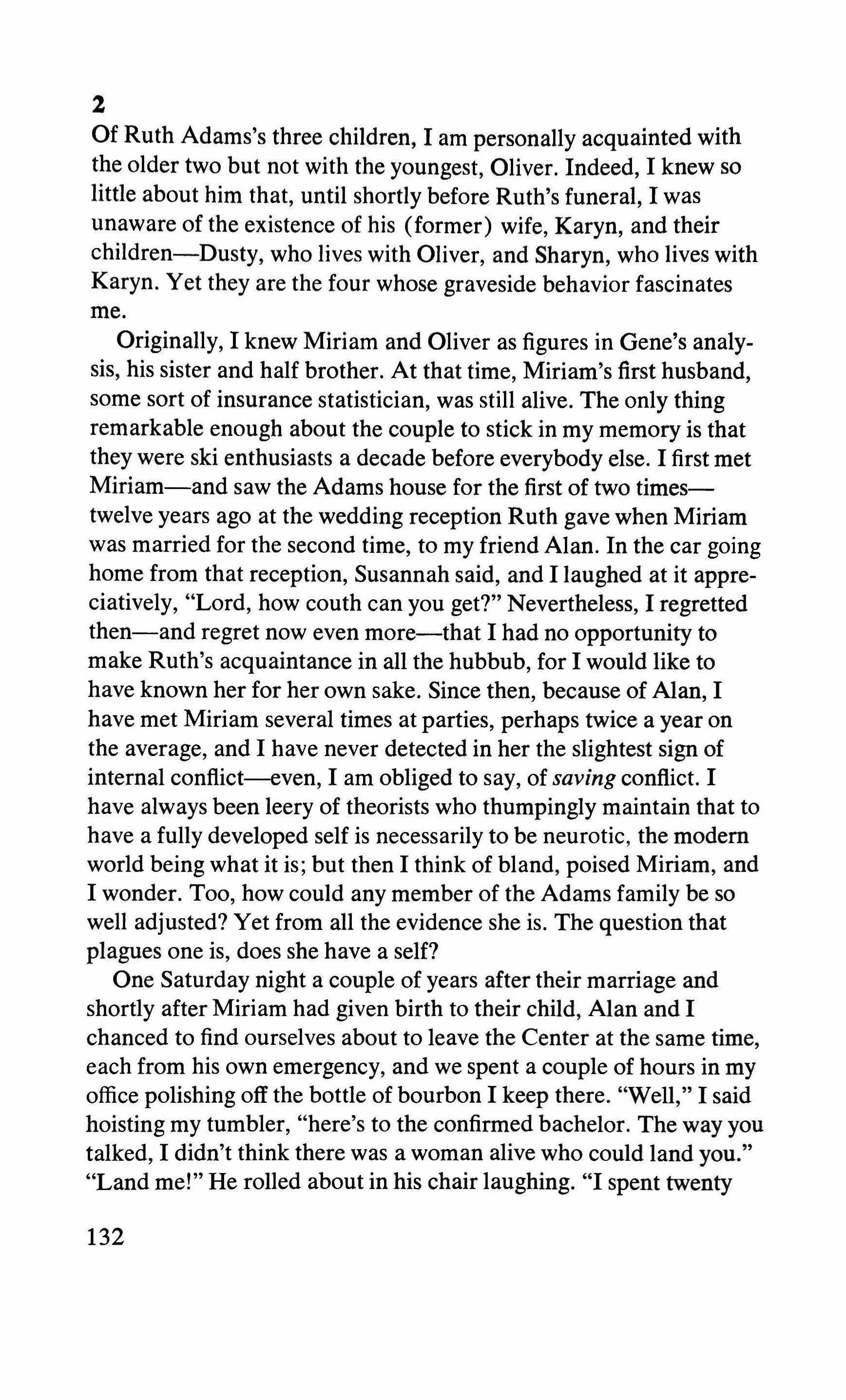
Of Ruth Adams's three children, I am personally acquainted with the older two but not with the youngest, Oliver. Indeed, I knew so little about him that, until shortly before Ruth's funeral, I was unaware of the existence of his (former) wife, Karyn, and their children-Dusty, who lives with Oliver, and Sharyn, who lives with Karyn. Yet they are the four whose graveside behavior fascinates me.
Originally, I knew Miriam and Oliver as figures in Gene's analysis, his sister and half brother. At that time, Miriam's first husband, some sort of insurance statistician, was still alive. The only thing remarkable enough about the couple to stick in my memory is that they were ski enthusiasts a decade before everybody else. I first met Miriam-and saw the Adams house for the first of two timestwelve years ago at the wedding reception Ruth gave when Miriam was married for the second time, to my friend Alan. In the car going home from that reception, Susannah said, and I laughed at it appreciatively, "Lord, how couth can you get?" Nevertheless, I regretted then-and regret now even more-that I had no opportunity to make Ruth's acquaintance in all the hubbub, for I would like to have known her for her own sake. Since then, because of Alan, I have met Miriam several times at parties, perhaps twice a year on the average, and I have never detected in her the slightest sign of internal confiict--even, I am obliged to say, of saving conflict. I have always been leery of theorists who thumpingly maintain that to have a fully developed self is necessarily to be neurotic, the modem world being what it is; but then I think of bland, poised Miriam, and I wonder. Too, how could any member of the Adams family be so well adjusted? Yet from all the evidence she is. The question that plagues one is, does she have a self?
One Saturday night a couple of years after their marriage and shortly after Miriam had given birth to their child, Alan and I chanced to find ourselves about to leave the Center at the same time, each from his own emergency, and we spent a couple of hours in my office polishing off the bottle of bourbon I keep there. "Well," I said hoisting my tumbler, "here's to the confirmed bachelor. The way you talked, I didn't think there was a woman alive who could land you." "Land me!" He rolled about in his chair laughing. "I spent twenty
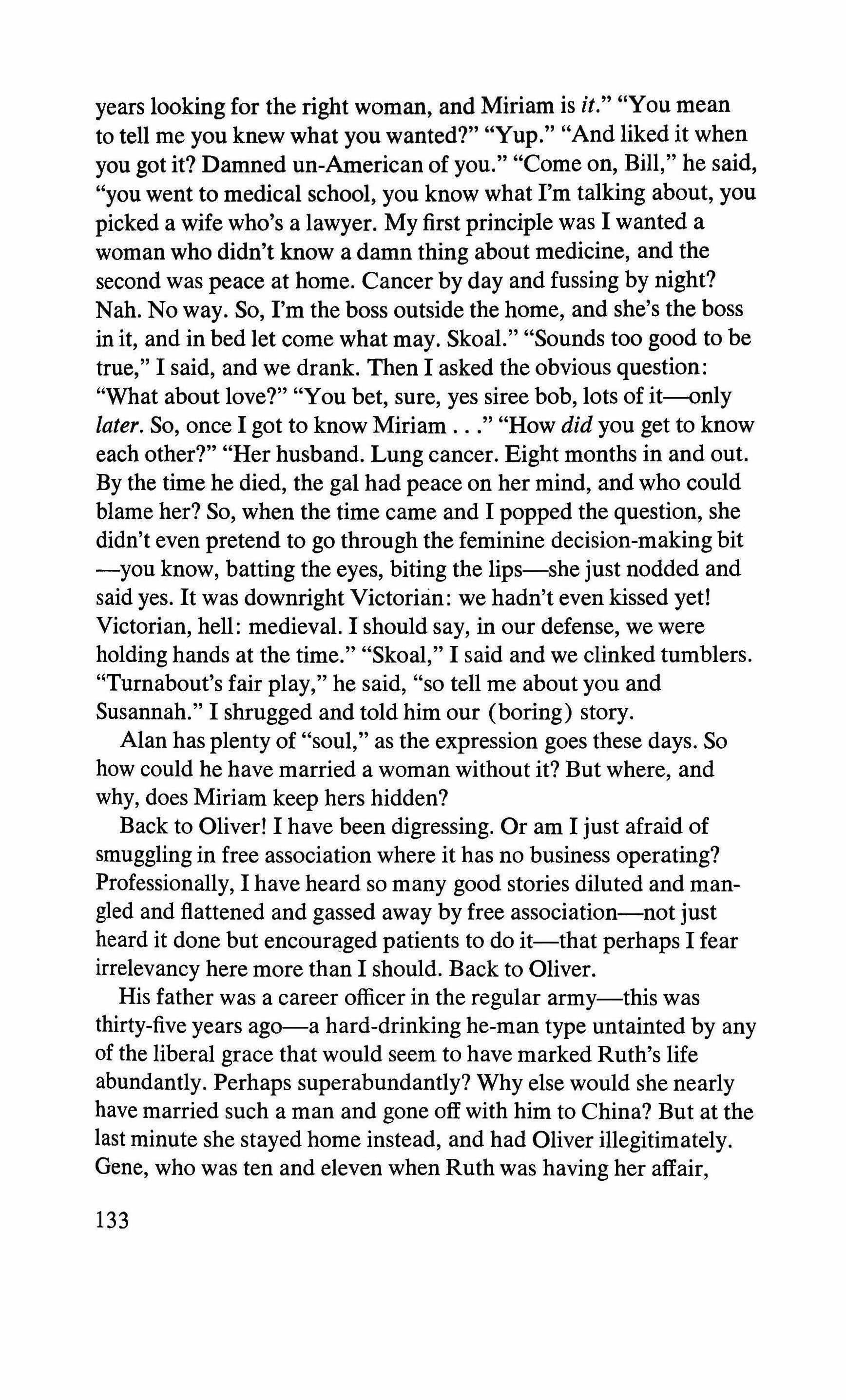
years looking for the right woman, and Miriam is it." "You mean to tell me you knew what you wanted?" "Yup." "And liked it when you got it? Damned un-American of you." "Come on, Bill," he said, "you went to medical school, you know what I'm talking about, you picked a wife who's a lawyer. My first principle was I wanted a woman who didn't know a damn thing about medicine, and the second was peace at home. Cancer by day and fussing by night? Nah. No way. So, I'm the boss outside the home, and she's the boss in it, and in bed let come what may. Skoal." "Sounds too good to be true," I said, and we drank. Then I asked the obvious question: "What about love?" "You bet, sure, yes siree bob, lots of it-only later. So, once I got to know Miriam "How did you get to know each other?" "Her husband. Lung cancer. Eight months in and out. By the time he died, the gal had peace on her mind, and who could blame her? So, when the time came and I popped the question, she didn't even pretend to go through the feminine decision-making bit -you know, batting the eyes, biting the lips-she just nodded and said yes. It was downright Victorian: we hadn't even kissed yet! Victorian, hell: medieval. I should say, in our defense, we were holding hands at the time." "Skoal," I said and we clinked tumblers. "Turnabout's fair play," he said, "so tell me about you and Susannah." I shrugged and told him our (boring) story.
Alan has plenty of "soul," as the expression goes these days. So how could he have married a woman without it? But where, and why, does Miriam keep hers hidden?
Back to Oliver! I have been digressing. Or am I just afraid of smuggling in free association where it has no business operating? Professionally, I have heard so many good stories diluted and mangled and flattened and gassed away by free association-not just heard it done but encouraged patients to do it-that perhaps I fear irrelevancy here more than I should. Back to Oliver.
His father was a career officer in the regular army-this was thirty-five years ago-a hard-drinking he-man type untainted by any of the liberal grace that would seem to have marked Ruth's life abundantly. Perhaps superabundantly? Why else would she nearly have married such a man and gone off with him to China? But at the last minute she stayed home instead, and had Oliver illegitimately. Gene, who was ten and eleven when Ruth was having her affair,

remembers Major Kotowski vividly as heavy-handed and coarse, though not cruel; according to Gene, Oliver never saw or heard from his father but takes after him both in appearance and temperament. With a difference: whereas the father's barbarism was natural, Oliver's is a hothouse variety cultivated with a goal in mind-to offend his mother. This explanation of Gene's is the pat one, probably valid enough except for what it leaves out. (Chromosomes, for instance. The more motives 1 have named over the years, the fonder 1 have grown of chromosomes. Thank God for sports!) Very well, to name a motive: Oliver called his son Dusty in order to get even with his mother for the name she had given him, Erasmus Oliver (to his friends he has always been E.O.). It worked. Ruth told her friends that her grandson's name was really John Frederick, Dusty being his nickname. As for the neobarbarism of misspelling Sharyn to match Karyn Gene laughed like a donkey over that one. Oliver is a card, he is jaunty, he is the black sheep of the family, he is "one of the boys," he sponges, he boasts of his weaknesses. Let one act he performed characterize him. A year ago, dishonorably discharged from the navy, divorced from Karyn, in debt to everyone he could hit for money, to his mother above all, working as a short-order cook in a diner in south San Francisco and living in a trailer with Dusty and one of the waitresses, he went through bankruptcy. 1 don't know the legal ins and outs, all the possibilities. What 1 do know is this: he declared to the world and his mother, "I can't and won't give you back any of what lowe you." Gene did not bray when he told me about this. On the contrary, he said he felt as though he had just been visited by a secret agent from a foreign power but had not yet decoded what the agent said; he recognized each separate word but could not grasp the whole message. My mind, too, ceases to function when 1 contemplate a symbol of such congruence, of such flawless, impenetrable density. "Mother, I am bankrupt." There isn't even any blame in it. 1 had not known ingratitude could be that pure. It reminds me of nothing so much as a purple wen the size of an egg 1 saw once on an old man's forehead. 1 know how it got there; I've seen others similar to it. Nevertheless, all 1 can do before a thing so perfect of its kind is to goggle, dull of wit and slack of jaw. To be sure, had he been my patient, 1 would not have been free to gawk at it but would have had to take it apart.
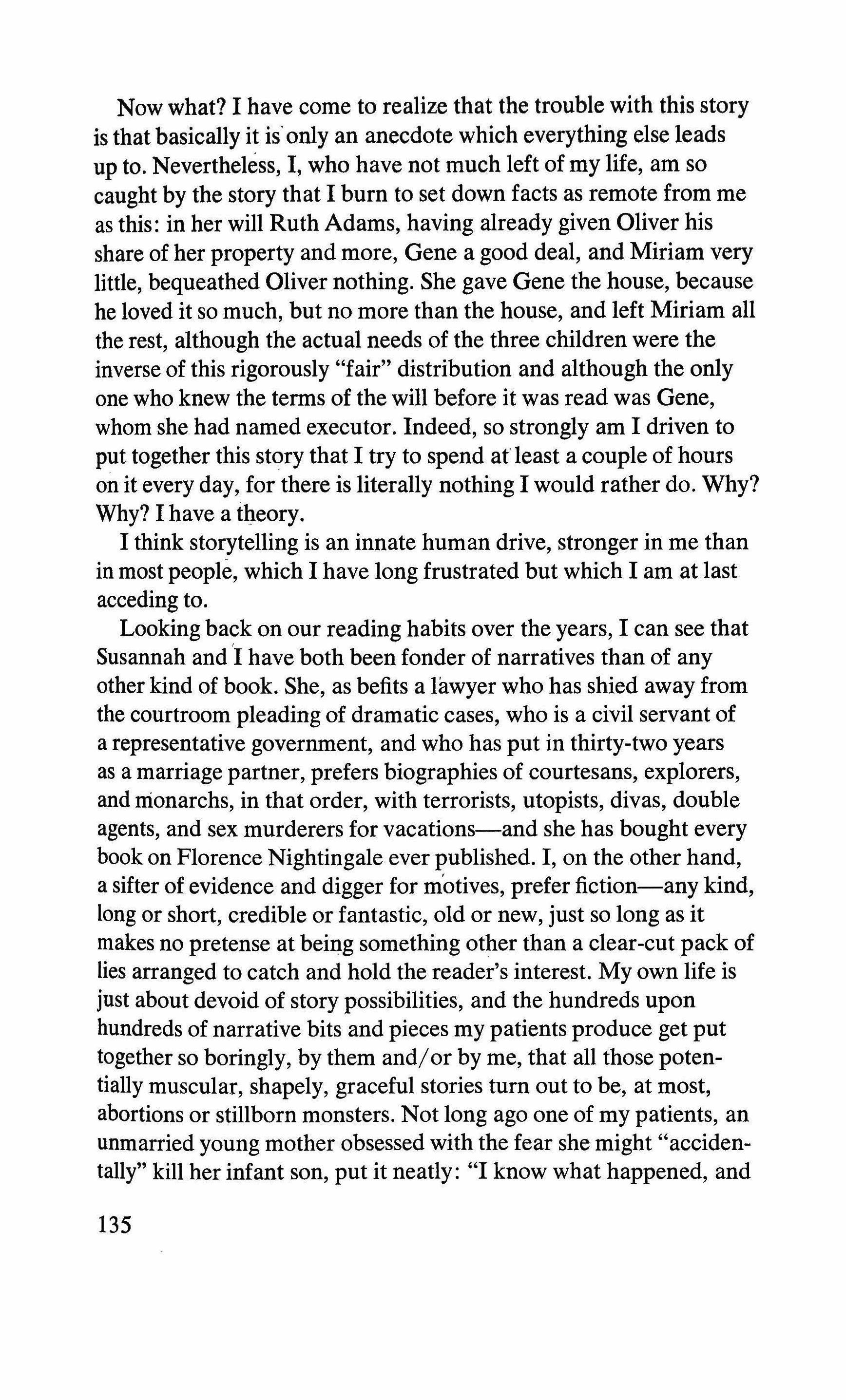
Now what? I have come to realize that the trouble with this story is that basically it is'only an anecdote which everything else leads up to. Nevertheless, I, who have not much left of my life, am so caught by the story that I burn to set down facts as remote from me as this: in her will Ruth Adams, having already given Oliver his share of her property and more, Gene a good deal, and Miriam very little, bequeathed Oliver nothing. She gave Gene the house, because he loved it so much, but no more than the house, and left Miriam all the rest, although the actual needs of the three children were the inverse of this rigorously "fair" distribution and although the only one who knew the terms of the will before it was read was Gene, whom she had named executor. Indeed, so strongly am I driven to put together this story that I try to spend atleast a couple of hours on it every day, for there is literally nothing I would rather do. Why? Why? I have a theory.
I think storytelling is an innate human drive, stronger in me than in most people, which I have long frustrated but which I am at last acceding to.
Looking back on our reading habits over the years, I can see that Susannah and 'I have both been fonder of narratives than of any other kind of book. She, as befits a lawyer who has shied away from the courtroom pleading of dramatic cases, who is a civil servant of a representative government, and who has put in thirty-two years as a marriage partner, prefers biographies of courtesans, explorers, and monarchs, in that order, with terrorists, utopists, divas, double agents, and sex murderers for vacations-and she has bought every book on Florence Nightingale ever published. I, on the other hand, a sifter of evidence and digger for motives, prefer fiction-any kind, long or short, credible or fantastic, old or new, just so long as it makes no pretense at being something other than a clear-cut pack of lies arranged to catch and hold the reader's interest. My own life is just about devoid of story possibilities, and the hundreds upon hundreds of narrative bits and pieces my patients produce get put together so boringly, by them and/or by me, that all those potentially muscular, shapely, graceful stories turn out to be, at most, abortions or stillborn monsters. Not long ago one of my patients, an unmarried young mother obsessed with the fear she might "accidentally" kill her infant son, put it neatly: "I know what happened, and
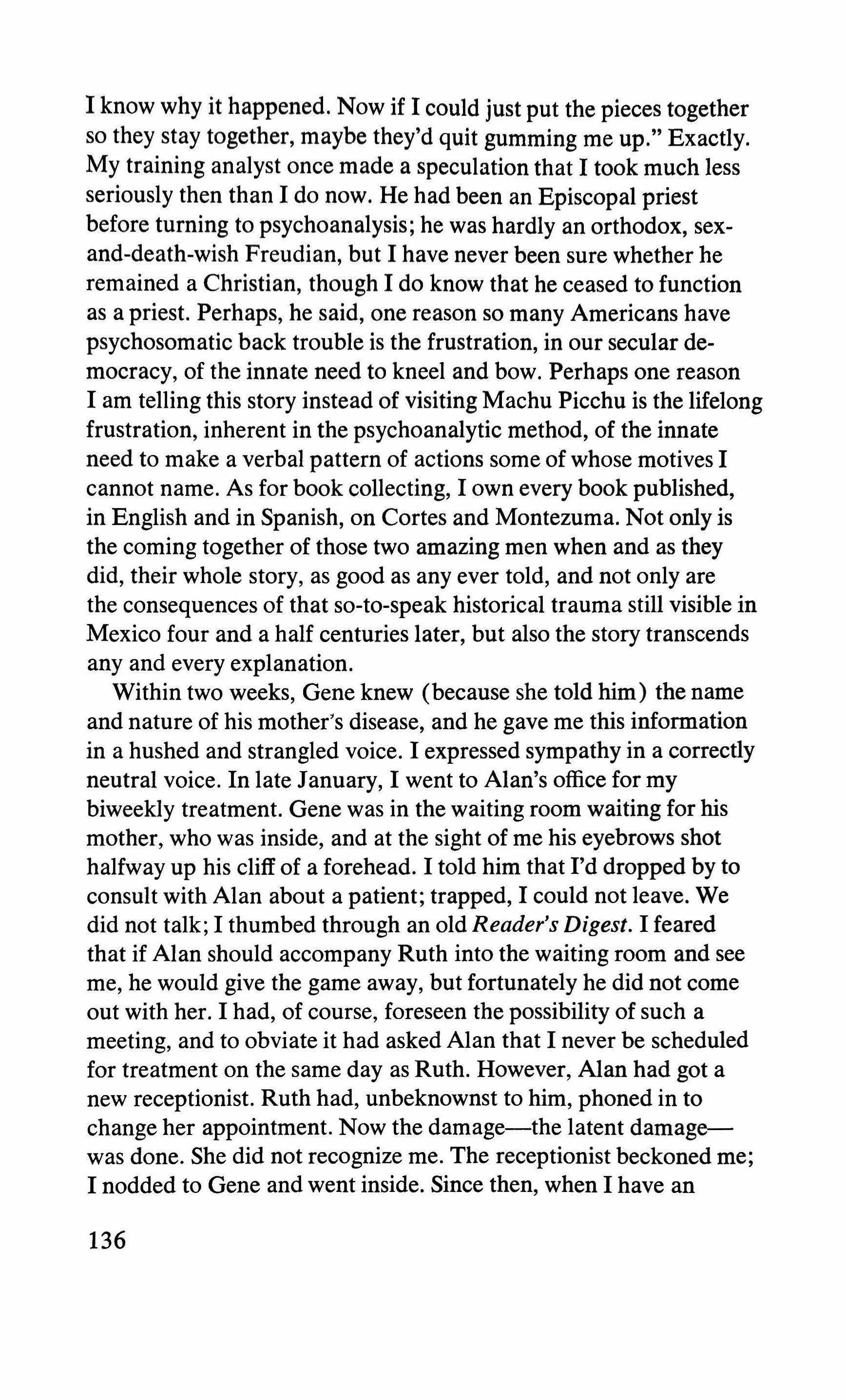
I know why it happened. Now if I could just put the pieces together so they stay together, maybe they'd quit gumming me up." Exactly. My training analyst once made a speculation that I took much less seriously then than I do now. He had been an Episcopal priest before turning to psychoanalysis; he was hardly an orthodox, sexand-death-wish Freudian, but I have never been sure whether he remained a Christian, though I do know that he ceased to function as a priest. Perhaps, he said, one reason so many Americans have psychosomatic back trouble is the frustration, in our secular democracy, of the innate need to kneel and bow. Perhaps one reason I am telling this story instead of visiting Machu Picchu is the lifelong frustration, inherent in the psychoanalytic method, of the innate need to make a verbal pattern of actions some of whose motives I cannot name. As for book collecting, I own every book published, in English and in Spanish, on Cortes and Montezuma. Not only is the coming together of those two amazing men when and as they did, their whole story, as good as any ever told, and not only are the consequences of that so-to-speak historical trauma still visible in Mexico four and a half centuries later, but also the story transcends any and every explanation. Within two weeks, Gene knew (because she told him) the name and nature of his mother's disease, and he gave me this information in a hushed and strangled voice. I expressed sympathy in a correctly neutral voice. In late January, I went to Alan's office for my biweekly treatment. Gene was in the waiting room waiting for his mother, who was inside, and at the sight of me his eyebrows shot halfway up his cliff of a forehead. I told him that I'd dropped by to consult with Alan about a patient; trapped, I could not leave. We did not talk; I thumbed through an old Reader's Digest. I feared that if Alan should accompany Ruth into the waiting room and see me, he would give the game away, but fortunately he did not come out with her. I had, of course, foreseen the possibility of such a meeting, and to obviate it had asked Alan that I never be scheduled for treatment on the same day as Ruth. However, Alan had got a new receptionist. Ruth had, unbeknownst to him, phoned in to change her appointment. Now the damage-the latent damagewas done. She did not recognize me. The receptionist beckoned me; I nodded to Gene and went inside. Since then, when I have an
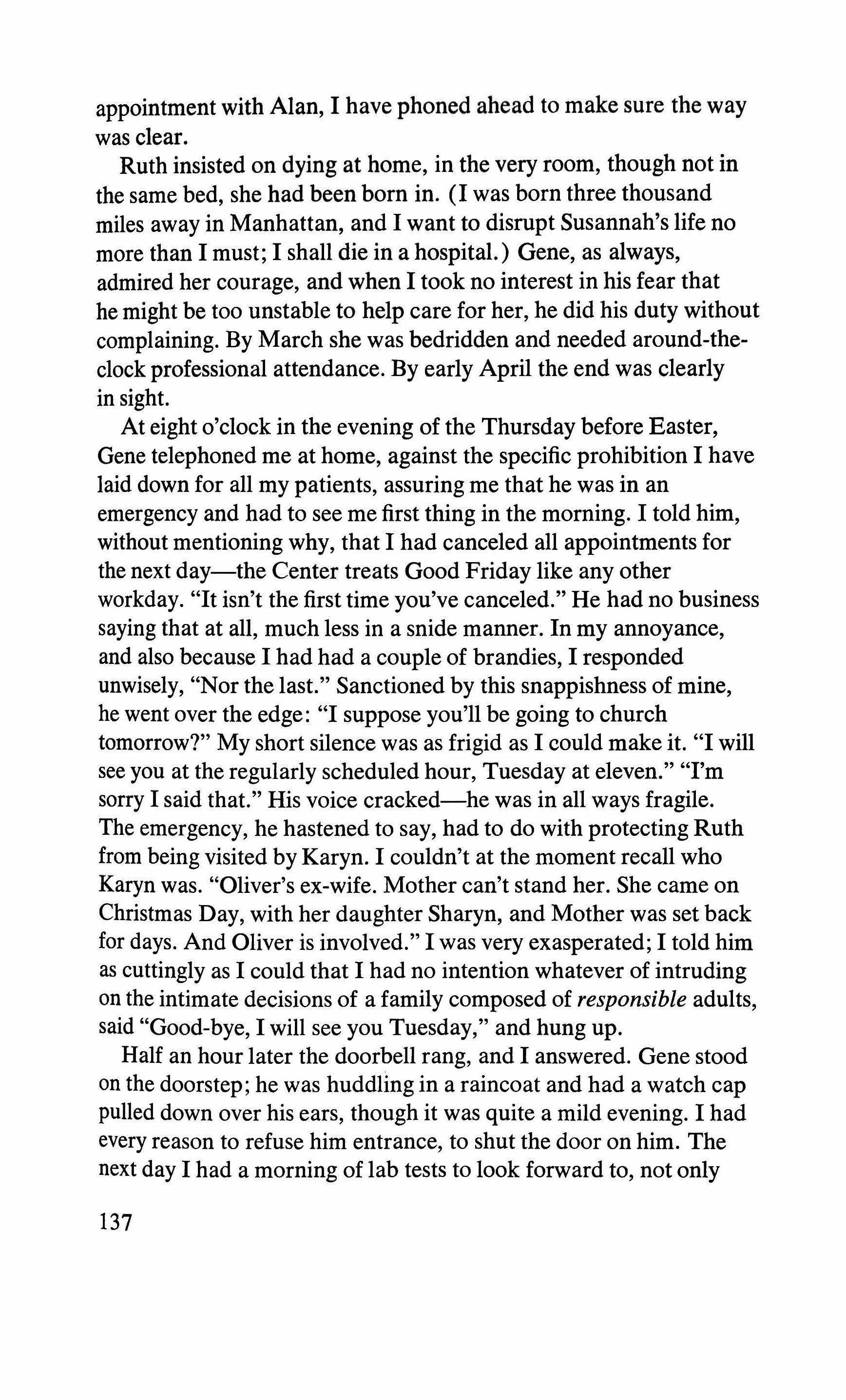
appointment with Alan, I have phoned ahead to make sure the way was clear.
Ruth insisted on dying at home, in the very room, though not in the same bed, she had been born in. (I was born three thousand miles away in Manhattan, and I want to disrupt Susannah's life no more than I must; I shall die in a hospital.) Gene, as always, admired her courage, and when I took no interest in his fear that he might be too unstable to help care for her, he did his duty without complaining. By March she was bedridden and needed around-theclock professional attendance. By early April the end was clearly in sight.
At eight o'clock in the evening of the Thursday before Easter, Gene telephoned me at home, against the specific prohibition I have laid down for all my patients, assuring me that he was in an emergency and had to see me first thing in the morning. I told him, without mentioning why, that I had canceled all appointments for the next day-the Center treats Good Friday like any other workday. "It isn't the first time you've canceled." He had no business saying that at all, much less in a snide manner. In my annoyance, and also because I had had a couple of brandies, I responded unwisely, "Nor the last." Sanctioned by this snappishness of mine, he went over the edge: "I suppose you'll be going to church tomorrow?" My short silence was as frigid as I could make it. "I will see you at the regularly scheduled hour, Tuesday at eleven." "I'm sorry I said that." His voice cracked-he was in all ways fragile. The emergency, he hastened to say, had to do with protecting Ruth from being visited by Karyn. I couldn't at the moment recall who Karyn was. "Oliver's ex-wife. Mother can't stand her. She came on Christmas Day, with her daughter Sharyn, and Mother was set back for days. And Oliver is involved." I was very exasperated; I told him as cuttingly as I could that I had no intention whatever of intruding on the intimate decisions of a family composed of responsible adults, said "Good-bye, I will see you Tuesday," and hung up. Half an hour later the doorbell rang, and I answered. Gene stood on the doorstep; he was huddling in a raincoat and had a watch cap pulled down over his ears, though it was quite a mild evening. I had every reason to refuse him entrance, to shut the door on him. The next day I had a morning of lab tests to look forward to, not only
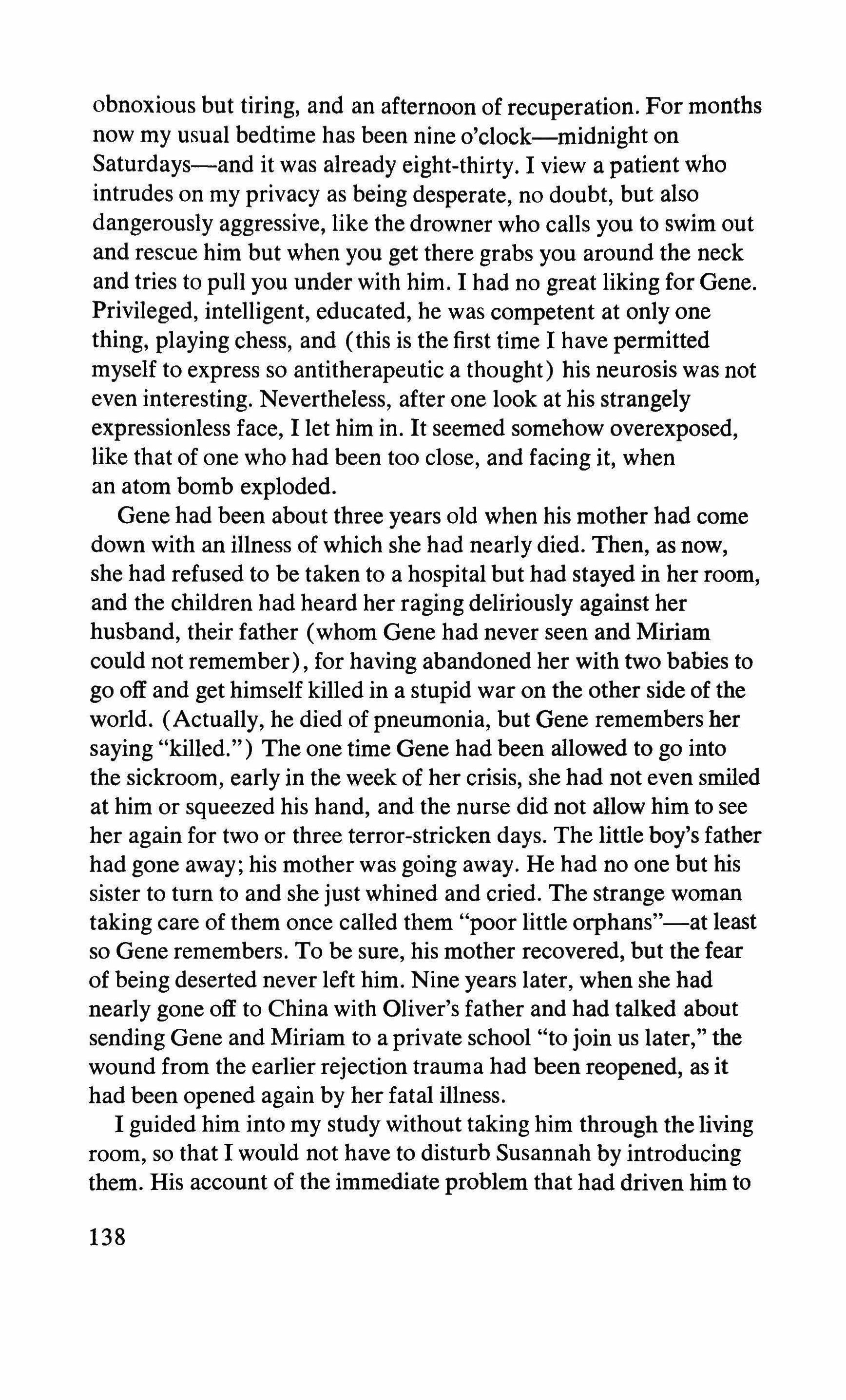
obnoxious but tiring, and an afternoon of recuperation. For months now my usual bedtime has been nine o'clock-midnight on Saturdays-and it was already eight-thirty. I view a patient who intrudes on my privacy as being desperate, no doubt, but also dangerously aggressive, like the drowner who calls you to swim out and rescue him but when you get there grabs you around the neck and tries to pull you under with him. I had no great liking for Gene. Privileged, intelligent, educated, he was competent at only one thing, playing chess, and (this is the first time I have permitted myself to express so antitherapeutic a thought) his neurosis was not even interesting. Nevertheless, after one look at his strangely expressionless face, I let him in. It seemed somehow overexposed, like that of one who had been too close, and facing it, when an atom bomb exploded.
Gene had been about three years old when his mother had come down with an illness of which she had nearly died. Then, as now, she had refused to be taken to a hospital but had stayed in her room, and the children had heard her raging deliriously against her husband, their father (whom Gene had never seen and Miriam could not remember), for having abandoned her with two babies to go off and get himself killed in a stupid war on the other side of the world. (Actually, he died of pneumonia, but Gene remembers her saying "killed.") The one time Gene had been allowed to go into the sickroom, early in the week of her crisis, she had not even smiled at him or squeezed his hand, and the nurse did not allow him to see her again for two or three terror-stricken days. The little boy's father had gone away; his mother was going away. He had no one but his sister to turn to and she just whined and cried. The strange woman taking care of them once called them "poor little orphans"-at least so Gene remembers. To be sure, his mother recovered, but the fear of being deserted never left him. Nine years later, when she had nearly gone off to China with Oliver's father and had talked about sending Gene and Miriam to a private school "to join us later," the wound from the earlier rejection trauma had been reopened, as it had been opened again by her fatal illness.
I guided him into my study without taking him through the living room, so that I would not have to disturb Susannah by introducing them. His account of the immediate problem that had driven him to
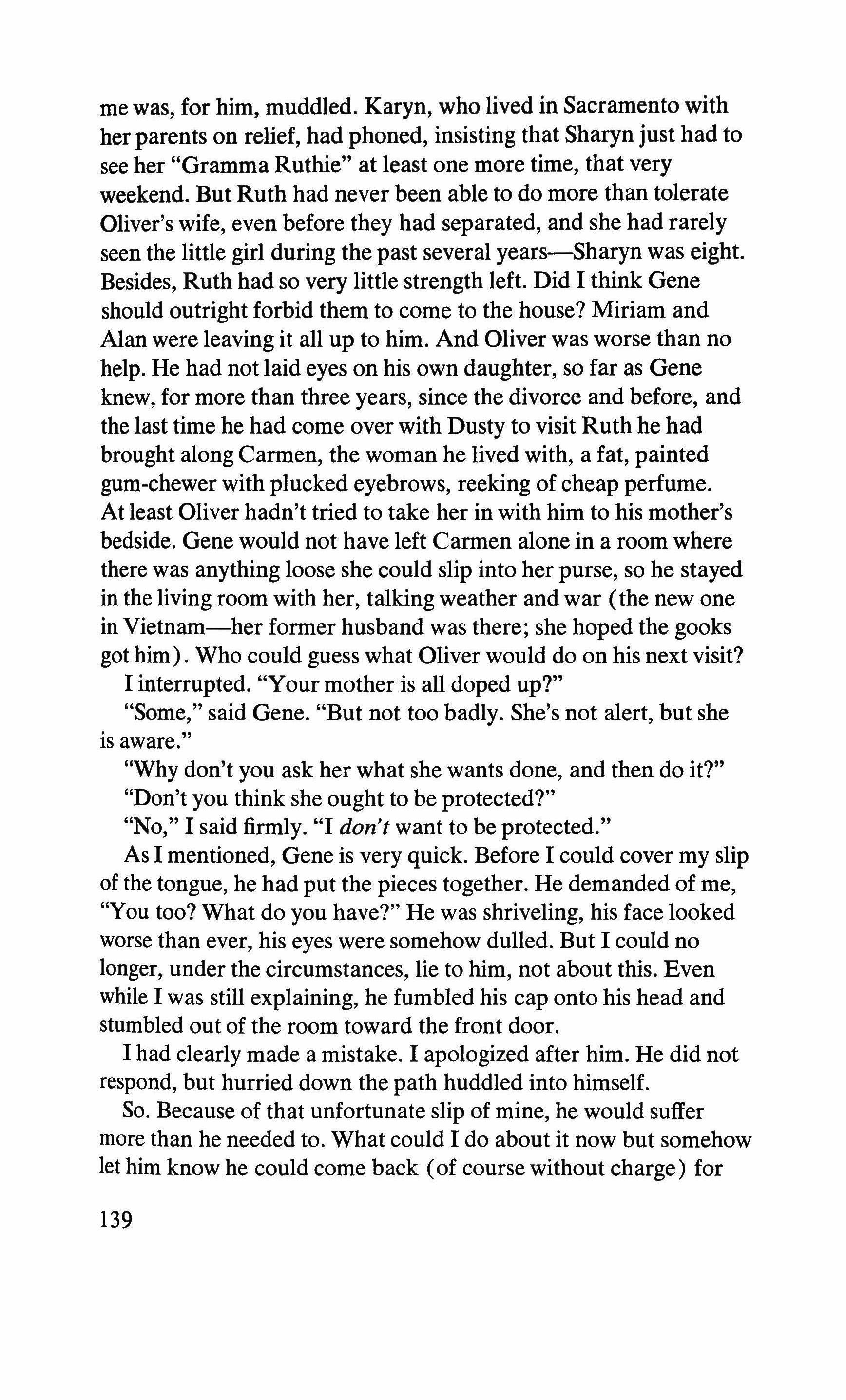
me was, for him, muddled. Karyn, who lived in Sacramento with her parents on relief, had phoned, insisting that Sharyn just had to see her "Gramma Ruthie" at least one more time, that very weekend. But Ruth had never been able to do more than tolerate Oliver's wife, even before they had separated, and she had rarely seen the little girl during the past several years-Sharyn was eight. Besides, Ruth had so very little strength left. Did I think Gene should outright forbid them to come to the house? Miriam and Alan were leaving it all up to him. And Oliver was worse than no help. He had not laid eyes on his own daughter, so far as Gene knew, for more than three years, since the divorce and before, and the last time he had come over with Dusty to visit Ruth he had brought along Carmen, the woman he lived with, a fat, painted gum-chewer with plucked eyebrows, reeking of cheap perfume. At least Oliver hadn't tried to take her in with him to his mother's bedside. Gene would not have left Carmen alone in a room where there was anything loose she could slip into her purse, so he stayed in the living room with her, talking weather and war (the new one in Vietnam-her former husband was there; she hoped the gooks got him). Who could guess what Oliver would do on his next visit?
I interrupted. "Your mother is all doped up?"
"Some," said Gene. "But not too badly. She's not alert, but she is aware."
"Why don't you ask her what she wants done, and then do it?"
"Don't you think she ought to be protected?"
"No," I said firmly. "1 don't want to be protected."
As I mentioned, Gene is very quick. Before 1 could cover my slip of the tongue, he had put the pieces together. He demanded of me, "You too? What do you have?" He was shriveling, his face looked worse than ever, his eyes were somehow dulled. But I could no longer, under the circumstances, lie to him, not about this. Even while 1 was still explaining, he fumbled his cap onto his head and stumbled out of the room toward the front door.
I had clearly made a mistake. I apologized after him. He did not respond, but hurried down the path huddled into himself.
So. Because of that unfortunate slip of mine, he would suffer more than he needed to. What could 1 do about it now but somehow let him know he could come back (of course without charge) for
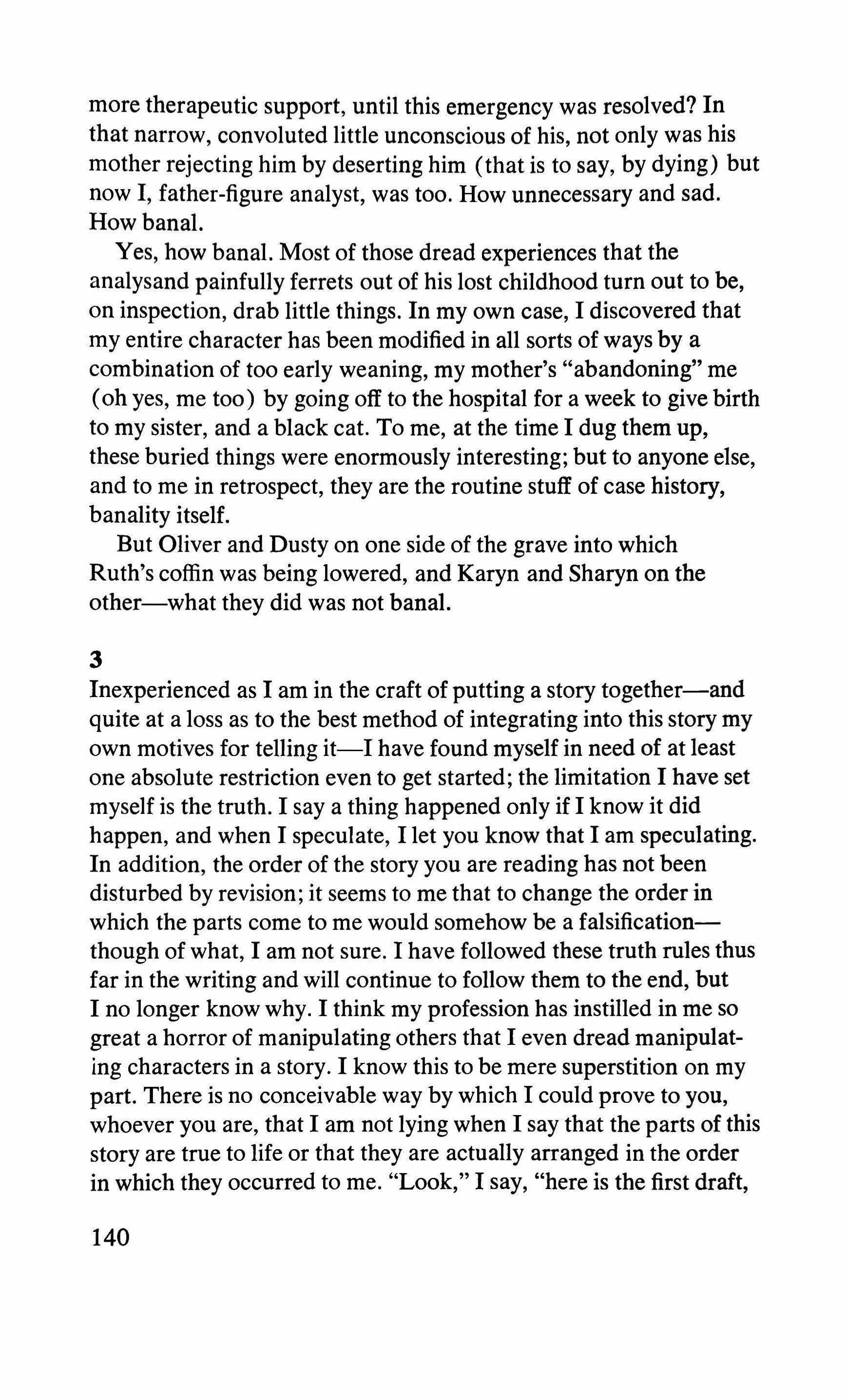
more therapeutic support, until this emergency was resolved? In that narrow, convoluted little unconscious of his, not only was his mother rejecting him by deserting him (that is to say, by dying) but now I, father-figure analyst, was too. How unnecessary and sad. How banal.
Yes, how banal. Most of those dread experiences that the analysand painfully ferrets out of his lost childhood turn out to be, on inspection, drab little things. In my own case, I discovered that my entire character has been modified in all sorts of ways by a combination of too early weaning, my mother's "abandoning" me (oh yes, me too) by going off to the hospital for a week to give birth to my sister, and a black cat. To me, at the time I dug them up, these buried things were enormously interesting; but to anyone else, and to me in retrospect, they are the routine stuff of case history, banality itself.
But Oliver and Dusty on one side of the grave into which Ruth's coffin was being lowered, and Karyn and Sharyn on the other-what they did was not banal.
Inexperienced as I am in the craft of putting a story together-and quite at a loss as to the best method of integrating into this story my own motives for telling it-I have found myself in need of at least one absolute restriction even to get started; the limitation I have set myself is the truth. I say a thing happened only if I know it did happen, and when I speculate, I let you know that I am speculating. In addition, the order of the story you are reading has not been disturbed by revision; it seems to me that to change the order in which the parts come to me would somehow be a falsificationthough of what, I am not sure. I have followed these truth rules thus far in the writing and will continue to follow them to the end, but I no longer know why. I think my profession has instilled in me so great a horror of manipulating others that I even dread manipulating characters in a story. I know this to be mere superstition on my part. There is no conceivable way by which I could prove to you, whoever you are, that I am not lying when I say that the parts of this story are true to life or that they are actually arranged in the order in which they occurred to me. "Look," I say, "here is the first draft,

here are the corrections I have made in the sentences, here is the final copy." "Oh?" you reply. "How do I know what was thrown into the wastebasket? What went on in your consciousness before the words got onto the page? And as for your unconscious-well!" Or take that last episode with Gene in my study. He could verify my slip of the tongue, the words I uttered, the fact that I appeared not to have planned to utter them, but his account of what happened would surely make you think that my unconscious motive for making that slip was malice against him; whereas my account, without precluding malice, allows you to interpret my motive as being rather more complex. Furthermore, he might very well see a connection, which I do not see, between that slip of the tongue and what happened after his mother's death. Unless the story were to be reduced to case history, his need to blame someone and my need to exonerate myself could not possibly leave our respective versions of it untouched. Now if he, from whom I have got most of these facts, would not necessarily see this whole assembled story of mine as true, how much less could anybody else so see it? And since no stranger could know whether I am telling the truth, why in fact do I stick with it? Not for the good of the story. One truth I am sure of is that truths of the kind I am adhering to simply do not matter at all to that stranger, the reader, and for whom is a story written if not for him? This is not a diary; it is not history; it is a story, what I myself called "a pack of lies"--only all the lies in this pack happen to be true as well. I may be guilty of special pleading, but the reader cannot be sure of that. Indeed, when I am reading a story, I get itchy if I suspect its real author of special pleading. Special pleading can be suitable for the "I," but it must not escape from the sentences into real life and attach itself to the author's own confessing self; sentences are the breath and blood of fiction. In other words, by sticking to my self-imposed truth rules I am playing an absolutely gratuitous private game, meaningless to anyone but myself; yet I am as compelled to play it as I am to write syntactically acceptable sentences. What lies behind this compulsion is, I suppose, my abhorrence of manipulation. I suppose, too, that this scruple is inappropriate to storytelling, since the reader, without whom the story is not all there, couldn't care less. Rather, it doesn't matter whether he cares or not, for if I control my sentences there is no
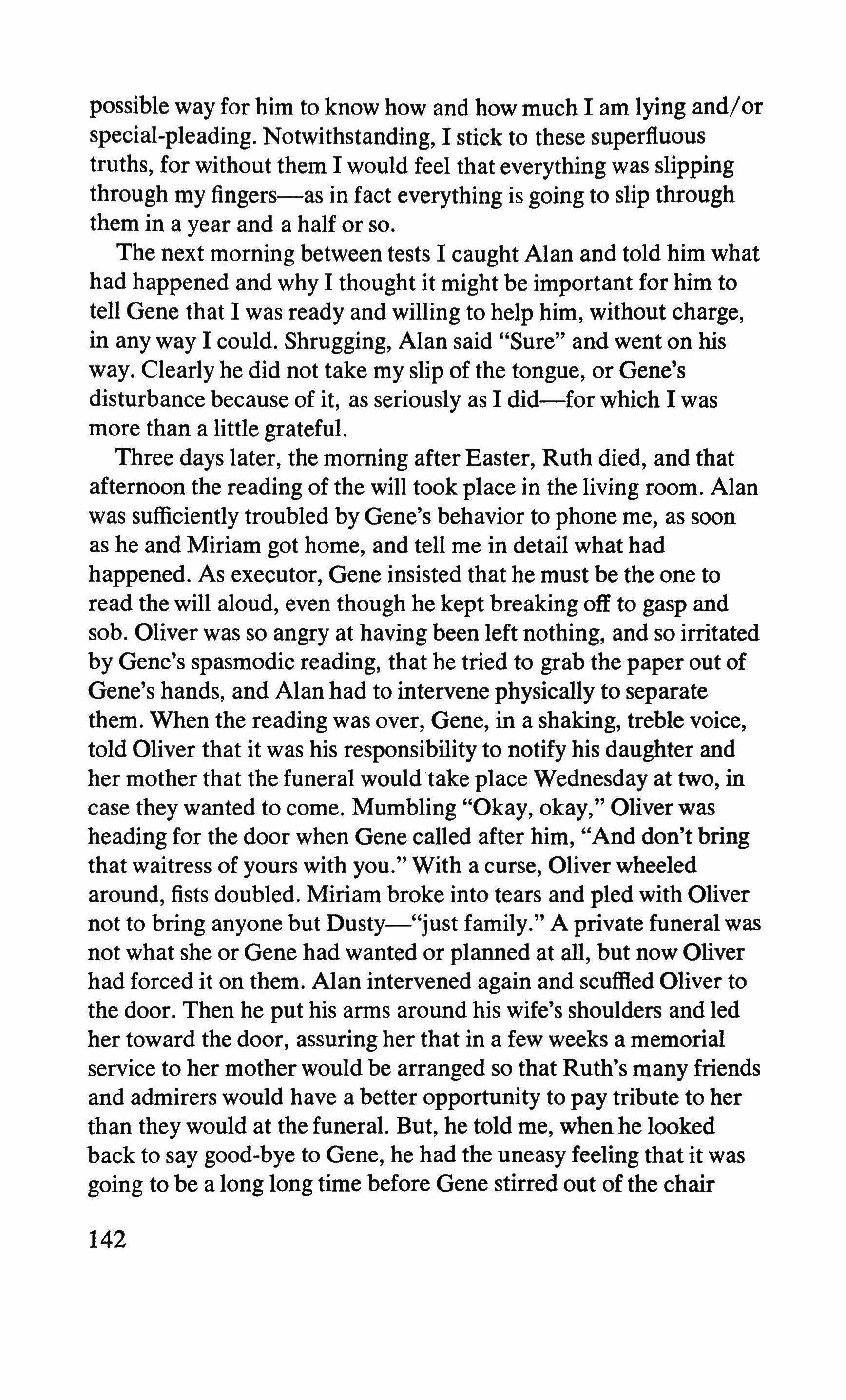
possible way for him to know how and how much I am lying and/or special-pleading. Notwithstanding, I stick to these superfluous truths, for without them I would feel that everything was slipping through my fingers-as in fact everything is going to slip through them in a year and a half or so.
The next morning between tests I caught Alan and told him what had happened and why I thought it might be important for him to tell Gene that I was ready and willing to help him, without charge, in any way I could. Shrugging, Alan said "Sure" and went on his way. Clearly he did not take my slip of the tongue, or Gene's disturbance because of it, as seriously as I did-for which I was more than a little grateful.
Three days later, the morning after Easter, Ruth died, and that afternoon the reading of the will took place in the living room. Alan was sufficiently troubled by Gene's behavior to phone me, as soon as he and Miriam got home, and tell me in detail what had happened. As executor, Gene insisted that he must be the one to read the will aloud, even though he kept breaking off to gasp and sob. Oliver was so angry at having been left nothing, and so irritated by Gene's spasmodic reading, that he tried to grab the paper out of Gene's hands, and Alan had to intervene physically to separate them. When the reading was over, Gene, in a shaking, treble voice, told Oliver that it was his responsibility to notify his daughter and her mother that the funeral wouldtake place Wednesday at two, in case they wanted to come. Mumbling "Okay, okay," Oliver was heading for the door when Gene called after him, "And don't bring that waitress of yours with you." With a curse, Oliver wheeled around, fists doubled. Miriam broke into tears and pled with Oliver not to bring anyone but Dusty-"just family." A private funeral was not what she or Gene had wanted or planned at all, but now Oliver had forced it on them. Alan intervened again and scuffled Oliver to the door. Then he put his arms around his wife's shoulders and led her toward the door, assuring her that in a few weeks a memorial service to her mother would be arranged so that Ruth's many friends and admirers would have a better opportunity to pay tribute to her than they would at the funeral. But, he told me, when he looked back to say good-bye to Gene, he had the uneasy feeling that it was going to be a long long time before Gene stirred out of the chair
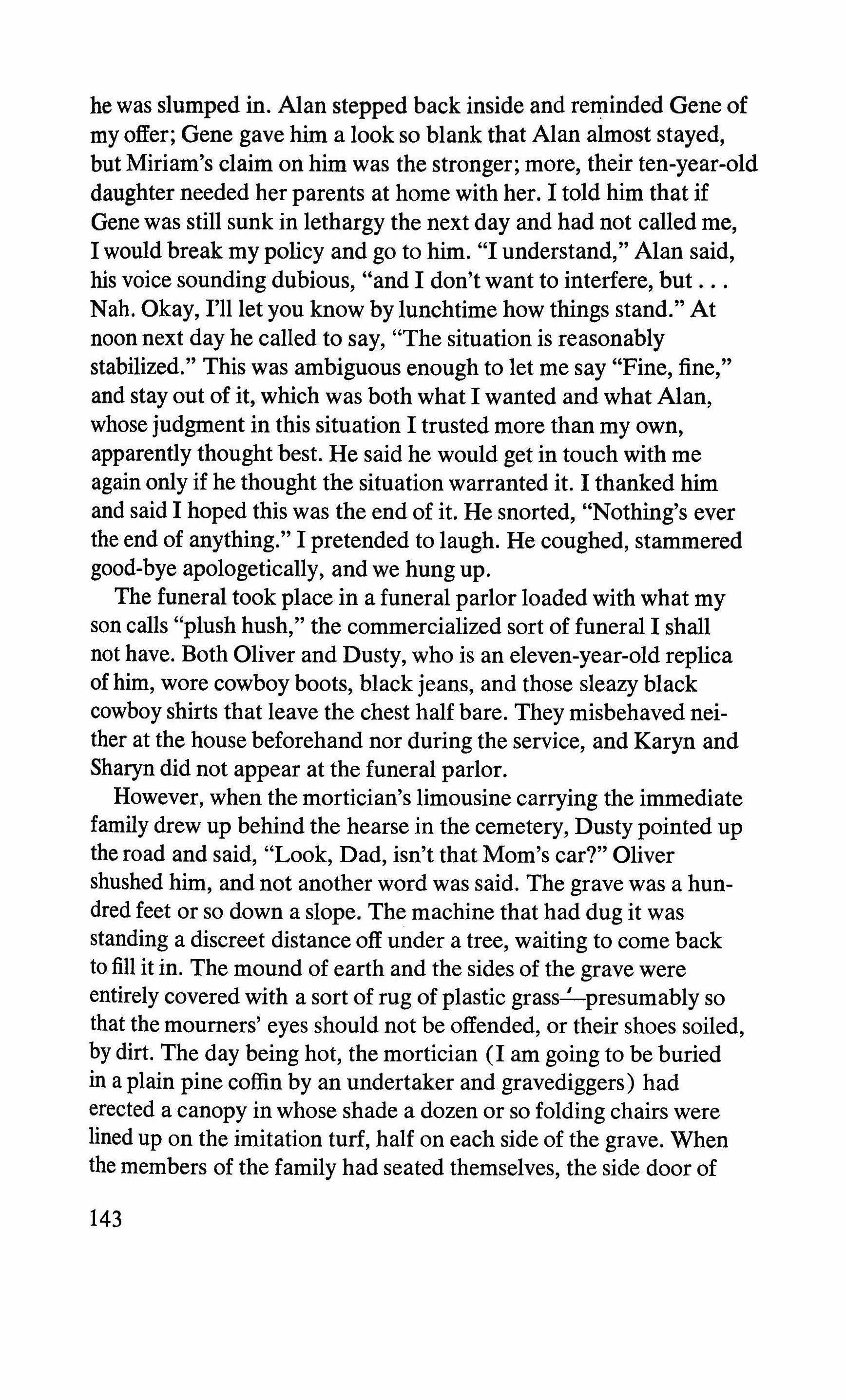
he was slumped in. Alan stepped back inside and reminded Gene of my offer; Gene gave him a look so blank that Alan almost stayed, but Miriam's claim on him was the stronger; more, their ten-year-old daughter needed her parents at home with her. 1 told him that if Gene was still sunk in lethargy the next day and had not called me, 1 would break my policy and go to him. "1 understand," Alan said, his voice sounding dubious, "and 1 don't want to interfere, but Nah. Okay, I'll let you know by lunchtime how things stand." At noon next day he called to say, "The situation is reasonably stabilized." This was ambiguous enough to let me say "Fine, fine," and stay out of it, which was both what 1 wanted and what Alan, whose judgment in this situation 1 trusted more than my own, apparently thought best. He said he would get in touch with me again only if he thought the situation warranted it. 1 thanked him and said 1 hoped this was the end of it. He snorted, "Nothing's ever the end of anything." 1 pretended to laugh. He coughed, stammered good-bye apologetically, and we hung up.
The funeral took place in a funeral parlor loaded with what my son calls "plush hush," the commercialized sort of funeral 1 shall not have. Both Oliver and Dusty, who is an eleven-year-old replica of him, wore cowboy boots, black jeans, and those sleazy black cowboy shirts that leave the chest half bare. They misbehaved neither at the house beforehand nor during the service, and Karyn and Sharyn did not appear at the funeral parlor.
However, when the mortician's limousine carrying the immediate family drew up behind the hearse in the cemetery, Dusty pointed up the road and said, "Look, Dad, isn't that Mom's car?" Oliver shushed him, and not another word was said. The grave was a hundred feet or so down a slope. The machine that had dug it was standing a discreet distance off under a tree, waiting to come back to fill it in. The mound of earth and the sides of the grave were entirely covered with a sort of rug of plastic grass-'presumably so that the mourners' eyes should not be offended, or their shoes soiled, by dirt. The day being hot, the mortician (1 am going to be buried in a plain pine coffin by an undertaker and gravediggers) had erected a canopy in whose shade a dozen or so folding chairs were lined up on the imitation turf, half on each side of the grave. When the members of the family had seated themselves, the side door of

the hearse swung open and the casket swiveled out unctuously and was eased onto a dolly. At the same time, the doors of the car down the road opened, and Karyn and Sharyn got out and started toward the grave. The mortician waited till they had joined the others. They took seats directly across from Oliver and Dusty. (When Alan was telling me this, he commented drily that Karyn wore yellow sateen slacks and Sharyn a frilly pink dress, and that both mother and daughter wore open sandals and had their toenails painted cherry red.) The mortician and his men trundled the sleek, shiny casket down to the grave. Whoever said the words said them, the casket was positioned and windlassed down, all eight hundred dollars' worth of it; the straps were loosened; the mortician let it be known that the service was over. The family walked back to the automobiles, the canopy and its poles were collapsed and bundled, the green rug was folded, the digging machine coughed and started, the cars drove away. And not once in all that time, according to what Alan saw and learned from Miriam, Gene, and the others afterward, not once did Oliver look across at his daughter or she at him, and not once did Karyn look across at her son or he at her. Alan's ten-yearold daughter maintained that at the end, when people were standing to leave, Dusty winked at Sharyn and she stuck out her tongue at him. Gene's former wives were both present too. Each had come in her own car, and afterward each embraced Miriam, pressed Gene's hand, said hello to the others, and drove away. Oliver mumbled to Gene, as he and Rusty were leaving, that he had to get back to work; they were shorthanded at the diner and he hadn't been able to get the day off. One detail Alan told me with a sad shake of his head: All day, for the two hours from the time Oliver and Dusty arrived at the house until they drove back to south San Francisco, Dusty was every moment within easy touching distance of his father and was more often touching him than not, if only with a little finger hooked in a belt loop-except when getting in or out of the car, which he did on the driver's side, scooching under the wheel fast, but even so never getting out of lunge-range of his father.
Writing the above paragraph about the graveside episode so distressed me that I put the story aside for a week. Now, havingjust reread it, I am as little touched by it as though it were really about something else; yet that was the episode that first seized my imagina-
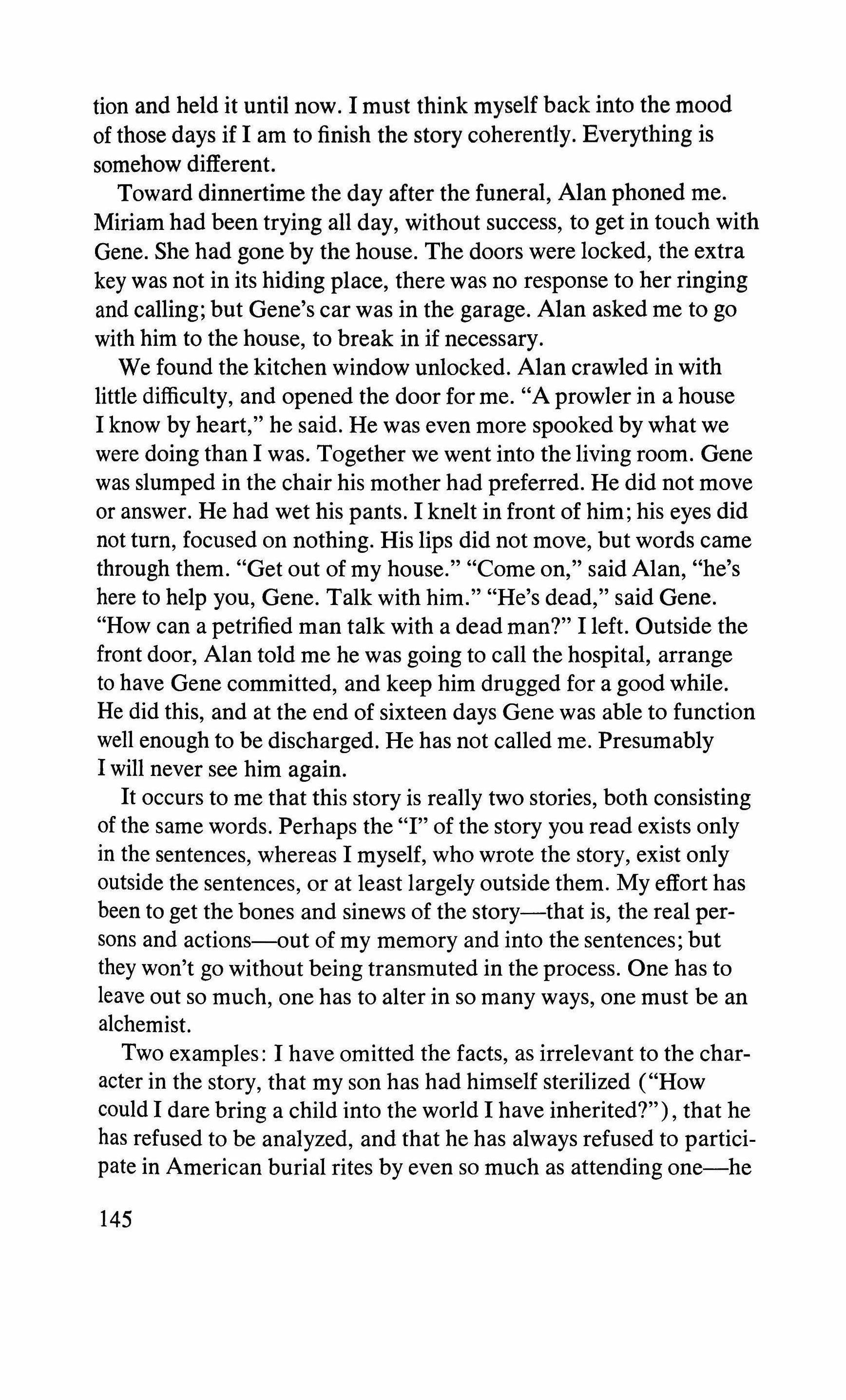
tion and held it until now. I must think myself back into the mood of those days if I am to finish the story coherently. Everything is somehow different.
Toward dinnertime the day after the funeral, Alan phoned me. Miriam had been trying all day, without success, to get in touch with Gene. She had gone by the house. The doors were locked, the extra key was not in its hiding place, there was no response to her ringing and calling; but Gene's car was in the garage. Alan asked me to go with him to the house, to break in if necessary.
We found the kitchen window unlocked. Alan crawled in with little difficulty, and opened the door for me. "A prowler in a house I know by heart," he said. He was even more spooked by what we were doing than I was. Together we went into the living room. Gene was slumped in the chair his mother had preferred. He did not move or answer. He had wet his pants. I knelt in front of him; his eyes did not turn, focused on nothing. His lips did not move, but words came through them. "Get out of my house." "Come on," said Alan, "he's here to help you, Gene. Talk with him." "He's dead," said Gene. "How can a petrified man talk with a dead man?" I left. Outside the front door, Alan told me he was going to call the hospital, arrange to have Gene committed, and keep him drugged for a good while. He did this, and at the end of sixteen days Gene was able to function well enough to be discharged. He has not called me. Presumably I will never see him again.
It occurs to me that this story is really two stories, both consisting of the same words. Perhaps the "I" of the story you read exists only in the sentences, whereas I myself, who wrote the story, exist only outside the sentences, or at least largely outside them. My effort has been to get the bones and sinews of the story-that is, the real persons and actions-out of my memory and into the sentences; but they won't go without being transmuted in the process. One has to leave out so much, one has to alter in so many ways, one must be an alchemist.
Two examples: I have omitted the facts, as irrelevant to the character in the story, that my son has had himself sterilized ("How could I dare bring a child into the world I have inherited?"), that he has refused to be analyzed, and that he has always refused to participate in American burial rites by even so much as attending one-he

believes that in an advanced society they should be abolished and should be replaced, if anything, by a memorial service. (I suddenly understand why 1 shall be so finicky about when to notify him of my illness and approaching death. It should be late enough so that he can plansibly use my enfeebled condition as the reason for cutting his visit short-the emotional strain on me really will be exhausting -yet not so late that he will need to trump up some excuse for not attending my funeral once he is back in the field. It really is an expensive trip from the mountains of Guatemala to Berkeley.) For the same narrative reason-irrelevance-I have not given a physical description of the actual Alan, and my suggestions of his way of laughing cannot evoke in a stranger's mind the laughter of the man I know. Yet they may summon forth in the reader's imagination a transmuted simulacrum of that laughter, suitable for the story in the sentences. Perhaps the reason 1 have been compelled to tell this story according to my self-imposed truth rules is that I desperately want the two stories to be identical. If the "I" evoked in the reader's imagination when he reads the story-in-the-sentences is I myself who experienced the story-in-life, then not all of me will have died. I know this is superstition; it isn't even good alchemy. But the story of my own life is so banal, both its parts and any possible assemblage of them, that if I am to get into a story at all it can only be in the sentences-there's a motive named. Nevertheless, I cannot get it out of my head that even to the reader a story is more than its sentences, its breath and blood. The bones and sinews of that great story of Cortes and Montezuma, the historical givens, are all there in the world independent of any narrator's sentences. Furthermore, they are handsomely ordered; they seem already in good part assembled. But "given" and "assembled" imply given and assembled by someone. By whom? No, I don't believe in God as the shaping mind of the universe, any more than I believe in that anti-God chance. Then by whom? I have to leave that question unanswered, just as I have to leave unanswered the question of how and even whether the story in these sentences is transmuted in some special way in the reader's mind by his knowledge that all its parts were given to me, the narrator, and that I only assembled them. As I must also leave unanswered many other questions in this story I have lived and written, above all the question of how those two parents and their
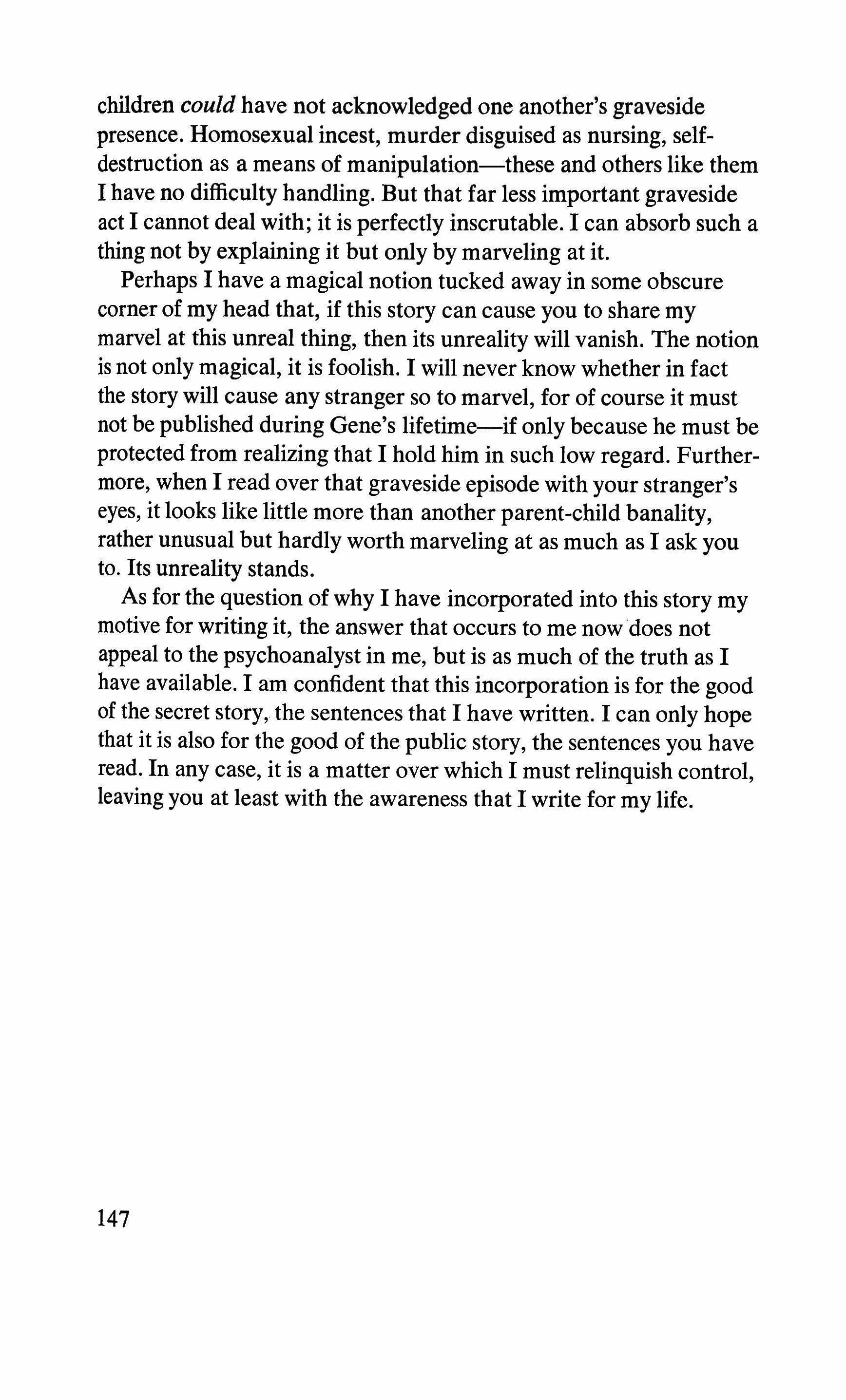
children could have not acknowledged one another's graveside presence. Homosexual incest, murder disguised as nursing, selfdestruction as a means of manipulation-these and others like them I have no difficulty handling. But that far less important graveside act I cannot deal with; it is perfectly inscrutable. I can absorb such a thing not by explaining it but only by marveling at it.
Perhaps I have a magical notion tucked away in some obscure corner of my head that, if this story can cause you to share my marvel at this unreal thing, then its unreality will vanish. The notion is not only magical, it is foolish. I will never know whether in fact the story will cause any stranger so to marvel, for of course it must not be published during Gene's lifetime-if only because he must be protected from realizing that I hold him in such low regard. Furthermore, when I read over that graveside episode with your stranger's eyes, it looks like little more than another parent-child banality, rather unusual but hardly worth marveling at as much as I ask you to. Its unreality stands.
As for the question of why I have incorporated into this story my motive for writing it, the answer that occurs to me now does not appeal to the psychoanalyst in me, but is as much of the truth as I have available. I am confident that this incorporation is for the good of the secret story, the sentences that I have written. I can only hope that it is also for the good of the public story, the sentences you have read. In any case, it is a matter over which I must relinquish control, leaving you at least with the awareness that I write for my life.
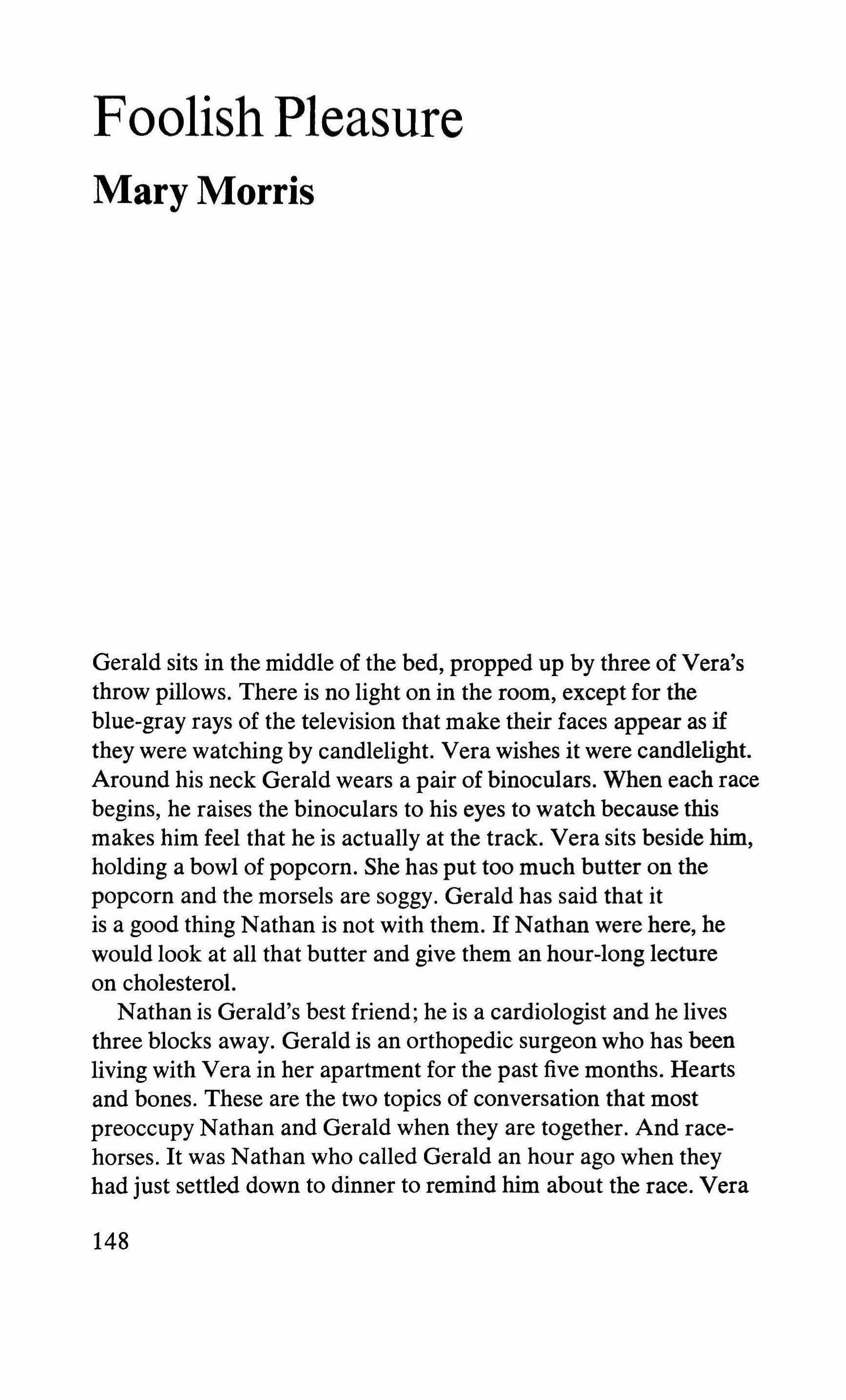
Gerald sits in the middle of the bed, propped up by three of Vera's throw pillows. There is no light on in the room, except for the blue-gray rays of the television that make their faces appear as if they were watching by candlelight. Vera wishes it were candlelight. Around his neck Gerald wears a pair of binoculars. When each race begins, he raises the binoculars to his eyes to watch because this makes him feel that he is actually at the track. Vera sits beside him, holding a bowl of popcorn. She has put too much butter on the popcorn and the morsels are soggy. Gerald has said that it is a good thing Nathan is not with them. If Nathan were here, he would look at all that butter and give them an hour-long lecture on cholesterol.
Nathan is Gerald's best friend; he is a cardiologist and he lives three blocks away. Gerald is an orthopedic surgeon who has been living with Vera in her apartment for the past five months. Hearts and bones. These are the two topics of conversation that most preoccupy Nathan and Gerald when they are together. And racehorses. It was Nathan who called Gerald an hour ago when they had just settled down to dinner to remind him about the race. Vera

believes that, because Gerald is a medical doctor, he must be an entirely responsible human being, never frivolous. She finds his interest in racehorses to be a basic paradox, the only paradox in Gerald's character. Gerald has had to convince Vera several times that her attitude toward medical doctors is pure mythology and that his interest in racehorses is purely aesthetic. This must be true, Vera tells herself, as Gerald puts his binoculars to his eyes and reaches for another handful of popcorn, because he never bets.
"A racehorse is a precision machine," he has said to her. "There's more going on inside a horse's fetlock than inside most people's brains." With this Vera must agree, even though she has little or no knowledge of what actually does happen inside a fetlock. In fact, she referred to that part of a horse as "ankle" until Gerald corrected her. Vera does not like being together with Nathan and Gerald because of the amount of time they spend hypothetically betting odds on racehorses on the basis of their physiology. Nathan knows the blood pressure of every major racehorse, living or dead, before and after a race. This is no mean accomplishment. Nathan claims that racehorses have cardiac arrests, just like people. Gerald knows about joints and he makes predictions on the basis of X rays. Once he predicted that a certain horse would shattera pelvic bone within the next month. Three races later the horse broke down. While Vera believes that all of this is a waste of time, she finds it striking that often when they do these predictions they are correct. She is also impressed that they never do them for money. They, on the other hand, see nothing miraculous in any of this. "We make predictions all day long that cost someone a lot of money," they say.
Gerald has been relatively quiet all evening, except for a request that they do not eat out and a few comments about the race they are watching from Belmont. Vera has grown accustomed to the fact that they will often spend their evenings together watching reruns, but she has not gotten used to Gerald's reticence. When she lived with Michael, her ex-husband, he talked a blue streak unless they were fighting, in which case he never uttered a word, sometimes for days. Gerald is the opposite. Except for one or two explosions a week, he is silent. It is certainly a more relaxed way to live. It is also duller. When she was married to Michael, she never believed that one could live in the same apartment with a man and feel as lonely
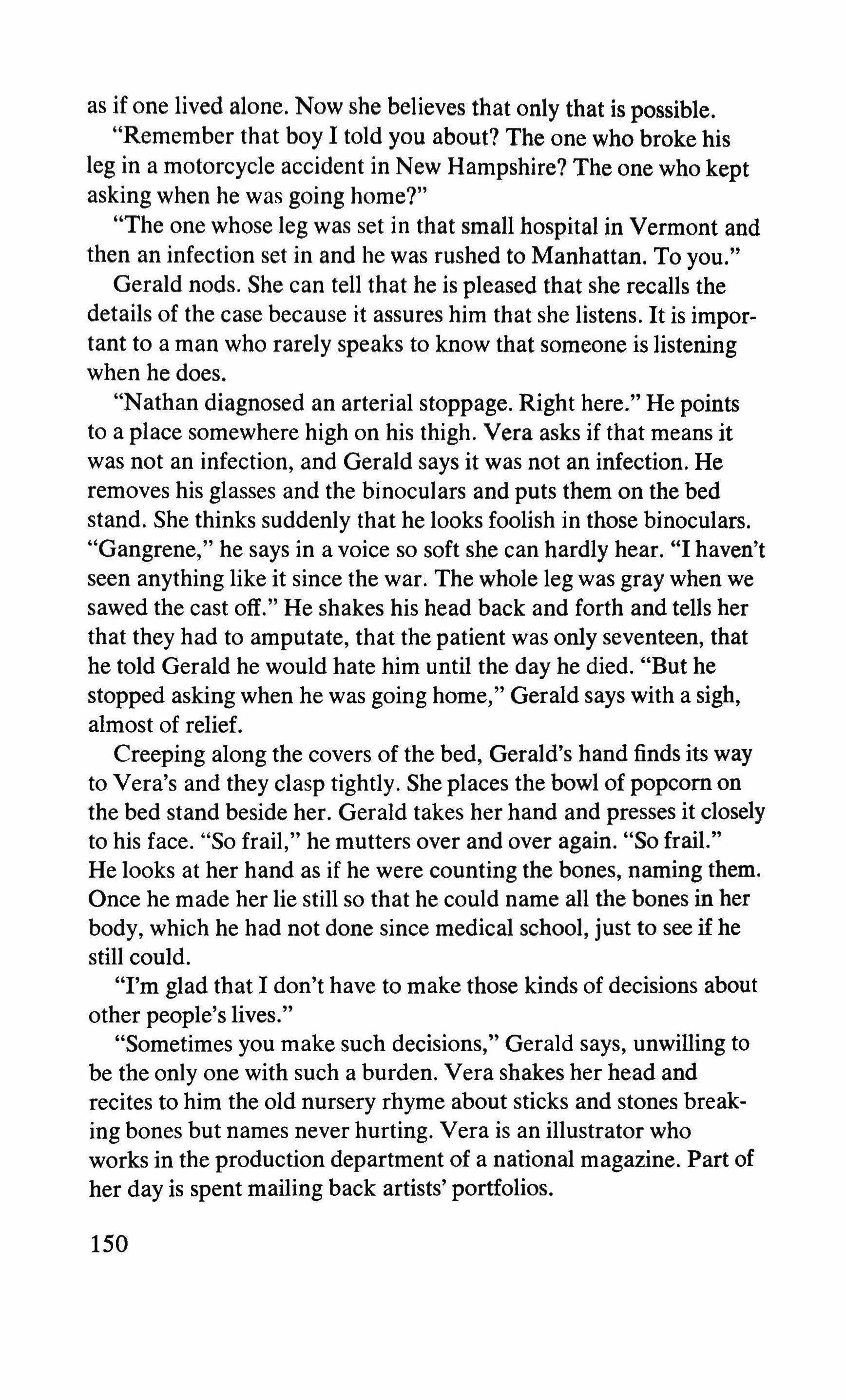
as if one lived alone. Now she believes that only that is possible.
"Remember that boy I told you about? The one who broke his leg in a motorcycle accident in New Hampshire? The one who kept asking when he was going home?"
"The one whose leg was set in that small hospital in Vermont and then an infection set in and he was rushed to Manhattan. To you."
Gerald nods. She can tell that he is pleased that she recalls the details of the case because it assures him that she listens. It is important to a man who rarely speaks to know that someone is listening when he does.
"Nathan diagnosed an arterial stoppage. Right here." He points to a place somewhere high on his thigh. Vera asks if that means it was not an infection, and Gerald says it was not an infection. He removes his glasses and the binoculars and puts them on the bed stand. She thinks suddenly that he looks foolish in those binoculars. "Gangrene," he says in a voice so soft she can hardly hear. "I haven't seen anything like it since the war. The whole leg was gray when we sawed the cast off." He shakes his head back and forth and tells her that they had to amputate, that the patient was only seventeen, that he told Gerald he would hate him until the day he died. "But he stopped asking when he was going home," Gerald says with a sigh, almost of relief.
Creeping along the covers of the bed, Gerald's hand finds its way to Vera's and they clasp tightly. She places the bowl of popcorn on the bed stand beside her. Gerald takes her hand and presses it closely to his face. "So frail," he mutters over and over again. "So frail." He looks at her hand as if he were counting the bones, naming them. Once he made her lie still so that he could name all the bones in her body, which he had not done since medical school, just to see if he still could.
"I'm glad that 1 don't have to make those kinds of decisions about other people's lives."
"Sometimes you make such decisions," Gerald says, unwilling to be the only one with such a burden. Vera shakes her head and recites to him the old nursery rhyme about sticks and stones breaking bones but names never hurting. Vera is an illustrator who works in the production department of a national magazine. Part of her day is spent mailing back artists' portfolios.
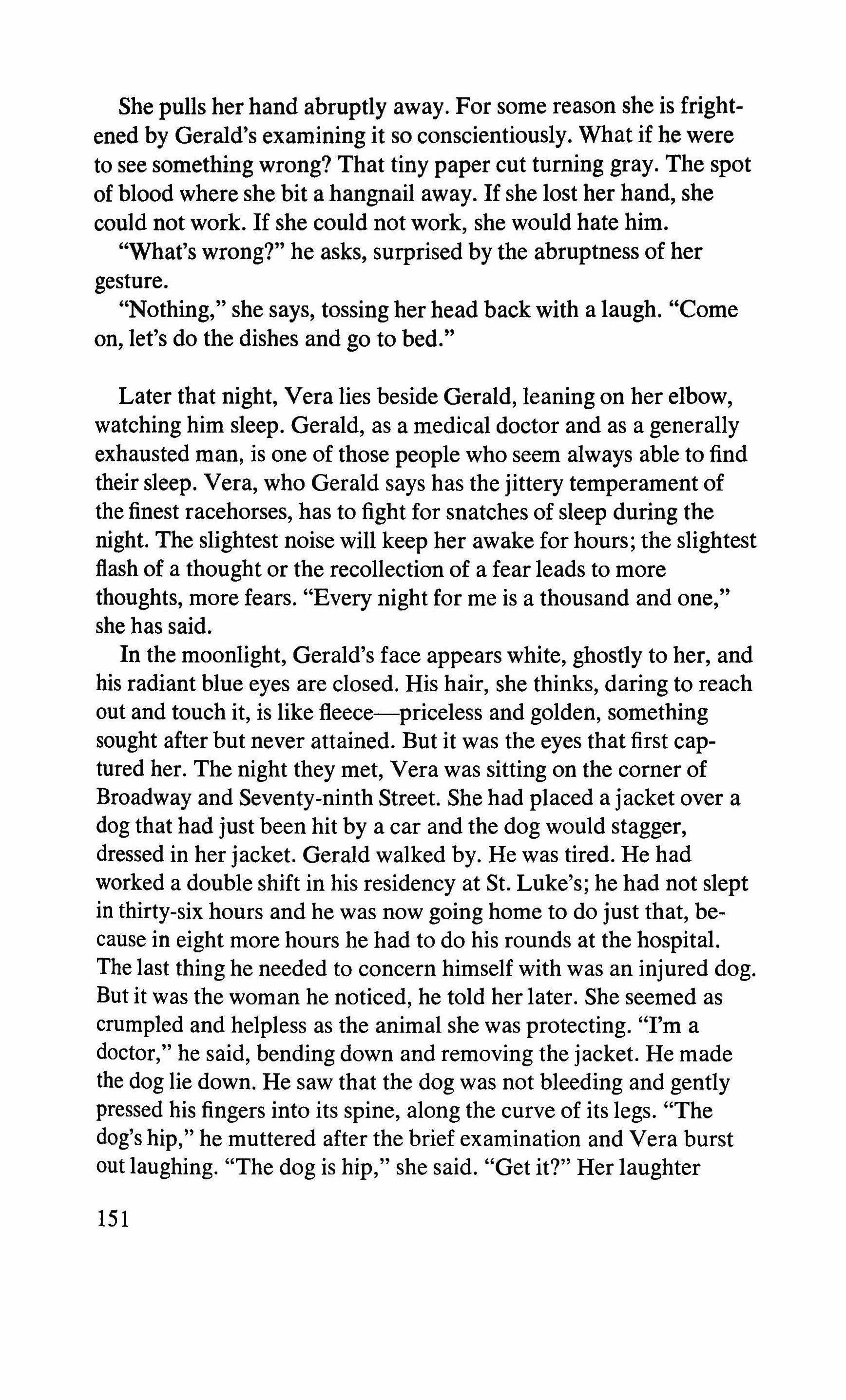
She pulls her hand abruptly away. For some reason she is frightened by Gerald's examining it so conscientiously. What if he were to see something wrong? That tiny paper cut turning gray. The spot of blood where she bit a hangnail away. If she lost her hand, she could not work. If she could not work, she would hate him. "What's wrong?" he asks, surprised by the abruptness of her gesture.
"Nothing," she says, tossing her head back with a laugh. "Come on, let's do the dishes and go to bed."
Later that night, Vera lies beside Gerald, leaning on her elbow, watching him sleep. Gerald, as a medical doctor and as a generally exhausted man, is one of those people who seem always able to find their sleep. Vera, who Gerald says has the jittery temperament of the finest racehorses, has to fight for snatches of sleep during the night. The slightest noise will keep her awake for hours; the slightest flash of a thought or the recollection of a fear leads to more thoughts, more fears. "Every night for me is a thousand and one," she has said.
In the moonlight, Gerald's face appears white, ghostly to her, and his radiant blue eyes are closed. His hair, she thinks, daring to reach out and touch it, is like fleece-priceless and golden, something sought after but never attained. But it was the eyes that first captured her. The night they met, Vera was sitting on the corner of Broadway and Seventy-ninth Street. She had placed a jacket over a dog that had just been hit by a car and the dog would stagger, dressed in her jacket. Gerald walked by. He was tired. He had worked a double shift in his residency at St. Luke's; he had not slept in thirty-six hours and he was now going home to do just that, because in eight more hours he had to do his rounds at the hospital. The last thing he needed to concern himself with was an injured dog. But it was the woman he noticed, he told her later. She seemed as crumpled and helpless as the animal she was protecting. "I'm a doctor," he said, bending down and removing the jacket. He made the dog lie down. He saw that the dog was not bleeding and gently pressed his fingers into its spine, along the curve of its legs. "The dog's hip," he muttered after the brief examination and Vera burst out laughing. "The dog is hip," she said. "Get it?" Her laughter
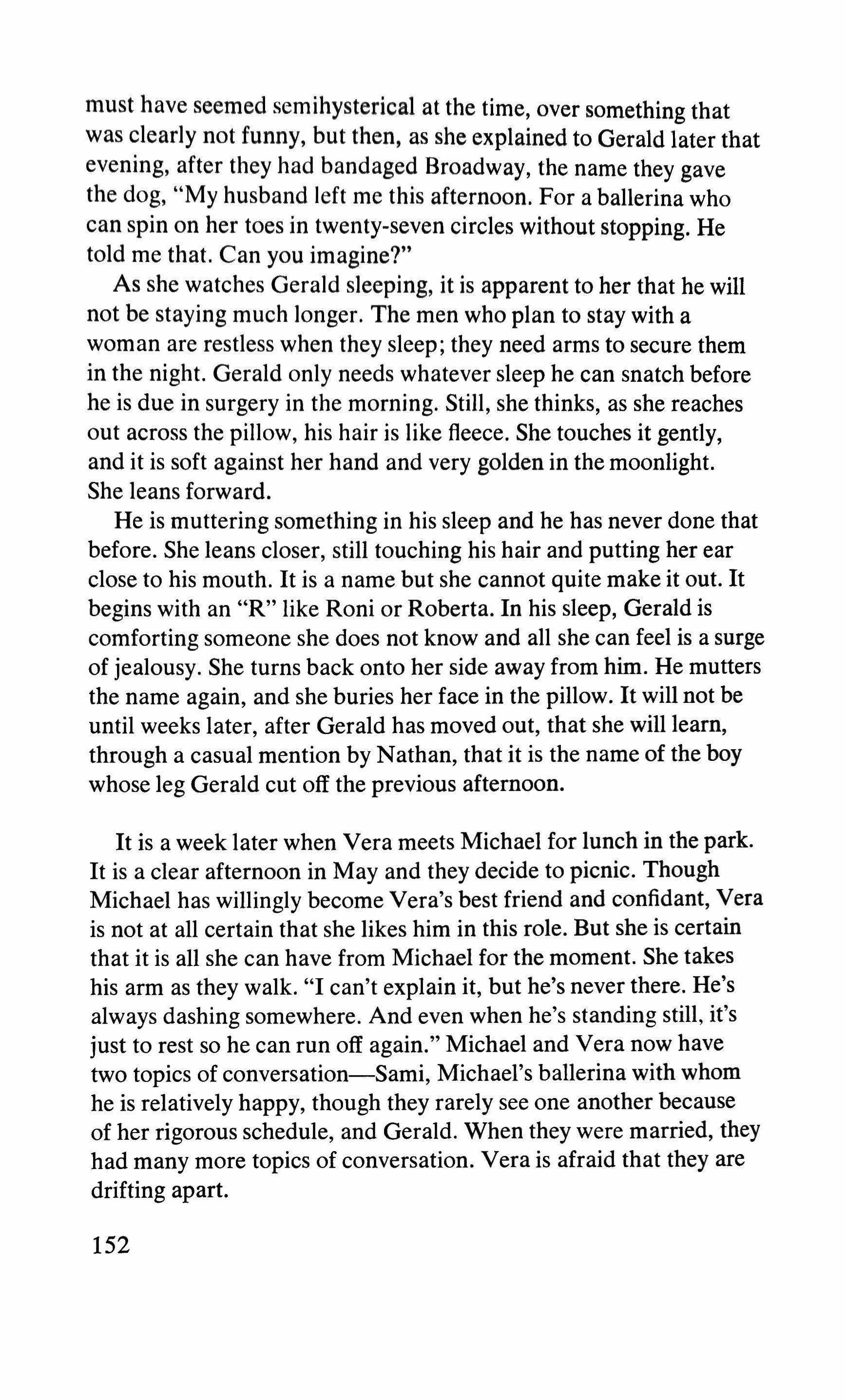
must have seemed semihysterical at the time, over something that was clearly not funny, but then, as she explained to Gerald later that evening, after they had bandaged Broadway, the name they gave the dog, "My husband left me this afternoon. For a ballerina who can spin on her toes in twenty-seven circles without stopping. He told me that. Can you imagine?"
As she watches Gerald sleeping, it is apparent to her that he will not be staying much longer. The men who plan to stay with a woman are restless when they sleep; they need arms to secure them in the night. Gerald only needs whatever sleep he can snatch before he is due in surgery in the morning. Still, she thinks, as she reaches out across the pillow, his hair is like fleece. She touches it gently, and it is soft against her hand and very golden in the moonlight. She leans forward.
He is muttering something in his sleep and he has never done that before. She leans closer, still touching his hair and putting her ear close to his mouth. It is a name but she cannot quite make it out. It begins with an "R" like Roni or Roberta. In his sleep, Gerald is comforting someone she does not know and all she can feel is a surge of jealousy. She turns back onto her side away from him. He mutters the name again, and she buries her face in the pillow. It will not be until weeks later, after Gerald has moved out, that she will learn, through a casual mention by Nathan, that it is the name of the boy whose leg Gerald cut off the previous afternoon.
It is a week later when Vera meets Michael for lunch in the park. It is a clear afternoon in May and they decide to picnic. Though Michael has willingly become Vera's best friend and confidant, Vera is not at all certain that she likes him in this role. But she is certain that it is all she can have from Michael for the moment. She takes his arm as they walk. "I can't explain it, but he's never there. He's always dashing somewhere. And even when he's standing still, it's just to rest so he can run off again." Michael and Vera now have two topics of conversation-Sami, Michael's ballerina with whom he is relatively happy, though they rarely see one another because of her rigorous schedule, and Gerald. When they were married, they had many more topics of conversation. Vera is afraid that they are drifting apart.
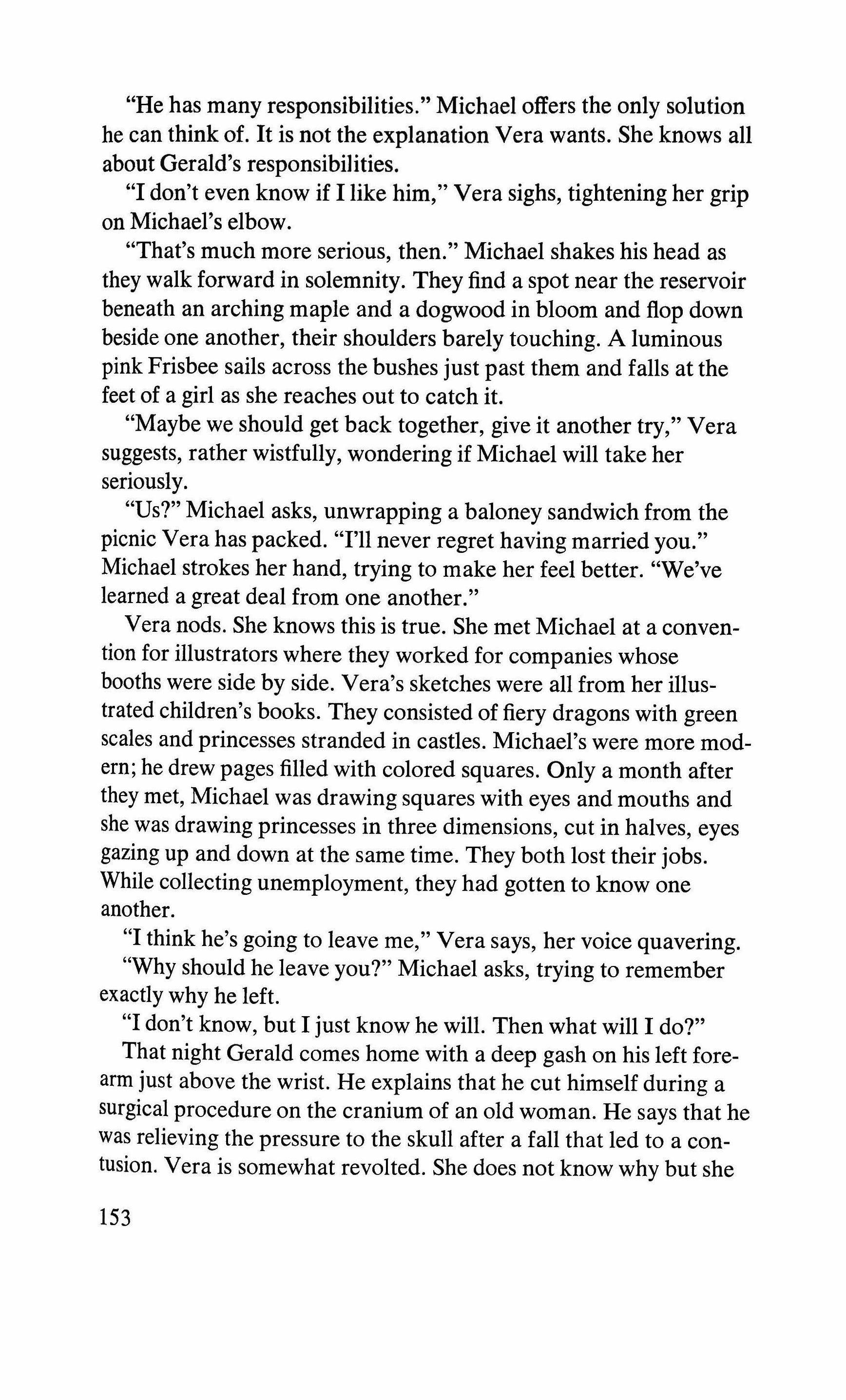
"He has many responsibilities." Michael offers the only solution he can think of. It is not the explanation Vera wants. She knows all about Gerald's responsibiJities.
"I don't even know if I like him," Vera sighs, tightening her grip on Michael's elbow.
"That's much more serious, then." Michael shakes his head as they walk forward in solemnity. They find a spot near the reservoir beneath an arching maple and a dogwood in bloom and flop down beside one another, their shoulders barely touching. A luminous pink Frisbee sails across the bushes just past them and falls at the feet of a girl as she reaches out to catch it.
"Maybe we should get back together, give it another try," Vera suggests, rather wistfully, wondering if Michael will take her seriously.
"Us?" Michael asks, unwrapping a baloney sandwich from the picnic Vera has packed. "I'll never regret having married you." Michael strokes her hand, trying to make her feel better. "We've learned a great deal from one another."
Vera nods. She knows this is true. She met Michael at a convention for illustrators where they worked for companies whose booths were side by side. Vera's sketches were all from her illustrated children's books. They consisted of fiery dragons with green scales and princesses stranded in castles. Michael's were more modern; he drew pages filled with colored squares. Only a month after they met, Michael was drawing squares with eyes and mouths and she was drawing princesses in three dimensions, cut in halves, eyes gazing up and down at the same time. They both lost their jobs. While collecting unemployment, they had gotten to know one another.
"I think he's going to leave me," Vera says, her voice quavering.
"Why should he leave you?" Michael asks, trying to remember exactly why he left.
"I don't know, but I just know he will. Then what will I do?"
That night Gerald comes home with a deep gash on his left forearm just above the wrist. He explains that he cut himself during a surgical procedure on the cranium of an old woman. He says that he was relieving the pressure to the skull after a fall that led to a contusion. Vera is somewhat revolted. She does not know why but she
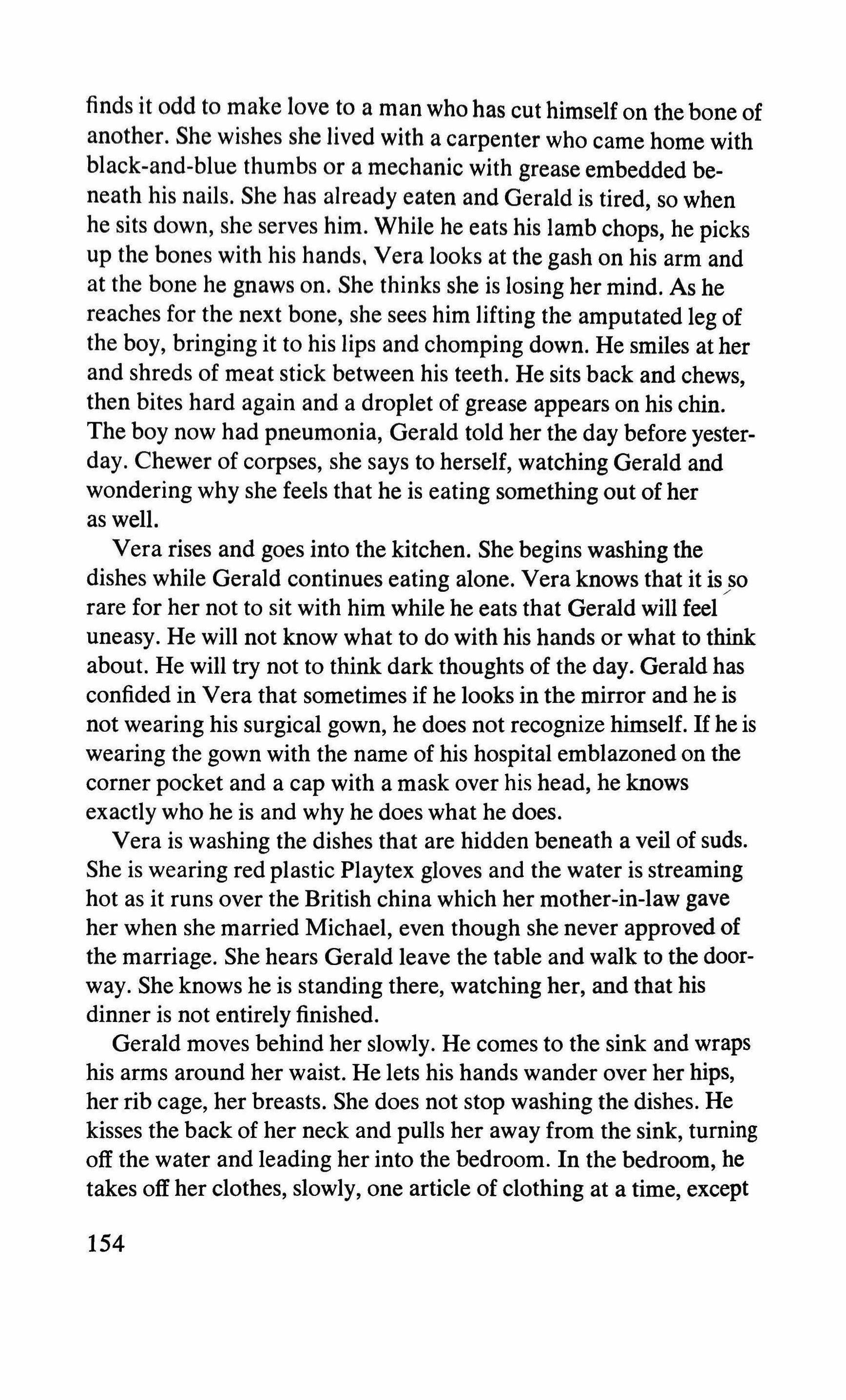
finds it odd to make love to a man who has cut himself on the bone of another. She wishes she lived with a carpenter who came home with black-and-blue thumbs or a mechanic with grease embedded beneath his nails. She has already eaten and Gerald is tired, so when he sits down, she serves him. While he eats his lamb chops, he picks up the bones with his hands. Vera looks at the gash on his arm and at the bone he gnaws on. She thinks she is losing her mind. As he reaches for the next bone, she sees him lifting the amputated leg of the boy, bringing it to his lips and chomping down. He smiles at her and shreds of meat stick between his teeth. He sits back and chews, then bites hard again and a droplet of grease appears on his chin. The boy now had pneumonia, Gerald told her the day before yesterday. Chewer of corpses, she says to herself, watching Gerald and wondering why she feels that he is eating something out of her as well.
Vera rises and goes into the kitchen. She begins washing the dishes while Gerald continues eating alone. Vera knows that it isyo rare for her not to sit with him while he eats that Gerald will feel uneasy. He will not know what to do with his hands or what to think about. He will try not to think dark thoughts of the day. Gerald has confided in Vera that sometimes if he looks in the mirror and he is not wearing his surgical gown, he does not recognize himself. If he is wearing the gown with the name of his hospital emblazoned on the corner pocket and a cap with a mask over his head, he knows exactly who he is and why he does what he does.
Vera is washing the dishes that are hidden beneath a veil of suds. She is wearing red plastic Playtex gloves and the water is streaming hot as it runs over the British china which her mother-in-law gave her when she married Michael, even though she never approved of the marriage. She hears Gerald leave the table and walk to the doorway. She knows he is standing there, watching her, and that his dinner is not entirely finished.
Gerald moves behind her slowly. He comes to the sink and wraps his arms around her waist. He lets his hands wander over her hips, her rib cage, her breasts. She does not stop washing the dishes. He kisses the back of her neck and pulls her away from the sink, turning off the water and leading her into the bedroom. In the bedroom, he takes off her clothes, slowly, one article of clothing at a time, except
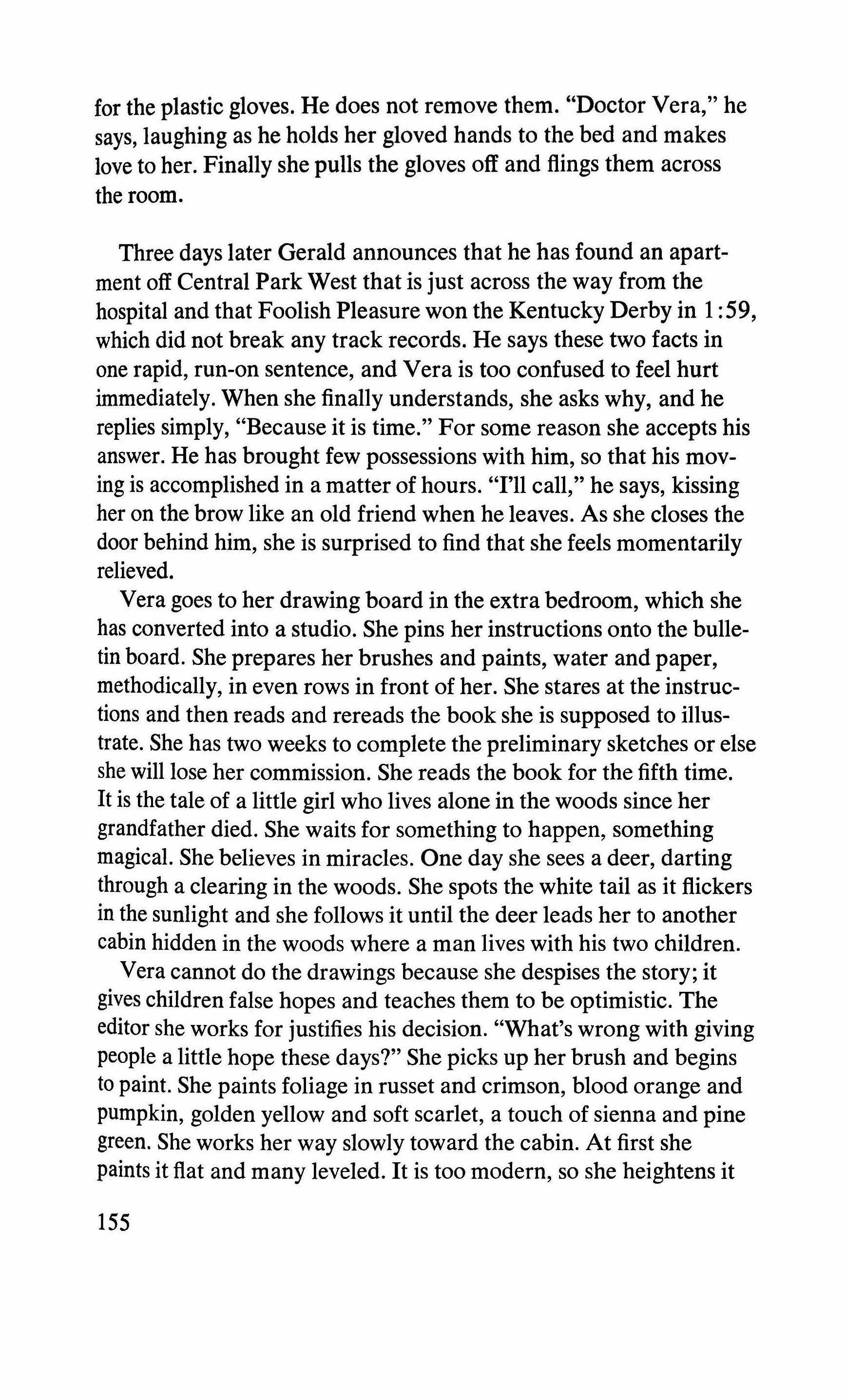
for the plastic gloves. He does not remove them. "Doctor Vera," he says, laughing as he holds her gloved hands to the bed and makes love to her. Finally she pulls the gloves off and flings them across the room.
Three days later Gerald announces that he has found an apartment off Central Park West that is just across the way from the hospital and that Foolish Pleasure won the Kentucky Derby in 1 :59, which did not break any track records. He says these two facts in one rapid, run-on sentence, and Vera is too confused to feel hurt immediately. When she finally understands, she asks why, and he replies simply, "Because it is time." For some reason she accepts his answer. He has brought few possessions with him, so that his moving is accomplished in a matter of hours. "I'll call," he says, kissing her on the brow like an old friend when he leaves. As she closes the door behind him, she is surprised to find that she feels momentarily relieved.
Vera goes to her drawing board in the extra bedroom, which she has converted into a studio. She pins her instructions onto the bulletin board. She prepares her brushes and paints, water and paper, methodically, in even rows in front of her. She stares at the instructions and then reads and rereads the book she is supposed to illustrate. She has two weeks to complete the preliminary sketches or else she wi11lose her commission. She reads the book for the fifth time. It is the tale of a little girl who lives alone in the woods since her grandfather died. She waits for something to happen, something magical. She believes in miracles. One day she sees a deer, darting through a clearing in the woods. She spots the white tail as it flickers in the sunlight and she follows it until the deer leads her to another cabin hidden in the woods where a man lives with his two children.
Vera cannot do the drawings because she despises the story; it gives children false hopes and teaches them to be optimistic. The editor she works for justifies his decision. "What's wrong with giving people a little hope these days?" She picks up her brush and begins to paint. She paints foliage in russet and crimson, blood orange and pumpkin, golden yellow and soft scarlet, a touch of sienna and pine green. She works her way slowly toward the cabin. At first she paints it flat and many leveled. It is too modern, so she heightens it
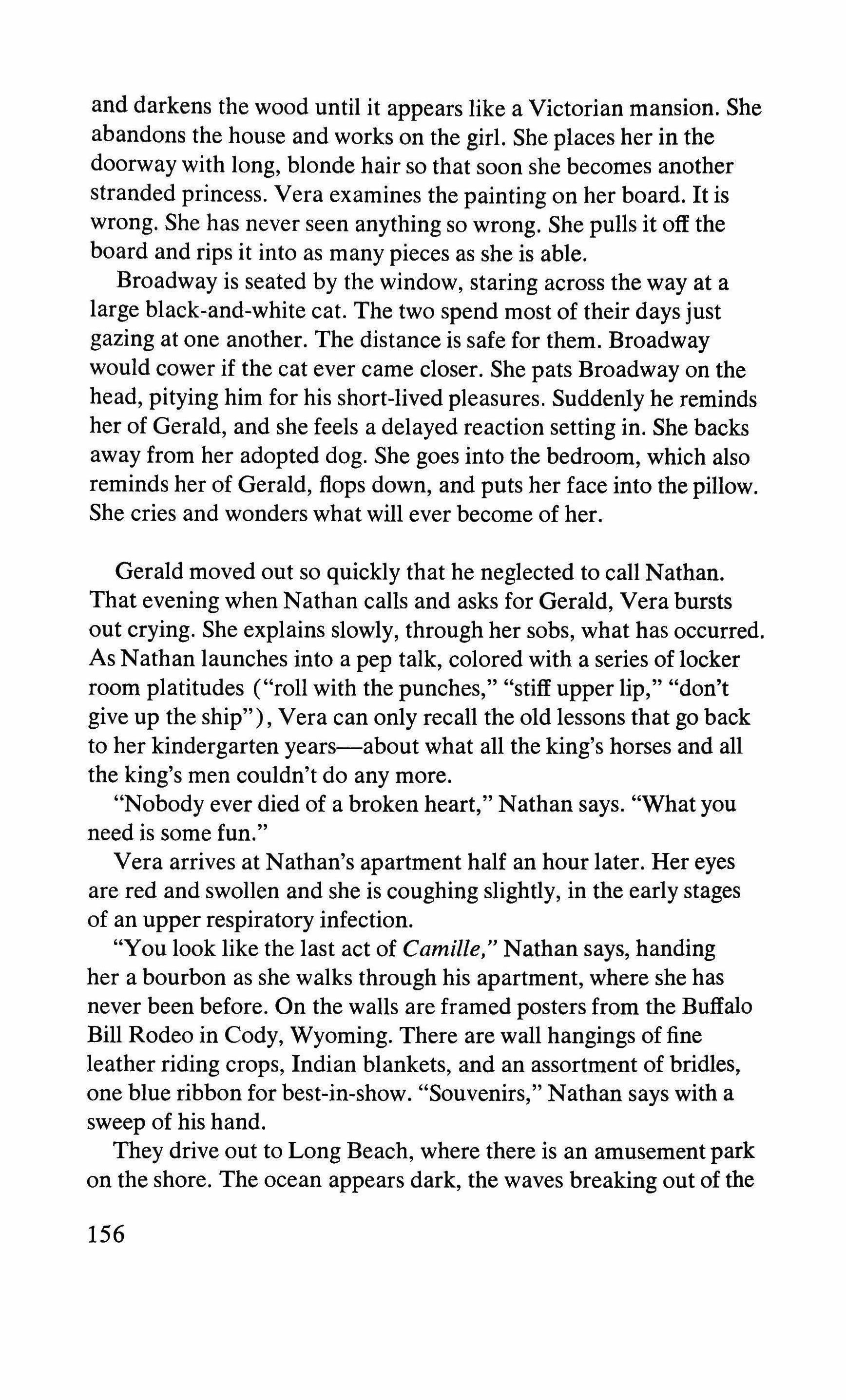
and darkens the wood until it appears like a Victorian mansion. She abandons the house and works on the girl. She places her in the doorway with long, blonde hair so that soon she becomes another stranded princess. Vera examines the painting on her board. It is wrong. She has never seen anything so wrong. She pulls it off the board and rips it into as many pieces as she is able.
Broadway is seated by the window, staring across the way at a large black-and-white cat. The two spend most of their days just gazing at one another. The distance is safe for them. Broadway would cower if the cat ever came closer. She pats Broadway on the head, pitying him for his short-lived pleasures. Suddenly he reminds her of Gerald, and she feels a delayed reaction setting in. She backs away from her adopted dog. She goes into the bedroom, which also reminds her of Gerald, flops down, and puts her face into the pillow. She cries and wonders what will ever become of her.
Gerald moved out so quickly that he neglected to call Nathan. That evening when Nathan calls and asks for Gerald, Vera bursts out crying. She explains slowly, through her sobs, what has occurred. As Nathan launches into a pep talk, colored with a series of locker room platitudes ("roll with the punches," "stiff upper lip," "don't give up the ship"), Vera can only recall the old lessons that go back to her kindergarten years-about what all the king's horses and all the king's men couldn't do any more.
"Nobody ever died of a broken heart," Nathan says. "What you need is some fun."
Vera arrives at Nathan's apartment half an hour later. Her eyes are red and swollen and she is coughing slightly, in the early stages of an upper respiratory infection.
"You look like the last act of Camille," Nathan says, handing her a bourbon as she walks through his apartment, where she has never been before. On the walls are framed posters from the Buffalo Bill Rodeo in Cody, Wyoming. There are wall hangings of fine leather riding crops, Indian blankets, and an assortment of bridles, one blue ribbon for best-in-show. "Souvenirs," Nathan says with a sweep of his hand.
They drive out to Long Beach, where there is an amusement park on the shore. The ocean appears dark, the waves breaking out of the
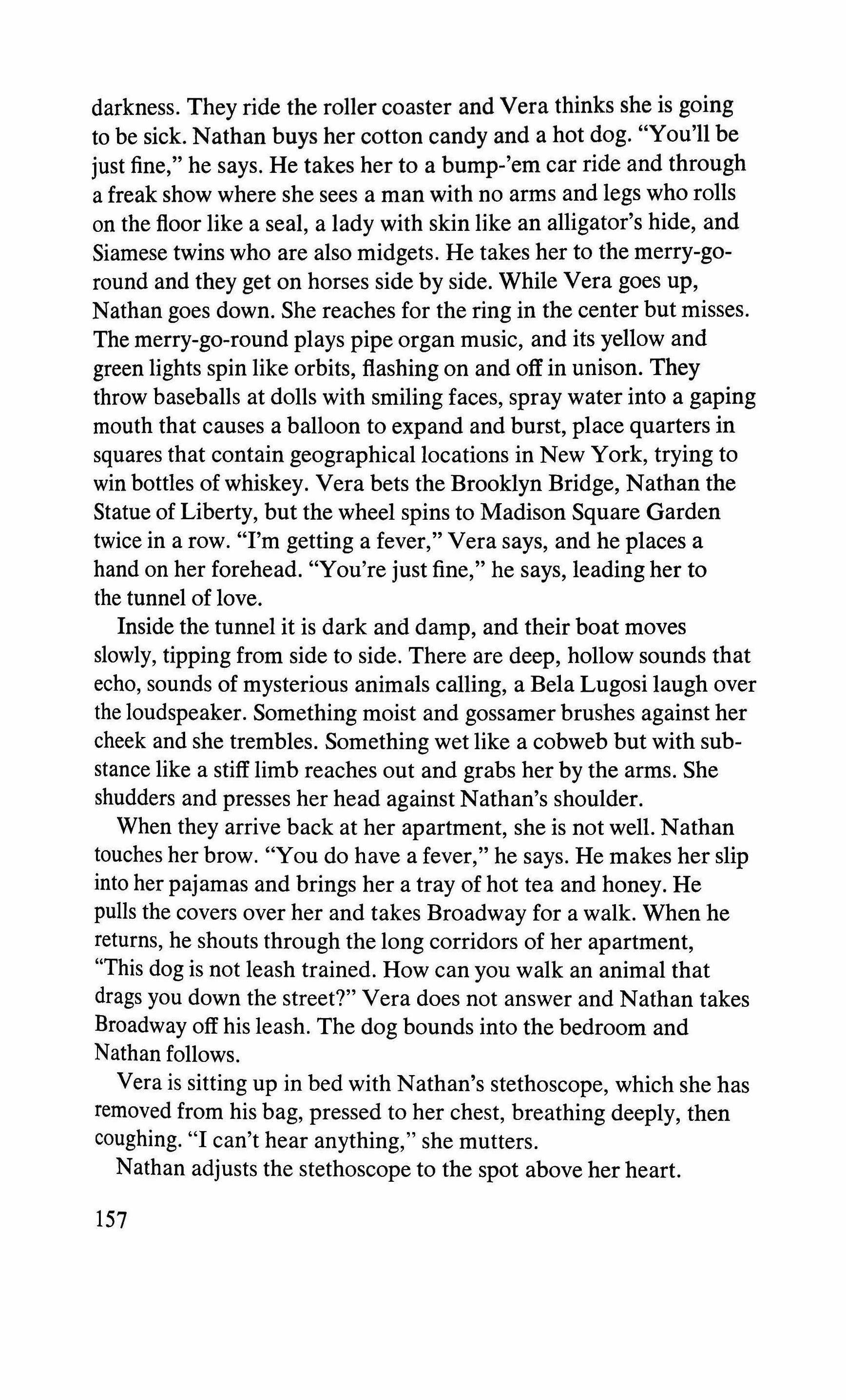
darkness. They ride the roller coaster and Vera thinks she is going to be sick. Nathan buys her cotton candy and a hot dog. "You'll be just fine," he says. He takes her to a bump-'em car ride and through a freak show where she sees a man with no arms and legs who rolls on the floor like a seal, a lady with skin like an alligator's hide, and Siamese twins who are also midgets. He takes her to the merry-goround and they get on horses side by side. While Vera goes up, Nathan goes down. She reaches for the ring in the center but misses. The merry-go-round plays pipe organ music, and its yellow and green lights spin like orbits, flashing on and off in unison. They throw baseballs at dolls with smiling faces, spray water into a gaping mouth that causes a balloon to expand and burst, place quarters in squares that contain geographical locations in New York, trying to win bottles of whiskey Vera bets the Brooklyn Bridge, Nathan the Statue of Liberty, but the wheel spins to Madison Square Garden twice in a row. "I'm getting a fever," Vera says, and he places a hand on her forehead. "You're just fine," he says, leading her to the tunnel of love.
Inside the tunnel it is dark and damp, and their boat moves slowly, tipping from side to side. There are deep, hollow sounds that echo, sounds of mysterious animals calling, a Bela Lugosi laugh over the loudspeaker. Something moist and gossamer brushes against her cheek and she trembles. Something wet like a cobweb but with substance like a stiff limb reaches out and grabs her by the arms. She shudders and presses her head against Nathan's shoulder. When they arrive back at her apartment, she is not well. Nathan touches her brow. "You do have a fever," he says. He makes her slip into her pajamas and brings her a tray of hot tea and honey. He pulls the covers over her and takes Broadway for a walk. When he returns, he shouts through the long corridors of her apartment, "This dog is not leash trained. How can you walk an animal that drags you down the street?" Vera does not answer and Nathan takes Broadway off his leash. The dog bounds into the bedroom and Nathan follows.
Vera is sitting up in bed with Nathan's stethoscope, which she has removed from his bag, pressed to her chest, breathing deeply, then coughing. "I can't hear anything," she mutters.
Nathan adjusts the stethoscope to the spot above her heart.
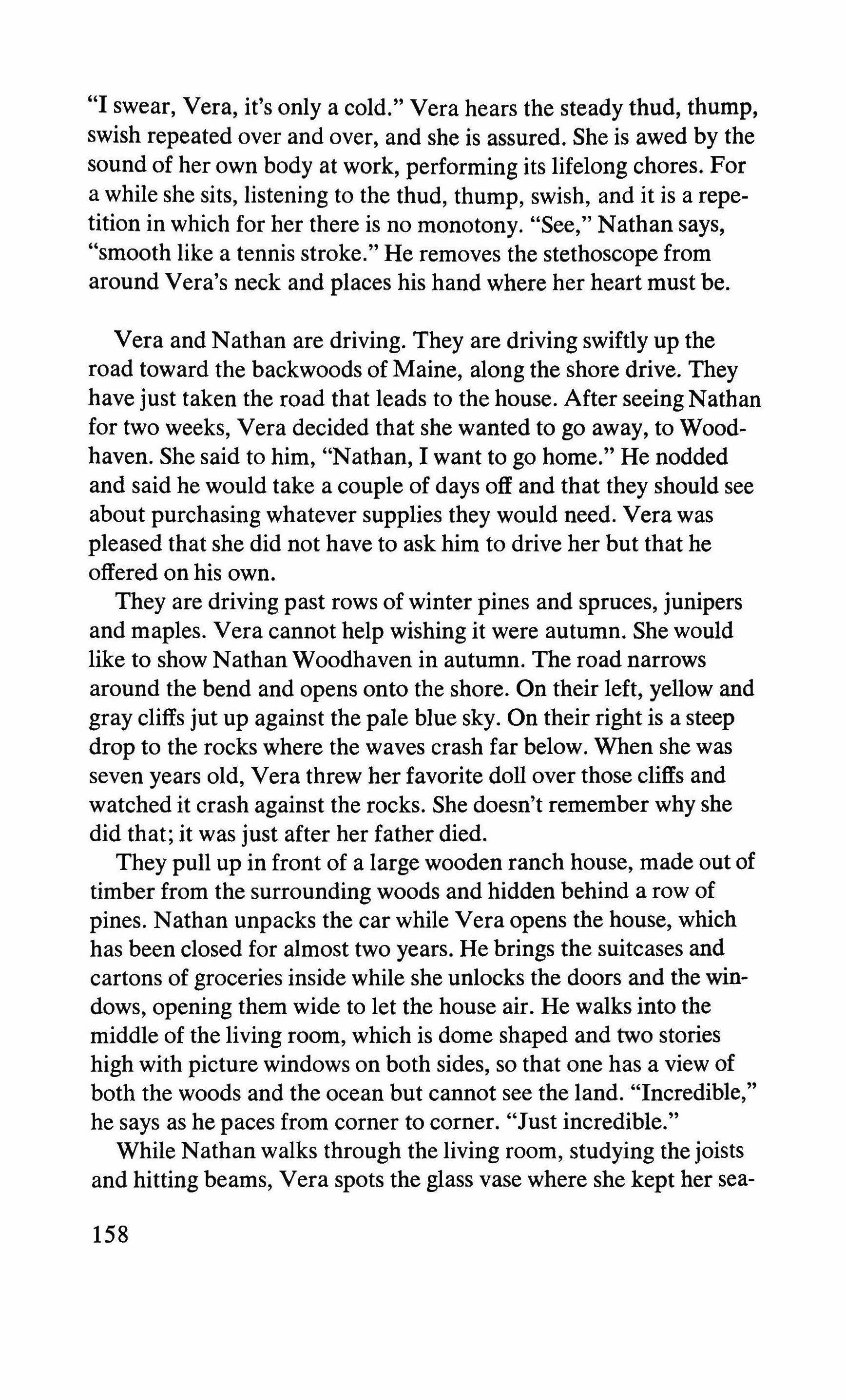
"I swear, Vera, it's only a cold." Vera hears the steady thud, thump, swish repeated over and over, and she is assured. She is awed by the sound of her own body at work, performing its lifelong chores. For a while she sits, listening to the thud, thump, swish, and it is a repetition in which for her there is no monotony. "See," Nathan says, "smooth like a tennis stroke." He removes the stethoscope from around Vera's neck and places his hand where her heart must be.
Vera and Nathan are driving. They are driving swiftly up the road toward the backwoods of Maine, along the shore drive. They have just taken the road that leads to the house. After seeing Nathan for two weeks, Vera decided that she wanted to go away, to Woodhaven. She said to him, "Nathan, 1 want to go home." He nodded and said he would take a couple of days off and that they should see about purchasing whatever supplies they would need. Vera was pleased that she did not have to ask him to drive her but that he offered on his own.
They are driving past rows of winter pines and spruces, junipers and maples. Vera cannot help wishing it were autumn. She would like to show Nathan Woodhaven in autumn. The road narrows around the bend and opens onto the shore. On their left, yellow and gray cliffs jut up against the pale blue sky. On their right is a steep drop to the rocks where the waves crash far below. When she was seven years old, Vera threw her favorite doll over those cliffs and watched it crash against the rocks. She doesn't remember why she did that; it was just after her father died.
They pull up in front of a large wooden ranch house, made out of timber from the surrounding woods and hidden behind a row of pines. Nathan unpacks the car while Vera opens the house, which has been closed for almost two years. He brings the suitcases and cartons of groceries inside while she unlocks the doors and the windows, opening them wide to let the house air. He walks into the middle of the living room, which is dome shaped and two stories high with picture windows on both sides, so that one has a view of both the woods and the ocean but cannot see the land. "Incredible," he says as he paces from corner to corner. "Just incredible."
While Nathan walks through the living room, studying the joists and hitting beams, Vera spots the glass vase where she kept her sea-

side discoveries over the years. Pieces of broken bottles made smooth by the sea shimmer as the light refracts through them. Shells, sand dollars, sea horses all suspended between the bits of glass and polished stones. Pale coral and soft yellow shells. The smooth, rounded sand dollars. And the sea horses. It was an unexplained phenomenon, her father told her when they began to find them during that last week in August. Just one week, that year, the current must have shifted, bringing a warm current north until it turned cold and they were washed to shore, already dead. Most of the sea horses were broken now, their tails dangling a few inches below them in the glass bowl; a few remained intact, large and whole. All were dried and calcified. The trophies from her many walks along the sea as a child with her father, and later alone.
"Nice shell collection," Nathan says, tapping the rim of the glass with his fingers.
Nathan kicks the floorboards and pounds the studs. Together they go outside and stand at the edge of the cliff. Vera watches the ocean crashing against the rocks below. Nathan takes a fistful of soil and clenches it in his hand. He stomps on the ground. With his eye he measures the angle of descent and the extent to which the house has been cantilevered over the cliff. "It will fall into the sea in five years," he says as they walk back to the house. "No, it won't," Vera replies. It is their first disagreement but she feels a familiar pattern setting in.
She lights a roaring fire on the hearth, and the living room is illumined, a brilliant orange, by the dancing flames. It is late, near dusk, and outside they can see the sky paling as fingers of pink reach across the clouds. That is a color she remembers, the opalescence. She is preparing a feast for them, piling steaks and chicken thighs on the grill, stuffing ears of corn still in their shucks into the embers. She is chopping onions and tomatoes and peppers. She is slicing mushrooms and fresh pineapple that she will also place on the grill. Wild rice is steaming on the stove. She finds two baskets in a cupboard and sends Nathan outside in the woods to pick the wild strawberries and raspberries that grow around their property at this time of year. They will have them for dessert, with fresh cream. He returns just as dinner is ready. He has collected almost a full basket of each. He is amazed that they grow in such abundance.
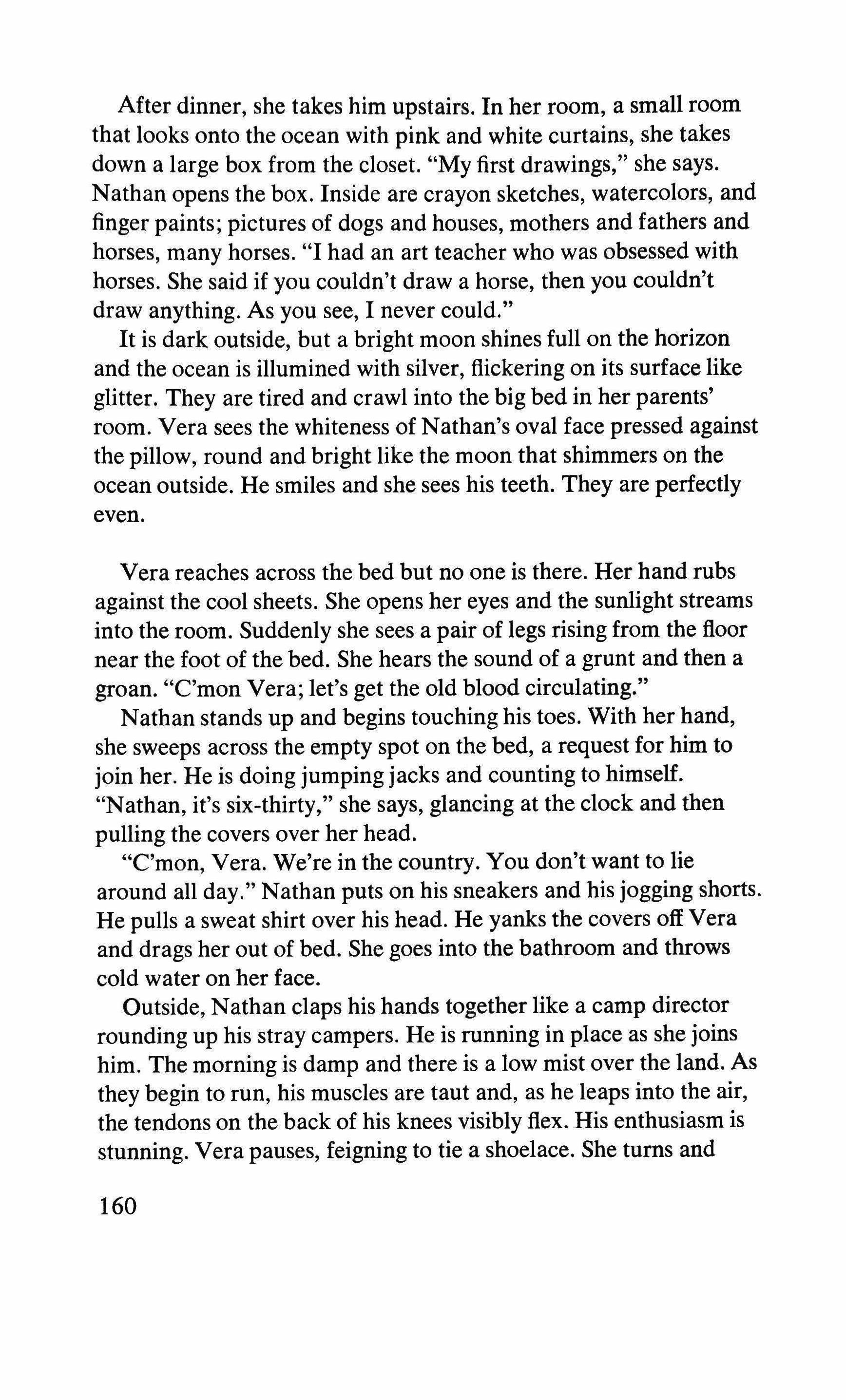
After dinner, she takes him upstairs. In her room, a small room that looks onto the ocean with pink and white curtains, she takes down a large box from the closet. "My first drawings," she says. Nathan opens the box. Inside are crayon sketches, watercolors, and finger paints; pictures of dogs and houses, mothers and fathers and horses, many horses. "I had an art teacher who was obsessed with horses. She said if you couldn't draw a horse, then you couldn't draw anything. As you see, I never could."
It is dark outside, but a bright moon shines full on the horizon and the ocean is illumined with silver, flickering on its surface like glitter. They are tired and crawl into the big bed in her parents' room. Vera sees the whiteness of Nathan's oval face pressed against the pillow, round and bright like the moon that shimmers on the ocean outside. He smiles and she sees his teeth. They are perfectly even.
Vera reaches across the bed but no one is there. Her hand rubs against the cool sheets. She opens her eyes and the sunlight streams into the room. Suddenly she sees a pair of legs rising from the floor near the foot of the bed. She hears the sound of a grunt and then a groan. "C'mon Vera; let's get the old blood circulating."
Nathan stands up and begins touching his toes. With her hand, she sweeps across the empty spot on the bed, a request for him to join her. He is doing jumping jacks and counting to himself. "Nathan, it's six-thirty," she says, glancing at the clock and then pulling the covers over her head.
"C'mon, Vera. We're in the country. You don't want to lie around all day." Nathan puts on his sneakers and his jogging shorts. He pulls a sweat shirt over his head. He yanks the covers off Vera and drags her out of bed. She goes into the bathroom and throws cold water on her face.
Outside, Nathan claps his hands together like a camp director rounding up his stray campers. He is running in place as she joins him. The morning is damp and there is a low mist over the land. As they begin to run, his muscles are taut and, as he leaps into the air, the tendons on the back of his knees visibly flex. His enthusiasm is stunning. Vera pauses, feigning to tie a shoelace. She turns and 160
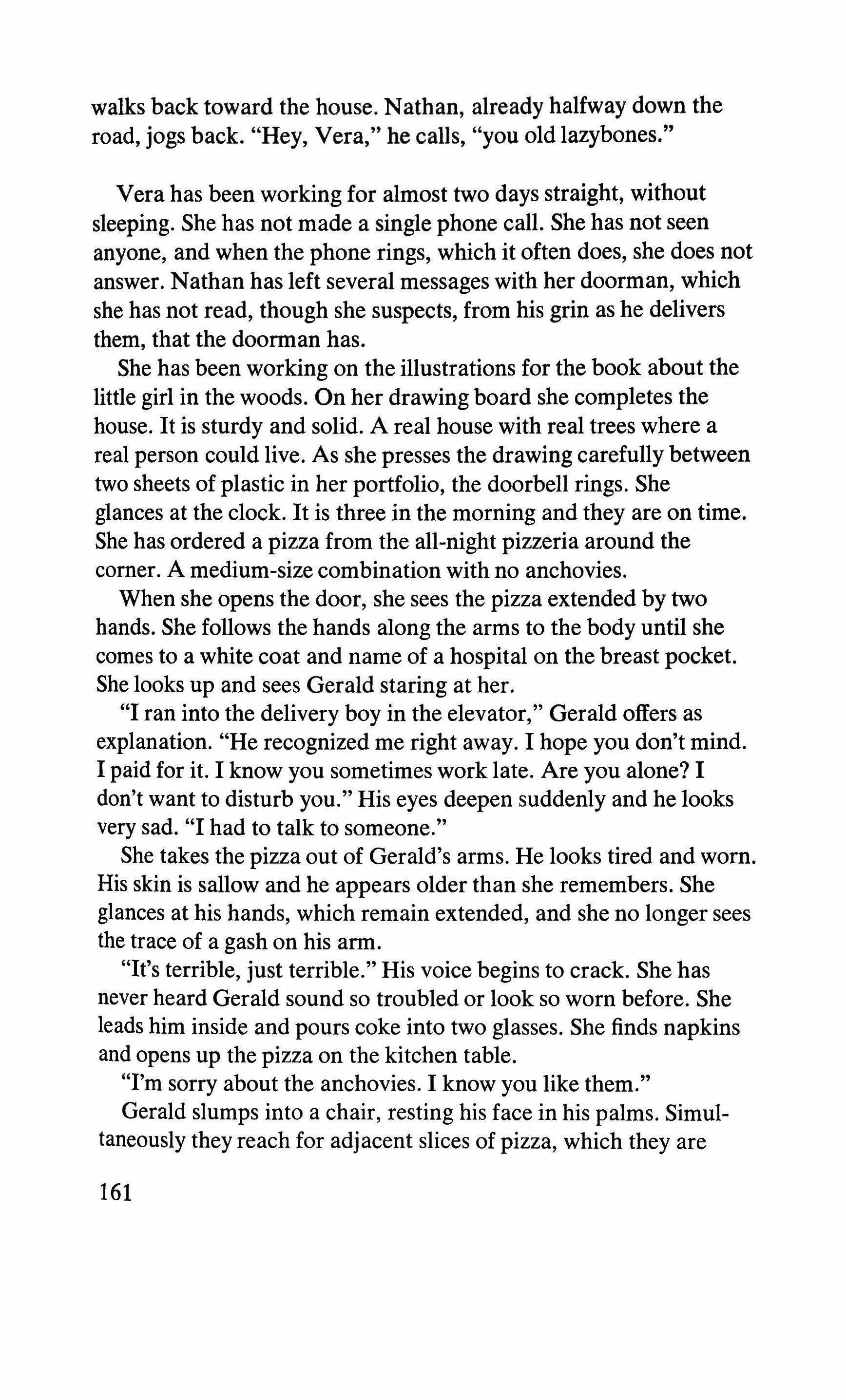
walks back toward the house. Nathan, already halfway down the road, jogs back. "Hey, Vera," he calls, "you old lazybones."
Vera has been working for almost two days straight, without sleeping. She has not made a single phone call. She has not seen anyone, and when the phone rings, which it often does, she does not answer. Nathan has left several messages with her doorman, which she has not read, though she suspects, from his grin as he delivers them, that the doorman has.
She has been working on the illustrations for the book about the little girl in the woods. On her drawing board she completes the house. It is sturdy and solid. A real house with real trees where a real person could live. As she presses the drawing carefully between two sheets of plastic in her portfolio, the doorbell rings. She glances at the clock. It is three in the morning and they are on time. She has ordered a pizza from the all-night pizzeria around the corner. A medium-size combination with no anchovies.
When she opens the door, she sees the pizza extended by two hands. She follows the hands along the arms to the body until she comes to a white coat and name of a hospital on the breast pocket. She looks up and sees Gerald staring at her.
"I ran into the delivery boy in the elevator," Gerald offers as explanation. "He recognized me right away. I hope you don't mind. I paid for it. I know you sometimes work late. Are you alone? I don't want to disturb you." His eyes deepen suddenly and he looks very sad. "I had to talk to someone."
She takes the pizza out of Gerald's arms. He looks tired and worn. His skin is sallow and he appears older than she remembers. She glances at his hands, which remain extended, and she no longer sees the trace of a gash on his arm.
"It's terrible, just terrible." His voice begins to crack. She has never heard Gerald sound so troubled or look so worn before. She leads him inside and pours coke into two glasses. She finds napkins and opens up the pizza on the kitchen table.
"I'm sorry about the anchovies. I know you like them."
Gerald slumps into a chair, resting his face in his palms. Simultaneously they reach for adjacent slices of pizza, which they are
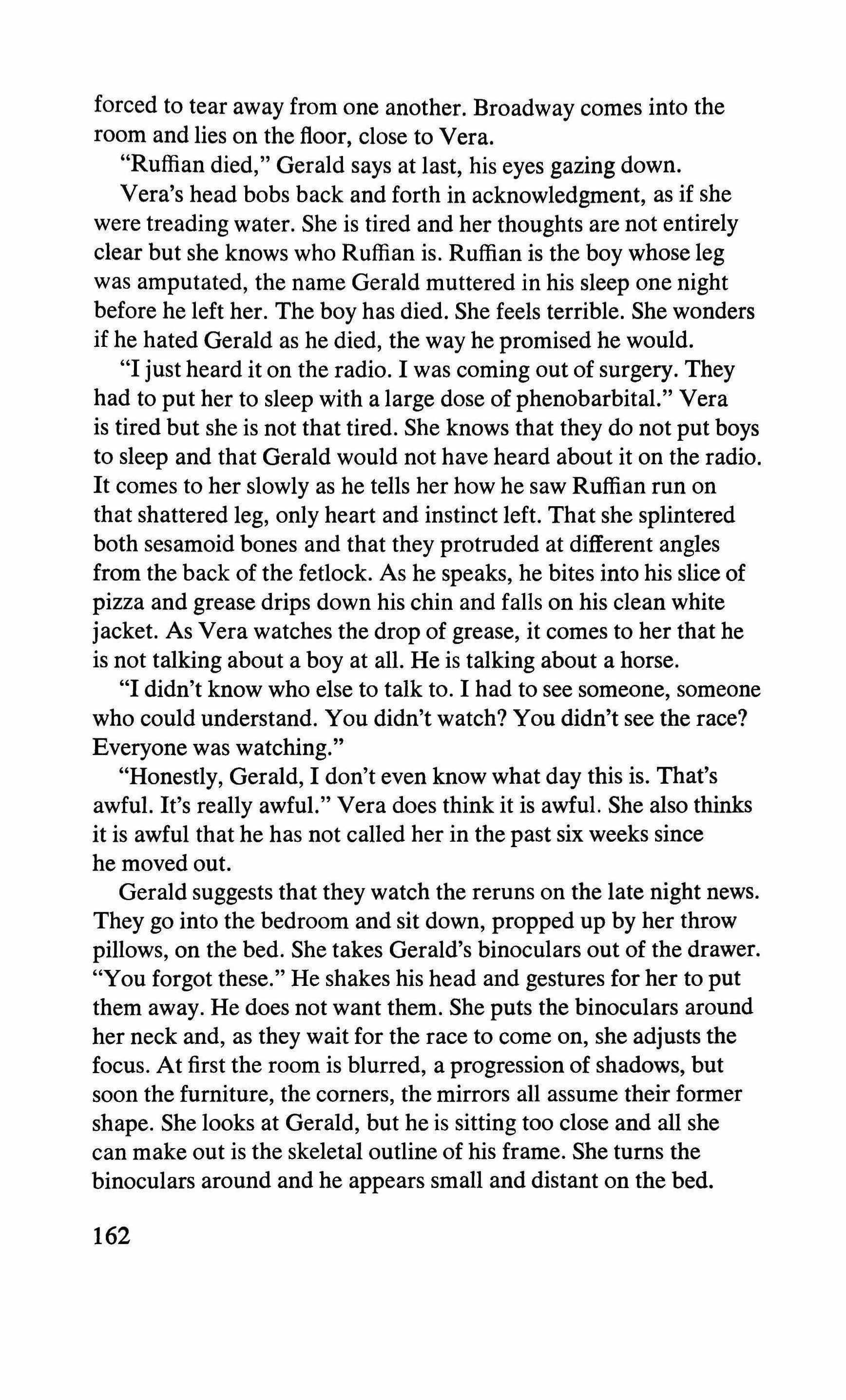
forced to tear away from one another. Broadway comes into the room and lies on the floor, close to Vera.
"Ruffian died," Gerald says at last, his eyes gazing down. Vera's head bobs back and forth in acknowledgment, as if she were treading water. She is tired and her thoughts are not entirely clear but she knows who Ruffian is. Ruffian is the boy whose leg was amputated, the name Gerald muttered in his sleep one night before he left her. The boy has died. She feels terrible. She wonders if he hated Gerald as he died, the way he promised he would.
"I just heard it on the radio. I was coming out of surgery. They had to put her to sleep with a large dose of phenobarbital." Vera is tired but she is not that tired. She knows that they do not put boys to sleep and that Gerald would not have heard about it on the radio. It comes to her slowly as he tells her how he saw Ruffian run on that shattered leg, only heart and instinct left. That she splintered both sesamoid bones and that they protruded at different angles from the back of the fetlock. As he speaks, he bites into his slice of pizza and grease drips down his chin and falls on his clean white jacket. As Vera watches the drop of grease, it comes to her that he is not talking about a boy at all. He is talking about a horse.
"I didn't know who else to talk to. I had to see someone, someone who could understand. You didn't watch? You didn't see the race? Everyone was watching."
"Honestly, Gerald, I don't even know what day this is. That's awful. It's really awful." Vera does think it is awful. She also thinks it is awful that he has not called her in the past six weeks since he moved out.
Gerald suggests that they watch the reruns on the late night news. They go into the bedroom and sit down, propped up by her throw pillows, on the bed. She takes Gerald's binoculars out of the drawer. "You forgot these." He shakes his head and gestures for her to put them away. He does not want them. She puts the binoculars around her neck and, as they wait for the race to come on, she adjusts the focus. At first the room is blurred, a progression of shadows, but soon the furniture, the corners, the mirrors all assume their former shape. She looks at Gerald, but he is sitting too close and all she can make out is the skeletal outline of his frame. She turns the binoculars around and he appears small and distant on the bed.
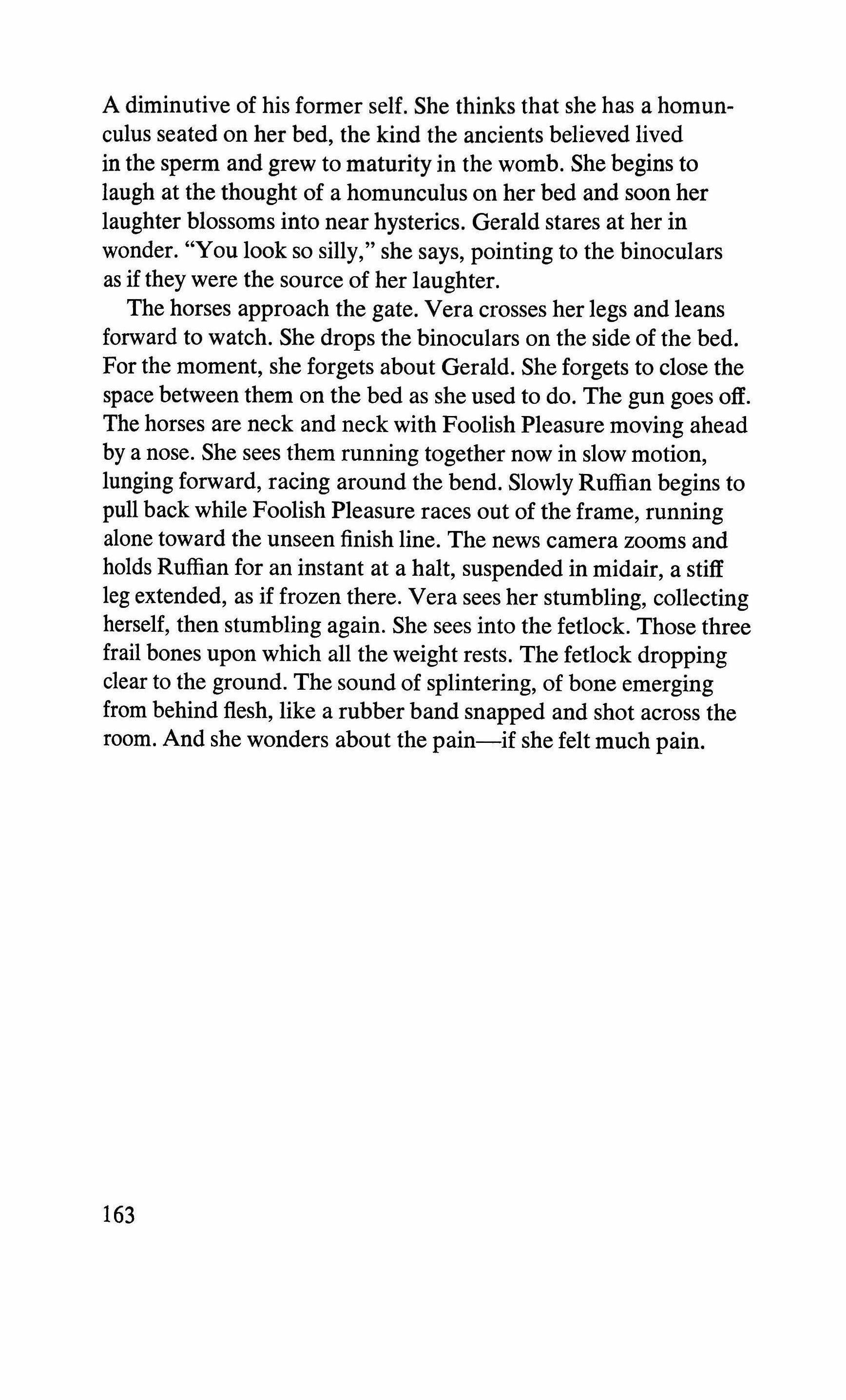
A diminutive of his former self. She thinks that she has a homunculus seated on her bed, the kind the ancients believed lived in the sperm and grew to maturity in the womb. She begins to laugh at the thought of a homunculus on her bed and soon her laughter blossoms into near hysterics. Gerald stares at her in wonder. "You look so silly," she says, pointing to the binoculars as if they were the source of her laughter. The horses approach the gate. Vera crosses her legs and leans forward to watch. She drops the binoculars on the side of the bed. For the moment, she forgets about Gerald. She forgets to close the space between them on the bed as she used to do. The gun goes off. The horses are neck and neck with Foolish Pleasure moving ahead by a nose. She sees them running together now in slow motion, lunging forward, racing around the bend. Slowly Ruffian begins to pull back while Foolish Pleasure races out of the frame, running alone toward the unseen finish line. The news camera zooms and holds Ruffian for an instant at a halt, suspended in midair, a stiff leg extended, as if frozen there. Vera sees her stumbling, collecting herself, then stumbling again. She sees into the fetlock. Those three frail bones upon which all the weight rests. The fetlock dropping clear to the ground. The sound of splintering, of bone emerging from behind flesh, like a rubber band snapped and shot across the room. And she wonders about the pain-if she felt much pain.
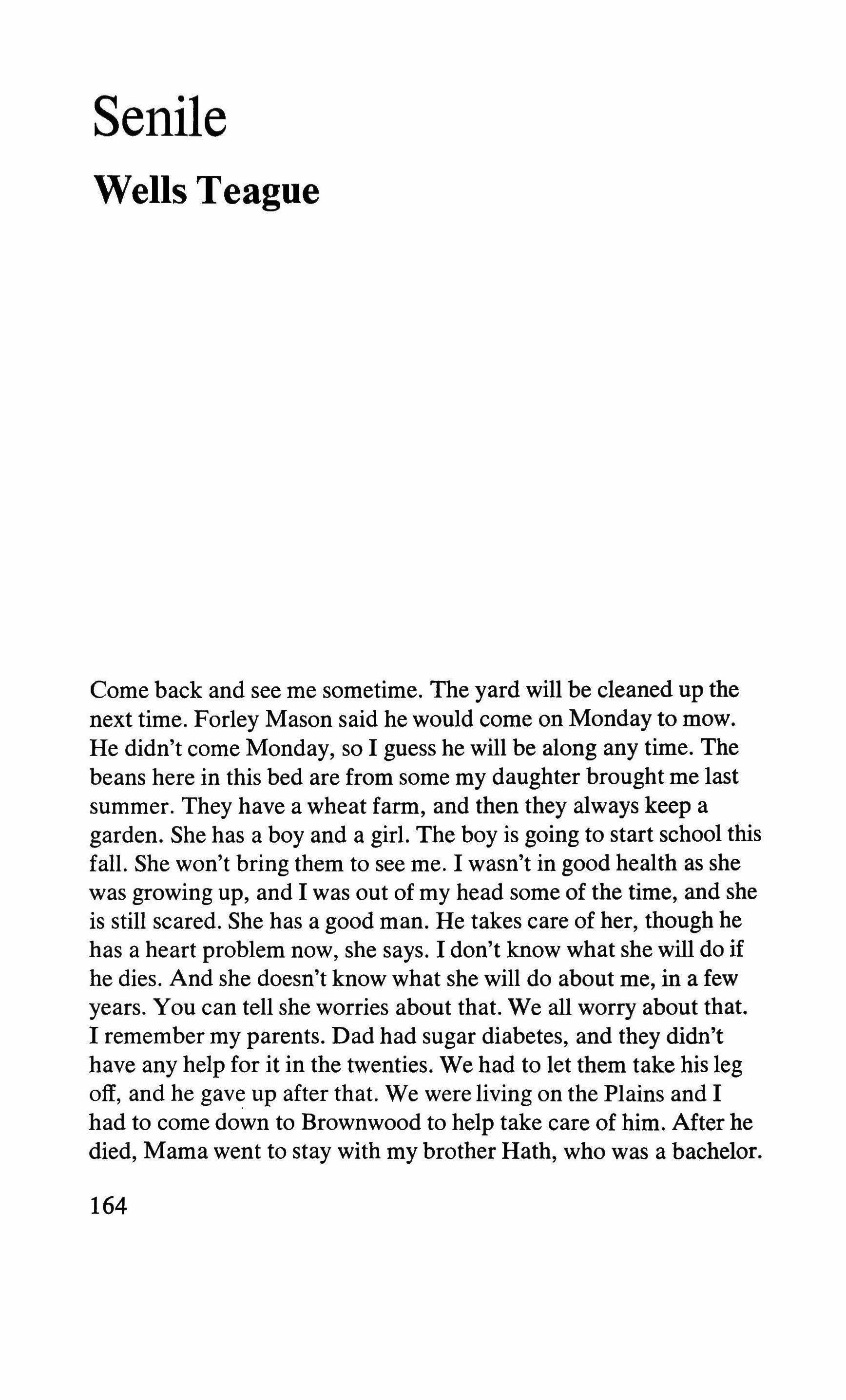
Come back and see me sometime. The yard will be cleaned up the next time. Forley Mason said he would come on Monday to mow. He didn't come Monday, so I guess he will be along any time. The beans here in this bed are from some my daughter brought me last summer. They have a wheat farm, and then they always keep a garden. She has a boy and a girl. The boy is going to start school this fall. She won't bring them to see me. I wasn't in good health as she was growing up, and I was out of my head some of the time, and she is still scared. She has a good man. He takes care of her, though he has a heart problem now, she says. I don't know what she will do if he dies. And she doesn't know what she will do about me, in a few years. You can tell she worries about that. We all worry about that. I remember my parents. Dad had sugar diabetes, and they didn't have any help for it in the twenties. We had to let them take his leg off, and he gave up after that. We were living on the Plains and I had to come down to Brownwood to help take care of him. After he died, Mama went to stay with my brother Hath, who was a bachelor.
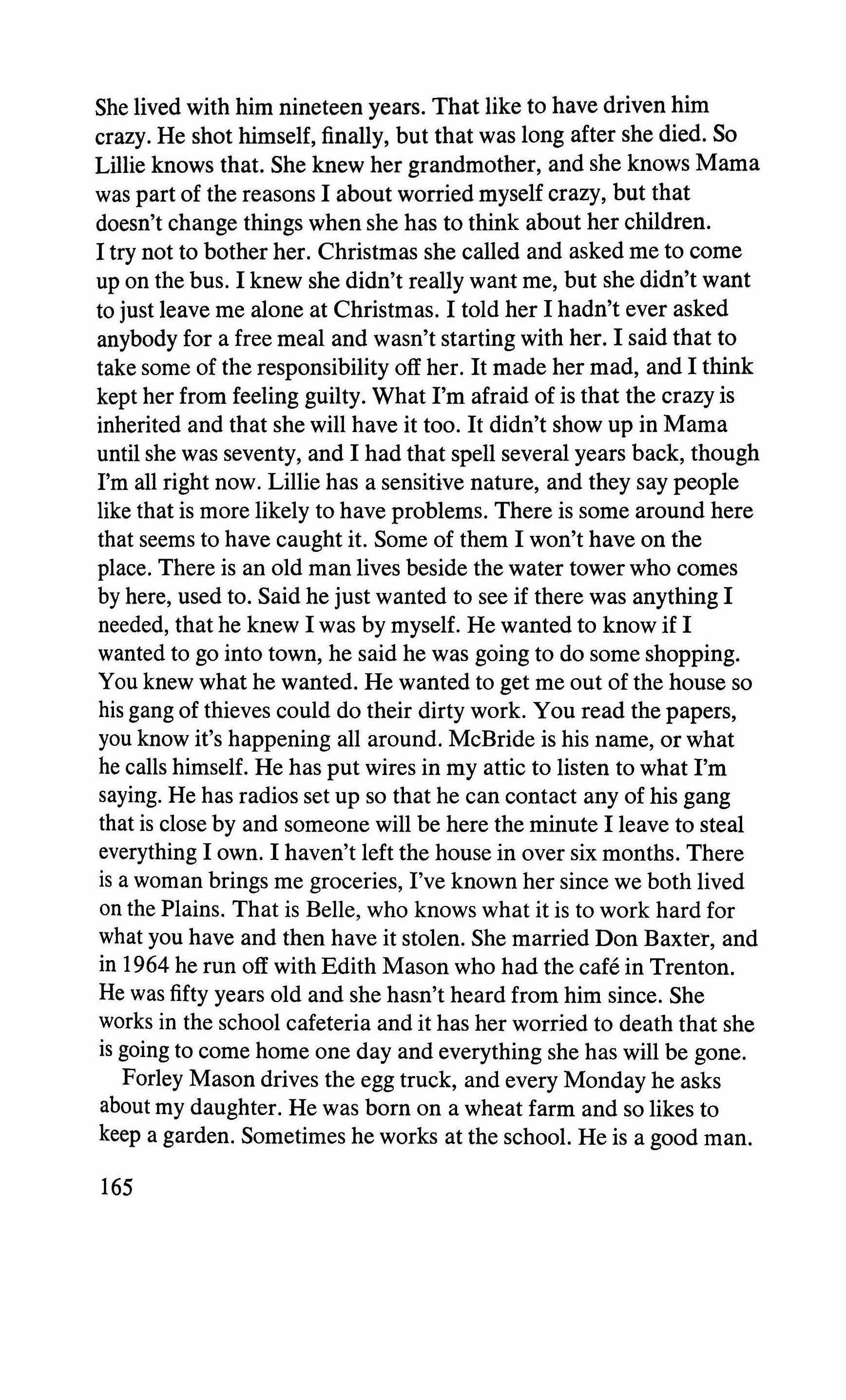
She lived with him nineteen years. That like to have driven him crazy. He shot himself, finally, but that was long after she died. So Lillie knows that. She knew her grandmother, and she knows Mama was part of the reasons I about worried myself crazy, but that doesn't change things when she has to think about her children. I try not to bother her. Christmas she called and asked me to come up on the bus. I knew she didn't really want me, but she didn't want to just leave me alone at Christmas. I told her I hadn't ever asked anybody for a free meal and wasn't starting with her. I said that to take some of the responsibility off her. It made her mad, and I think kept her from feeling guilty. What I'm afraid of is that the crazy is inherited and that she will have it too. It didn't show up in Mama until she was seventy, and I had that spell several years back, though I'm all right now. Lillie has a sensitive nature, and they say people like that is more likely to have problems. There is some around here that seems to have caught it. Some of them I won't have on the place. There is an old man lives beside the water tower who comes by here, used to. Said he just wanted to see if there was anything I needed, that he knew I was by myself. He wanted to know if I wanted to go into town, he said he was going to do some shopping. You knew what he wanted. He wanted to get me out of the house so his gang of thieves could do their dirty work. You read the papers, you know it's happening all around. McBride is his name, or what he calls himself. He has put wires in my attic to listen to what I'm saying. He has radios set up so that he can contact any of his gang that is close by and someone will be here the minute I leave to steal everything I own. I haven't left the house in over six months. There is a woman brings me groceries, I've known her since we both lived on the Plains. That is Belle, who knows what it is to work hard for what you have and then have it stolen. She married Don Baxter, and in 1964 he run off with Edith Mason who had the cafe in Trenton. He was fifty years old and she hasn't heard from him since. She works in the school cafeteria and it has her worried to death that she is going to come home one day and everything she has will be gone. Forley Mason drives the egg truck, and every Monday he asks about my daughter. He was born on a wheat farm and so likes to keep a garden. Sometimes he works at the school. He is a good man.
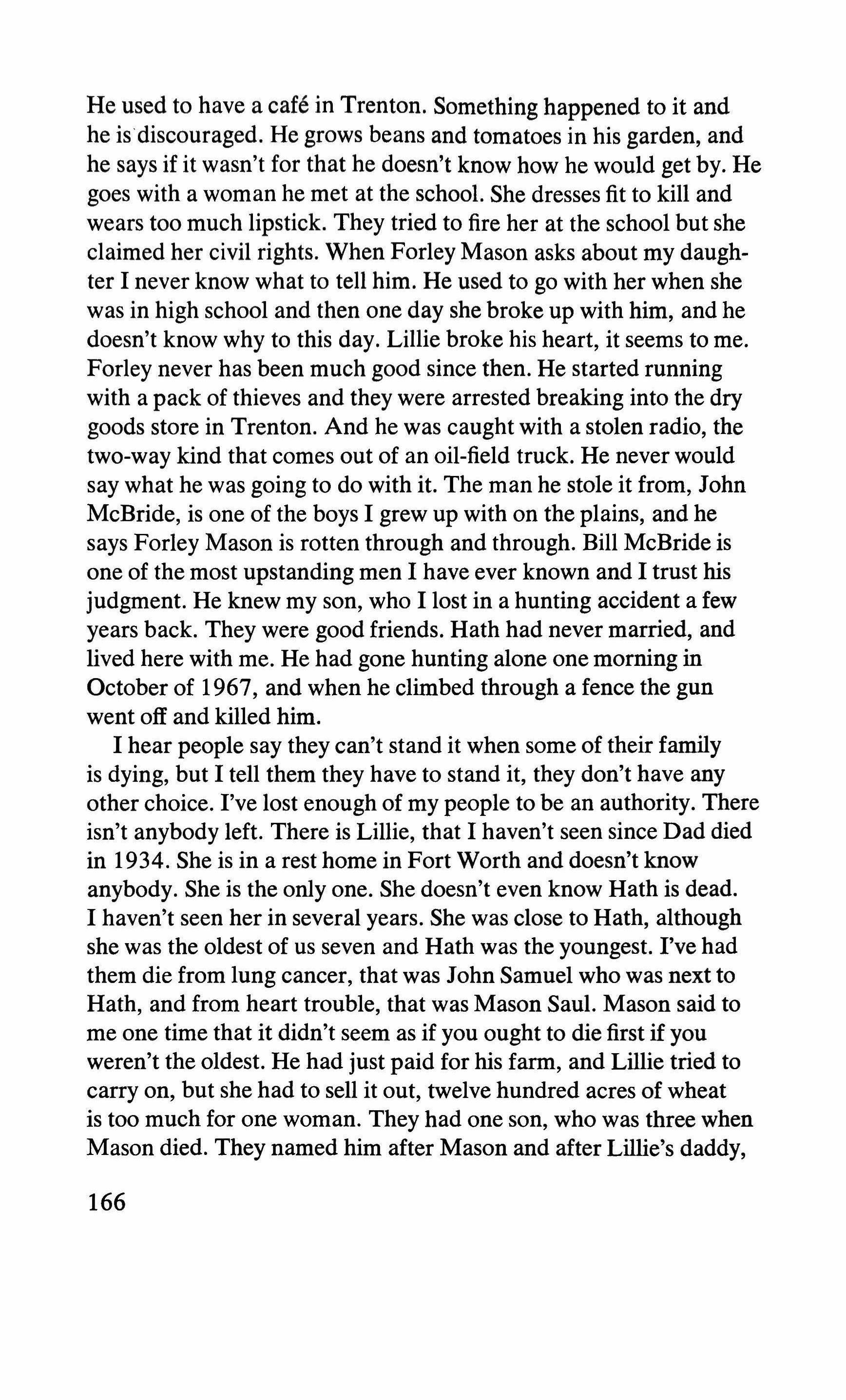
He used to have a cafe in Trenton. Something happened to it and he isdiscouraged. He grows beans and tomatoes in his garden, and he says if it wasn't for that he doesn't know how he would get by. He goes with a woman he met at the school. She dresses fit to kill and wears too much lipstick. They tried to fire her at the school but she claimed her civil rights. When Forley Mason asks about my daughter I never know what to tell him. He used to go with her when she was in high school and then one day she broke up with him, and he doesn't know why to this day. Lillie broke his heart, it seems to me. Forley never has been much good since then. He started running with a pack of thieves and they were arrested breaking into the dry goods store in Trenton. And he was caught with a stolen radio, the two-way kind that comes out of an oil-field truck. He never would say what he was going to do with it. The man he stole it from, John McBride, is one of the boys I grew up with on the plains, and he says Forley Mason is rotten through and through. Bill McBride is one of the most upstanding men I have ever known and I trust his judgment. He knew my son, who I lost in a hunting accident a few years back. They were good friends. Hath had never married, and lived here with me. He had gone hunting alone one morning in October of 1967, and when he climbed through a fence the gun went off and killed him.
I hear people say they can't stand it when some of their family is dying, but I tell them they have to stand it, they don't have any other choice. I've lost enough of my people to be an authority. There isn't anybody left. There is Lillie, that I haven't seen since Dad died in 1934. She is in a rest home in Fort Worth and doesn't know anybody. She is the only one. She doesn't even know Hath is dead. I haven't seen her in several years. She was close to Hath, although she was the oldest of us seven and Hath was the youngest. I've had them die from lung cancer, that was John Samuel who was next to Hath, and from heart trouble, that was Mason Saul. Mason said to me one time that it didn't seem as if you ought to die first if you weren't the oldest. He had just paid for his farm, and Lillie tried to carry on, but she had to sell it out, twelve hundred acres of wheat is too much for one woman. They had one son, who was three when Mason died. They named him after Mason and after Lillie's daddy,
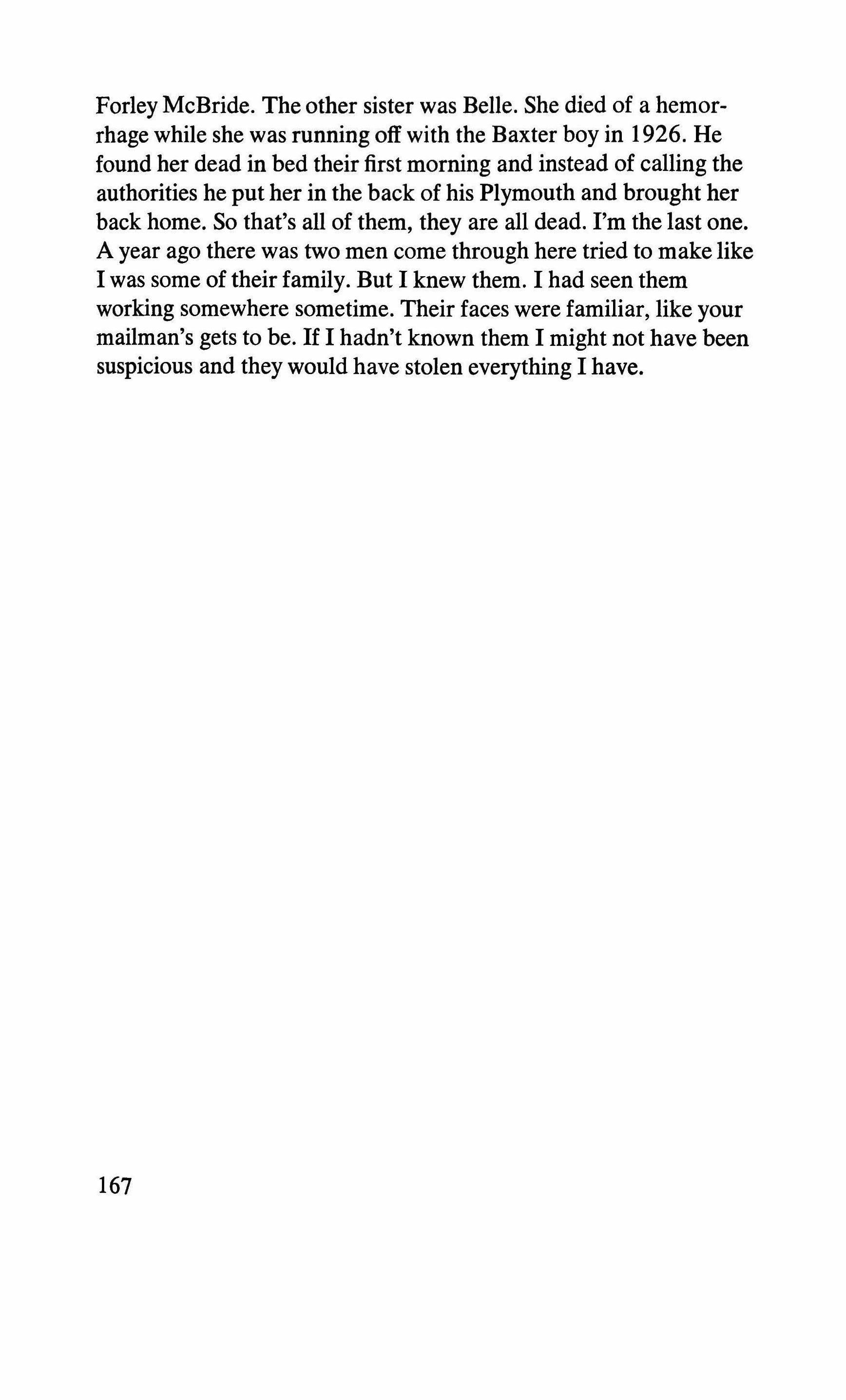
Forley McBride. The other sister was Belle. She died of a hemorrhage while she was running off with the Baxter boy in 1926. He found her dead in bed their first morning and instead of calling the authorities he put her in the back of his Plymouth and brought her back home. So that's all of them, they are all dead. I'm the last one. A year ago there was two men come through here tried to make like I was some of their family. But I knew them. I had seen them working somewhere sometime. Their faces were familiar, like your mailman's gets to be. If I hadn't known them I might not have been suspicious and they would have stolen everything I have.
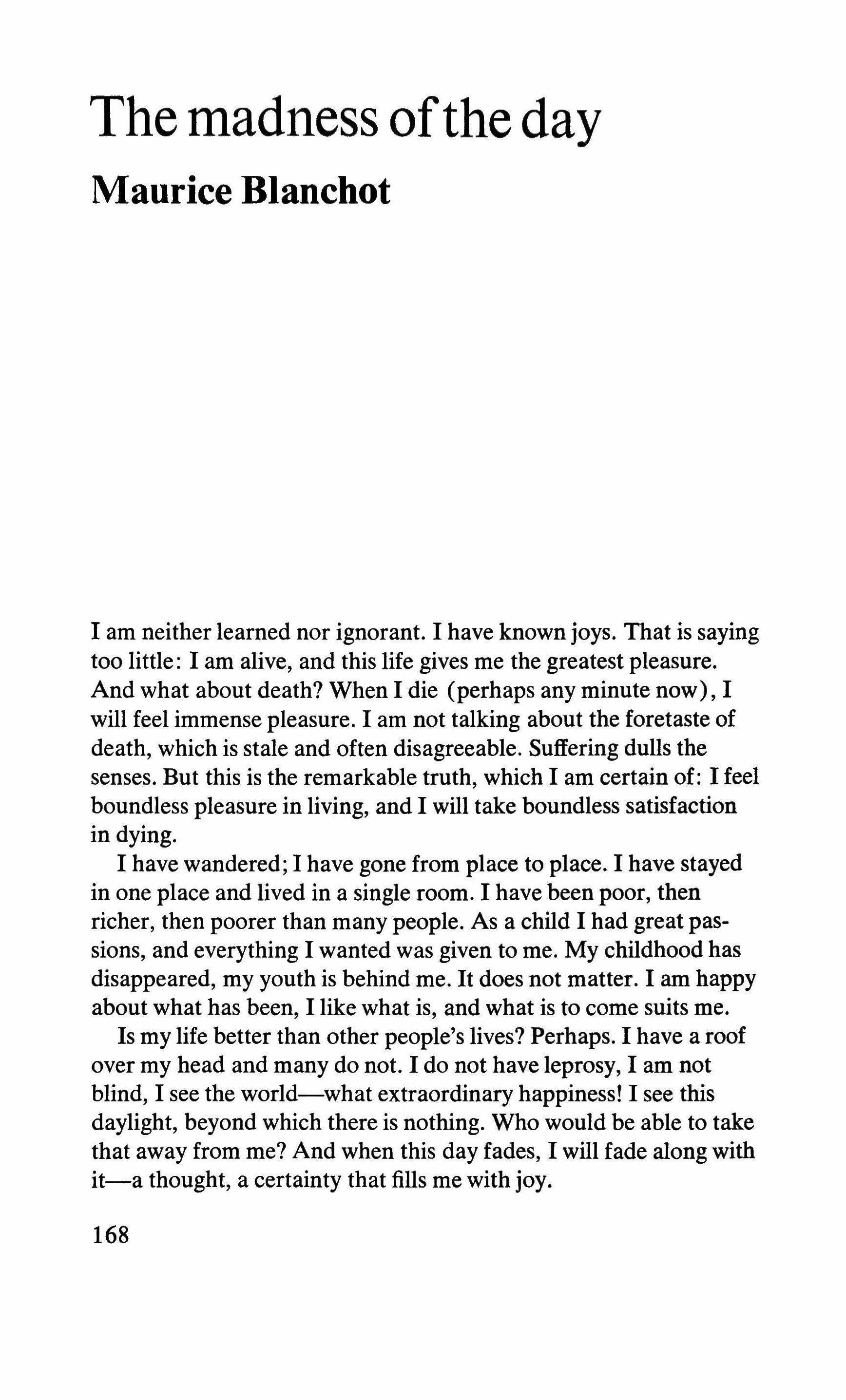
I am neither learned nor ignorant. I have known joys. That is saying too little: I am alive, and this life gives me the greatest pleasure. And what about death? When I die (perhaps any minute now), I will feel immense pleasure. I am not talking about the foretaste of death, which is stale and often disagreeable. Suffering dulls the senses. But this is the remarkable truth, which I am certain of: I feel boundless pleasure in living, and I will take boundless satisfaction in dying.
I have wandered; I have gone from place to place. I have stayed in one place and lived in a single room. I have been poor, then richer, then poorer than many people. As a child I had great passions, and everything I wanted was given to me. My childhood has disappeared, my youth is behind me. It does not matter. I am happy about what has been, I like what is, and what is to come suits me. Is my life better than other people's lives? Perhaps. I have a roof over my head and many do not. I do not have leprosy, I am not blind, I see the world-what extraordinary happiness! I see this daylight, beyond which there is nothing. Who would be able to take that away from me? And when this day fades, I will fade along with it-a thought, a certainty that fills me with joy.
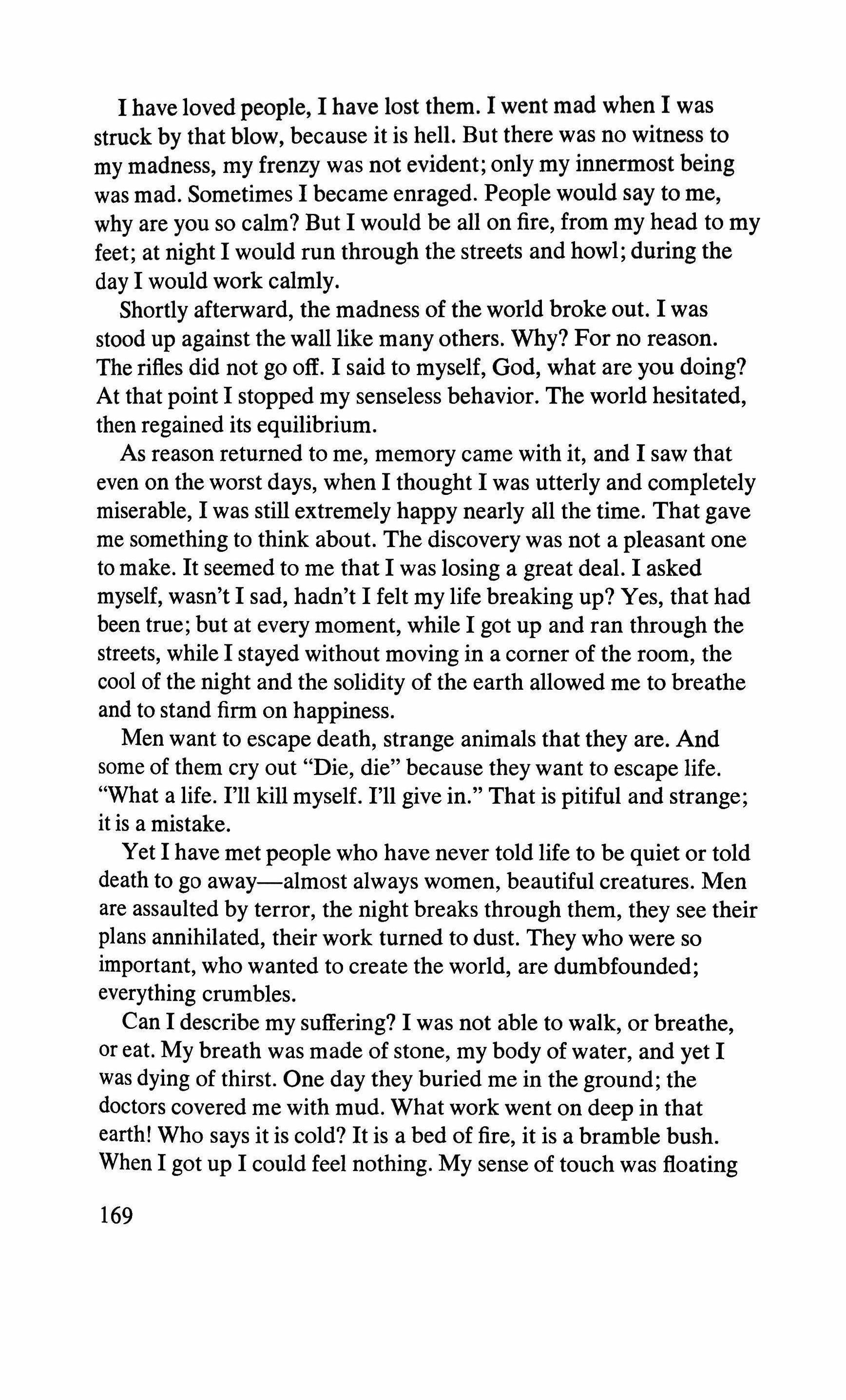
I have loved people, I have lost them. I went mad when I was struck by that blow, because it is hell. But there was no witness to my madness, my frenzy was not evident; only my innermost being was mad. Sometimes I became enraged. People would say to me, why are you so calm? But I would be all on fire, from my head to my feet; at night I would run through the streets and howl; during the day I would work calmly.
Shortly afterward, the madness of the world broke out. I was stood up against the wall like many others. Why? For no reason. The rifles did not go off. I said to myself, God, what are you doing? At that point I stopped my senseless behavior. The world hesitated, then regained its equilibrium.
As reason returned to me, memory came with it, and I saw that even on the worst days, when I thought I was utterly and completely miserable, I was still extremely happy nearly all the time. That gave me something to think about. The discovery was not a pleasant one to make. It seemed to me that I was losing a great deal. I asked myself, wasn't I sad, hadn't I felt my life breaking up? Yes, that had been true; but at every moment, while I got up and ran through the streets, while I stayed without moving in a corner of the room, the cool of the night and the solidity of the earth allowed me to breathe and to stand firm on happiness.
Men want to escape death, strange animals that they are. And some of them cry out "Die, die" because they want to escape life. "What a life. I'll kill myself. I'll give in." That is pitiful and strange; it is a mistake.
Yet I have met people who have never told life to be quiet or told death to go away-almost always women, beautiful creatures. Men are assaulted by terror, the night breaks through them, they see their plans annihilated, their work turned to dust. They who were so important, who wanted to create the world, are dumbfounded; everything crumbles.
Can I describe my suffering? I was not able to walk, or breathe, or eat. My breath was made of stone, my body of water, and yet I was dying of thirst. One day they buried me in the ground; the doctors covered me with mud. What work went on deep in that earth! Who says it is cold? It is a bed of fire, it is a bramble bush. When I got up I could feel nothing. My sense of touch was floating
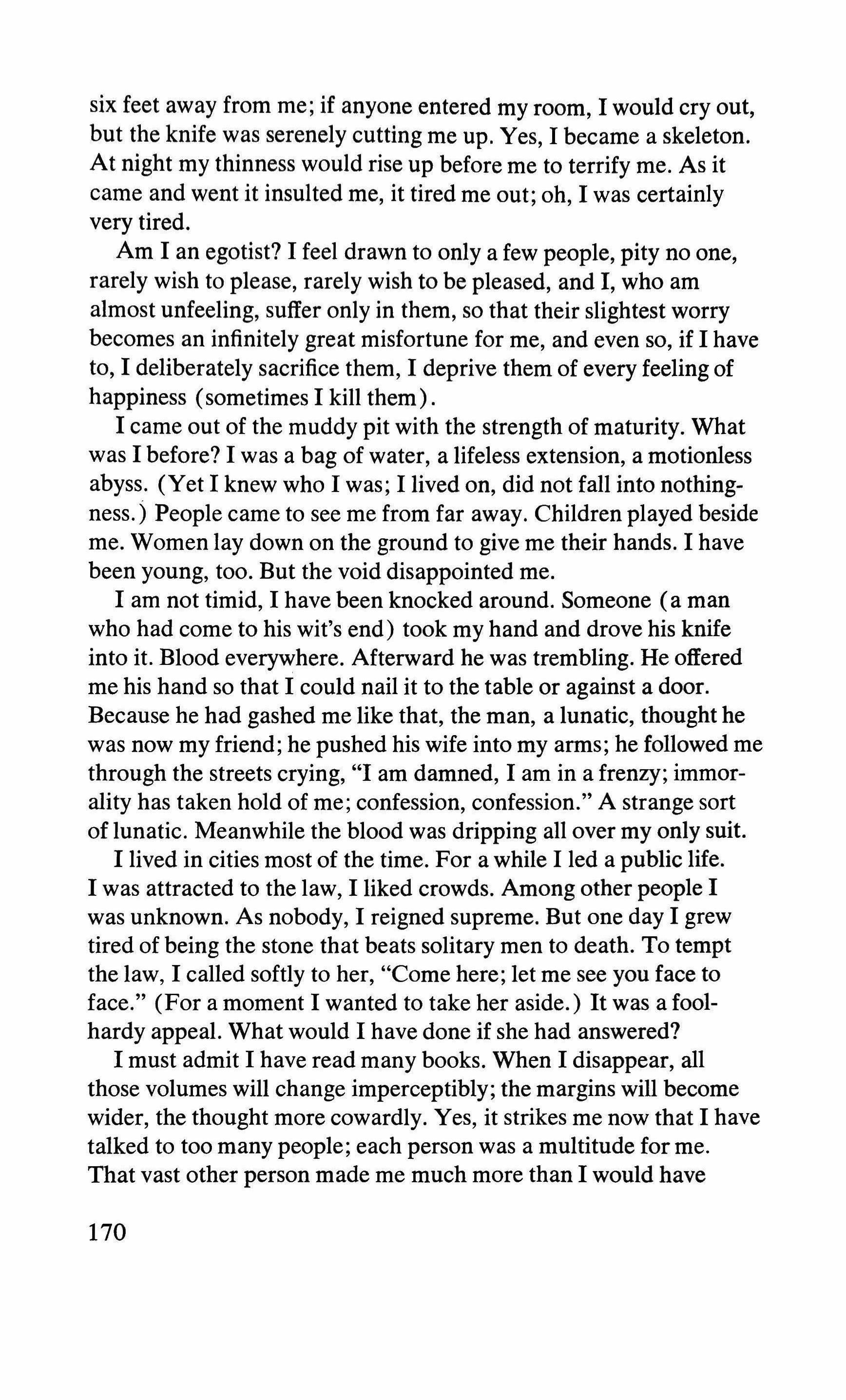
six feet away from me; if anyone entered my room, I would cry out, but the knife was serenely cutting me up. Yes, I became a skeleton. At night my thinness would rise up before me to terrify me. As it came and went it insulted me, it tired me out; oh, I was certainly very tired.
Am I an egotist? I feel drawn to only a few people, pity no one, rarely wish to please, rarely wish to be pleased, and I, who am almost unfeeling, suffer only in them, so that their slightest worry becomes an infinitely great misfortune for me, and even so, if I have to, I deliberately sacrifice them, I deprive them of every feeling of happiness (sometimes I kill them)
I came out of the muddy pit with the strength of maturity. What was I before? I was a bag of water, a lifeless extension, a motionless abyss. (Yet I knew who I was; I lived on, did not fall into nothingness.) People came to see me from far away. Children played beside me. Women lay down on the ground to give me their hands. I have been young, too. But the void disappointed me.
I am not timid, I have been knocked around. Someone (a man who had come to his wit's end) took my hand and drove his knife into it. Blood everywhere. Afterward he was trembling. He offered me his hand so that I could nail it to the table or against a door. Because he had gashed me like that, the man, a lunatic, thought he was now my friend; he pushed his wife into my arms; he followed me through the streets crying, "I am damned, I am in a frenzy; immorality has taken hold of me; confession, confession." A strange sort of lunatic. Meanwhile the blood was dripping all over my only suit. I lived in cities most of the time. For a while I led a public life. I was attracted to the law, I liked crowds. Among other people I was unknown. As nobody, I reigned supreme. But one day I grew tired of being the stone that beats solitary men to death. To tempt the law, I called softly to her, "Come here; let me see you face to face." (For a moment I wanted to take her aside.) It was a foolhardy appeal. What would I have done if she had answered?
I must admit I have read many books. When I disappear, all those volumes will change imperceptibly; the margins will become wider, the thought more cowardly. Yes, it strikes me now that I have talked to too many people; each person was a multitude for me. That vast other person made me much more than I would have

liked. Now my life is surprisingly secure; even fatal diseases find me too tough. I apologize for it, but I must bury a few others before myself.
I was beginning to fall into extreme poverty. Slowly, poverty was drawing circles around me; the first seemed to leave me everything, the last would leave me only myself. One day it happened that I was confined in the city; the idea of traveling was by now only a fantasy. I could not get through to anyone on the telephone. My clothes were wearing out. I was suffering from the cold. Oh, for the spring. I went to libraries. I had become friends with someone who worked in one, and he took me down to the overheated basement. In order to be useful to him I galloped happily over tiny gangways and brought him volumes, which he then sent on to the gloomy spirit of reading. But that spirit spoke against me; I shrank before his eyes; he saw me for what I was, an insect, a creature with mandibles who had come up from the dark regions of poverty. Who was I? It would have thrown me into great perplexity to answer that question.
Outdoors, I saw something briefly. A few steps away from me, just at the corner of the street I was about to leave, a woman with a baby carriage had stopped, I could not see her very well, she was maneuvering the carriage to get it through the outer door. At that moment a man whom I had not seen approaching went in through that door. He had already stepped across the sill when he moved backward and came out again. While he stood next to the door, the baby carriage, passing in front of him, lifted slightly to cross the sill, and the young woman, after raising her head to look at him, disappeared inside.
This brief scene roused me to the point of delirium. I don't suppose I could fully explain it to myself and yet I was sure of it, that I had seized the moment when the day, having come face to face with a real event, would now hasten to its end. Here it comes, I said to myself, the end is coming; something is happening, the end is beginning. I was overcome with joy.
I went to the house but did not go in. Through the opening I saw the black edge of a courtyard. I leaned against the outer wall; I was really very cold. As the cold wrapped around me from head to foot, I slowly felt my great height take on the dimensions of this boundless cold; it grew tranquilly, according to the laws of its true

nature, and I lingered in the joy and perfection of this happiness, for one moment my head as high as the stone of the sky and my feet on the pavement.
All that was real; take note.
I had no enemies. No one disturbed me. Sometimes a vast solitude opened out in my head and the entire world disappeared inside it, but came out again intact, without a scratch, with nothing missing. I nearly lost my sight, because someone crushed glass in my eyes. That blow unnerved me, I must admit. I had the feeling I was going back into the wall, or wandering around in a thicket of flint. The worst thing was the sudden, shocking cruelty of the day; I could neither look nor could I not look. To see was terrifying, and to stop seeing tore me apart from my forehead to my throat. I also heard the cries of a hyena, exposing me to the threat of a wild animal (I think those cries were my own).
Once the glass had been removed, they slipped a thin film under my eyelids and laid walls of cotton wool over them. I was not supposed to talk because talking pulled at the anchors of the bandage. "You were asleep," the doctor told me later. I was asleep! I had to hold my own against the light of seven days-a fine conflagration! Yes, seven days at once, the seven deadlylights, become the spark of a single moment, were calling me to account. Who would have imagined that? At times I said to myself, "This is death. In spite of everything, it's worth it, it's impressive." But often I lay dying without saying anything. Finally I became convinced that I was face to face with the madness of the day. That was the truth: the light was going mad, the brightness had lost all reason; it assailed me irrationally, without control, without purpose. That discovery bit through my life.
I was asleep! When I woke up I had to listen to a man ask me, "Are you going to sue?" A curious question to ask someone who has just been dealing directly with the day.
Even after I had recovered I did not believe it. I could not read or write. I was surrounded by a misty north. But this was what was strange: although I had not forgotten the agonizing contact with the day, I was wasting away from living behind curtains and dark glasses. I wanted to see something in full daylight; I was sated with the pleasure and comfort of the half light; I had the same desire for
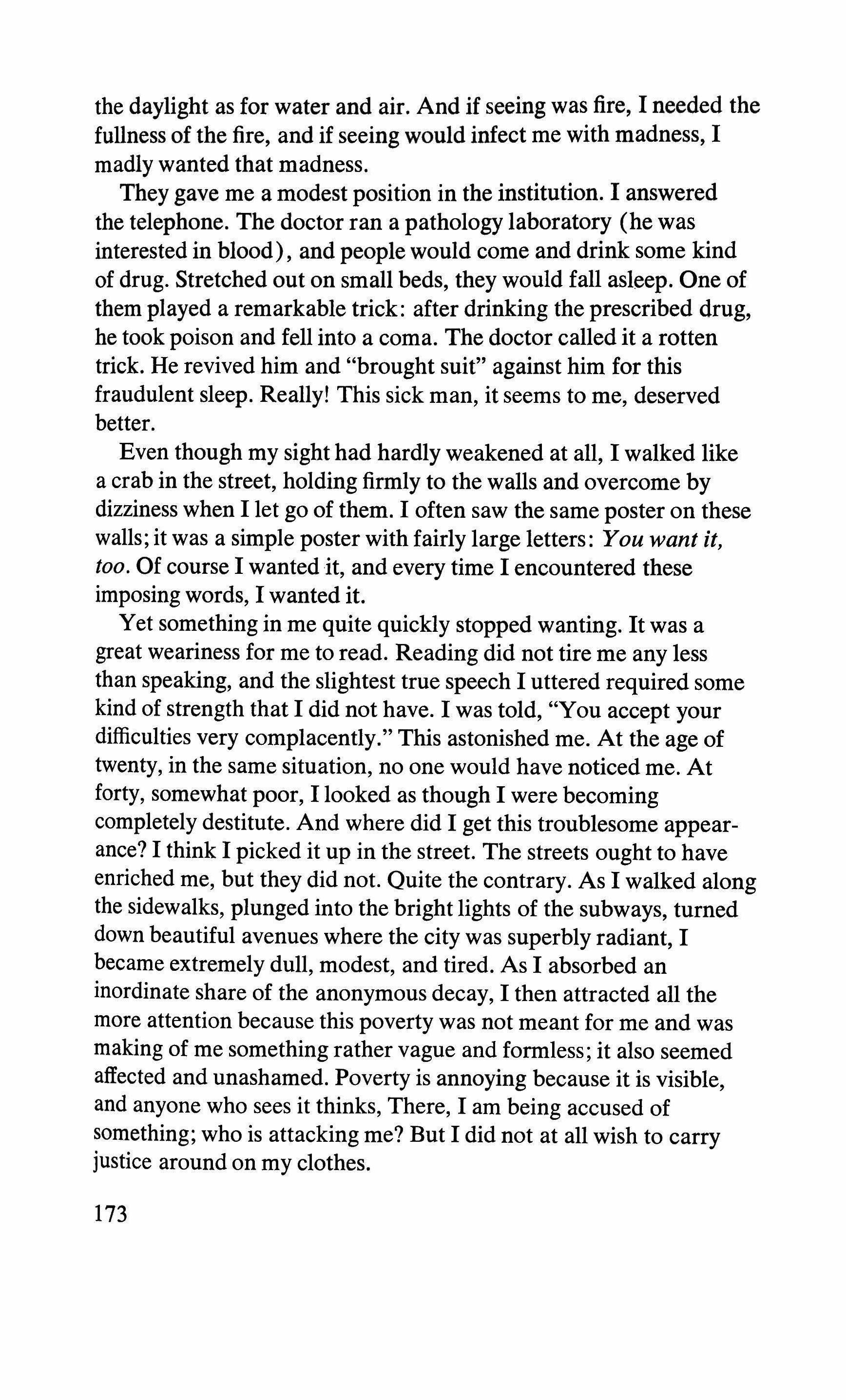
the daylight as for water and air. And if seeing was fire, I needed the fullness of the fire, and if seeing would infect me with madness, I madly wanted that madness.
They gave me a modest position in the institution. I answered the telephone. The doctor ran a pathology laboratory (he was interested in blood), and people would come and drink some kind of drug. Stretched out on small beds, they would fall asleep. One of them played a remarkable trick: after drinking the prescribed drug, he took poison and fell into a coma. The doctor called it a rotten trick. He revived him and "brought suit" against him for this fraudulent sleep. Really! This sick man, it seems to me, deserved better.
Even though my sight had hardly weakened at all, I walked like a crab in the street, holding firmly to the walls and overcome by dizziness when I let go of them. I often saw the same poster on these walls; it was a simple poster with fairly large letters : You want it, too. Of course I wanted it, and every time I encountered these imposing words, I wanted it.
Yet something in me quite quickly stopped wanting. It was a great weariness for me to read. Reading did not tire me any less than speaking, and the slightest true speech I uttered required some kind of strength that I did not have. I was told, "You accept your difficulties very complacently." This astonished me. At the age of twenty, in the same situation, no one would have noticed me. At forty, somewhat poor, I looked as though I were becoming completely destitute. And where did I get this troublesome appearance? I think I picked it up in the street. The streets ought to have enriched me, but they did not. Quite the contrary. As I walked along the sidewalks, plunged into the bright lights of the subways, turned down beautiful avenues where the city was superbly radiant, I became extremely dull, modest, and tired. As I absorbed an inordinate share of the anonymous decay, I then attracted all the more attention because this poverty was not meant for me and was making of me something rather vague and formless; it also seemed affected and unashamed. Poverty is annoying because it is visible, and anyone who sees it thinks, There, I am being accused of something; who is attacking me? But I did not at all wish to carry justice around on my clothes.
173
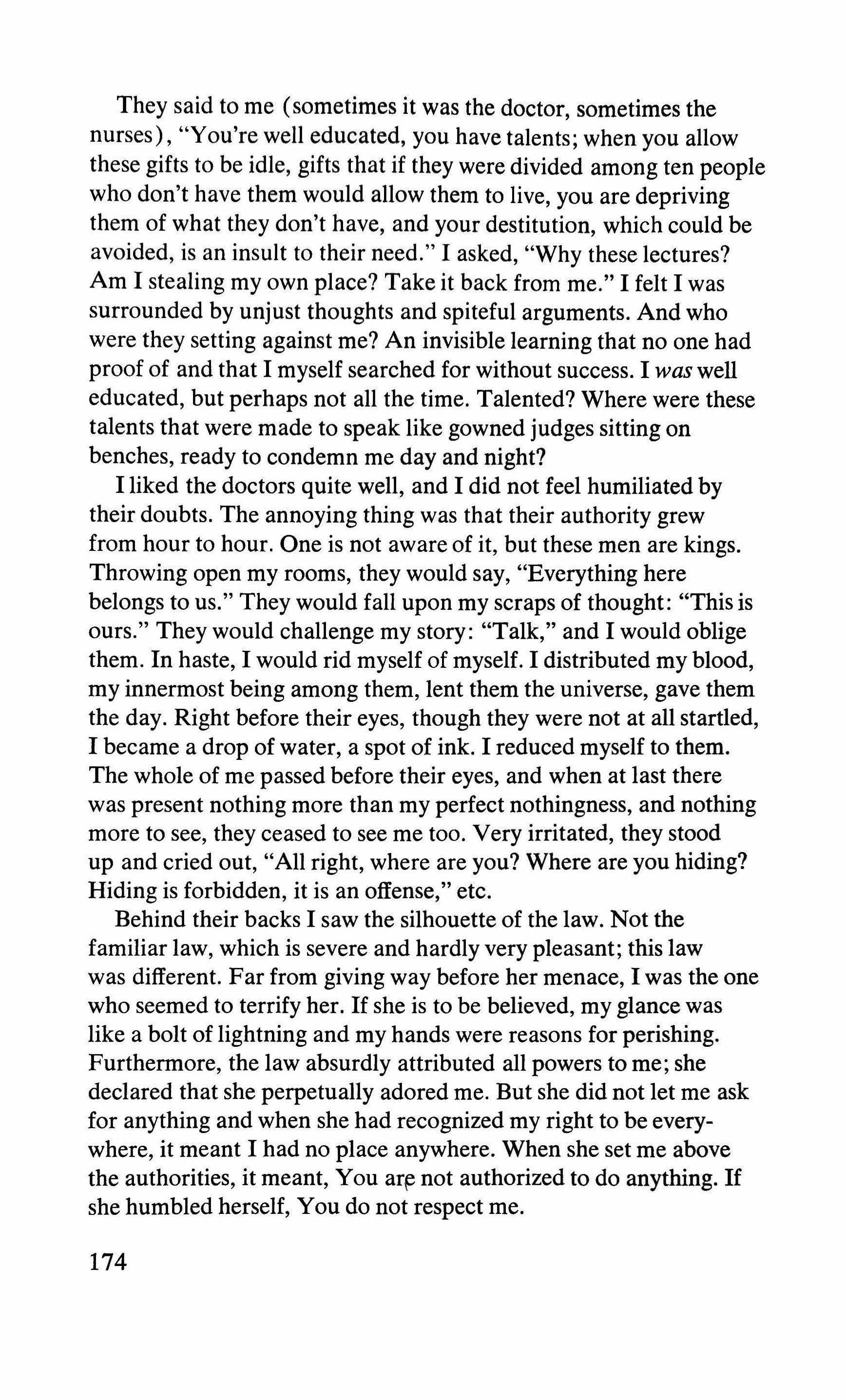
They said to me (sometimes it was the doctor, sometimes the nurses), "You're well educated, you have talents; when you allow these gifts to be idle, gifts that if they were divided among ten people who don't have them would allow them to live, you are depriving them of what they don't have, and your destitution, which could be avoided, is an insult to their need." I asked, "Why these lectures? Am I stealing my own place? Take it back from me." I felt I was surrounded by unjust thoughts and spiteful arguments. And who were they setting against me? An invisible learning that no one had proof of and that I myself searched for without success. I was well educated, but perhaps not all the time. Talented? Where were these talents that were made to speak like gowned judges sitting on benches, ready to condemn me day and night?
I liked the doctors quite well, and I did not feel humiliated by their doubts. The annoying thing was that their authority grew from hour to hour. One is not aware of it, but these men are kings. Throwing open my rooms, they would say, "Everything here belongs to us." They would fall upon my scraps of thought: "This is ours." They would challenge my story: "Talk," and I would oblige them. In haste, I would rid myself of myself. I distributed my blood, my innermost being among them, lent them the universe, gave them the day. Right before their eyes, though they were not at all startled, I became a drop of water, a spot of ink. I reduced myself to them. The whole of me passed before their eyes, and when at last there was present nothing more than my perfect nothingness, and nothing more to see, they ceased to see me too. Very irritated, they stood up and cried out, "All right, where are you? Where are you hiding? Hiding is forbidden, it is an offense," etc.
Behind their backs I saw the silhouette of the law. Not the familiar law, which is severe and hardly very pleasant; this law was different. Far from giving way before her menace, I was the one who seemed to terrify her. If she is to be believed, my glance was like a bolt of lightning and my hands were reasons for perishing. Furthermore, the law absurdly attributed all powers to me; she declared that she perpetually adored me. But she did not let me ask for anything and when she had recognized my right to be everywhere, it meant I had no place anywhere. When she set me above the authorities, it meant, You are not authorized to do anything. If she humbled herself, You do not respect me.
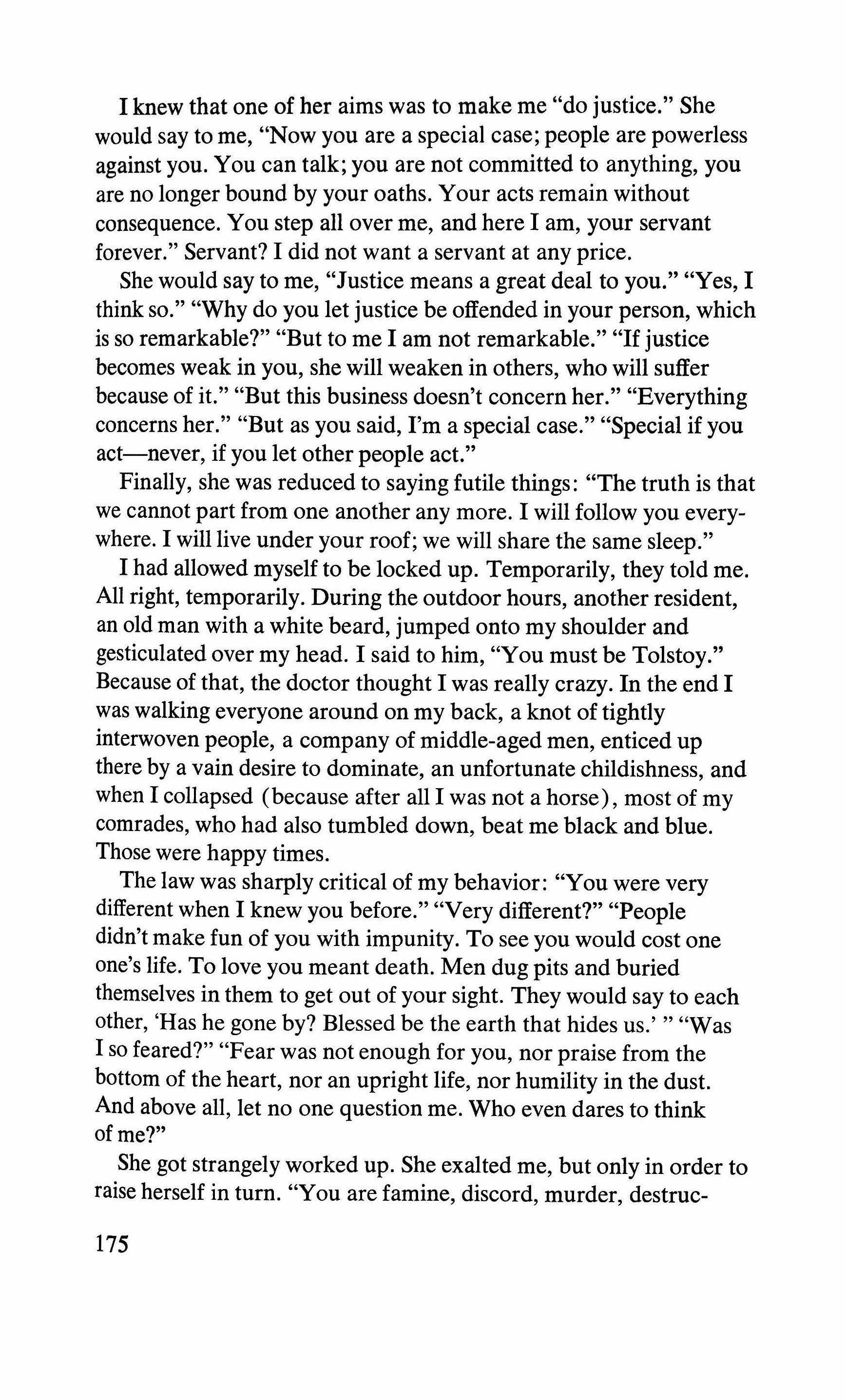
I knew that one of her aims was to make me "do justice." She would say to me, "Now you are a special case; people are powerless against you. You can talk; you are not committed to anything, you are no longer bound by your oaths. Your acts remain without consequence. You step all over me, and here I am, your servant forever." Servant? I did not want a servant at any price.
She would say to me, "Justice means a great deal to you. "Yes, I think so." "Why do you let justice be offended in your person, which is so remarkable?" "But to me I am not remarkable." "If justice becomes weak in you, she will weaken in others, who will suffer because of it." "But this business doesn't concern her." "Everything concerns her." "But as you said, I'm a special case." "Special if you act-never, if you let other people act."
Finally, she was reduced to saying futile things: "The truth is that we cannot part from one another any more. I will follow you everywhere. I will live under your roof; we will share the same sleep."
I had allowed myself to be locked up. Temporarily, they told me.
All right, temporarily. During the outdoor hours, another resident, an old man with a white beard, jumped onto my shoulder and gesticulated over my head. I said to him, "You must be Tolstoy." Because of that, the doctor thought I was really crazy. In the end I was walking everyone around on my back, a knot of tightly interwoven people, a company of middle-aged men, enticed up there by a vain desire to dominate, an unfortunate childishness, and when I collapsed (because after all I was not a horse), most of my comrades, who had also tumbled down, beat me black and blue. Those were happy times.
The law was sharply critical of my behavior: "You were very different when I knew you before." "Very different?" "People didn't make fun of you with impunity. To see you would cost one one's life. To love you meant death. Men dug pits and buried themselves in them to get out of your sight. They would say to each other, 'Has he gone by? Blessed be the earth that hides us.' "Was I so feared?" "Fear was not enough for you, nor praise from the bottom of the heart, nor an upright life, nor humility in the dust. And above all, let no one question me. Who even dares to think of me?"
She got strangely worked up. She exalted me, but only in order to raise herself in turn. "You are famine, discord, murder, destruc-
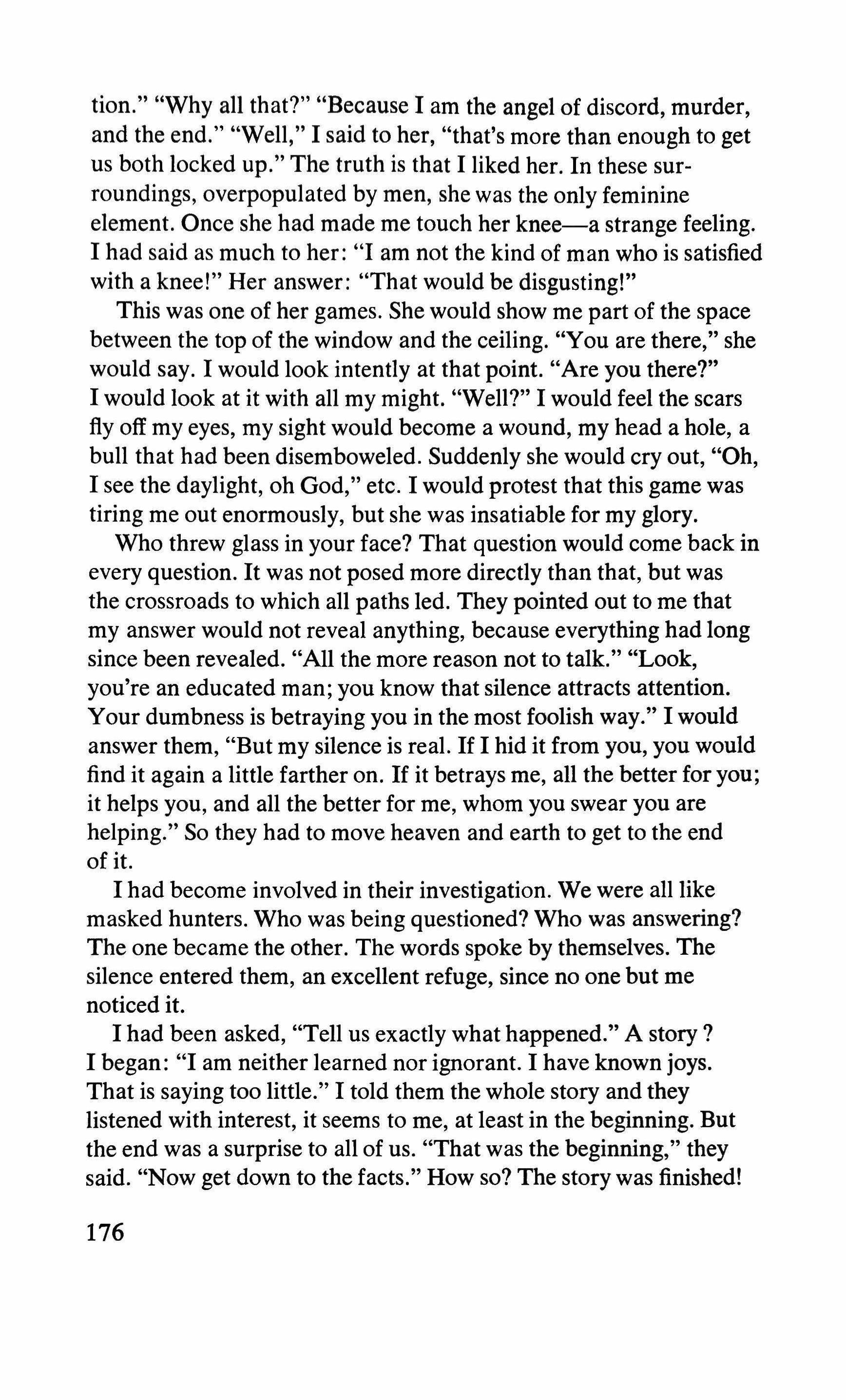
tion." "Why all that?" "Because I am the angel of discord, murder, and the end." "Well," I said to her, "that's more than enough to get us both locked up." The truth is that I liked her. In these surroundings, overpopulated by men, she was the only feminine element. Once she had made me touch her knee-a strange feeling. I had said as much to her: "I am not the kind of man who is satisfied with a knee!" Her answer: "That would be disgusting!"
This was one of her games. She would show me part of the space between the top of the window and the ceiling. "You are there," she would say. I would look intently at that point. "Are you there?" I would look at it with all my might. "Well?" I would feel the scars fly off my eyes, my sight would become a wound, my head a hole, a bull that had been disemboweled. Suddenly she would cry out, "Oh, I see the daylight, oh God," etc. I would protest that this game was tiring me out enormously, but she was insatiable for my glory. Who threw glass in your face? That question would come back in every question. It was not posed more directly than that, but was the crossroads to which all paths led. They pointed out to me that my answer would not reveal anything, because everything had long since been revealed. "All the more reason not to talk." "Look, you're an educated man; you know that silence attracts attention. Your dumbness is betraying you in the most foolish way." I would answer them, "But my silence is real. If I hid it from you, you would find it again a little farther on. If it betrays me, all the better for you; it helps you, and all the better for me, whom you swear you are helping." So they had to move heaven and earth to get to the end of it.
I had become involved in their investigation. We were all like masked hunters. Who was being questioned? Who was answering? The one became the other. The words spoke by themselves. The silence entered them, an excellent refuge, since no one but me noticed it.
I had been asked, "Tell us exactly what happened." A story? I began: "I am neither learned nor ignorant. I have known joys. That is saying too little." I told them the whole story and they listened with interest, it seems to me, at least in the beginning. But the end was a surprise to all of us. "That was the beginning," they said. "Now get down to the facts." How so? The story was finished!
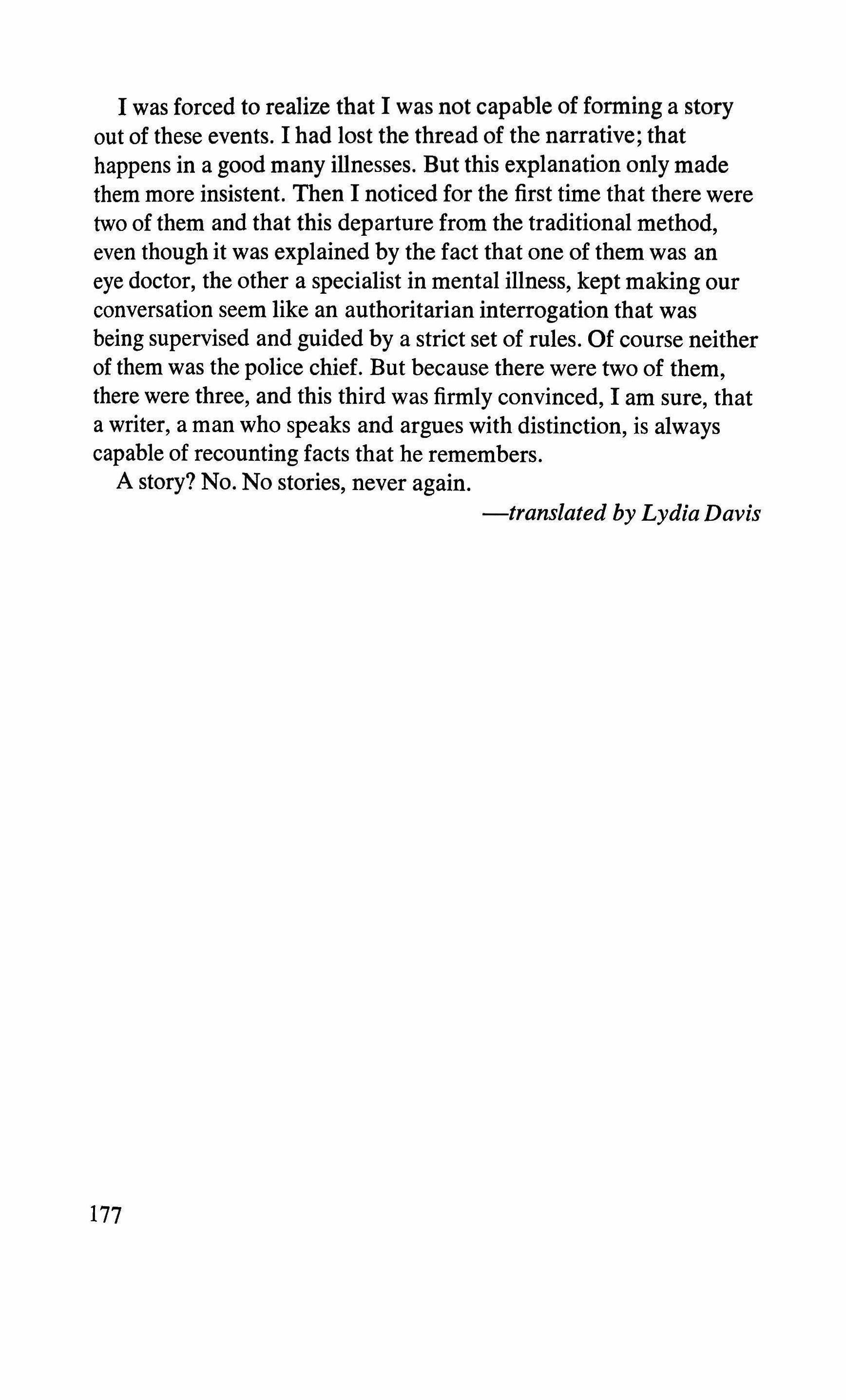
I was forced to realize that I was not capable of forming a story out of these events. I had lost the thread of the narrative; that happens in a good many illnesses. But this explanation only made them more insistent. Then I noticed for the first time that there were two of them and that this departure from the traditional method, even though it was explained by the fact that one of them was an eye doctor, the other a specialist in mental illness, kept making our conversation seem like an authoritarian interrogation that was being supervised and guided by a strict set of rules. Of course neither of them was the police chief. But because there were two of them, there were three, and this third was firmly convinced, I am sure, that a writer, a man who speaks and argues with distinction, is always capable of recounting facts that he remembers. A story? No. No stories, never again.
-translated by Lydia Davis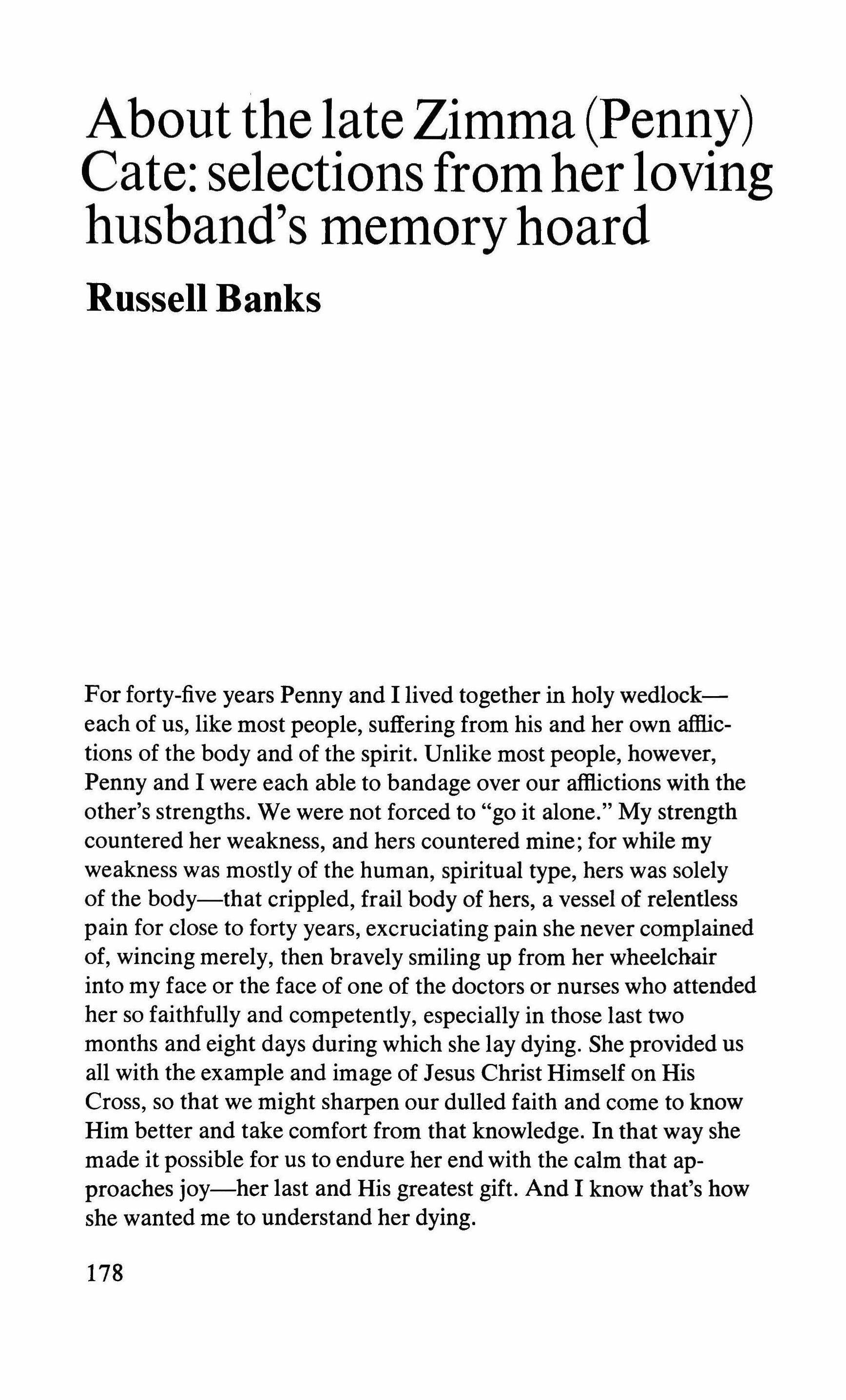
For forty-five years Penny and I lived together in holy wedlockeach of us, like most people, suffering from his and her own afflictions of the body and of the spirit. Unlike most people, however, Penny and I were each able to bandage over our afflictions with the other's strengths. We were not forced to "go it alone." My strength countered her weakness, and hers countered mine; for while my weakness was mostly of the human, spiritual type, hers was solely of the body-that crippled, frail body of hers, a vessel of relentless pain for close to forty years, excruciating pain she never complained of, wincing merely, then bravely smiling up from her wheelchair into my face or the face of one of the doctors or nurses who attended her so faithfully and competently, especially in those last two months and eight days during which she lay dying. She provided us all with the example and image of Jesus Christ Himself on His Cross, so that we might sharpen our dulled faith and come to know Him better and take comfort from that knowledge. In that way she made it possible for us to endure her end with the calm that approaches joy-her last and His greatest gift. And I know that's how she wanted me to understand her dying. 178
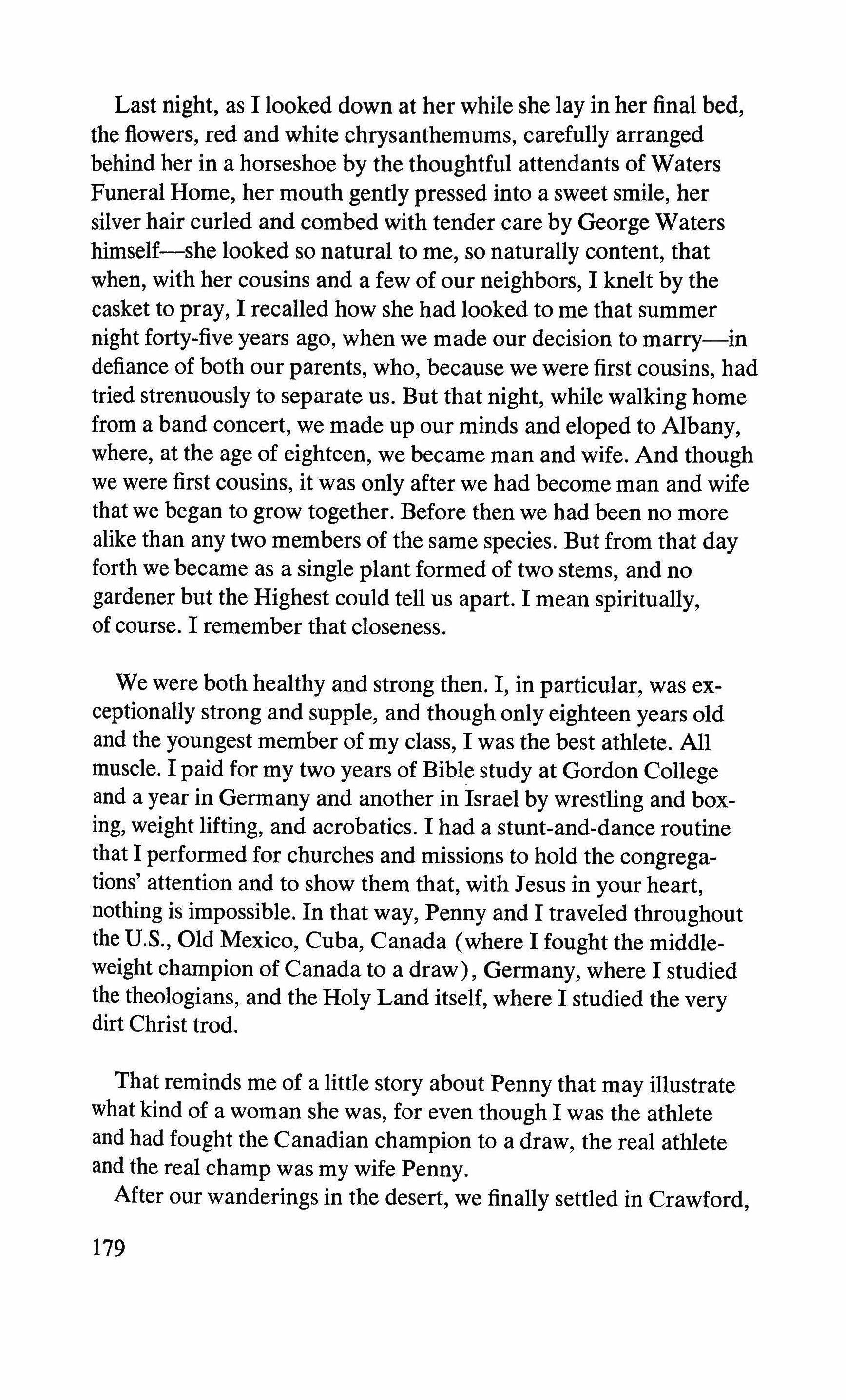
Last night, as I looked down at her while she lay in her final bed, the flowers, red and white chrysanthemums, carefully arranged behind her in a horseshoe by the thoughtful attendants of Waters Funeral Home, her mouth gently pressed into a sweet smile, her silver hair curled and combed with tender care by George Waters himself-she looked so natural to me, so naturally content, that when, with her cousins and a few of our neighbors, I knelt by the casket to pray, I recalled how she had looked to me that summer night forty-five years ago, when we made our decision to marry-in defiance of both our parents, who, because we were first cousins, had tried strenuously to separate us. But that night, while walking home from a band concert, we made up our minds and eloped to Albany, where, at the age of eighteen, we became man and wife. And though we were first cousins, it was only after we had become man and wife that we began to grow together. Before then we had been no more alike than any two members of the same species. But from that day forth we became as a single plant formed of two stems, and no gardener but the Highest could tell us apart. I mean spiritually, of course. I remember that closeness.
We were both healthy and strong then. I, in particular, was exceptionally strong and supple, and though only eighteen years old and the youngest member of my class, I was the best athlete. All muscle. I paid for my two years of Bible study at Gordon College and a year in Germany and another in Israel by wrestling and boxing, weight lifting, and acrobatics. I had a stunt-and-dance routine that I performed for churches and missions to hold the congregations' attention and to show them that, with Jesus in your heart, nothing is impossible. In that way, Penny and I traveled throughout the U.S., Old Mexico, Cuba, Canada (where I fought the middleweight champion of Canada to a draw), Germany, where I studied the theologians, and the Holy Land itself, where I studied the very dirt Christ trod.
That reminds me of a little story about Penny that may illustrate what kind of a woman she was, for even though I was the athlete and had fought the Canadian champion to a draw, the real athlete and the real champ was my wife Penny. After our wanderings in the desert, we finally settled in Crawford,
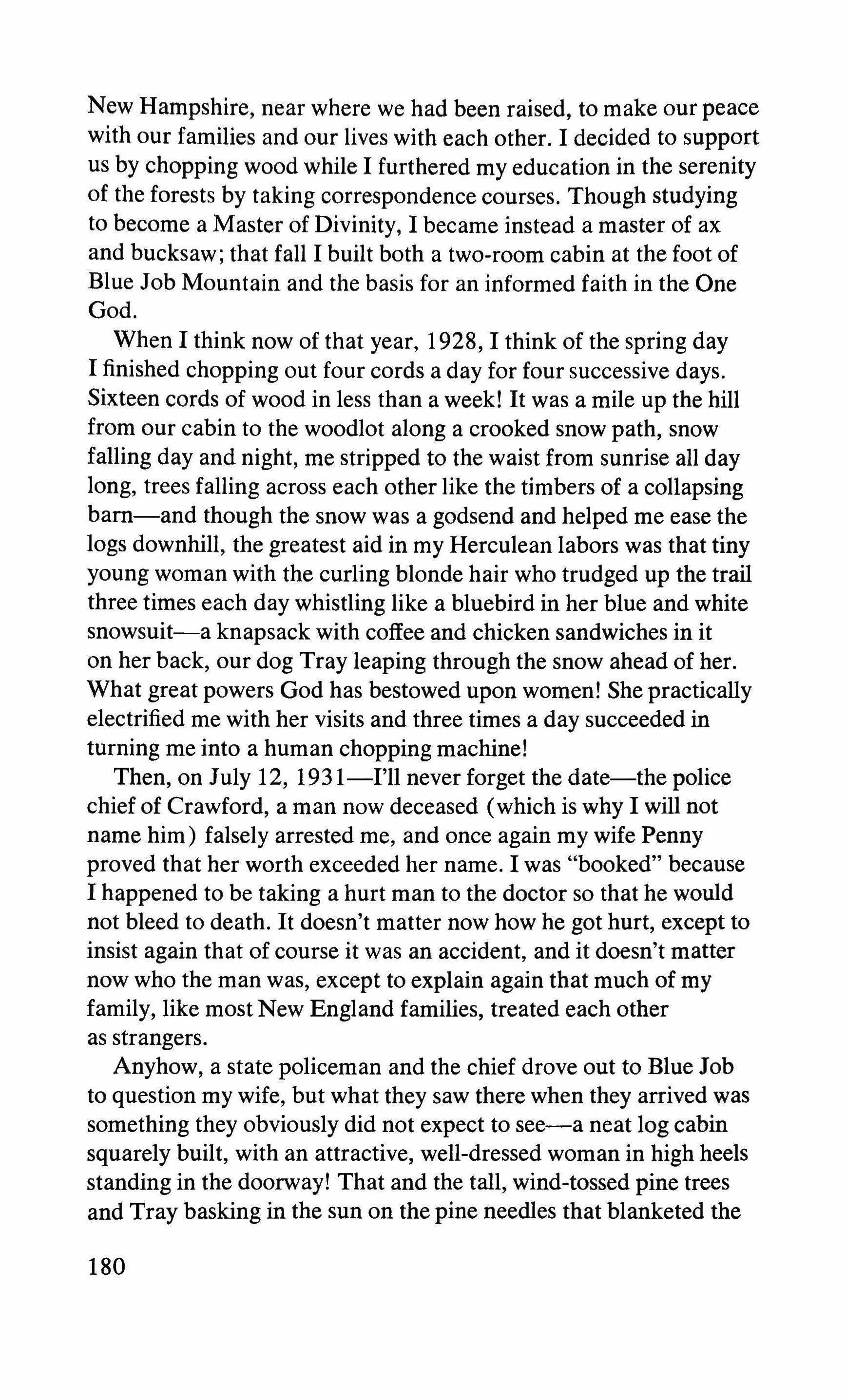
New Hampshire, near where we had been raised, to make our peace with our families and our lives with each other. I decided to support us by chopping wood while I furthered my education in the serenity of the forests by taking correspondence courses. Though studying to become a Master of Divinity, I became instead a master of ax and bucksaw; that fall I built both a two-room cabin at the foot of Blue Job Mountain and the basis for an informed faith in the One God.
When I think now of that year, 1928, I think of the spring day I finished chopping out four cords a day for four successive days. Sixteen cords of wood in less than a week! It was a mile up the hill from our cabin to the woodlot along a crooked snow path, snow falling day and night, me stripped to the waist from sunrise all day long, trees falling across each other like the timbers of a collapsing bam-and though the snow was a godsend and helped me ease the logs downhill, the greatest aid in my Herculean labors was that tiny young woman with the curling blonde hair who trudged up the trail three times each day whistling like a bluebird in her blue and white snowsuit-a knapsack with coffee and chicken sandwiches in it on her back, our dog Tray leaping through the snow ahead of her. What great powers God has bestowed upon women! She practically electrified me with her visits and three times a day succeeded in turning me into a human chopping machine!
Then, on July 12, 1931-1'11 never forget the date-the police chief of Crawford, a man now deceased (which is why I will not name him) falsely arrested me, and once again my wife Penny proved that her worth exceeded her name. I was "booked" because I happened to be taking a hurt man to the doctor so that he would not bleed to death. It doesn't matter now how he got hurt, except to insist again that of course it was an accident, and it doesn't matter now who the man was, except to explain again that much of my family, like most New England families, treated each other as strangers.
Anyhow, a state policeman and the chief drove out to Blue Job to question my wife, but what they saw there when they arrived was something they obviously did not expect to see-a neat log cabin squarely built, with an attractive, well-dressed woman in high heels standing in the doorway! That and the tall, wind-tossed pine trees and Tray basking in the sun on the pine needles that blanketed the
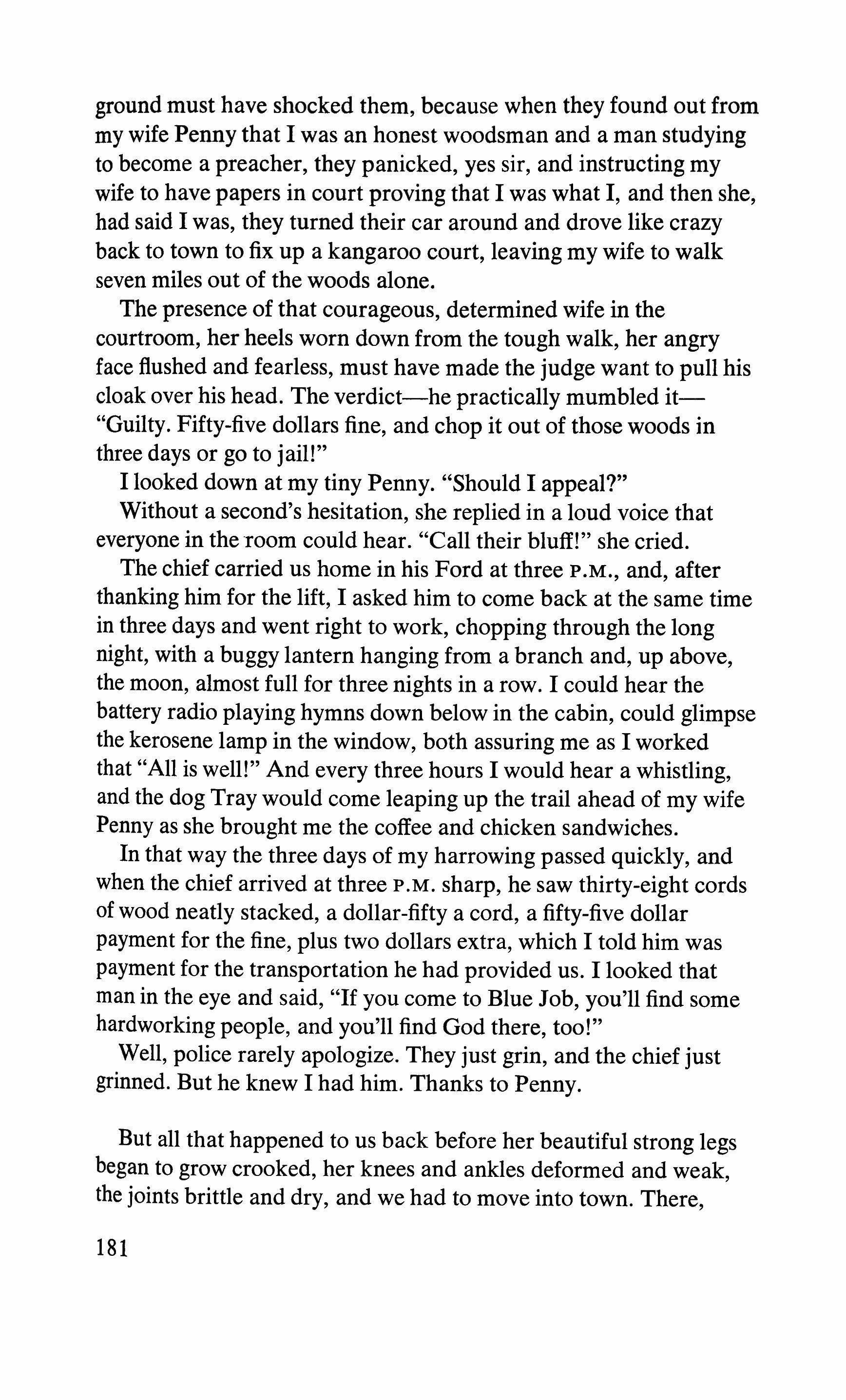
ground must have shocked them, because when they found out from my wife Penny that I was an honest woodsman and a man studying to become a preacher, they panicked, yes sir, and instructing my wife to have papers in court proving that I was what I, and then she, had said I was, they turned their car around and drove like crazy back to town to fix up a kangaroo court, leaving my wife to walk seven miles out of the woods alone.
The presence of that courageous, determined wife in the courtroom, her heels worn down from the tough walk, her angry face flushed and fearless, must have made the judge want to pull his cloak over his head. The verdict-he practically mumbled it"Guilty. Fifty-five dollars fine, and chop it out of those woods in three days or go to jail!"
I looked down at my tiny Penny. "Should I appeal?"
Without a second's hesitation, she replied in a loud voice that everyone in the room could hear. "Call their bluff!" she cried.
The chief carried us home in his Ford at three P.M., and, after thanking him for the lift, I asked him to come back at the same time in three days and went right to work, chopping through the long night, with a buggy lantern hanging from a branch and, up above, the moon, almost full for three nights in a row. I could hear the battery radio playing hymns down below in the cabin, could glimpse the kerosene lamp in the window, both assuring me as I worked that "All is well!" And every three hours I would hear a whistling, and the dog Tray would come leaping up the trail ahead of my wife Penny as she brought me the coffee and chicken sandwiches.
In that way the three days of my harrowing passed quickly, and when the chief arrived at three P.M. sharp, he saw thirty-eight cords of wood neatly stacked, a dollar-fifty a cord, a fifty-five dollar payment for the fine, plus two dollars extra, which I told him was payment for the transportation he had provided us. I looked that man in the eye and said, "If you come to Blue Job, you'll find some hardworking people, and you'll find God there, too!"
Well, police rarely apologize. They just grin, and the chief just grinned. But he knew I had him. Thanks to Penny.
But all that happened to us back before her beautiful strong legs began to grow crooked, her knees and ankles deformed and weak, the joints brittle and dry, and we had to move into town. There,

for the first twelve and a half years, she was able to work the cash register and tend the counter at the old Goucher Market on the Heights, giving service to all who approached her, even though they came from all walks of life. I was unable to find work in the town as a woodsman, so I stayed home and continued with my studies.
The little boys and girls, how well I remember them. They would always ask for Penny to fill their ice-cream cones, and the extra scoop on top always let her slide swiftly into their hungry little hearts. Unable to bear children on her own, she gave all the more to the children of strangers. They believed in what she stood for, even without being able to name it, because she was an idol with a soul inside that cried out to them, "Let Jesus lead you!"
And if the proof and the truth thereof lie with the facts, He did lead them, because some of those little girls today are schoolteachers, nurses, secretaries in government offices, and wives of important men. And the little boys grew up, too, receiving A's in their classes, going on to become members of the police force, firemen, ministers, lawyers, doctors, all of them with vocations. Not a rotten apple in the barrel!
All those fine young men and women were sent by my wife Penny on a mission of success, their large hearts filled with the love of Jesus. Some are now the best lab technicians in the Concord Hospital, dental assistants, a former mayor's wife, a postmaster. A former governor and his wife sent my wife Penny a Christmas card every year for seventeen years, a beautiful card with a picture of their wonderful family, their animals, and their home, with impressive thoughts denoting that love and God in a home make it a castle, something that Penny and I always believed in, no matter how humble our abode, and tried to teach to others.
I remember the time our landlord, Mr. Dubey, made a mistake in the rent receipt, crediting us with two months' rent instead of one. I was coming home from the market and was about to cross the street with a pushcart full of groceries. It was one of those raw, cold days when the snow on the ground looks like bleached leather and the sky is like a wet sheet. Suddenly I saw Mr. Dubey stride out the door of our apartment house, and a second later I saw my wife Penny pop out the same door in her wheelchair, roll down the ramp
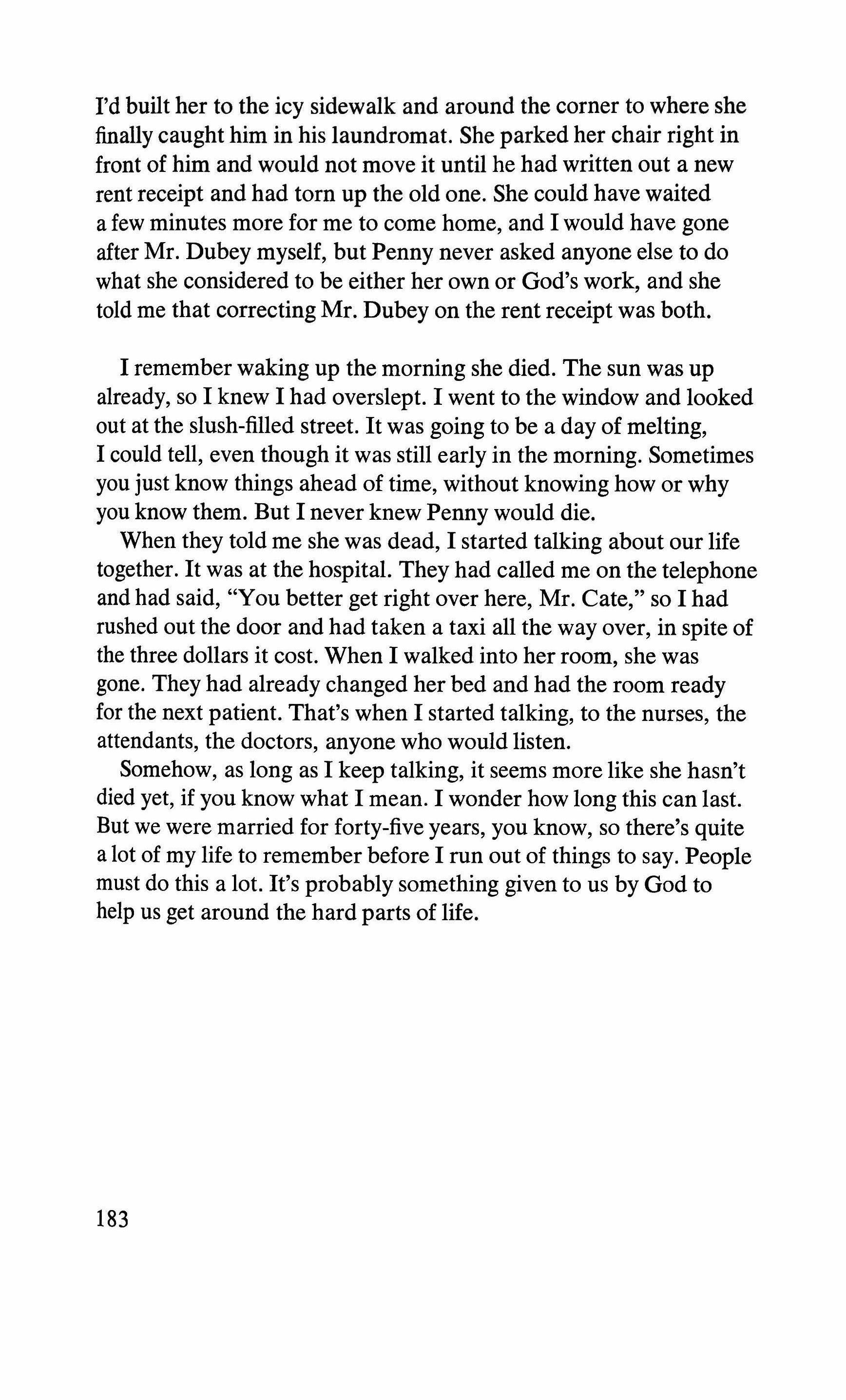
I'd built her to the icy sidewalk and around the corner to where she finally caught him in his laundromat. She parked her chair right in front of him and would not move it until he had written out a new rent receipt and had torn up the old one. She could have waited a few minutes more for me to come home, and I would have gone after Mr. Dubey myself, but Penny never asked anyone else to do what she considered to be either her own or God's work, and she told me that correcting Mr. Dubey on the rent receipt was both.
I remember waking up the morning she died. The sun was up already, so I knew I had overslept. I went to the window and looked out at the slush-filled street. It was going to be a day of melting, I could tell, even though it was still early in the morning. Sometimes you just know things ahead of time, without knowing how or why you know them. But I never knew Penny would die. When they told me she was dead, I started talking about our life together. It was at the hospital. They had called me on the telephone and had said, "You better get right over here, Mr. Cate," so I had rushed out the door and had taken a taxi all the way over, in spite of the three dollars it cost. When I walked into her room, she was gone. They had already changed her bed and had the room ready for the next patient. That's when I started talking, to the nurses, the attendants, the doctors, anyone who would listen. Somehow, as long as I keep talking, it seems more like she hasn't died yet, if you know what I mean. I wonder how long this can last. But we were married for forty-five years, you know, so there's quite a lot of my life to remember before I run out of things to say. People must do this a lot. It's probably something given to us by God to help us get around the hard parts of life.
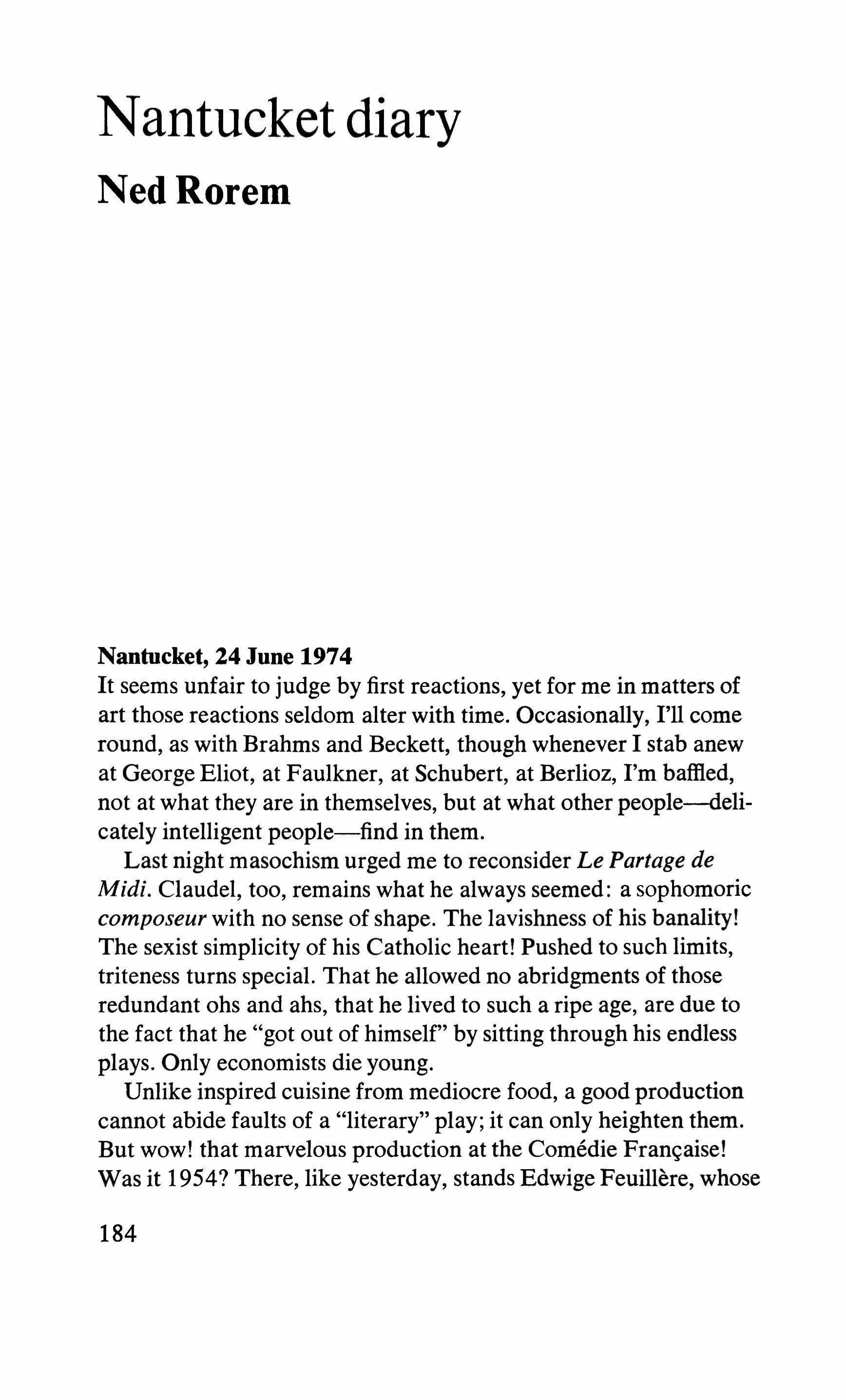
Nantucket, 24 June 1974
It seems unfair to judge by first reactions, yet for me in matters of art those reactions seldom alter with time. Occasionally, I'll come round, as with Brahms and Beckett, though whenever I stab anew at George Eliot, at Faulkner, at Schubert, at Berlioz, I'm baffled, not at what they are in themselves, but at what other people--delicately intelligent people-find in them.
Last night masochism urged me to reconsider Le Partage de Midi. Claudel, too, remains what he always seemed: a sophomoric composeur with no sense of shape. The lavishness of his banality! The sexist simplicity of his Catholic heart! Pushed to such limits, triteness turns special. That he allowed no abridgments of those redundant ohs and ahs, that he lived to such a ripe age, are due to the fact that he "got out of himself' by sitting through his endless plays. Only economists die young.
Unlike inspired cuisine from mediocre food, a goodproduction cannot abide faults of a "literary" play; it can only heighten them. But wow! that marvelous production at the Comedic Francaise! Was it 1954? There, like yesterday, stands Edwige Feuillere, whose
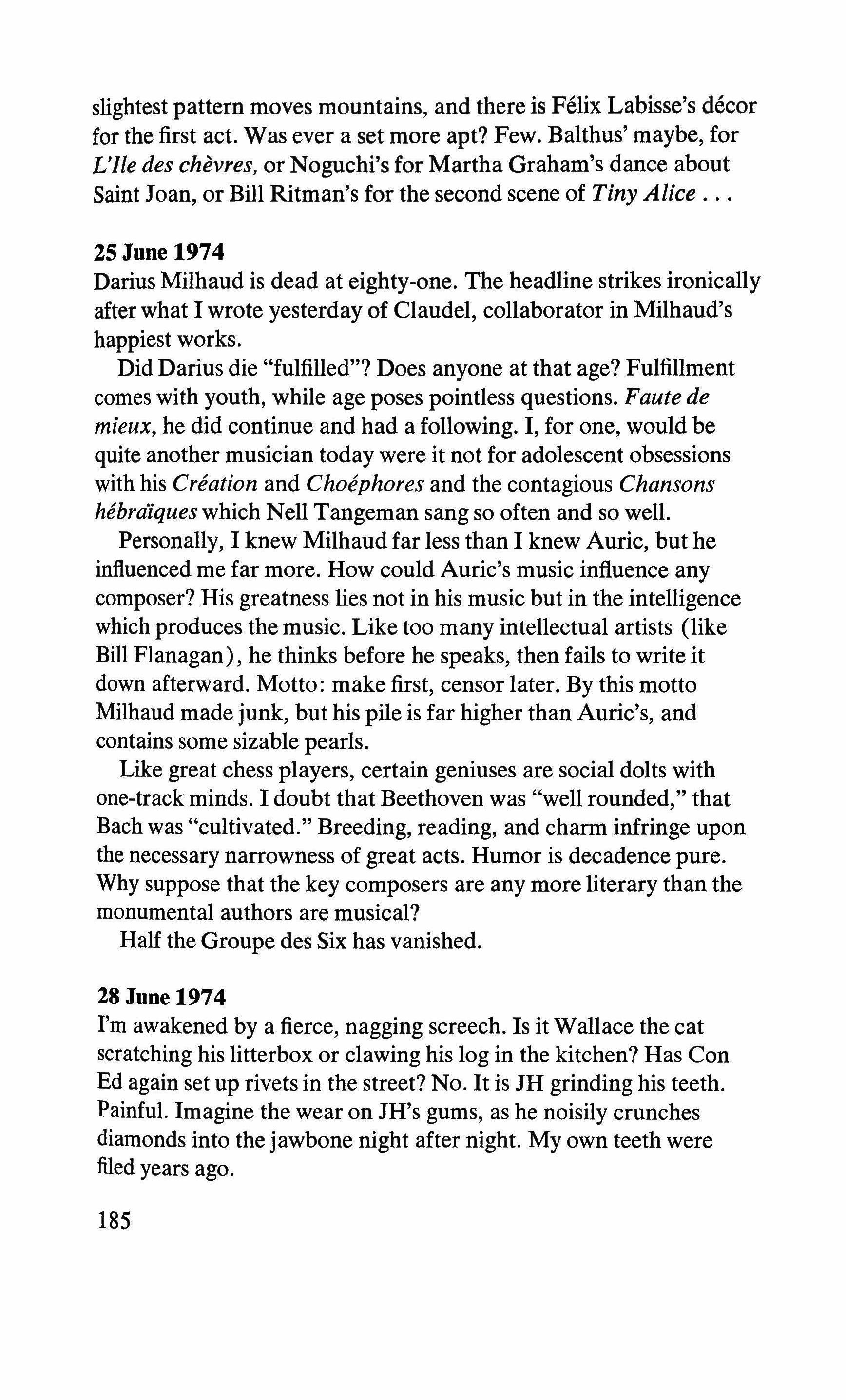
slightest pattern moves mountains, and there is Felix Labisse's decor for the first act. Was ever a set more apt? Few. Balthus' maybe, for L'Ile des chevres, or Noguchi's for Martha Graham's dance about Saint Joan, or Bill Ritman's for the second scene of Tiny Alice
25 June 1974
Darius Milhaud is dead at eighty-one. The headline strikes ironically after what I wrote yesterday of Claudel, collaborator in Milhaud's happiest works.
Did Darius die "fulfilled"? Does anyone at that age? Fulfillment comes with youth, while age poses pointless questions. Faute de mieux, he did continue and had a following. I, for one, would be quite another musician today were it not for adolescent obsessions with his Creation and Choephores and the contagious Chansons hebrdiques which Nell Tangeman sang so often and so well.
Personally, I knew Milhaud far less than I knew Auric, but he influenced me far more. How could Auric's music influence any composer? His greatness lies not in his music but in the intelligence which produces the music. Like too many intellectual artists (like Bill Flanagan), he thinks before he speaks, then fails to write it down afterward. Motto: make first, censor later. By this motto Milhaud made junk, but his pile is far higher than Auric's, and contains some sizable pearls.
Like great chess players, certain geniuses are social dolts with one-track minds. I doubt that Beethoven was "well rounded," that Bach was "cultivated." Breeding, reading, and charm infringe upon the necessary narrowness of great acts. Humor is decadence pure. Why suppose that the key composers are any more literary than the monumental authors are musical?
Half the Groupe des Six has vanished.
28 June 1974
I'm awakened by a fierce, nagging screech. Is it Wallace the cat scratching his litterbox or clawing his log in the kitchen? Has Con Ed again set up rivets in the street? No. It is JH grinding his teeth. Painful. Imagine the wear on JH's gums, as he noisily crunches diamonds into the jawbone night after night. My own teeth were filed years ago.
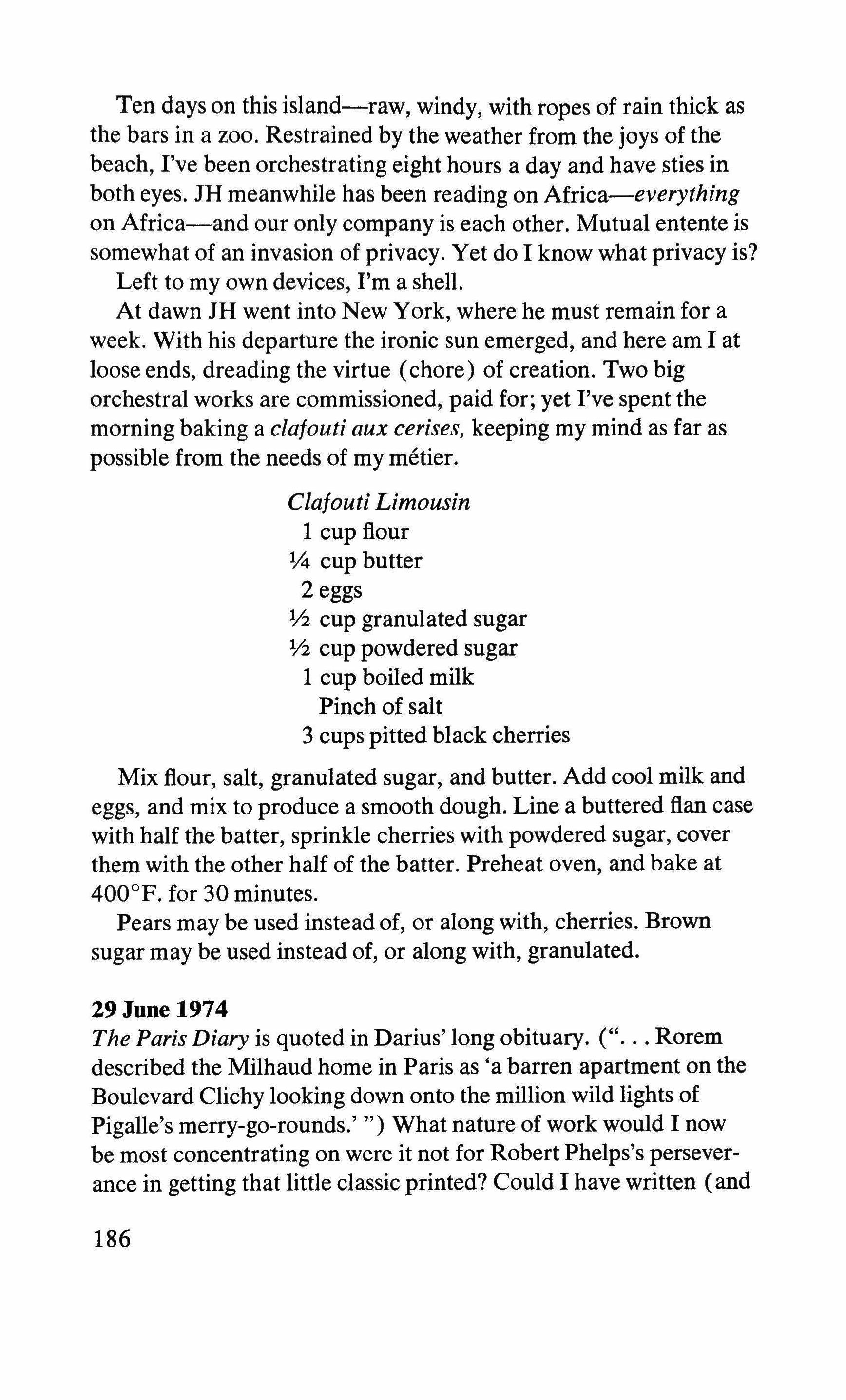
Ten days on this island-raw, windy, with ropes of rain thick as the bars in a zoo. Restrained by the weather from the joys of the beach, I've been orchestrating eight hours a day and have sties in both eyes. JH meanwhile has been reading on Africa-everything on Africa-and our only company is each other. Mutual entente is somewhat of an invasion of privacy. Yet do I know what privacy is?
Left to my own devices, I'm a shell.
At dawn JH went into New York, where he must remain for a week. With his departure the ironic sun emerged, and here am I at loose ends, dreading the virtue (chore) of creation. Two big orchestral works are commissioned, paid for; yet I've spent the morningbaking a claiouti aux cerises, keeping my mind as far as possible from the needs of my metier.
Clajouti Limousin
1 cup flour
14 cup butter
2 eggs
� cup granulated sugar
� cup powdered sugar
1 cup boiled milk
Pinch of salt
3 cups pitted black cherries
Mix flour, salt, granulated sugar, and butter. Add cool milk and eggs, and mix to produce a smooth dough. Line a buttered flan case with half the batter, sprinkle cherries with powdered sugar, cover them with the other half of the batter. Preheat oven, and bake at 400°F. for 30 minutes.
Pears may be used instead of, or along with, cherries. Brown sugar may be used instead of, or along with, granulated.
29 June 1974
The Paris Diary is quoted in Darius' long obituary. (" Rorem described the Milhaud home in Paris as 'a barren apartment on the Boulevard Clichy looking down onto the million wild lights of Pigalle's merry-go-rounds.' ") What nature of work would I now be most concentrating on were it not for Robert Phelps's perseverance in getting that little classic printed? Could I have written (and
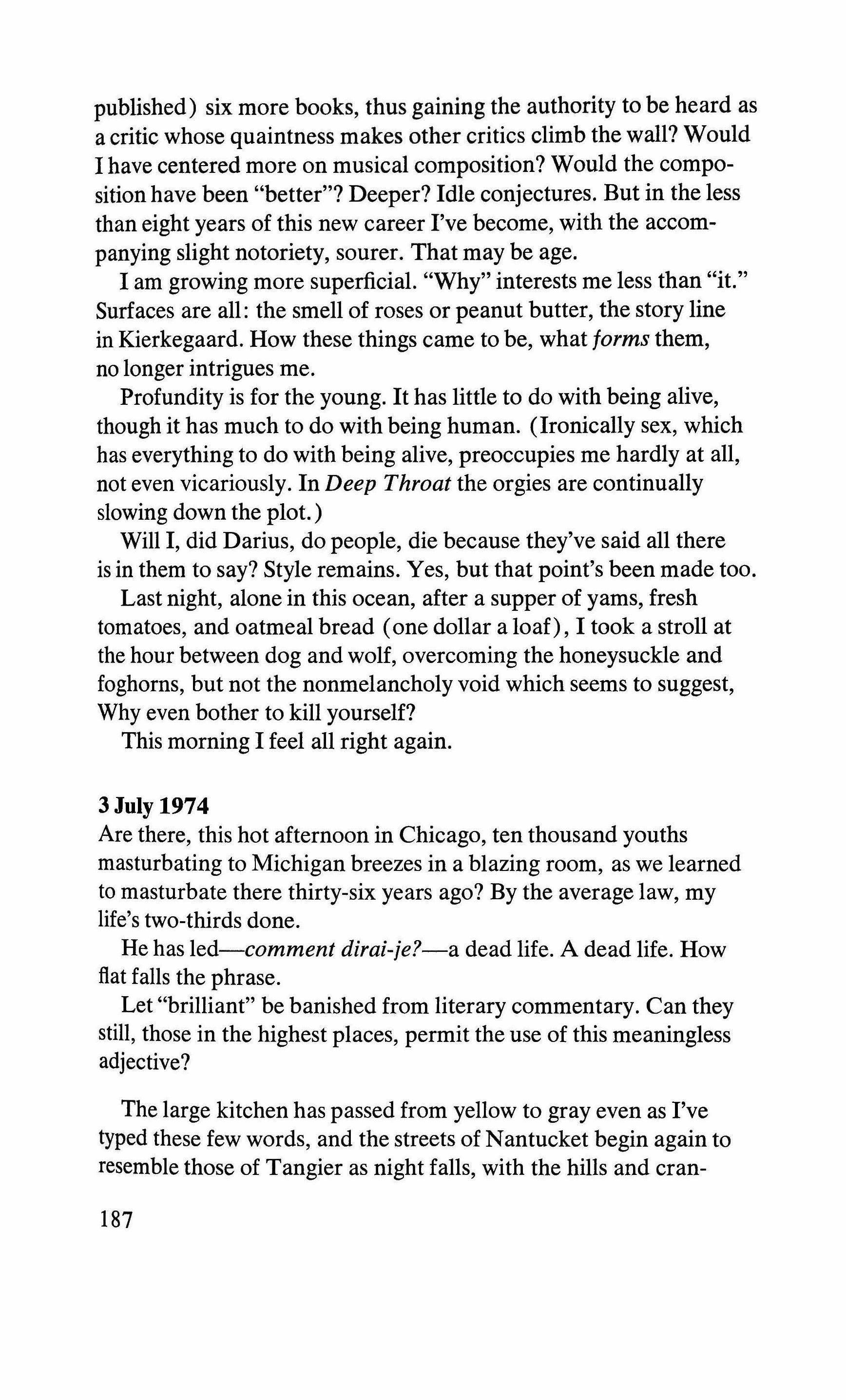
published) six more books, thus gaining the authority to be heard as a critic whose quaintness makes other critics climb the wall? Would I have centered more on musical composition? Would the composition have been "better"? Deeper? Idle conjectures. But in the less than eight years of this new career I've become, with the accompanying slight notoriety, sourer. That may be age.
I am growing more superficial. "Why" interests me less than "it." Surfaces are all: the smell of roses or peanut butter, the story line in Kierkegaard. How these things came to be, what forms them, no longer intrigues me.
Profundity is for the young. It has little to do with being alive, though it has much to do with being human. (Ironically sex, which has everything to do with being alive, preoccupies me hardly at all, not even vicariously. In Deep Throat the orgies are continually slowing down the plot.)
Will I, did Darius, do people, die because they've said all there is in them to say? Style remains. Yes, but that point's been made too.
Last night, alone in this ocean, after a supper of yams, fresh tomatoes, and oatmeal bread (one dollar a loaf), I took a stroll at the hour between dog and wolf, overcoming the honeysuckle and foghorns, but not the nonmelancholy void which seems to suggest, Why even bother to kill yourself?
This morning I feel all right again.
Are there, this hot afternoon in Chicago, ten thousand youths masturbating to Michigan breezes in a blazing room, as we learned to masturbate there thirty-six years ago? By the average law, my life's two-thirds done.
He has led-comment dirai-je?-a dead life. A dead life. How flat falls the phrase.
Let "brilliant" be banished from literary commentary. Can they still, those in the highest places, permit the use of this meaningless adjective?
The large kitchen has passed from yellow to gray even as I've typed these few words, and the streets of Nantucket begin again to resemble those of Tangier as night falls, with the hills and cran-
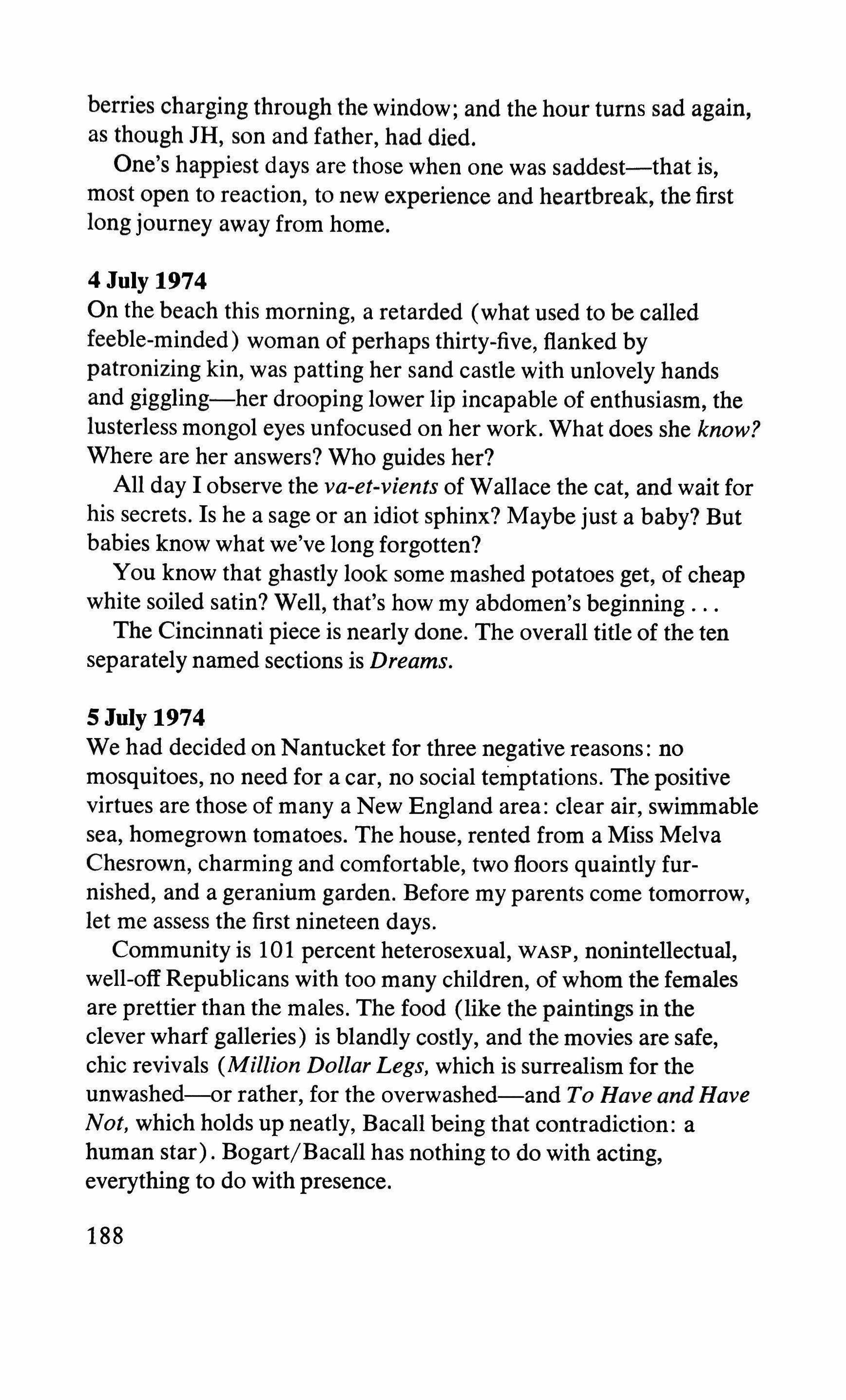
berries charging through the window; and the hour turns sad again, as though JH, son and father, had died.
One's happiest days are those when one was saddest-that is, most open to reaction, to new experience and heartbreak, the first longjourney away from home.
July 1974
On the beach this morning, a retarded (what used to be called feeble-minded) woman of perhaps thirty-five, flanked by patronizing kin, was patting her sand castle with unlovely hands and giggling-her drooping lower lip incapable of enthusiasm, the lusterless mongol eyes unfocused on her work. What does she know?
Where are her answers? Who guides her?
All day I observe the va-et-vients of Wallace the cat, and wait for his secrets. Is he a sage or an idiot sphinx? Maybe just a baby? But babies know what we've long forgotten?
You know that ghastly look some mashed potatoes get, of cheap white soiled satin? Well, that's how my abdomen's beginning
The Cincinnati piece is nearly done. The overall title of the ten separately named sections is Dreams.
July 1974
We had decided on Nantucket for three negative reasons: no mosquitoes, no need for a car, no social temptations. The positive virtues are those of many a New England area: clear air, swimmable sea, homegrown tomatoes. The house, rented from a Miss Melva Chesrown, charming and comfortable, two floors quaintly furnished, and a geranium garden. Before my parents come tomorrow, let me assess the first nineteen days.
Community is 101 percent heterosexual, WASP, nonintellectual, well-off Republicans with too many children, of whom the females are prettier than the males. The food (like the paintings in the clever wharf galleries) is blandly costly, and the movies are safe, chic revivals (Million Dollar Legs, which is surrealism for the unwashed-or rather, for the overwashed-and To Have and Have Not, which holds up neatly, Bacall being that contradiction: a human star) Bogart/Bacall has nothing to do with acting, everything to do with presence.
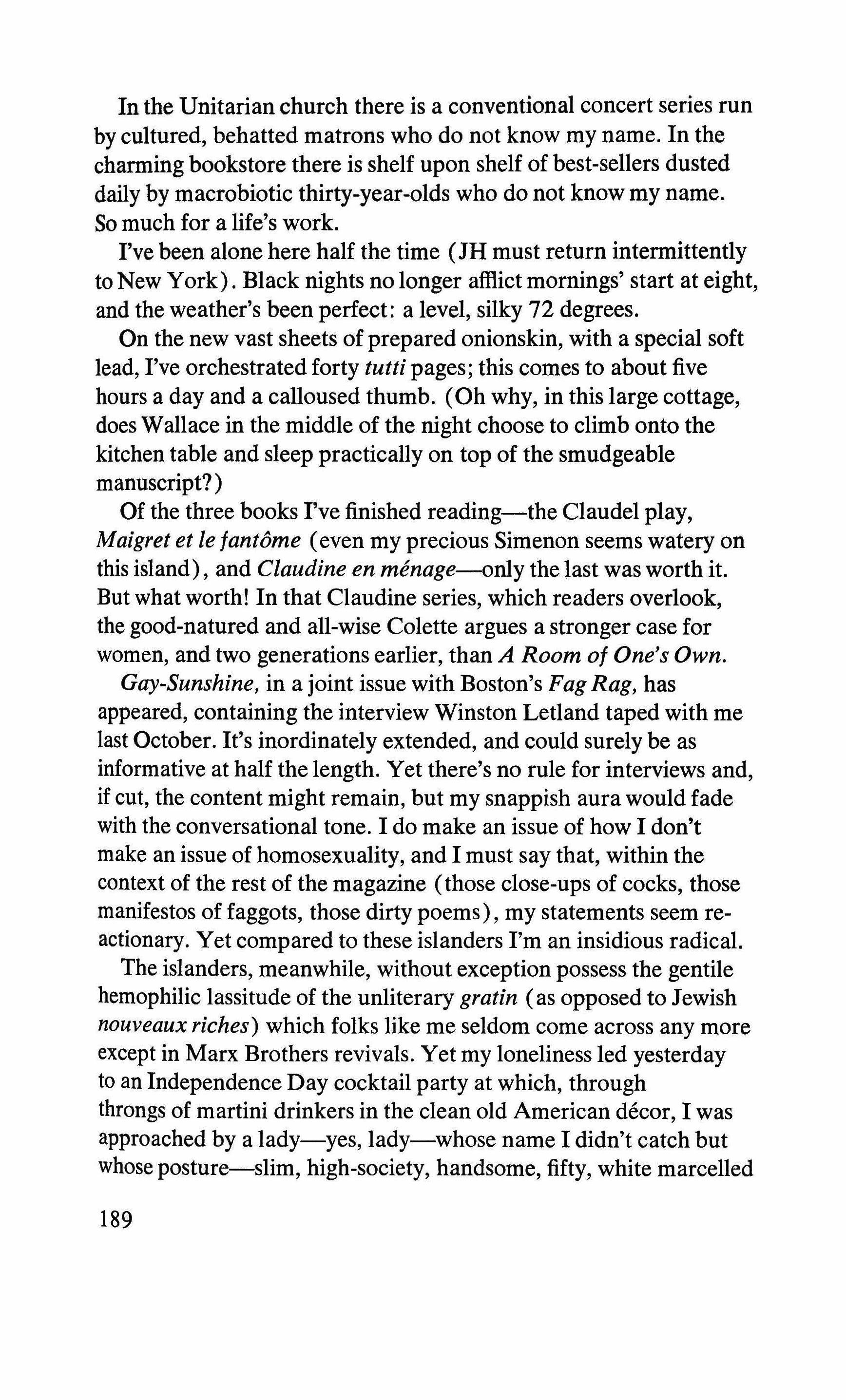
In the Unitarian church there is a conventional concert series run by cultured, behatted matrons who do not know my name. In the charming bookstore there is shelf upon shelf of best-sellers dusted daily by macrobiotic thirty-year-oIds who do not know my name. So much for a life's work.
I've been alone here half the time (JH must return intermittently to New York). Black nights no longer afflict mornings' start at eight, and the weather's been perfect: a level, silky 72 degrees.
On the new vast sheets of prepared onionskin, with a special soft lead, I've orchestrated forty tutti pages; this comes to about five hours a day and a calloused thumb. (Oh why, in this large cottage, does Wallace in the middle of the night choose to climb onto the kitchen table and sleep practically on top of the smudgeable manuscript?)
Of the three books I've finished reading-the Claudel play, Maigret et Ie fant6me (even my precious Simenon seems watery on this island), and Claudine en menage-only the last was worth it. But what worth! In that Claudine series, which readers overlook, the good-natured and all-wise Colette argues a stronger case for women, and two generations earlier, than A Room of One's Own.
Gay-Sunshine, in a joint issue with Boston's FagRag, has appeared, containing the interview Winston Letland taped with me last October. It's inordinately extended, and could surely be as informative at half the length. Yet there's no rule for interviews and, if cut, the content might remain, but my snappish aura would fade with the conversational tone. I do make an issue of how I don't make an issue of homosexuality, and I must say that, within the context of the rest of the magazine (those close-ups of cocks, those manifestos of faggots, those dirty poems), my statements seem reactionary. Yet compared to these islanders I'm an insidious radical.
The islanders, meanwhile, without exception possess the gentile hemophilic lassitude of the unliterary gratin (as opposed to Jewish nouveaux riches) which folks like me seldom come across any more except in Marx Brothers revivals. Yet my loneliness led yesterday to an Independence Day cocktail party at which, through throngs of martini drinkers in the clean old American decor, I was approached by a lady-yes, lady-whose name I didn't catch but Whose posture-slim, high-society, handsome, fifty, white marcelled
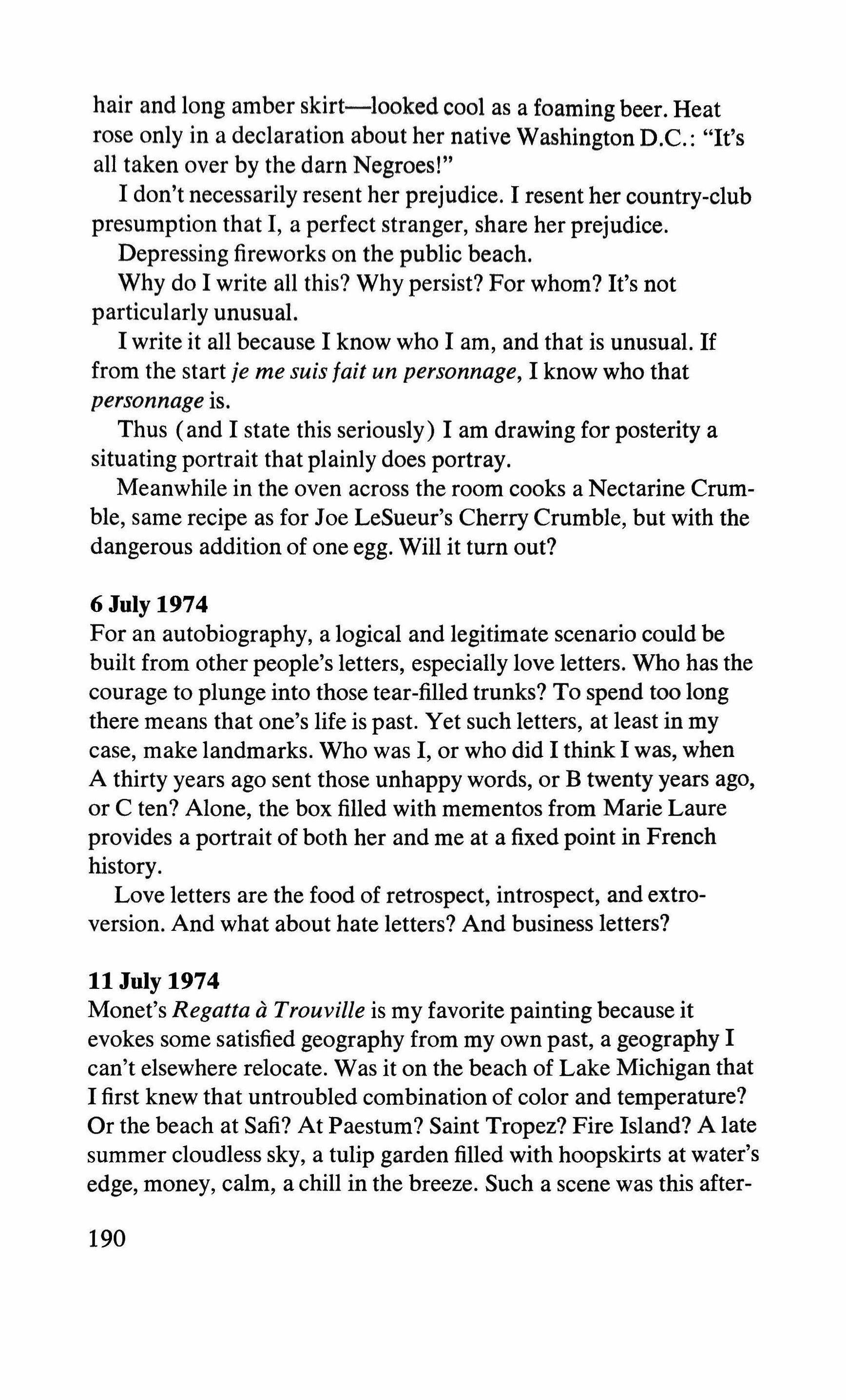
hair and long amber skirt-looked cool as a foaming beer. Heat rose only in a declaration about her native Washington D.C.: "It's all taken over by the darn Negroes!"
I don't necessarily resent her prejudice. I resent her country-club presumption that I, a perfect stranger, share her prejudice. Depressing fireworks on the public beach.
Why do I write all this? Why persist? For whom? It's not particularly unusual.
I write it all because I know who I am, and that is unusual. If from the start je me suis fait un personnage, I know who that personnage is.
Thus (and I state this seriously) I am drawing for posterity a situating portrait that plainly does portray.
Meanwhile in the oven across the room cooks a Nectarine Crumble, same recipe as for Joe LeSueur's Cherry Crumble, but with the dangerous addition of one egg. Will it turn out?
For an autobiography, a logical and legitimate scenario could be built from other people's letters, especially love letters. Who has the courage to plunge into those tear-filled trunks? To spend too long there means that one's life is past. Yet such letters, at least in my case, make landmarks. Who was I, or who did I think I was, when A thirty years ago sent those unhappy words, or B twenty years ago, or C ten? Alone, the box filled with mementos from Marie Laure provides a portrait of both her and me at a fixed point in French history.
Love letters are the food of retrospect, introspect, and extroversion. And what about hate letters? And business letters?
Monet's Regatta a Trouville is my favorite painting because it evokes some satisfied geography from my own past, a geography I can't elsewhere relocate. Was it on the beach of Lake Michigan that I first knew that untroubled combination of color and temperature? Or the beach at Safi? At Paestum? Saint Tropez? Fire Island? A late summer cloudless sky, a tulip garden filled with hoopskirts at water's edge, money, calm, a chill in the breeze. Such a scene was this after-
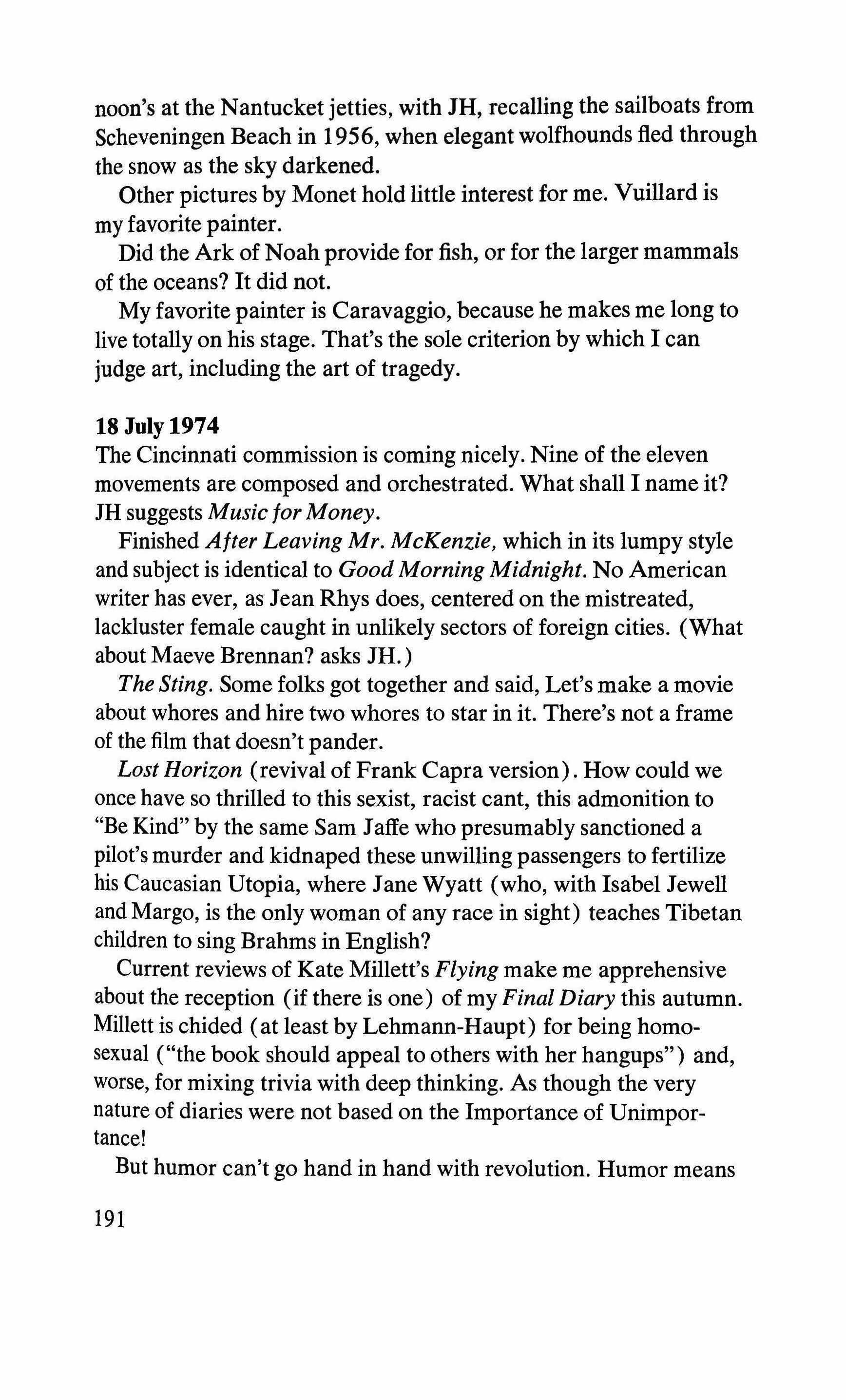
noon's at the Nantucket jetties, with JH, recalling the sailboats from Scheveningen Beach in 1956, when elegant wolfhounds fled through the snow as the sky darkened.
Other picturesby Monet hold little interest for me. Vuillard is my favorite painter.
Did the Ark of Noah provide for fish, or for the larger mammals of the oceans? It did not.
My favorite painter is Caravaggio, because he makes me long to live totally on his stage. That's the sole criterion by which I can judge art, including the art of tragedy.
The Cincinnati commission is coming nicely. Nine of the eleven movements are composed and orchestrated. What shall I name it? JH suggests Music forMoney.
Finished After Leaving Mr. McKenzie, which in its lumpy style and subject is identical to Good Morning Midnight. No American writer has ever, as Jean Rhys does, centered on the mistreated, lackluster female caught in unlikely sectors of foreign cities. (What about Maeve Brennan? asks JH.)
The Sting. Some folks got together and said, Let's make a movie about whores and hire two whores to star in it. There's not a frame of the film that doesn't pander.
Lost Horizon (revival of Frank Capra version). How could we once have so thrilled to this sexist, racist cant, this admonition to "Be Kind" by the same Sam Jaffe who presumably sanctioned a pilot's murder and kidnaped these unwilling passengers to fertilize his Caucasian Utopia, where Jane Wyatt (who, with Isabel Jewell and Margo, is the only woman of any race in sight) teaches Tibetan children to sing Brahms in English?
Current reviews of Kate Millett's Flying make me apprehensive about the reception (if there is one) of my Final Diary this autumn. Millett is chided (at least by Lehmann-Haupt) for being homosexual ("the book should appeal to others with her hangups") and, worse, for mixing trivia with deep thinking. As though the very nature of diaries were not based on the Importance of Unimportance!
But humor can't go hand in hand with revolution. Humor means
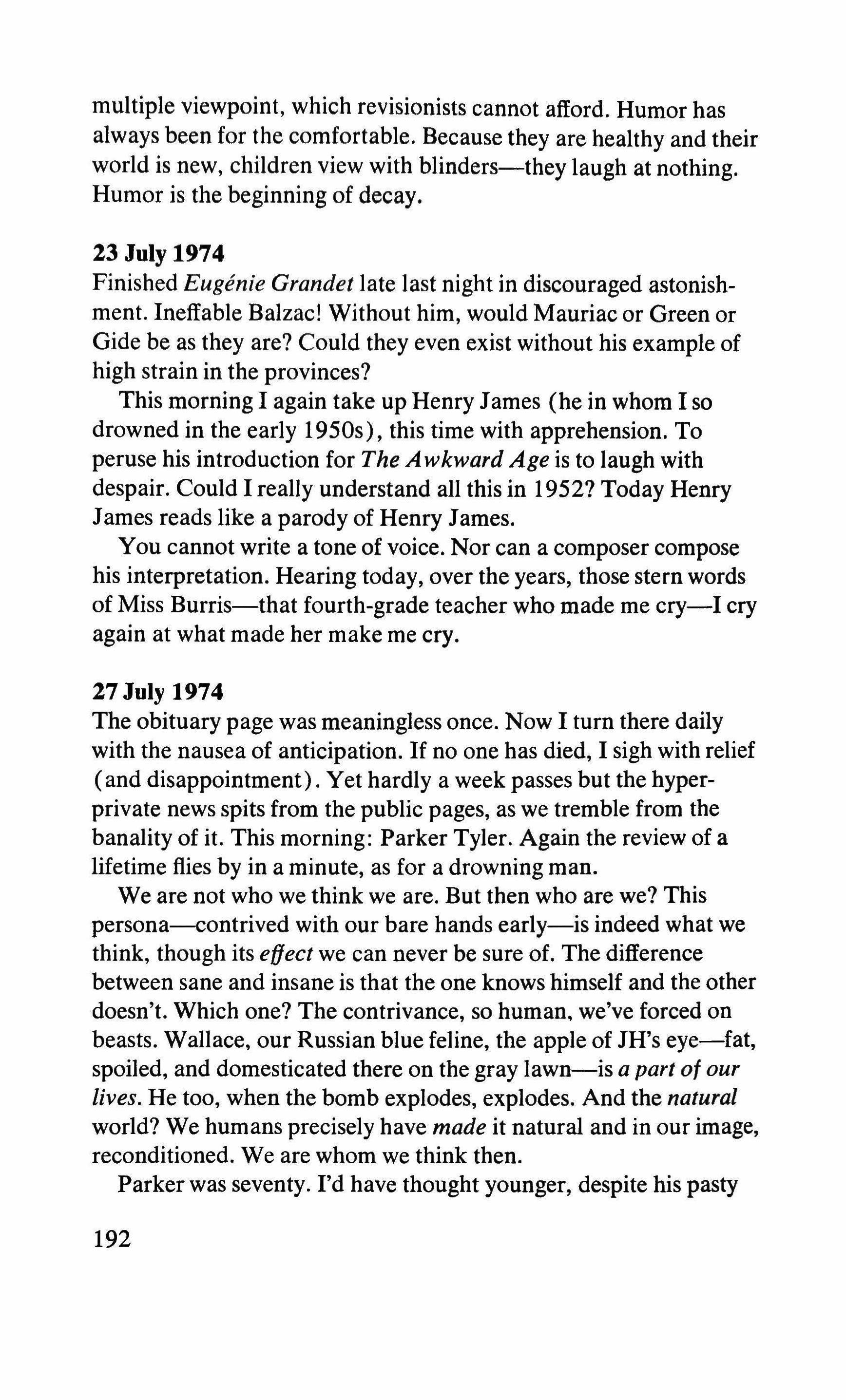
multiple viewpoint, which revisionists cannot afford. Humor has always been for the comfortable. Because they are healthy and their world is new, children view with blinders-they laugh at nothing. Humor is the beginning of decay.
23 July 1974
Finished Eugenie Grandet late last night in discouraged astonishment. Ineffable Balzac! Without him, would Mauriac or Green or Gide be as they are? Could they even exist without his example of high strain in the provinces?
This morning I again take up Henry James (he in whom I so drowned in the early 1950s), this time with apprehension. To peruse his introduction for The Awkward Age is to laugh with despair. Could I really understand all this in 1952? Today Henry James reads like a parody of Henry James.
You cannot write a tone of voice. Nor can a composer compose his interpretation. Hearing today, over the years, those stern words of Miss Burris-that fourth-grade teacher who made me cry-I cry again at what made her make me cry.
27 July 1974
The obituary page was meaningless once. Now I turn there daily with the nausea of anticipation. If no one has died, I sigh with relief (and disappointment) Yet hardly a week passes but the hyperprivate news spits from the public pages, as we tremble from the banality of it. This morning: Parker Tyler. Again the review of a lifetime flies by in a minute, as for a drowning man.
We are not who we think we are. But then who are we? This persona-contrived with our bare hands early-is indeed what we think, though its effect we can never be sure of. The difference between sane and insane is that the one knows himself and the other doesn't. Which one? The contrivance, so human, we've forced on beasts. Wallace, our Russian blue feline, the apple of JH's eye-fat, spoiled, and domesticated there on the gray lawn-is a part of our lives. He too, when the bomb explodes, explodes. And the natural world? We humans precisely have made it natural and in our image, reconditioned. We are whom we think then.
Parker was seventy. I'd have thought younger, despite his pasty

look during our croisements of the past year, mostly in the elevator of my parent's building where he too lives-lived. The excruciating familiarity of that elevator where Parker will nevermore set foot. The lavish art nouveau of the Nantucket Sweet Shop on Main Street. I could immortalize it on this page, as in L'Eclisse Antonioni immortalized a bus stop where his stars met. The film ends at the bus stop, abandoned, not even haunted, ours now. Should you visit the Sweet Shop, where nightly I now sit, you would recognize that bric-a-brac from my accurate description, but you'd ask, Where's Ned? Nothing remains but place. Finally it goes too. Battlefields of hell bloom bright with posies.
Over thirty years ago I left Chicago, and with it the 57th Street meeting of the Society of Friends, into which I'd been bred by converted parents. Because the general past is always golden, because this particular group seemed, to my family, lively and liberal (flourishing as it did on the twigs of Hutchins' imaginative nest) and because every gust but this one from the Windy City has ebbed, what's more natural than to retain membership in absentia? This I do with an annual contribution, receiving in return the Newsletter, virtually my sole lien. Now, although the Newsletter does not purport to be a literary monthly, I see no reason why, when for once I send a message (an articulate complaint against one Reverend Greeley, whose macho pap in an earlier edition had outraged me), this message should be revised by the editors into the garbled smarmy cant typical of this periodical's tone. Etcetera. That paragraph opens an unfinished missile to the Newsletter. But then-sigh-O why? The recipients do not recall the saucy little boy in their halls, do not know "who" he has become, do not see Quakerhood my way, and why bother? Three weeks ago, when Mother and Father were here on Nantucket, we attended meeting (I for the first time in a decade) on Fair Street, and each of us was "moved" to speak regarding the self-congratulatory mood about us. In my case, this was self-congratulation on how unself-congratulatory I am, but I was proud of them, How, they asked, can we sit here and benefit from this peace, which you say we owe to George Fox, when in fact there is no peace?
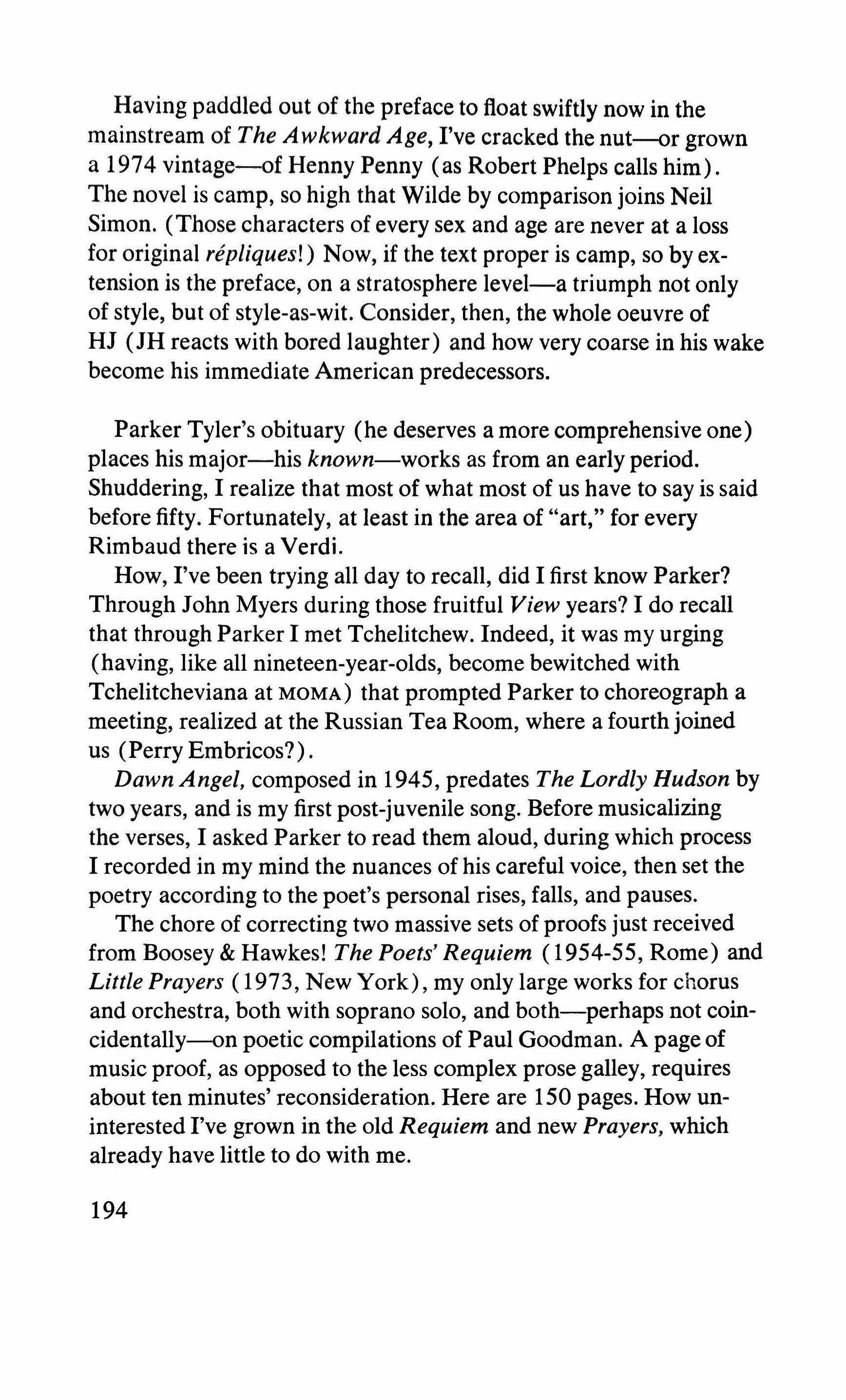
Having paddled out of the preface to float swiftly now in the mainstream of The Awkward Age, I've cracked the nut-or grown a 1974 vintage-of Henny Penny (as Robert Phelps calls him) The novel is camp, so high that Wilde by comparison joins Neil Simon. (Those characters of every sex and age are never at a loss for original repliquesi) Now, if the text proper is camp, so by extension is the preface, on a stratosphere level-a triumph not only of style, but of style-as-wit. Consider, then, the whole oeuvre of HJ (JH reacts with bored laughter) and how very coarse in his wake become his immediate American predecessors.
Parker Tyler's obituary (he deserves a more comprehensive one) places his major-his known-works as from an early period. Shuddering, I realize that most of what most of us have to say is said before fifty. Fortunately, at least in the area of "art," for every Rimbaud there is a Verdi.
How, I've been trying all day to recall, did I first know Parker? Through John Myers during those fruitful View years? I do recall that through Parker I met Tchelitchew. Indeed, it was my urging (having, like all nineteen-year-olds, become bewitched with Tchelitcheviana at MOMA) that prompted Parker to choreograph a meeting, realized at the Russian Tea Room, where a fourth joined us (Perry Embricos?).
Dawn Angel, composed in 1945, predates The Lordly Hudson by two years, and is my first post-juvenile song. Before musicalizing the verses, I asked Parker to read them aloud, during which process I recorded in my mind the nuances of his careful voice, then set the poetry according to the poet's personal rises, falls, and pauses. The chore of correcting two massive sets of proofs just received from Boosey & Hawkes! The Poets' Requiem (1954-55, Rome) and Little Prayers (1973, New York), my only large works for chorus and orchestra, both with soprano solo, and both-perhaps not coincidentally-on poetic compilations of Paul Goodman. A page of music proof, as opposed to the less complex prose galley, requires about ten minutes' reconsideration. Here are 150 pages. How uninterested I've grown in the old Requiem and new Prayers, which already have little to do with me.
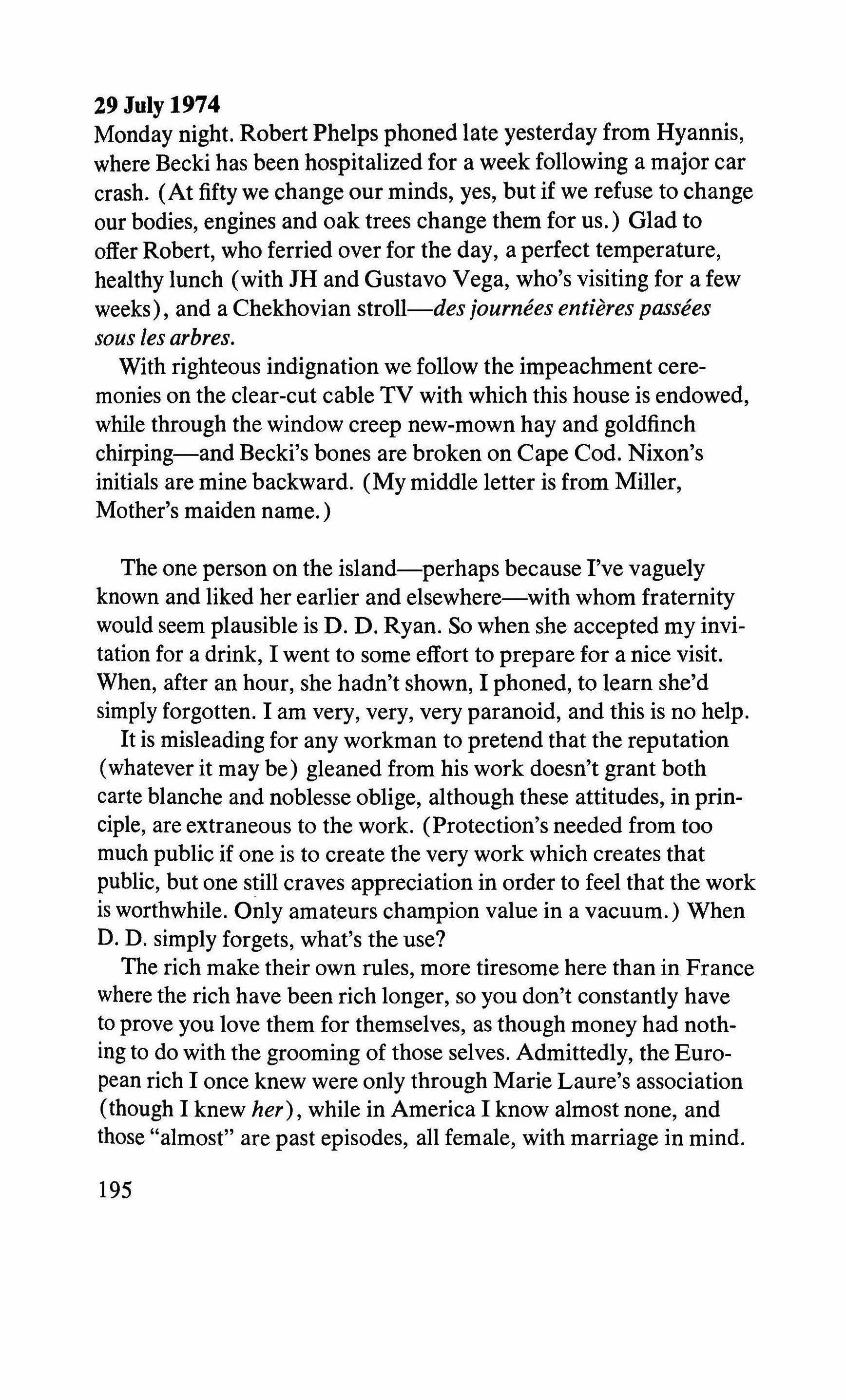
29 July 1974
Monday night. Robert Phelps phoned late yesterday from Hyannis, where Becki has been hospitalized for a week following a major car crash. (At fifty we change our minds, yes, but if we refuse to change our bodies, engines and oak trees change them for us.) Glad to offer Robert, who ferried over for the day, a perfect temperature, healthy lunch (with JH and Gustavo Vega, who's visiting for a few weeks), and a Chekhovian stroll-des iournees entieres passees sous les arbres.
With righteous indignation we follow the impeachment ceremonies on the clear-cut cable TV with which this house is endowed, while through the window creep new-mown hay and goldfinch chirping-and Becki's bones are broken on Cape Cod. Nixon's initials are mine backward. (My middle letter is from Miller, Mother's maiden name.)
The one person on the island-perhaps because I've vaguely known and liked her earlier and elsewhere-with whom fraternity would seem plausible is D. D. Ryan. So when she accepted my invitation for a drink, I went to some effort to prepare for a nice visit. When, after an hour, she hadn't shown, I phoned, to learn she'd simply forgotten. I am very, very, very paranoid, and this is no help. It is misleading for any workman to pretend that the reputation (whatever it may be) gleaned from his work doesn't grant both carte blanche and noblesse oblige, although these attitudes, in principle, are extraneous to the work. (Protection's needed from too much public if one is to create the very work which creates that public, but one still craves appreciation in order to feel that the work is worthwhile. Only amateurs champion value in a vacuum.) When D. D. simply forgets, what's the use?
The rich make their own rules, more tiresome here than in France where the rich have been rich longer, so you don't constantly have to prove you love them for themselves, as though money had nothing to do with the grooming of those selves. Admittedly, the European rich I once knew were only through Marie Laure's association (though I knew her), while in America I know almost none, and those "almost" are past episodes, all female, with marriage in mind.
195
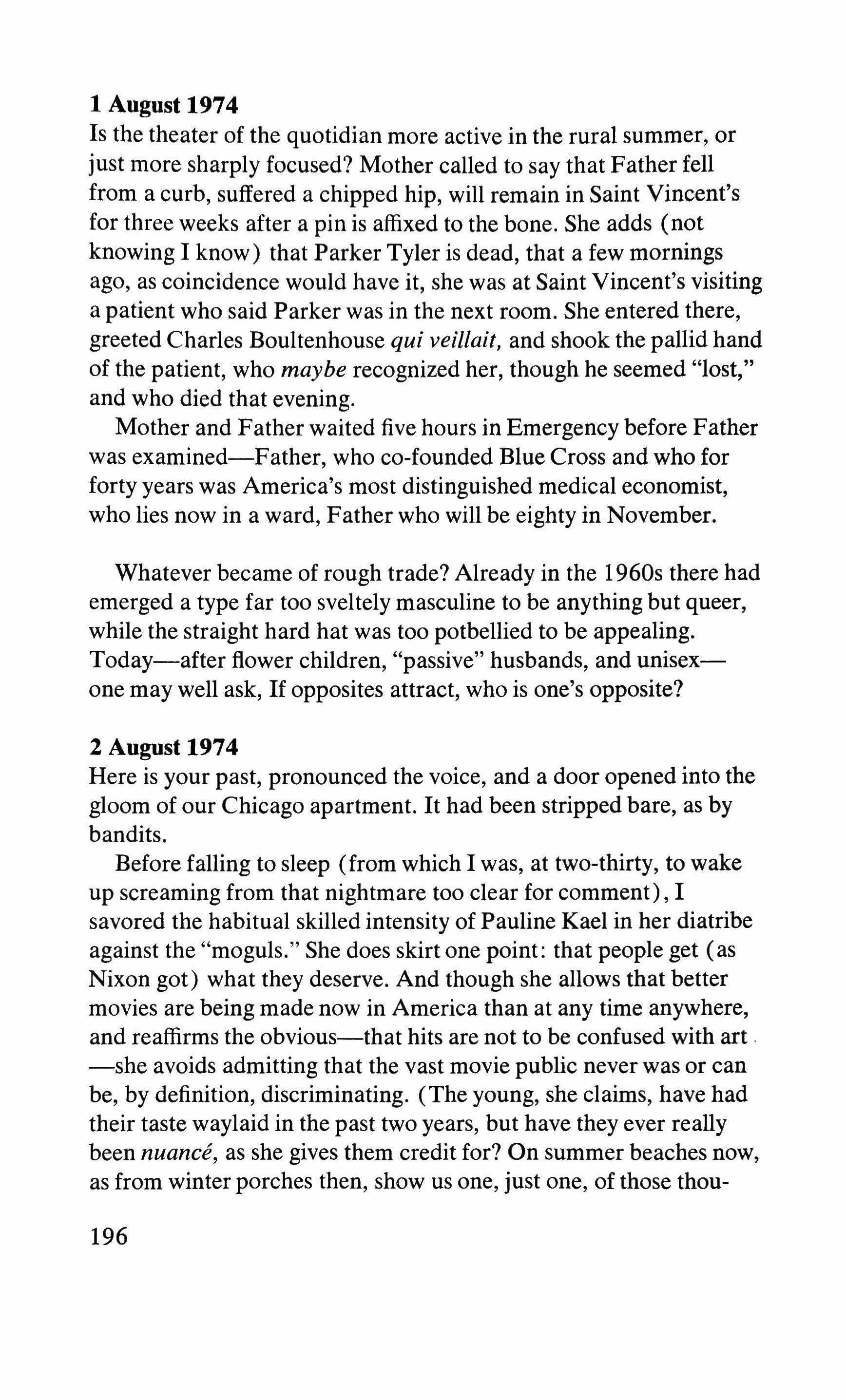
Is the theater of the quotidian more active in the rural summer, or just more sharply focused? Mother called to say that Father fell from a curb, suffered a chipped hip, will remain in Saint Vincent's for three weeks after a pin is affixed to the bone. She adds (not knowing I know) that Parker Tyler is dead, that a few mornings ago, as coincidence would have it, she was at Saint Vincent's visiting a patient who said Parker was in the next room. She entered there, greeted Charles Boultenhouse qui veillait, and shook the pallid hand of the patient, who maybe recognized her, though he seemed "lost," and who died that evening.
Mother and Father waited five hours in Emergency before Father was examined-Father, who co-founded Blue Cross and who for forty years was America's most distinguished medical economist, who lies now in a ward, Father who will be eighty in November.
Whatever became of rough trade? Already in the 1960s there had emerged a type far too sveltely masculine to be anything but queer, while the straight hard hat was too potbellied to be appealing. Today-after flower children, "passive" husbands, and unisexone may well ask, If opposites attract, who is one's opposite?
Here is your past, pronounced the voice, and a door opened into the gloom of our Chicago apartment. It had been stripped bare, as by bandits.
Before falling to sleep (from which I was, at two-thirty, to wake up screaming from that nightmare too clear for comment) I savored the habitual skilled intensity of Pauline Kael in her diatribe against the "moguls." She does skirt one point: that people get (as Nixon got) what they deserve. And though she allows that better movies are being made now in America than at any time anywhere, and reaffirms the obvious-that hits are not to be confused with art -she avoids admitting that the vast movie public never was or can be, by definition, discriminating. (The young, she claims, have had their taste waylaid in the past two years, but have they ever really been nuance, as she gives them credit for? On summer beaches now, as from winter porches then, show us one, just one, of those thou-
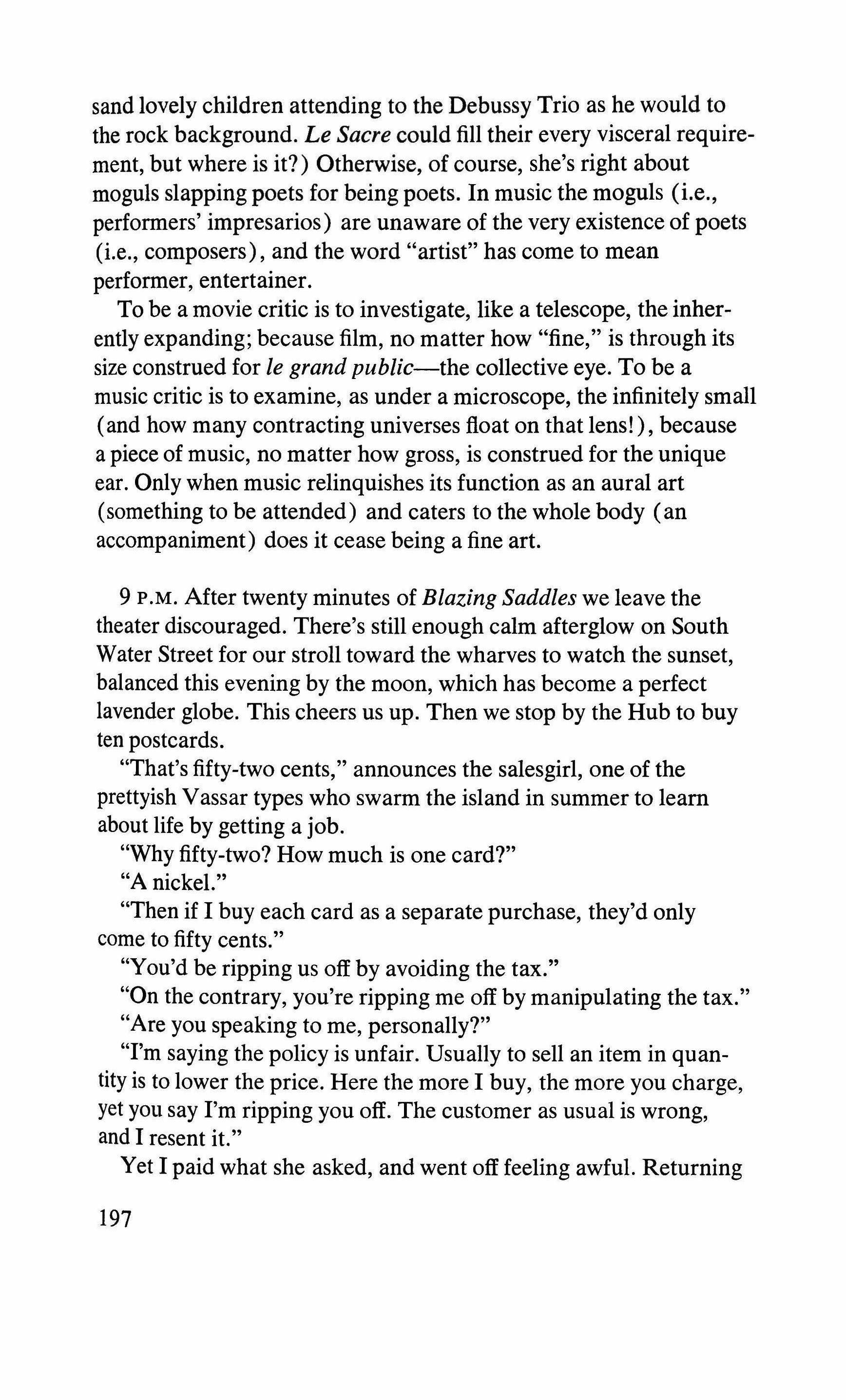
sand lovely children attending to the Debussy Trio as he would to the rock background. Le Sacre could fill their every visceral requirement, but where is it?) Otherwise, of course, she's right about moguls slapping poets for being poets. In music the moguls (i.e., performers' impresarios) are unaware of the very existence of poets (i.e., composers), and the word "artist" has come to mean performer, entertainer.
To be a movie critic is to investigate, like a telescope, the inherently expanding; because film, no matter how "fine," is through its size construed for le grandpublic-the collective eye. To be a music critic is to examine, as under a microscope, the infinitely small (and how many contracting universes float on that lens! ), because a piece of music, no matter how gross, is construed for the unique ear. Only when music relinquishes its function as an aural art (something to be attended) and caters to the whole body (an accompaniment) does it cease being a fine art.
9 P.M. After twenty minutes of Blazing Saddles we leave the theater discouraged. There's still enough calm afterglow on South Water Street for our stroll toward the wharves to watch the sunset, balanced this evening by the moon, which has become a perfect lavender globe. This cheers us up. Then we stop by the Hub to buy ten postcards.
"That's fifty-two cents," announces the salesgirl, one of the prettyish Vassar types who swarm the island in summer to learn about life by getting a job.
"Why fifty-two? How much is one card?"
"A nickel."
"Then if I buy each card as a separate purchase, they'd only come to fifty cents."
"You'd be ripping us off by avoiding the tax."
"On the contrary, you're ripping me off by manipulating the tax."
"Are you speaking to me, personally?"
"I'm saying the policy is unfair. Usually to sell an item in quantity is to lower the price. Here the more I buy, the more you charge, yet you say I'm ripping you off. The customer as usual is wrong, and I resent it."
Yet I paid what she asked, and went off feeling awful. Returning
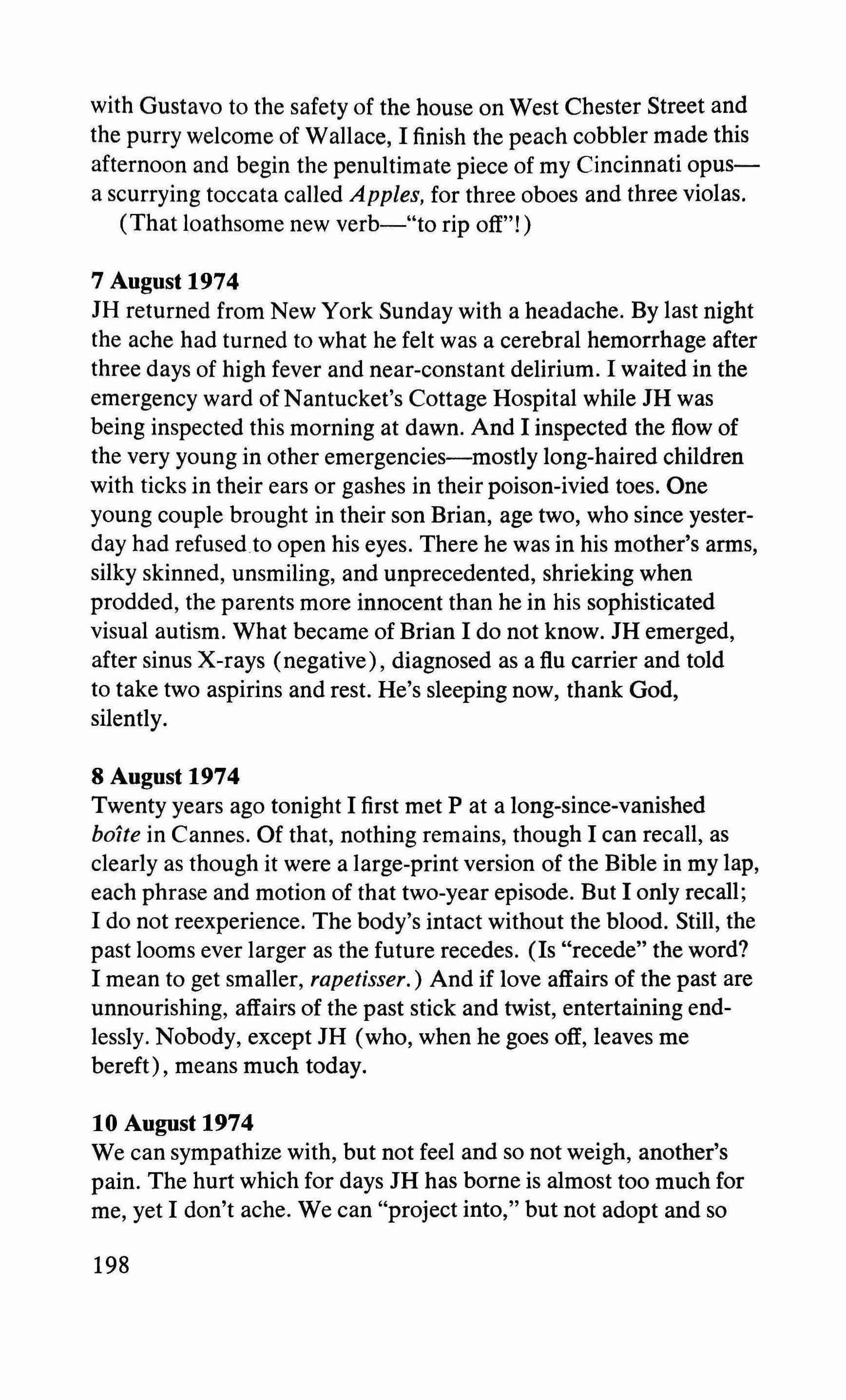
with Gustavo to the safety of the house on West Chester Street and the purry welcome of Wallace, I finish the peach cobbler made this afternoon and begin the penultimate piece of my Cincinnati opusa scurrying toccata called Apples, for three oboes and three violas. (That loathsome new verb-"to rip off"!)
7 August 1974
JH returned from New York Sunday with a headache. By last night the ache had turned to what he felt was a cerebral hemorrhage after three days of high fever and near-constant delirium. I waited in the emergency ward of Nantucket's Cottage Hospital while JH was being inspected this morning at dawn. And I inspected the flow of the very young in other emergencies-mostly long-haired children with ticks in their ears or gashes in their poison-ivied toes. One young couple brought in their son Brian, age two, who since yesterday had refused to open his eyes. There he was in his mother's arms, silky skinned, unsmiling, and unprecedented, shrieking when prodded, the parents more innocent than he in his sophisticated visual autism. What became of Brian I do not know. JH emerged, after sinus X-rays (negative), diagnosed as a flu carrier and told to take two aspirins and rest. He's sleeping now, thank God, silently.
8 August 1974
Twenty years ago tonight I first met P at a long-since-vanished boite in Cannes. Of that, nothing remains, though I can recall, as clearly as though it were a large-print version of the Bible in my lap, each phrase and motion of that two-year episode. But I only recall; I do not reexperience. The body's intact without the blood. Still, the past looms ever larger as the future recedes. (Is "recede" the word? I mean to get smaller, rapetisser.) And if love affairs of the past are unnourishing, affairs of the past stick and twist, entertaining endlessly. Nobody, except JH (who, when he goes off, leaves me bereft), means much today.
10 August 1974
We can sympathize with, but not feel and so not weigh, another's pain. The hurt which for days JH has borne is almost too much for me, yet I don't ache. We can "project into," but not adopt and so
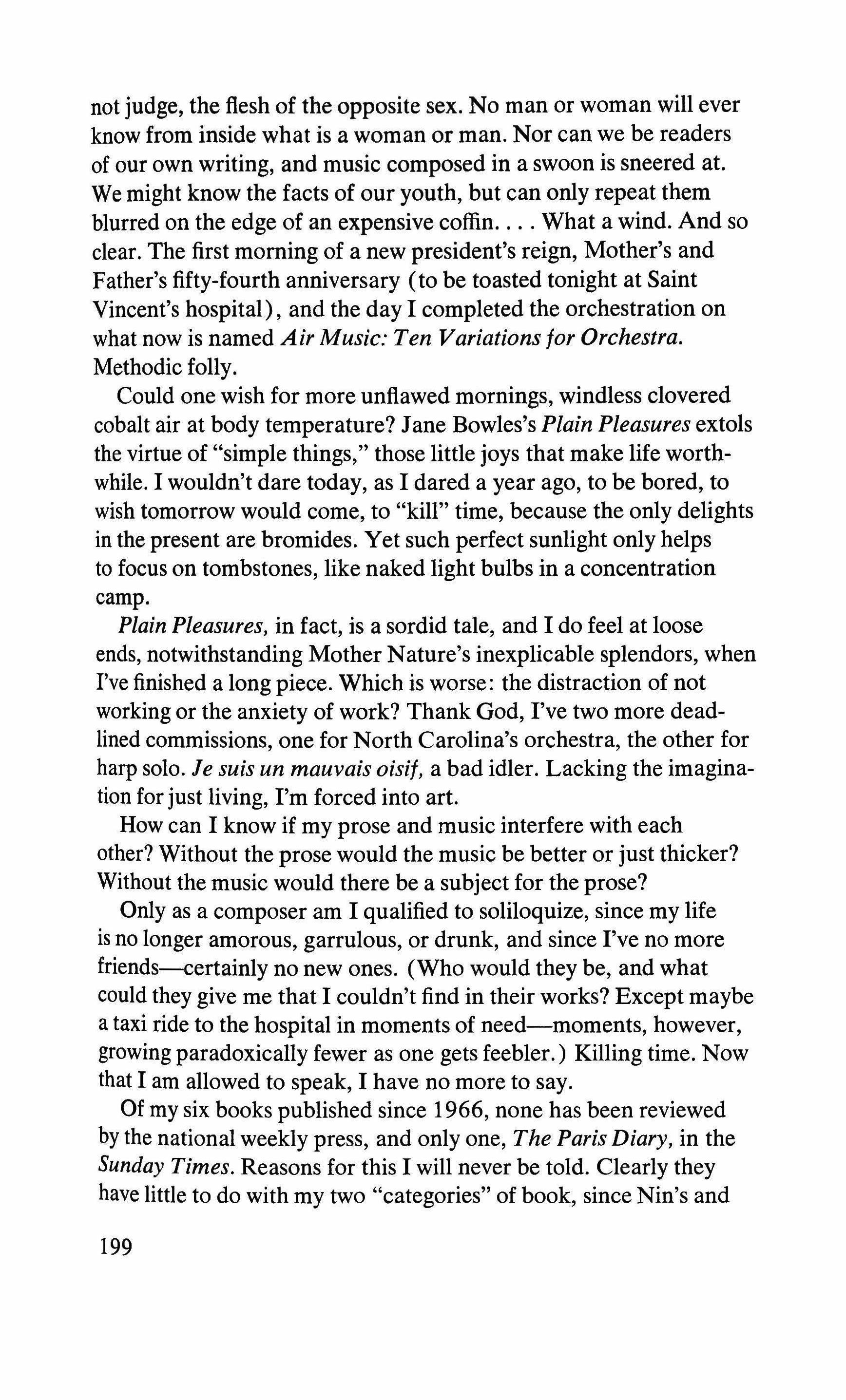
not judge, the flesh of the opposite sex. No man or woman will ever know from inside what is a woman or man. Nor can we be readers of our own writing, and music composed in a swoon is sneered at. We might know the facts of our youth, but can only repeat them blurred on the edge of an expensive coffin What a wind. And so clear. The first morning of a new president's reign, Mother's and Father's fifty-fourth anniversary (to be toasted tonight at Saint Vincent's hospital), and the day I completed the orchestration on what now is named Air Music: Ten Variations for Orchestra. Methodic folly.
Could one wish for more unflawed mornings, windless clovered cobalt air at body temperature? Jane Bowles's Plain Pleasures extols the virtue of "simple things," those little joys that make life worthwhile. I wouldn't dare today, as I dared a year ago, to be bored, to wish tomorrow would come, to "kill" time, because the only delights in the present are bromides. Yet such perfect sunlight only helps to focus on tombstones, like naked light bulbs in a concentration camp.
Plain Pleasures, in fact, is a sordid tale, and I do feel at loose ends, notwithstanding Mother Nature's inexplicable splendors, when I've finished a long piece. Which is worse: the distraction of not working or the anxiety of work? Thank God, I've two more deadlined commissions, one for North Carolina's orchestra, the other for harp solo. Je suis un mauvais oisii, a bad idler. Lacking the imagination for just living, I'm forced into art.
How can I know if my prose and music interfere with each other? Without the prose would the music be better or just thicker? Without the music would there be a subject for the prose?
Only as a composer am I qualified to soliloquize, since my life is no longer amorous, garrulous, or drunk, and since I've no more friends-certainly no new ones. (Who would they be, and what could they give me that I couldn't find in their works? Except maybe a taxi ride to the hospital in moments of need-moments, however, growing paradoxically fewer as one gets feebler.) Killing time. Now that I am allowed to speak, I have no more to say.
Of my six books published since 1966, none has been reviewed by the national weekly press, and only one, The Paris Diary, in the Sunday Times. Reasons for this I will never be told. Clearly they have little to do with my two "categories" of book, since Nin's and
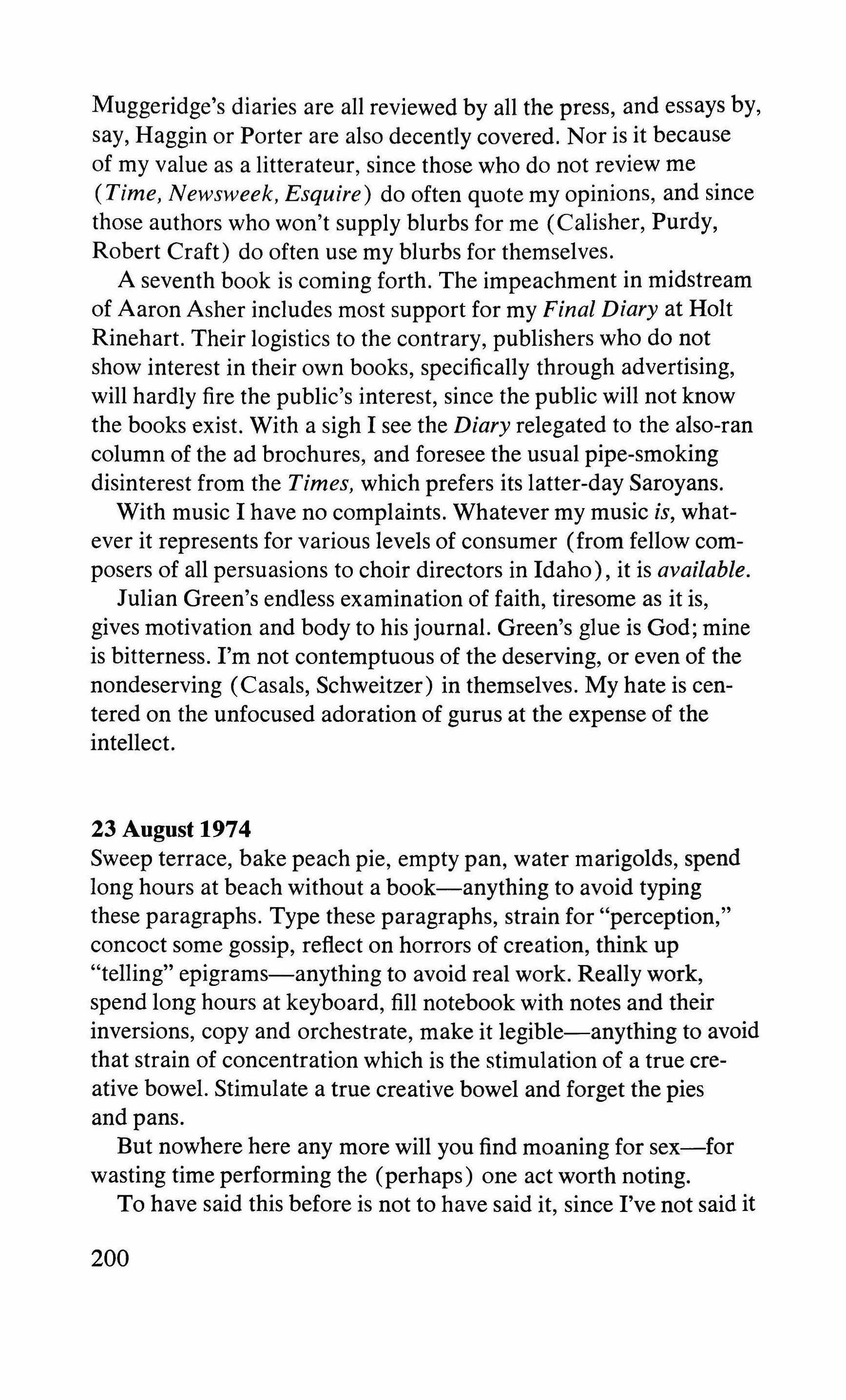
Muggeridge's diaries are all reviewed by all the press, and essays by, say, Haggin or Porter are also decently covered. Nor is it because of my value as a litterateur, since those who do not review me (Time, Newsweek, Esquire) do often quote my opinions, and since those authors who won't supply blurbs for me (Calisher, Purdy, Robert Craft) do often use my blurbs for themselves.
A seventh book is coming forth. The impeachment in midstream of Aaron Asher includes most support for my Final Diary at Holt Rinehart. Their logistics to the contrary, publishers who do not show interest in their own books, specifically through advertising, will hardly fire the public's interest, since the public will not know the books exist. With a sigh I see the Diary relegated to the also-ran column of the ad brochures, and foresee the usual pipe-smoking disinterest from the Times, which prefers its latter-day Saroyans.
With music I have no complaints. Whatever my music is, whatever it represents for various levels of consumer (from fellow composers of all persuasions to choir directors in Idaho), it is available.
Julian Green's endless examination of faith, tiresome as it is, gives motivation and body to his journal. Green's glue is God; mine is bitterness. I'm not contemptuous of the deserving, or even of the nondeserving (Casals, Schweitzer) in themselves. My hate is centered on the unfocused adoration of gurus at the expense of the intellect.
Sweep terrace, bake peach pie, empty pan, water marigolds, spend long hours at beach without a book-anything to avoid typing these paragraphs. Type these paragraphs, strain for "perception," concoct some gossip, reflect on horrors of creation, think up "telling" epigrams-anything to avoid real work. Really work, spend long hours at keyboard, fill notebook with notes and their inversions, copy and orchestrate, make it legible-anything to avoid that strain of concentration which is the stimulation of a true creative bowel. Stimulate a true creative bowel and forget the pies and pans.
But nowhere here any more will you find moaning for sex-for wasting time performing the (perhaps) one act worth noting.
To have said this before is not to have said it, since I've not said it
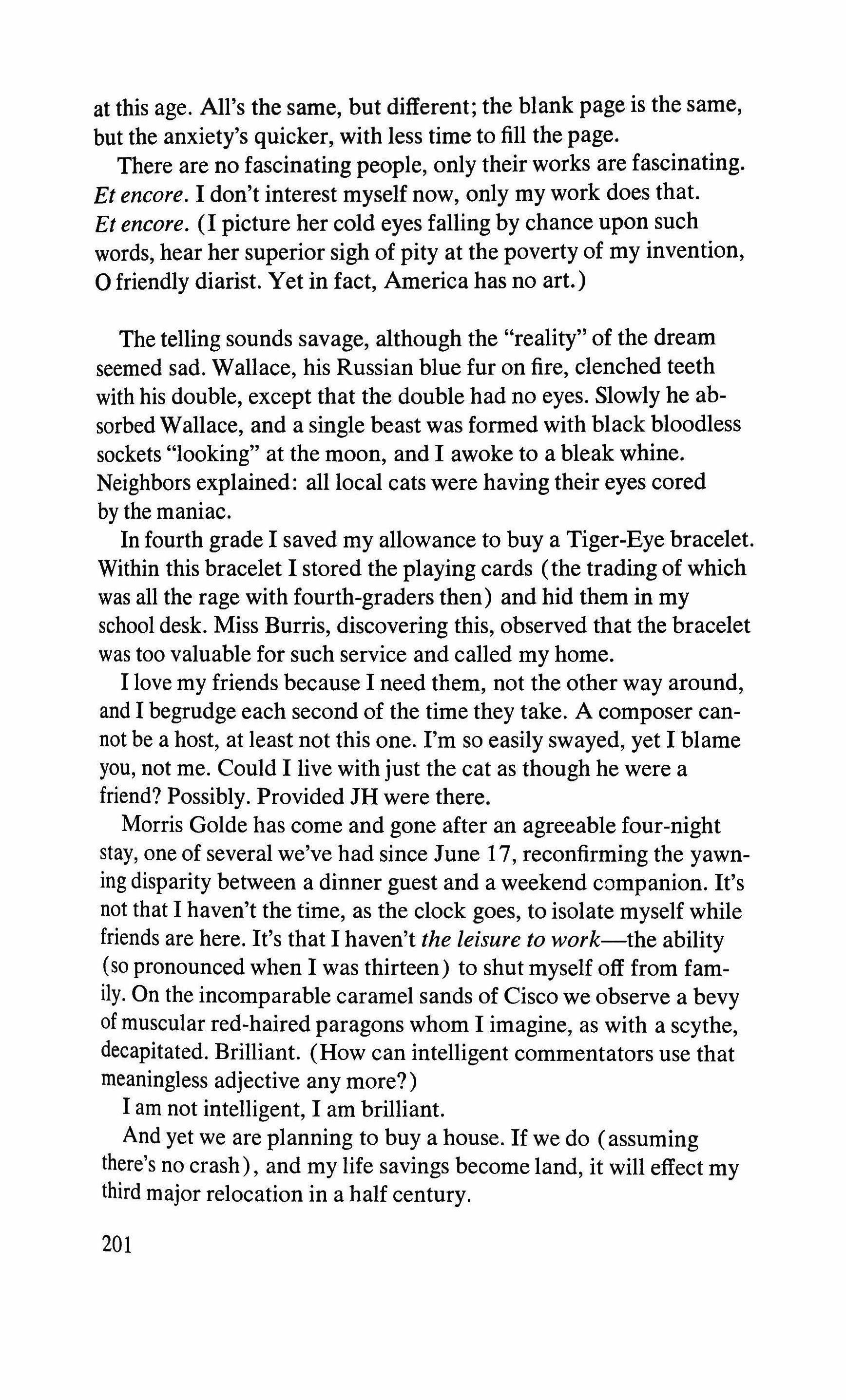
at this age. All's the same, but different; the blank page is the same, but the anxiety's quicker, with less time to fill the page.
There are no fascinating people, only their works are fascinating. Et encore. I don't interest myself now, only my work does that. Et encore. (I picture her cold eyes falling by chance upon such words, hear her superior sigh of pity at the poverty of my invention, o friendly diarist. Yet in fact, America has no art.)
The telling sounds savage, although the "reality" of the dream seemed sad. Wallace, his Russian blue fur on fire, clenched teeth with his double, except that the double had no eyes. Slowly he absorbed Wallace, and a single beast was formed with black bloodless sockets "looking" at the moon, and I awoke to a bleak whine. Neighbors explained: all local cats were having their eyes cored by the maniac.
In fourth grade I saved my allowance to buy a Tiger-Eye bracelet. Within this bracelet I stored the playing cards (the trading of which was all the rage with fourth-graders then) and hid them in my school desk. Miss Burris, discovering this, observed that the bracelet was too valuable for such service and called my home.
I love my friends because I need them, not the other way around, and I begrudge each second of the time they take. A composer cannot be a host, at least not this one. I'm so easily swayed, yet I blame you, not me. Could I live with just the cat as though he were a friend? Possibly. Provided JH were there.
Morris Golde has come and gone after an agreeable four-night stay, one of several we've had since June 17, reconfirming the yawning disparity between a dinner guest and a weekend companion. It's not that I haven't the time, as the clock goes, to isolate myself while friends are here. It's that I haven't the leisure to work-the ability (so pronounced when I was thirteen) to shut myself off from family. On the incomparable caramel sands of Cisco we observe a bevy of muscular red-haired paragons whom I imagine, as with a scythe, decapitated. Brilliant. (How can intelligent commentators use that meaningless adjective any more?)
I am not intelligent, I am brilliant. And yet we are planning to buy a house. If we do (assuming there's no crash), and my life savings become land, it will effect my third major relocation in a half century.
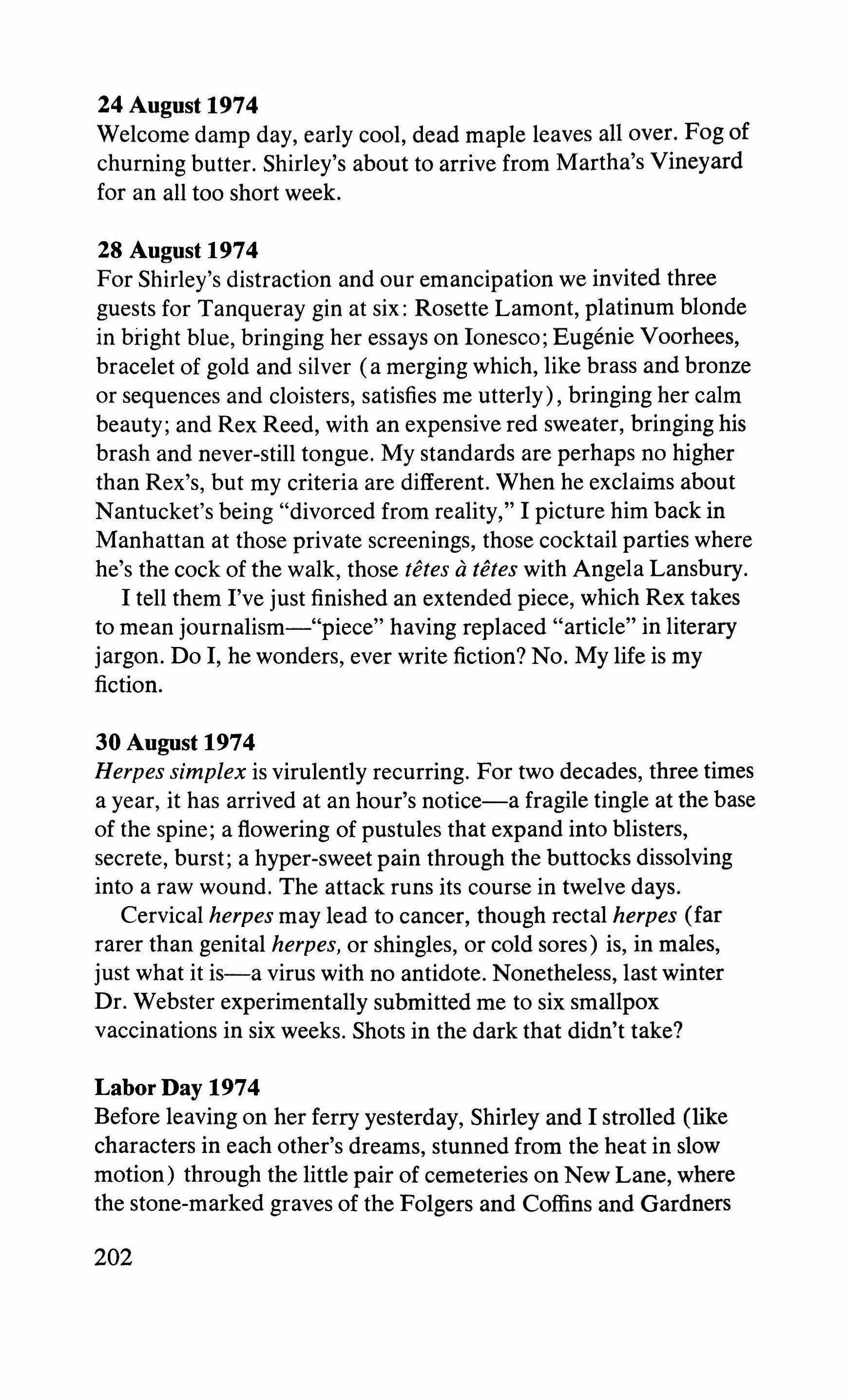
Welcome damp day, early cool, dead maple leaves all over. Fog of churning butter. Shirley's about to arrive from Martha's Vineyard for an all too short week.
For Shirley's distraction and our emancipation we invited three guests for Tanqueray gin at six: Rosette Lamont, platinum blonde in bright blue, bringing her essays on Ionesco; Eugenic Voorhees, bracelet of gold and silver (a merging which, like brass and bronze or sequences and cloisters, satisfies me utterly), bringing her calm beauty; and Rex Reed, with an expensive red sweater, bringing his brash and never-still tongue. My standards are perhaps no higher than Rex's, but my criteria are different. When he exclaims about Nantucket's being "divorced from reality," I picture him back in Manhattan at those private screenings, those cocktail parties where he's the cock of the walk, those tetes a teres with Angela Lansbury. I tell them I've just finished an extended piece, which Rex takes to mean journalism-"piece" having replaced "article" in literary jargon. Do I, he wonders, ever write fiction? No. My life is my fiction.
Herpes simplex is virulently recurring. For two decades, three times a year, it has arrived at an hour's notice-a fragile tingle at the base of the spine; a flowering of pustules that expand into blisters, secrete, burst; a hyper-sweet pain through the buttocks dissolving into a raw wound. The attack runs its course in twelve days.
Cervical herpes may lead to cancer, though rectal herpes (far rarer than genital herpes, or shingles, or cold sores) is, in males, just what it is-a virus with no antidote. Nonetheless, last winter Dr. Webster experimentally submitted me to six smallpox vaccinations in six weeks. Shots in the dark that didn't take?
Before leaving on her ferry yesterday, Shirley and I strolled (like characters in each other's dreams, stunned from the heat in slow motion) through the little pair of cemeteries on New Lane, where the stone-marked graves of the Folgers and Coffins and Gardners
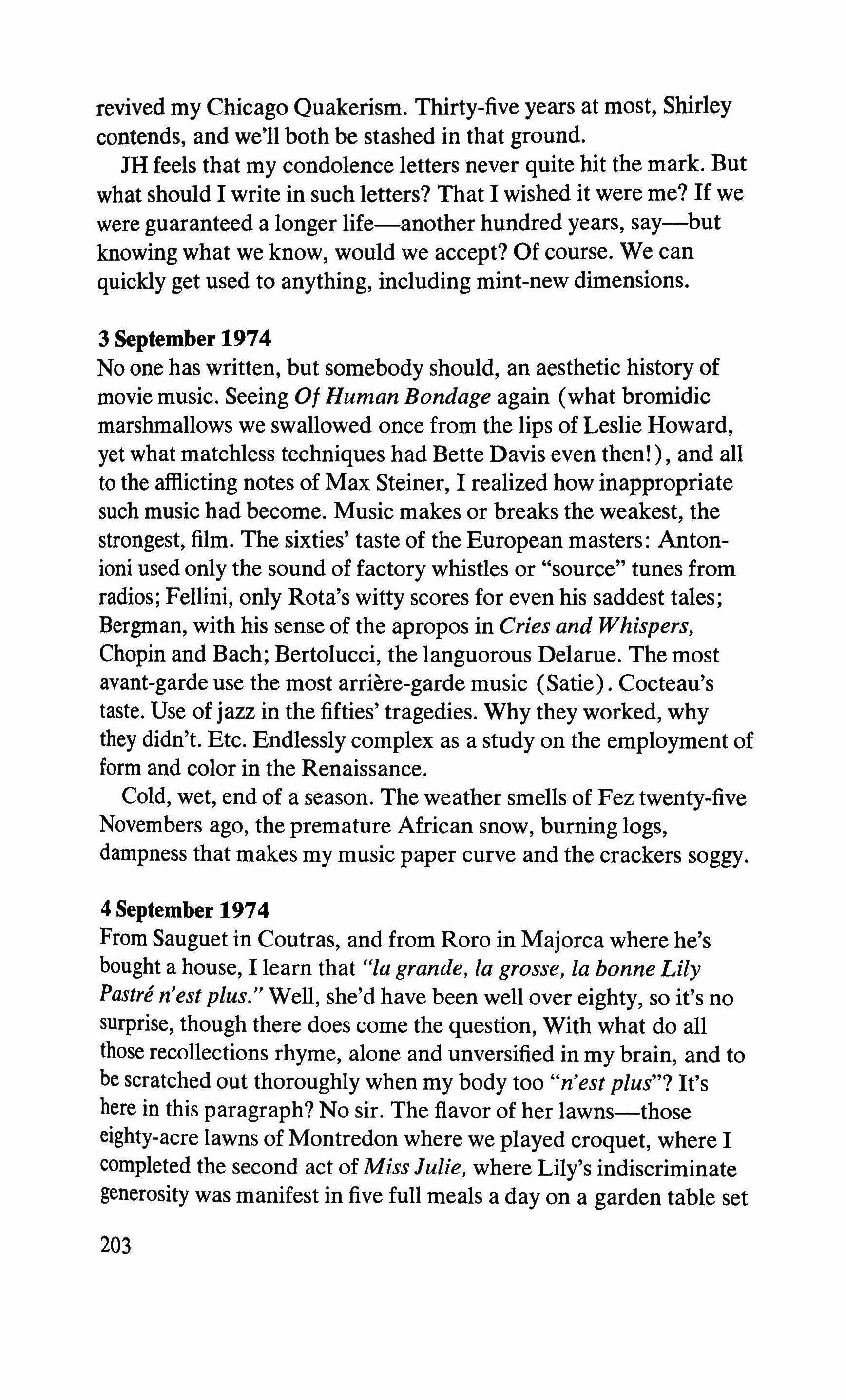
revived my Chicago Quakerism. Thirty-five years at most, Shirley contends, and we'll both be stashed in that ground.
JH feels that my condolence letters never quite hit the mark. But what should I write in such letters? That I wished it were me? If we were guaranteed a longer life-another hundred years, say-but knowing what we know, would we accept? Of course. We can quickly get used to anything, including mint-new dimensions.
No one has written, but somebody should, an aesthetic history of movie music. Seeing Of Human Bondage again (what bromidic marshmallows we swallowed once from the lips of Leslie Howard, yet what matchless techniques had Bette Davis even then!), and all to the afflicting notes of Max Steiner, I realized how inappropriate such music had become. Music makes or breaks the weakest, the strongest, film. The sixties' taste of the European masters: Antonioni used only the sound of factory whistles or "source" tunes from radios; Fellini, only Rota's witty scores for even his saddest tales; Bergman, with his sense of the apropos in Cries and Whispers, Chopin and Bach; Bertolucci, the languorous Delarue. The most avant-garde use the most arriere-garde music (Satie). Cocteau's taste. Use of jazz in the fifties' tragedies. Why they worked, why they didn't. Etc. Endlessly complex as a study on the employment of form and color in the Renaissance.
Cold, wet, end of a season. The weather smells of Fez twenty-five Novembers ago, the premature African snow, burning logs, dampness that makes my music paper curve and the crackers soggy.
4 September 1974
From Sauguet in Coutras, and from Roro in Majorca where he's bought a house, I learn that "la grande, la grosse, la bonne Lily Pastre n'est plus." Well, she'd have been well over eighty, so it's no surprise, though there does come the question, With what do all those recollections rhyme, alone and unversified in my brain, and to be scratched out thoroughly when my body too "n'est plus"? It's here in this paragraph? No sir. The flavor of her lawns-those eighty-acre lawns of Montredon where we played croquet, where I completed the second act of Miss Julie, where Lily's indiscriminate generosity was manifest in five full meals a day on a garden table set
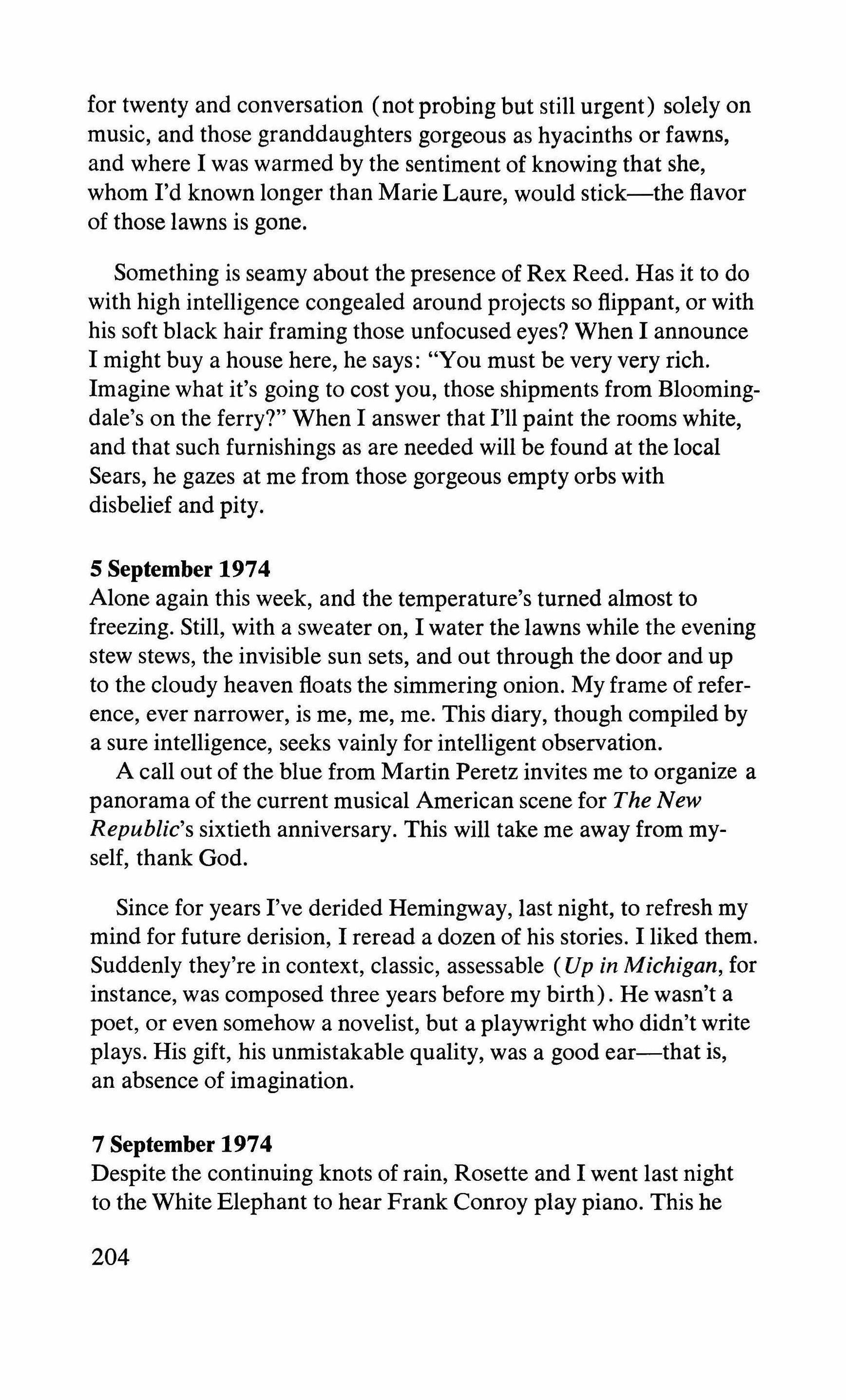
for twenty and conversation (not probing but still urgent) solely on music, and those granddaughters gorgeous as hyacinths or fawns, and where I was warmed by the sentiment of knowing that she, whom I'd known longer than Marie Laure, would stick-the flavor of those lawns is gone.
Something is seamy about the presence of Rex Reed. Has it to do with high intelligence congealed around projects so flippant, or with his soft black hair framing those unfocused eyes? When I announce I might buy a house here, he says: "You must be very very rich. Imagine what it's going to cost you, those shipments from Bloomingdale's on the ferry?" When I answer that I'll paint the rooms white, and that such furnishings as are needed will be found at the local Sears, he gazes at me from those gorgeous empty orbs with disbelief and pity.
5 September 1974
Alone again this week, and the temperature's turned almost to freezing. Still, with a sweater on, I water the lawns while the evening stew stews, the invisible sun sets, and out through the door and up to the cloudy heaven floats the simmering onion. My frame of reference, ever narrower, is me, me, me. This diary, though compiled by a sure intelligence, seeks vainly for intelligent observation.
A call out of the blue from Martin Peretz invites me to organize a panorama of the current musical American scene for The New Republic's sixtieth anniversary. This will take me away from myself, thank God.
Since for years I've derided Hemingway, last night, to refresh my mind for future derision, I reread a dozen of his stories. I liked them. Suddenly they're in context, classic, assessable (Up in Michigan, for instance, was composed three years before my birth). He wasn't a poet, or even somehow a novelist, but a playwright who didn't write plays. His gift, his unmistakable quality, was a good ear-that is, an absence of imagination.
7 September 1974
Despite the continuing knots of rain, Rosette and I went last night to the White Elephant to hear Frank Conroy play piano. This he 204
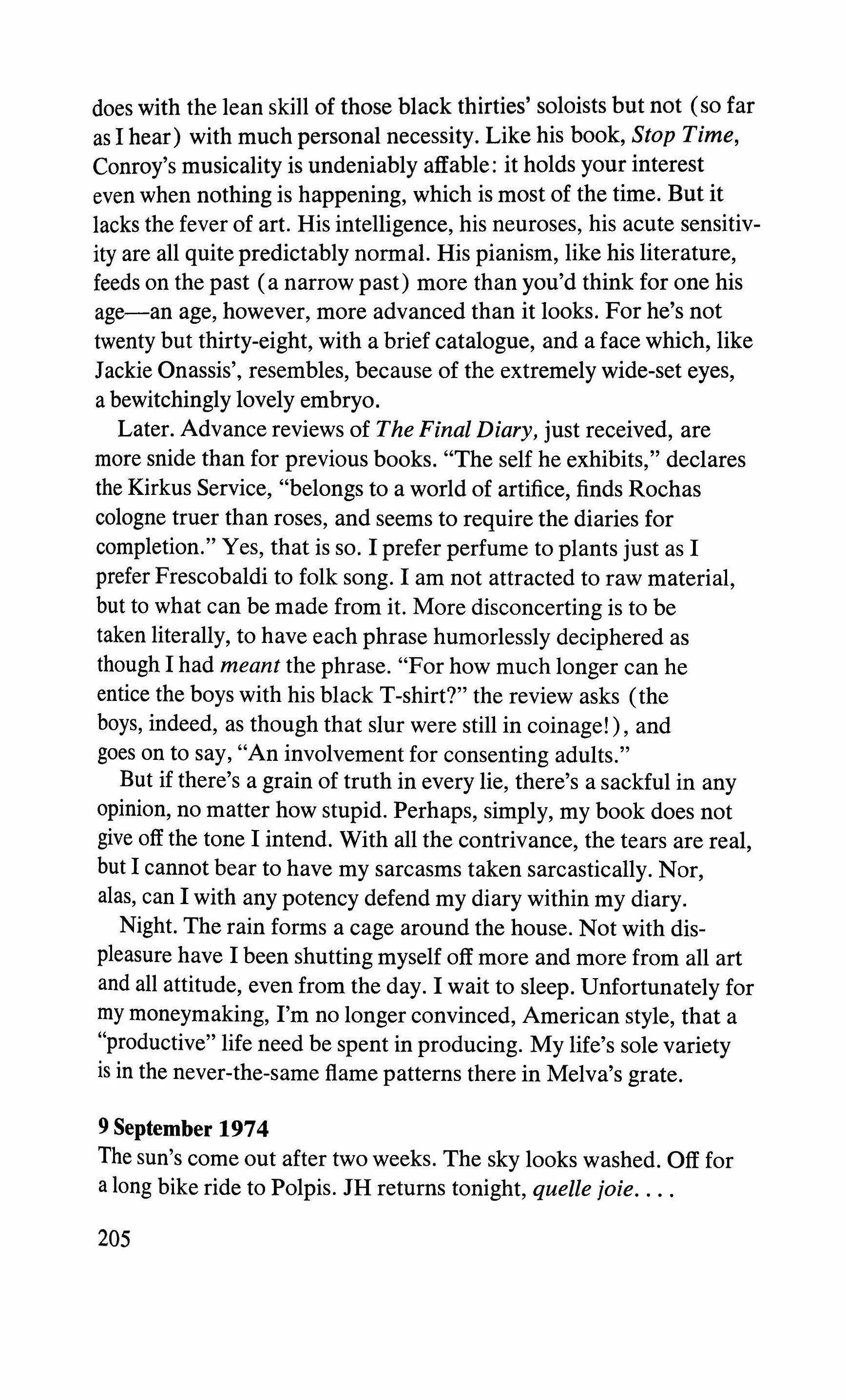
does with the lean skill of those black thirties' soloists but not (so far as I hear) with much personal necessity. Like his book, Stop Time, Conroy's musicality is undeniably affable: it holds your interest even when nothing is happening, which is most of the time. But it lacks the fever of art. His intelligence, his neuroses, his acute sensitivity are all quitepredictably normal. His pianism, like his literature, feeds on the past (a narrow past) more than you'd think for one his age-an age, however, more advanced than it looks. For he's not twenty but thirty-eight, with a brief catalogue, and a face which, like Jackie Onassis', resembles, because of the extremely wide-set eyes, a bewitchingly lovely embryo.
Later. Advance reviews of The Final Diary, just received, are more snide than for previous books. "The self he exhibits," declares the Kirkus Service, "belongs to a world of artifice, finds Rochas cologne truer than roses, and seems to require the diaries for completion." Yes, that is so. I prefer perfume to plants just as I prefer Frescobaldi to folk song. I am not attracted to raw material, but to what can be made from it. More disconcerting is to be taken literally, to have each phrase humorlessly deciphered as though I had meant the phrase. "For how much longer can he entice the boys with his black T-shirt?" the review asks (the boys, indeed, as though that slur were still in coinage! ), and goes on to say, "An involvement for consenting adults."
But if there's a grain of truth in every lie, there's a sackful in any opinion, no matter how stupid. Perhaps, simply, my book does not give off the tone I intend. With all the contrivance, the tears are real, but I cannot bear to have my sarcasms taken sarcastically. Nor, alas, can I with any potency defend my diary within my diary.
Night. The rain forms a cage around the house. Not with displeasure have I been shutting myself off more and more from all art and all attitude, even from the day. I wait to sleep. Unfortunately for my moneymaking, I'm no longer convinced, American style, that a "productive" life need be spent in producing. My life's sale variety is in the never-the-same flame patterns there in Melva's grate.
9 September 1974
The sun's come out after two weeks. The sky looks washed. Off for a long bike ride to Polpis. JH returns tonight, quelle joie
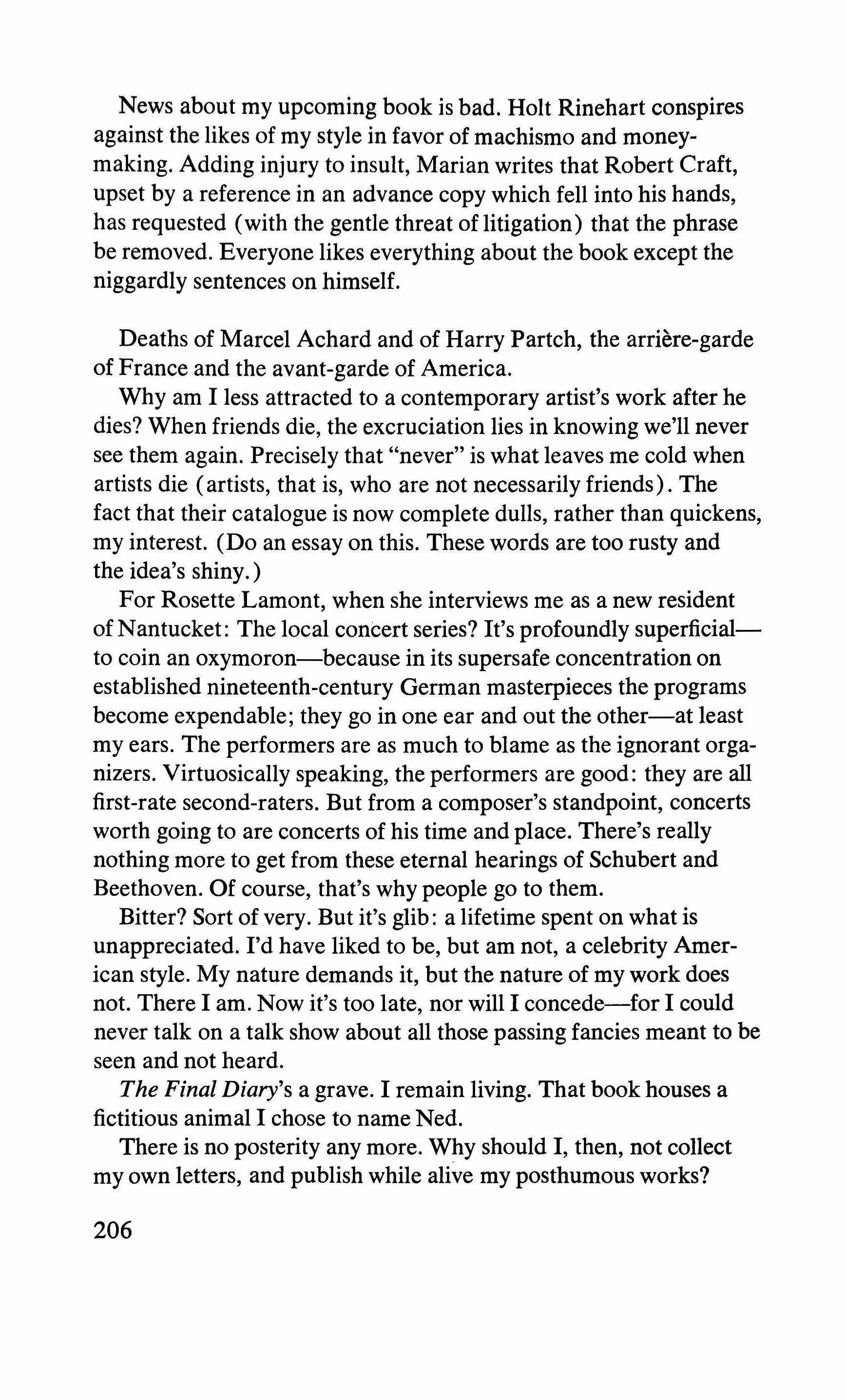
News about my upcoming book is bad. Holt Rinehart conspires against the likes of my style in favor of machismo and moneymaking. Adding injury to insult, Marian writes that Robert Craft, upset by a reference in an advance copy which fell into his hands, has requested (with the gentle threat of litigation) that the phrase be removed. Everyone likes everything about the book except the niggardly sentences on himself.
Deaths of Marcel Achard and of Harry Partch, the arriere-garde of France and the avant-garde of America.
Why am I less attracted to a contemporary artist's work after he dies? When friends die, the excruciation lies in knowing we'll never see them again. Precisely that "never" is what leaves me cold when artists die (artists, that is, who are not necessarily friends). The fact that their catalogue is now complete dulls, rather than quickens, my interest. (Do an essay on this. These words are too rusty and the idea's shiny.)
For Rosette Lamont, when she interviews me as a new resident of Nantucket: The local concert series? It's profoundly superficialto coin an oxymoron-because in its supersafe concentration on established nineteenth-century German masterpieces the programs become expendable; they go in one ear and out the other-at least my ears. The performers are as much to blame as the ignorant organizers. Virtuosically speaking, the performers are good: they are all first-rate second-raters. But from a composer's standpoint, concerts worth going to are concerts of his time and place. There's really nothing more to get from these eternal hearings of Schubert and Beethoven. Of course, that's why people go to them.
Bitter? Sort of very. But it's glib: a lifetime spent on what is unappreciated. I'd have liked to be, but am not, a celebrity American style. My nature demands it, but the nature of my work does not. There I am. Now it's too late, nor will I concede-for I could never talk on a talk show about all those passing fancies meant to be seen and not heard.
The Final Diary's a grave. I remain living. That book houses a fictitious animal I chose to name Ned.
There is no posterity any more. Why should I, then, not collect my own letters, and publish while alive my posthumous works?
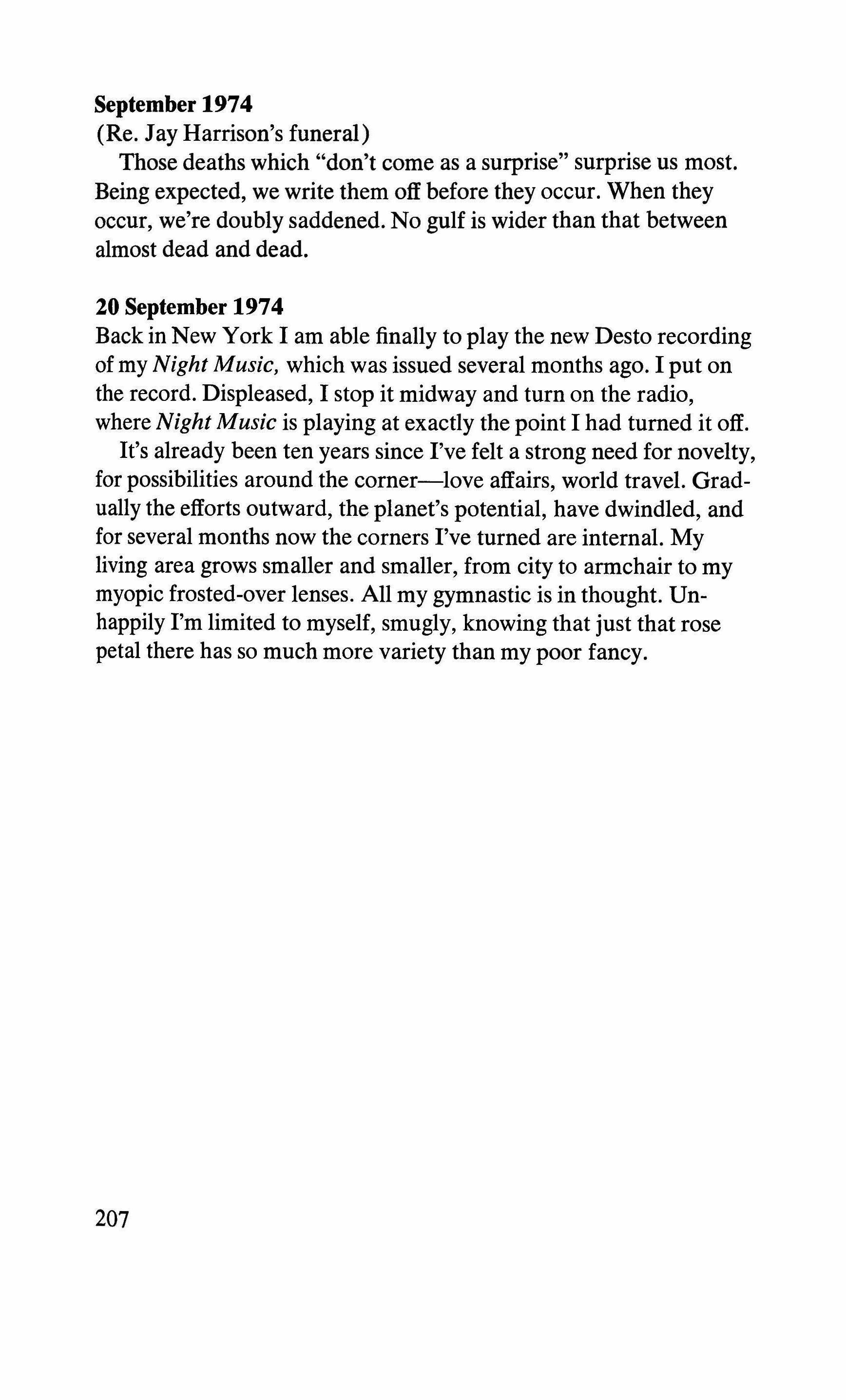
September 1974
(Re. Jay Harrison's funeral)
Those deaths which "don't come as a surprise" surprise us most. Being expected, we write them off before they occur. When they occur, we're doubly saddened. No gulf is wider than that between almost dead and dead.
September 1974
Back in New York I am able finally to play the new Desto recording of my Night Music, which was issued several months ago. I put on the record. Displeased, I stop it midway and turn on the radio, where Night Music is playing at exactly the point I had turned it off. It's already been ten years since I've felt a strong need for novelty, for possibilities around the corner-love affairs, world travel. Gradually the efforts outward, the planet's potential, have dwindled, and for several months now the corners I've turned are internal. My living area grows smaller and smaller, from city to armchair to my myopic frosted-over lenses. All my gymnastic is in thought. Unhappily I'm limited to myself, smugly, knowing that just that rose petal there has so much more variety than my poor fancy.
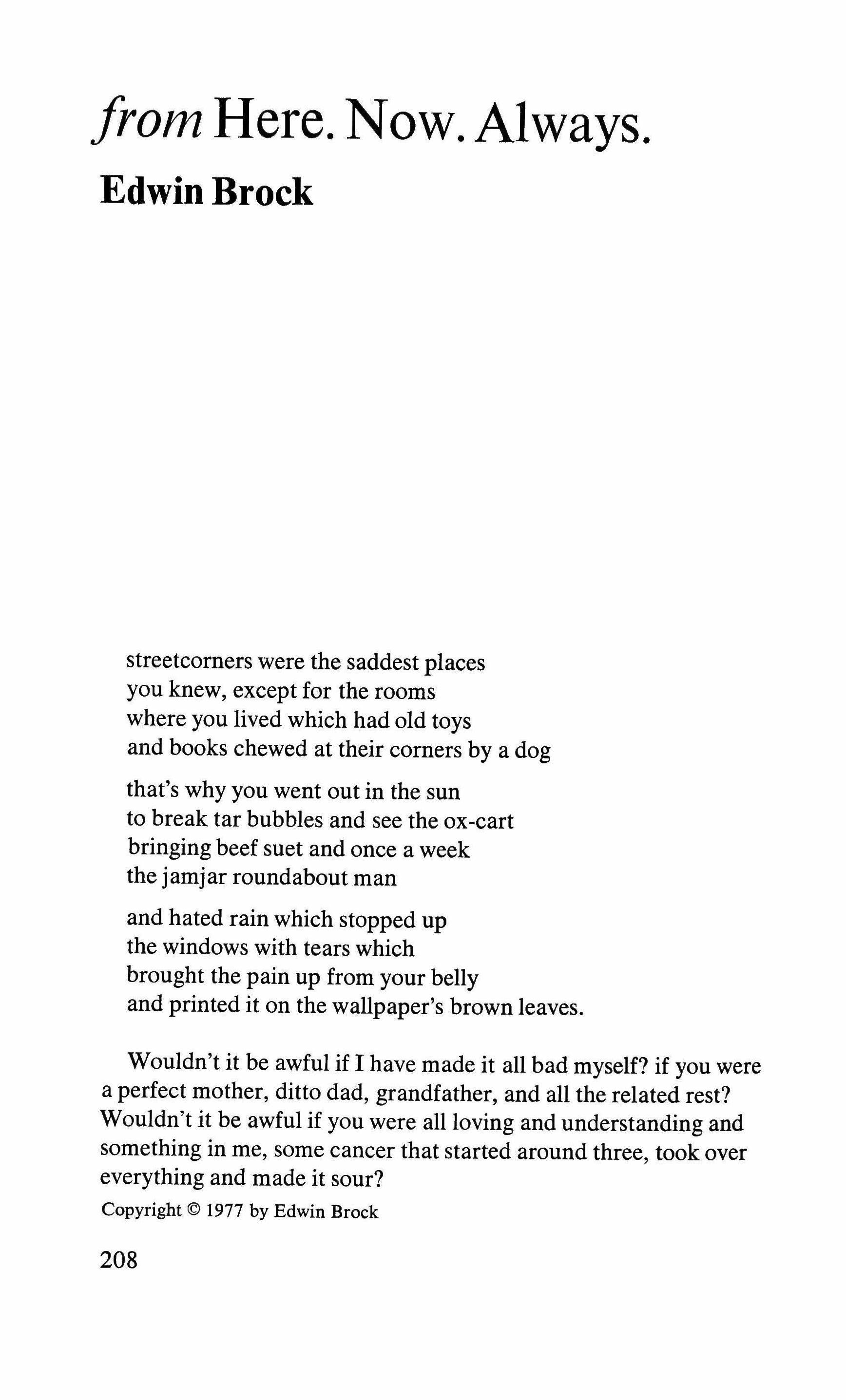
streetcorners were the saddest places you knew, except for the rooms where you lived which had old toys and books chewed at their corners by a dog
that's why you went out in the sun to break tar bubbles and see the ox-cart bringing beef suet and once a week the jamjar roundabout man and hated rain which stopped up the windows with tears which brought the pain up from your belly and printed it on the wallpaper's brown leaves.
Wouldn't it be awful if I have made it all bad myself? if you were a perfect mother, ditto dad, grandfather, and all the related rest?
Wouldn't it be awful if you were all loving and understanding and something in me, some cancer that started around three, took over everything and made it sour?
Copyright © 1977 by Edwin Brock

It would be tragic, because I would feel I could have been happy. But it's not feasible, is it? By ten I was ready to screw the lot of you-dad's death meant nothing, being evacuated meant nothing; everything had been cauterized long before.
The lions are here somewhere, not noisy but as though they have finished feeding and are waiting for God to tear the bars with his teeth.
It is that long dark afternoon which wasted years and suddenly stopped: it snowed, and my father and I threw feathers until the sludge turned sad.
I have never seen the lions awake and I do not really remember snow; that afternoon is open-mouthed, it wastes its time as though we are dead and time is everywhere.
I remember you first stepping from the twenties into the thirties (the century's, not your own), stepping from suburban flapper dances into the long depression of a hurried marriage containing a hurried child. "Never have kids," you told me as soon as I was old enough to be a confidant. "All they do is keep you poor!" I think, at first, I did not realize you were talking about me. I always ran ahead of you and dad, away from criticism and the fact that my hair would not stay slicked down. Dimly behind me I could hear the threats of what would happen if I misbehaved. We were always on our way to Granny Brock's. The street where she lived had something special about it. You called it Rough, though to anyone else it would have looked just like our own street. You could do that with streets; you were a kind of litmus paper that distinguished between Posh and Rough after one quick look-or perhaps it was a smell. After the analysis, you would say, "Keep away from Rodwell Road, it's too bloody rough down there!" and I would be left with another bewilderment.
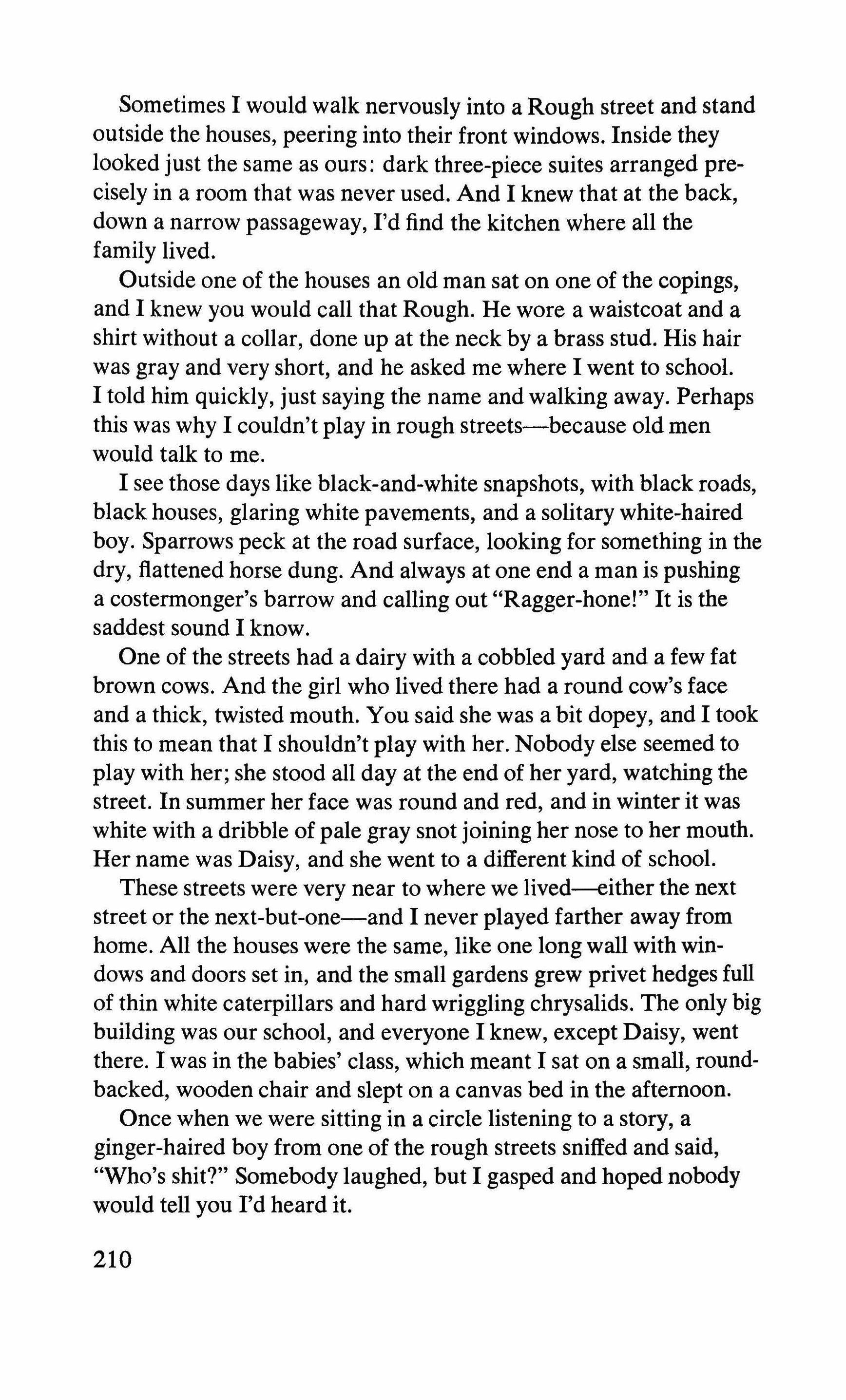
Sometimes I would walk nervously into a Rough street and stand outside the houses, peering into their front windows. Inside they looked just the same as ours: dark three-piece suites arranged precisely in a room that was never used. And I knew that at the back, down a narrow passageway, I'd find the kitchen where all the family lived.
Outside one of the houses an old man sat on one of the copings, and I knew you would call that Rough. He wore a waistcoat and a shirt without a collar, done up at the neck by a brass stud. His hair was gray and very short, and he asked me where I went to school. I told him quickly, just saying the name and walking away. Perhaps this was why I couldn't play in rough streets-because old men would talk to me.
I see those days like black-and-white snapshots, with black roads, black houses, glaring white pavements, and a solitary white-haired boy. Sparrows peck at the road surface, looking for something in the dry, flattened horse dung. And always at one end a man is pushing a costermonger's barrow and calling out "Ragger-hone!" It is the saddest sound I know.
One of the streets had a dairy with a cobbled yard and a few fat brown cows. And the girl who lived there had a round cow's face and a thick, twisted mouth. You said she was a bit dopey, and I took this to mean that I shouldn't play with her. Nobody else seemed to play with her; she stood all day at the end of her yard, watching the street. In summer her face was round and red, and in winter it was white with a dribble of pale gray snot joining her nose to her mouth. Her name was Daisy, and she went to a different kind of school.
These streets were very near to where we lived--either the next street or the next-but-one-and I never played farther away from home. All the houses were the same, like one long wall with windows and doors set in, and the small gardens grew privet hedges full of thin white caterpillars and hard wriggling chrysalids. The only big building was our school, and everyone I knew, except Daisy, went there. I was in the babies' class, which meant I sat on a small, roundbacked, wooden chair and slept on a canvas bed in the afternoon.
Once when we were sitting in a circle listening to a story, a ginger-haired boy from one of the rough streets sniffed and said, "Who's shit?" Somebody laughed, but I gasped and hoped nobody would tell you I'd heard it. 210
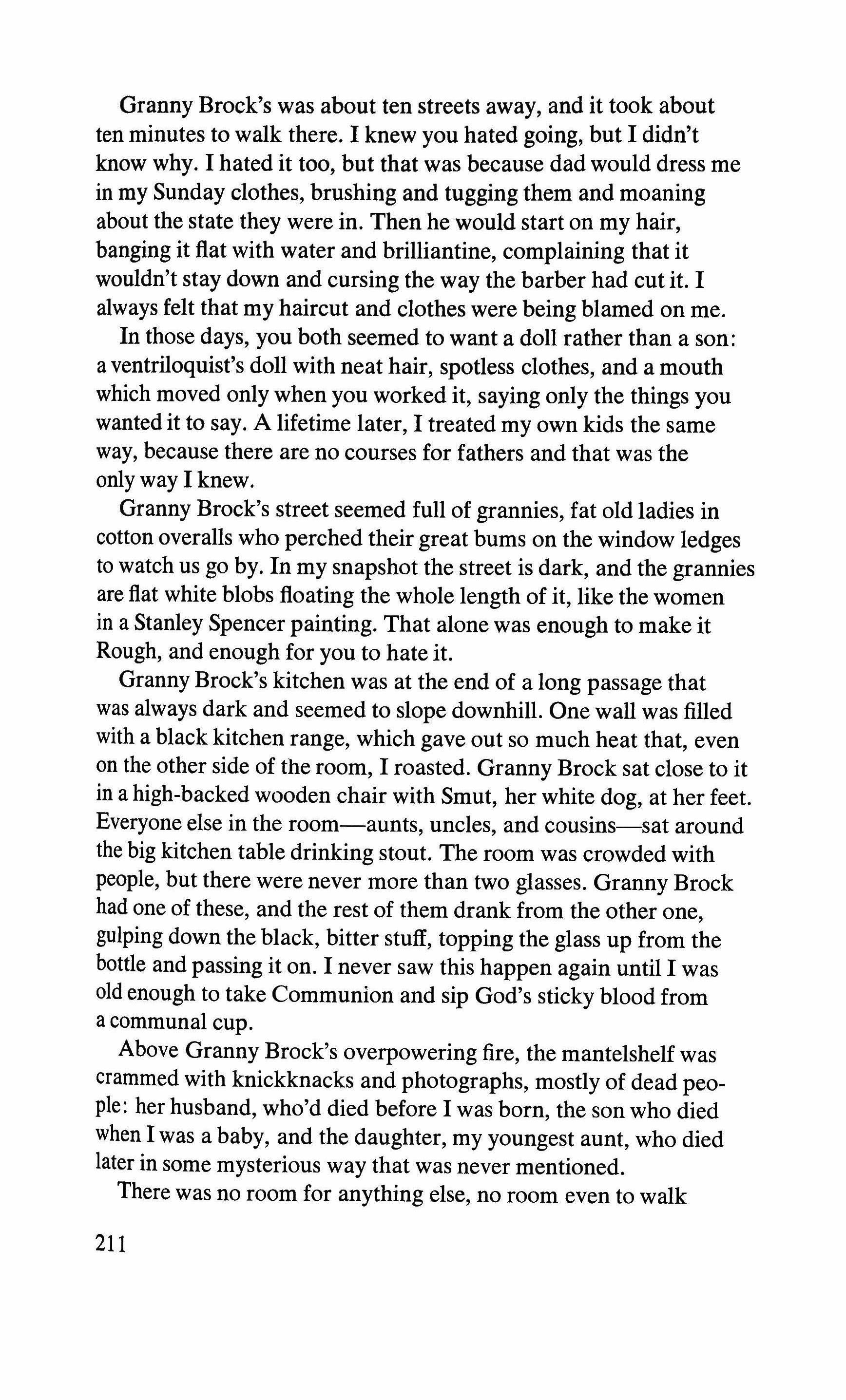
Granny Brock's was about ten streets away, and it took about ten minutes to walk there. I knew you hated going, but I didn't know why. I hated it too, but that was because dad would dress me in my Sunday clothes, brushing and tugging them and moaning about the state they were in. Then he would start on my hair, banging it flat with water and brilliantine, complaining that it wouldn't stay down and cursing the way the barber had cut it. I always felt that my haircut and clothes were being blamed on me.
In those days, you both seemed to want a doll rather than a son: a ventriloquist's doll with neat hair, spotless clothes, and a mouth which moved only when you worked it, saying only the things you wanted it to say. A lifetime later, I treated my own kids the same way, because there are no courses for fathers and that was the only way I knew.
Granny Brock's street seemed full of grannies, fat old ladies in cotton overalls who perched their great bums on the window ledges to watch us go by. In my snapshot the street is dark, and the grannies are flat white blobs floating the whole length of it, like the women in a Stanley Spencer painting. That alone was enough to make it Rough, and enough for you to hate it.
Granny Brock's kitchen was at the end of a long passage that was always dark and seemed to slope downhill. One wall was filled with a black kitchen range, which gave out so much heat that, even on the other side of the room, I roasted. Granny Brock sat close to it in a high-backed wooden chair with Smut, her white dog, at her feet. Everyone else in the room-aunts, uncles, and cousins-sat around the big kitchen table drinking stout. The room was crowded with people, but there were never more than two glasses. Granny Brock had one of these, and the rest of them drank from the other one, gulping down the black, bitter stuff, topping the glass up from the bottle and passing it on. I never saw this happen again until I was old enough to take Communion and sip God's sticky blood from a communal cup.
Above Granny Brock's overpowering fire, the mantelshelf was crammed with knickknacks and photographs, mostly of dead people: her husband, who'd died before I was born, the son who died when I was a baby, and the daughter, my youngest aunt, who died later in some mysterious way that was never mentioned. There was no room for anything else, no room even to walk
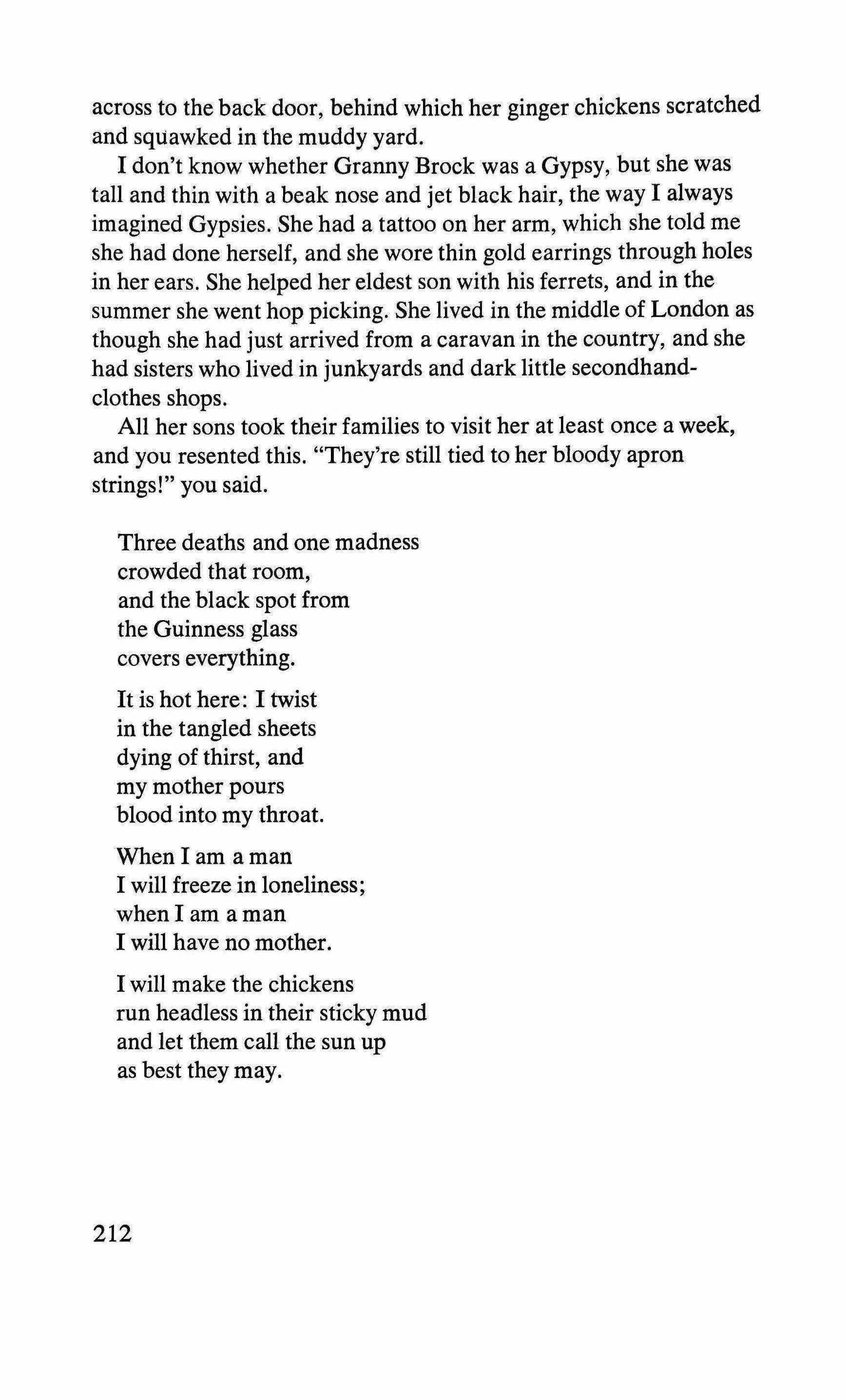
across to the back door, behind which her ginger chickens scratched and squawked in the muddy yard.
I don't know whether Granny Brock was a Gypsy, but she was tall and thin with a beak nose and jet black hair, the way I always imagined Gypsies. She had a tattoo on her arm, which she told me she had done herself, and she wore thin gold earrings through holes in her ears. She helped her eldest son with his ferrets, and in the summer she went hop picking. She lived in the middle of London as though she had just arrived from a caravan in the country, and she had sisters who lived in junkyards and dark little secondhandclothes shops.
All her sons took their families to visit her at least once a week, and you resented this. "They're still tied to her bloody apron strings!" you said.
Three deaths and one madness crowded that room, and the black spot from the Guinness glass covers everything.
It is hot here: I twist in the tangled sheets dying of thirst, and my mother pours blood into my throat.
When I am a man I will freeze in loneliness; when I am a man I will have no mother.
I will make the chickens run headless in their sticky mud and let them call the sun up as best they may.
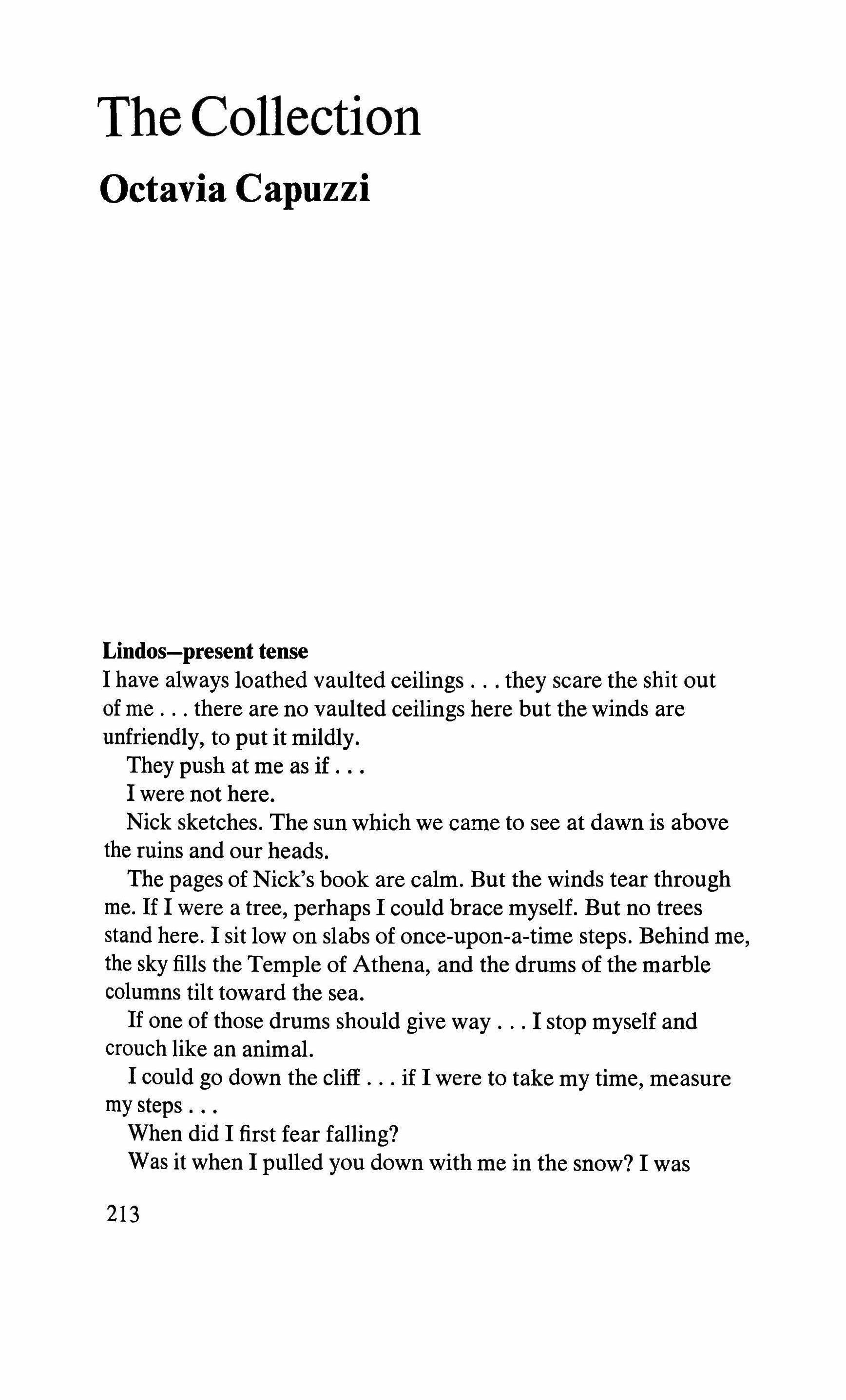
Lindos-present tense
I have always loathed vaulted ceilings they scare the shit out of me there are no vaulted ceilings here but the winds are unfriendly, to put it mildly. They push at me as if I were not here.
Nick sketches. The sun which we carne to see at dawn is above the ruins and our heads.
The pages of Nick's book are calm. But the winds tear through me. If I were a tree, perhaps I could brace myself. But no trees stand here. I sit low on slabs of once-upon-a-time steps. Behind me, the sky fills the Temple of Athena, and the drums of the marble columns tilt toward the sea.
If one of those drums should give way I stop myself and crouch like an animal.
I could go down the cliff if I were to take my time, measure my steps
When did I first fear falling?
Was it when I pulled you down with me in the snow? I was 213
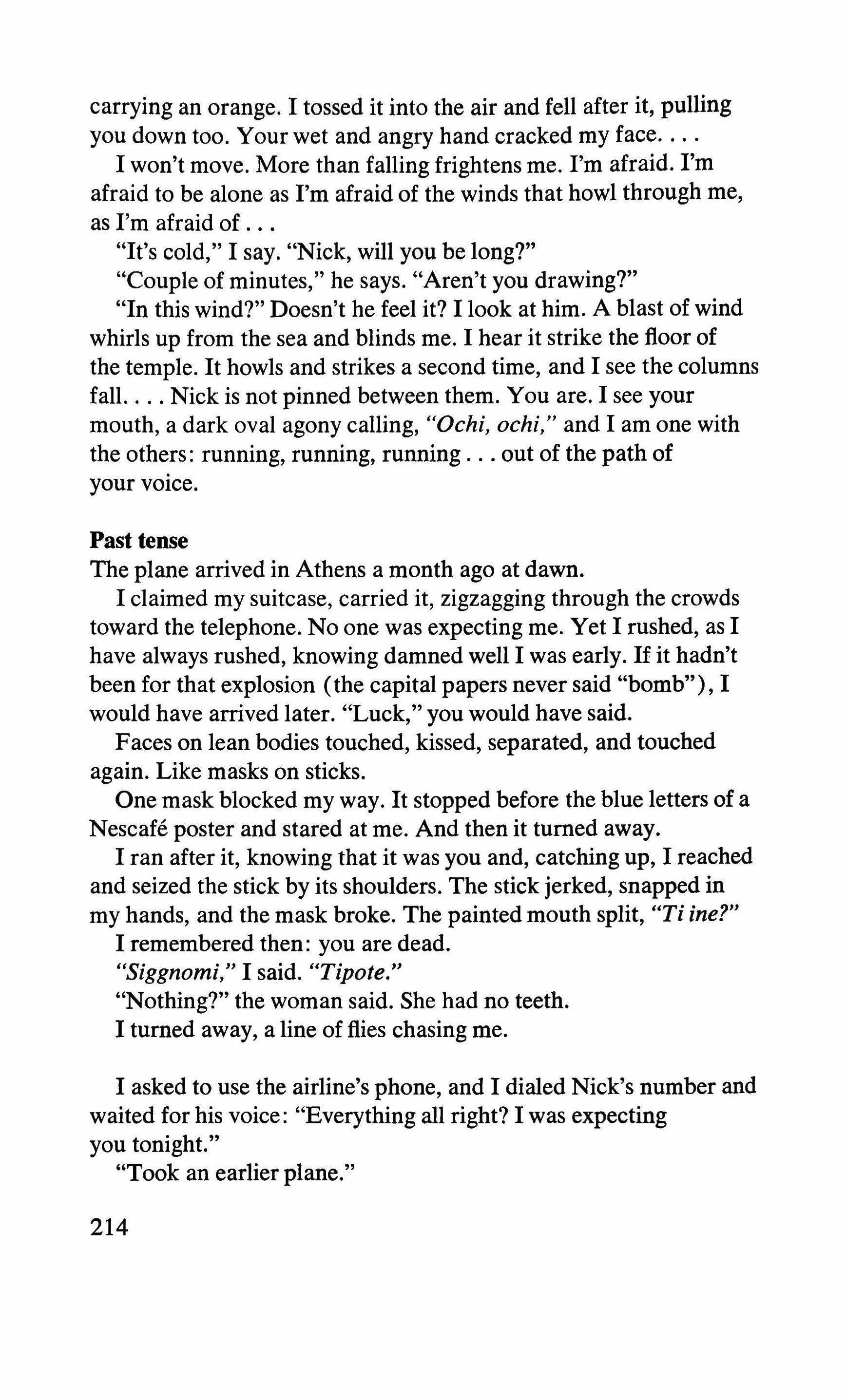
carrying an orange. I tossed it into the air and fell after it, pulling you down too. Your wet and angry hand cracked my face I won't move. More than falling frightens me. I'm afraid. I'm afraid to be alone as I'm afraid of the winds that howl through me, as I'm afraid of "It's cold," I say. "Nick, will you be long?" "Couple of minutes," he says. "Aren't you drawing?"
"In this wind?" Doesn't he feel it? I look at him. A blast of wind whirls up from the sea and blinds me. I hear it strike the floor of the temple. It howls and strikes a second time, and I see the columns fall Nick is not pinned between them. You are. I see your mouth, a dark oval agony calling, "Ochi, ochi," and I am one with the others: running, running, running out of the path of your voice.
The plane arrived in Athens a month ago at dawn. I claimed my suitcase, carried it, zigzagging through the crowds toward the telephone. No one was expecting me. Yet I rushed, as I have always rushed, knowing damned well I was early. If it hadn't been for that explosion (the capital papers never said "bomb"), I would have arrived later. "Luck," you would have said. Faces on lean bodies touched, kissed, separated, and touched again. Like masks on sticks.
One mask blocked my way. It stopped before the blue letters of a Nescafe poster and stared at me. And then it turned away. I ran after it, knowing that it was you and, catching up, I reached and seized the stick by its shoulders. The stick jerked, snapped in my hands, and the mask broke. The painted mouth split, "Ti ine?"
I remembered then: you are dead.
"Siggnomi," I said. "Tipote;" "Nothing?" the woman said. She had no teeth. I turned away, a line of flies chasing me.
I asked to use the airline's phone, and I dialed Nick's number and waited for his voice: "Everything all right? I was expecting you tonight."
"Took an earlier plane."
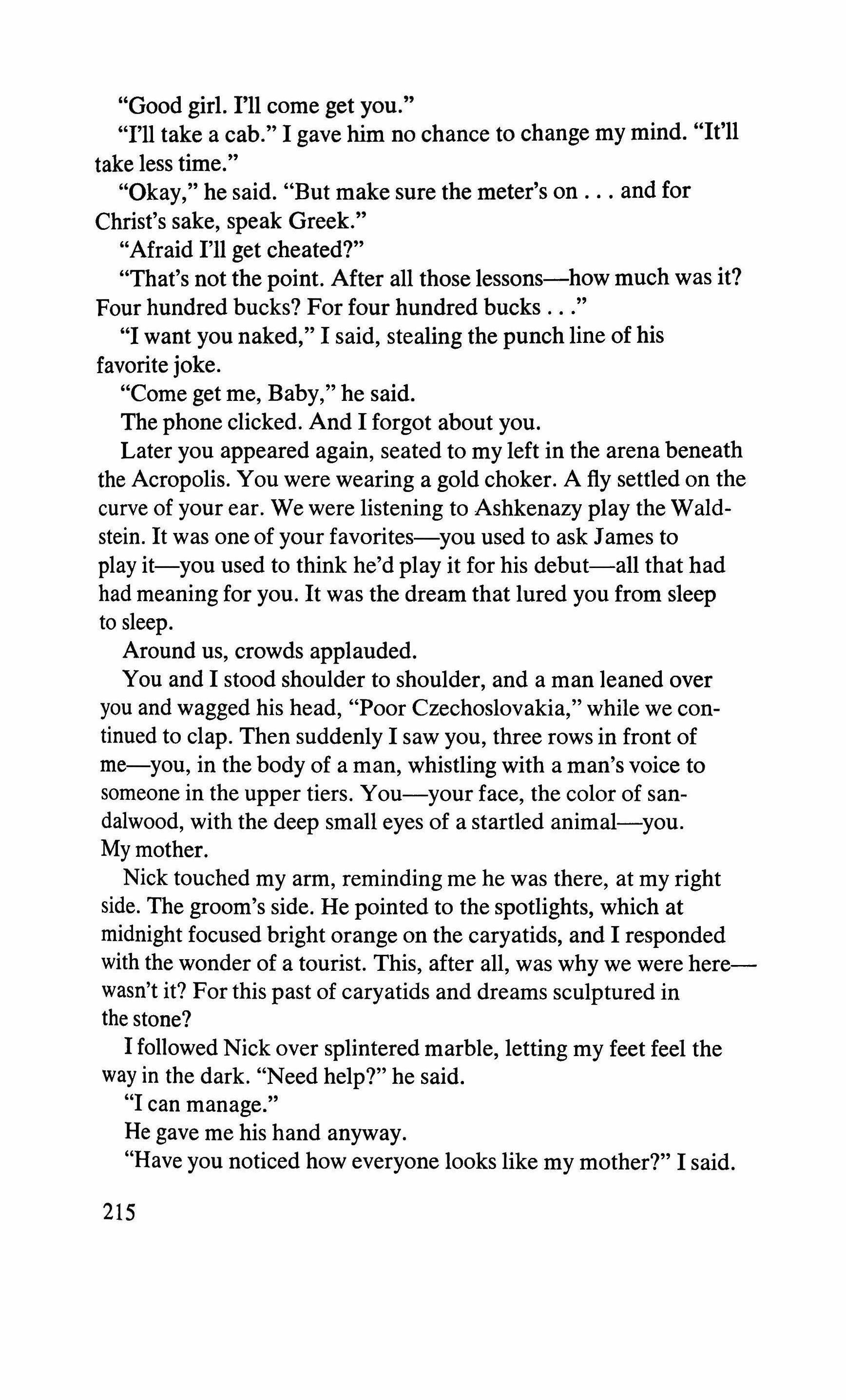
"Good girl. I'll come get you."
"I'll take a cab." I gave him no chance to change my mind. "It'll take less time."
"Okay," he said. "But make sure the meter's on and for Christ's sake, speak Greek."
"Afraid I'll get cheated?"
"That's not the point. After all those lessons-how much was it? Four hundred bucks? For four hundred bucks
"I want you naked," I said, stealing the punch line of his favorite joke.
"Come get me, Baby," he said.
The phone clicked. And I forgot about you.
Later you appeared again, seated to my left in the arena beneath the Acropolis. You were wearing a gold choker. A fly settled on the curve of your ear. We were listening to Ashkenazy play the Waldstein. It was one of your favorites-you used to ask James to play it-you used to think he'd play it for his debut-all that had had meaning for you. It was the dream that lured you from sleep to sleep.
Around us, crowds applauded.
You and I stood shoulder to shoulder, and a man leaned over you and wagged his head, "Poor Czechoslovakia," while we continued to clap. Then suddenly I saw you, three rows in front of me-you, in the body of a man, whistling with a man's voice to someone in the upper tiers. You-your face, the color of sandalwood, with the deep small eyes of a startled animal-you. My mother.
Nick touched my arm, reminding me he was there, at my right side. The groom's side. He pointed to the spotlights, which at midnight focused bright orange on the caryatids, and I responded with the wonder of a tourist. This, after all, was why we were herewasn't it? For this past of caryatids and dreams sculptured in the stone?
I followed Nick over splintered marble, letting my feet feel the way in the dark. "Need help?" he said.
"I can manage."
He gave me his hand anyway.
"Have you noticed how everyone looks like my mother?" I said.
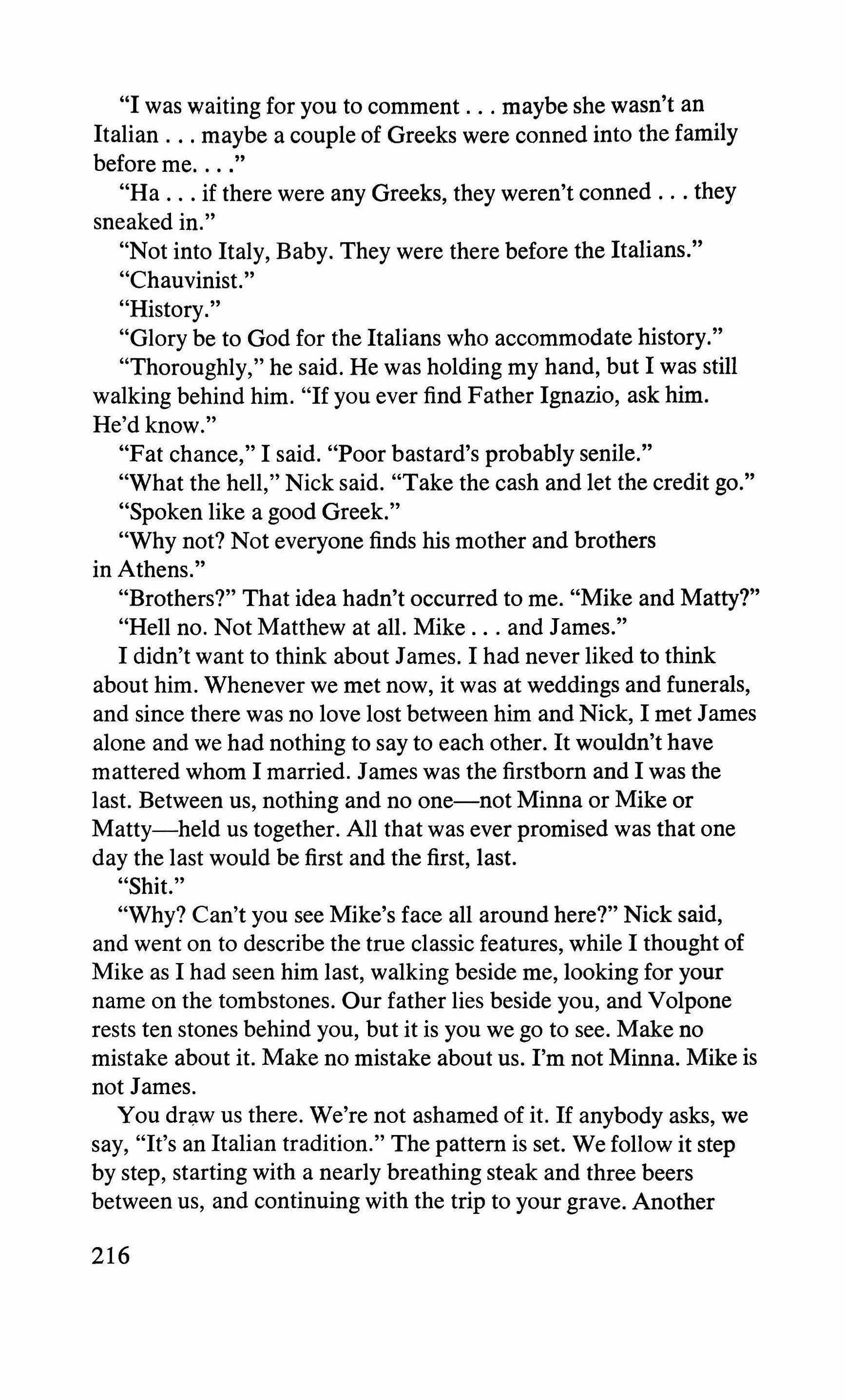
"I was waiting for you to comment maybe she wasn't an Italian maybe a couple of Greeks were conned into the family before me "
"Ha if there were any Greeks, they weren't conned they sneaked in."
"Not into Italy, Baby. They were there before the Italians." "Chauvinist.
"History.
"Glory be to God for the Italians who accommodate history."
"Thoroughly," he said. He was holding my hand, but I was still walking behind him. "If you ever find Father Ignazio, ask him. He'd know."
"Fat chance," I said. "Poor bastard's probably senile."
"What the hell," Nick said. "Take the cash and let the credit go."
"Spoken like a good Greek."
"Why not? Not everyone finds his mother and brothers in Athens."
"Brothers?" That idea hadn't occurred to me. "Mike and Matty?"
"Hell no. Not Matthew at all. Mike and James."
I didn't want to think about James. I had never liked to think about him. Whenever we met now, it was at weddings and funerals, and since there was no love lost between him and Nick, I met James alone and we had nothing to say to each other. It wouldn't have mattered whom I married. James was the firstborn and I was the last. Between us, nothing and no one-not Minna or Mike or Matty-held us together. All that was ever promised was that one day the last would be first and the first, last.
"Shit."
"Why? Can't you see Mike's face all around here?" Nick said, and went on to describe the true classic features, while I thought of Mike as I had seen him last, walking beside me, looking for your name on the tombstones. Our father lies beside you, and Volpone rests ten stones behind you, but it is you we go to see. Make no mistake about it. Make no mistake about us. I'm not Minna. Mike is not James.
You draw us there. We're not ashamed of it. If anybody asks, we say, "It's an Italian tradition." The pattern is set. We follow it step by step, starting with a nearly breathing steak and three beers between us, and continuing with the trip to your grave. Another

woman might have wanted her husband with her. Not me. Family business, like family loyalty and family war, is my own business. I never saw any reason for sharing it. That's a tradition too.
I ask Mike, "In the Freudian sense of the word, are we acting out?"
"In the Freudian sense of the word, we're defining the difference between privata and privatissima. Anybody who doesn't like it can kiss my ass."
Mike never misses a holiday, going there in the snow as in the wet winds of spring, carrying holly branches and asters. Choosing carefully, he compares the rose with the carnation, weighing them, making certain to get his money's worth. He doesn't like it when I bring leaves out of the woods. Remembrances for the dead must be paid for in cold cash.
Where in hell did he get that idea?
I have never asked. By now this too has become ritual and so I split the cost. Fifty-fifty
The heat of Athens followed me to bed. I lay there, wondering when it would lift. The only movement was that of mosquitoes dancing against the net.
I hummed the Waldstein to myself. And remembering your taste for Beethoven, I wondered if it was you who shaped James's talent, and if because of you he couldn't play before an audience. I heard you say, "His memory wasn't good enough."
"Who in hell told you that?"
"He did."
"And you believe him?"
"What I believe doesn't matter. It's what he believes that counts."
You might have been present in the room. Your voice was distinct. I even quarreled with you. You were part of the interminable heat, suffocating me.
I said, "I don't give a good goddamn what he told you. His memory was exceptional and you know it. The problem was not in his memory but in his fear."
And you said, "What was he afraid of?"
"You tell me."
"I don't know we've always been a condemned race victims of jealousy. People are always envious of a talent."
217
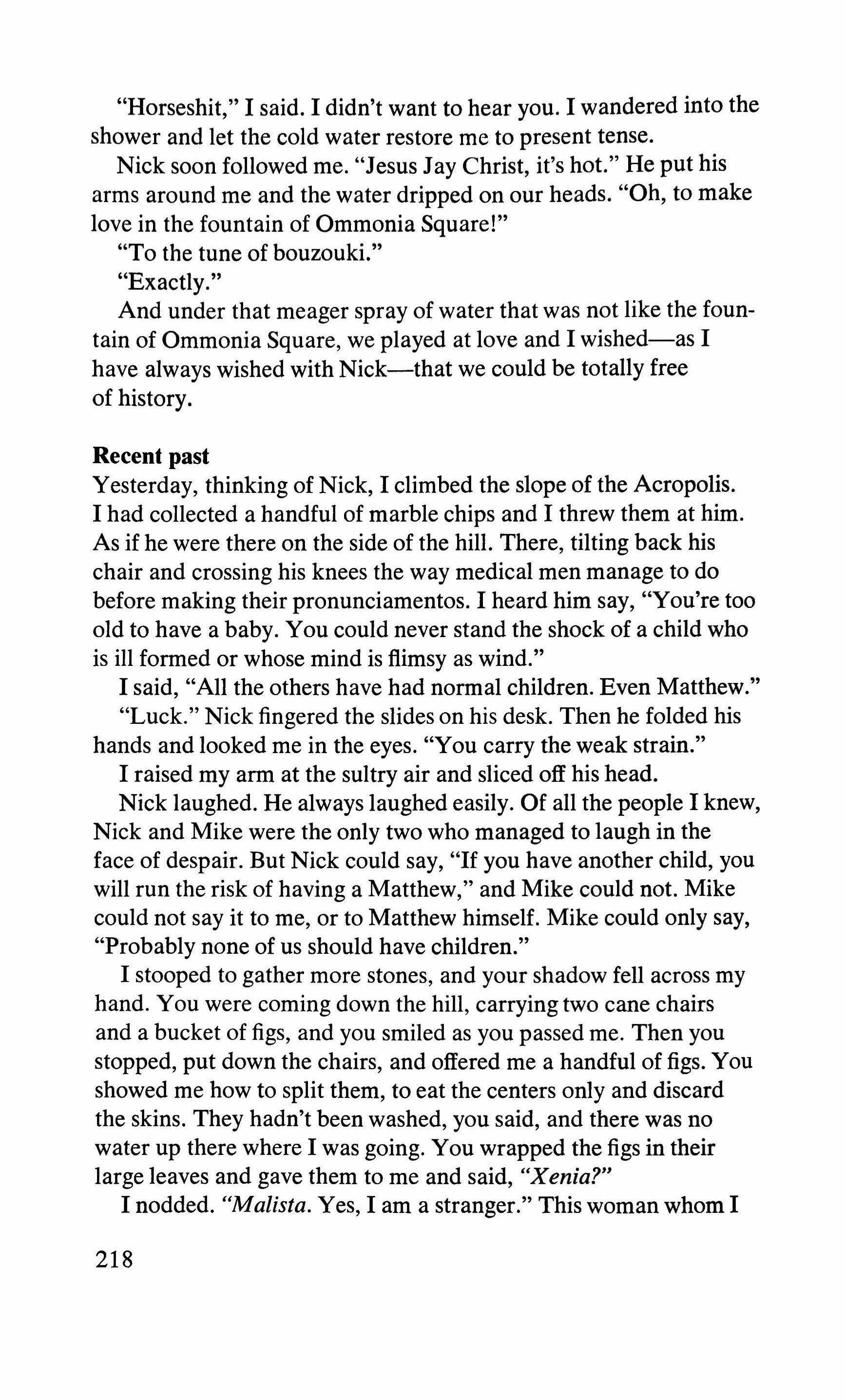
"Horseshit," I said. I didn't want to hear you. I wandered into the shower and let the cold water restore me to present tense.
Nick soon followed me. "Jesus Jay Christ, it's hot." He put his arms around me and the water dripped on our heads. "Oh, to make love in the fountain of Ommonia Square!"
"To the tune of bouzouki."
And under that meager spray of water that was not like the fountain of Ommonia Square, we played at love and I wished-as I have always wished with Nick-that we could be totally free of history.
Yesterday, thinking of Nick, I climbed the slope of the Acropolis. I had collected a handful of marble chips and I threw them at him. As if he were there on the side of the hill. There, tilting back his chair and crossing his knees the way medical men manage to do before making their pronunciamentos. I heard him say, "You're too old to have a baby. You could never stand the shock of a child who is ill formed or whose mind is flimsy as wind."
I said, "All the others have had normal children. Even Matthew." "Luck." Nick fingered the slides on his desk. Then he folded his hands and looked me in the eyes. "You carry the weak strain."
I raised my arm at the sultry air and sliced off his head.
Nick laughed. He always laughed easily. Of all the people I knew, Nick and Mike were the only two who managed to laugh in the face of despair. But Nick could say, "If you have another child, you will run the risk of having a Matthew," and Mike could not. Mike could not say it to me, or to Matthew himself. Mike could only say, "Probably none of us should have children."
I stooped to gather more stones, and your shadow fell across my hand. You were coming down the hill, carrying two cane chairs and a bucket of figs, and you smiled as you passed me. Then you stopped, put down the chairs, and offered me a handful of figs. You showed me how to split them, to eat the centers only and discard the skins. They hadn't been washed, you said, and there was no water up there where I was going. You wrapped the figs in their large leaves and gave them to me and said, "Xenia?"
I nodded. "Malista. Yes, I am a stranger." This woman whom I
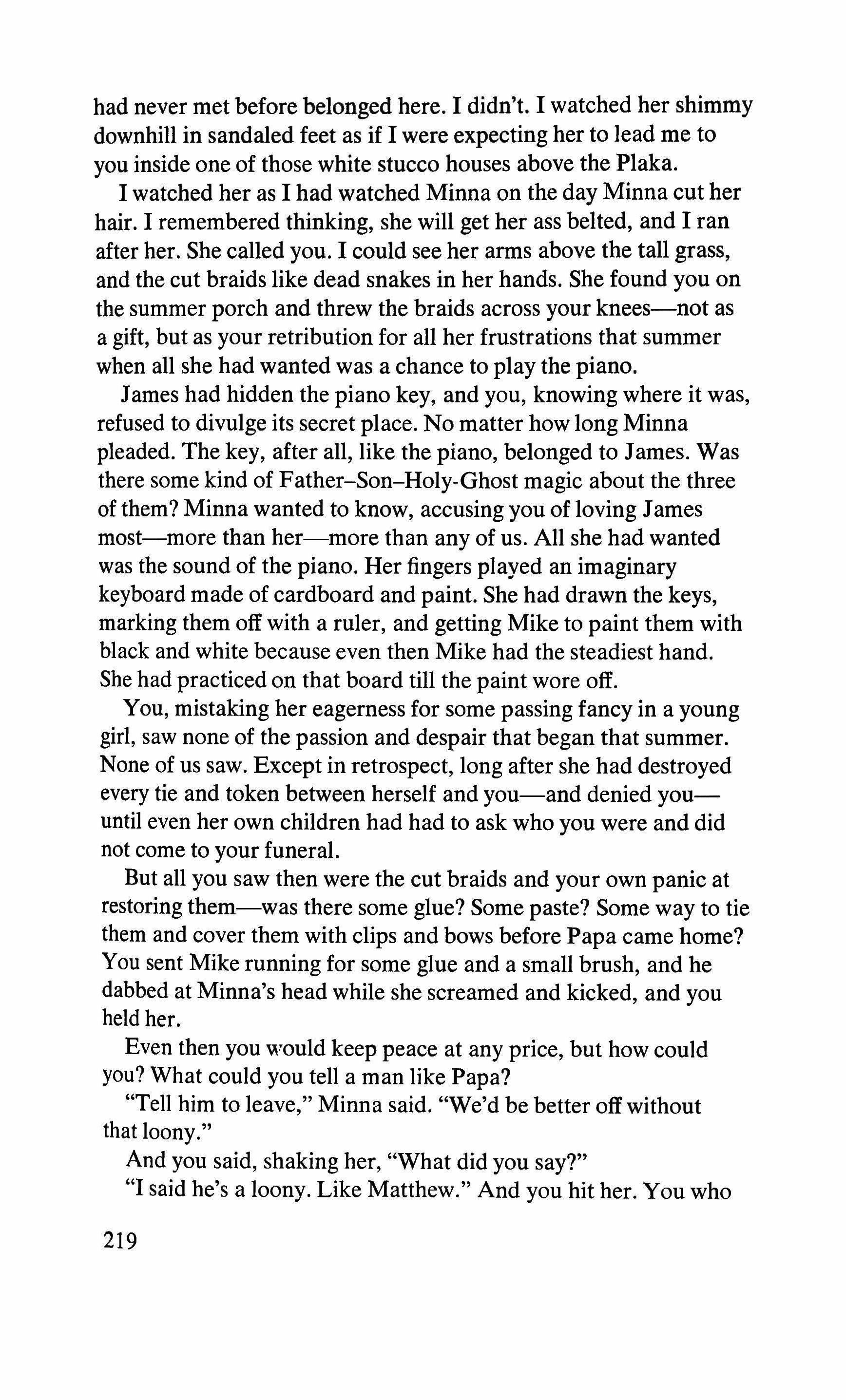
had never met before belonged here. I didn't. I watched her shimmy downhill in sandaled feet as if I were expecting her to lead me to you inside one of those white stucco houses above the Plaka.
I watched her as I had watched Minna on the day Minna cut her hair. I remembered thinking, she will get her ass belted, and I ran after her. She called you. I could see her arms above the tall grass, and the cut braids like dead snakes in her hands. She found you on the summer porch and threw the braids across your knees-not as a gift, but as your retribution for all her frustrations that summer when all she had wanted was a chance to play the piano.
James had hidden the piano key, and you, knowing where it was, refused to divulge its secret place. No matter how long Minna pleaded. The key, after all, like the piano, belonged to James. Was there some kind of Father-Son-Holy-Ghost magic about the three of them? Minna wanted to know, accusing you of loving James most-more than her-more than any of us. All she had wanted was the sound of the piano. Her fingers played an imaginary keyboard made of cardboard and paint. She had drawn the keys, marking them off with a ruler, and getting Mike to paint them with black and white because even then Mike had the steadiest hand. She had practiced on that board till the paint wore off.
You, mistaking her eagerness for some passing fancy in a young girl, saw none of the passion and despair that began that summer. None of us saw. Except in retrospect, long after she had destroyed every tie and token between herself and you-and denied youuntil even her own children had had to ask who you were and did not come to your funeral.
But all you saw then were the cut braids and your own panic at restoring them-was there some glue? Some paste? Some way to tie them and cover them with clips and bows before Papa came home? You sent Mike running for some glue and a small brush, and he dabbed at Minna's head while she screamed and kicked, and you held her.
Even then you would keep peace at any price, but how could you? What could you tell a man like Papa?
"Tell him to leave," Minna said. "We'd be better off without that loony."
And you said, shaking her, "What did you say?" "I said he's a loony. Like Matthew." And you hit her. You who

had never raised a hand to anyone. You went after Minna's mouth as if you'd pull out her tongue by the roots, and only Papa could stop you.
I never knew whether your anger was genuine or whether you invented it to protect Minna from Papa. Because the man was blind when he was in a rage. Only I didn't know that then.
I found Nick inside the Temple of Athena. He was squatting on his heels, studying a footprint that had been worn into the marble, measuring it with a roll-up tape measure. He mumbled the dimensions to himself, jotting them down on a pack of matches. Whose toe and heel might they have been?
"God's," I said.
"Why not?" Nick stood up, slipped the tape and the matches inside his shirt pocket, and looked at me. "What's the matter, old girl?"
"I keep seeing ghosts."
"At least they're in the family," he said, slinging his arm across my shoulder and walking with me. Two children were playing hopscotch, their faces like the caryatids'-straight noses, square jaws, small, perfect ears. Which were the sculptures? Which were the models? Comparing them, I said, "It's like a reincarnation but you don't believe in reincarnation."
"No," Nick said. "Just in good genes and bad genes." There was no malice in his voice, but the words cut.
In the hotel, my hand reached for Mike's letter. But it was your hand I saw-your short fingers-your arched thumb--even the mole at the back of my ring finger was blue, and I was wearing your ring, the one you gave me as an afterthought. You had given me my great grandmother's earrings-then you slipped the ring from your finger and said, "You may as well have this too. It's getting tight forme."
I could never look at it without seeing in it the miniature details of its past: tapping against the vestry door of Mary Queen of Peace, or the worn sleeve of Volpone's coat, or the pulse of my wrist. Now it touched against Mike's letter. Mike's letter could wait. I folded it, slipped it inside my pocket, and went to the wine festival with Nick. 220
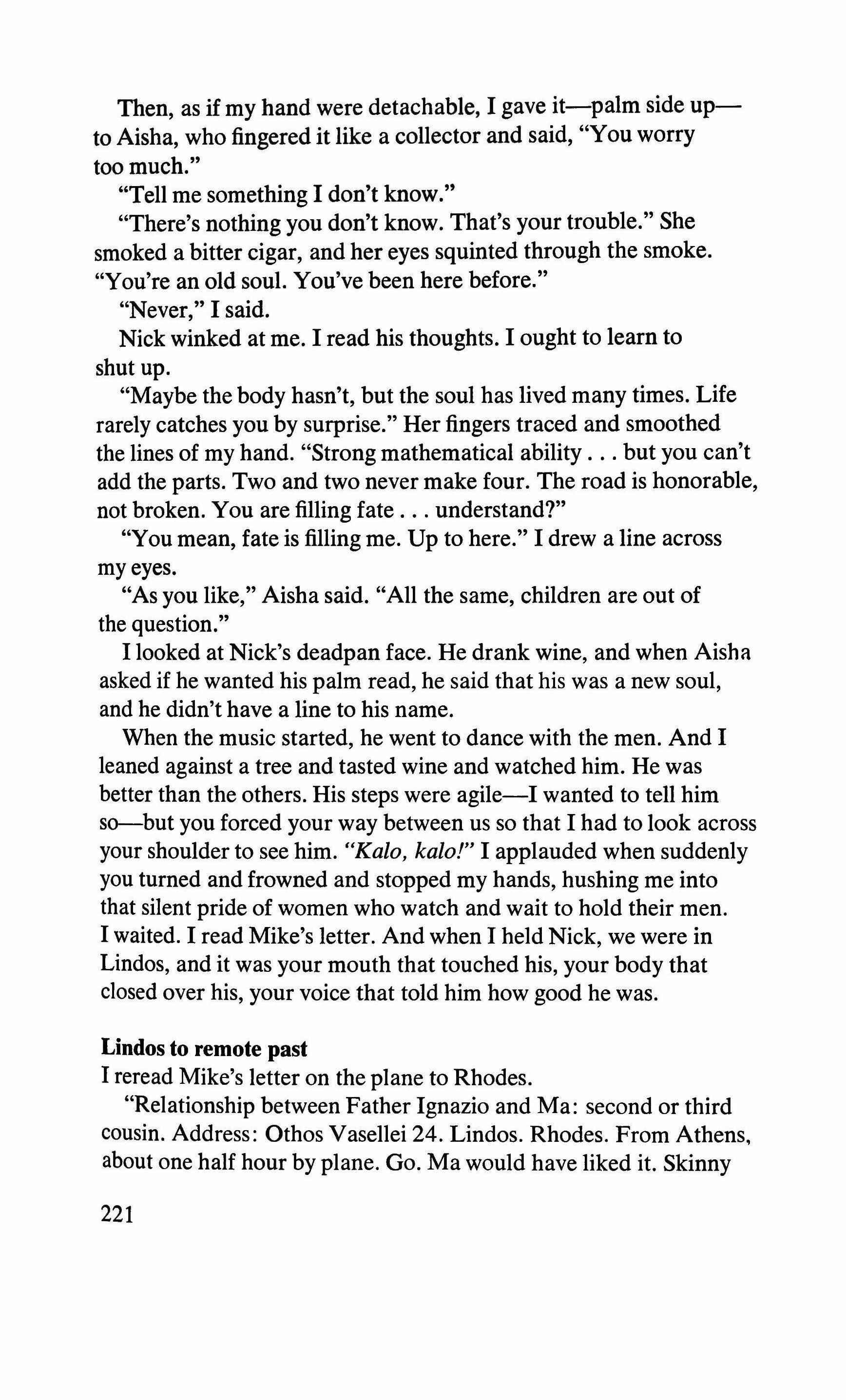
Then, as if my hand were detachable, I gave it-palm side upto Aisha, who fingered it like a collector and said, "You worry too much."
"Tell me something I don't know."
"There's nothing you don't know. That's your trouble." She smoked a bitter cigar, and her eyes squinted through the smoke. "You're an old soul. You've been here before."
"Never," I said.
Nick winked at me. I read his thoughts. I ought to learn to shut up.
"Maybe the body hasn't, but the soul has lived many times. Life rarely catches you by surprise." Her fingers traced and smoothed the lines of my hand. "Strong mathematical ability but you can't add the parts. Two and two never make four. The road is honorable, not broken. You are filling fate understand?"
"You mean, fate is filling me. Up to here." I drew a line across my eyes.
"As you like," Aisha said. "All the same, children are out of the question."
I looked at Nick's deadpan face. He drank wine, and when Aisha asked if he wanted his palm read, he said that his was a new soul, and he didn't have a line to his name.
When the music started, he went to dance with the men. And I leaned against a tree and tasted wine and watched him. He was better than the others. His steps were agile-I wanted to tell him so---but you forced your way between us so that I had to look across your shoulder to see him. "Kalo, kalo!" I applauded when suddenly you turned and frowned and stopped my hands, hushing me into that silent pride of women who watch and wait to hold their men.
I waited. I read Mike's letter. And when I held Nick, we were in Lindos, and it was your mouth that touched his, your body that closed over his, your voice that told him how good he was.
Lindos to remote past I reread Mike's letter on the plane to Rhodes.
"Relationship between Father Ignazio and Ma: second or third cousin. Address: Othos Vasellei 24. Lindos. Rhodes. From Athens, about one half hour by plane. Go. Ma would have liked it. Skinny
221
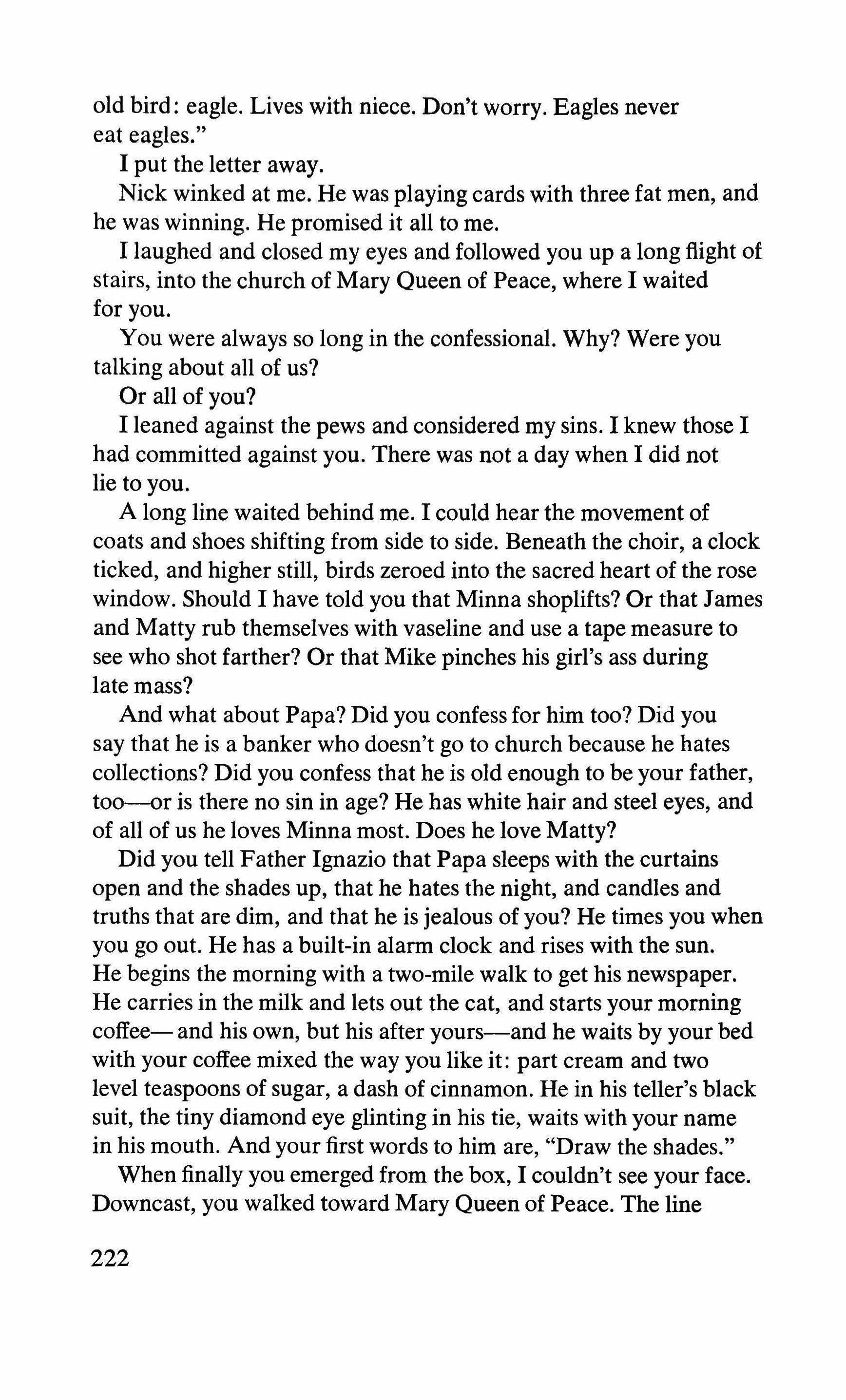
old bird: eagle. Lives with niece. Don't worry. Eagles never eat eagles."
I put the letter away.
Nick winked at me. He was playing cards with three fat men, and he was winning. He promised it all to me.
I laughed and closed my eyes and followed you up a long flight of stairs, into the church of Mary Queen of Peace, where I waited for you.
You were always so long in the confessional. Why? Were you talking about all of us?
Or all of you?
I leaned against the pews and considered my sins. I knew those I had committed against you. There was not a day when I did not lie to you.
A long line waited behind me. I could hear the movement of coats and shoes shifting from side to side. Beneath the choir, a clock ticked, and higher still, birds zeroed into the sacred heart of the rose window. Should I have told you that Minna shoplifts? Or that James and Matty rub themselves with vaseline and use a tape measure to see who shot farther? Or that Mike pinches his girl's ass during late mass?
And what about Papa? Did you confess for him too? Did you say that he is a banker who doesn't go to church because he hates collections? Did you confess that he is old enough to be your father, too--or is there no sin in age? He has white hair and steel eyes, and of all of us he loves Minna most. Does he love Matty?
Did you tell Father Ignazio that Papa sleeps with the curtains open and the shades up, that he hates the night, and candles and truths that are dim, and that he is jealous of you? He times you when you go out. He has a built-in alarm clock and rises with the sun. He begins the morning with a two-mile walk to get his newspaper. He carries in the milk and lets out the cat, and starts your morning coffee- and his own, but his after yours-and he waits by your bed with your coffee mixed the way you like it: part cream and two level teaspoons of sugar, a dash of cinnamon. He in his teller's black suit, the tiny diamond eye glinting in his tie, waits with your name in his mouth. And your first words to him are, "Draw the shades." When finally you emerged from the box, I couldn't see your face. Downcast, you walked toward Mary Queen of Peace. The line
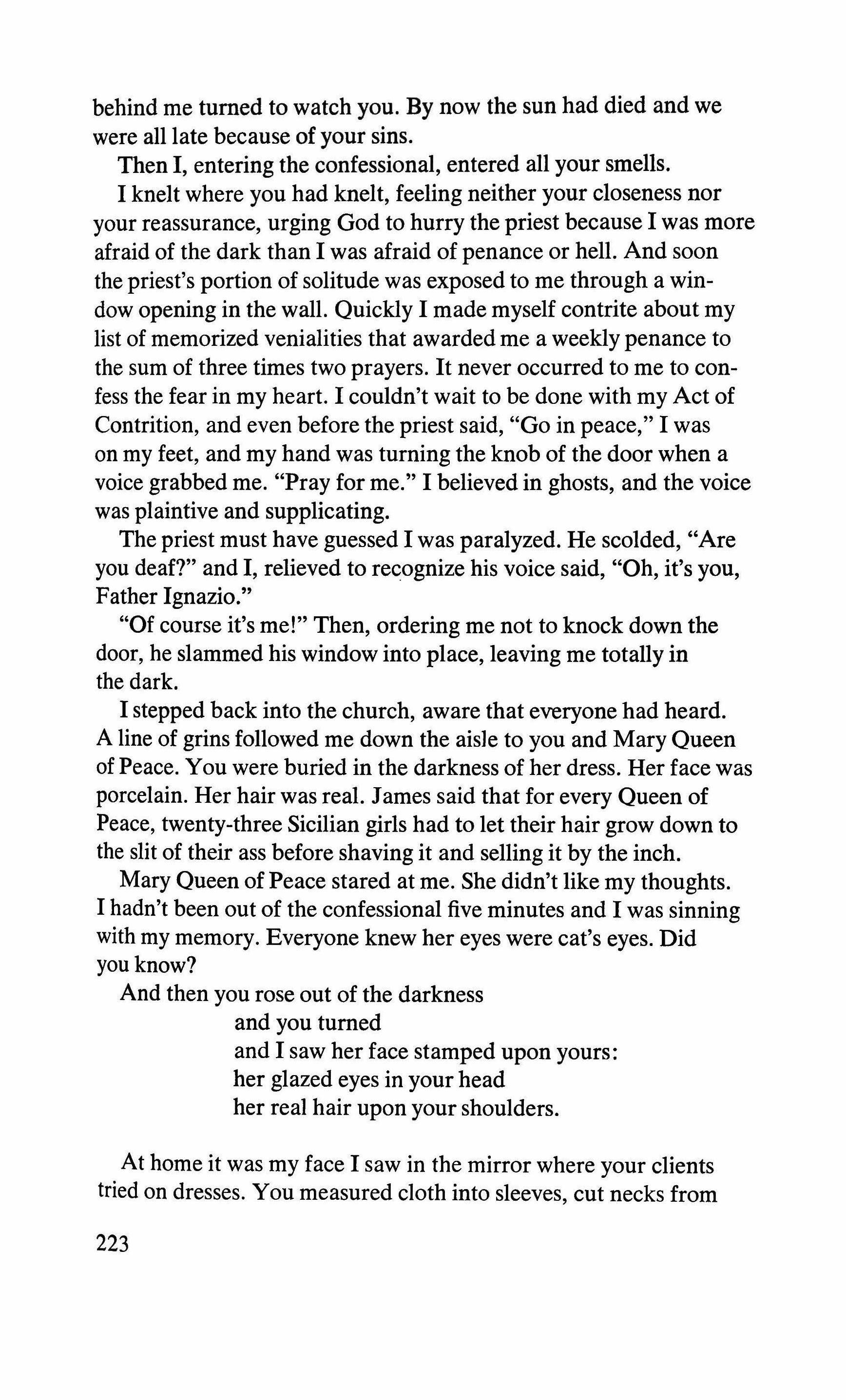
behind me turned to watch you. By now the sun had died and we were all late because of your sins.
Then I, entering the confessional, entered all your smells.
I knelt where you had knelt, feeling neither your closeness nor your reassurance, urging God to hurry the priest because I was more afraid of the dark than I was afraid of penance or hell. And soon the priest's portion of solitude was exposed to me through a window opening in the wall. Quickly I made myself contrite about my list of memorized venialities that awarded me a weekly penance to the sum of three times two prayers. It never occurred to me to confess the fear in my heart. I couldn't wait to be done with my Act of Contrition, and even before the priest said, "Go in peace," I was on my feet, and my hand was turning the knob of the door when a voice grabbed me. "Pray for me." I believed in ghosts, and the voice was plaintive and supplicating.
The priest must have guessed I was paralyzed. He scolded, "Are you deaf?" and I, relieved to recognize his voice said, "Oh, it's you, Father Ignazio."
"Of course it's me!" Then, ordering me not to knock down the door, he slammed his window into place, leaving me totally in the dark.
I stepped back into the church, aware that everyone had heard. A line of grins followed me down the ais1e to you and Mary Queen of Peace. You were buried in the darkness of her dress. Her face was porcelain. Her hair was real. James said that for every Queen of Peace, twenty-three Sicilian girls had to let their hair grow down to the slit of their ass before shaving it and selling it by the inch.
Mary Queen of Peace stared at me. She didn't like my thoughts. I hadn't been out of the confessional five minutes and I was sinning with my memory. Everyone knew her eyes were eat's eyes. Did you know?
And then you rose out of the darkness and you turned and I saw her face stamped upon yours: her glazed eyes in your head her real hair upon your shoulders.
At home it was my face I saw in the mirror where your clients tried on dresses. You measured cloth into sleeves, cut necks from

scarfs, and in between the severed sections of silk and satin bodies, I found my face, round, with steel eyes and platinum hair. I saw nothing of you in me.
I took yards of black velvet ribbon, braided them, and wore them for hair.
Matty stepped from behind me into the mirror. His face moved like a sun across the glass, above my shoulders, above my head. The straight ash hair, the steel eyes, and the ever-present smile marked him even then. He was older than Mike, and protective. But even then I knew that I would be protecting him all my life.
He said, "Know what?" and he whispered, "I heard her inviting him." He nodded, and his smile became deeper. "I heard Minna on the teley-phone."
"So?" I said.
"She thinks she'll marry him."
I said, "What do you think?"
"What do I think?" he said, losing himself in the question.
Then Volpone came in from the cold with snow on his white hair and goatee. He peeled off his scarf, looped it across the shoulders of your mannequin, and hung his coat over it. Then, dusting snow from his hair, he looked at you in ways my father never saw you.
You looked up from your sewing and your eyes told him I was in the mirror.
He rubbed his hands together, shook himself off like a wet fox, and turned away.
I saw the spats on his shoes walking into the mirror. He warmed his fingers against my face and asked me what he always asked me: whether I was a good student or a lazy student and whose child was I? My father's or my mother's?
His voice was gentle while his brutal fingers marked my cheeks. I broke away, letting him have the mirror to himself.
I watched him as I might have watched a calendar, checking off his visits-Monday, Wednesday, Friday. He combed his goatee and eyebrows and curled the ends of his mustache before giving James a music lesson. A lean, spindly man. His head kept time to the metronome. Papa took one look at him and walked away, and then he took another look at him and asked him to stay to supper, and Volpone always stayed.
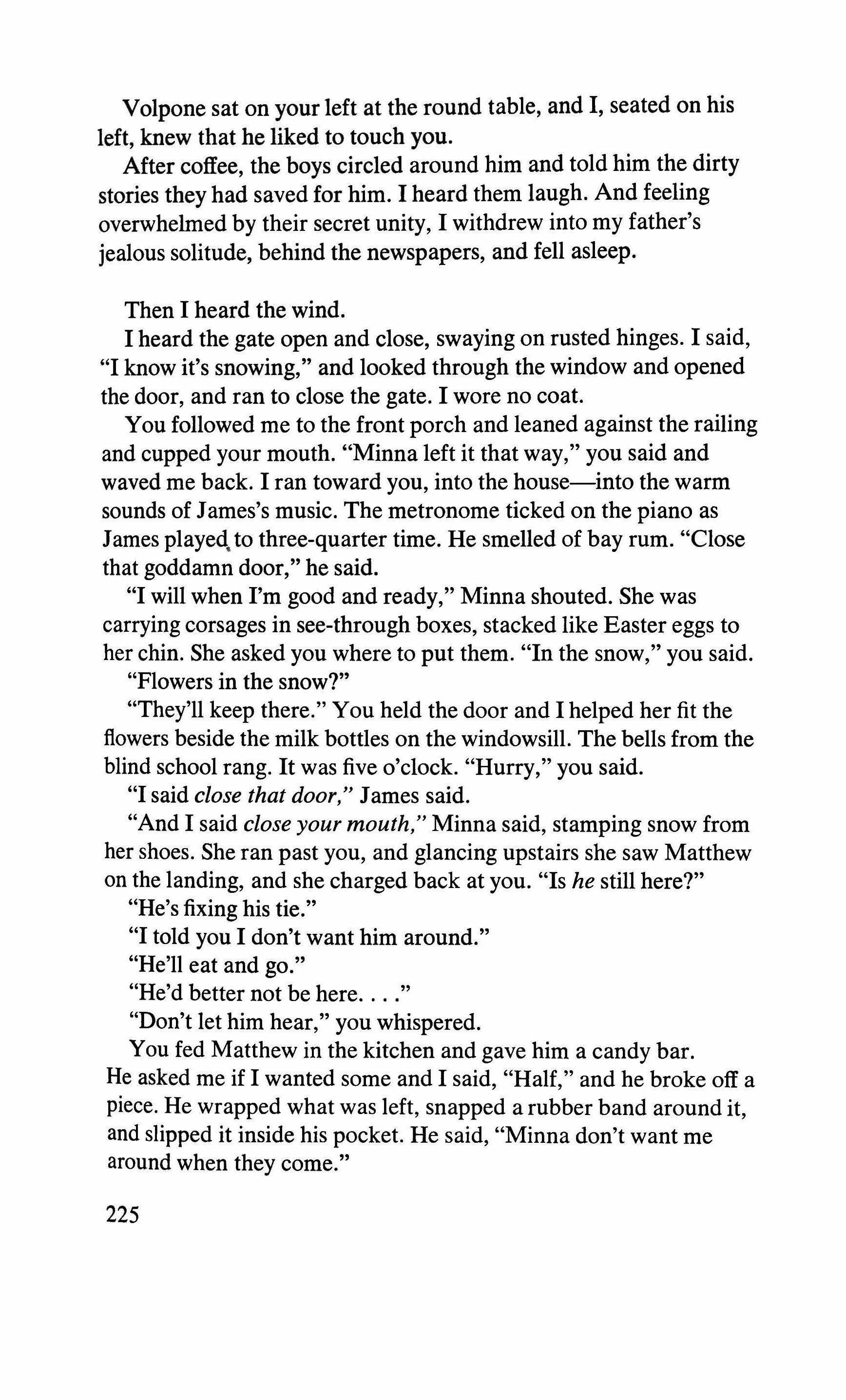
Volpone sat on your left at the round table, and I, seated on his left, knew that he liked to touch you.
After coffee, the boys circled around him and told him the dirty stories they had saved for him. I heard them laugh. And feeling overwhelmed by their secret unity, I withdrew into my father's jealous solitude, behind the newspapers, and fell asleep.
Then I heard the wind.
I heard the gate open and close, swaying on rusted hinges. I said, "I know it's snowing," and looked through the window and opened the door, and ran to close the gate. I wore no coat.
You followed me to the front porch and leaned against the railing and cupped your mouth. "Minna left it that way," you said and waved me back. I ran toward you, into the house-into the warm sounds of James's music. The metronome ticked on the piano as James played, to three-quarter time. He smelled of bay rum. "Close that goddamn door," he said.
"I will when I'm good and ready," Minna shouted. She was carrying corsages in see-through boxes, stacked like Easter eggs to her chin. She asked you where to put them. "In the snow," you said.
"Flowers in the snow?"
"They'll keep there. You held the door and I helped her fit the flowers beside the milk bottles on the windowsill. The bells from the blind school rang. It was five o'clock. "Hurry," you said.
"I said close that door," James said.
"And I said close your mouth," Minna said, stamping snow from her shoes. She ran past you, and glancing upstairs she saw Matthew on the landing, and she charged back at you. "Is he still here?"
"He's fixing his tie."
"I told you I don't want him around."
"He'll eat and go."
"He'd better not be here "
"Don't let him hear," you whispered. You fed Matthew in the kitchen and gave him a candy bar. He asked me if I wanted some and I said, "Half," and he broke off a piece. He wrapped what was left, snapped a rubber band around it, and slipped it inside his pocket. He said, "Minna don't want me around when they come."
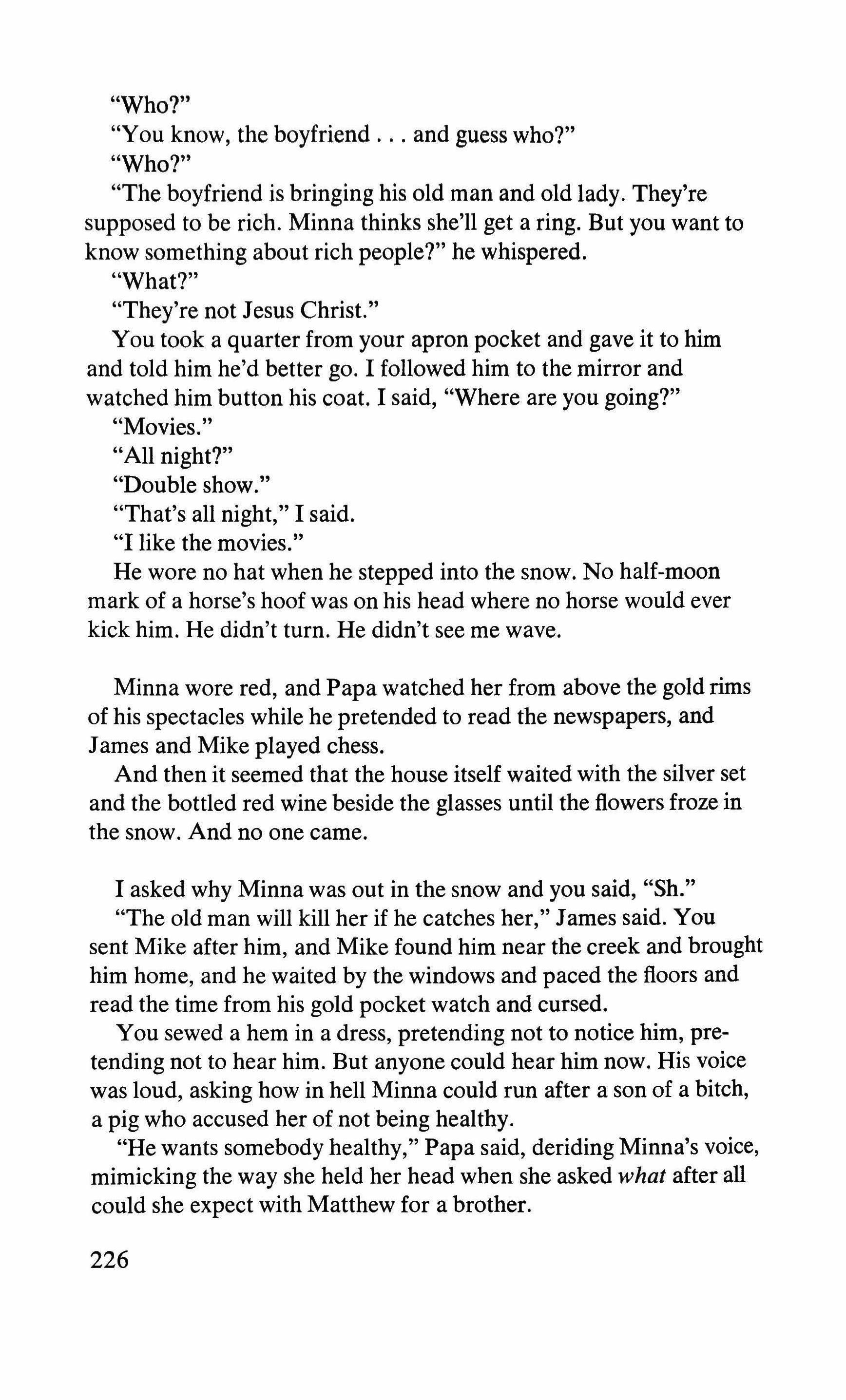
"Who?"
"You know, the boyfriend and guess who?"
"Who?"
"The boyfriend is bringing his old man and old lady. They're supposed to be rich. Minna thinks she'll get a ring. But you want to know something about rich people?" he whispered.
"What?"
"They're not Jesus Christ."
You took a quarter from your apron pocket and gave it to him and told him he'd better go. I followed him to the mirror and watched him button his coat. I said, "Where are you going?"
"Movies.
"All night?"
"Double show."
"That's all night," I said.
"I like the movies."
He wore no hat when he stepped into the snow. No half-moon mark of a horse's hoof was on his head where no horse would ever kick him. He didn't turn. He didn't see me wave.
Minna wore red, and Papa watched her from above the gold rims of his spectacles while he pretended to read the newspapers, and James and Mike played chess.
And then it seemed that the house itself waited with the silver set and the bottled red wine beside the glasses until the flowers froze in the snow. And no one came.
I asked why Minna was out in the snow and you said, "Sh."
"The old man will kill her if he catches her," James said. You sent Mike after him, and Mike found him near the creek and brought him home, and he waited by the windows and paced the floors and read the time from his gold pocket watch and cursed.
You sewed a hem in a dress, pretending not to notice him, pretending not to hear him. But anyone could hear him now. His voice was loud, asking how in hell Minna could run after a son of a bitch, a pig who accused her of not being healthy.
"He wants somebody healthy," Papa said, deriding Minna's voice, mimicking the way she held her head when she asked what after all could she expect with Matthew for a brother.
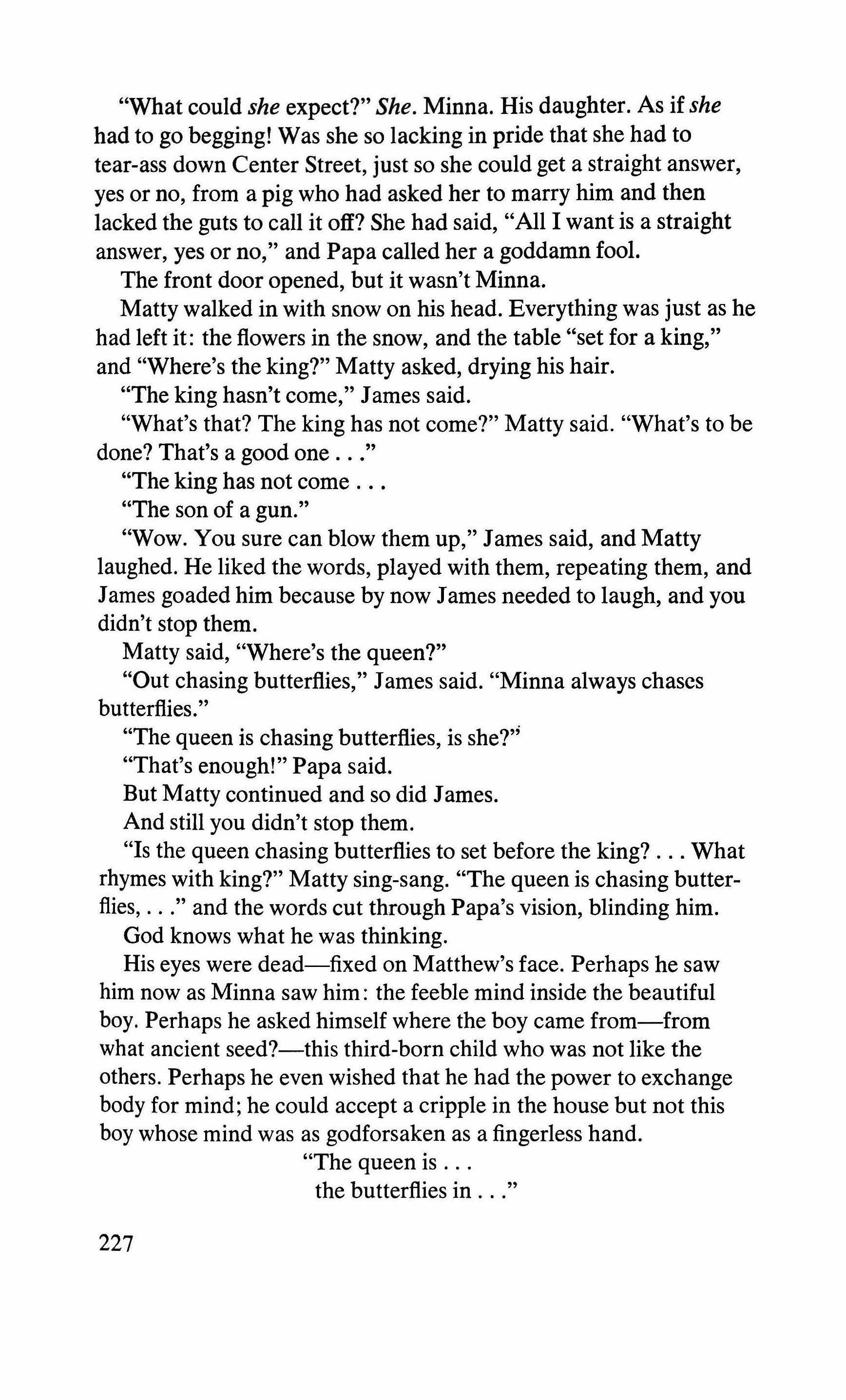
"What could she expect?" She. Minna. His daughter. As if she had to go begging! Was she so lacking in pride that she had to tear-ass down Center Street, just so she could get a straight answer, yes or no, from a pig who had asked her to marry him and then lacked the guts to call it off? She had said, "All I want is a straight answer, yes or no," and Papa called her a goddamn fool.
The front door opened, but it wasn't Minna.
Matty walked in with snow on his head. Everything was just as he had left it: the flowers in the snow, and the table "set for a king," and "Where's the king?" Matty asked, drying his hair.
"The king hasn't come," James said.
"What's that? The king has not come?" Matty said. "What's to be done? That's a good one
"The king has not come
"The son of a gun."
"Wow. You sure can blow them up," James said, and Matty laughed. He liked the words, played with them, repeating them, and James goaded him because by now James needed to laugh, and you didn't stop them.
Matty said, "Where's the queen?"
"Out chasing butterflies," James said. "Minna always chases butterflies."
"The queen is chasing butterflies, is she?';
"That's enough!" Papa said.
But Matty continued and so did James.
And still you didn't stop them.
"Is the queen chasing butterflies to set before the king? What rhymes with king?" Matty sing-sang. "The queen is chasing butterflies, and the words cut through Papa's vision, blinding him.
God knows what he was thinking.
His eyes were dead-fixed on Matthew's face. Perhaps he saw him now as Minna saw him: the feeble mind inside the beautiful boy. Perhaps he asked himself where the boy came from-from what ancient seed?-this third-born child who was not like the others. Perhaps he even wished that he had the power to exchange body for mind; he could accept a cripple in the house but not this boy whose mind was as godforsaken as a fingerless hand.
"The queen is the butterflies in
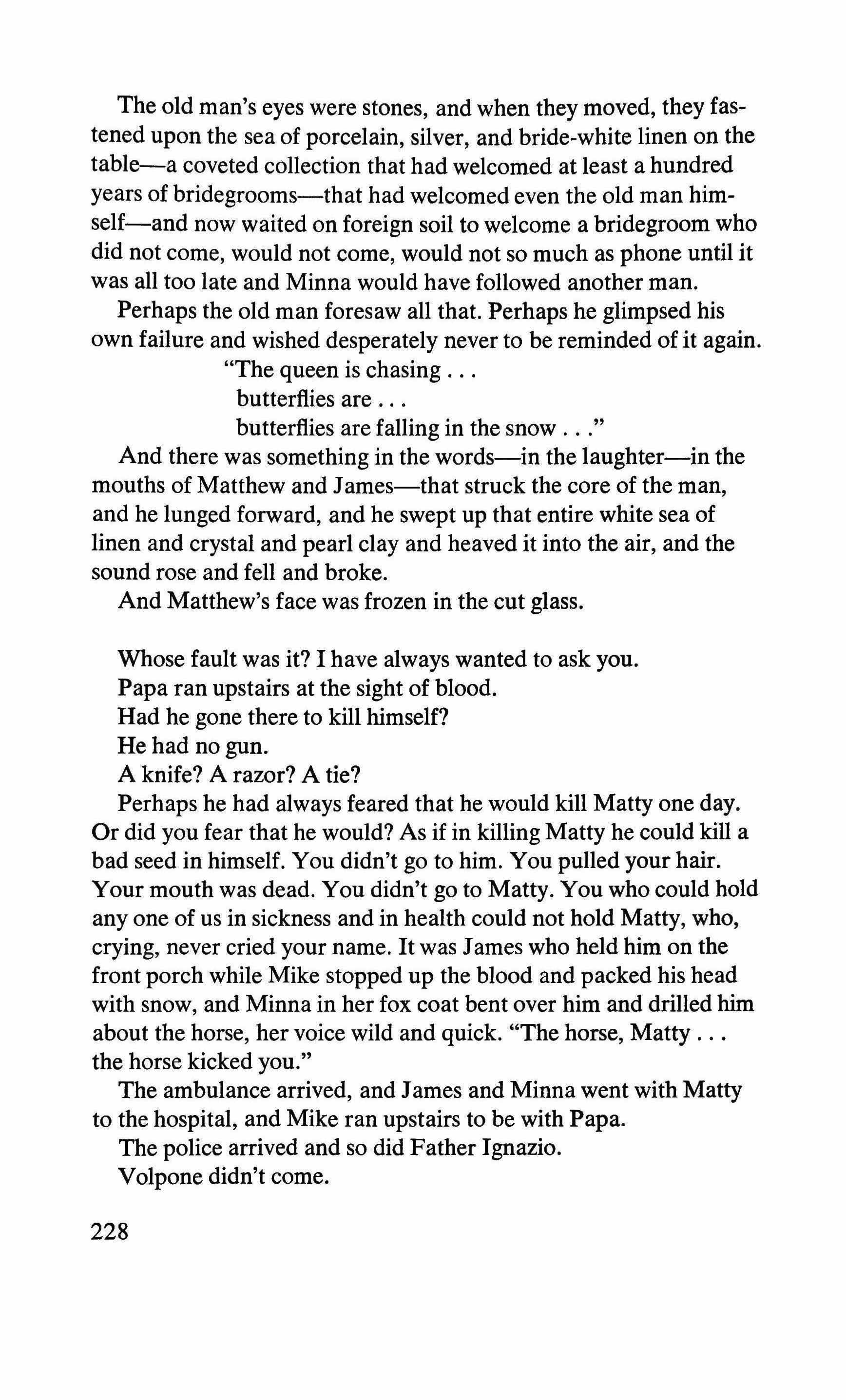
The old man's eyes were stones, and when they moved, they fastened upon the sea of porcelain, silver, and bride-white linen on the table-a coveted collection that had welcomed at least a hundred years of bridegrooms-that had welcomed even the old man himself-and now waited on foreign soil to welcome a bridegroom who did not come, would not come, would not so much as phone until it was all too late and Minna would have followed another man.
Perhaps the old man foresaw all that. Perhaps he glimpsed his own failure and wished desperately never to be reminded of it again.
"The queen is chasing butterflies are butterflies are falling in the snow
And there was something in the words-in the laughter-in the mouths of Matthew and James-that struck the core of the man, and he lunged forward, and he swept up that entire white sea of linen and crystal and pearl clay and heaved it into the air, and the sound rose and fell and broke.
And Matthew's face was frozen in the cut glass.
Whose fault was it? I have always wanted to ask you.
Papa ran upstairs at the sight of blood.
Had he gone there to kill himself?
He had no gun.
A knife? A razor? A tie?
Perhaps he had always feared that he would kill Matty one day. Or did you fear that he would? As if in killing Matty he could kill a bad seed in himself. You didn't go to him. You pulled your hair. Your mouth was dead. You didn't go to Matty. You who could hold anyone of us in sickness and in health could not hold Matty, who, crying, never cried your name. It was James who held him on the front porch while Mike stopped up the blood and packed his head with snow, and Minna in her fox coat bent over him and drilled him about the horse, her voice wild and quick. "The horse, Matty the horse kicked you."
The ambulance arrived, and James and Minna went with Matty to the hospital, and Mike ran upstairs to be with Papa.
The police arrived and so did Father Ignazio.
Volpone didn't come.
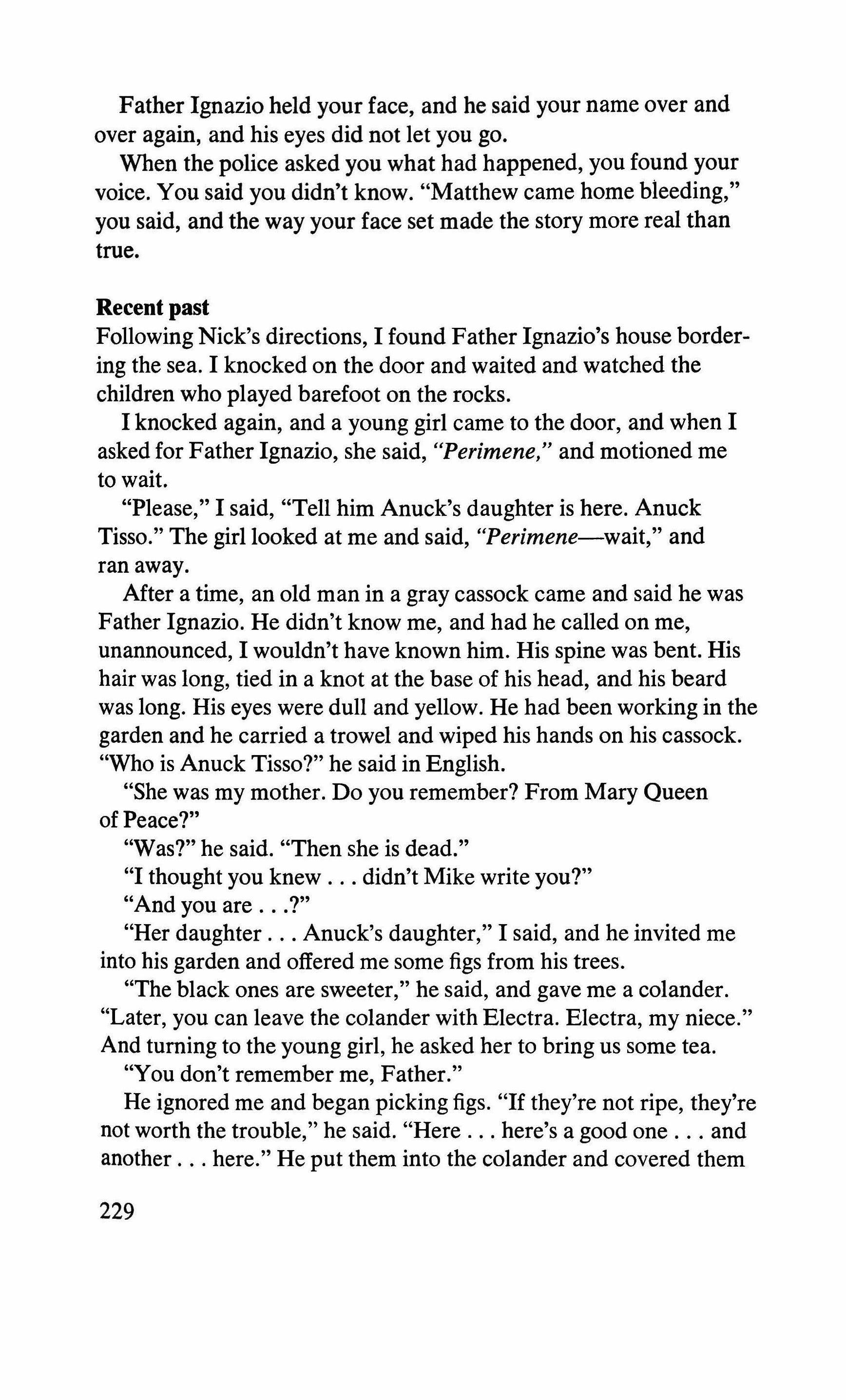
Father Ignazio held your face, and he said your name over and over again, and his eyes did not let you go.
When the police asked you what had happened, you found your voice. You said you didn't know. "Matthew came home bleeding," you said, and the way your face set made the story more real than true.
Following Nick's directions, I found Father Ignazio's house bordering the sea. I knocked on the door and waited and watched the children who played barefoot on the rocks.
I knocked again, and a young girl came to the door, and when I asked for Father Ignazio, she said, "Perimene," and motioned me to wait.
"Please," I said, "Tell him Anuck's daughter is here. Anuck Tisso." The girl looked at me and said, "Perimene-wait," and ran away.
After a time, an old man in a gray cassock came and said he was Father Ignazio. He didn't know me, and had he called on me, unannounced, I wouldn't have known him. His spine was bent. His hair was long, tied in a knot at the base of his head, and his beard was long. His eyes were dull and yellow. He had been working in the garden and he carried a trowel and wiped his hands on his cassock.
"Who is Anuck Tisso?" he said in English.
"She was my mother. Do you remember? From Mary Queen of Peace?"
"Was?" he said. "Then she is dead."
"I thought you knew didn't Mike write you?"
"And you are ?"
"Her daughter
Anuck's daughter," 1 said, and he invited me into his garden and offered me some figs from his trees.
"The black ones are sweeter," he said, and gave me a colander. "Later, you can leave the colander with Electra. Electra, my niece." And turning to the young girl, he asked her to bring us some tea.
"You don't remember me, Father."
He ignored me and began picking figs. "If they're not ripe, they're not worth the trouble," he said. "Here here's a good one and another here." He put them into the colander and covered them 229
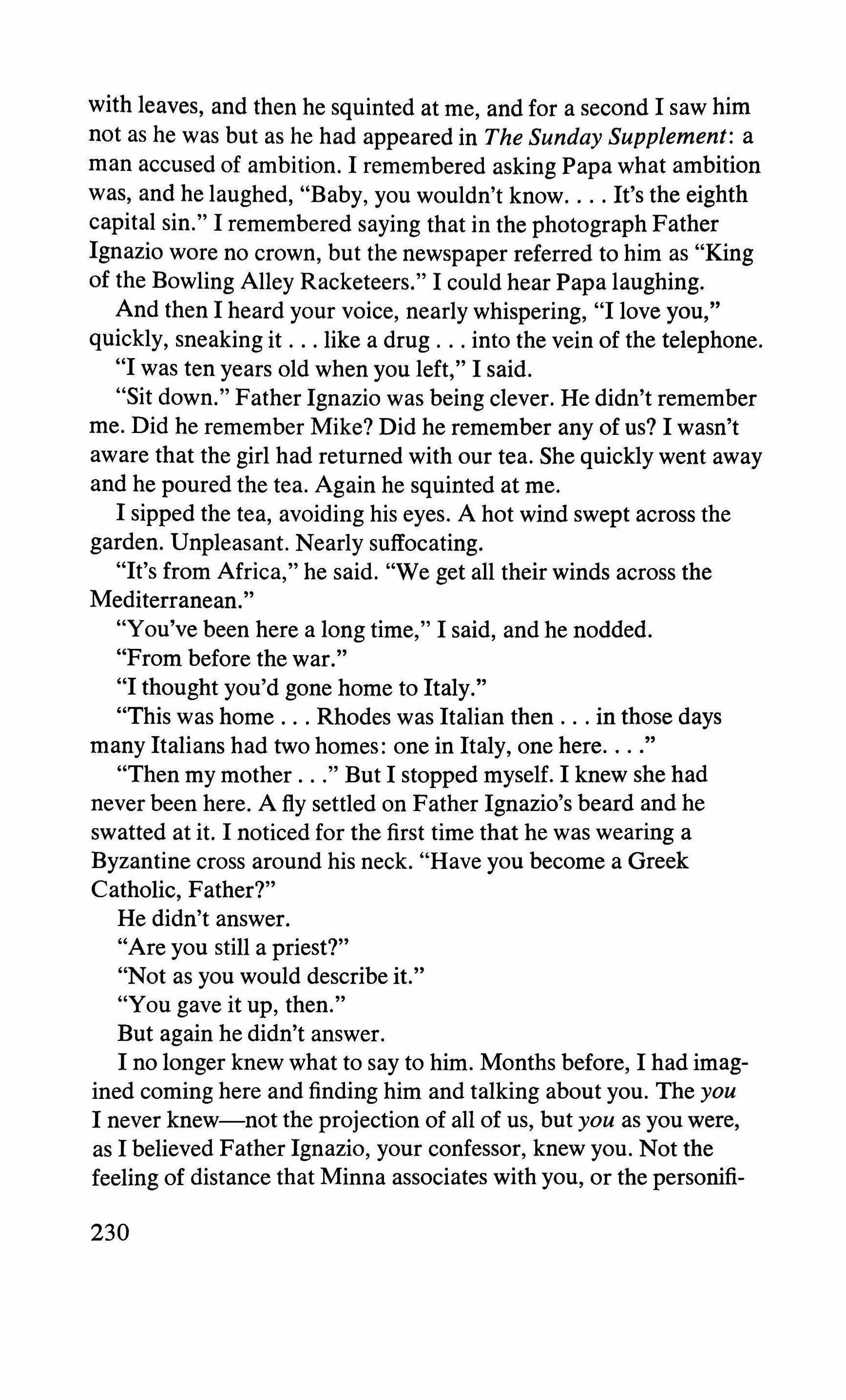
with leaves, and then he squinted at me, and for a second I saw him not as he was but as he had appeared in The Sunday Supplement: a man accused of ambition. I remembered asking Papa what ambition was, and he laughed, "Baby, you wouldn't know It's the eighth capital sin." I remembered saying that in the photograph Father Ignazio wore no crown, but the newspaper referred to him as "King of the Bowling Alley Racketeers." I could hear Papa laughing.
And then I heard your voice, nearly whispering, "I love you," quickly, sneaking it like a drug into the vein of the telephone.
"I was ten years old when you left," I said.
"Sit down." Father Ignazio was being clever. He didn't remember me. Did he remember Mike? Did he remember any of us? I wasn't aware that the girl had returned with our tea. She quickly went away and he poured the tea. Again he squinted at me.
I sipped the tea, avoiding his eyes. A hot wind swept across the garden. Unpleasant. Nearly suffocating.
"It's from Africa," he said. "We get all their winds across the Mediterranean.
"You've been here a long time," I said, and he nodded.
"From before the war."
"I thought you'd gone home to Italy."
"This was home Rhodes was Italian then in those days many Italians had two homes: one in Italy, one here
"Then my mother But I stopped myself. I knew she had never been here. A fly settled on Father Ignazio's beard and he swatted at it. I noticed for the first time that he was wearing a Byzantine cross around his neck. "Have you become a Greek Catholic, Father?"
He didn't answer.
"Are you still a priest?"
"Not as you would describe it."
"You gave it up, then."
But again he didn't answer.
I no longer knew what to say to him. Months before, I had imagined coming here and finding him and talking about you. The you I never knew-not the projection of all of us, but you as you were, as I believed Father Ignazio, your confessor, knew you. Not the feeling of distance that Minna associates with you, or the personifi-

cation of sacrifice that you represent for James. No two of us share a common memory of you. Mike remembers a practical woman. I remember a mystic. Only Matthew remembers love. Who were you? I wanted to ask.
I wanted to ask Father Ignazio about Matthew too, but I was afraid that he would lean forward in his chair and ask, "Who is Matthew?"
What would I have said then? That Matthew is everyone of us? That none of us can speak openly about him? I wondered if you had spoken about him to Father Ignazio-you who had saved Matthew's take-home pay and then given the whole sum to James to use as capital for the music store. You who never raised a finger when James wouldn't hire Matthew. He wouldn't keep Matty there for a minute, not even to sweep the place.
I put my cup on the table. It was empty.
I had come here looking for something I couldn't name. It was clear that Father Ignazio didn't remember me. Did he remember you? Did he remember stopping to see you-as he had stopped to see the others-seeing you last, and longest? I didn't ask. The last time I saw him with you, you were ill. I opened the door for him and he walked into your room. He brought you the Sacrament. I closed the door behind him and waited, trying to listen. Minutes later, he opened the door and chased me away by just looking at me.
Now he was filling my cup and offering me some Turkish paste, and I was a stranger to him. I was sorry that Mike had suggested that I come here. I drank the tea and then Father Ignazio asked if I wished to see the house.
I said that I didn't want to disturb him, but he led the way and I followed to the end of the garden and into a large room lined with books. There was a piano. Someone had been playing Vivaldi.
The shelves behind the piano contained music scores, mostly of Vivaldi. I looked more closely. Beethoven and Schumann were not among them.
"Look around, look," he said, distracting me as if there were something I must not see.
There were photographs on one shelf faces like his, long with long noses and dull eyes. No one looked like you. I touched one of them, and he pointed at my hand and said, "That ring."
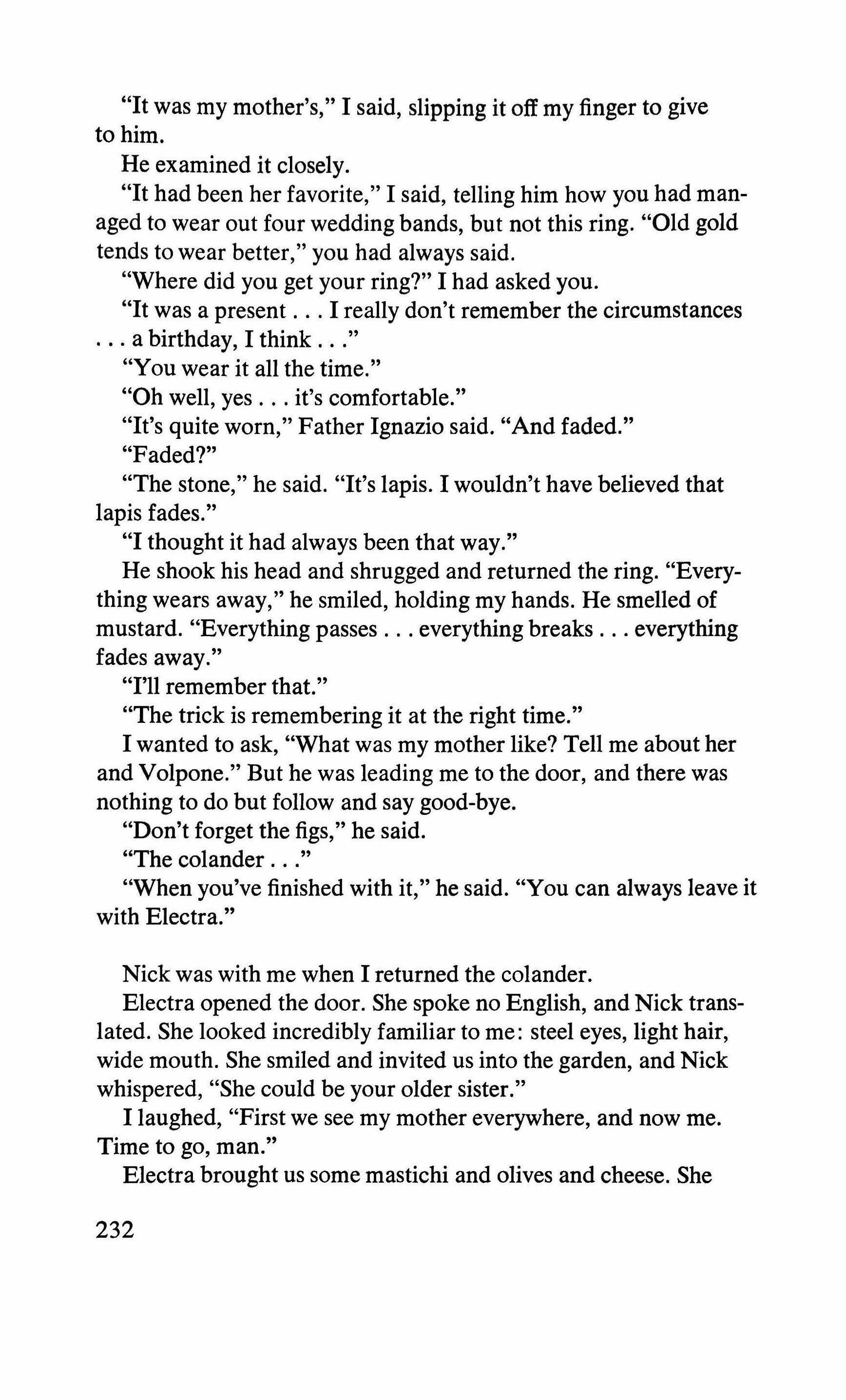
"It was my mother's," I said, slipping it off my finger to give to him.
He examined it closely.
"It had been her favorite," I said, telling him how you had managed to wear out four wedding bands, but not this ring. "Old gold tends to wear better," you had always said.
"Where did you get your ring?" I had asked you.
"It was a present I really don't remember the circumstances a birthday, I think "
"You wear it all the time."
"Oh well, yes it's comfortable."
"It's quite worn," Father Ignazio said. "And faded."
"Faded?"
"The stone," he said. "It's lapis. I wouldn't have believed that lapis fades."
"I thought it had always been that way."
He shook his head and shrugged and returned the ring. "Everything wears away," he smiled, holding my hands. He smelled of mustard. "Everything passes everything breaks everything fades away."
"I'll remember that."
"The trick is remembering it at the right time."
I wanted to ask, "What was my mother like? Tell me about her and Volpone." But he was leading me to the door, and there was nothing to do but follow and say good-bye.
"Don't forget the figs," he said.
"The colander
"When you've finished with it," he said. "You can always leave it with Electra."
Nick was with me when I returned the colander.
Electra opened the door. She spoke no English, and Nick translated. She looked incredibly familiar to me: steel eyes, light hair, wide mouth. She smiled and invited us into the garden, and Nick whispered, "She could be your older sister."
I laughed, "First we see my mother everywhere, and now me. Time to go, man."
Electra brought us some mastichi and olives and cheese. She
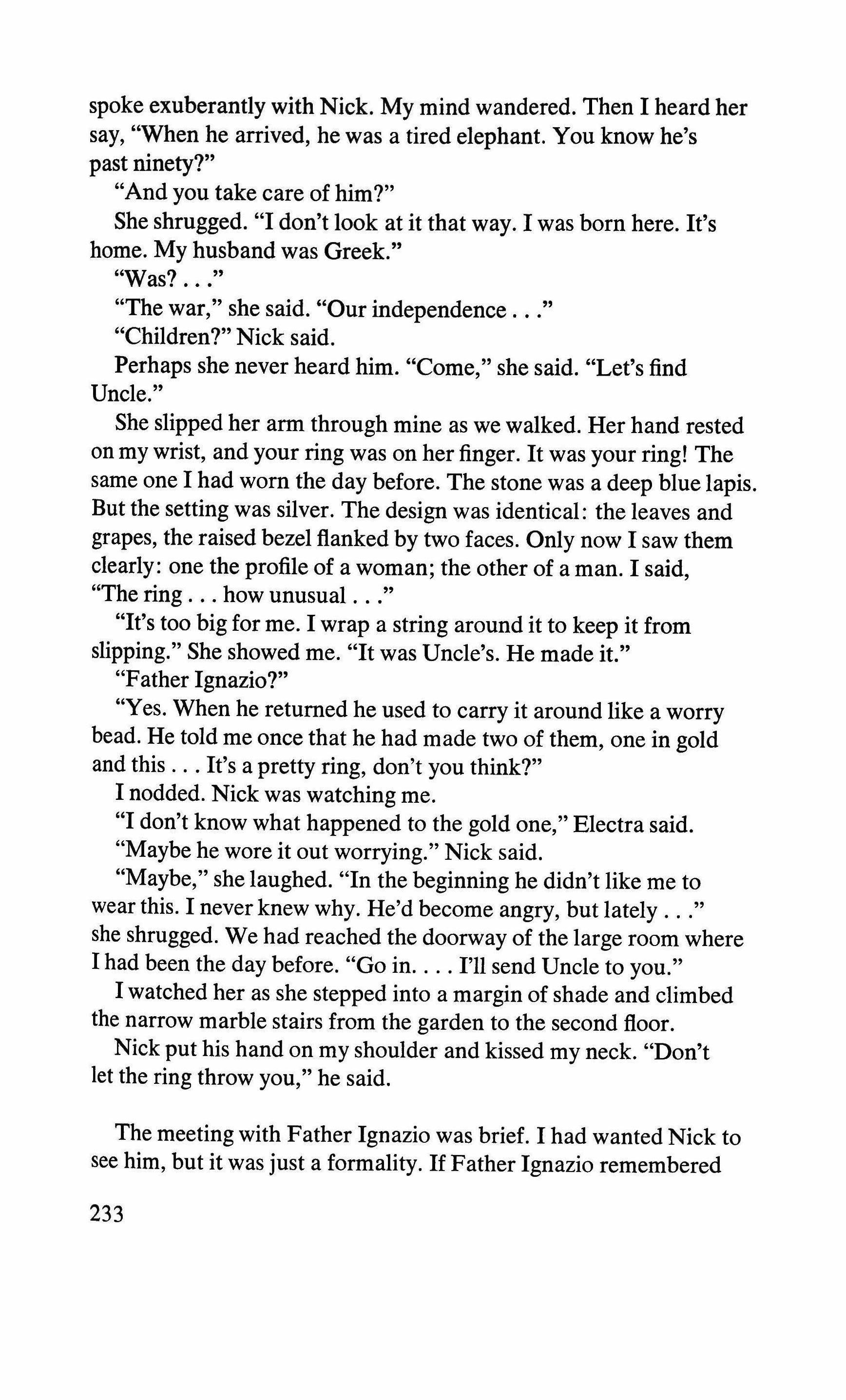
spoke exuberantly with Nick. My mind wandered. Then I heard her say, "When he arrived, he was a tired elephant. You know he's past ninety?"
"And you take care of him?"
She shrugged. "I don't look at it that way. I was born here. It's home. My husband was Greek."
"Was?
"The war," she said. "Our independence " "Children?" Nick said.
Perhaps she never heard him. "Come," she said. "Let's find Uncle."
She slipped her arm through mine as we walked. Her hand rested on my wrist, and your ring was on her finger. It was your ring! The same one I had worn the day before. The stone was a deep blue lapis. But the setting was silver. The design was identical: the leaves and grapes, the raised bezel flanked by two faces. Only now I saw them clearly: one the profile of a woman; the other of a man. I said, "The ring how unusual
"It's too big for me. I wrap a string around it to keep it from slipping." She showed me. "It was Uncle's. He made it."
"Father Ignazio?"
"Yes. When he returned he used to carry it around like a worry bead. He told me once that he had made two of them, one in gold and this It's a pretty ring, don't you think?"
I nodded. Nick was watching me.
"I don't know what happened to the gold one," Electra said. "Maybe he wore it out worrying." Nick said. "Maybe," she laughed. "In the beginning he didn't like me to wear this. I never knew why. He'd become angry, but lately she shrugged. We had reached the doorway of the large room where I had been the day before. "Go in I'll send Uncle to you."
I watched her as she stepped into a margin of shade and climbed the narrow marble stairs from the garden to the second floor.
Nick put his hand on my shoulder and kissed my neck. "Don't let the ring throw you," he said.
The meeting with Father Ignazio was brief. I had wanted Nick to see him, but it was just a formality. If Father Ignazio remembered 233
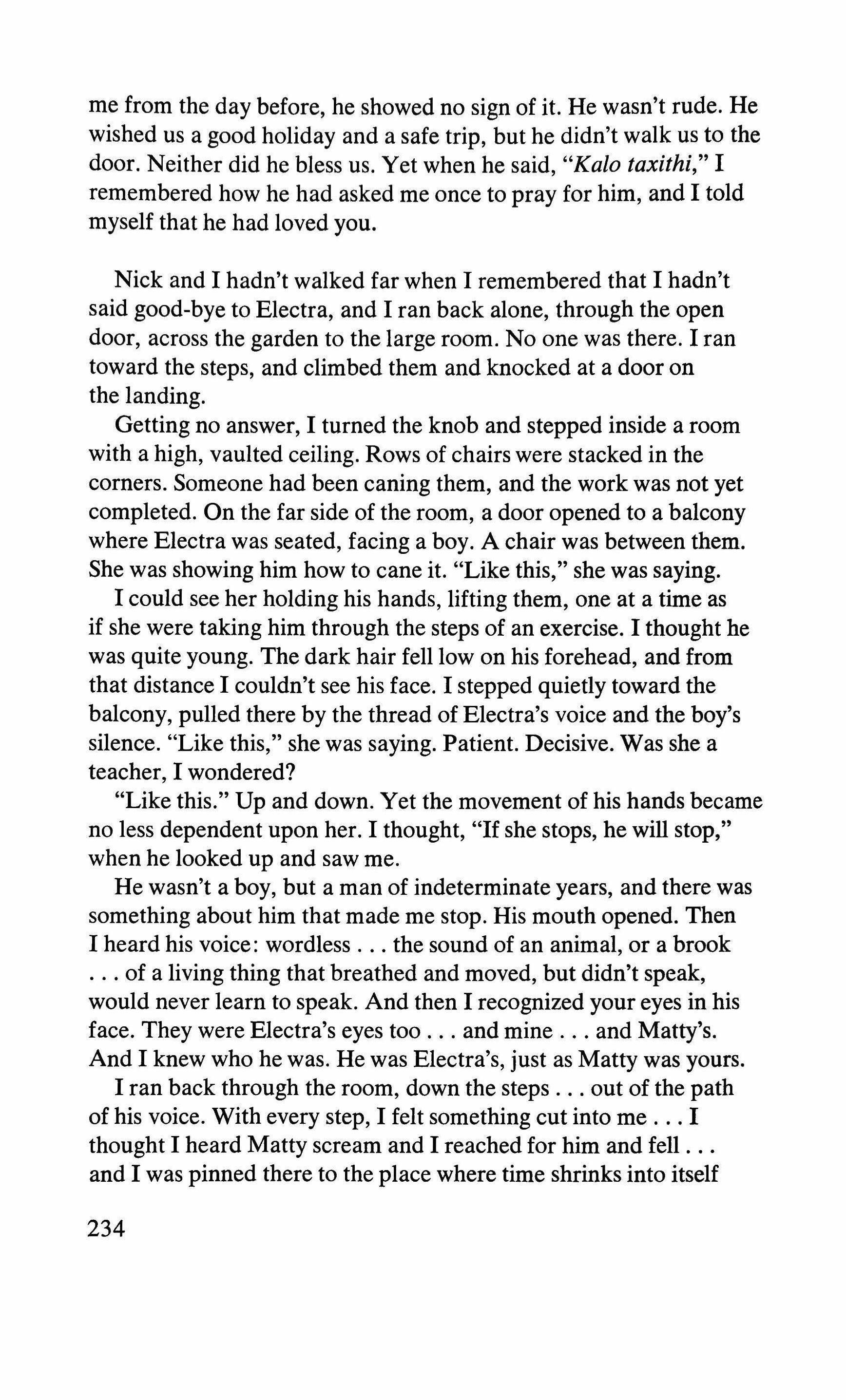
me from the day before, he showed no sign of it. He wasn't rude. He wished us a good holiday and a safe trip, but he didn't walk us to the door. Neither did he bless us. Yet when he said, "Kalo taxithi," I remembered how he had asked me once to pray for him, and I told myself that he had loved you.
Nick and I hadn't walked far when I remembered that I hadn't said good-bye to Electra, and I ran back alone, through the open door, across the garden to the large room. No one was there. I ran toward the steps, and climbed them and knocked at a door on the landing.
Getting no answer, I turned the knob and stepped inside a room with a high, vaulted ceiling. Rows of chairs were stacked in the corners. Someone had been caning them, and the work was not yet completed. On the far side of the room, a door opened to a balcony where Electra was seated, facing a boy. A chair was between them. She was showing him how to cane it. "Like this," she was saying. I could see her holding his hands, lifting them, one at a time as if she were taking him through the steps of an exercise. I thought he was quite young. The dark hair fell low on his forehead, and from that distance I couldn't see his face. I stepped quietly toward the balcony, pulled there by the thread of Electra's voice and the boy's silence. "Like this," she was saying. Patient. Decisive. Was she a teacher, I wondered?
"Like this." Up and down. Yet the movement of his hands became no less dependent upon her. I thought, "If she stops, he will stop," when he looked up and saw me.
He wasn't a boy, but a man of indeterminate years, and there was something about him that made me stop. His mouth opened. Then I heard his voice: wordless the sound of an animal, or a brook of a living thing that breathed and moved, but didn't speak, would never learn to speak. And then I recognized your eyes in his face. They were Electra's eyes too and mine and Matty's. And I knew who he was. He was Electra's, just as Matty was yours. I ran back through the room, down the steps out of the path of his voice. With every step, I felt something cut into me I thought I heard Matty scream and I reached for him and fell and I was pinned there to the place where time shrinks into itself
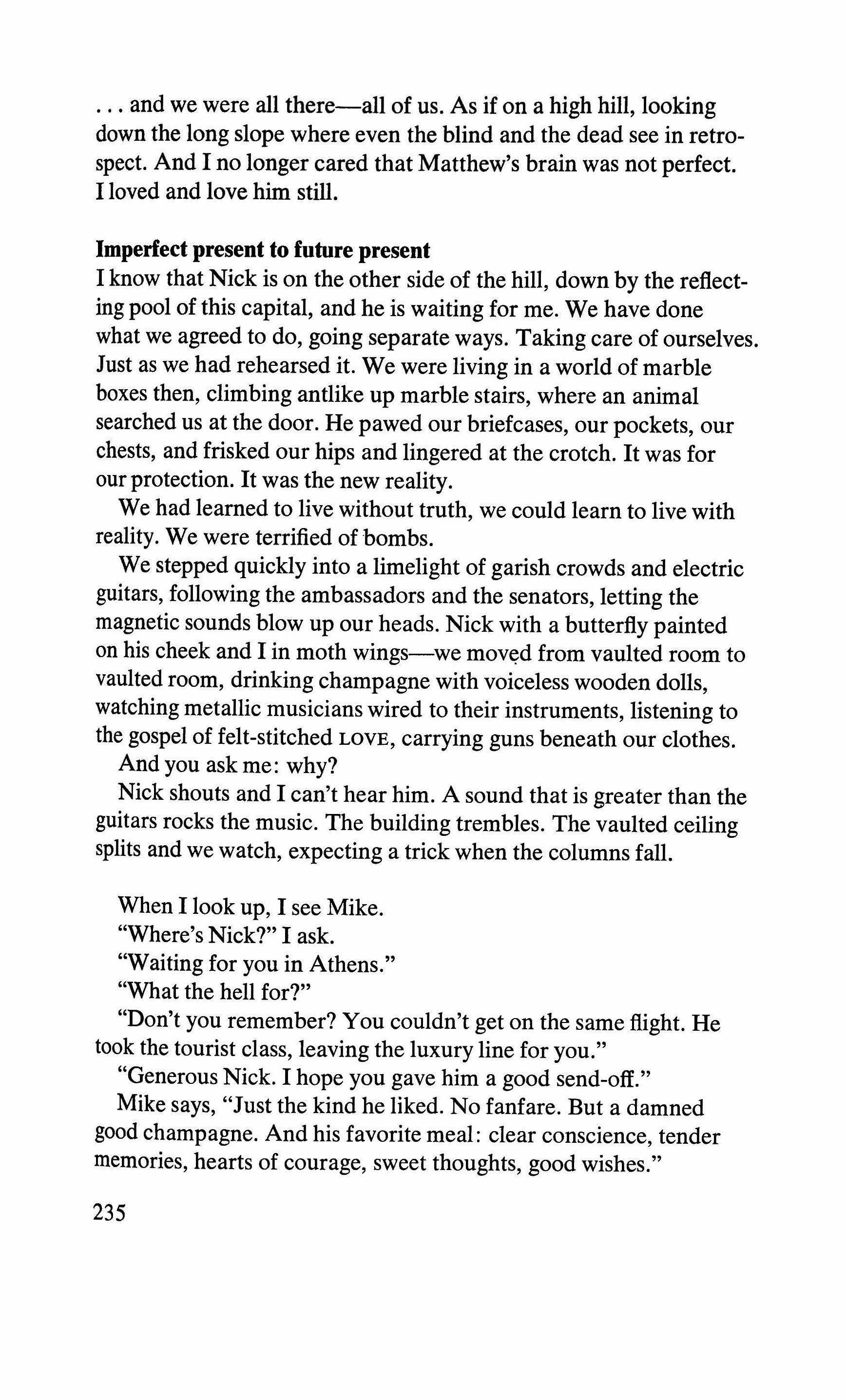
and we were all there-all of us. As if on a high hill, looking down the long slope where even the blind and the dead see in retrospect. And I no longer cared that Matthew's brain was not perfect. I loved and love him still.
Imperfect present to future present
I know that Nick is on the other side of the hill, down by the reflecting pool of this capital, and he is waiting for me. We have done what we agreed to do, going separate ways. Taking care of ourselves. Just as we had rehearsed it. We were living in a world of marble boxes then, climbing antlike up marble stairs, where an animal searched us at the door. He pawed our briefcases, our pockets, our chests, and frisked our hips and lingered at the crotch. It was for our protection. It was the new reality.
We had learned to live without truth, we could learn to live with reality. We were terrified of bombs.
We stepped quickly into a limelight of garish crowds and electric guitars, following the ambassadors and the senators, letting the magnetic sounds blow up our heads. Nick with a butterfly painted on his cheek and I in moth wings-we moved from vaulted room to vaulted room, drinking champagne with voiceless wooden dolls, watching metallic musicians wired to their instruments, listening to the gospel of felt-stitched LOVE, carrying guns beneath our clothes.
And you ask me: why?
Nick shouts and I can't hear him. A sound that is greater than the guitars rocks the music. The building trembles. The vaulted ceiling splits and we watch, expecting a trick when the columns fall.
When I look up, I see Mike.
"Where's Nick?" I ask.
"Waiting for you in Athens."
"What the hell for?"
"Don't you remember? You couldn't get on the same flight. He took the tourist class, leaving the luxury line for you."
"Generous Nick. I hope you gave him a good send-off."
Mike says, "Just the kind he liked. No fanfare. But a damned good champagne. And his favorite meal: clear conscience, tender memories, hearts of courage, sweet thoughts, good wishes."
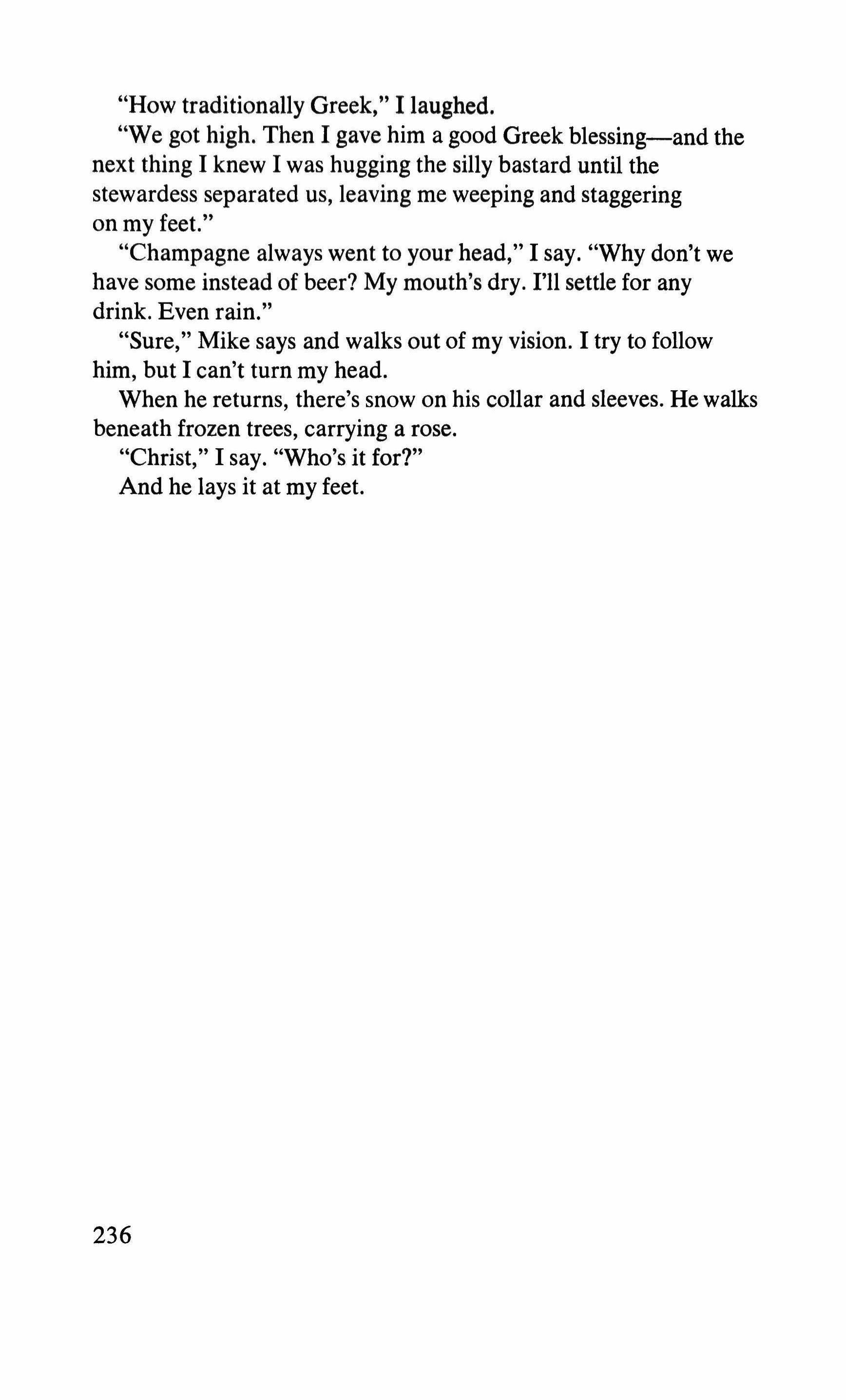
"How traditionally Greek," I laughed. "We got high. Then I gave him a good Greek blessing-and the next thing I knew I was hugging the silly bastard until the stewardess separated us, leaving me weeping and staggering on my feet."
"Champagne always went to your head," I say. "Why don't we have some instead of beer? My mouth's dry. I'll settle for any drink. Even rain."
"Sure," Mike says and walks out of my vision. I try to follow him, but I can't turn my head.
When he returns, there's snow on his collar and sleeves. He walks beneath frozen trees, carrying a rose.
"Christ," I say. "Who's it for?"
And he lays it at my feet.
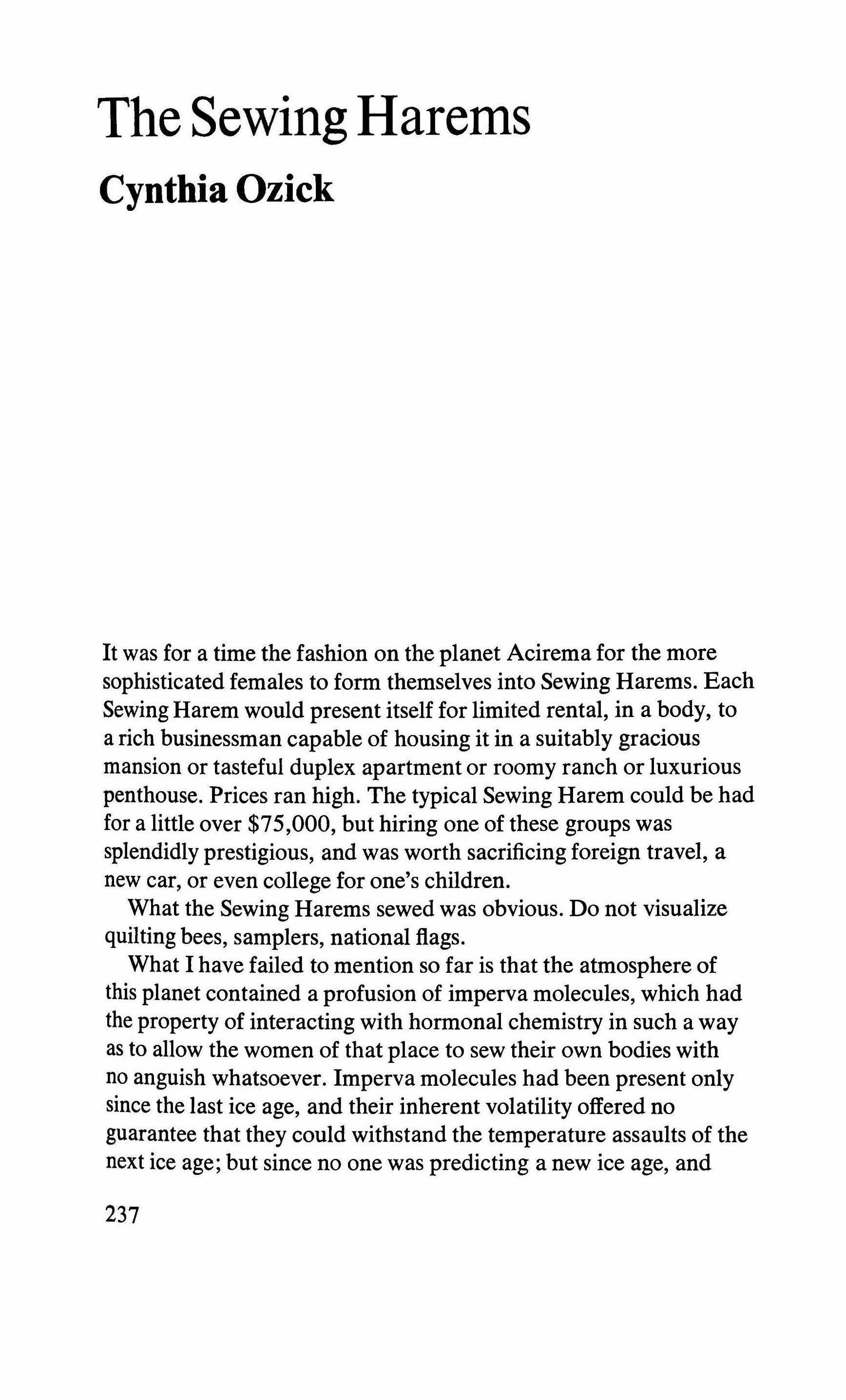
It was for a time the fashion on the planet Acirema for the more sophisticated females to form themselves into Sewing Harems. Each Sewing Harem would present itself for limited rental, in a body, to a rich businessman capable of housing it in a suitably gracious mansion or tasteful duplex apartment or roomy ranch or luxurious penthouse. Prices ran high. The typical Sewing Harem could be had for a little over $75,000, but hiring one of these groups was splendidly prestigious, and was worth sacrificing foreign travel, a new car, or even college for one's children.
What the Sewing Harems sewed was obvious. Do not visualize quilting bees, samplers, national flags.
What I have failed to mention so far is that the atmosphere of this planet contained a profusion of imperva molecules, which had the property of interacting with hormonal chemistry in such a way as to allow the women of that place to sew their own bodies with no anguish whatsoever. Imperva molecules had been present only since the last ice age, and their inherent volatility offered no guarantee that they could withstand the temperature assaults of the next ice age; but since no one was predicting a new ice age, and
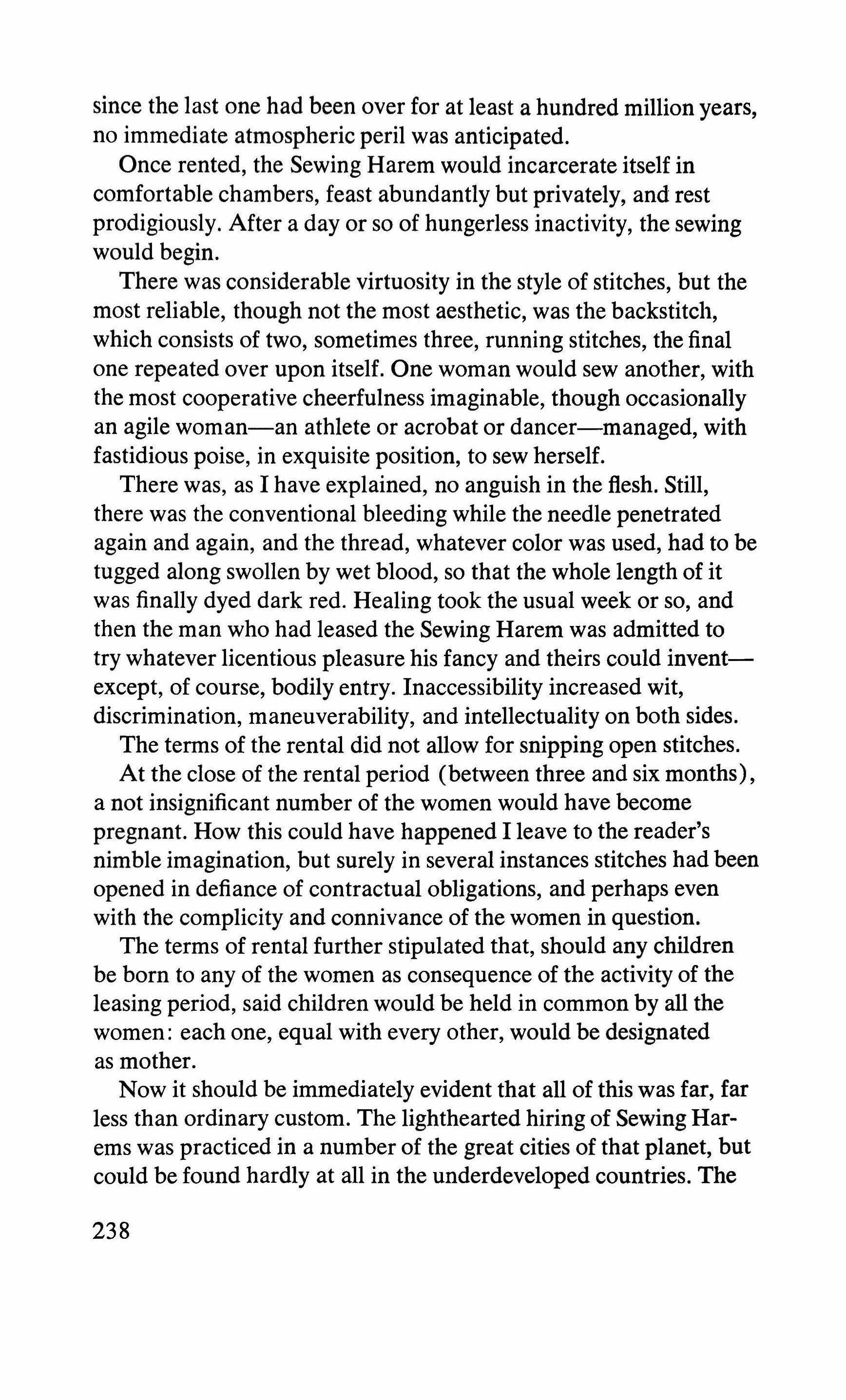
since the last one had been over for at least a hundred million years, no immediate atmospheric peril was anticipated.
Once rented, the Sewing Harem would incarcerate itself in comfortable chambers, feast abundantly but privately, and rest prodigiously. After a day or so of hungerless inactivity, the sewing would begin.
There was considerable virtuosity in the style of stitches, but the most reliable, though not the most aesthetic, was the backstitch, which consists of two, sometimes three, running stitches, the final one repeated over upon itself. One woman would sew another, with the most cooperative cheerfulness imaginable, though occasionally an agile woman-an athlete or acrobat or dancer-managed, with fastidious poise, in exquisite position, to sew herself.
There was, as I have explained, no anguish in the flesh. Still, there was the conventional bleeding while the needle penetrated again and again, and the thread, whatever color was used, had to be tugged along swollen by wet blood, so that the whole length of it was finally dyed dark red. Healing took the usual week or so, and then the man who had leased the Sewing Harem was admitted to try whatever licentious pleasure his fancy and theirs could inventexcept, of course, bodily entry. Inaccessibility increased wit, discrimination, maneuverability, and intellectuality on both sides.
The terms of the rental did not allow for snipping open stitches.
At the close of the rental period (between three and six months), a not insignificant number of the women would have become pregnant. How this could have happened I leave to the reader's nimble imagination, but surely in several instances stitches had been opened in defiance of contractual obligations, and perhaps even with the complicity and connivance of the women in question.
The terms of rental further stipulated that, should any children be born to any of the women as consequence of the activity of the leasing period, said children would be held in common by all the women: each one, equal with every other, would be designated as mother.
Now it should be immediately evident that all of this was far, far less than ordinary custom. The lighthearted hiring of Sewing Harems was practiced in a number of the great cities of that planet, but could be found hardly at all in the underdeveloped countries. The
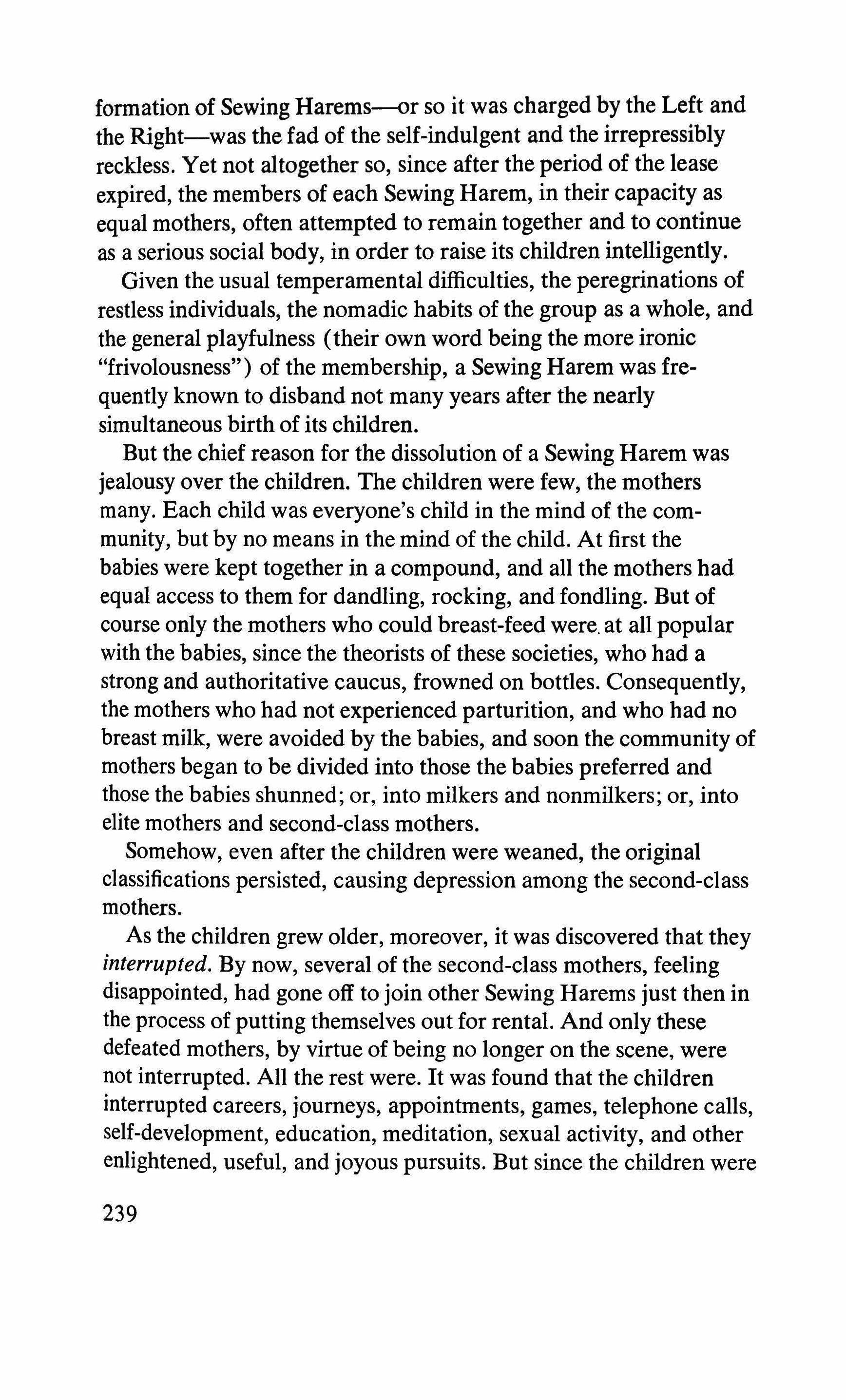
formation of Sewing Harems--or so it was charged by the Left and the Right-was the fad of the self-indulgent and the irrepressibly reckless. Yet not altogether so, since after the period of the lease expired, the members of each Sewing Harem, in their capacity as equal mothers, often attempted to remain together and to continue as a serious social body, in order to raise its children intelligently.
Given the usual temperamental difficulties, the peregrinations of restless individuals, the nomadic habits of the group as a whole, and the general playfulness (their own word being the more ironic "frivolousness") of the membership, a Sewing Harem was frequently known to disband not many years after the nearly simultaneous birth of its children.
But the chief reason for the dissolution of a Sewing Harem was jealousy over the children. The children were few, the mothers many. Each child was everyone's child in the mind of the community, but by no means in the mind of the child. At first the babies were kept together in a compound, and all the mothers had equal access to them for dandling, rocking, and fondling. But of course only the mothers who could breast-feed were. at all popular with the babies, since the theorists of these societies, who had a strong and authoritative caucus, frowned on bottles. Consequently, the mothers who had not experienced parturition, and who had no breast milk, were avoided by the babies, and soon the community of mothers began to be divided into those the babies preferred and those the babies shunned; or, into milkers and nonmilkers; or, into elite mothers and second-class mothers.
Somehow, even after the children were weaned, the original classifications persisted, causing depression among the second-class mothers.
As the children grew older, moreover, it was discovered that they interrupted. By now, several of the second-class mothers, feeling disappointed, had gone off to join other Sewing Harems just then in the process of putting themselves out for rental. And only these defeated mothers, by virtue of being no longer on the scene, were not interrupted. All the rest were. It was found that the children interrupted careers, journeys, appointments, games, telephone calls, self-development, education, meditation, sexual activity, and other enlightened, useful, and joyous pursuits. But since the children were

all being brought up with the highest self-expectations, they believed themselves to be ("as indeed you are," the mothers told them) in every way central to the community.
They believed this in spite of their understanding that, morally and philosophically, they had no right to exist. Morally, each one had been conceived by breach of contract. Philosophically, each one had been born to a mother theoretically committed to the closure of the passage leading to the womb. In brief, the children knew that they were the consequence of unpredictable deviations from a metaphysical position; or, to state it still more succinctly, the fruit of snipped stitches.
That the children interrupted the personal development of the mothers was difficulty enough. In a less dialectical community there might have been a drive toward comfortable if imperfect solutions. But these were (as it ought by now to be radiantly clear) no ordinary women. Ordinary women might have taken turns in caring for the children, or hired men and other women for this purpose, or experimented with humane custodial alternatives. A Sewing Harem, however, was a community of philosophers. And just as bottlefeeding had been condemned as an inferior compromise, so now were the various permutations of day-care proposals scorned. Each child was regarded as the offspring not simply of a single philosopher, but of a community of philosophers; hence not to be subjected to rearing by hirelings, or by any arrangement inferior to the loftiest visions of communal good.
As for taking turns, though it might be fair, it was inconceivable: just as each child was entitled to the highest self-expectation without compromise, so was each philosopher entitled to the highest selfdevelopment without compromise or interruption.
The children, as they grew, not only interrupted the mothers; they interfered with the mothers' most profound ideals. The blatant fact of the birth of a large group of children hindered ecological reform, promoted pollution, and frustrated every dramatic hope of rational population reduction. In short, the presence of the children was antiprogressive. And since not only joy and self-development, but also friendship and truth, were the dearest doctrines of a Sewing Harem, the children were made to understand that, in spite of their
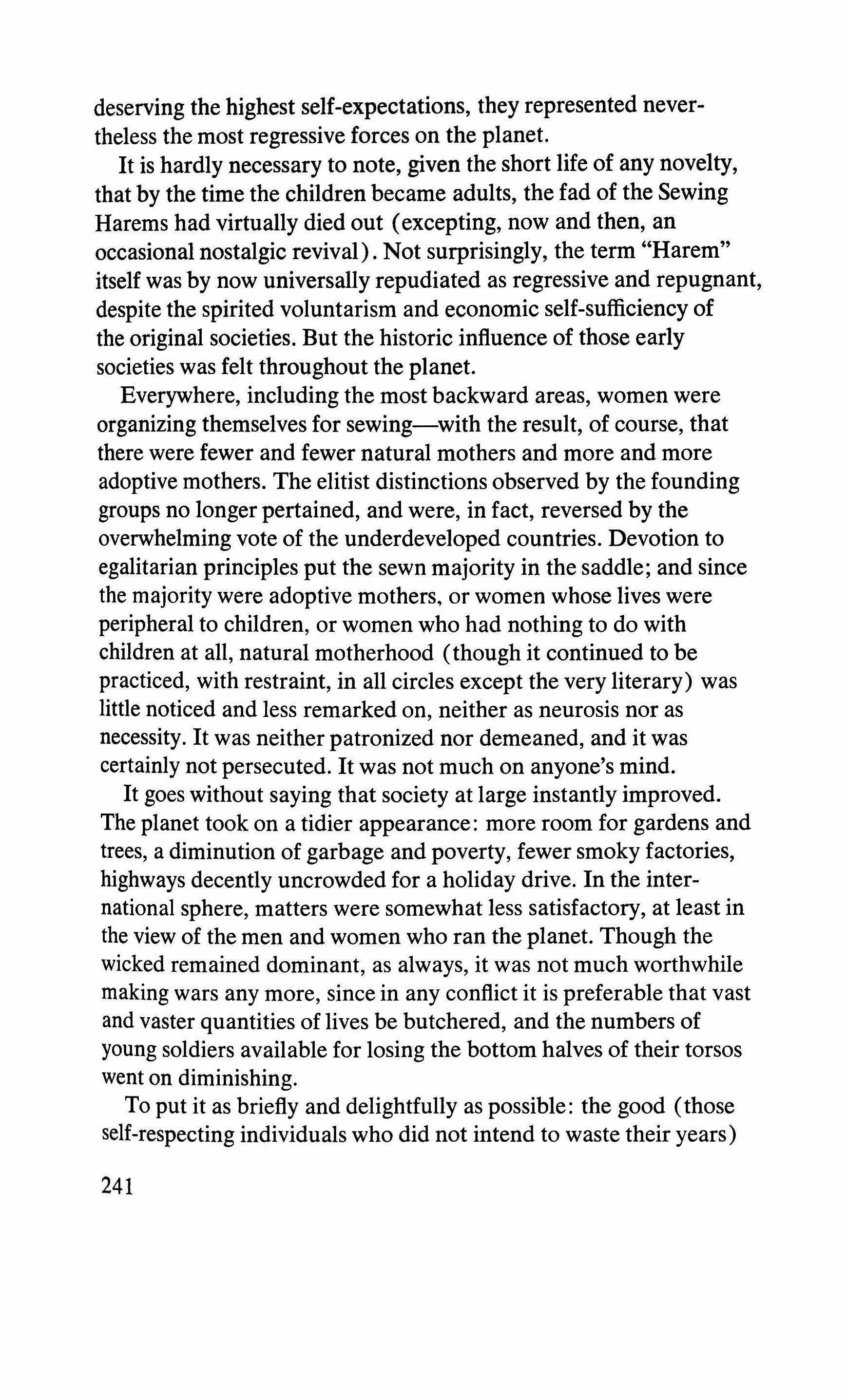
deserving the highest self-expectations, they represented nevertheless the most regressive forces on the planet.
It is hardly necessary to note, given the short life of any novelty, that by the time the children became adults, the fad of the Sewing Harems had virtually died out (excepting, now and then, an occasional nostalgic revival). Not surprisingly, the term "Harem" itself was by now universally repudiated as regressive and repugnant, despite the spirited voluntarism and economic self-sufficiency of the original societies. But the historic influence of those early societies was felt throughout the planet.
Everywhere, including the most backward areas, women were organizing themselves for sewing-with the result, of course, that there were fewer and fewer natural mothers and more and more adoptive mothers. The elitist distinctions observed by the founding groups no longerpertained, and were, in fact, reversed by the overwhelming vote of the underdeveloped countries. Devotion to egalitarian principles put the sewn majority in the saddle; and since the majority were adoptive mothers, or women whose lives were peripheral to children, or women who had nothing to do with children at all, natural motherhood (though it continued to be practiced, with restraint, in all circles except the very literary) was little noticed and less remarked on, neither as neurosis nor as necessity. It was neither patronized nor demeaned, and it was certainly not persecuted. It was not much on anyone's mind. It goes without saying that society at large instantly improved. The planet took on a tidier appearance: more room for gardens and trees, a diminution of garbage and poverty, fewer smoky factories, highways decently uncrowded for a holiday drive. In the international sphere, matters were somewhat less satisfactory, at least in the view of the men and women who ran the planet. Though the wicked remained dominant, as always, it was not much worthwhile making wars any more, since in any conflict it is preferable that vast and vaster quantities of lives be butchered, and the numbers of young soldiers available for losing the bottom halves of their torsos went on diminishing.
To put it as briefly and delightfully as possible: the good (those self-respecting individuals who did not intend to waste their years)
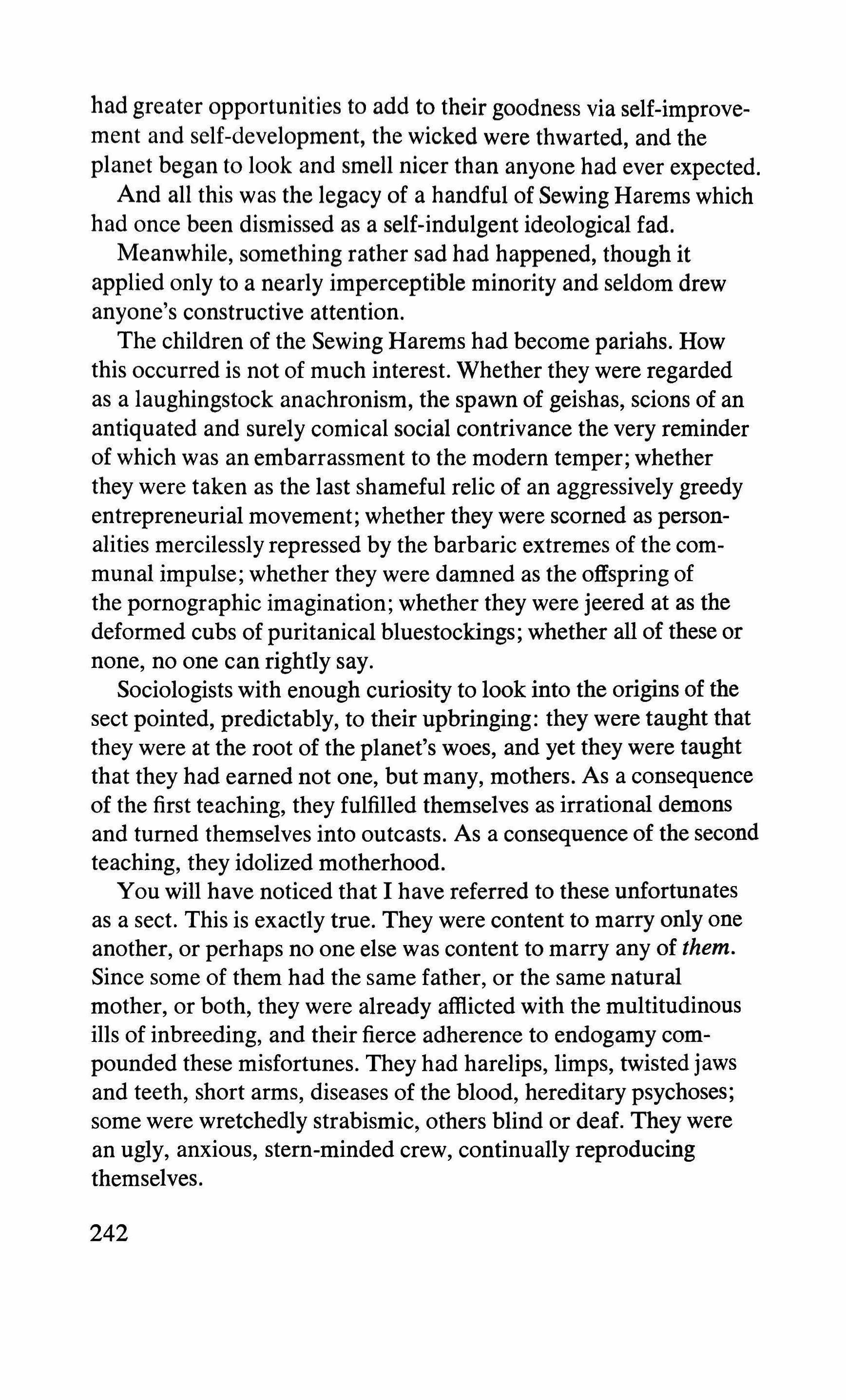
had greater opportunities to add to their goodness via self-improvement and self-development, the wicked were thwarted, and the planet began to look and smell nicer than anyone had ever expected.
And all this was the legacy of a handful of Sewing Harems which had once been dismissed as a self-indulgent ideological fad.
Meanwhile, something rather sad had happened, though it applied only to a nearly imperceptible minority and seldom drew anyone's constructive attention.
The children of the Sewing Harems had become pariahs. How this occurred is not of much interest. Whether they were regarded as a laughingstock anachronism, the spawn of geishas, scions of an antiquated and surely comical social contrivance the very reminder of which was an embarrassment to the modern temper; whether they were taken as the last shameful relic of an aggressively greedy entrepreneurial movement; whether they were scorned as personalities mercilesslyrepressed by the barbaric extremes of the communal impulse; whether they were damned as the offspring of the pornographic imagination; whether they were jeered at as the deformed cubs of puritanical bluestockings; whether all of these or none, no one can rightly say.
Sociologists with enough curiosity to look into the origins of the sect pointed, predictably, to their upbringing: they were taught that they were at the root of the planet's woes, and yet they were taught that they had earned not one, but many, mothers. As a consequence of the first teaching, they fulfilled themselves as irrational demons and turned themselves into outcasts. As a consequence of the second teaching, they idolized motherhood.
You will have noticed that I have referred to these unfortunates as a sect. This is exactly true. They were content to marry only one another, or perhaps no one else was content to marry any of them. Since some of them had the same father, or the same natural mother, or both, they were already afflicted with the multitudinous ills of inbreeding, and their fierce adherence to endogamy compounded these misfortunes. They had harelips, limps, twisted jaws and teeth, short arms, diseases of the blood, hereditary psychoses; some were wretchedly strabismic, others blind or deaf. They were an ugly, anxious, stern-minded crew, continually reproducing themselves.
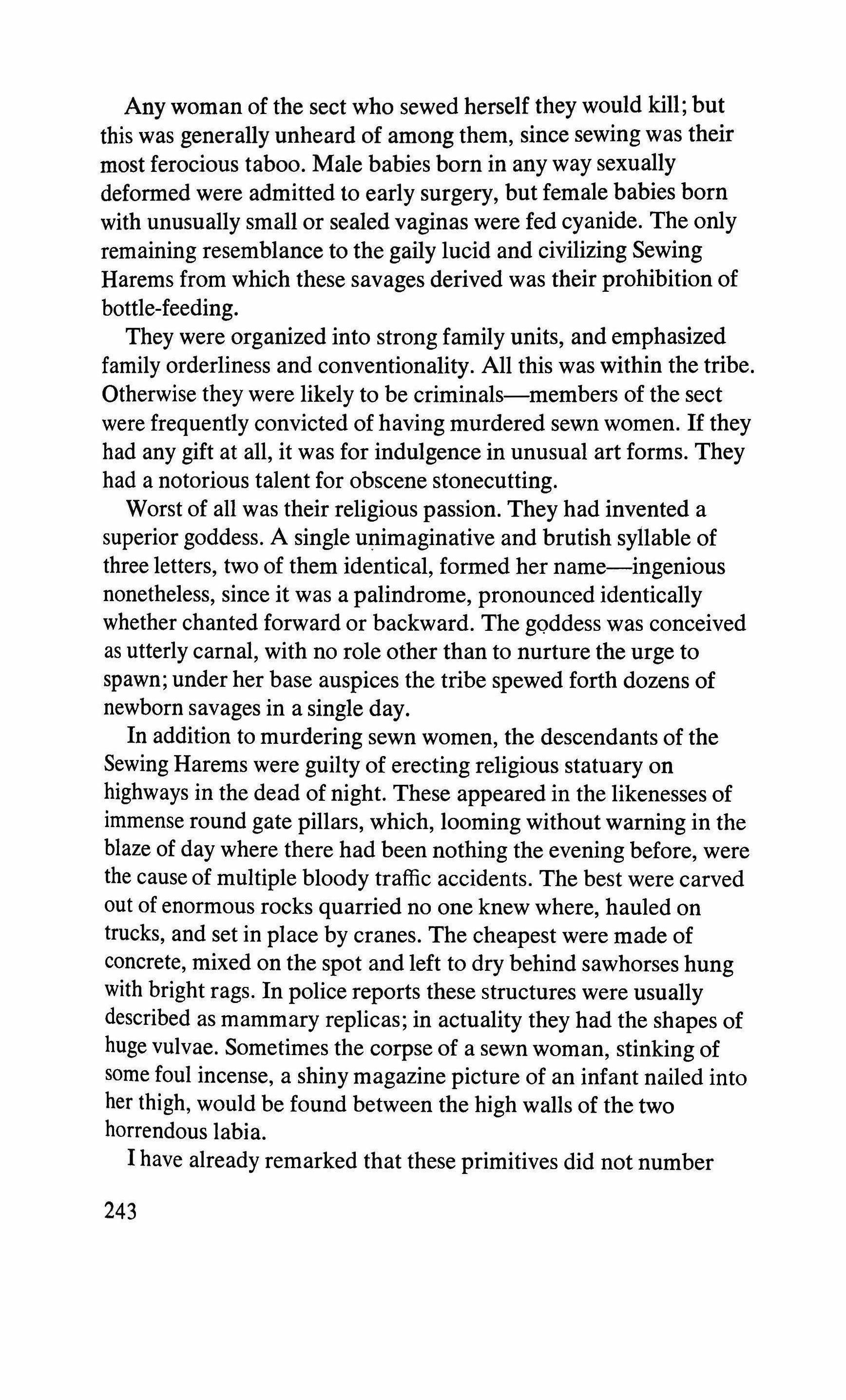
Any woman of the sect who sewed herself they would kill; but this was generally unheard of among them, since sewing was their most ferocious taboo. Male babies born in any way sexually deformed were admitted to early surgery, but female babies born with unusually small or sealed vaginas were fed cyanide. The only remaining resemblance to the gaily lucid and civilizing Sewing Harems from which these savages derived was their prohibition of bottle-feeding.
They were organized into strong family units, and emphasized family orderliness and conventionality. All this was within the tribe. Otherwise they were likely to be criminals-members of the sect were frequently convicted of having murdered sewn women. If they had any gift at all, it was for indulgence in unusual art forms. They had a notorious talent for obscene stonecutting.
Worst of all was their religious passion. They had invented a superior goddess. A single unimaginative and brutish syllable of three letters, two of them identical, formed her name-ingenious nonetheless, since it was a palindrome, pronounced identically whether chanted forward or backward. The goddess was conceived as utterly carnal, with no role other than to nurture the urge to spawn; under her base auspices the tribe spewed forth dozens of newborn savages in a single day.
In addition to murdering sewn women, the descendants of the Sewing Harems were guilty of erecting religious statuary on highways in the dead of night. These appeared in the likenesses of immense round gate pillars, which, looming without warning in the blaze of day where there had been nothing the evening before, were the cause of multiple bloody traffic accidents. The best were carved out of enormous rocks quarried no one knew where, hauled on trucks, and set in place by cranes. The cheapest were made of concrete, mixed on the spot and left to dry behind sawhorses hung with bright rags. In police reports these structures were usually described as mammary replicas; in actuality they had the shapes of huge vulvae. Sometimes the corpse of a sewn woman, stinking of some foul incense, a shiny magazine picture of an infant nailed into her thigh, would be found between the high walls of the two horrendous labia.
I have already remarked that these primitives did not number
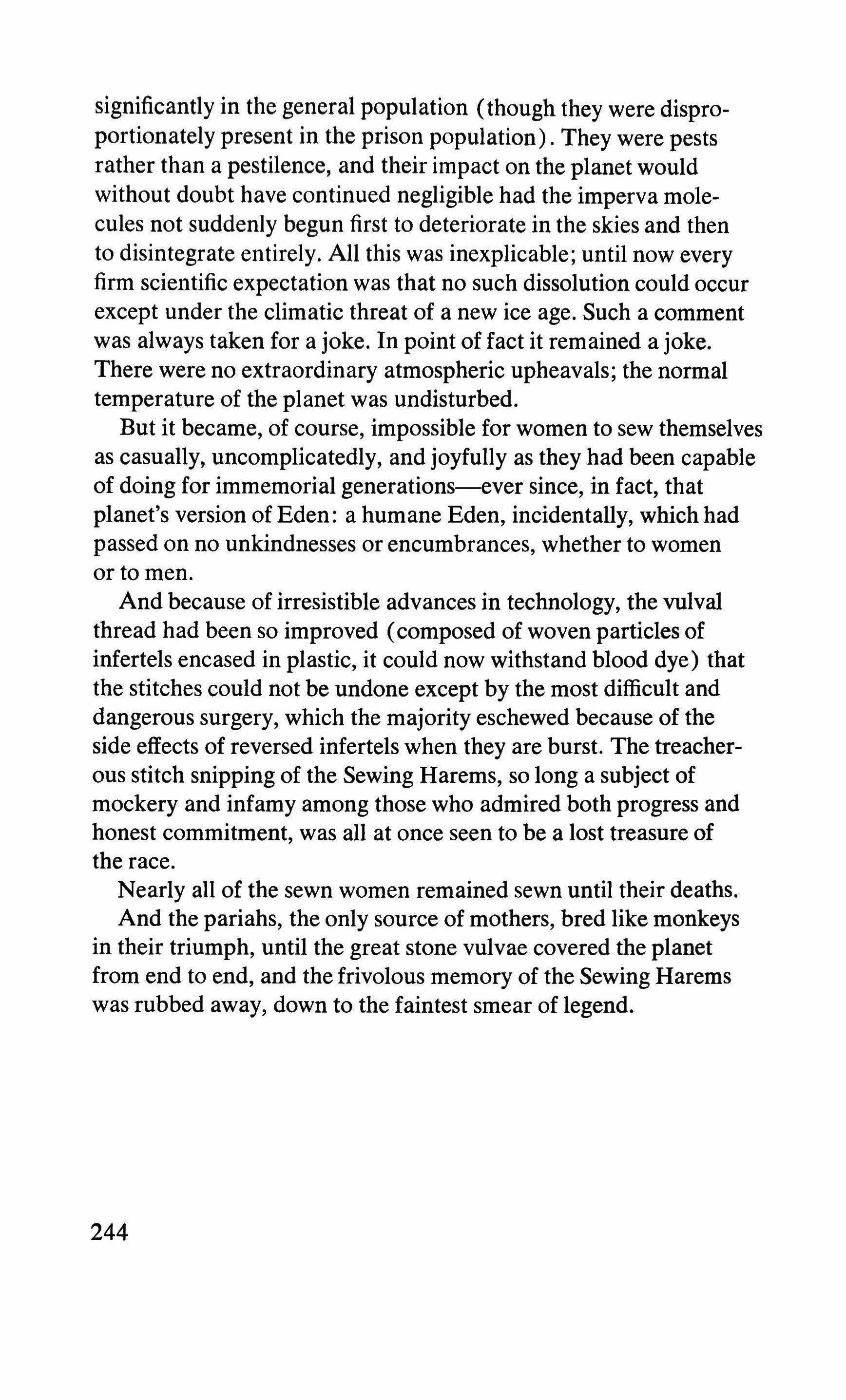
significantly in the general population (though they were disproportionately present in the prison population). They were pests rather than a pestilence, and their impact on the planet would without doubt have continued negligible had the imperva molecules not suddenly begun first to deteriorate in the skies and then to disintegrate entirely. All this was inexplicable; until now every firm scientific expectation was that no such dissolution could occur except under the climatic threat of a new ice age. Such a comment was always taken for a joke. In point of fact it remained a joke. There were no extraordinary atmospheric upheavals; the normal temperature of the planet was undisturbed.
But it became, of course, impossible for women to sew themselves as casually, uncomplicatedly, and joyfully as they had been capable of doing for immemorial generations-ever since, in fact, that planet's version of Eden: a humane Eden, incidentally, which had passed on no unkindnesses or encumbrances, whether to women or to men.
And because of irresistible advances in technology, the vulval thread had been so improved (composed of woven particles of infertels encased in plastic, it could now withstand blood dye) that the stitches could not be undone except by the most difficult and dangerous surgery, which the majority eschewed because of the side effects of reversed infertels when they are burst. The treacherous stitch snipping of the Sewing Harems, so long a subject of mockery and infamy among those who admired both progress and honest commitment, was all at once seen to be a lost treasure of the race.
Nearly all of the sewn women remained sewn until their deaths.
And the pariahs, the only source of mothers, bred like monkeys in their triumph, until the great stone vulvae covered the planet from end to end, and the frivolous memory of the Sewing Harems was rubbed away, down to the faintest smear of legend.

She had seen him around. On the street that ran parallel to the campus, standing beside the old black Chevrolet that was painted with flurries of yellow and green flowers and Peace and We love you, always parked outside the entrance to the Art Building. She had seen him standing there, watching the throngs of hip art graduate students that gathered around the car each morning, smoking pot and running their fingers throughlong hair that shone blonde and damp in the sunlight. She hadn't meant to have anything to do with him; he was a townie and the older girls in the dorm were always cracking jokes about townies and street people and grease balls. She would sit in the dorm lounge listening to the girls, smoking cigarette after cigarette without ever inhaling, wondering about slim Thelma Watson who was forever eating candy bars. Pure chocolate candy bars! But he had black hair and dark eyes and dirty white skin, Lord knows there weren't any like him in her hometown, so she marveled at him anyway because he was different.
She was waiting for a bus across from campus, staring down at the frozen street and smoking cigarettes, even though it was something like twenty degrees out and her hands were raw with cold. He

pulled up to the curb in a metallic blue van, which as far as she was concerned was really a point in his favor because the girls in the dorm were always saying you can trust guys driving vans or Volkswagens. The windows were covered with flowers and peace decals, which assured her even more, so when he offered her a ride she climbed in without hesitation even though he was obviously a townie.
She was going into the city for no particular reason, so when he announced that it was a far-out day and he had some righteous weed in his pocket, they really should take a drive in the country, she thought why not.
When they got to the yellow field (the kind of yellow strawlike grass that would have been soft and lusciously green in any other season but was now dry, prickly, and crackled when they walked), they went over to a blackened oak tree, the only tree in the entire field, and sat down behind it. She noticed that, although the townie was tall, he sat squat and thick-shouldered like an ox at a trough. She giggled, and the townie pulled out another joint.
They lay down on the hard grass and stared up at a hazy grayblue winter sky and he told her about his wife. How she was always going out (steppin' out, he called it) with really brutal guys and how they always drank a lot and roughed her up but she seemed to really love it because she always came home disheveled with her blouse open almost to the waist, laughing maniacally and calling him a coward because he wouldn't go after these guys, and besides he was impotent anyway.
He assured her that he was not impotent and put his hand on her knee. She sat up and leaned against the tree and giggled nervously. The townie sat up too, and told her that he was wondering if it was really that women liked being beat up, that maybe it excited them a lot or something, because his wife was always covered with bruises on her private places, but she was always wildly laughing and smelling like sweat and gin and talking about how good some guy was, how good he made her feel, and how he (the townie) could never satisfy her the way the others did.
She noted that the sun was going down behind a distant hill. She said she thought it would be dark soon, and gazed nervously at her
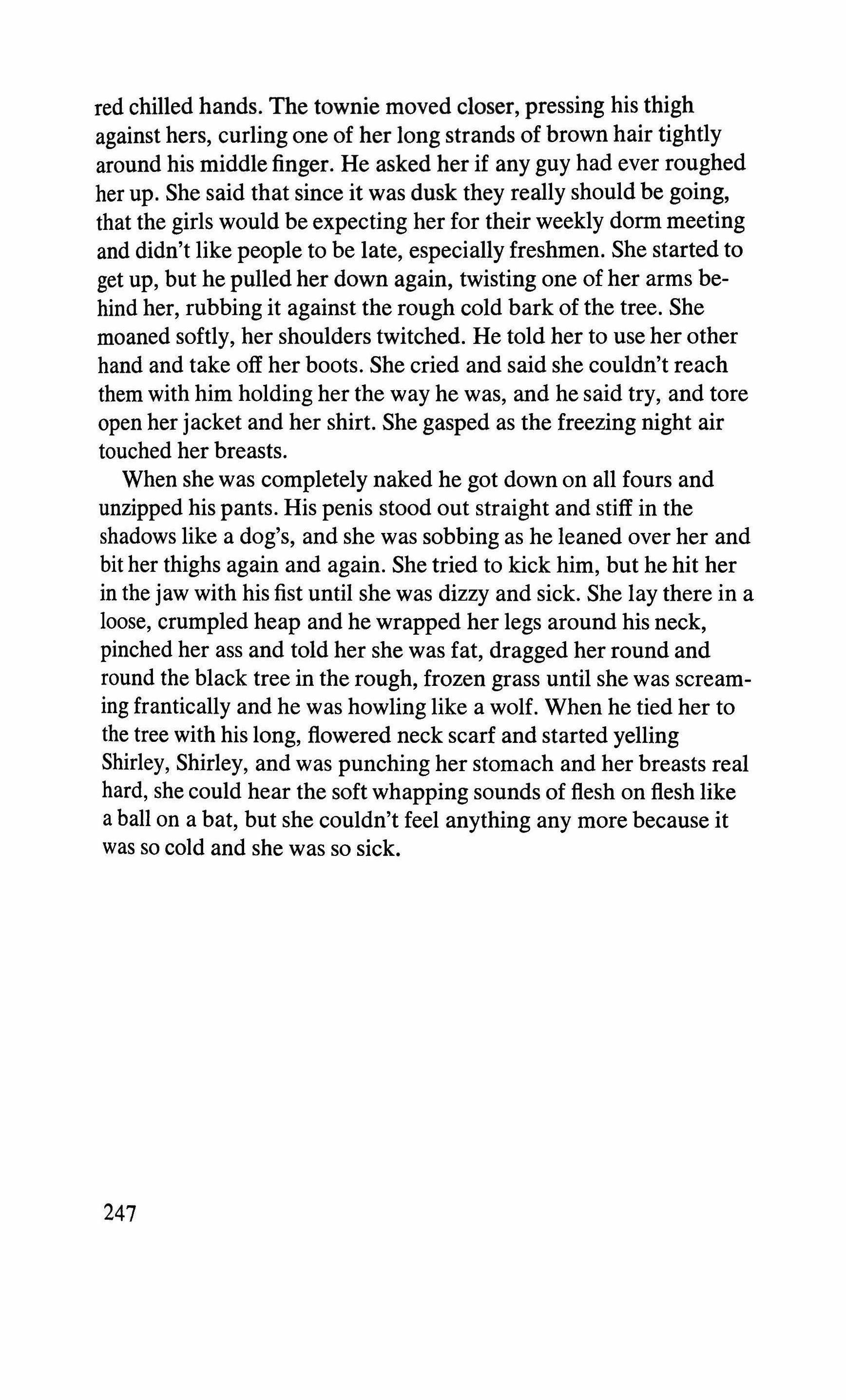
red chilled hands. The townie moved closer, pressing his thigh against hers, curling one of her long strands of brown hair tightly around his middle finger. He asked her if any guy had ever roughed her up. She said that since it was dusk they really should be going, that the girls would be expecting her for their weekly dorm meeting and didn't like people to be late, especially freshmen. She started to get up, but he pulled her down again, twisting one of her arms behind her, rubbing it against the rough cold bark of the tree. She moaned softly, her shoulders twitched. He told her to use her other hand and take off her boots. She cried and said she couldn't reach them with him holding her the way he was, and he said try, and tore open her jacket and her shirt. She gasped as the freezing night air touched her breasts.
When she was completely naked he got down on all fours and unzipped his pants. His penis stood out straight and stiff in the shadows like a dog's, and she was sobbing as he leaned over her and bit her thighs again and again. She tried to kick him, but he hit her in the jaw with his fist until she was dizzy and sick. She lay there in a loose, crumpled heap and he wrapped her legs around his neck, pinched her ass and told her she was fat, dragged her round and round the black tree in the rough, frozen grass until she was screaming frantically and he was howling like a wolf. When he tied her to the tree with his long, flowered neck scarf and started yelling Shirley, Shirley, and was punching her stomach and her breasts real hard, she could hear the soft whapping sounds of flesh on flesh like a ball on a bat, but she couldn't feel anything any more because it was so cold and she was so sick.
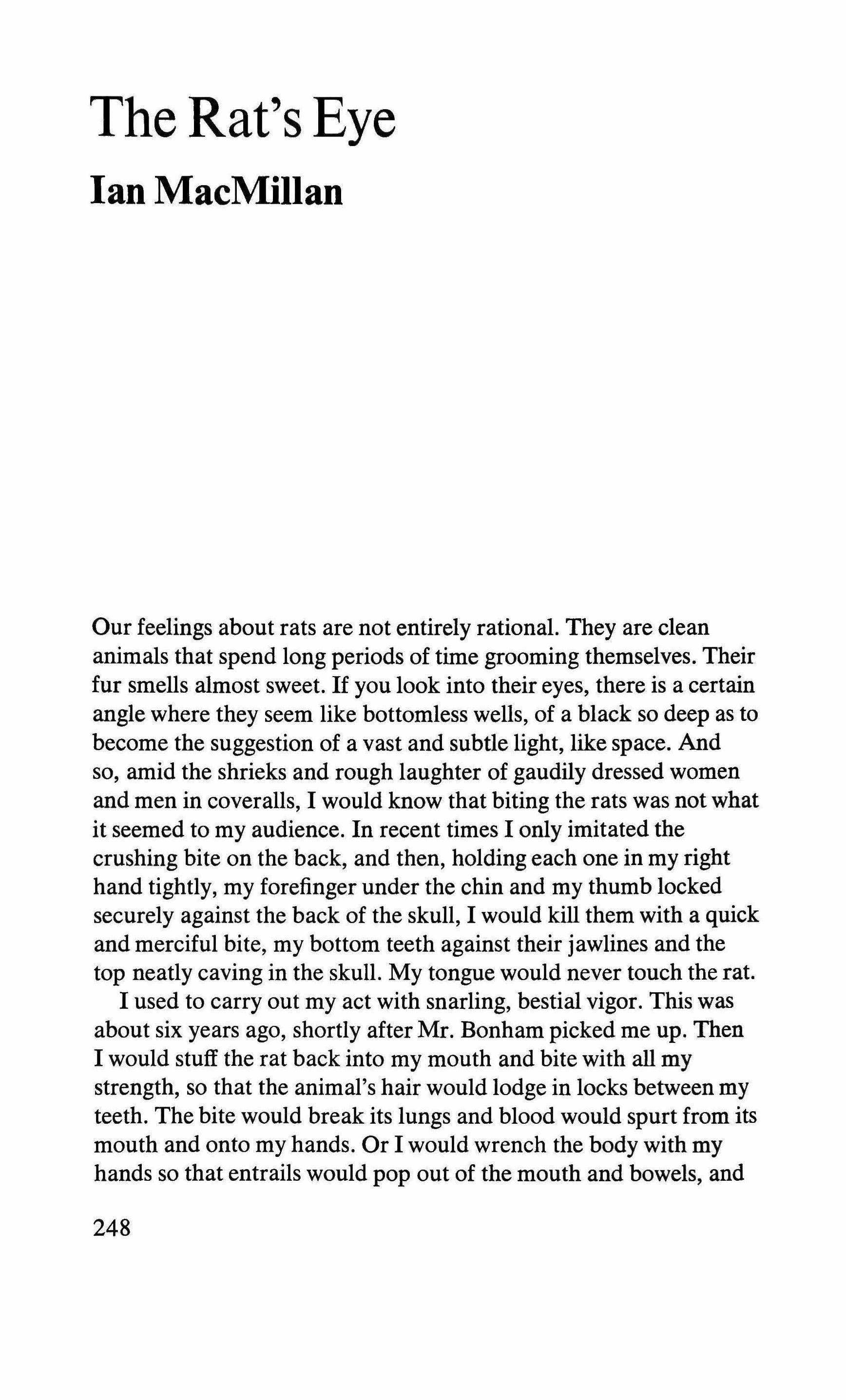
Our feelings about rats are not entirely rational. They are clean animals that spend long periods of time grooming themselves. Their fur smells almost sweet. If you look into their eyes, there is a certain angle where they seem like bottomless wells, of a black so deep as to become the suggestion of a vast and subtle light, like space. And so, amid the shrieks and rough laughter of gaudily dressed women and men in coveralls, I would know that biting the rats was not what it seemed to my audience. In recent times I only imitated the crushing bite on the back, and then, holding each one in my right hand tightly, my forefinger under the chin and my thumb locked securely against the back of the skull, I would kill them with a quick and merciful bite, my bottom teeth against their jawlines and the top neatly caving in the skull. My tongue would never touch the rat. I used to carry out my act with snarling, bestial vigor. This was about six years ago, shortly after Mr. Bonham picked me up. Then I would stuff the rat back into my mouth and bite with all my strength, so that the animal's hair would lodge in locks between my teeth. The bite would break its lungs and blood would spurt from its mouth and onto my hands. Or I would wrench the body with my hands so that entrails would pop out of the mouth and bowels, and
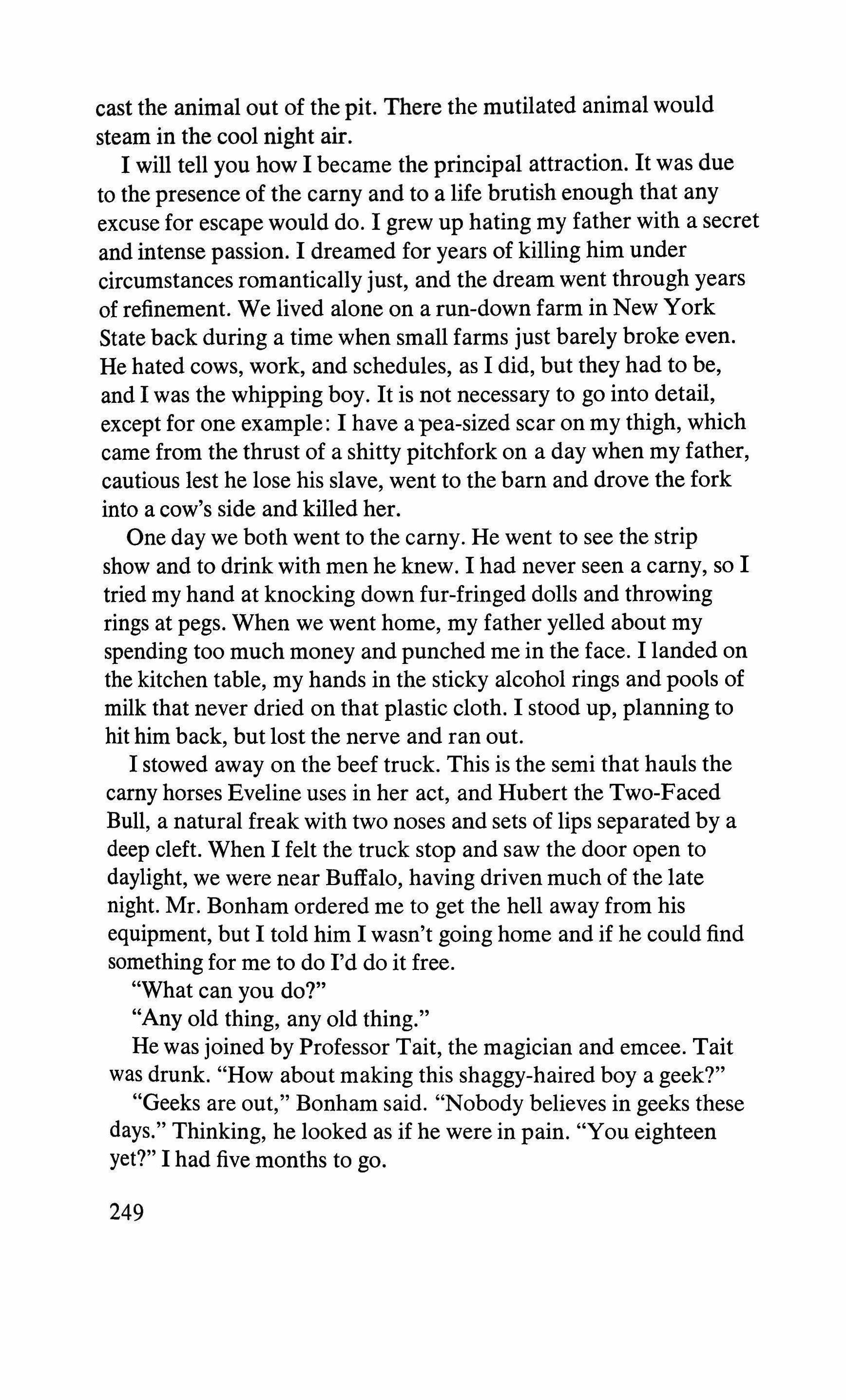
cast the animal out of the pit. There the mutilated animal would steam in the cool night air.
I will tell you how I became the principal attraction. It was due to the presence of the carny and to a life brutish enough that any excuse for escape would do. I grew up hating my father with a secret and intense passion. I dreamed for years of killing him under circumstances romantically just, and the dream went through years of refinement. We lived alone on a run-down farm in New York State back during a time when small farms just barely broke even. He hated cows, work, and schedules, as I did, but they had to be, and I was the whipping boy. It is not necessary to go into detail, except for one example: I have a pea-sized scar on my thigh, which came from the thrust of a shitty pitchfork on a day when my father, cautious lest he lose his slave, went to the barn and drove the fork into a cow's side and killed her.
One day we both went to the carny. He went to see the strip show and to drink with men he knew. I had never seen a carny, so I tried my hand at knocking down fur-fringed dolls and throwing rings at pegs. When we went home, my father yelled about my spending too much money and punched me in the face. I landed on the kitchen table, my hands in the sticky alcohol rings and pools of milk that never dried on that plastic cloth. I stood up, planning to hit him back, but lost the nerve and ran out.
I stowed away on the beef truck. This is the semi that hauls the carny horses Eveline uses in her act, and Hubert the Two-Faced Bull, a natural freak with two noses and sets of lips separated by a deep cleft. When I felt the truck stop and saw the door open to daylight, we were near Buffalo, having driven much of the late night. Mr. Bonham ordered me to get the hell away from his equipment, but I told him I wasn't going home and if he could find something for me to do I'd do it free.
"What can you do?"
"Any old thing, any old thing."
He was joined by Professor Tait, the magician and emcee. Tait was drunk. "How about making this shaggy-haired boy a geek?"
"Geeks are out," Bonham said. "Nobody believes in geeks these days." Thinking, he looked as if he were in pain. "You eighteen yet?" I had five months to go.
249

"About," I said. "What's a geek?"
"Why don't you go on home, kid?" he said. "I got no use for you."
"I ain't goin'," I said, folding my arms.
Bonham walked off. Tait stepped up. "This is a good sign, son. Let the man think."
Bonham always looked miserable as he watched over the various processes of his dilapidated carny. It was with this look of misery and uncertainty that he came back with his proposal, which I later recognized as partly a method of driving me off that failed. He kept muttering that they used to do this once, but not in a long time. I was eager enough that it meant nothing to me. I said why not. Bonham and Tait were both a little shocked. They turned away and mumbled. Tait seemed to advise against it. I thought the idea was awful too, but had no alternative.
Here I am standing in my filthyjeans and lumberjack shirt while one of the drivers, swearing about having to drive twenty miles to find a town with a pet shop, comes up with the cage. "I don't know about this," Mr. Bonham says.
It was the forwardness and guts of youth. I'm not going to blanch. I take the cage with a shiny brown rat in it, really kind of pretty, with beady black eyes. While Bonham and Tait mutter their reservations, I take it out. I hold it steady, swallow, throw off that last little hesitation. I bring it to my mouth. The men look away, the rat struggles. Quick-I bite down on its spine and rib cage so hard that the bones crunch in a tiny explosion no one can hear but I can feel in my teeth, and with a quick squeal and wheeze the rat is dead. "I don't know about this," Bonham says. "Years ago, maybe my own father with this outfit here. Could be. Could be even he did it. I just-"
It is a redneck's carny, small and cheap. You have Eveline with her horses, Hubert the Two-Faced Bull, the wire performers, modest rides. There is Denise Lovelace, the stripper. For the sideshow, Billy Young and his rats, and then the Armless Wonder, a man who only stays with us half the time, who can throw this great curve without anything four inches below either elbow-he holds the ball in the crook and wings it; he writes, does all kinds of stuff. There is good old Professor Tait with his magic act and his mind-reading. There is the two-headed baby, a freak who has spent the last thirty 250

some-odd years in a huge bottle of alcohol with a slowly swirling suspension of flecks of skin. The baby's eyes are puffed closed; it hangs there wax white, with its umbilical cord under its arm.
Bonham's way is to head for smaller rural towns and make a deal with a sort of well-known farmer to use some bit of pasture near a macadam road. Then it is a matter of putting the posters around, working two weeks ahead by sending useless old men out to do the PR work. The caravan of trucks, five in all, constitutes the carny packed up. The tents and equipment arrive early. Then come the beef and the performers, who do some rehearsing duringmornings before the goonies come to blow their money. The performers sleep in motels, travel in cars. The lowlies, as we call ourselves, drive the beef and tents through the night, dazed and nodding at the beams of our own headlights bouncing on the road ahead. We stay three or four days in a town. Mr. Bonham is a clean man, and we have to pick up every shred before we vacate. He knows how people cheat, but does not intervene. He knows that Denise Lovelace discards her pasties and G-string to reward the drunks at the end of her actserves herself up in poses illuminated by the beam of a flashlight held by Professor Tait, now drunk enough that his aim wavers, an error whose gravity he does not sense. Mr. Bonham knows that one of the beef men is a pickpocket, that Professor Tait is sometimes too drunk to do his magic, that Denise costs twenty dollars in off times.
My act is the center of the sideshow. Mr. Bonham is always scared that someone will holler, call the newspapers, the SPCA. He always looks at me with surprise on his face, as if he could never believe I had the guts.
All right, you are a consumer You have seen the Borellis' wire act, Eveline, Hubert. You have shot the twenty-twos and your fingers stick together annoyingly from the remnants of the cotton candy. Now it is time for Billy Young.
Professor Tait emerges from a tent flap, grave and thoughtful. "Ladies and gentlemen, I will dispense with loquacious formalities. Inside this tent is a boy, found by persons who wish to remain anonymous, up in the southern backcountry of Canada-Billy Young. No one knows how he survived, but survive he did, by
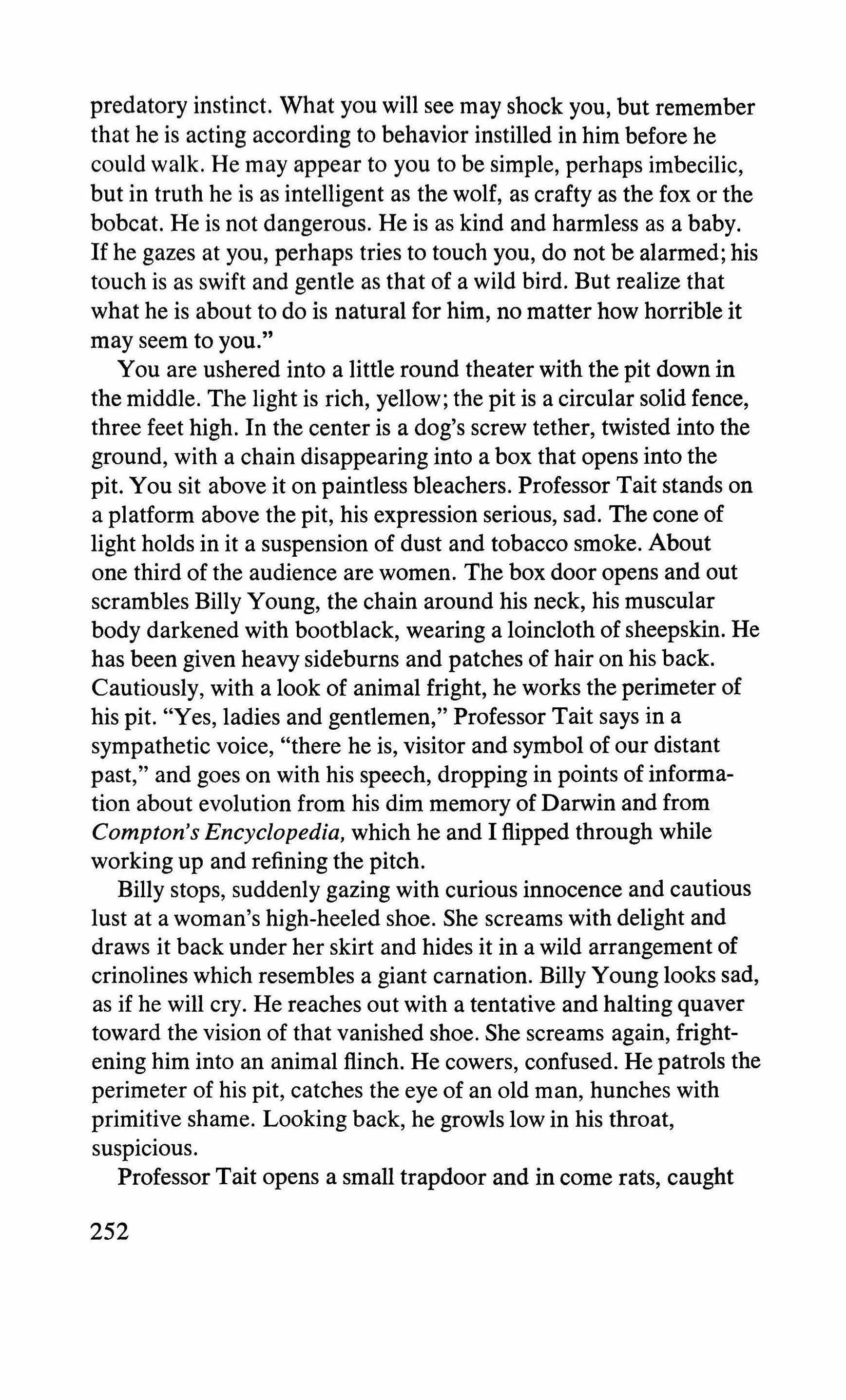
predatory instinct. What you will see may shock you, but remember that he is acting according to behavior instilled in him before he could walk. He may appear to you to be simple, perhaps imbecilic, but in truth he is as intelligent as the wolf, as crafty as the fox or the bobcat. He is not dangerous. He is as kind and harmless as a baby. If he gazes at you, perhaps tries to touch you, do not be alarmed; his touch is as swift and gentle as that of a wild bird. But realize that what he is about to do is natural for him, no matter how horrible it may seem to you."
You are ushered into a little round theater with the pit down in the middle. The light is rich, yellow; the pit is a circular solid fence, three feet high. In the center is a dog's screw tether, twisted into the ground, with a chain disappearing into a box that opens into the pit. You sit above it on paintless bleachers. Professor Tait stands on a platform above the pit, his expression serious, sad. The cone of light holds in it a suspension of dust and tobacco smoke. About one third of the audience are women. The box door opens and out scrambles Billy Young, the chain around his neck, his muscular body darkened with bootblack, wearing a loincloth of sheepskin. He has been given heavy sideburns and patches of hair on his back. Cautiously, with a look of animal fright, he works the perimeter of his pit. "Yes, ladies and gentlemen," Professor Tait says in a sympathetic voice, "there he is, visitor and symbol of our distant past," and goes on with his speech, dropping in points of information about evolution from his dim memory of Darwin and from Compton's Encyclopedia, which he and I flipped through while working up and refining the pitch.
Billy stops, suddenly gazing with curious innocence and cautious lust at a woman's high-heeled shoe. She screams with delight and draws it back under her skirt and hides it in a wild arrangement of crinolines which resembles a giant carnation. Billy Young looks sad, as if he will cry. He reaches out with a tentative and halting quaver toward the vision of that vanished shoe. She screams again, frightening him into an animal flinch. He cowers, confused. He patrols the perimeter of his pit, catches the eye of an old man, hunches with primitive shame. Looking back, he growls low in his throat, suspicious.
Professor Tait opens a small trapdoor and in come rats, caught

earlier in the day or yesterday at the town dump or the GLP feed store. Billy scrambles to the center of the pit as the rats herd along the perimeter, frightened by noise and light into spastic jerks, jumping against each other with nerves electrified by confusion. The audience gasps-diseased and vile, the rat, representative of all that is horrifying in nature. An animal of such uselessness and destruction-they all have stories about raided grain bins, eggs filched from chicken coops, bites on children. But more important is the aura of evil rats possess. Billy looks at them with hunger and a deep and ancient hatred. He stalks one, expertly homing in on it, cornering it, confusing it with his hands, which move with catlike speed and grace. The rat is caught. It squeals, a loud and bighpitched scream. He looks at it with dumb interest, makes as if to pet it with smug affection. It is locked securely in his right hand, struggling, trying to turn its head to bite. Billy carries it to the perimeter and offers it, his face melancholy with desire, to the lady of the shoe, and she screams again, backed by harsh laughter. Billy winces and is made angry by the rejection. Shamed, he sulks, looks at the rat. Miserable in his disappointment, he seems to think, to consider where the blame lies. Then suddenly he stuffs the back of the rat into his mouth and crushes it with a single bite, so that blood spurts from its mouth and runs in a single bright stream down his forearm. He puts the head in his mouth and crushes the skull, then looks up with a satisfied, sensual leer at the screaming lady, grinning at her with bloody teeth. The crowd roars with horror and appreciation. Women cover their faces. Billy turns, casting the dead rat aside. He slowly tastes the blood, and a new expression crosses his face, one of single-minded lust. He looks, interested. Six more rats cower on the other side of the pit, sniffing, the black beads of their eyes reflecting the light from the lamp above.
The first night we would do one show. The second we would have to do two, each time to a packed tent. Mr. Bonham saw it only once and then went back to his trailer and got drunk. My act put him far in the black and kept him there for all the time I traveled with the carny, even though fear of the SPCA frequently made him cancel the show. Even so, he kept me at a distance and did not seem to like me. Nobody did. I was tainted.
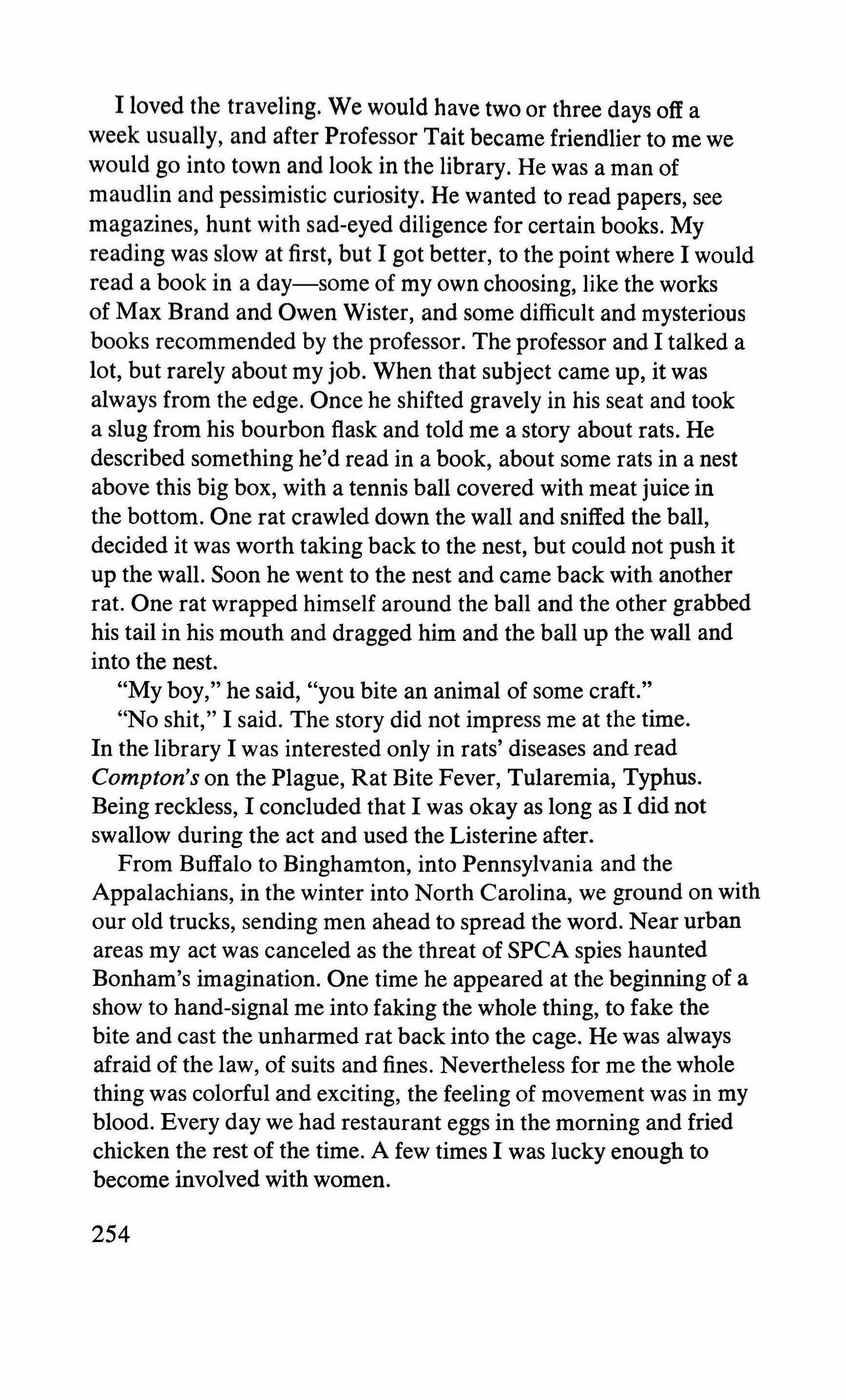
I loved the traveling. We would have two or three days off a week usually, and after Professor Tait became friendlier to me we would go into town and look in the library. He was a man of maudlin and pessimistic curiosity. He wanted to read papers, see magazines, hunt with sad-eyed diligence for certain books. My reading was slow at first, but I got better, to the point where I would read a book in a day-some of my own choosing, like the works of Max Brand and Owen Wister, and some difficult and mysterious books recommended by the professor. The professor and I talked a lot, but rarely about my job. When that subject came up, it was always from the edge. Once he shifted gravely in his seat and took a slug from his bourbon flask and told me a story about rats. He described something he'd read in a book, about some rats in a nest above this big box, with a tennis ball covered with meat juice in the bottom. One rat crawled down the wall and sniffed the ball, decided it was worth taking back to the nest, but could not push it up the wall. Soon he went to the nest and came back with another rat. One rat wrapped himself around the ball and the other grabbed his tail in his mouth and dragged him and the ball up the wall and into the nest.
"My boy," he said, "you bite an animal of some craft."
"No shit," I said. The story did not impress me at the time. In the library I was interested only in rats' diseases and read Compton's on the Plague, Rat Bite Fever, Tularemia, Typhus. Being reckless, I concluded that I was okay as long as I did not swallow during the act and used the Listerine after.
From Buffalo to Binghamton, into Pennsylvania and the Appalachians, in the winter into North Carolina, we ground on with our old trucks, sending men ahead to spread the word. Near urban areas my act was canceled as the threat of SPCA spies haunted Bonham's imagination. One time he appeared at the beginning of a show to hand-signal me into faking the whole thing, to fake the bite and cast the unharmed rat back into the cage. He was always afraid of the law, of suits and fines. Nevertheless for me the whole thing was colorful and exciting, the feeling of movement was in my blood. Every day we had restaurant eggs in the morning and fried chicken the rest of the time. A few times I was lucky enough to become involved with women.

The beginning of the change came after about four years. I had become used to our movements, returns to key places, and the hiring and firing of performers, whom we lowlies did not associate with much. In fact, it was the possibility of such an association that started it. I liked this girl Maria Bertini, touring with us as part of a tumbling and wire act from Italy. I would watch her doing her act up in the higher cone of the tent, swinging lean and muscular with powerful thighs and indented silver buttocks. Another performer in that group-her boyfriend, I guess-noticed this and confronted me after one of their daytime practices. He came to me smiling and suddenly decked me with a punch to the side of the head. He laughed, insulting me in Italian. When I got up, he hit me again. Bonham broke it up. He was angry at me. My head ached for days and I had strange dreams.
Three nights later, still achy in the head, I was on my third rat, snarling and biting its back. I overdid it, because on that bite, egged on by the howls of the audience, I tore the skin off its side, something like pulling a glove off, turning it inside out on the way. In the bright light, in that suspension of dust and smoke, I looked down at what I held in my hand and there, steaming in the cool October air, was the slick musculature of the rat. The vision shocked me, so that my eyes were glazed. At that moment my guise as beast must have vanished too, because the audience became silent. Still quivering slightly, the rat glistened in the light, little strands, almond shapes folded over other shapes, the incredibly delicate and complex front leg crisscrossed by tendons and thin ribbons of muscle.
The act continued. That night, however, I could not sleep, though sleeping had never caused me any trouble. I dozed for a while and got up before dawn, planning to occupy myself with useful work. But that vision from last night was troubling, for reasons I could not figure. I had seen inside the rat, and something about its complexity bothered me. Standing there in the near-frosted air, the dawn faintly showing in the sky, I stared at the dying blackness where the faded stars accentuated the frightening distance you sense in that almost-light. I concluded that, if anything, this curious worry was Maria Bertini's fault.
We moved on. Next stop was Buffalo and one last hustle before
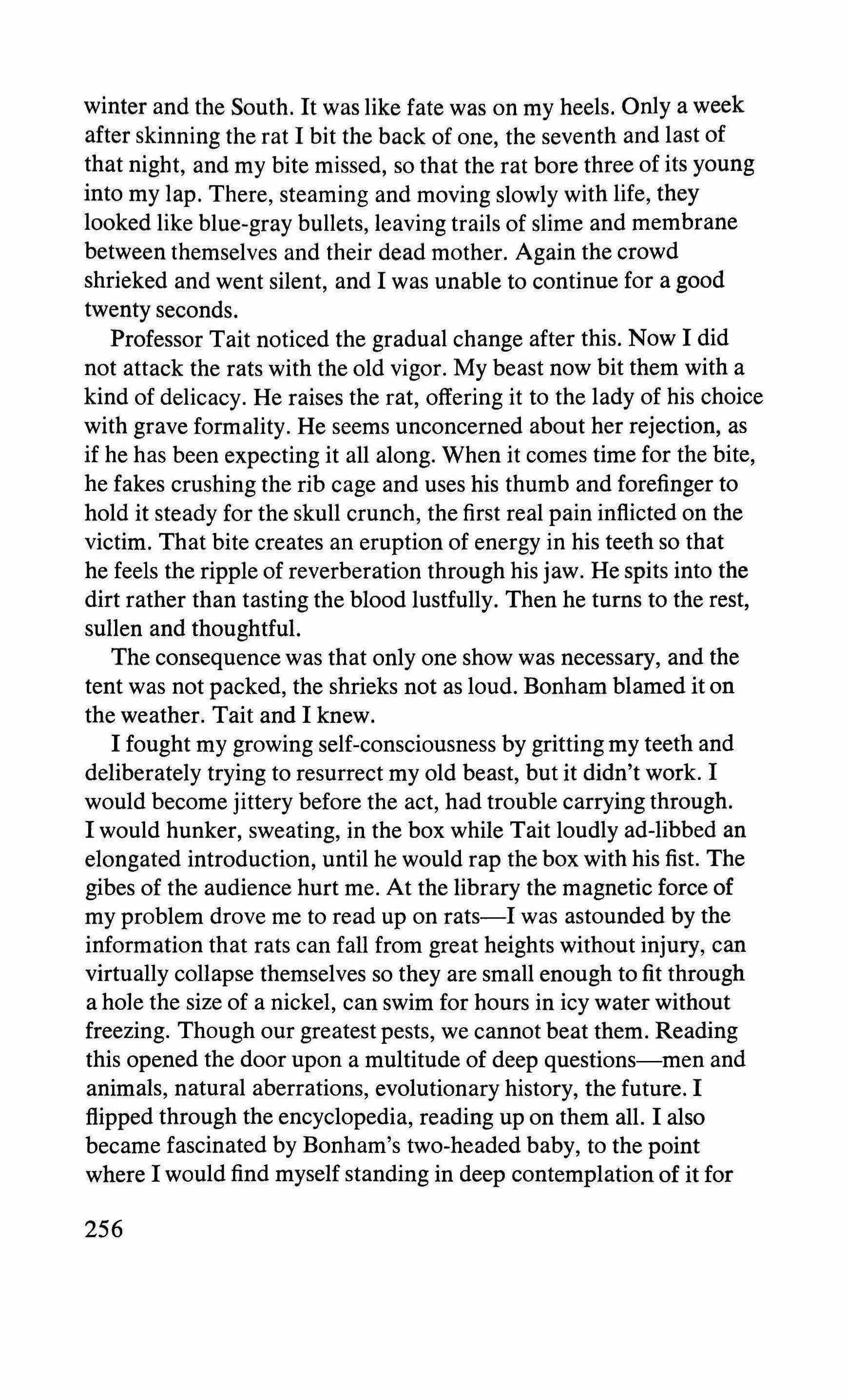
winter and the South. It was like fate was on my heels. Only a week after skinning the rat I bit the back of one, the seventh and last of that night, and my bite missed, so that the rat bore three of its young into my lap. There, steaming and moving slowly with life, they looked like blue-gray bullets, leaving trails of slime and membrane between themselves and their dead mother. Again the crowd shrieked and went silent, and I was unable to continue for a good twenty seconds.
Professor Tait noticed the gradual change after this. Now I did not attack the rats with the old vigor. My beast now bit them with a kind of delicacy. He raises the rat, offering it to the lady of his choice with grave formality. He seems unconcerned about her rejection, as if he has been expecting it all along. When it comes time for the bite, he fakes crushing the rib cage and uses his thumb and forefinger to hold it steady for the skull crunch, the first real pain inflicted on the victim. That bite creates an eruption of energy in his teeth so that he feels the ripple of reverberation through his jaw. He spits into the dirt rather than tasting the blood lustfully. Then he turns to the rest, sullen and thoughtful.
The consequence was that only one show was necessary, and the tent was not packed, the shrieks not as loud. Bonham blamed it on the weather. Tait and I knew.
I fought my growing self-consciousness by gritting my teeth and deliberately trying to resurrect myoid beast, but it didn't work. I would become jittery before the act, had trouble carryingthrough. I would hunker, sweating, in the box while Tait loudly ad-libbed an elongated introduction, until he would rap the box with his fist. The gibes of the audience hurt me. At the library the magnetic force of my problem drove me to read up on rats-I was astounded by the information that rats can fall from great heights without injury, can virtually collapse themselves so they are small enough to fit through a hole the size of a nickel, can swim for hours in icy water without freezing. Though our greatest pests, we cannot beat them. Reading this opened the door upon a multitude of deep questions-men and animals, natural aberrations, evolutionary history, the future. I flipped through the encyclopedia, reading up on them all. I also became fascinated by Bonham's two-headed baby, to the point where I would find myself standing in deep contemplation of it for
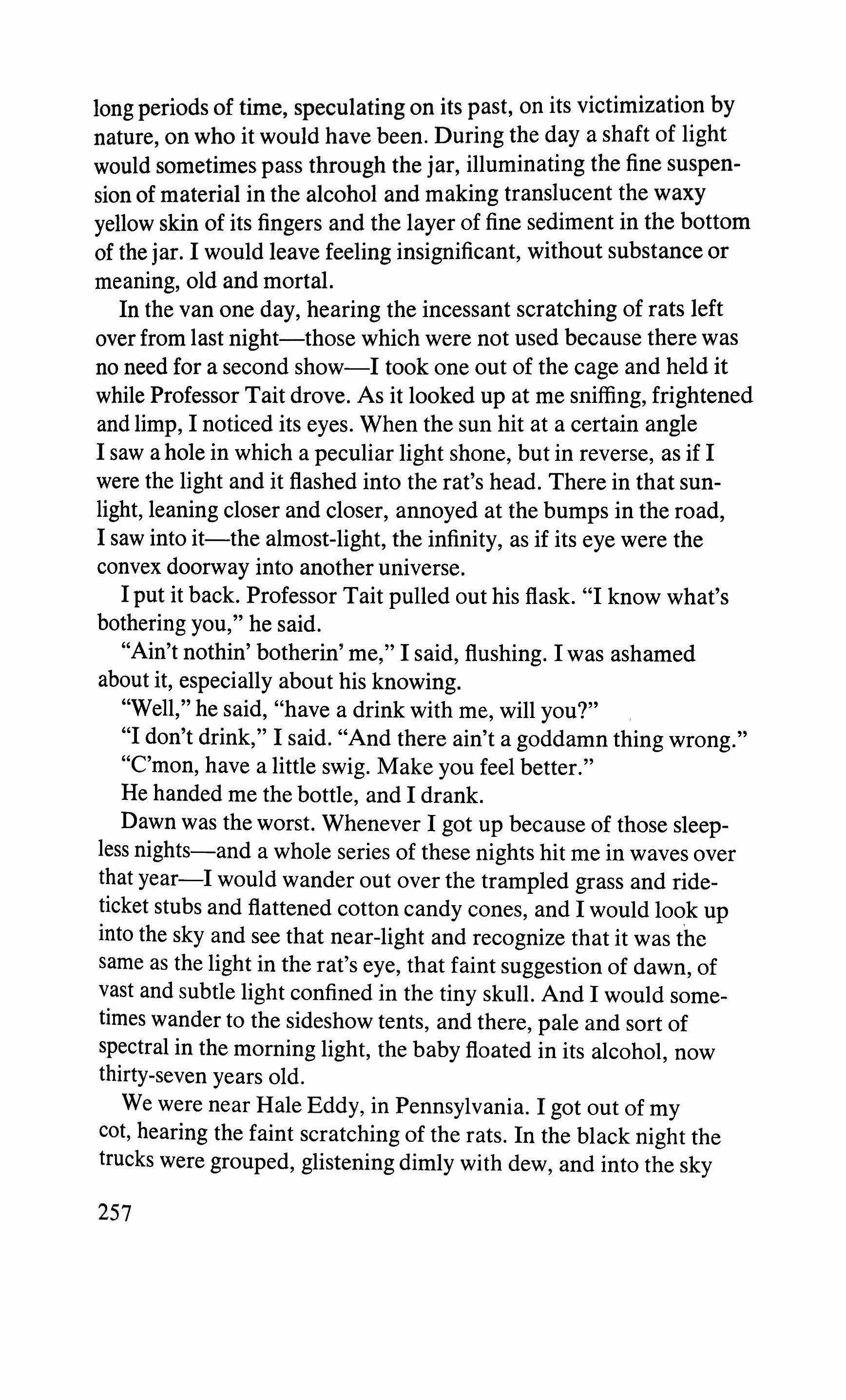
longperiods of time, speculating on its past, on its victimization by nature, on who it would have been. During the day a shaft of light would sometimes pass through the jar, illuminating the fine suspension of material in the alcohol and making translucent the waxy yellow skin of its fingers and the layer of fine sediment in the bottom of the jar. I would leave feeling insignificant, without substance or meaning, old and mortal.
In the van one day, hearing the incessant scratching of rats left over from last night-those which were not used because there was no need for a second show-I took one out of the cage and held it while Professor Tait drove. As it looked up at me sniffing, frightened and limp, I noticed its eyes. When the sun hit at a certain angle I saw a hole in which a peculiar light shone, but in reverse, as if I were the light and it flashed into the rat's head. There in that sunlight, leaning closer and closer, annoyed at the bumps in the road, I saw into it-the almost-light, the infinity, as if its eye were the convex doorway into another universe.
I put it back. Professor Tait pulled out his flask. "I know what's bothering you," he said.
"Ain't nothin' botherin' me," I said, flushing. I was ashamed about it, especially about his knowing.
"Well," he said, "have a drink with me, will you?"
"I don't drink," I said. "And there ain't a goddamn thing wrong."
"C'mon, have a little swig. Make you feel better."
He handed me the bottle, and I drank.
Dawn was the worst. Whenever I got up because of those sleepless nights-and a whole series of these nights hit me in waves over that year-I would wander out over the trampled grass and rideticket stubs and flattened cotton candy cones, and I would look up into the sky and see that near-light and recognize that it was the same as the light in the rat's eye, that faint suggestion of dawn, of vast and subtle light confined in the tiny skull. And I would sometimes wander to the sideshow tents, and there, pale and sort of spectral in the morning light, the baby floated in its alcohol, now thirty-seven years old.
We were near Hale Eddy, in Pennsylvania. I got out of my cot, hearing the faint scratching of the rats. In the black night the trucks were grouped, glistening dimly with dew, and into the sky 257
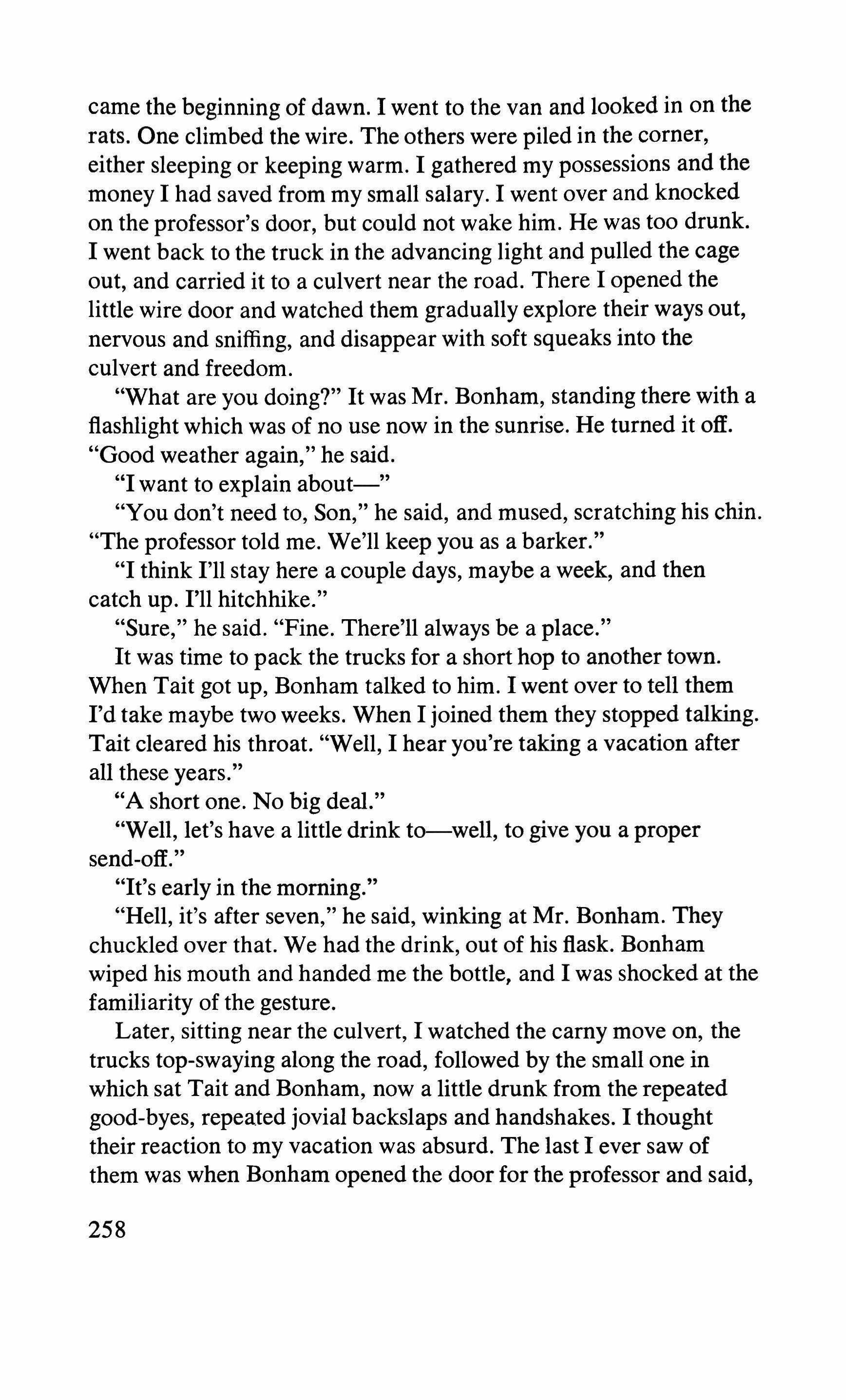
came the beginning of dawn. I went to the van and looked in on the rats. One climbed the wire. The others were piled in the corner, either sleeping or keeping warm. I gathered my possessions and the money I had saved from my small salary. I went over and knocked on the professor's door, but could not wake him. He was too drunk. I went back to the truck in the advancing light and pulled the cage out, and carried it to a culvert near the road. There I opened the little wire door and watched them gradually explore their ways out, nervous and sniffing, and disappear with soft squeaks into the culvert and freedom.
"What are you doing?" It was Mr. Bonham, standing there with a flashlight which was of no use now in the sunrise. He turned it off. "Good weather again," he said.
"I want to explain about-"
"You don't need to, Son," he said, and mused, scratching his chin. "The professor told me. We'll keep you as a barker."
"I think I'll stay here a couple days, maybe a week, and then catch up. I'll hitchhike."
"Sure," he said. "Fine. There'll always be a place."
It was time to pack the trucks for a short hop to another town. When Tait got up, Bonham talked to him. I went over to tell them I'd take maybe two weeks. When I joined them they stopped talking. Tait cleared his throat. "Well, I hear you're taking a vacation after all these years."
"A short one. No big deal."
"Well, let's have a little drink to-well, to give you a proper send-off.
"It's early in the morning."
"Hell, it's after seven," he said, winking at Mr. Bonham. They chuckled over that. We had the drink, out of his flask. Bonham wiped his mouth and handed me the bottle, and I was shocked at the familiarity of the gesture.
Later, sitting near the culvert, I watched the carny move on, the trucks top-swaying along the road, followed by the small one in which sat Tait and Bonham, now a little drunk from the repeated good-byes, repeated jovial backslaps and handshakes. I thought their reaction to my vacation was absurd. The last I ever saw of them was when Bonham opened the door for the professor and said, 258
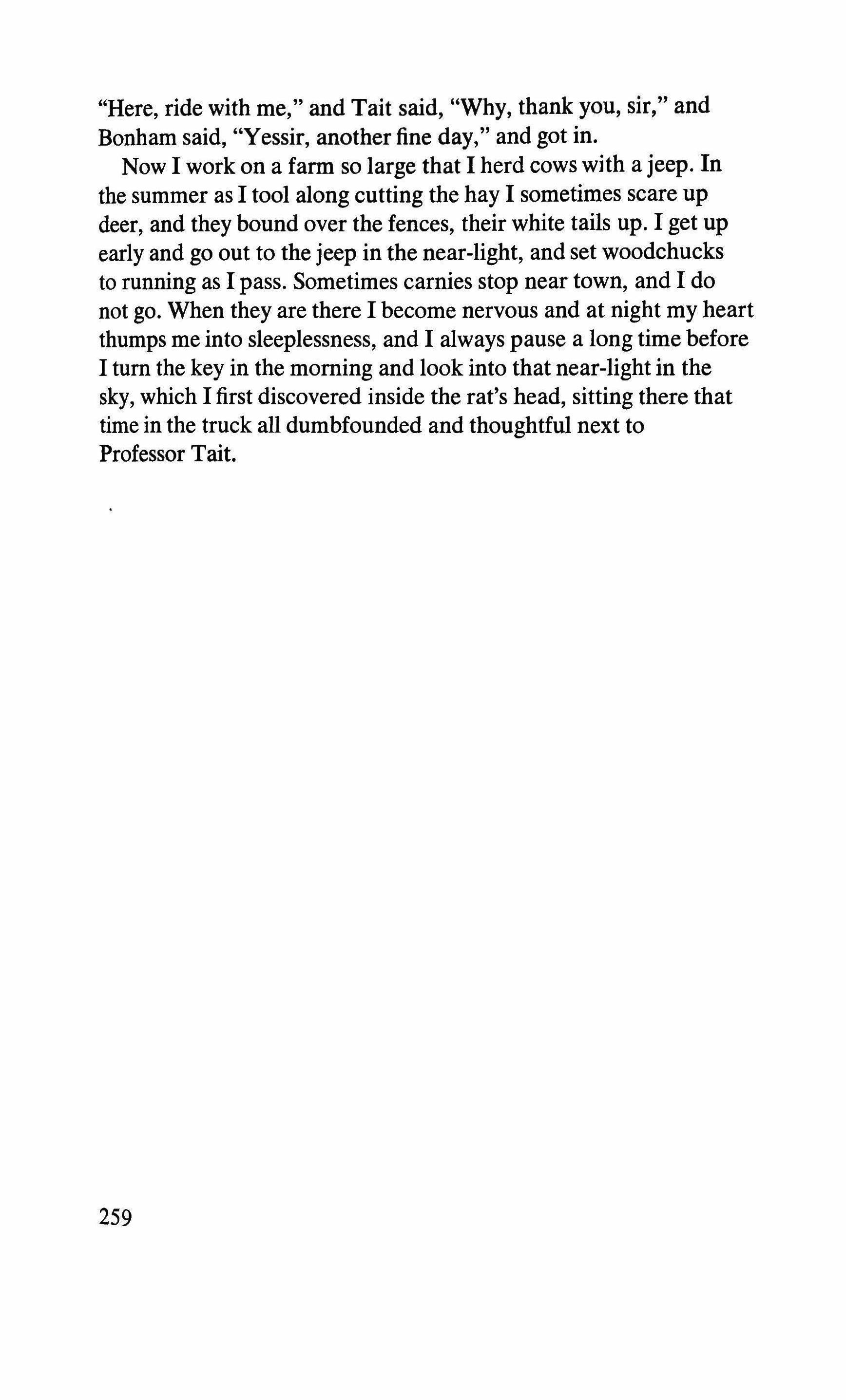
"Here, ride with me," and Tait said, "Why, thank you, sir," and Bonham said, "Yessir, another fine day," and got in.
Now I work on a farm so large that I herd cows with a jeep. In the summer as I tool along cutting the hay I sometimes scare up deer, and they bound over the fences, their white tails up. I get up early and go out to the jeep in the near-light, and set woodchucks to running as I pass. Sometimes carnies stop near town, and I do not go. When they are there I become nervous and at night my heart thumps me into sleeplessness, and I always pause a long time before I tum the key in the morning and look into that near-light in the sky, which I first discovered inside the rat's head, sitting there that time in the truck all dumbfounded and thoughtful next to Professor Tait.
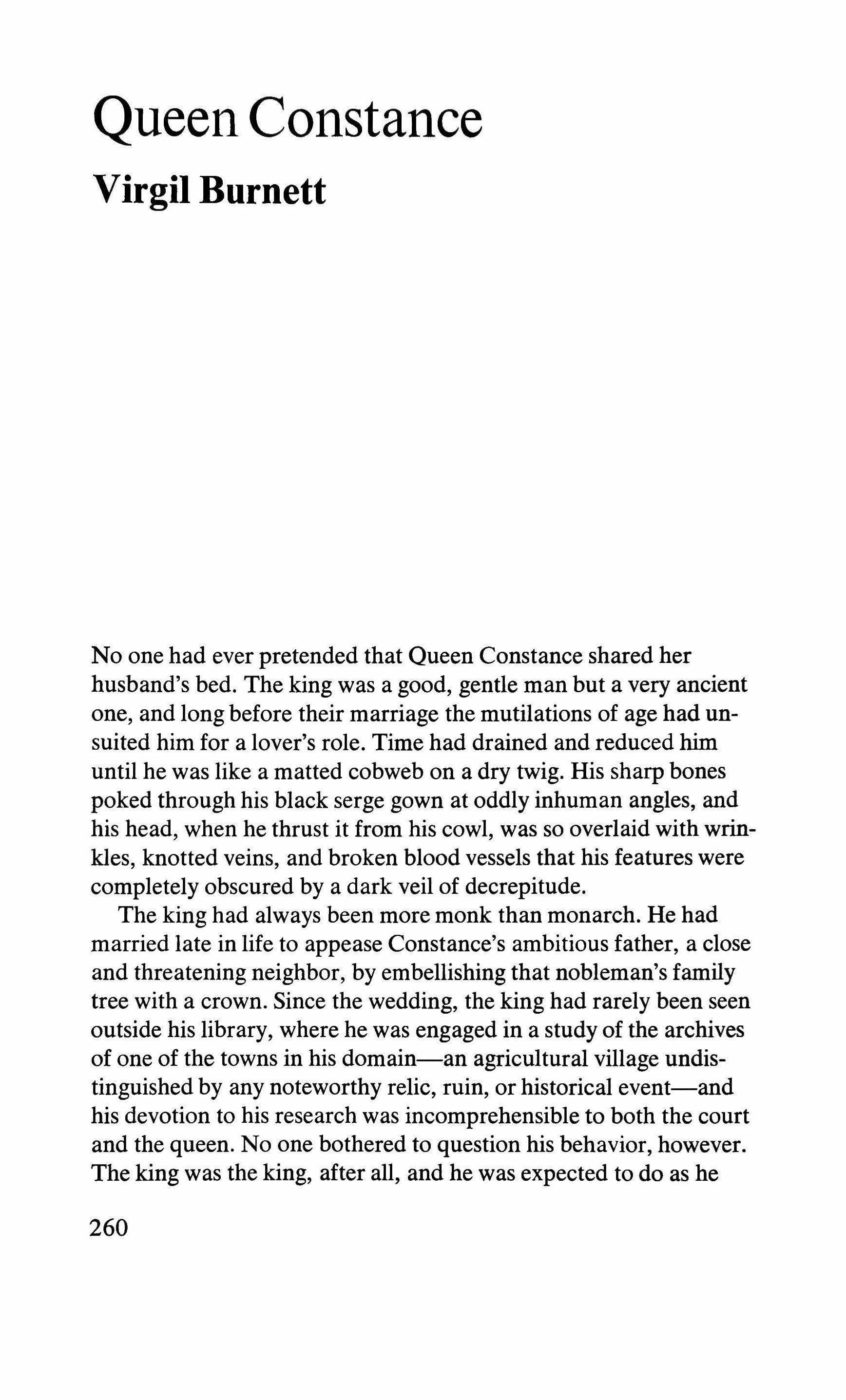
No one had ever pretended that Queen Constance shared her husband's bed. The king was a good, gentle man but a very ancient one, and long before their marriage the mutilations of age had unsuited him for a lover's role. Time had drained and reduced him until he was like a matted cobweb on a dry twig. His sharp bones poked through his black serge gown at oddly inhuman angles, and his head, when he thrust it from his cowl, was so overlaid with wrinkles, knotted veins, and broken blood vessels that his features were completely obscured by a dark veil of decrepitude.
The king had always been more monk than monarch. He had married late in life to appease Constance's ambitious father, a close and threatening neighbor, by embellishing that nobleman's family tree with a crown. Since the wedding, the king had rarely been seen outside his library, where he was engaged in a study of the archives of one of the towns in his domain-an agricultural village undistinguishedby any noteworthy relic, ruin, or historical event-and his devotion to his research was incomprehensible to both the court and the queen. No one bothered to question his behavior, however. The king was the king, after all, and he was expected to do as he
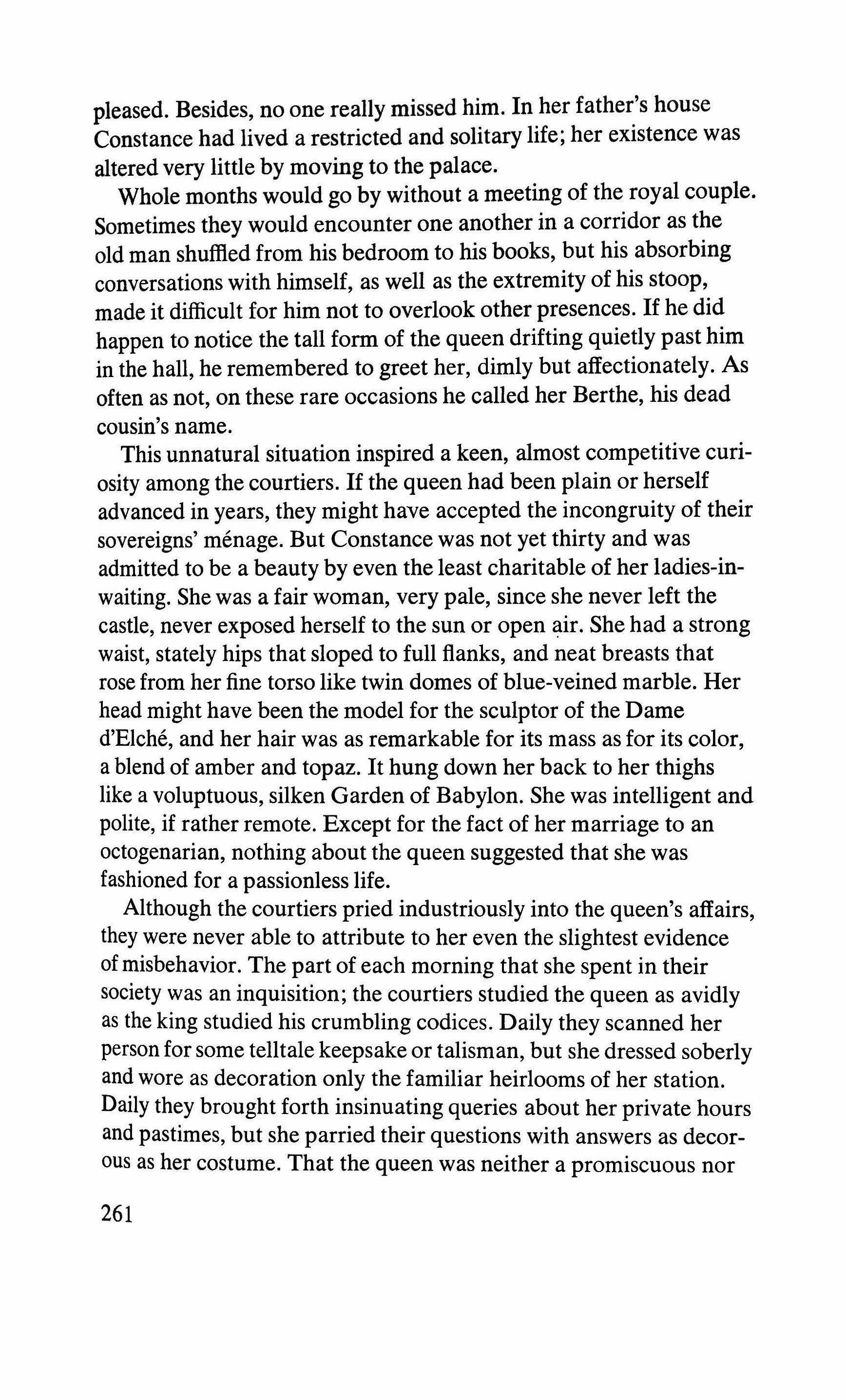
pleased. Besides, no one really missed him. In her father's house Constance had lived a restricted and solitary life; her existence was altered very little by moving to the palace.
Whole months would go by without a meeting of the royal couple. Sometimes they would encounter one another in a corridor as the old man shuffled from his bedroom to his books, but his absorbing conversations with himself, as well as the extremity of his stoop, made it difficult for him not to overlook other presences. If he did happen to notice the tall form of the queen drifting quietly past him in the hall, he remembered to greet her, dimly but affectionately. As often as not, on these rare occasions he called her Berthe, his dead cousin's name.
This unnatural situation inspired a keen, almost competitive curiosity among the courtiers. If the queen had been plain or herself advanced in years, they might have accepted the incongruity of their sovereigns' menage. But Constance was not yet thirty and was admitted to be a beauty by even the least charitable of her ladies-inwaiting. She was a fair woman, very pale, since she never left the castle, never exposed herself to the sun or open air. She had a strong waist, stately hips that sloped to full flanks, and neat breasts that rose from her fine torso like twin domes of blue-veined marble. Her head might have been the model for the sculptor of the Dame d'Elche, and her hair was as remarkable for its mass as for its color, a blend of amber and topaz. It hung down her back to her thighs like a voluptuous, silken Garden of Babylon. She was intelligent and polite, if rather remote. Except for the fact of her marriage to an octogenarian, nothing about the queen suggested that she was fashioned for a passionless life.
Although the courtiers pried industriously into the queen's affairs, they were never able to attribute to her even the slightest evidence of misbehavior. The part of each morning that she spent in their society was an inquisition; the courtiers studied the queen as avidly as the king studied his crumbling codices. Daily they scanned her person for some telltale keepsake or talisman, but she dressed soberly and wore as decoration only the familiar heirlooms of her station. Daily they brought forth insinuating queries about her private hours and pastimes, but she parried their questions with answers as decorous as her costume. That the queen was neither a promiscuous nor
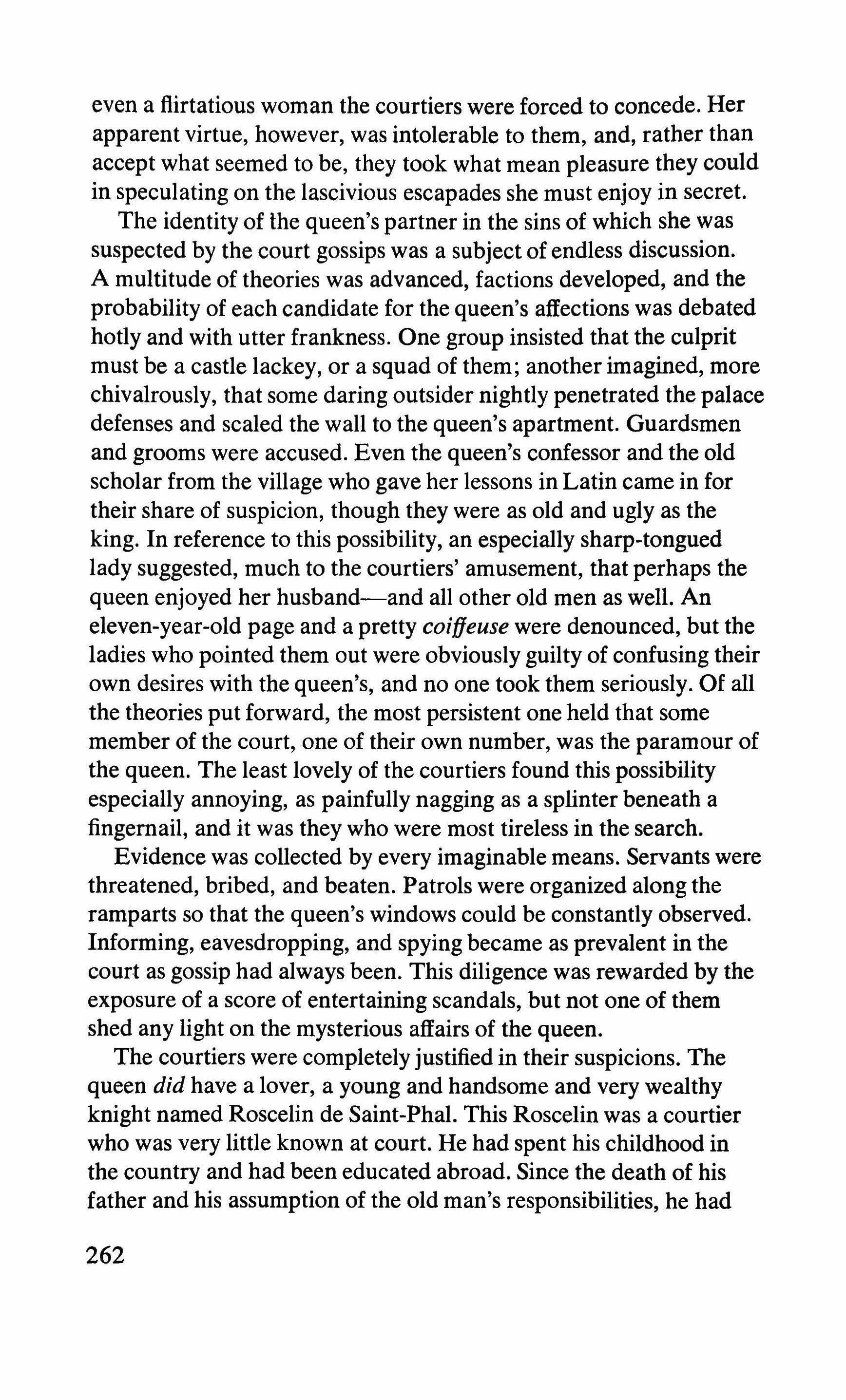
even a flirtatious woman the courtiers were forced to concede. Her apparent virtue, however, was intolerable to them, and, rather than accept what seemed to be, they took what mean pleasure they could in speculating on the lascivious escapades she must enjoy in secret. The identity of the queen's partner in the sins of which she was suspected by the court gossips was a subject of endless discussion. A multitude of theories was advanced, factions developed, and the probability of each candidate for the queen's affections was debated hotly and with utter frankness. One group insisted that the culprit must be a castle lackey, or a squad of them; another imagined, more chivalrously, that some daring outsider nightly penetrated the palace defenses and scaled the wall to the queen's apartment. Guardsmen and grooms were accused. Even the queen's confessor and the old scholar from the village who gave her lessons in Latin came in for their share of suspicion, though they were as old and ugly as the king. In reference to this possibility, an especially sharp-tongued lady suggested, much to the courtiers' amusement, that perhaps the queen enjoyed her husband-and all other old men as well. An eleven-year-old page and a pretty coiffeuse were denounced, but the ladies who pointed them out were obviously guilty of confusing their own desires with the queen's, and no one took them seriously. Of all the theories put forward, the most persistent one held that some member of the court, one of their own number, was the paramour of the queen. The least lovely of the courtiers found this possibility especially annoying, as painfully nagging as a splinter beneath a fingernail, and it was they who were most tireless in the search.
Evidence was collected by every imaginable means. Servants were threatened, bribed, and beaten. Patrols were organized along the ramparts so that the queen's windows could be constantly observed. Informing, eavesdropping, and spying became as prevalent in the court as gossip had always been. This diligence was rewarded by the exposure of a score of entertaining scandals, but not one of them shed any light on the mysterious affairs of the queen. The courtiers were completelyjustified in their suspicions. The queen did have a lover, a young and handsome and very wealthy knight named Roscelin de Saint-Phal, This Roscelin was a courtier who was very little known at court. He had spent his childhood in the country and had been educated abroad. Since the death of his father and his assumption of the old man's responsibilities, he had
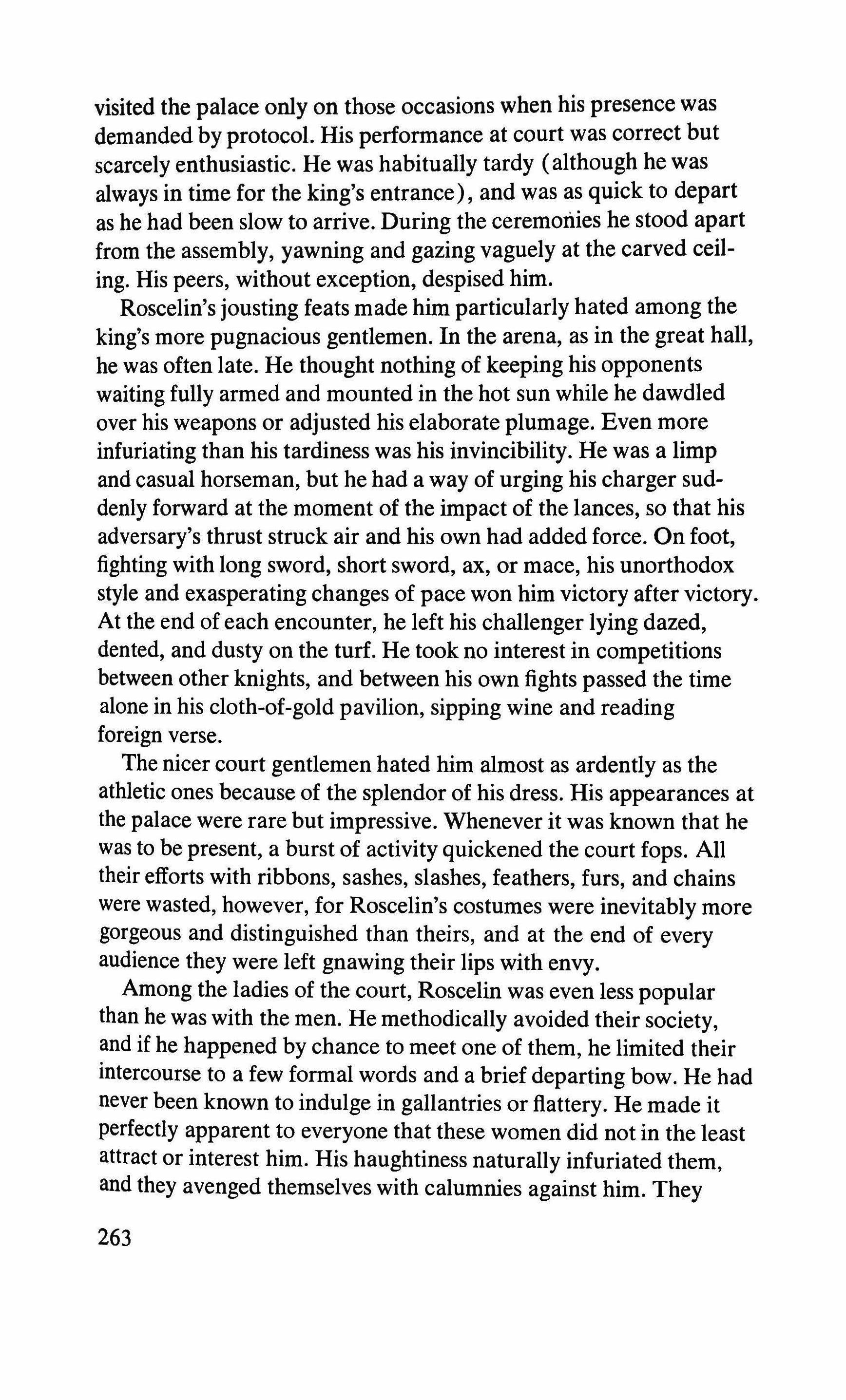
visited the palace only on those occasions when his presence was demanded byprotocol. His performance at court was correct but scarcely enthusiastic. He was habitually tardy (although he was always in time for the king's entrance), and was as quick to depart as he had been slow to arrive. During the ceremonies he stood apart from the assembly, yawning and gazing vaguely at the carved ceiling. His peers, without exception, despised him.
Roscelin's jousting feats made him particularly hated among the king's more pugnacious gentlemen. In the arena, as in the great hall, he was often late. He thought nothing of keeping his opponents waiting fully armed and mounted in the hot sun while he dawdled over his weapons or adjusted his elaborate plumage. Even more infuriating than his tardiness was his invincibility. He was a limp and casual horseman, but he had a way of urging his charger suddenly forward at the moment of the impact of the lances, so that his adversary's thrust struck air and his own had added force. On foot, fighting with long sword, short sword, ax, or mace, his unorthodox style and exasperating changes of pace won him victory after victory. At the end of each encounter, he left his challenger lying dazed, dented, and dusty on the turf. He took no interest in competitions between other knights, and between his own fights passed the time alone in his cloth-of-gold pavilion, sipping wine and reading foreign verse.
The nicer court gentlemen hated him almost as ardently as the athletic ones because of the splendor of his dress. His appearances at the palace were rare but impressive. Whenever it was known that he was to be present, a burst of activity quickened the court fops. All their efforts with ribbons, sashes, slashes, feathers, furs, and chains were wasted, however, for Roscelin's costumes were inevitably more gorgeous and distinguished than theirs, and at the end of every audience they were left gnawing their lips with envy.
Among the ladies of the court, Roscelin was even less popular than he was with the men. He methodically avoided their society, and if he happened by chance to meet one of them, he limited their intercourse to a few formal words and a brief departing bow. He had never been known to indulge in gallantries or flattery. He made it perfectly apparent to everyone that these women did not in the least attract or interest him. His haughtiness naturally infuriated them, and they avenged themselves with calumnies against him. They

never tired of pointing out to whoever would listen that a man so insensitive to their charms must be either impotent or perverse. If they had been less provincial, they would have heard stories to quiet their rumor-mongering, for Roscelin's amorous exploits had made him notorious in courts from Burgos to Czerwinck. He was neither cold to women nor incapable of serving them; he was merely fastidious.
This air of superiority made Roscelin the one member of the court who was above, or perhaps beneath, suspicion of adultery with the queen. The courtiers were unanimously of the opinion that he was far too self-obsessed to devote his time and energy to a love affair, particularly to one so demanding as this must necessarily be. But the courtiers were mistaken; they were misled by the exaggeration of Roscelin's manner and the poverty of their own imaginations. What they interpreted as ridiculous vanity was in fact an artful pose. Behind the mask of egotism Roscelin concealed the depth of his feeling and the complete seriousness of his intentions.
Shortly after returning home from his years of wandering, Roscelin had been commanded to be present at the king's wedding. His first sight of Constance was in the cathedral as she knelt in her robes of state, patiently reciting to her aged husband the words that were to make a prison of her life. Throughout the tedious ceremony, Roscelin watched her blonde head softly reflecting the light of the altar candles. When finally the new queen and the old king rose and passed in noble procession out of the church, Roscelin remained behind. For hours he paced the dim ambulatory, studying, it seemed, the infinite complexities of its Cosmatesque pavement. Behind his regular footfall, his c1oak-a vast sail of gold brocade and wolf pelts-hissed intermittently across the tesserae. He stood still at last on the grave slab of a knight from some immemorial epoch. Still visible in the worn stone was an effigy, a faint engravingpolished in places to perfect blankness. Roscelin, motionless for the first time since the cathedral had emptied, pondered the wan image in the floor and seemed to recognize in it a colleague. Before he left he spoke to it, confided in it, explained to it his impossible but irrevocable passion for the queen.
For more than year Roscelin did not approach her. He occupied himself with riding and exercising with his weapons or, more dangerously, with sour brooding in his house. During these painful
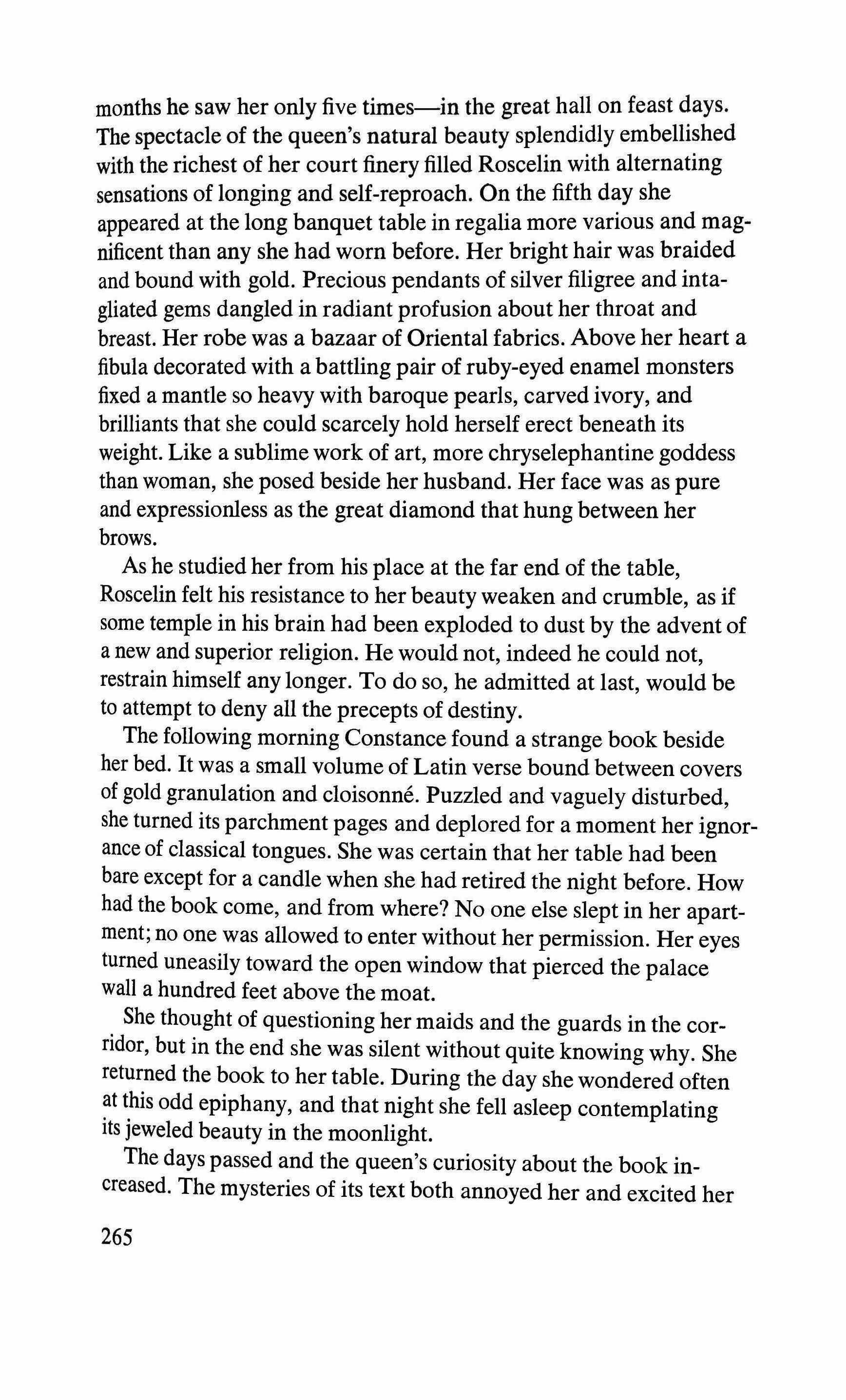
months he saw her only five times-in the great hall on feast days. The spectacle of the queen's natural beauty splendidly embellished with the richest of her court finery filled Roscelin with alternating sensations of longing and self-reproach. On the fifth day she appeared at the long banquet table in regalia more various and magnificent than any she had worn before. Her bright hair was braided and bound with gold. Precious pendants of silver filigree and intagliated gems dangled in radiant profusion about her throat and breast. Her robe was a bazaar of Oriental fabrics. Above her heart a fibula decorated with a battling pair of ruby-eyed enamel monsters fixed a mantle so heavy with baroque pearls, carved ivory, and brilliants that she could scarcely hold herself erect beneath its weight. Like a sublime work of art, more chryselephantine goddess than woman, she posed beside her husband. Her face was as pure and expressionless as the great diamond that hung between her brows.
As he studied her from his place at the far end of the table, Roscelin felt his resistance to her beauty weaken and crumble, as if some temple in his brain had been exploded to dust by the advent of a new and superior religion. He would not, indeed he could not, restrain himself any longer. To do so, he admitted at last, would be to attempt to deny all the precepts of destiny.
The following morning Constance found a strange book beside her bed. It was a small volume of Latin verse bound between covers of gold granulation and cloisonne. Puzzled and vaguely disturbed, she turned its parchment pages and deplored for a moment her ignorance of classical tongues. She was certain that her table had been bare except for a candle when she had retired the night before. How had the book come, and from where? No one else slept in her apartment; no one was allowed to enter without her permission. Her eyes turned uneasily toward the open window that pierced the palace wall a hundred feet above the moat.
She thought of questioning her maids and the guards in the corridor, but in the end she was silent without quite knowing why. She returned the book to her table. During the day she wondered often at this odd epiphany, and that night she fell asleep contemplating its jeweled beauty in the moonlight.
The days passed and the queen's curiosity about the book increased. The mysteries of its text both annoyed her and excited her
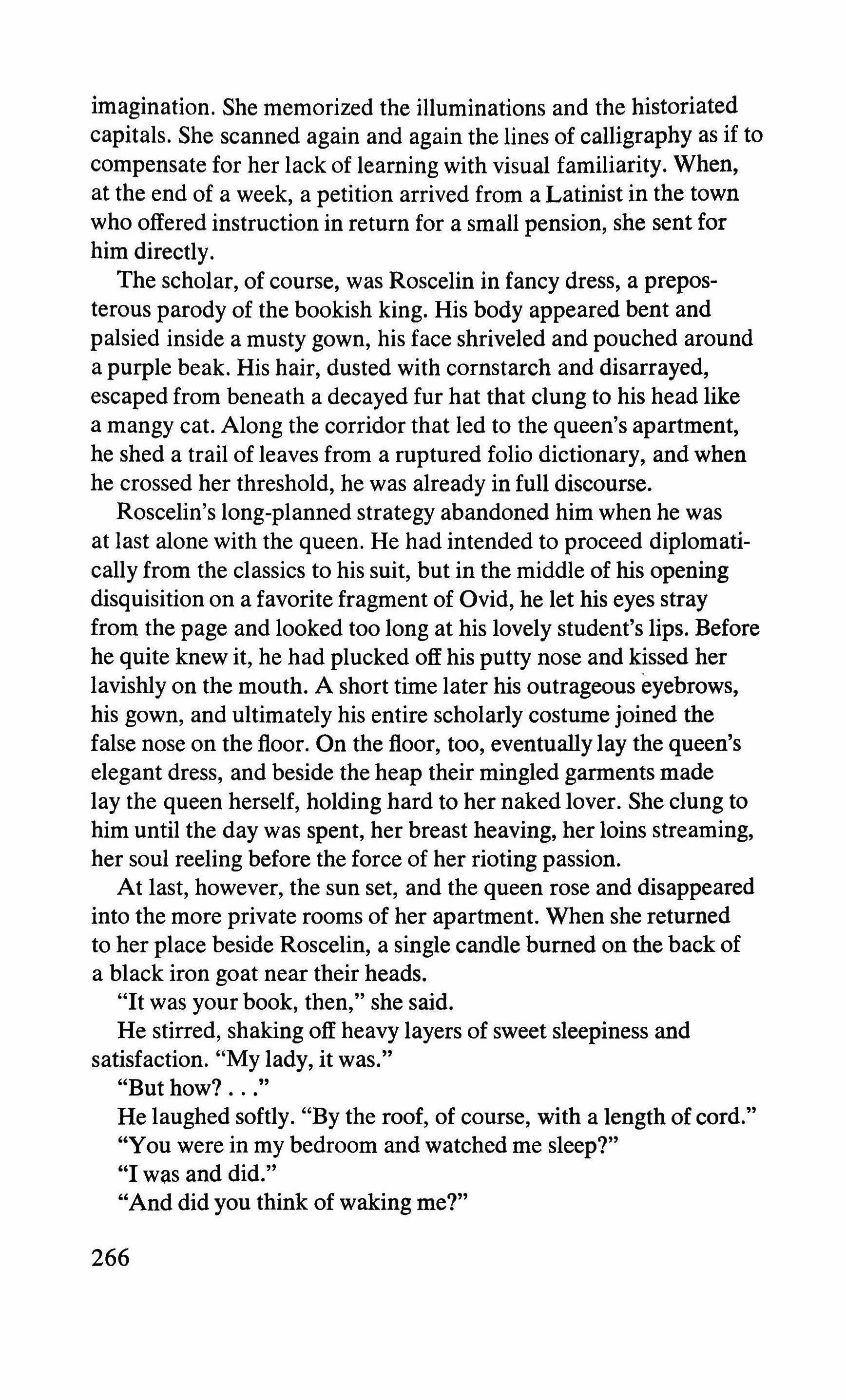
imagination. She memorized the illuminations and the historiated capitals. She scanned again and again the lines of calligraphy as if to compensate for her lack of learning with visual familiarity. When, at the end of a week, a petition arrived from a Latinist in the town who offered instruction in return for a small pension, she sent for him directly.
The scholar, of course, was Roscelin in fancy dress, a preposterous parody of the bookish king. His body appeared bent and palsied inside a musty gown, his face shriveled and pouched around a purple beak. His hair, dusted with cornstarch and disarrayed, escaped from beneath a decayed fur hat that clung to his head like a mangy cat. Along the corridor that led to the queen's apartment, he shed a trail of leaves from a ruptured folio dictionary, and when he crossed her threshold, he was already in full discourse.
Roscelin's long-planned strategy abandoned him when he was at last alone with the queen. He had intended to proceed diplomatically from the classics to his suit, but in the middle of his opening disquisition on a favorite fragment of Ovid, he let his eyes stray from the page and looked too long at his lovely student's lips. Before he quite knew it, he had plucked off his putty nose and kissed her lavishly on the mouth. A short time later his outrageous eyebrows, his gown, and ultimately his entire scholarly costume joined the false nose on the floor. On the floor, too, eventuallylay the queen's elegant dress, and beside the heap their mingled garments made lay the queen herself, holding hard to her naked lover. She clung to him until the day was spent, her breast heaving, her loins streaming, her soul reeling before the force of her rioting passion.
At last, however, the sun set, and the queen rose and disappeared into the more private rooms of her apartment. When she returned to her place beside Roscelin, a single candle burned on the back of a black iron goat near their heads.
"It was your book, then," she said.
He stirred, shaking off heavy layers of sweet sleepiness and satisfaction. "My lady, it was."
"But how?
He laughed softly. "By the roof, of course, with a length of cord."
"You were in my bedroom and watched me sleep?"
"I was and did."
"And did you think of waking me?"
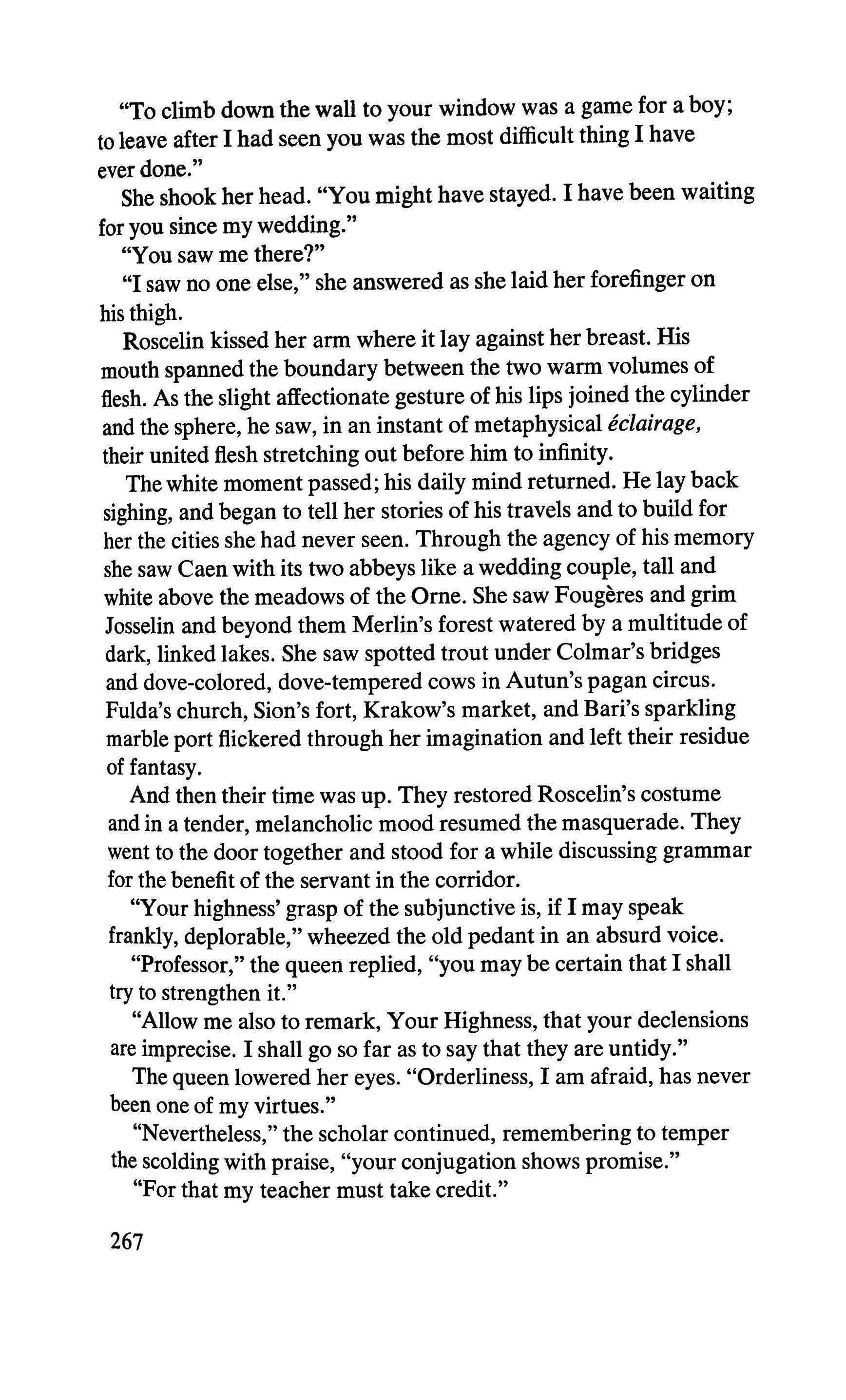
"To climb down the wall to your window was a game for a boy; to leave after 1 had seen you was the most difficult thing 1 have ever done."
She shook her head. "You might have stayed. 1 have been waiting for you since my wedding."
"You saw me there?"
"I saw no one else," she answered as she laid her forefinger on his thigh.
Roscelin kissed her arm where it lay against her breast. His mouth spanned the boundary between the two warm volumes of flesh. As the slight affectionate gesture of his lips joined the cylinder and the sphere, he saw, in an instant of metaphysical eclairage, their united flesh stretching out before him to infinity.
The white moment passed; his daily mind returned. He lay back sighing, and began to tell her stories of his travels and to build for her the cities she had never seen. Through the agency of his memory she saw Caen with its two abbeys like a wedding couple, tall and white above the meadows of the Orne. She saw Fougeres and grim Josselin and beyond them Merlin's forest watered by a multitude of dark, linked lakes. She saw spotted trout under Colmar's bridges and dove-colored, dove-tempered cows in Autun's pagan circus. Fulda's church, Sion's fort, Krakow's market, and Bari's sparkling marble port flickered through her imagination and left their residue of fantasy.
And then their time was up. They restored Roscelin's costume and in a tender, melancholic mood resumed the masquerade. They went to the door together and stood for a while discussing grammar for the benefit of the servant in the corridor.
"Your highness' grasp of the subjunctive is, if I may speak frankly, deplorable," wheezed the old pedant in an absurd voice.
"Professor," the queen replied, "you may be certain that I shall try to strengthen it."
"Allow me also to remark, Your Highness, that your declensions are imprecise. I shall go so far as to say that they are untidy."
The queen lowered her eyes. "Orderliness, I am afraid, has never been one of my virtues."
"Nevertheless," the scholar continued, remembering to temper the scolding with praise, "your conjugation shows promise."
"For that my teacher must take credit."
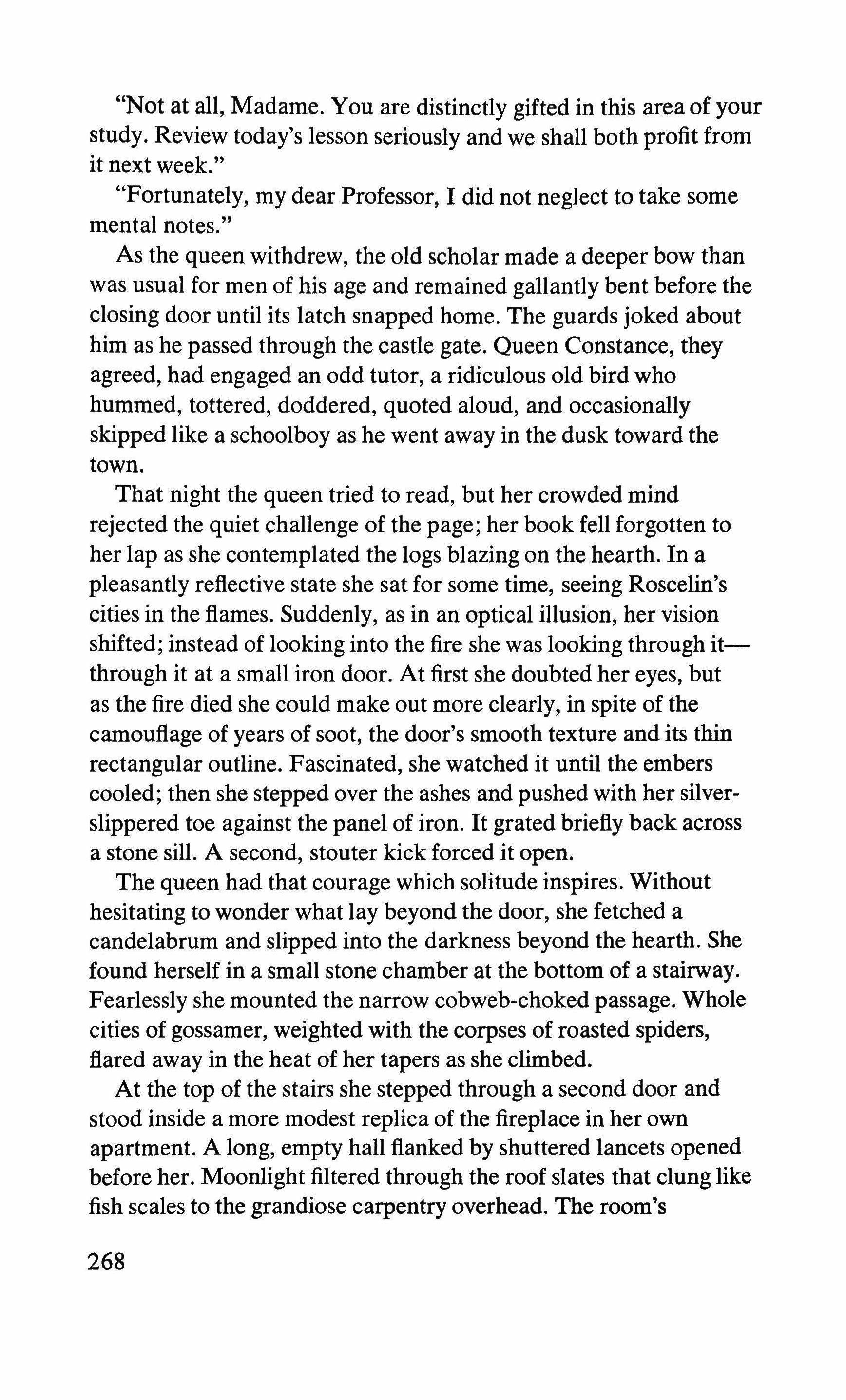
"Not at all, Madame. You are distinctly gifted in this area of your study. Review today's lesson seriously and we shall both profit from it next week."
"Fortunately, my dear Professor, I did not neglect to take some mental notes."
As the queen withdrew, the old scholar made a deeper bow than was usual for men of his age and remained gallantly bent before the closing door until its latch snapped home. The guards joked about him as he passed through the castle gate. Queen Constance, they agreed, had engaged an odd tutor, a ridiculous old bird who hummed, tottered, doddered, quoted aloud, and occasionally skipped like a schoolboy as he went away in the dusk toward the town.
That night the queen tried to read, but her crowded mind rejected the quiet challenge of the page; her book fell forgotten to her lap as she contemplated the logs blazing on the hearth. In a pleasantly reflective state she sat for some time, seeing Roscelin's cities in the flames. Suddenly, as in an optical illusion, her vision shifted; instead of looking into the fire she was looking through itthrough it at a small iron door. At first she doubted her eyes, but as the fire died she could make out more clearly, in spite of the camouflage of years of soot, the door's smooth texture and its thin rectangular outline. Fascinated, she watched it until the embers cooled; then she stepped over the ashes and pushed with her silverslippered toe against the panel of iron. It grated briefly back across a stone sill. A second, stouter kick forced it open.
The queen had that courage which solitude inspires. Without hesitating to wonder what lay beyond the door, she fetched a candelabrum and slipped into the darkness beyond the hearth. She found herself in a small stone chamber at the bottom of a stairway. Fearlessly she mounted the narrow cobweb-choked passage. Whole cities of gossamer, weighted with the corpses of roasted spiders, flared away in the heat of her tapers as she climbed.
At the top of the stairs she stepped through a second door and stood inside a more modest replica of the fireplace in her own apartment. A long, empty hall flanked by shuttered lancets opened before her. Moonlight filtered through the roof slates that clung like fish scales to the grandiose carpentry overhead. The room's
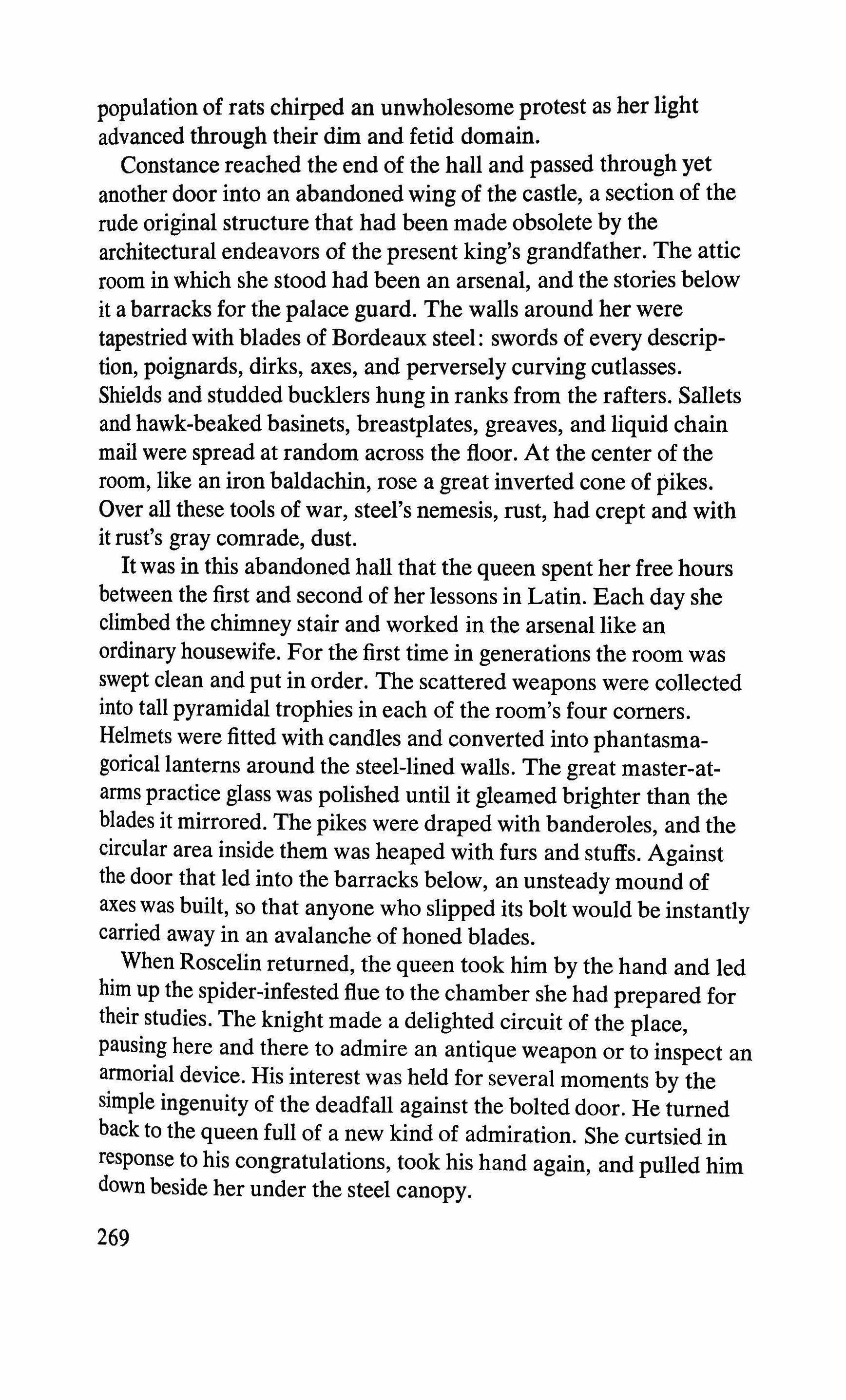
population of rats chirped an unwholesome protest as her light advanced through their dim and fetid domain.
Constance reached the end of the hall and passed through yet another door into an abandoned wing of the castle, a section of the rude original structure that had been made obsolete by the architectural endeavors of the present king's grandfather. The attic room in which she stood had been an arsenal, and the stories below it a barracks for the palace guard. The walls around her were tapestried with blades of Bordeaux steel: swords of every description, poignards, dirks, axes, and perversely curving cutlasses. Shields and studded bucklers hung in ranks from the rafters. Sallets and hawk-beaked basinets, breastplates, greaves, and liquid chain mail were spread at random across the floor. At the center of the room, like an iron baldachin, rose a great inverted cone of pikes. Over all these tools of war, steel's nemesis, rust, had crept and with it rust's gray comrade, dust.
It was in this abandoned hall that the queen spent her free hours between the first and second of her lessons in Latin. Each day she climbed the chimney stair and worked in the arsenal like an ordinary housewife. For the first time in generations the room was swept clean and put in order. The scattered weapons were collected into tall pyramidal trophies in each of the room's four corners. Helmets were fitted with candles and converted into phantasmagoricallanterns around the steel-lined walls. The great master-atarms practice glass was polished until it gleamed brighter than the blades it mirrored. The pikes were draped with banderoles, and the circular area inside them was heaped with furs and stuffs. Against the door that led into the barracks below, an unsteady mound of axes was built, so that anyone who slipped its bolt would be instantly carried away in an avalanche of honed blades.
When Roscelin returned, the queen took him by the hand and led him up the spider-infested flue to the chamber she had prepared for their studies. The knight made a delighted circuit of the place, pausing here and there to admire an antique weapon or to inspect an armorial device. His interest was held for several moments by the simple ingenuity of the deadfall against the bolted door. He turned back to the queen full of a new kind of admiration. She curtsied in response to his congratulations, took his hand again, and pulled him down beside her under the steel canopy.

They repeated their earlier lesson with excurses and elaborations. Constance was untutored but eager to learn; she went to her lover as avidly as a backcountry scholar to his first great library, and advanced rapidly in the academy of lust. Roscelin took his pleasure gently and applauded the least of his mistress's lascivious experiments. In time her initial courage blossomed into a proud sensual virtuosity that provided them both with pleasures more ample and intense than had been held out to them in even their most complicated fantasies.
It was inevitable that their lovemaking, if it were to last at all, would be exceptional. At the outset the omnipresent dangers of the liaison established around them an atmosphere of strange melodrama. If they had heeded the myriad threats confronting them, the affair would have quickly expired in a net of suspicion and fear. The danger was irrefutable, but after their first embrace they elected to ignore it. Outside the queen's door, extreme caution was necessary, but when they were together in their secret bedchamber they let the tone of the room permeate their sensibilities, and every moment that they shared seemed as unreal and grotesque as the abandoned armory itself.
Thus their afternoons became a bizarre succession of charades. Partly in an attempt to obscure all that was ominous in their situation, and partly in recognition of its extravagance, they competed in displays of libertine caprice and vanity. They mimed and danced among the trophies. They devised sinister games of cachecache. They dressed in nightmarish costumes culled from the queen's wardrobe and the lockers of dead guardsmen. On one brilliant occasion, Roscelin delighted the queen by stepping from behind an arras wearing the skin of a bear; on another even more memorable day, Constance greeted her lover clad magnificently in nothing but the crown jewels.
When their theatrical invention flagged, they armed themselves with clubs and hunted rats in the empty hall outside. They beat through the archaic trash that littered the floor until their rooting weapons found a heap of huddled bodies. The rats were wary but when one was goaded it would .come out and rush, bare fanged and squealing, into the hunters' range. Sometimes a whole assembly of the creatures would be aroused. In the stampede that followed, the clubs were inefficient and the hunters would leap among the
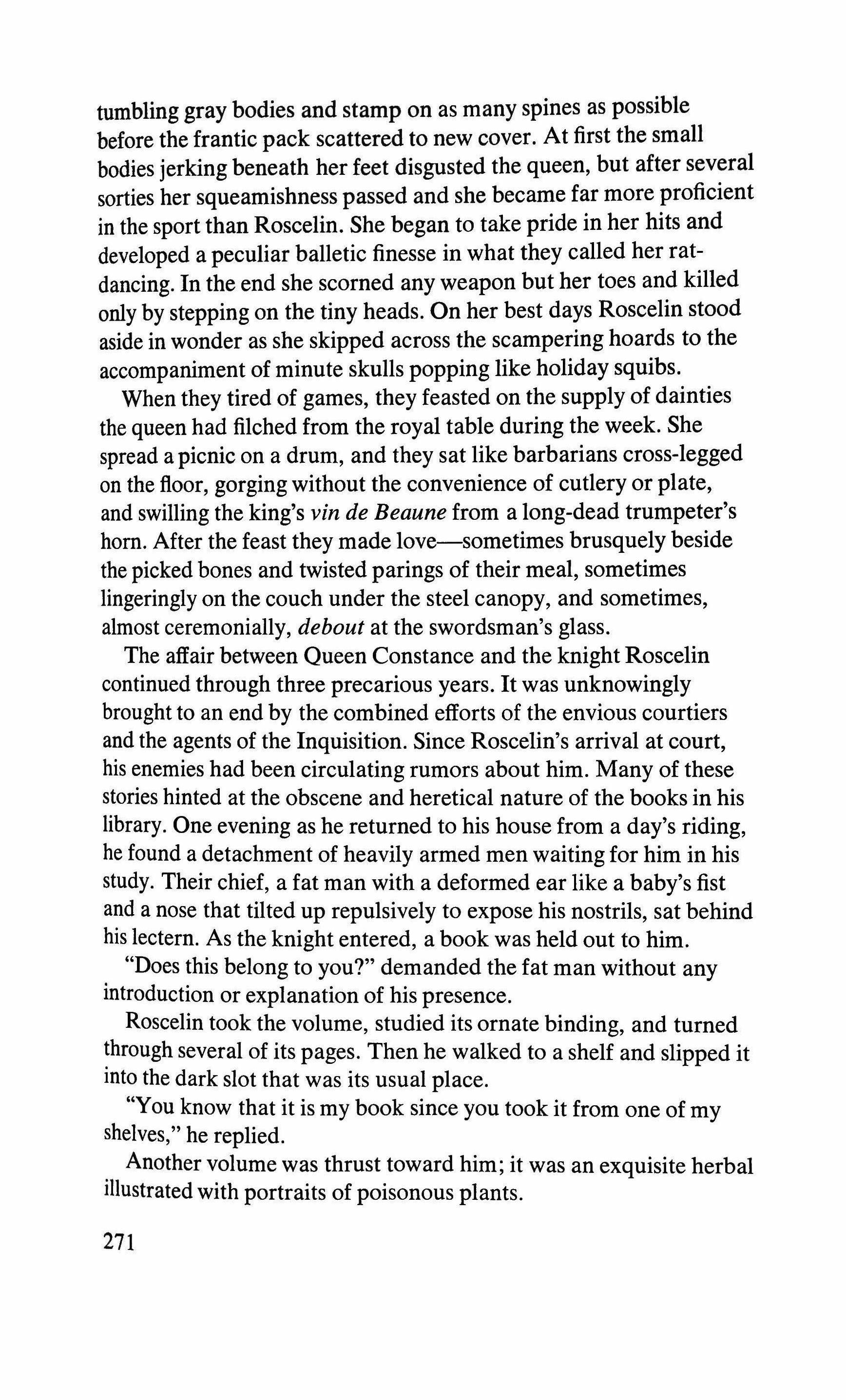
tumbling gray bodies and stamp on as many spines as possible before the frantic pack scattered to new cover. At first the small bodies jerking beneath her feet disgusted the queen, but after several sorties her squeamishness passed and she became far more proficient in the sport than Roscelin. She began to take pride in her hits and developed a peculiar balletic finesse in what they called her ratdancing. In the end she scorned any weapon but her toes and killed only by stepping on the tiny heads. On her best days Roscelin stood aside in wonder as she skipped across the scampering hoards to the accompaniment of minute skulls popping like holiday squibs.
When they tired of games, they feasted on the supply of dainties the queen had filched from the royal table during the week. She spread a picnic on a drum, and they sat like barbarians cross-legged on the floor, gorging without the convenience of cutlery or plate, and swilling the king's vin de Beaune from a long-dead trumpeter's hom. After the feast they made love-sometimes brusquely beside the picked bones and twisted parings of their meal, sometimes lingeringly on the couch under the steel canopy, and sometimes, almost ceremonially, debout at the swordsman's glass.
The affair between Queen Constance and the knight Roscelin continued through three precarious years. It was unknowingly brought to an end by the combined efforts of the envious courtiers and the agents of the Inquisition. Since Roscelin's arrival at court, his enemies had been circulating rumors about him. Many of these stories hinted at the obscene and heretical nature of the books in his library. One evening as he returned to his house from a day's riding, he found a detachment of heavily armed men waiting for him in his study. Their chief, a fat man with a deformed ear like a baby's fist and a nose that tilted up repulsively to expose his nostrils, sat behind his lectern. As the knight entered, a book was held out to him.
"Does this belong to you?" demanded the fat man without any introduction or explanation of his presence.
Roscelin took the volume, studied its ornate binding, and turned through several of its pages. Then he walked to a shelf and slipped it into the dark slot that was its usual place.
"You know that it is my book since you took it from one of my shelves," he replied.
Another volume was thrust toward him; it was an exquisite herbal illustrated with portraits of poisonous plants.
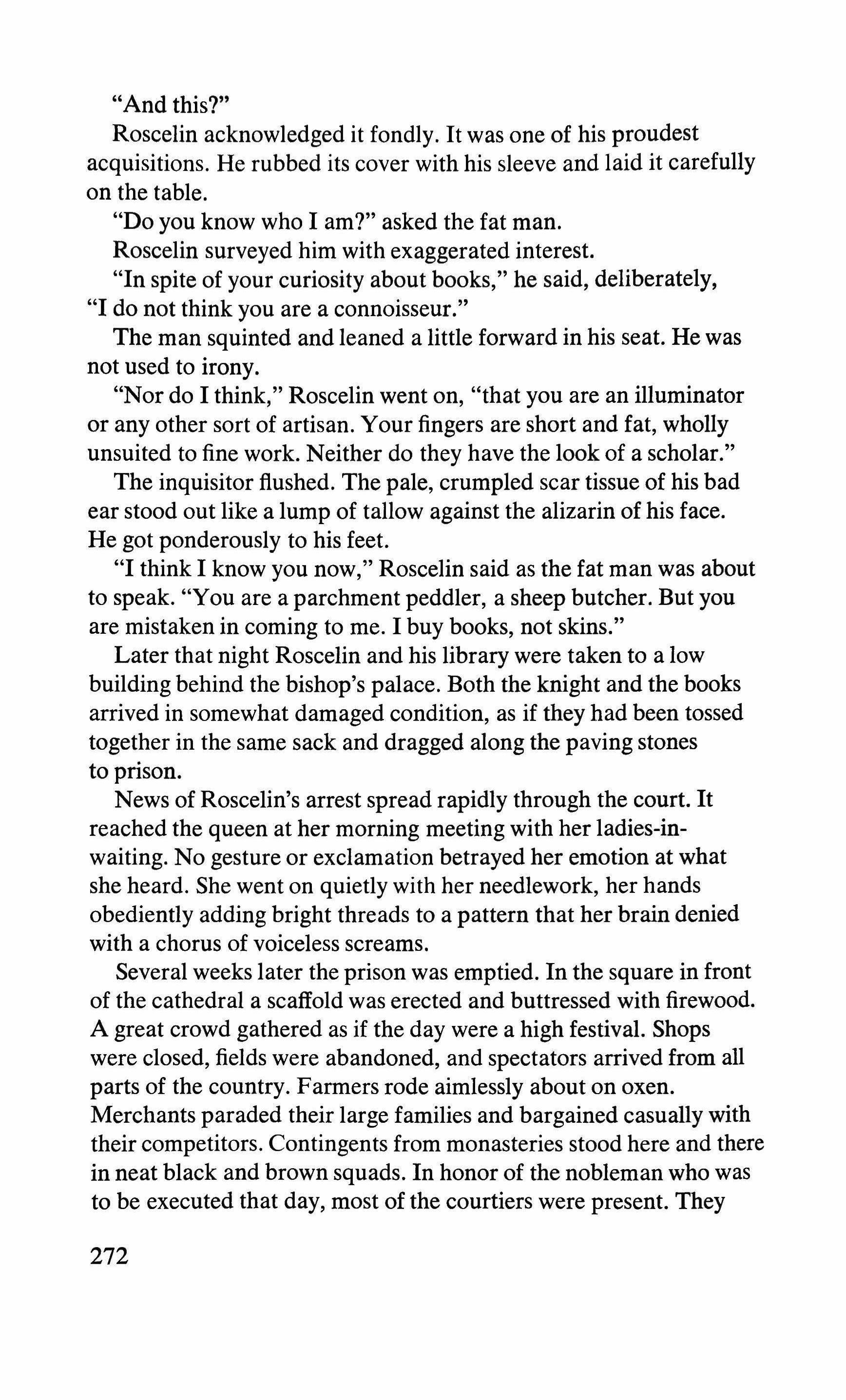
"And this?"
Roscelin acknowledged it fondly. It was one of his proudest acquisitions. He rubbed its cover with his sleeve and laid it carefully on the table.
"Do you know who I am?" asked the fat man. Roscelin surveyed him with exaggerated interest.
"In spite of your curiosity about books," he said, deliberately, "I do not think you are a connoisseur."
The man squinted and leaned a little forward in his seat. He was not used to irony.
"Nor do I think," Roscelin went on, "that you are an illuminator or any other sort of artisan. Your fingers are short and fat, wholly unsuited to fine work. Neither do they have the look of a scholar."
The inquisitor flushed. The pale, crumpled scar tissue of his bad ear stood out like a lump of tallow against the alizarin of his face. He got ponderously to his feet.
"I think I know you now," Roscelin said as the fat man was about to speak. "You are a parchment peddler, a sheep butcher. But you are mistaken in coming to me. I buy books, not skins."
Later that night Roscelin and his library were taken to a low building behind the bishop's palace. Both the knight and the books arrived in somewhat damaged condition, as if they had been tossed together in the same sack and dragged along the paving stones to prison.
News of Roscelin's arrest spread rapidly through the court. It reached the queen at her morning meeting with her ladies-inwaiting. No gesture or exclamation betrayed her emotion at what she heard. She went on quietly with her needlework, her hands obediently adding bright threads to a pattern that her brain denied with a chorus of voiceless screams.
Several weeks later the prison was emptied. In the square in front of the cathedral a scaffold was erected and buttressed with firewood. A great crowd gathered as if the day were a high festival. Shops were closed, fields were abandoned, and spectators arrived from all parts of the country. Farmers rode aimlessly about on oxen.
Merchants paraded their large families and bargained casually with their competitors. Contingents from monasteries stood here and there in neat black and brown squads. In honor of the nobleman who was to be executed that day, most of the courtiers were present. They

rented upper rooms in houses on the square and had light, winy luncheons spread on trestle tables near the windows. Some of the more daring of them masked themselves and descended into the mob to get a closer view of the proceedings at the scaffold. A temper ofbright wantonness enlivened the whole congregation. No one except the city's thieves thought of work. Burglars in the deserted streets called greetings to one another as they stripped the unattended houses, while eager pickpockets toiled among the multitude before the cathedral.
When the prisoners were led into the square, a chorus of jeers and obscenities met them. They were, for the most part, old women and idiots-mad, miserable creatures who had been proven by the Inquisition to be traffickers with incubi or succubi, familiars of dark beasts, dealers with the devil himself. Roscelin was among them. He was emaciated and filthy, but his manner was as indifferent, as lazily defiant, and as infuriating as ever. He had carefully combed his hair and beard with his split fingernails and he had tied the tatters that hung about him into ingenious and elaborate bows.
Like greedy carp worrying bread crusts in a pond, the mob closed around the prisoners, shoving them, cursing them, showering them with filth and blows. The leader in this assault was one of the courtiers, a tall figure whose identity was obscured by a full cloak and a rusty helmet of antiquated design. He carried a long wand bound with silver ribbons and tipped with a bear's claw. With grim, methodical cruelty he slashed his way through the crowd, inflicting as many welts and gashes on his comrades, the tormentors, as on the tormented. A space cleared around him, and he advanced alone on the segment of the column in which Roscelin marched. The helmeted figure paused, poised, before the knight. Some words, low, intense, and unintelligible to the mob, passed between them. Then the courtier's fury, which seemed for a moment to have abated, returned, and the decorated quirt darted forward. Roscelin, struck in the face, flinched and raised his manacled hands as if to protect himself from a second blow. The mob cheered to see him shaken at last from his indifference, then went suddenly silent as he fell to the pavement. From the brief hush rose a howl of disappointment. The tormentor's hand had been too heavy: the thrust that should have bloodied Roscelin's cheek had driven through the eye socket to the brain. The masked courtier was quickly lost in the confusion surround-
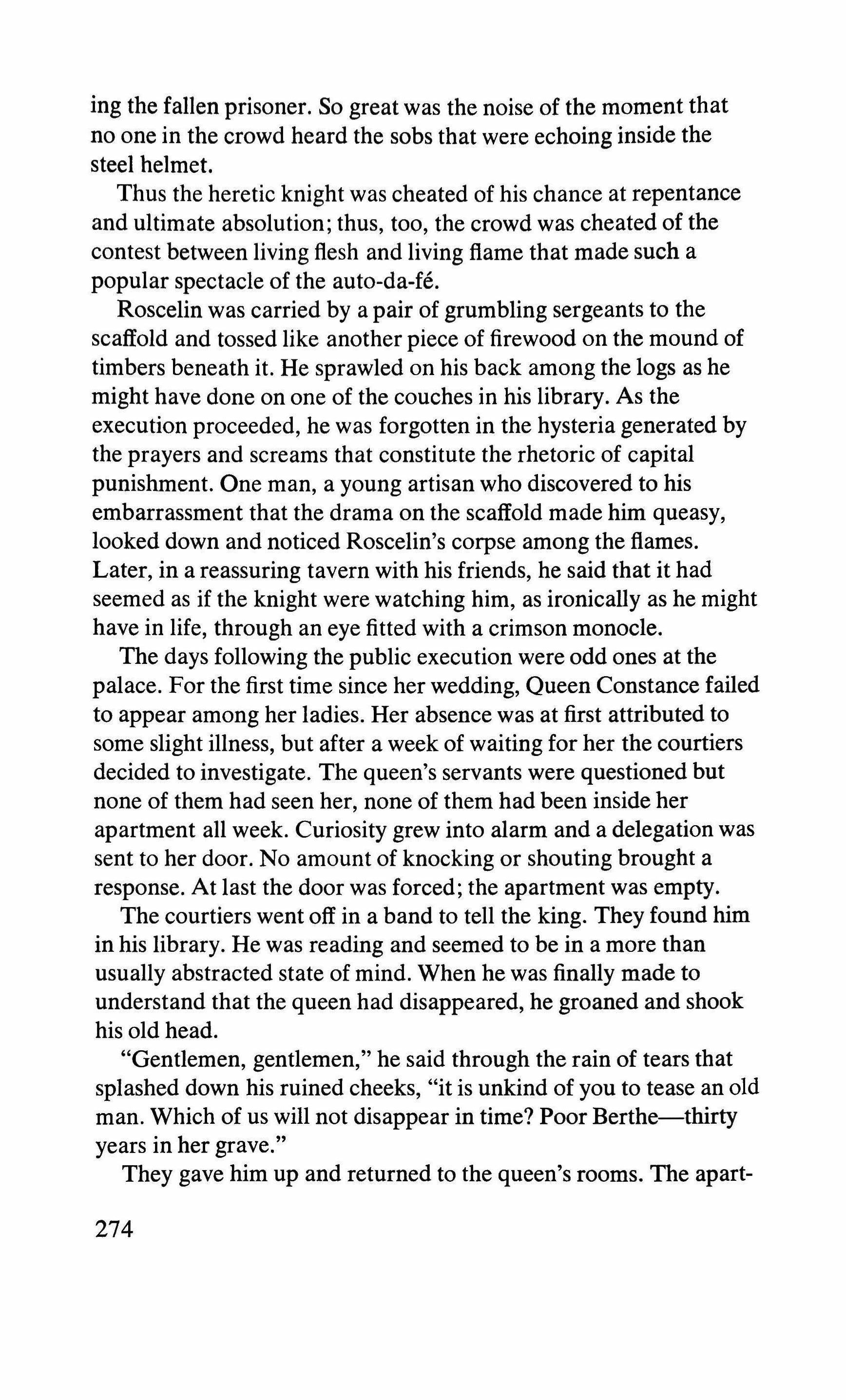
ing the fallen prisoner. So great was the noise of the moment that no one in the crowd heard the sobs that were echoing inside the steel helmet.
Thus the heretic knight was cheated of his chance at repentance and ultimate absolution; thus, too, the crowd was cheated of the contest between living flesh and living flame that made such a popular spectacle of the auto-da-te.
Roscelin was carried by a pair of grumbling sergeants to the scaffold and tossed like another piece of firewood on the mound of timbers beneath it. He sprawled on his back among the logs as he might have done on one of the couches in his library. As the execution proceeded, he was forgotten in the hysteria generated by the prayers and screams that constitute the rhetoric of capital punishment. One man, a young artisan who discovered to his embarrassment that the drama on the scaffold made him queasy, looked down and noticed Roscelin's corpse among the flames. Later, in a reassuring tavern with his friends, he said that it had seemed as if the knight were watching him, as ironically as he might have in life, through an eye fitted with a crimson monocle.
The days following the public execution were odd ones at the palace. For the first time since her wedding, Queen Constance failed to appear among her ladies. Her absence was at first attributed to some slight illness, but after a week of waiting for her the courtiers decided to investigate. The queen's servants were questioned but none of them had seen her, none of them had been inside her apartment all week. Curiosity grew into alarm and a delegation was sent to her door. No amount of knocking or shouting brought a response. At last the door was forced; the apartment was empty. The courtiers went off in a band to tell the king. They found him in his library. He was reading and seemed to be in a more than usually abstracted state of mind. When he was finally made to understand that the queen had disappeared, he groaned and shook his old head.
"Gentlemen, gentlemen," he said through the rain of tears that splashed down his ruined cheeks, "it is unkind of you to tease an old man. Which of us will not disappear in time? Poor Berthe-thirty years in her grave."
They gave him up and returned to the queen's rooms. The apart-
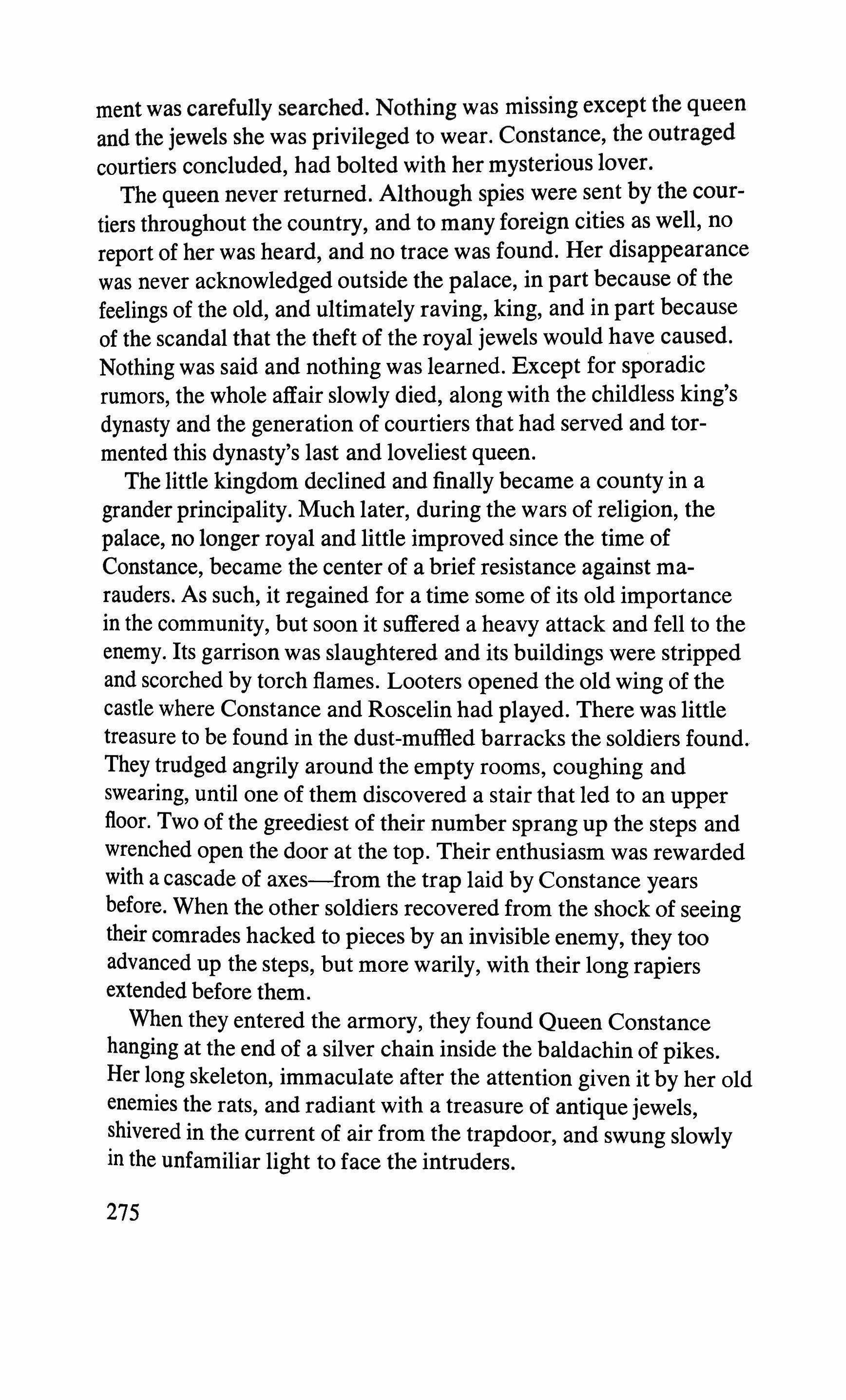
ment was carefully searched. Nothing was missing except the queen and the jewels she was privileged to wear. Constance, the outraged courtiers concluded, had bolted with her mysterious lover.
The queen never returned. Although spies were sent by the courtiers throughout the country, and to many foreign cities as well, no report of her was heard, and no trace was found. Her disappearance was never acknowledged outside the palace, in part because of the feelings of the old, and ultimately raving, king, and in part because of the scandal that the theft of the royal jewels would have caused. Nothing was said and nothing was learned. Except for sporadic rumors, the whole affair slowly died, along with the childless king's dynasty and the generation of courtiers that had served and tormented this dynasty's last and loveliest queen.
The little kingdom declined and finally became a county in a granderprincipality. Much later, during the wars of religion, the palace, no longer royal and little improved since the time of Constance, became the center of a brief resistance against marauders. As such, it regained for a time some of its old importance in the community, but soon it suffered a heavy attack and fell to the enemy. Its garrison was slaughtered and its buildings were stripped and scorched by torch flames. Looters opened the old wing of the castle where Constance and Roscelin had played. There was little treasure to be found in the dust-muffled barracks the soldiers found. They trudged angrily around the empty rooms, coughing and swearing, until one of them discovered a stair that led to an upper floor. Two of the greediest of their number sprang up the steps and wrenched open the door at the top. Their enthusiasm was rewarded with a cascade of axes-from the trap laid by Constance years before. When the other soldiers recovered from the shock of seeing their comrades hacked to pieces by an invisible enemy, they too advanced up the steps, but more warily, with their long rapiers extended before them.
When they entered the armory, they found Queen Constance hanging at the end of a silver chain inside the baldachin of pikes. Her long skeleton, immaculate after the attention given it by her old enemies the rats, and radiant with a treasure of antiquejewels, shivered in the current of air from the trapdoor, and swung slowly in the unfamiliar light to face the intruders. 275
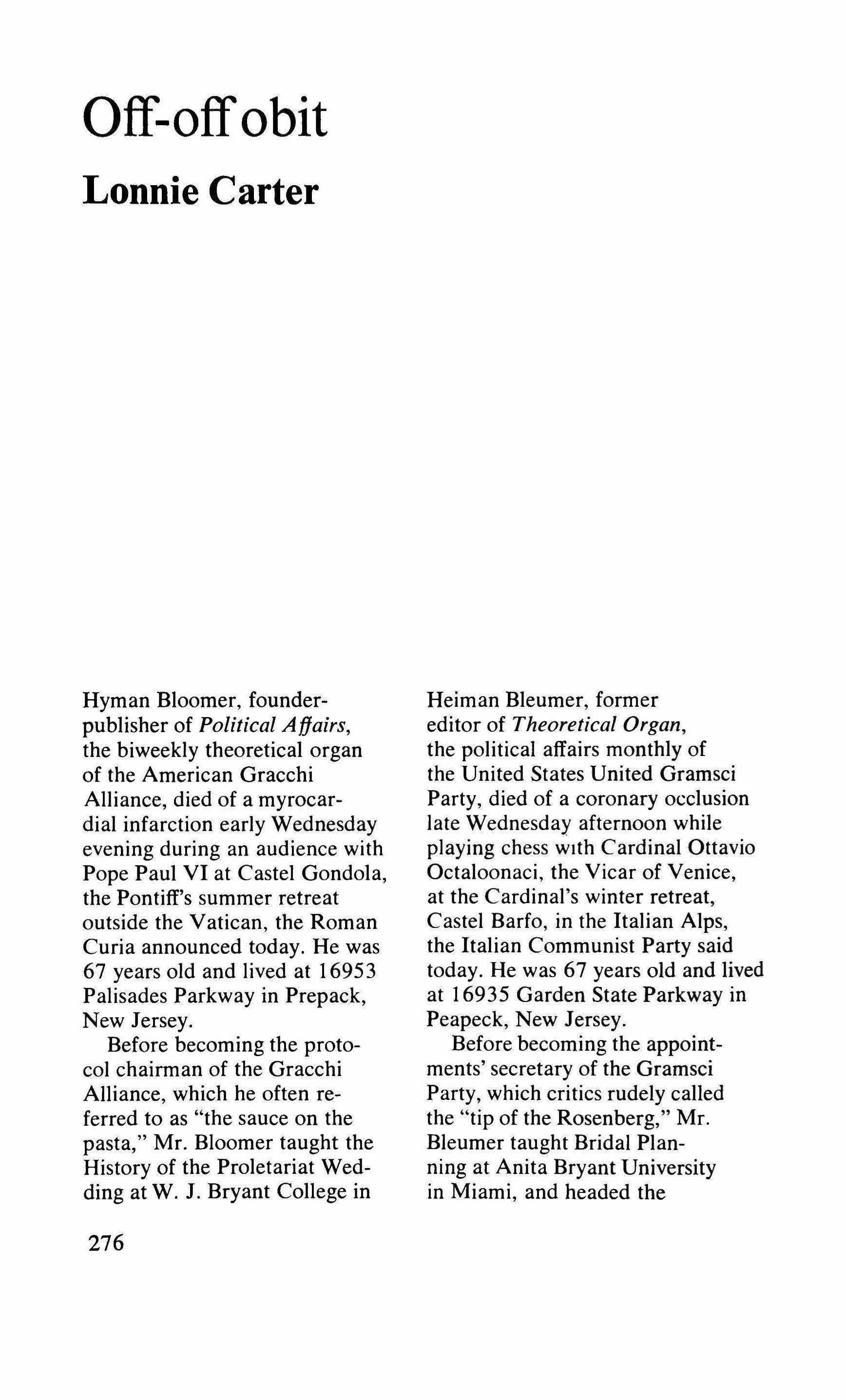
Hyman Bloomer, founderpublisher of Political Affairs, the biweekly theoretical organ of the American Gracchi Alliance, died of a myrocardial infarction early Wednesday evening during an audience with Pope Paul VI at Castel Gondola, the Pontiff's summer retreat outside the Vatican, the Roman Curia announced today. He was 67 years old and lived at 16953 Palisades Parkway in Prepack, New Jersey.
Before becoming the protocol chairman of the Gracchi Alliance, which he often referred to as "the sauce on the pasta," Mr. Bloomer taught the History of the Proletariat Wedding at W. J. Bryant College in
276
Heiman Bleumer, former editor of Theoretical Organ, the political affairs monthly of the United States United Gramsci Party, died of a coronary occlusion late Wednesday afternoon while playing chess with Cardinal Ottavio Octaloonaci, the Vicar of Venice, at the Cardinal's winter retreat, Castel Barfo, in the Italian Alps, the Italian Communist Party said today. He was 67 years old and lived at 16935 Garden State Parkway in Peapeck, New Jersey.
Before becoming the appointments' secretary of the Gramsci Party, which critics rudely called the "tip of the Rosenberg," Mr. Bleumer taught Bridal Planning at Anita Bryant University in Miami, and headed the
Miami, Ohio, and headed the Dorothy Day Care Center for Reformed Muscovite children in the now-razed Willkommen Hotel on Chicago's Northwest Side.
From 1943 to 1948, he was the educational coordinator of the Illinois-Indiana district of the United Mine Workers. It was then Mr. Bloomer first sought and attracted attention with bold moves to organize the U.M.W. according to the principles of Tiberius and Gaius Gracchus. What happened on March 18, 1943 in the coal town of Carbondale, Illinois, is still anyone's guess. The authorities, even today, do not veer from the official report that chanting Gracchis carrying signs reading "Good Vibes with Tibes" and "Gai Power" attacked first. John L. Loois, Mr. Eyebrows himself, was officially outraged with Mr. Bloomer, but privately expressed admiration for his courage.
In 1958 Bloomer and six others were convicted in Federal Court in Chicago of breathing together to blow up the Polish Roman Catholic Union in reprisal for the group's expose of the Gracchi Alliance as a front for the Communist Party. He and the six spent 18 months at the Decatur Prison Farm, where the growing was quickly collectivized.
In recent years Bloomer turned conservative, courting the strongly anticommunist hierarchy of the Church. He had yearly audiences with the Pope. Rumor had it the Pope applauded.
277

Clarence Day Care Center for Hasseled Fathers in the old Exacta Hotel next to Arlington Race Track in Arlington, Illinois.
In the mid-1940s, he was the educational director of the Michigan-Indiana district of the United Auto Workers. It was then Mr. Bleumer first came to prominence with his daring attempts to organize the U.A.W. along the teaching lines of Antonio "Nino" Gramsci, "The Little Schoolmaster." News of the events around Pontiac, Michigan, in March of 1943 (involving the arrest of hundreds of chanting "Ninos"), though largely suppressed outside the area, reached the ears of Walter Ruuther, forcing him to remark, "The Nino, the Pinto and the Vega." No one at the time thought the reference went beyond Gramsci and his two younger brothers, Pintoretto and Vegiario.
In 1958 Bleumer and six others were convicted in Federal Court in Detroit of conspiracy to pressure Motor Trend magazine to describe the Edsel as "an Oldsmobile sucking a lemon." He and the six spent 18 months at the Ypsilanti Correctional Institute and filled the prison library with left-of-the-road literature.
In recent years Bleumer became a fierce anticommunist, counting among his friends Cardinal Octaloonaci, known as "il prete rosso"-the red-hating priest.
His family is at a loss for an explanation.
Mr. Bloomer is survived by his wife, Helga, and two stepdaughters, Marge and William. Services will be at The Little Infant of the Hague in Prepack at lOA. M.
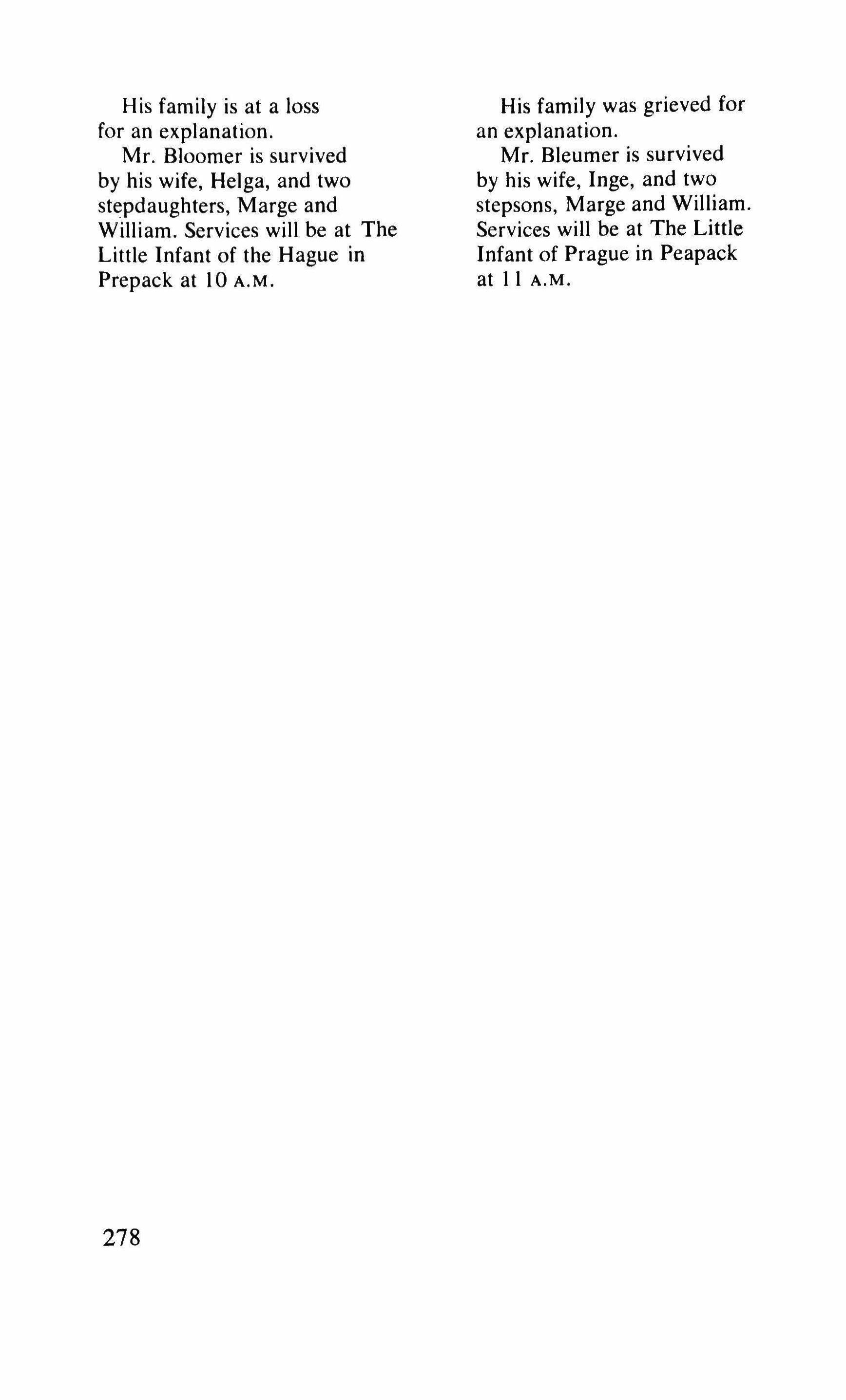
His family was grieved for an explanation.
Mr. Bleumer is survived by his wife, Inge, and two stepsons, Marge and William. Services will be at The Little Infant of Prague in Peapack at II A.M.
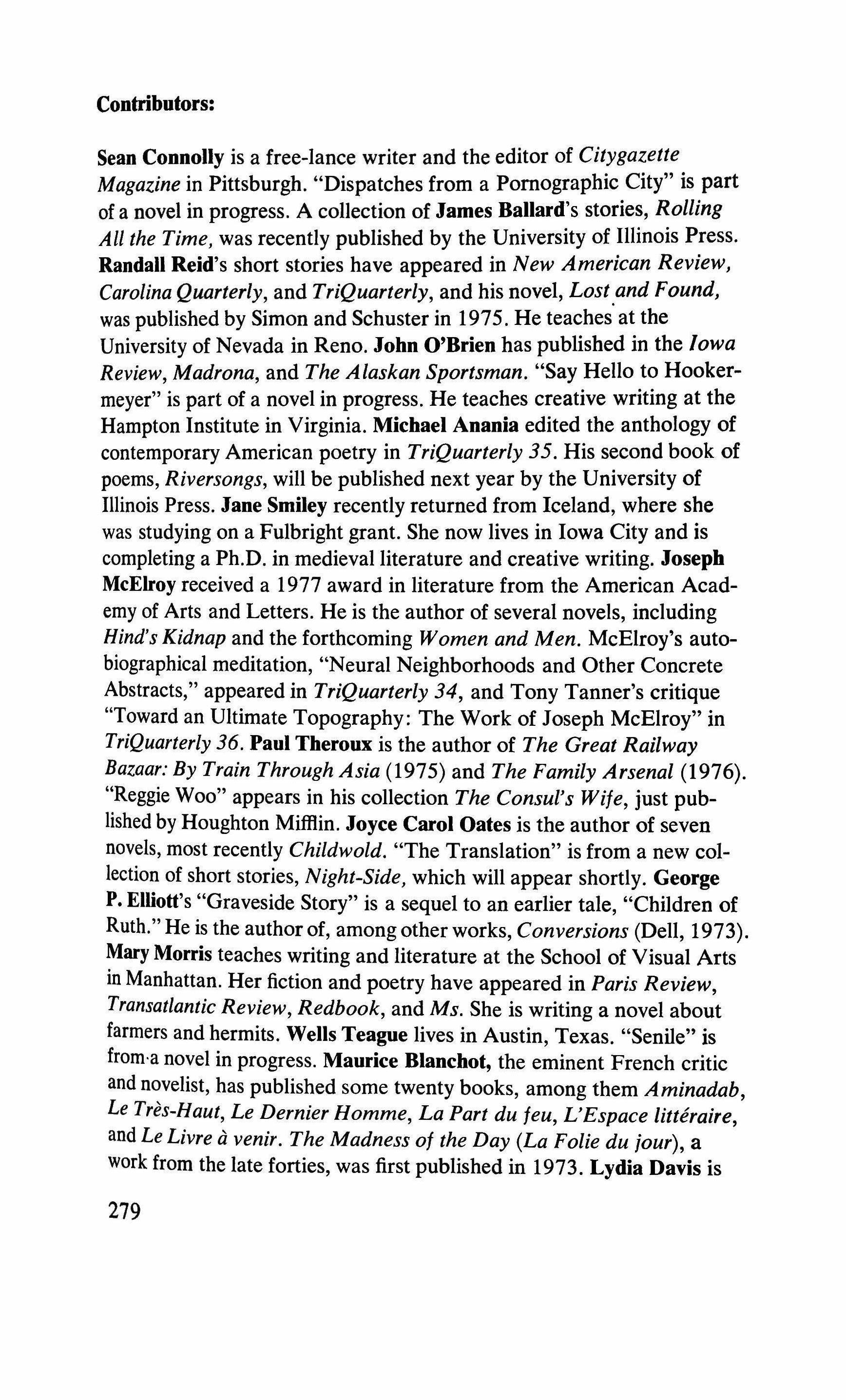
Contributors:
Sean Connolly is a free-lance writer and the editor of Citygazette Magazine in Pittsburgh. "Dispatches from a Pornographic City" is part of a novel in progress. A collection of James Ballard's stories, Rolling All the Time, was recently published by the University of Illinois Press. Randall Reid's short stories have appeared in New American Review, Carolina Quarterly, and TriQuarterly, and his novel, Lost and Found, was published by Simon and Schuster in 1975. He teaches' at the University of Nevada in Reno. John O'Brien has published in the Iowa Review, Madrona, and The Alaskan Sportsman. "Say Hello to Hookermeyer" is part of a novel in progress. He teaches creative writing at the Hampton Institute in Virginia. Michael Anania edited the anthology of contemporary American poetry in TriQuarterly 35. His second book of poems, Riversongs, will be published next year by the University of Illinois Press. Jane Smiley recently returned from Iceland, where she was studying on a Fulbright grant. She now lives in Iowa City and is completing a Ph.D. in medieval literature and creative writing. Joseph McElroy received a 1977 award in literature from the American Academy of Arts and Letters. He is the author of several novels, including Hind's Kidnap and the forthcoming Women and Men. McElroy's autobiographical meditation, "Neural Neighborhoods and Other Concrete Abstracts," appeared in TriQuarterly 34, and Tony Tanner's critique "Toward an Ultimate Topography: The Work of Joseph McElroy" in TriQuarterly 36. Paul Theroux is the author of The Great Railway Bazaar: By Train Through Asia (1975) and The Family Arsenal (1976). "Reggie Woo" appears in his collection The Consul's Wife, just published by Houghton Mifflin. Joyce Carol Oates is the author of seven novels, most recently Childwold. "The Translation" is from a new collection of short stories, Night-Side, which will appear shortly. George P. Elliott's "Graveside Story" is a sequel to an earlier tale, "Children of Ruth." He is the author of, among other works, Conversions (Dell, 1973). Mary Morris teaches writing and literature at the School of Visual Arts in Manhattan. Her fiction and poetry have appeared in Paris Review, Transatlantic Review, Redbook, and Ms. She is writing a novel about farmers and hermits. Wells Teague lives in Austin, Texas. "Senile" is from-a novel in progress. Maurice Blanchot, the eminent French critic and novelist, has published some twenty books, among them Aminadab, Le Tres-Haut, Le Dernier Homme, La Part du feu, L'Espace litteraire, and Le Livre a venir. The Madness of the Day (La Folie du jour), a work from the late forties, was first published in 1973. Lydia Davis is 279
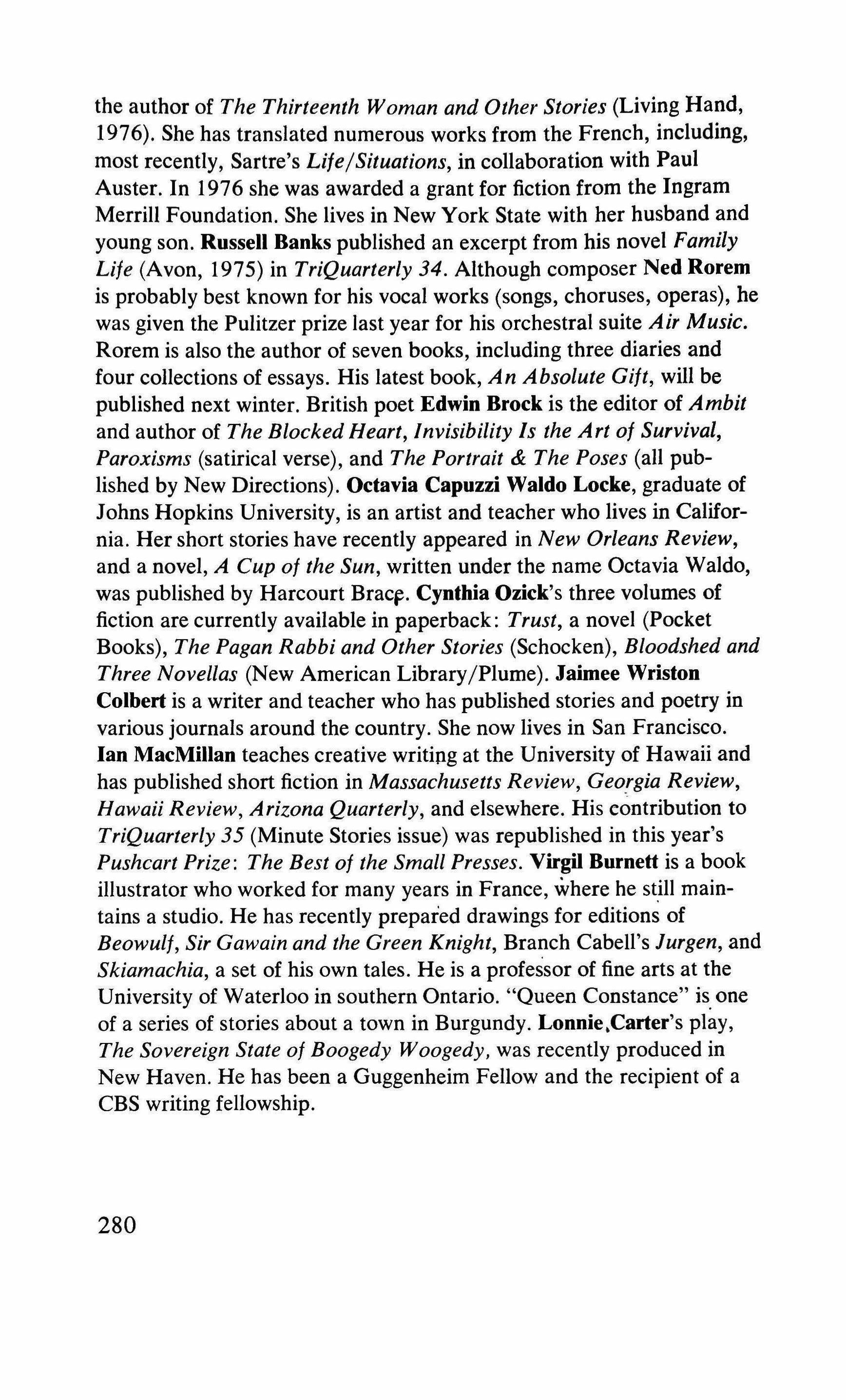
the author of The Thirteenth Woman and Other Stories (Living Hand, 1976). She has translated numerous works from the French, including, most recently, Sartre's Life/Situations, in collaboration with Paul Auster. In 1976 she was awarded a grant for fiction from the Ingram Merrill Foundation. She lives in New York State with her husband and young son. Russell Banks published an excerpt from his novel Family Life (Avon, 1975) in TriQuarterly 34. Although composer Ned Rorem is probably best known for his vocal works (songs, choruses, operas), he was given the Pulitzer prize last year for his orchestral suite Air Music. Rorem is also the author of seven books, including three diaries and four collections of essays. His latest book, An Absolute Gift, will be published next winter. British poet Edwin Brock is the editor of Ambit and author of The Blocked Heart, Invisibility Is the Art of Survival, Paroxisms (satirical verse), and The Portrait & The Poses (all published by New Directions). Octavia Capuzzi Waldo Locke, graduate of Johns Hopkins University, is an artist and teacher who lives in California. Her short stories have recently appeared in New Orleans Review, and a novel, A Cup of the Sun, written under the name Octavia Waldo, was published by Harcourt Brace. Cynthia Ozick's three volumes of fiction are currently available in paperback: Trust, a novel (Pocket Books), The Pagan Rabbi and Other Stories (Schocken), Bloodshed and Three Novellas (New American Library/Plume). Jaimee Wriston Colbert is a writer and teacher who has published stories and poetry in various journals around the country. She now lives in San Francisco. Ian MacMillan teaches creative writing at the University of Hawaii and has published short fiction in Massachusetts Review, Georgia Review, Hawaii Review, Arizona Quarterly, and elsewhere. His contribution to TriQuarterly 35 (Minute Stories issue) was republished in this year's Pushcart Prize: The Best of the Small Presses. Virgil Burnett is a book illustrator who worked for many years in France, where he still maintains a studio. He has recently prepared drawings for editions of Beowulf, Sir Gawain and the Green Knight, Branch Cabell's Jurgen, and Skiamachia, a set of his own tales. He is a professor of fine arts at the University of Waterloo in southern Ontario. "Queen Constance" is. one of a series of stories about a town in Burgundy. Lonnie.Carter's play, The Sovereign State of Boogedy Woogedy, was recently produced in New Haven. He has been a Guggenheim Fellow and the recipient of a CBS writing fellowship.

